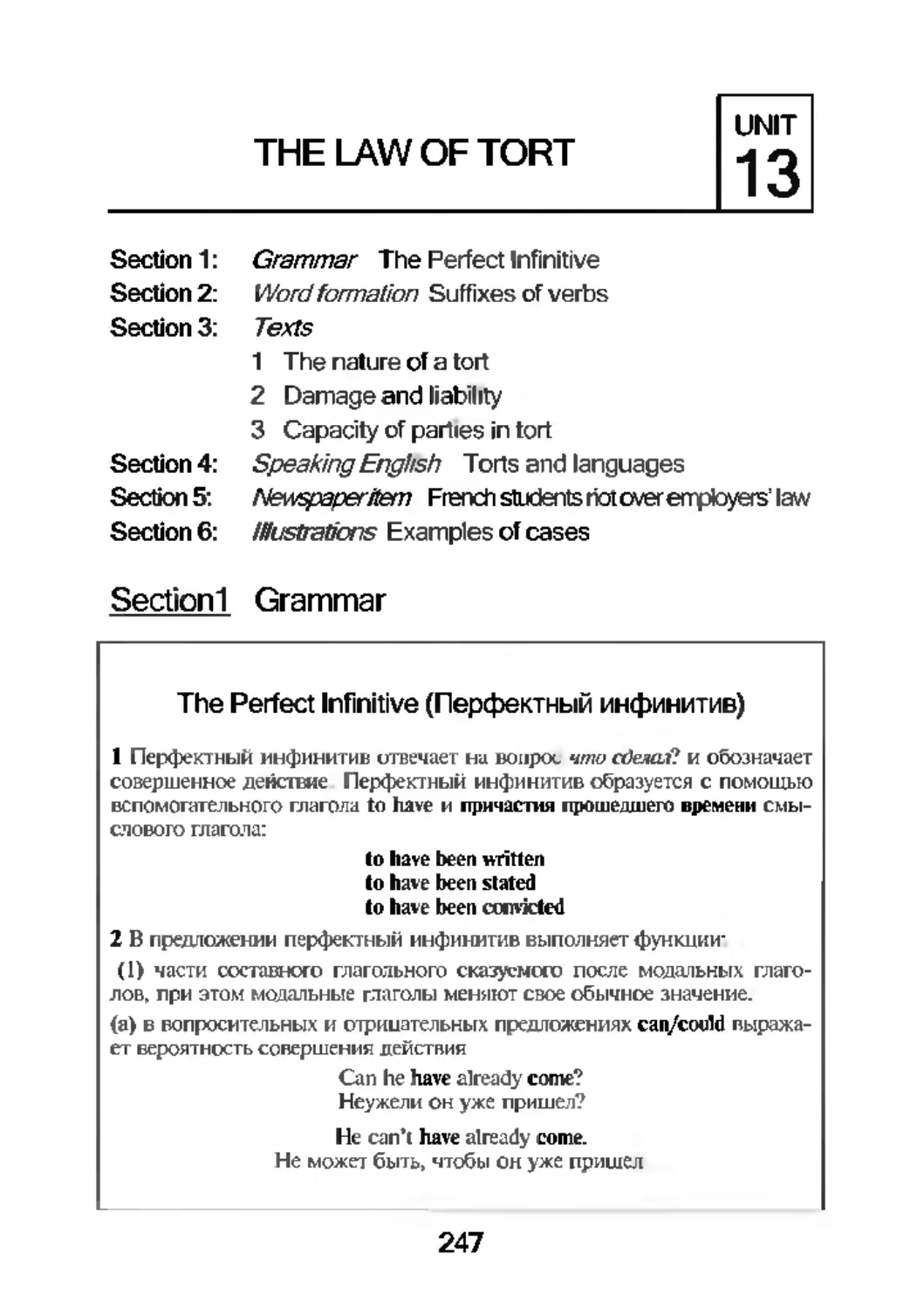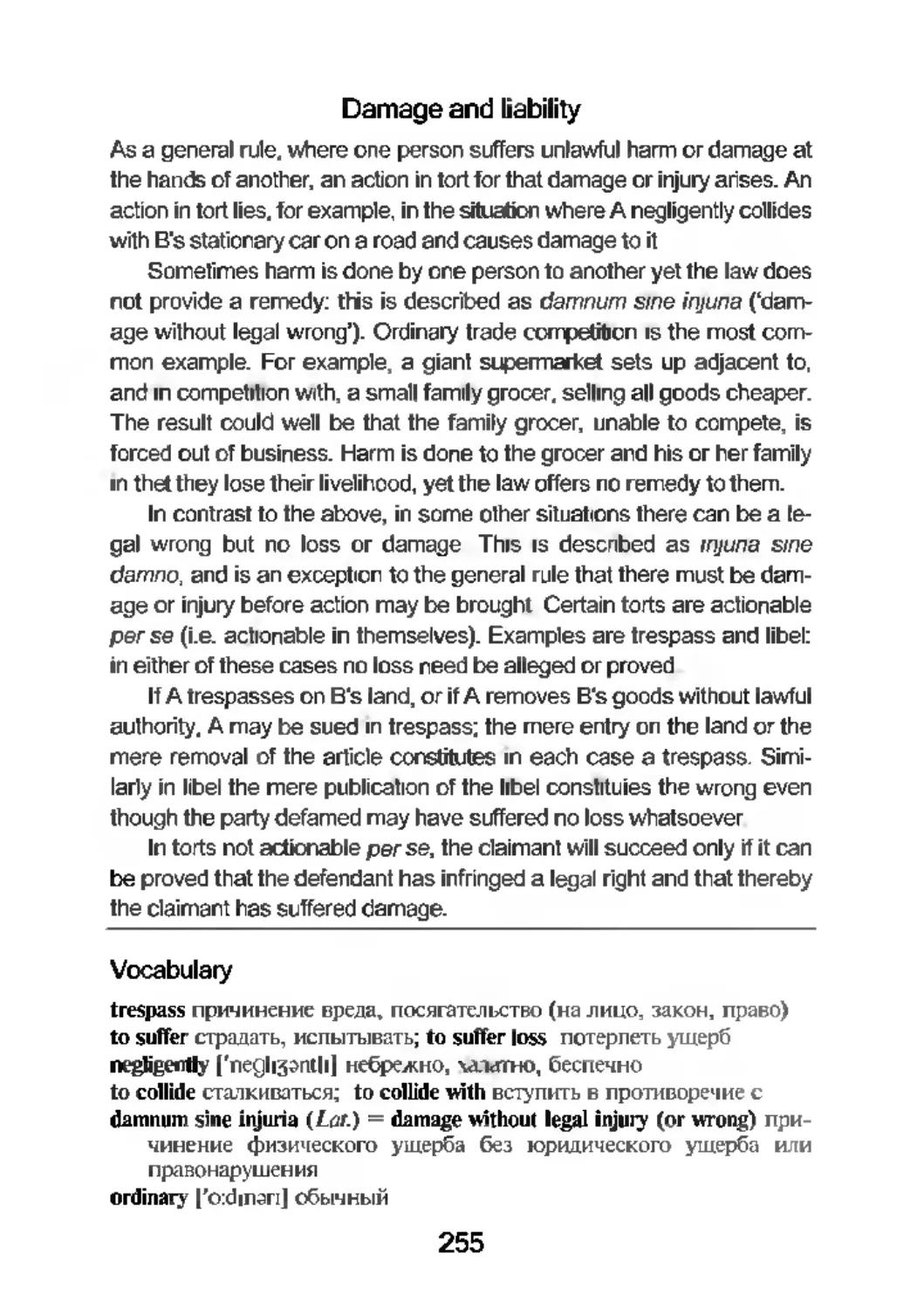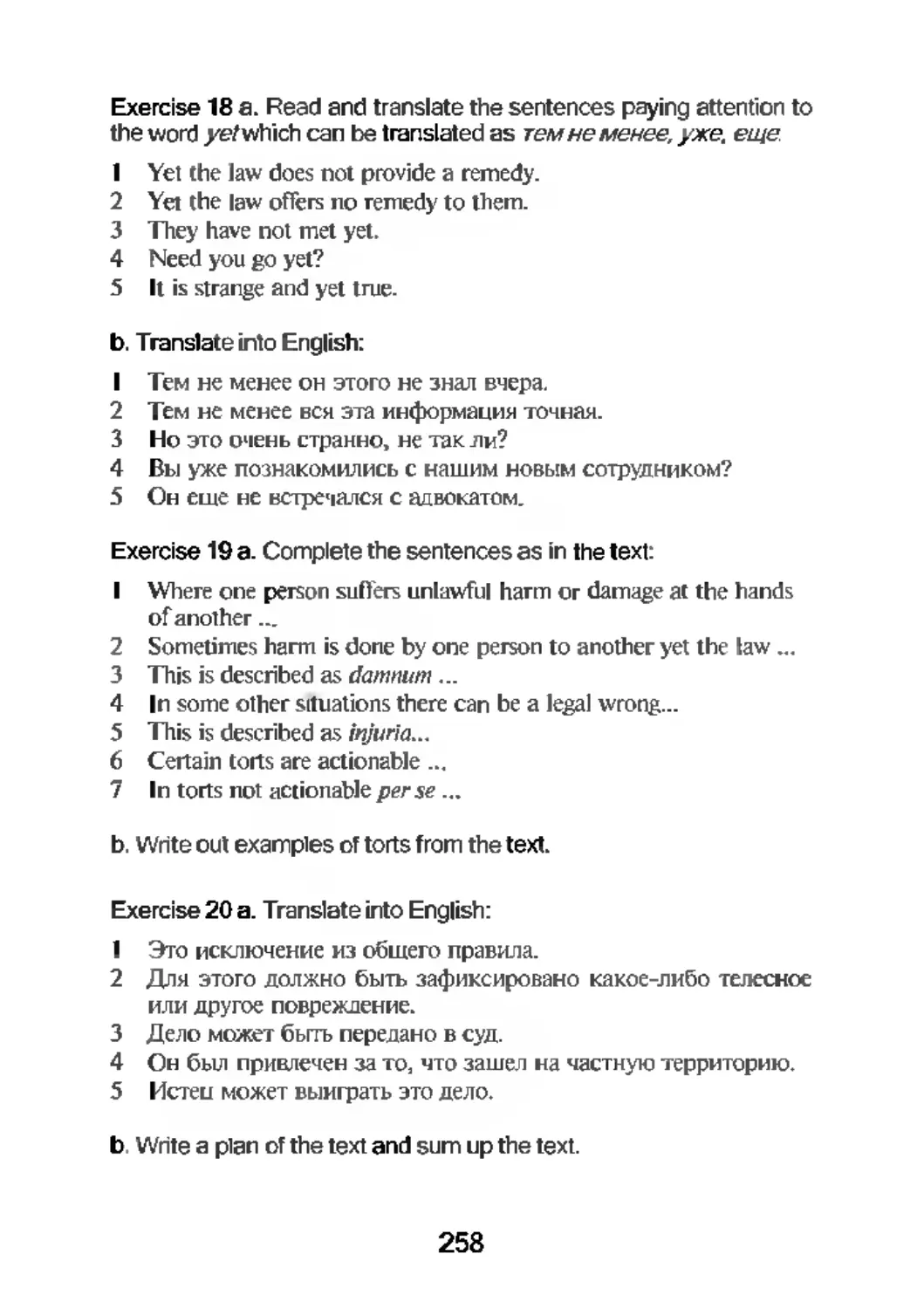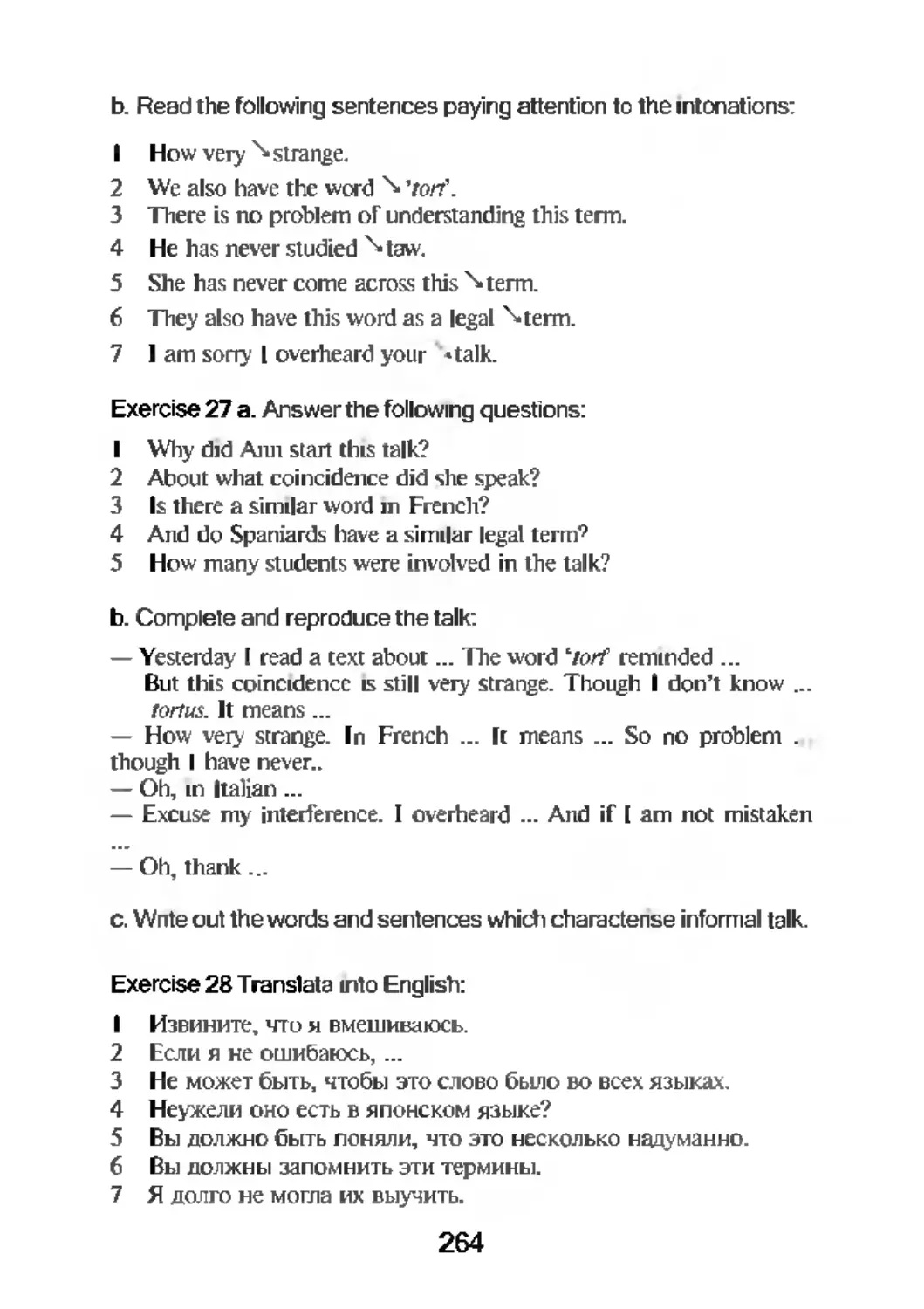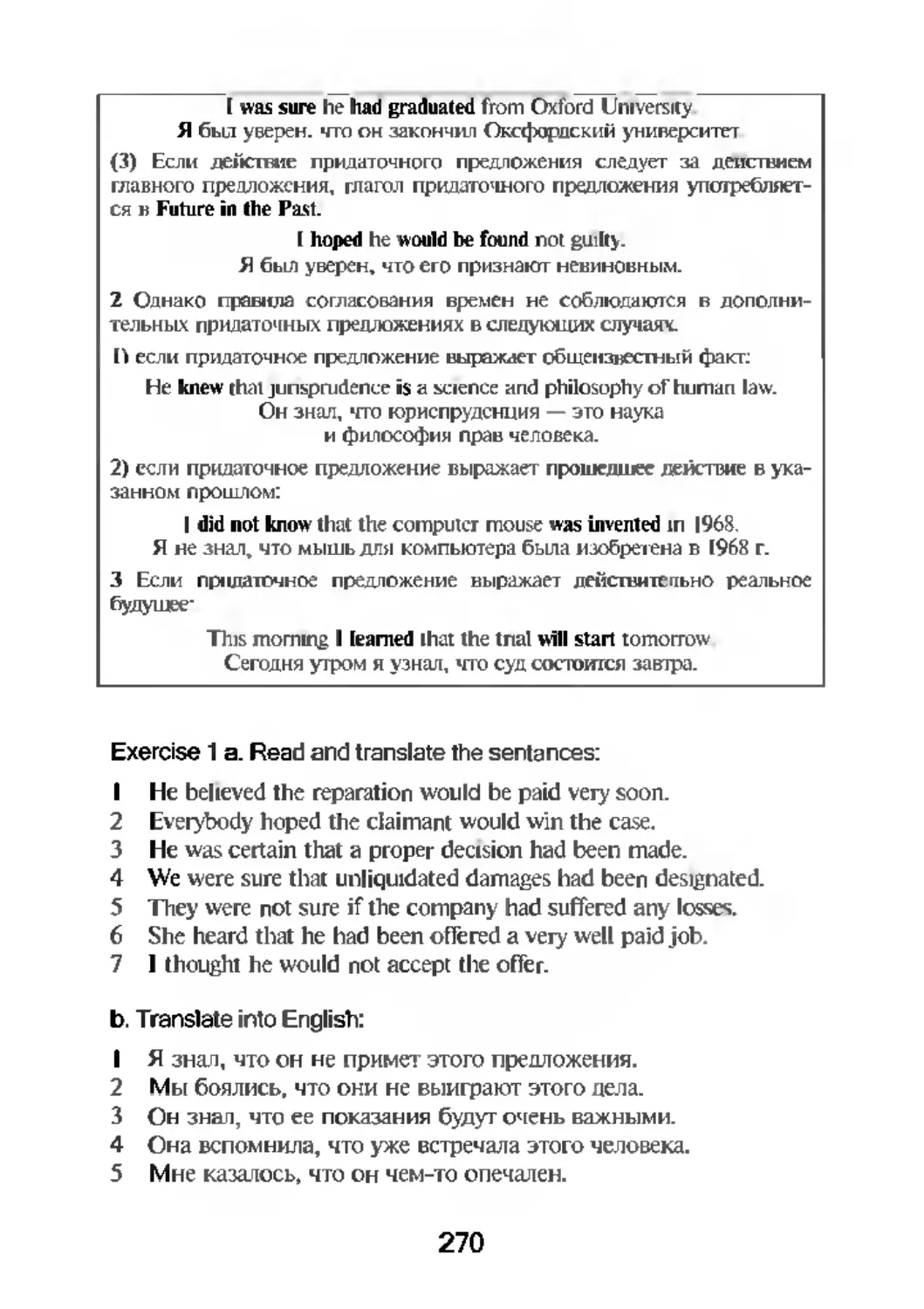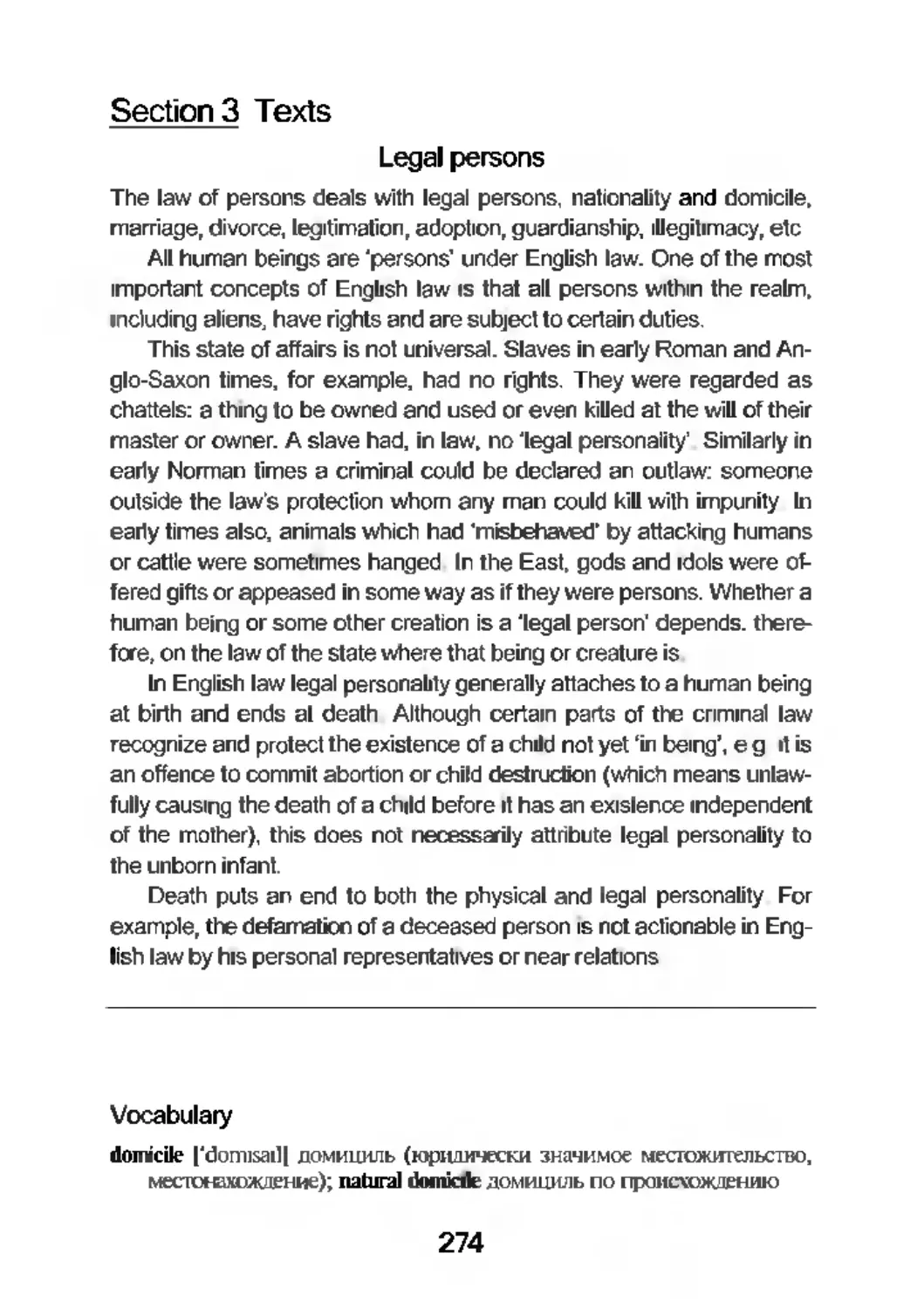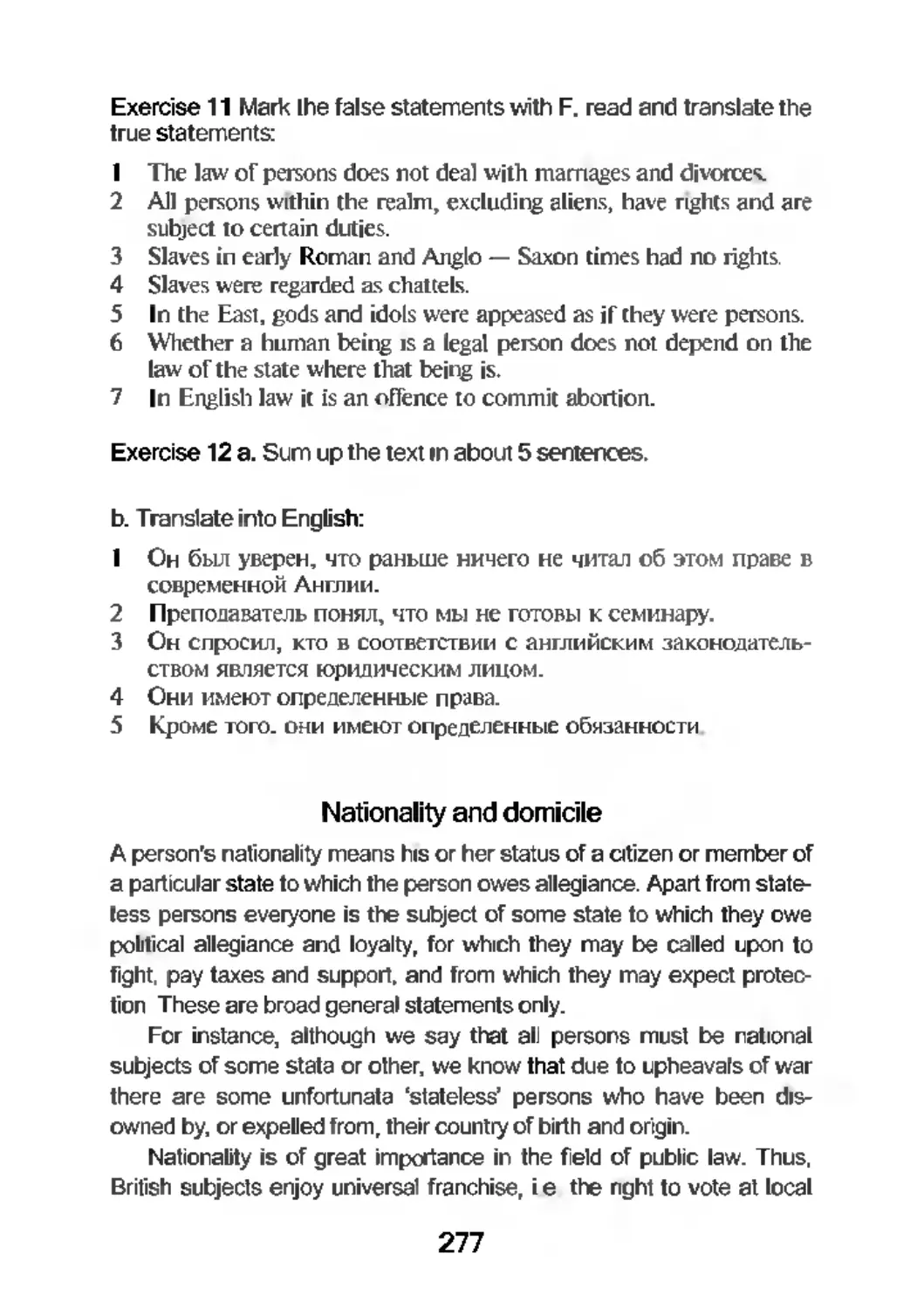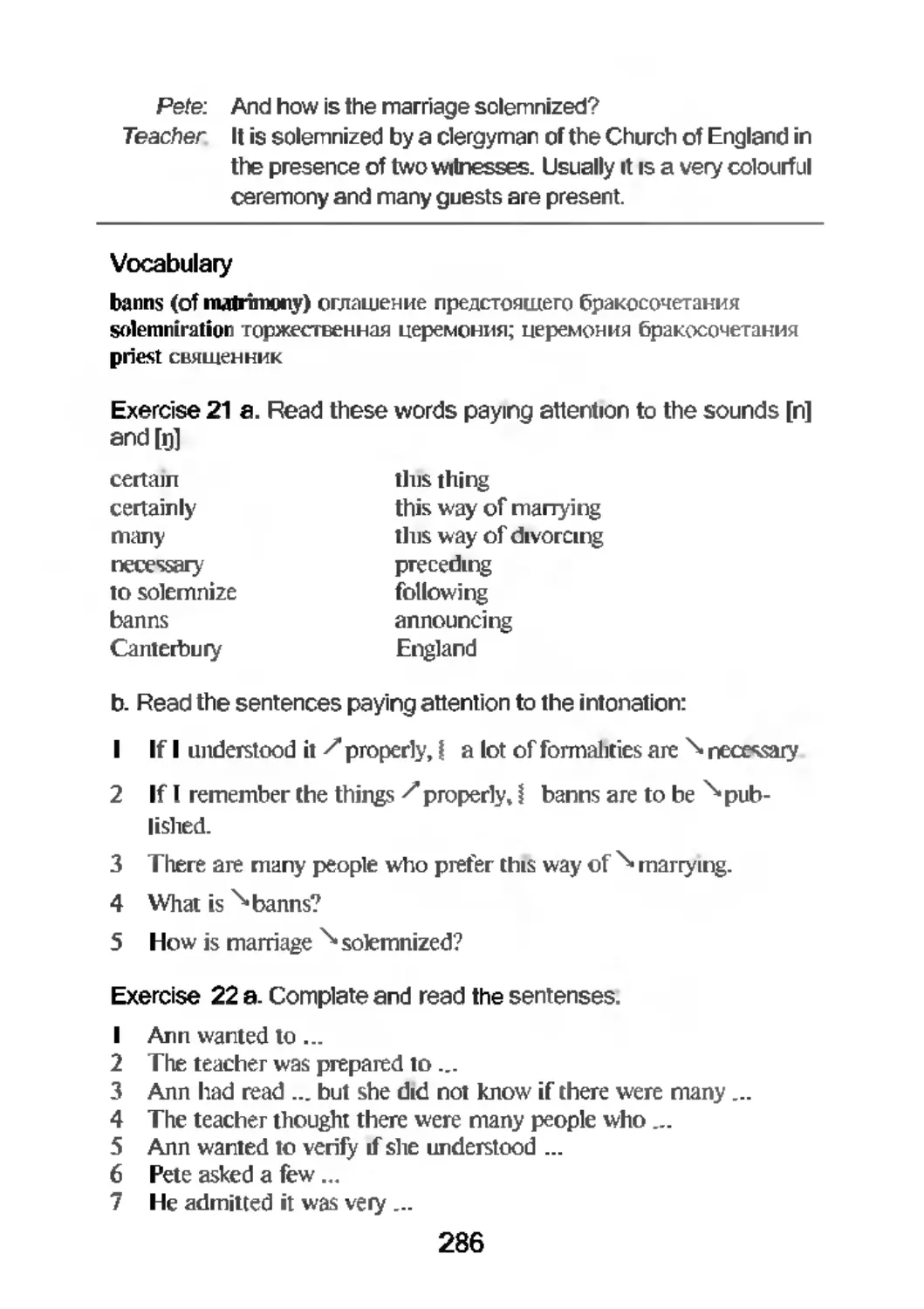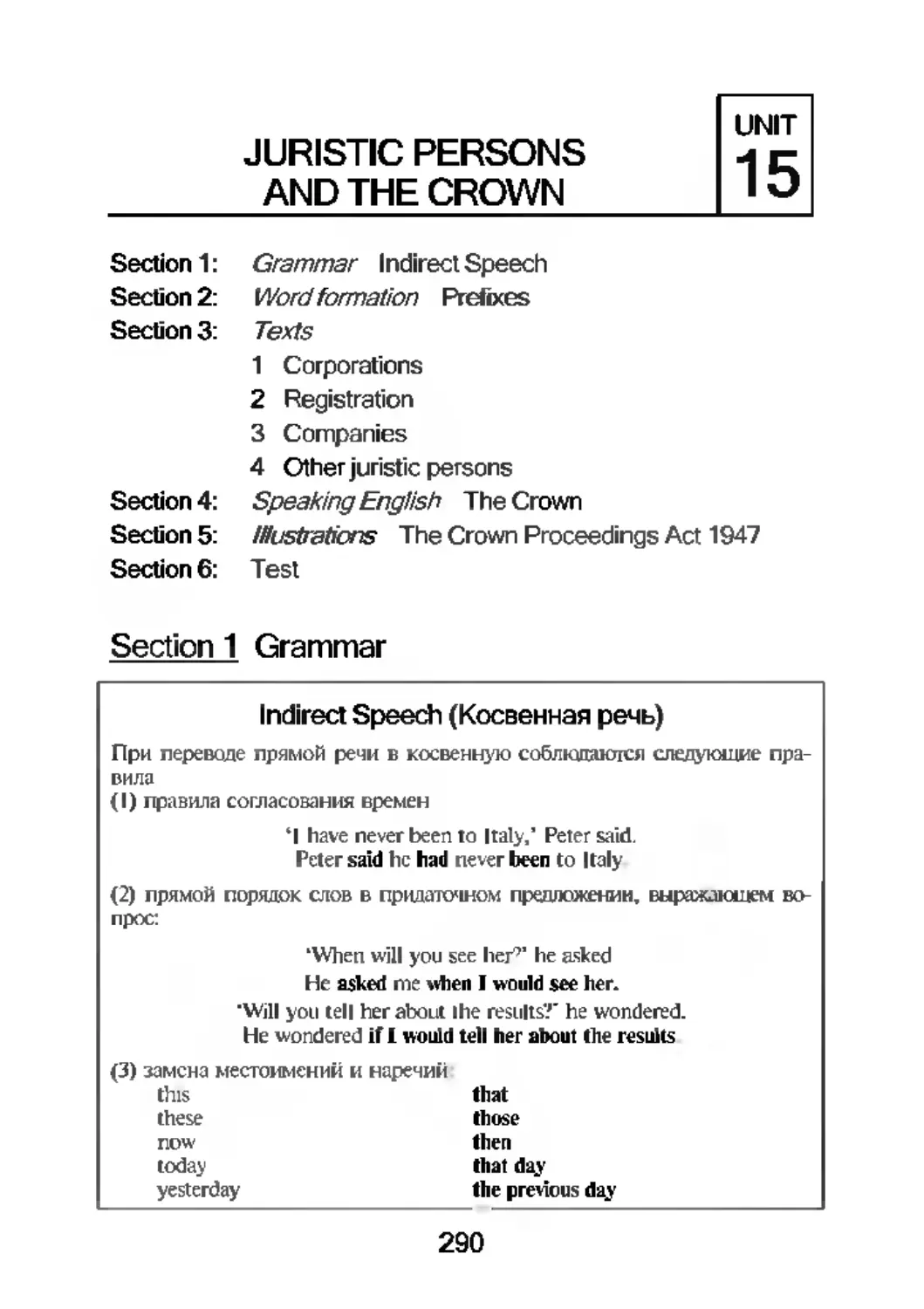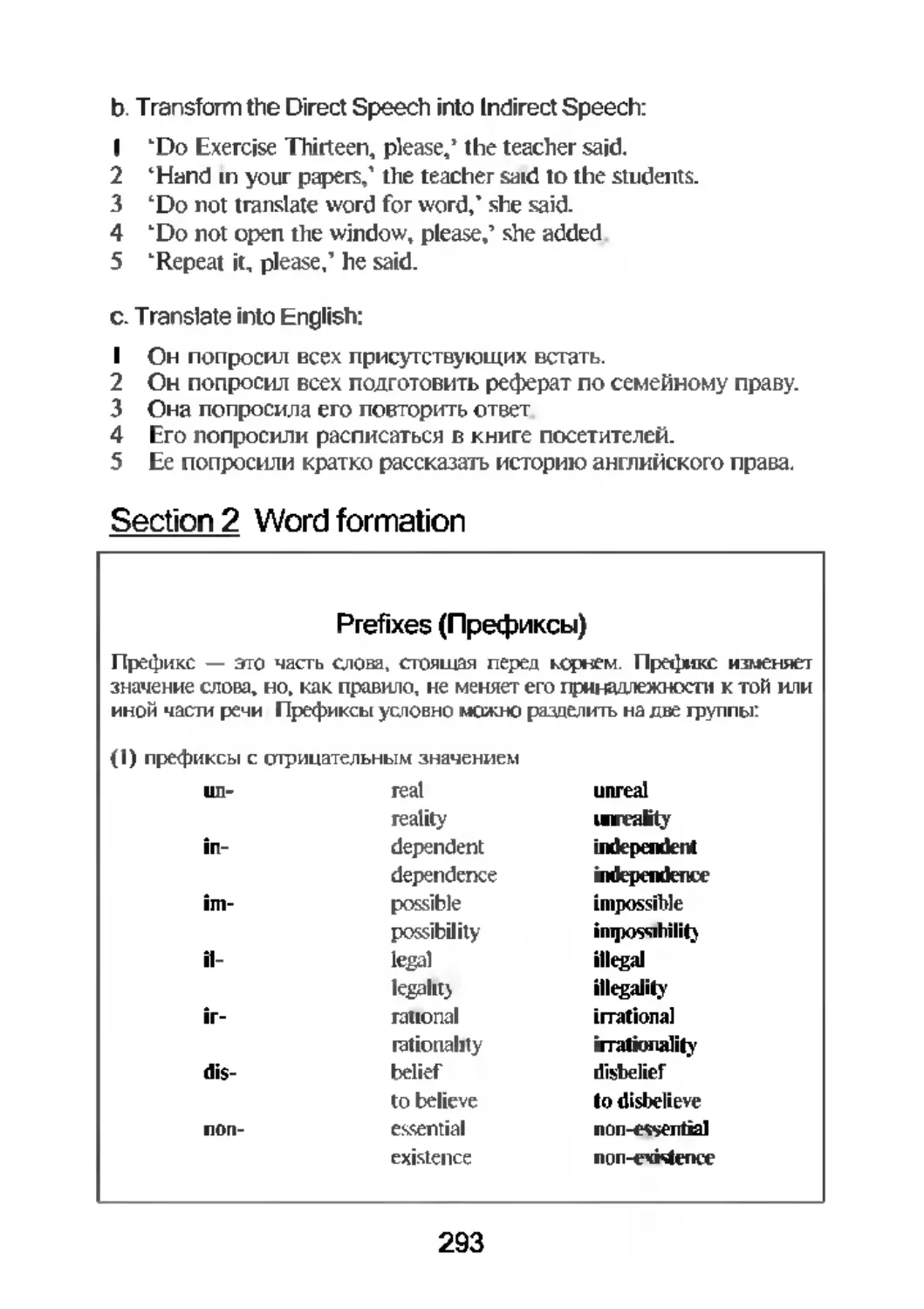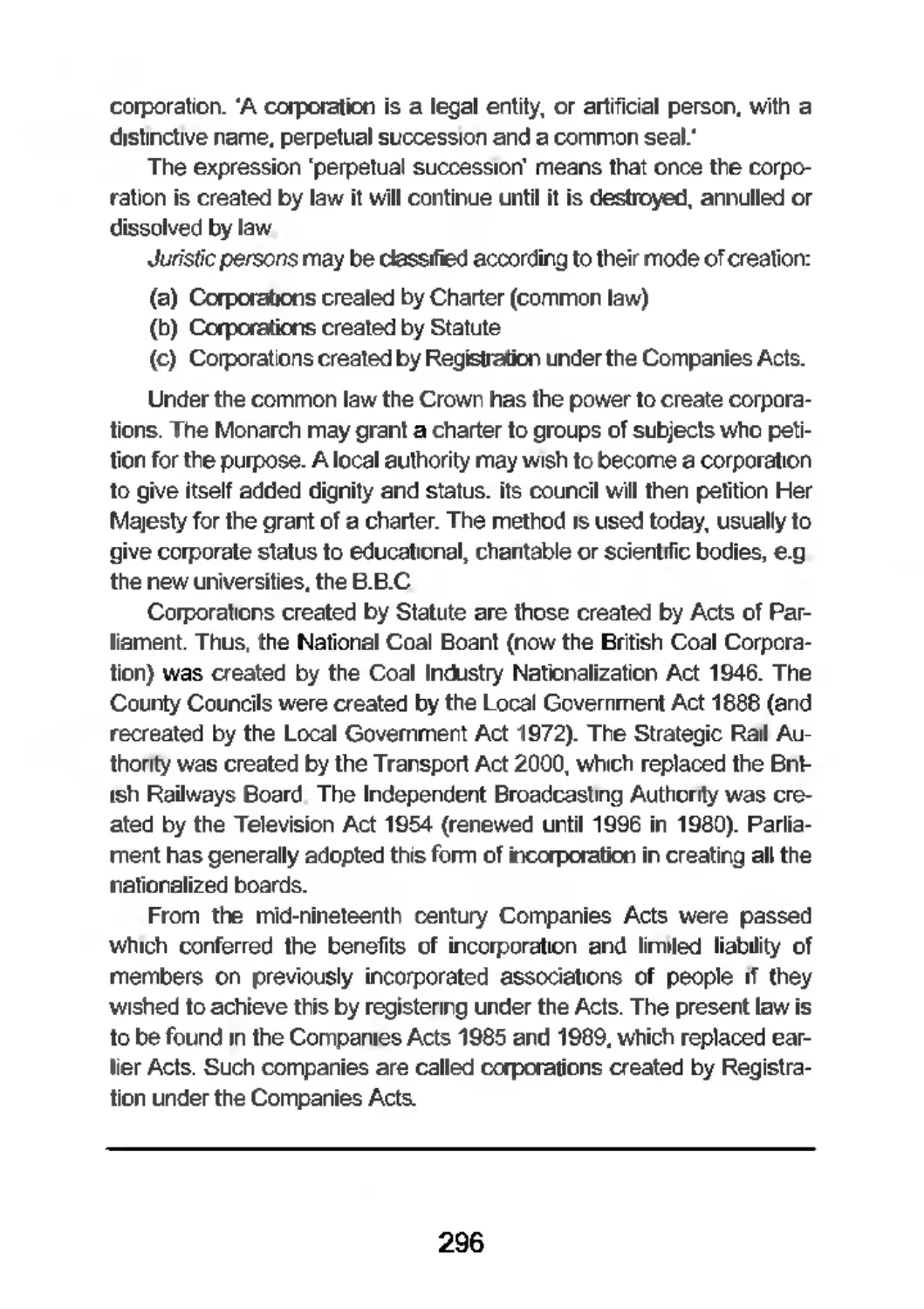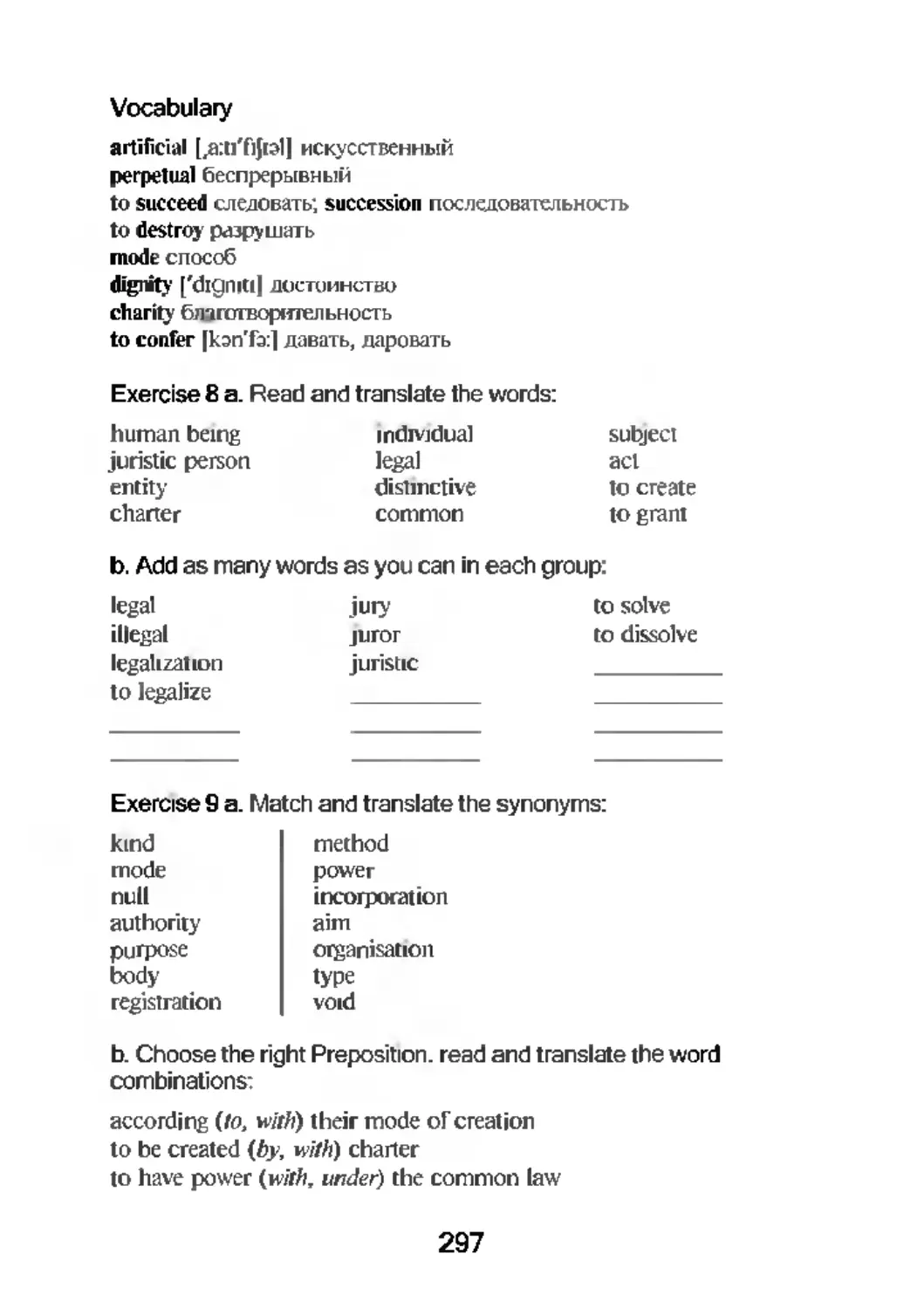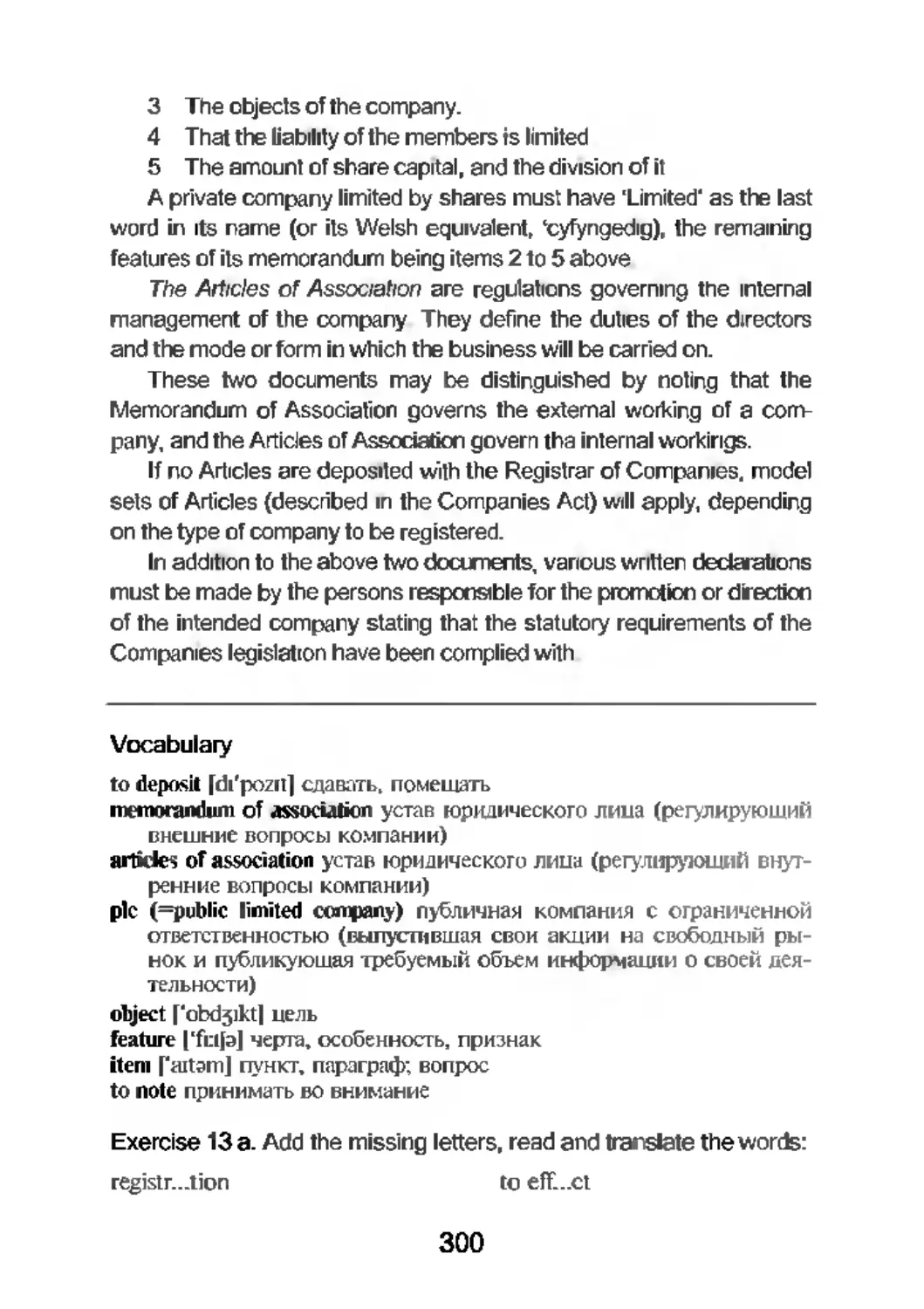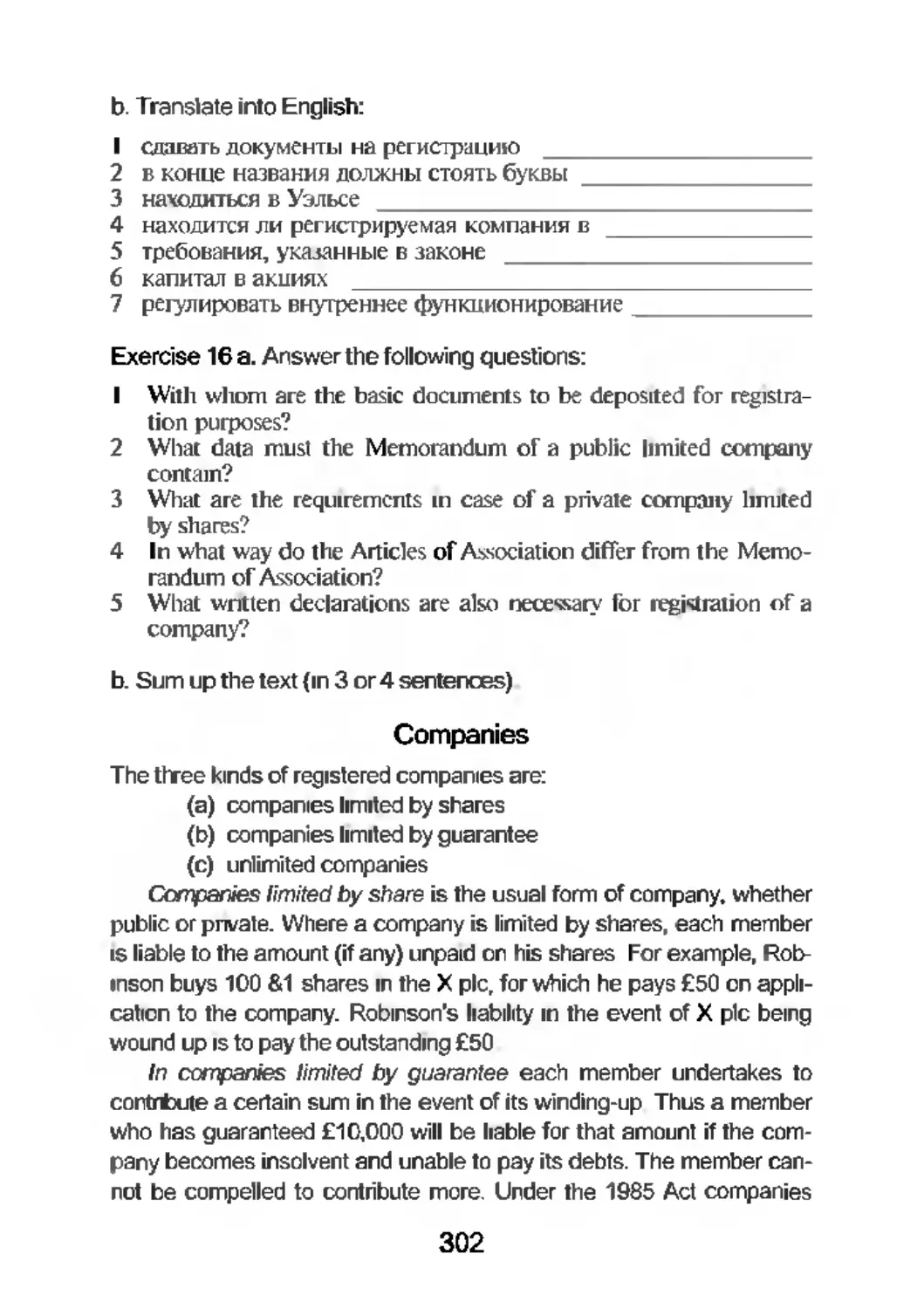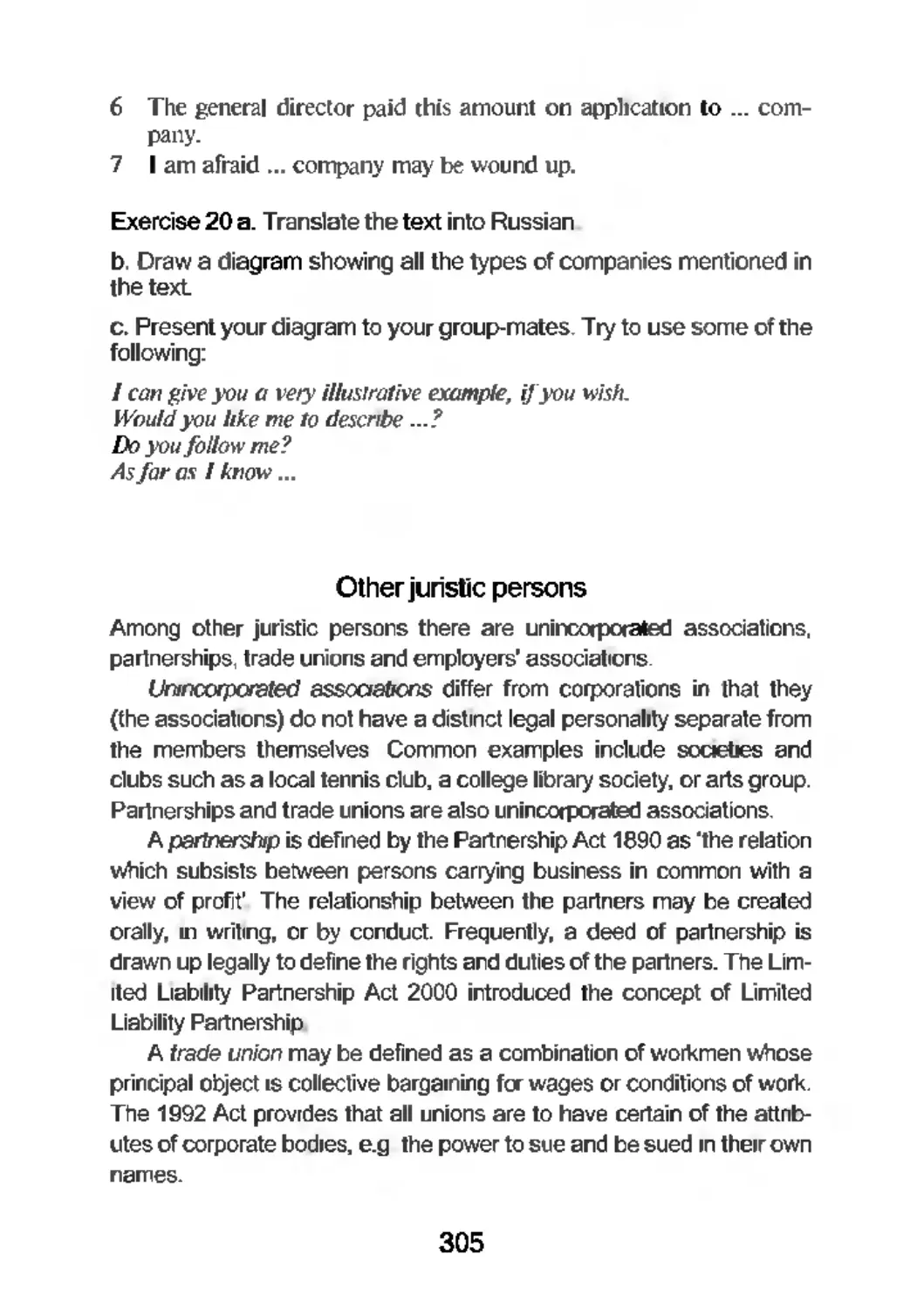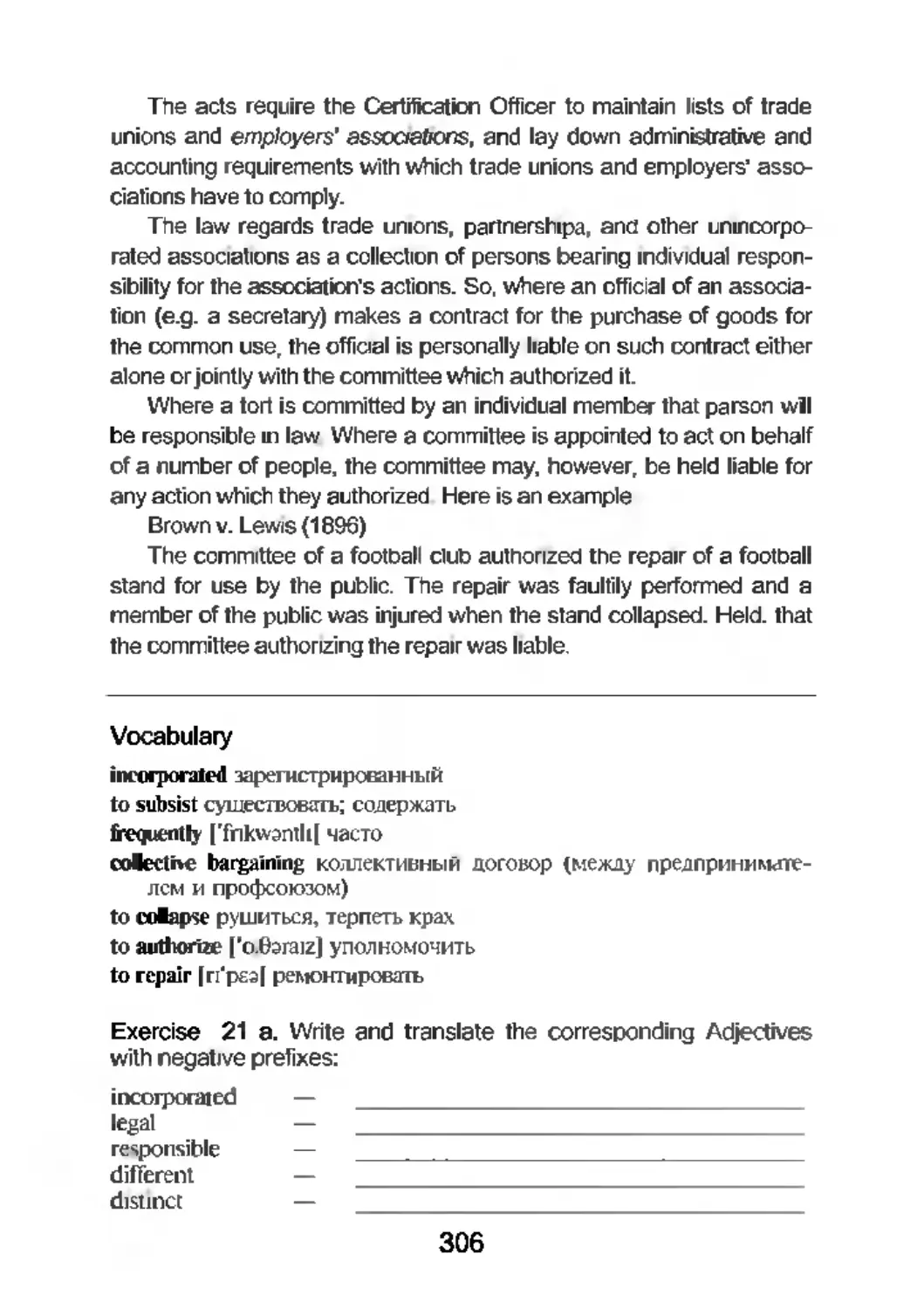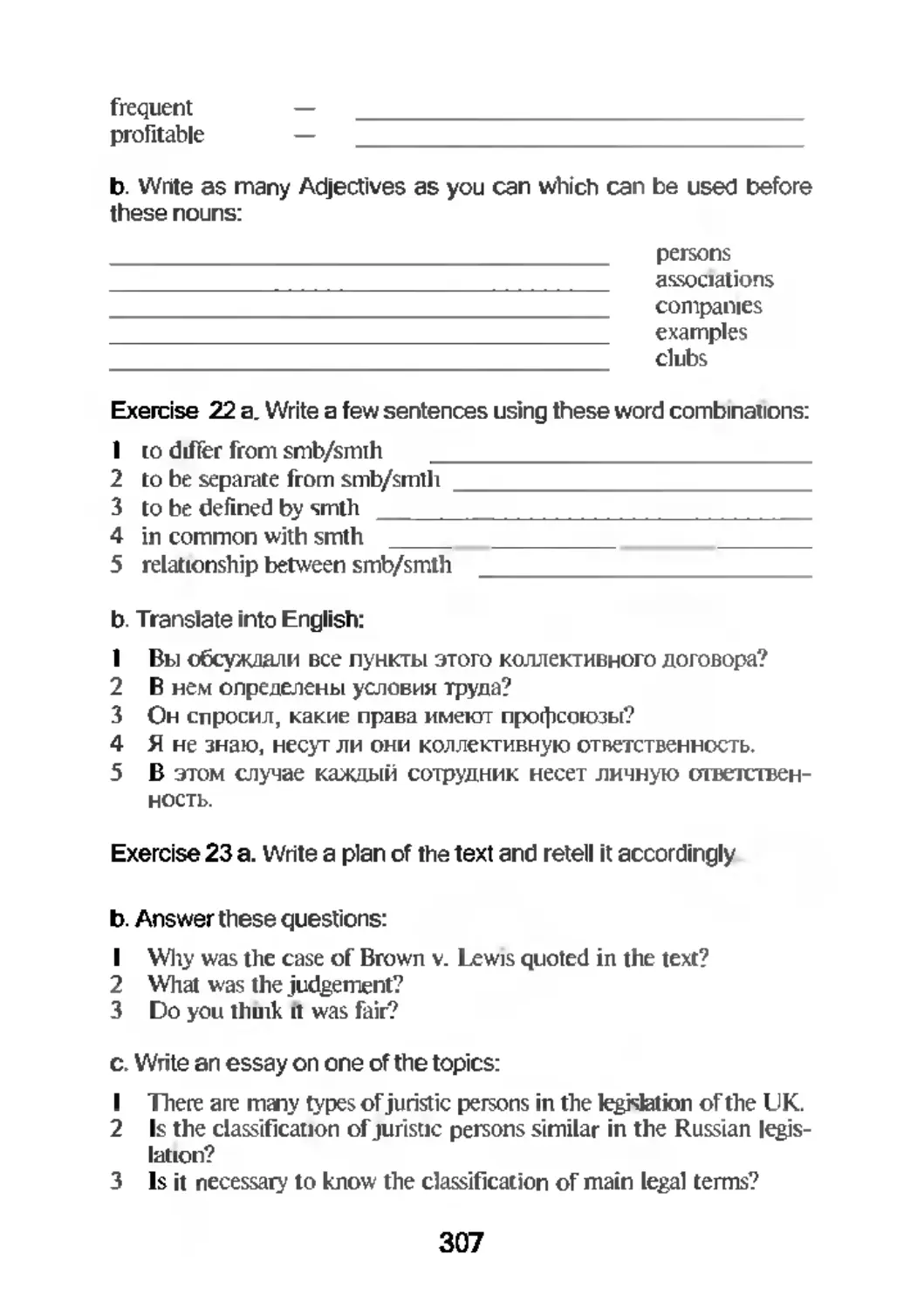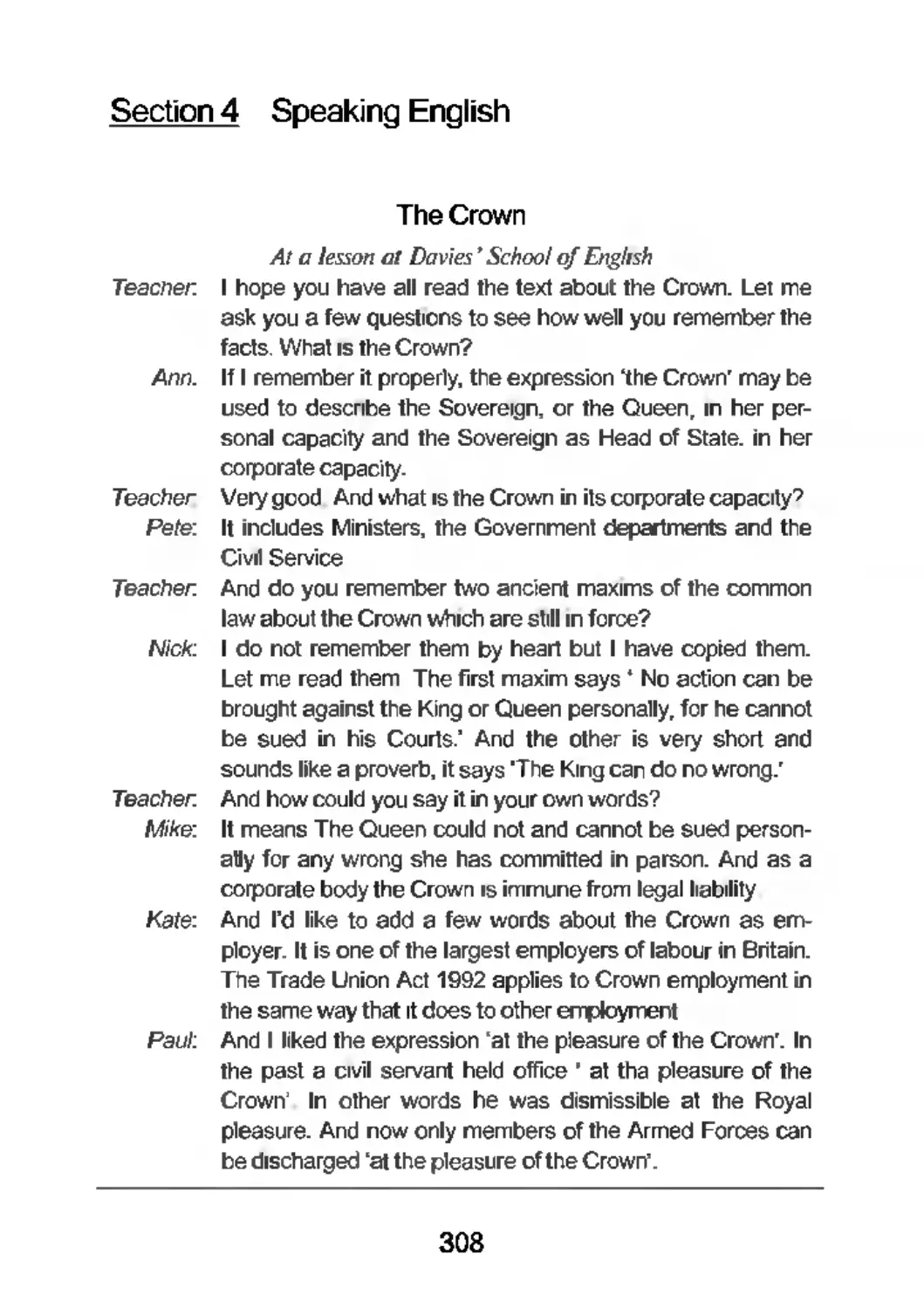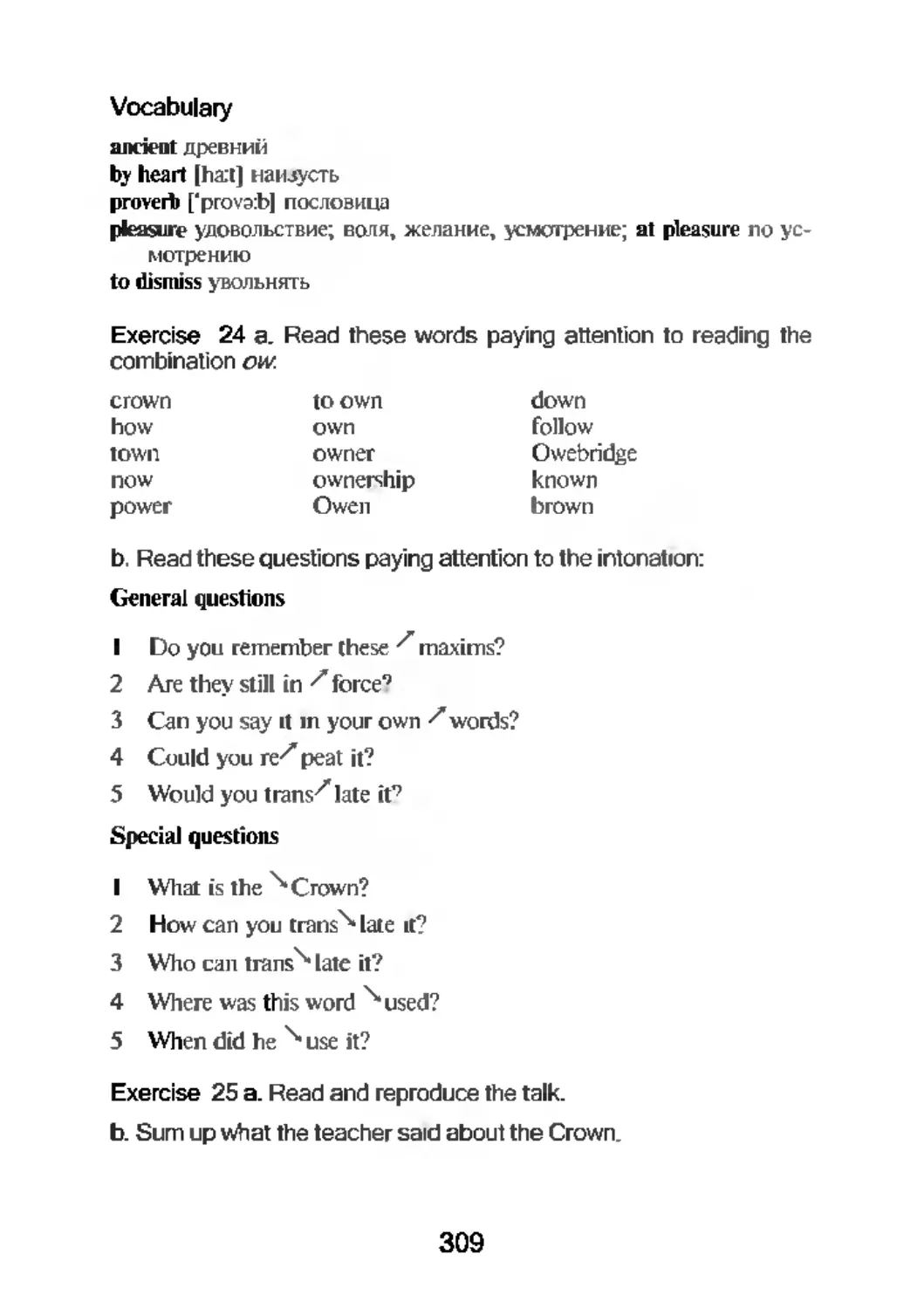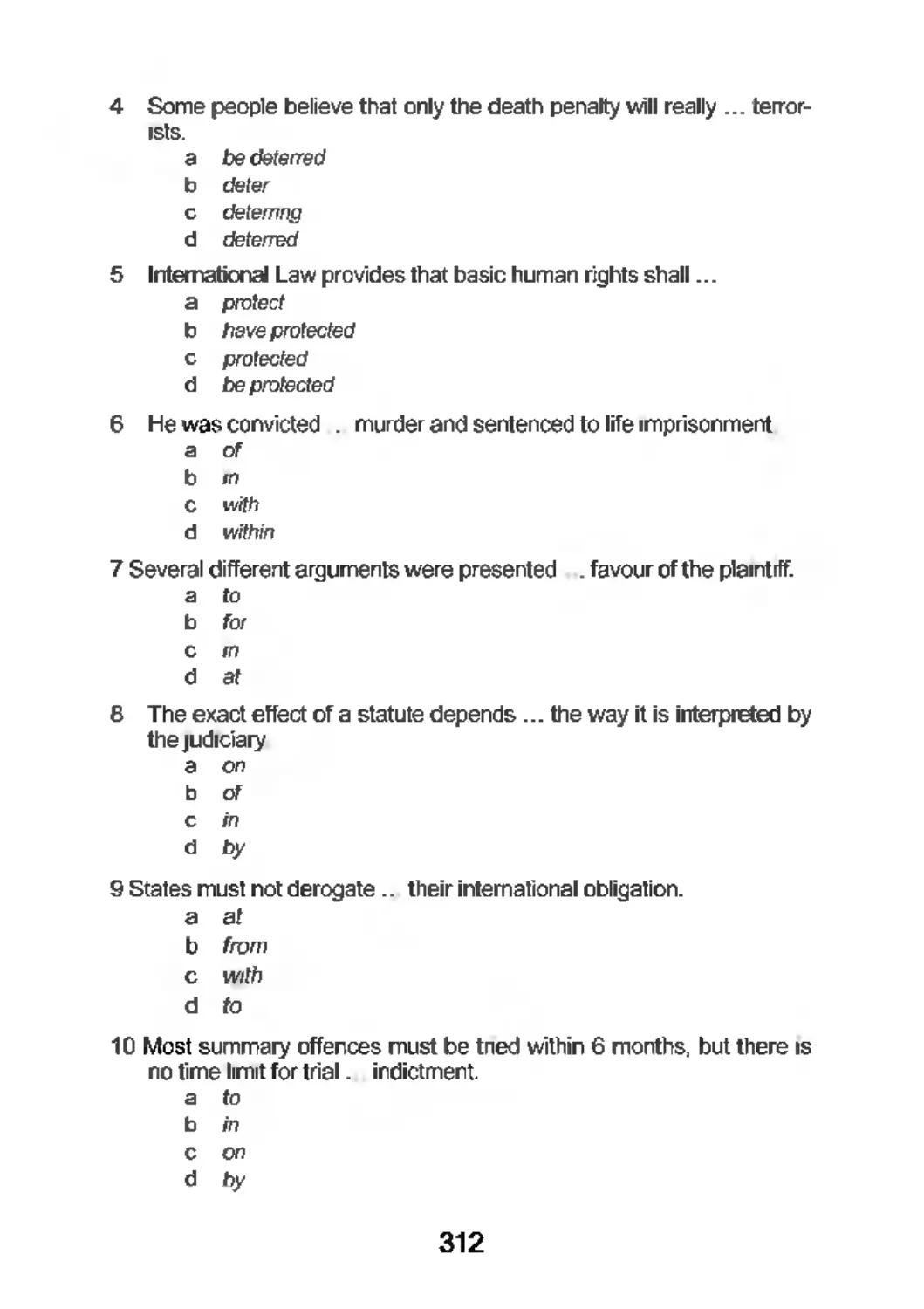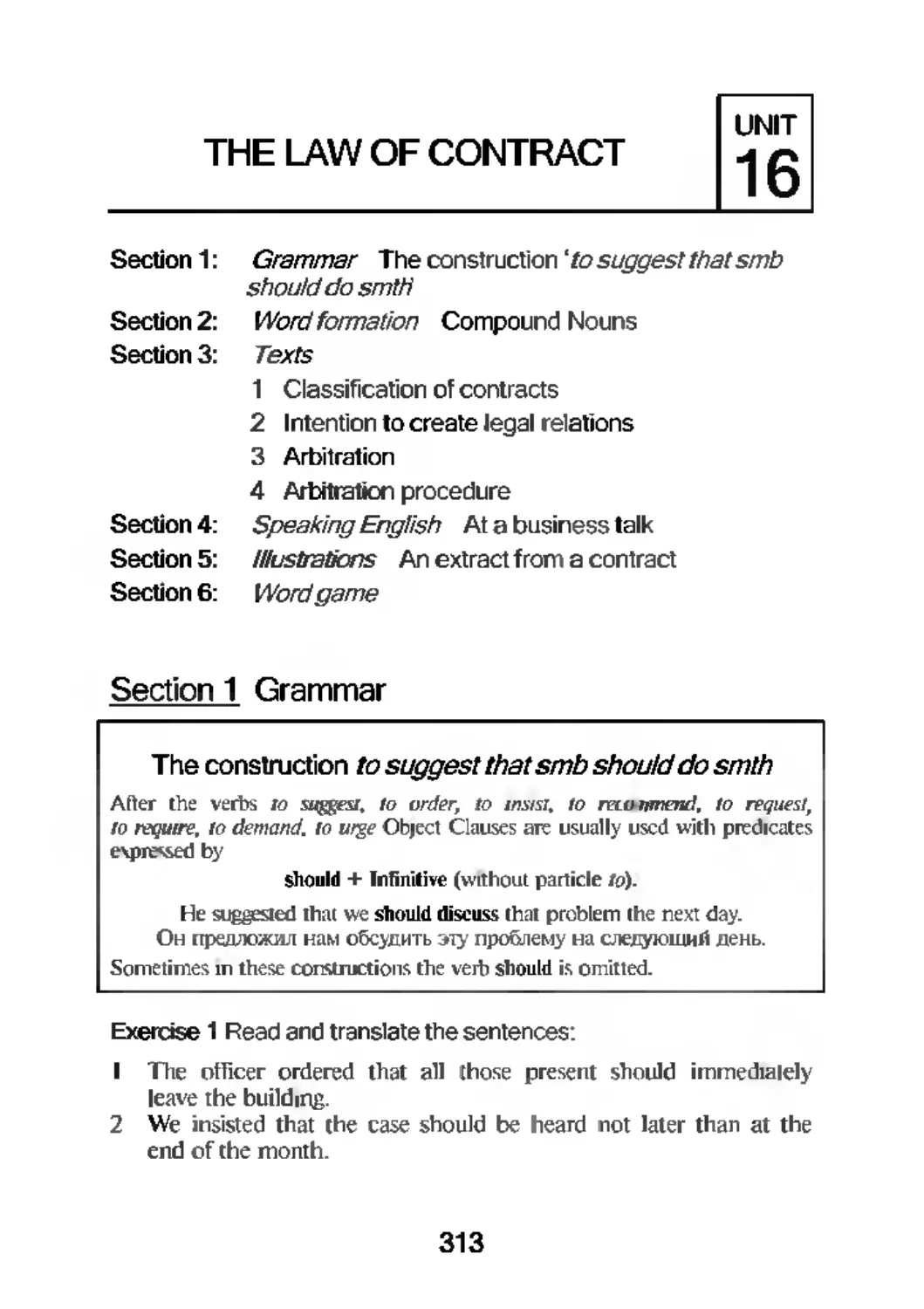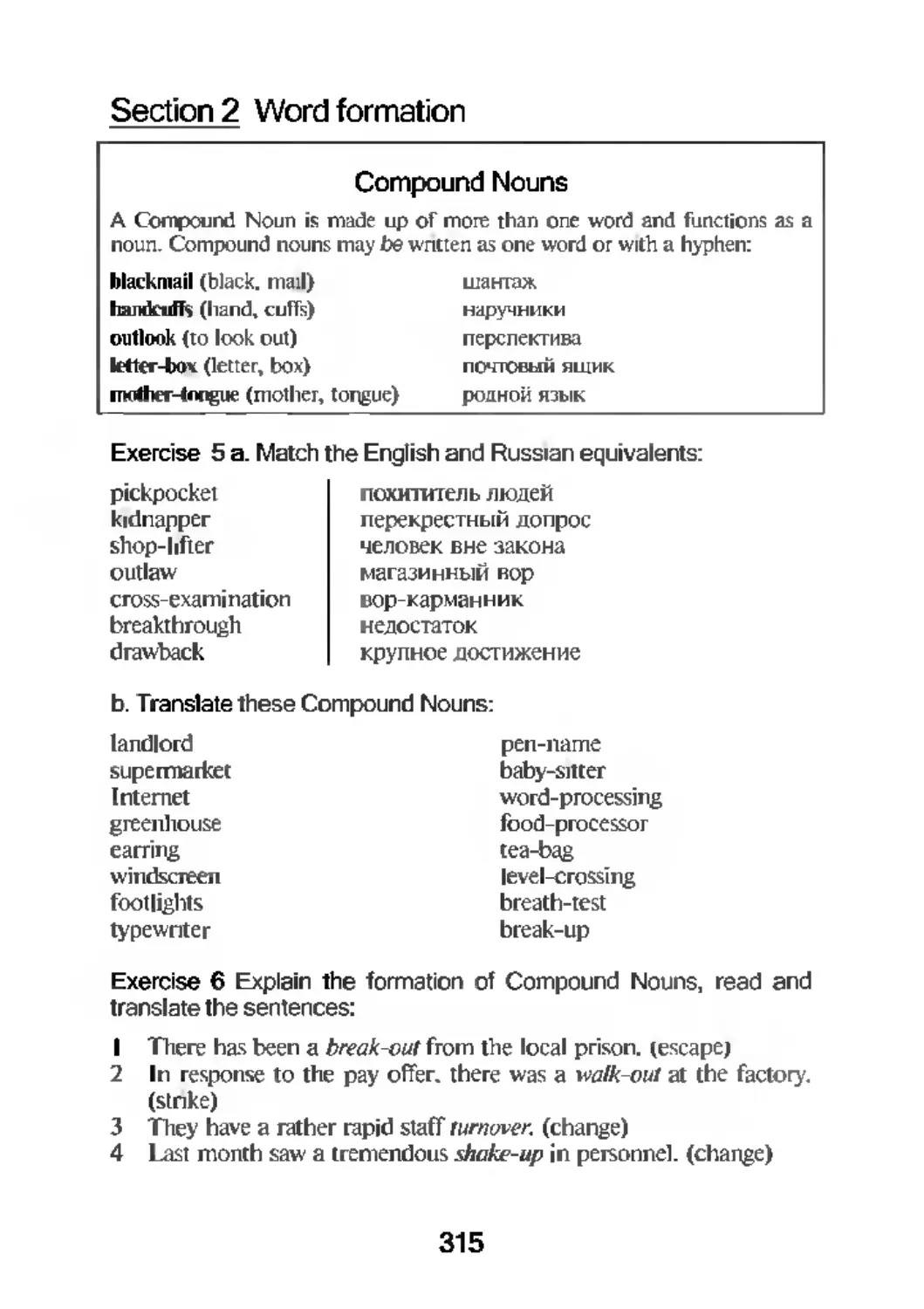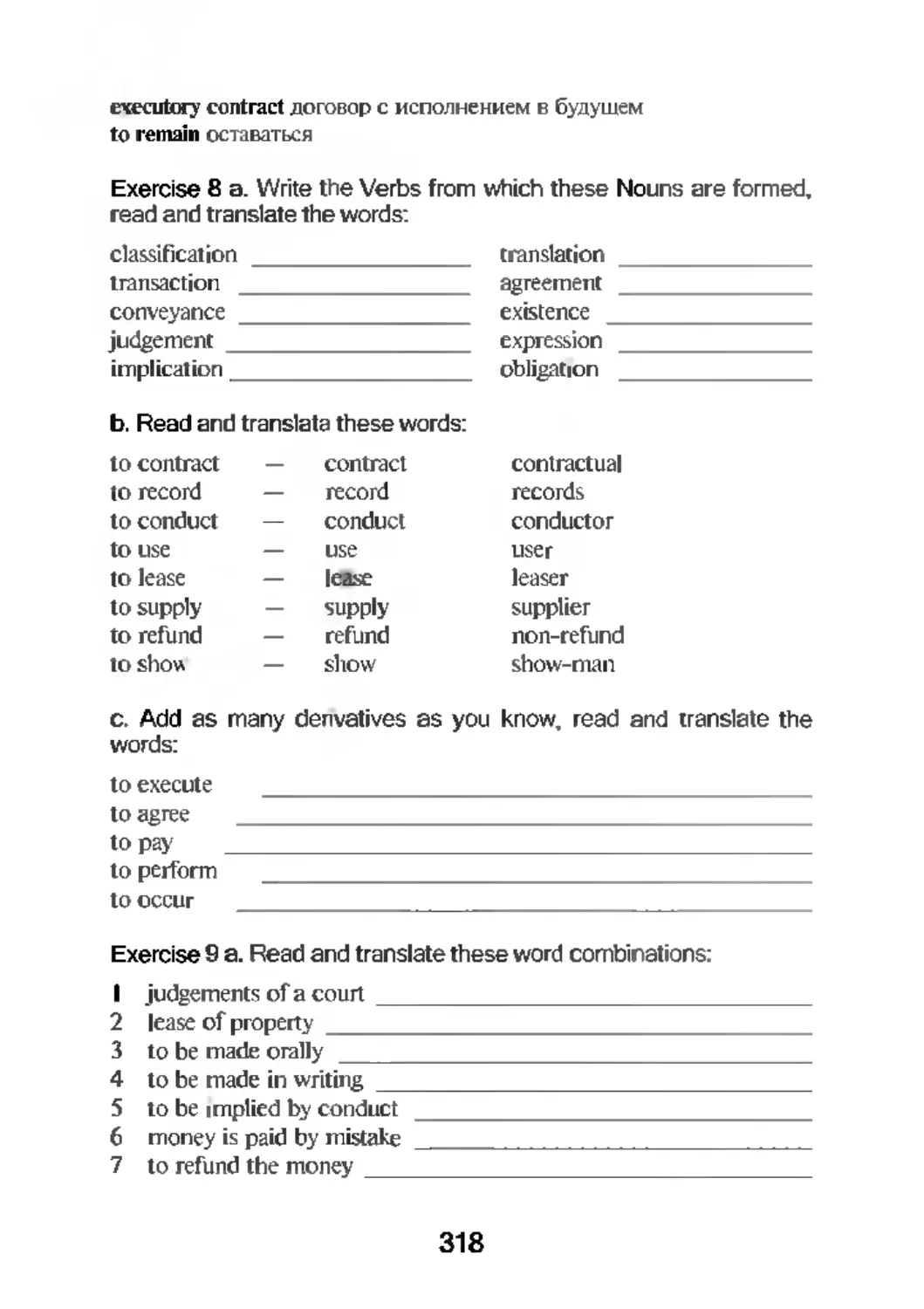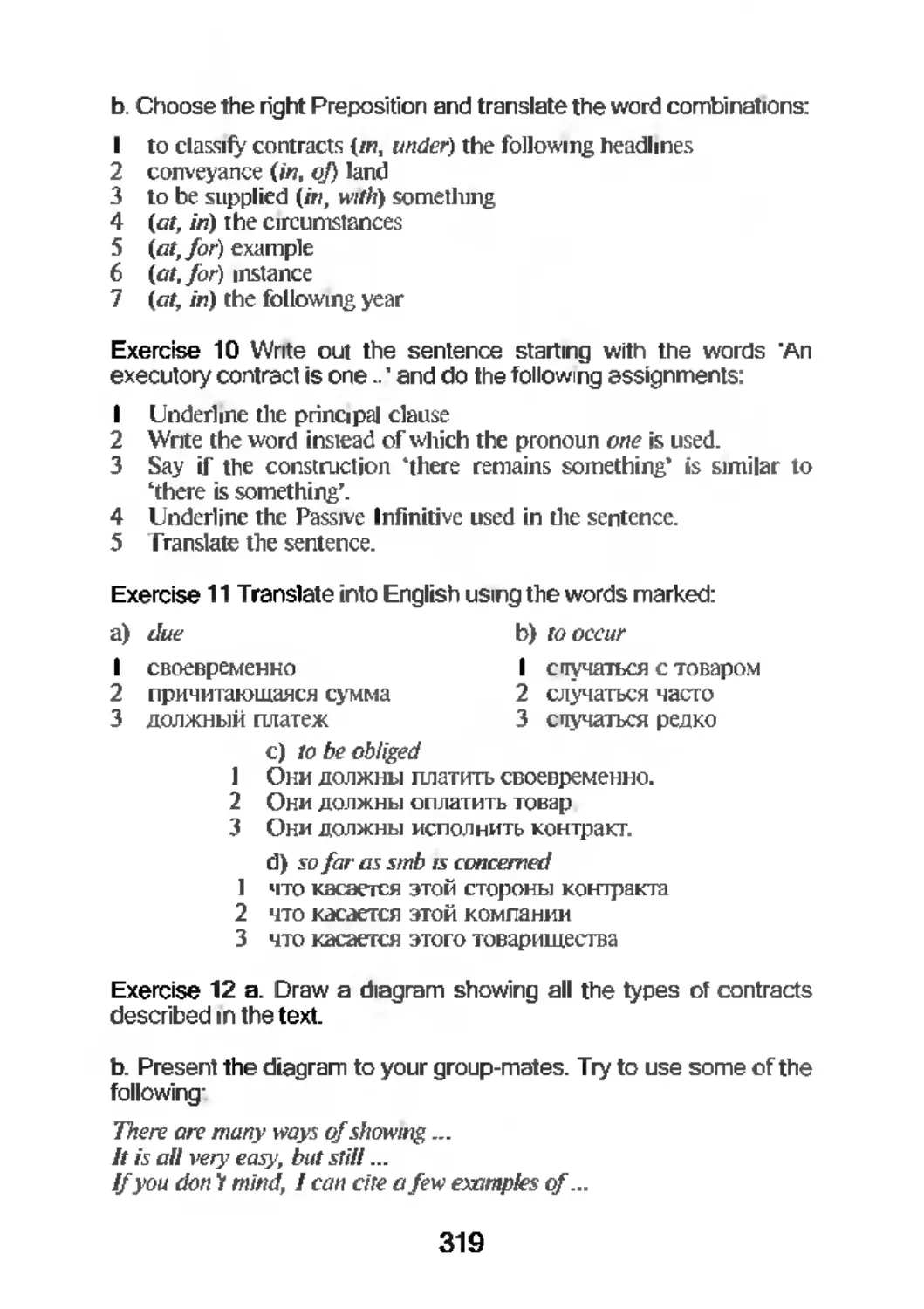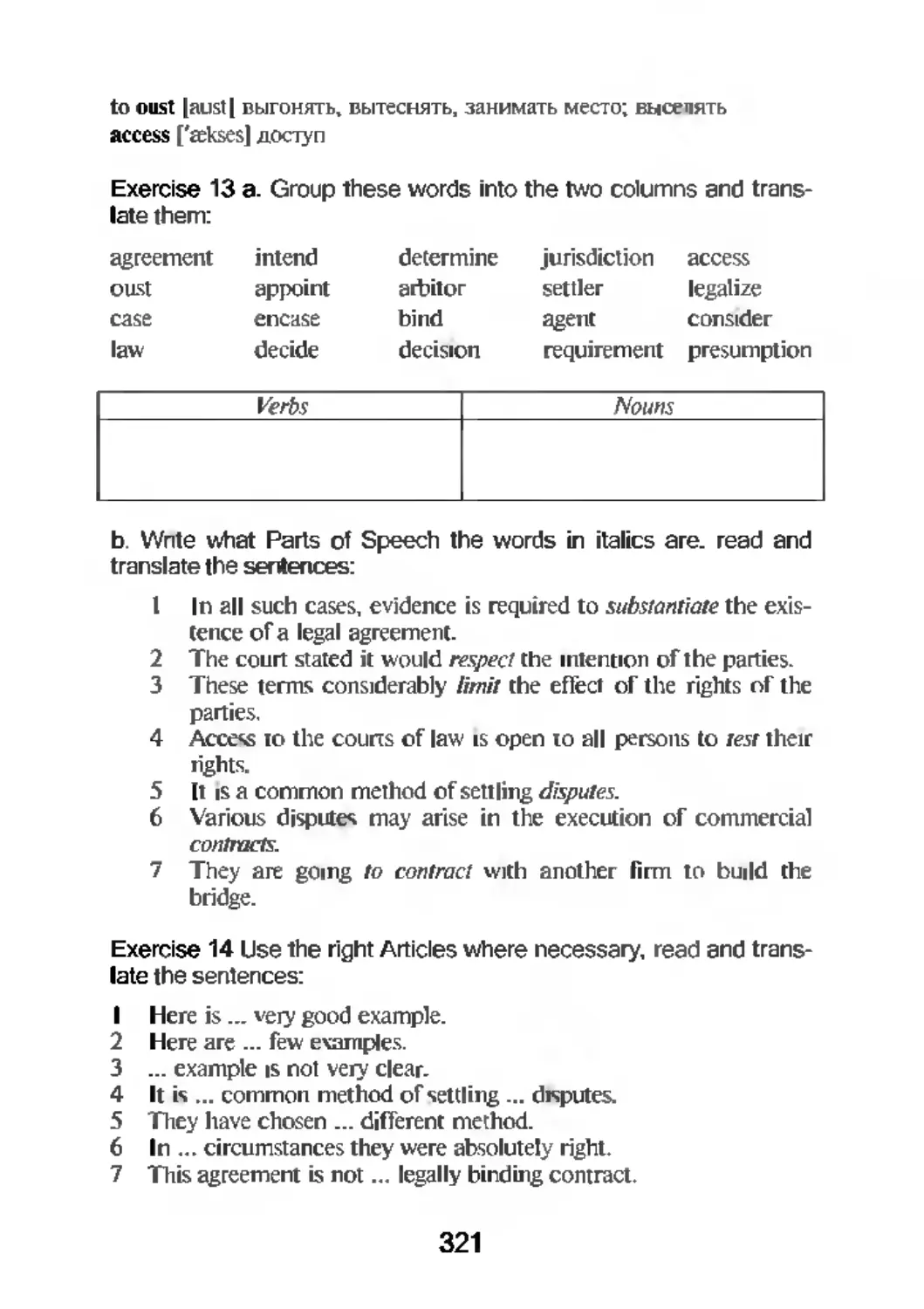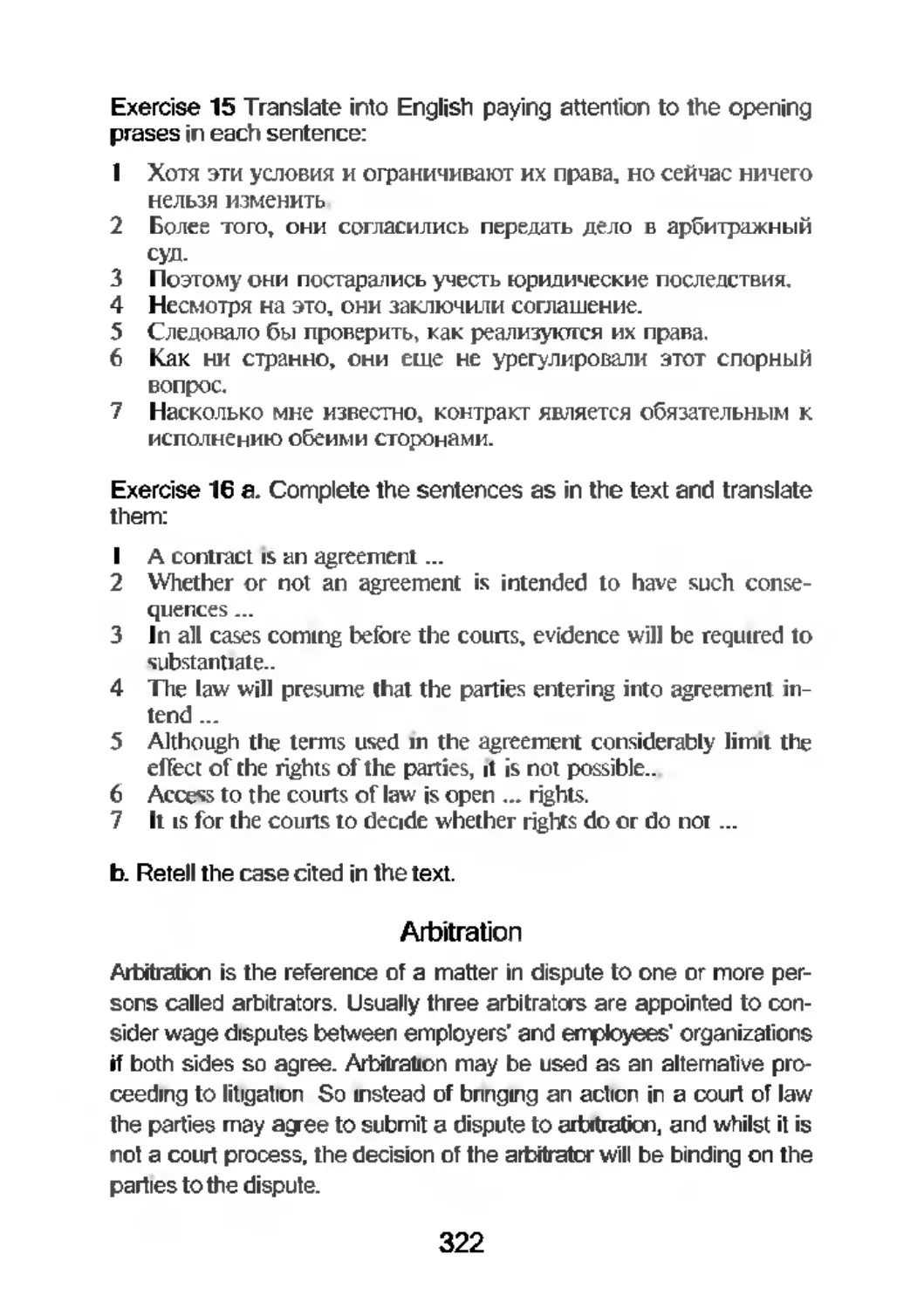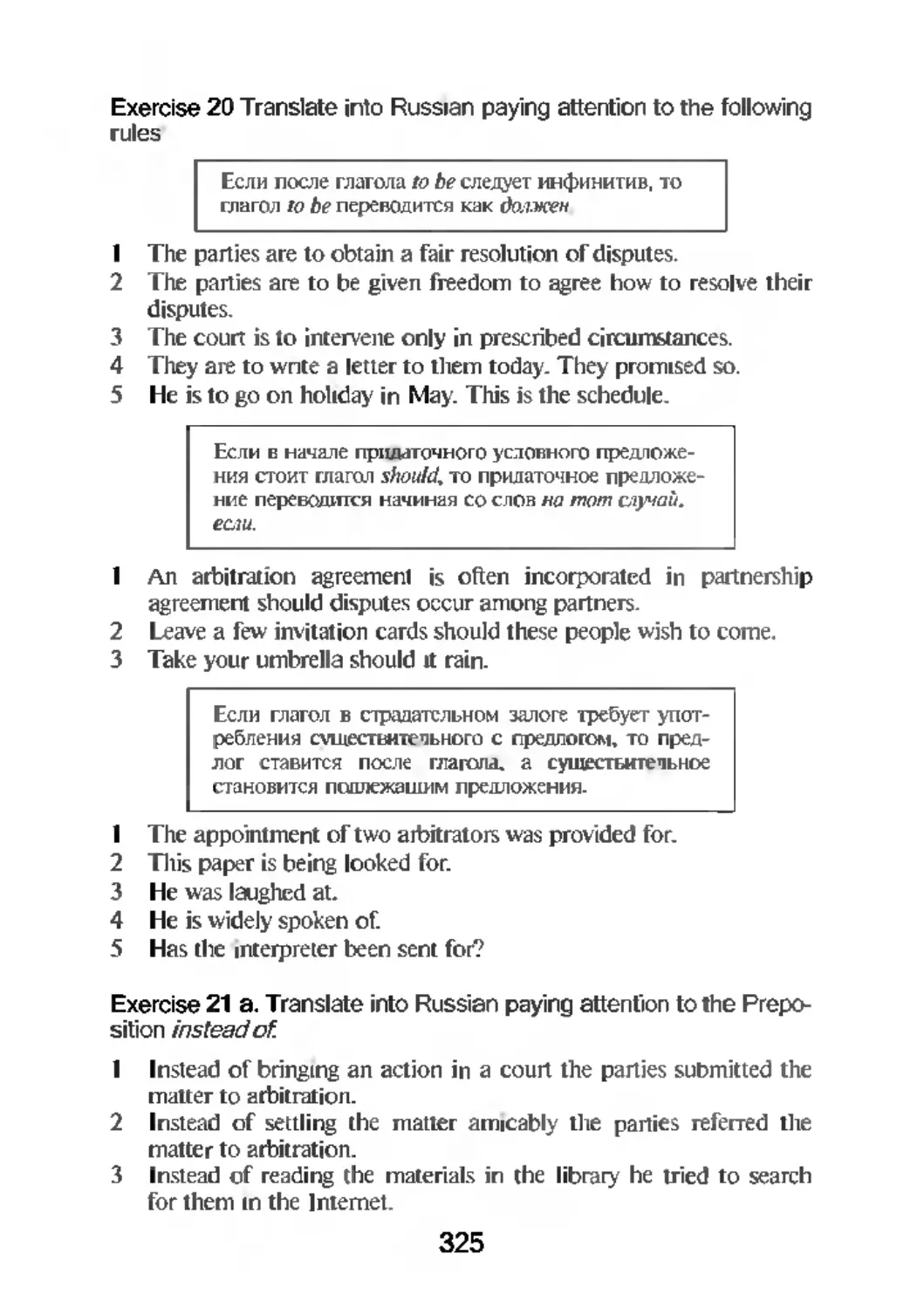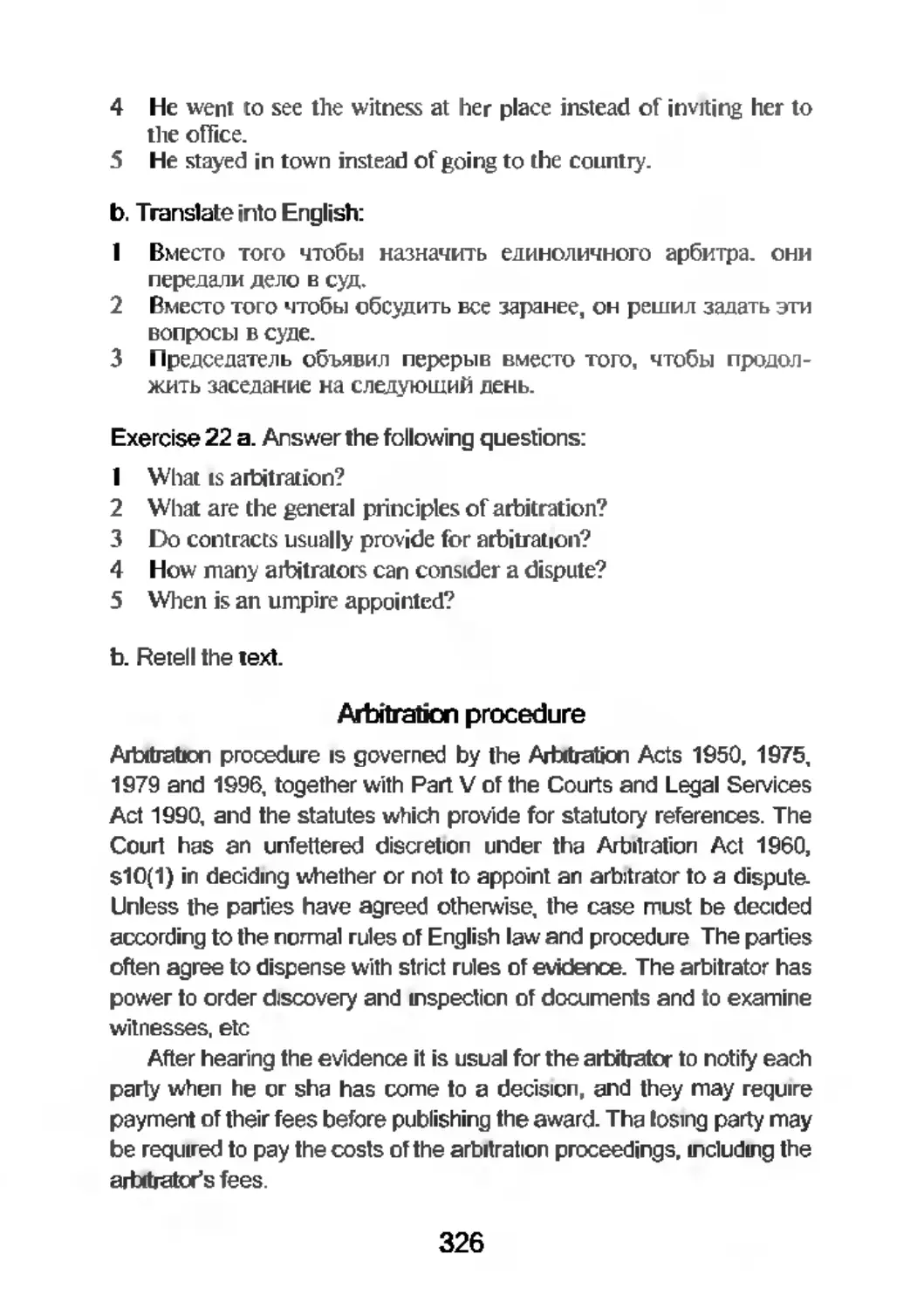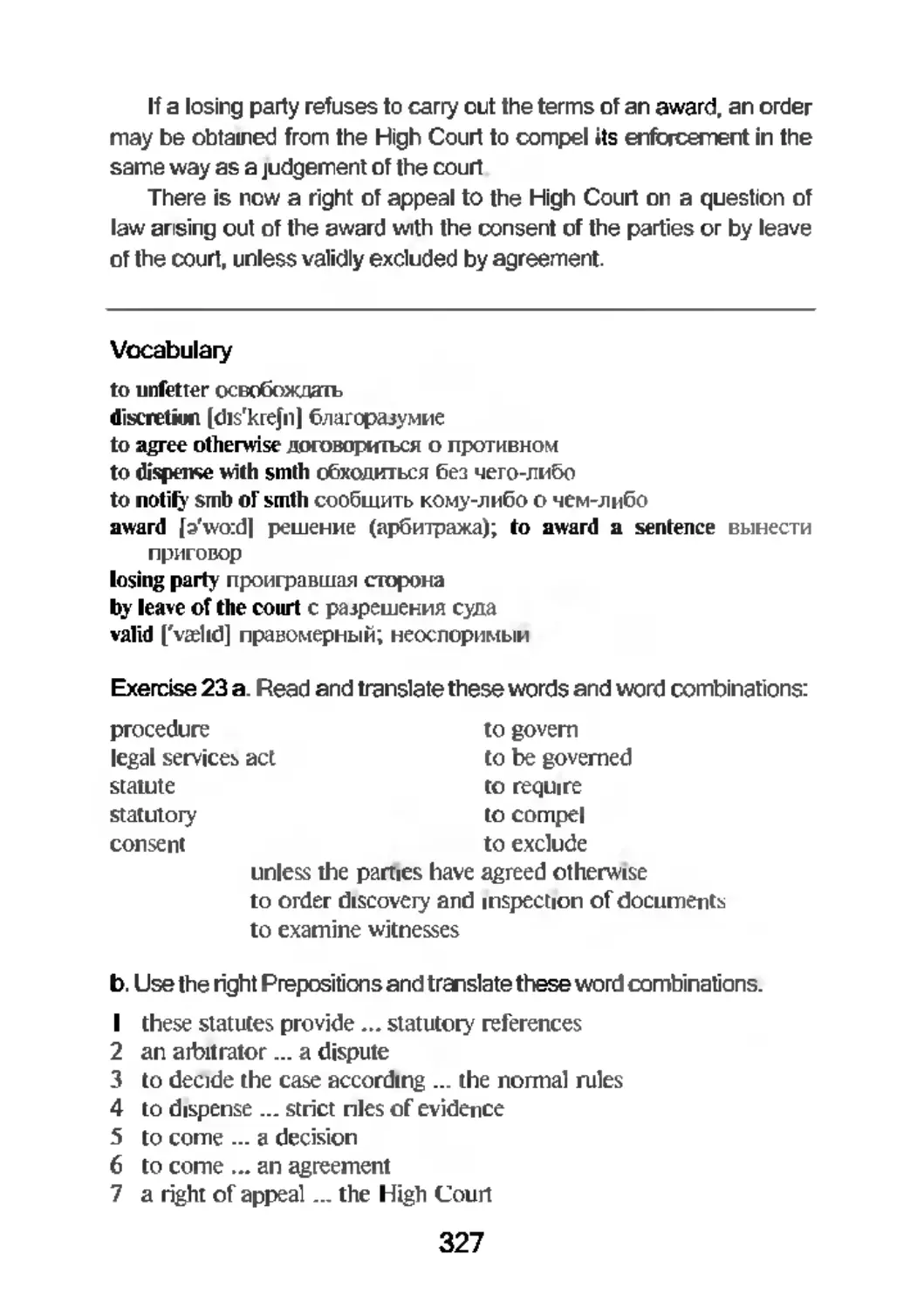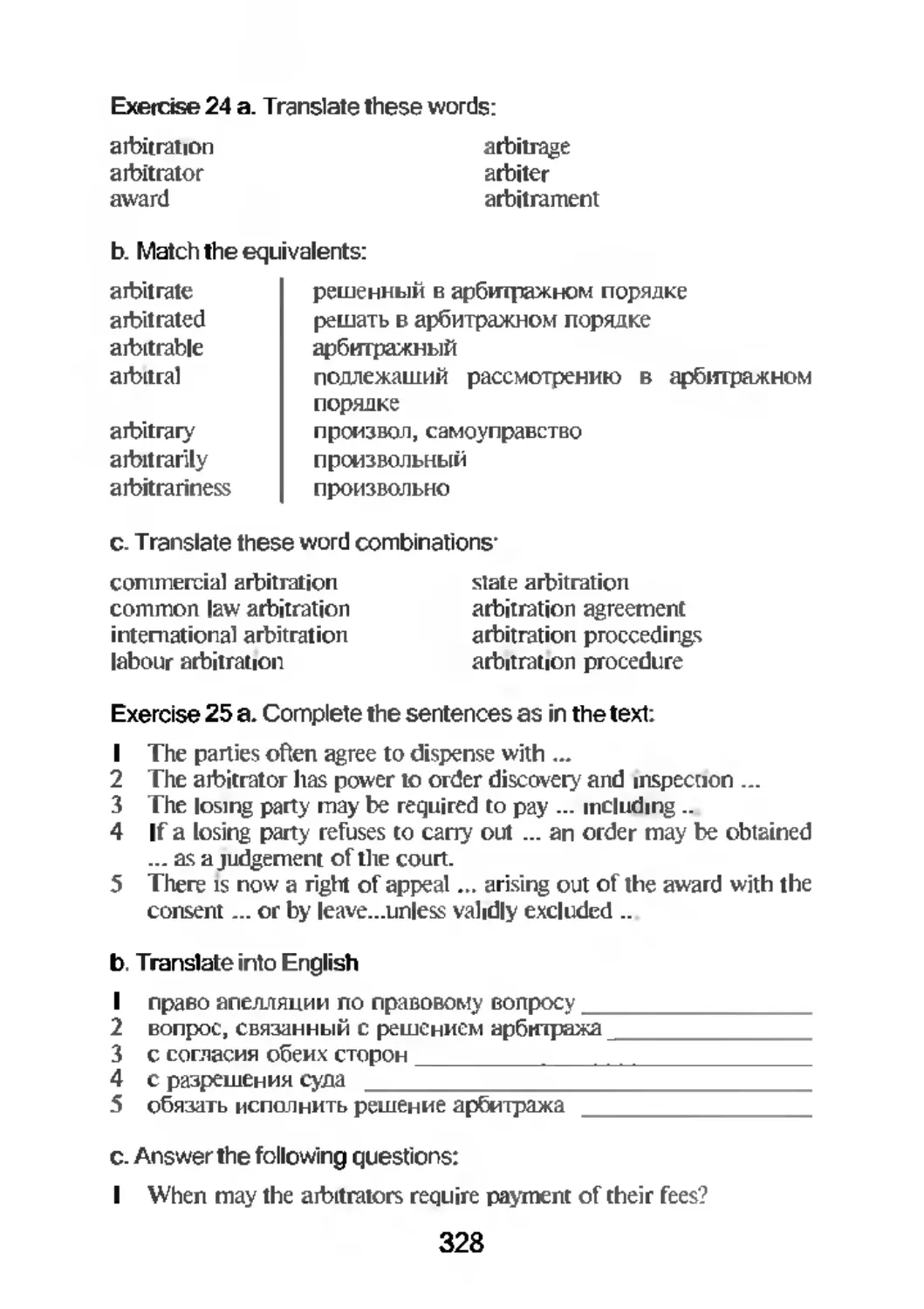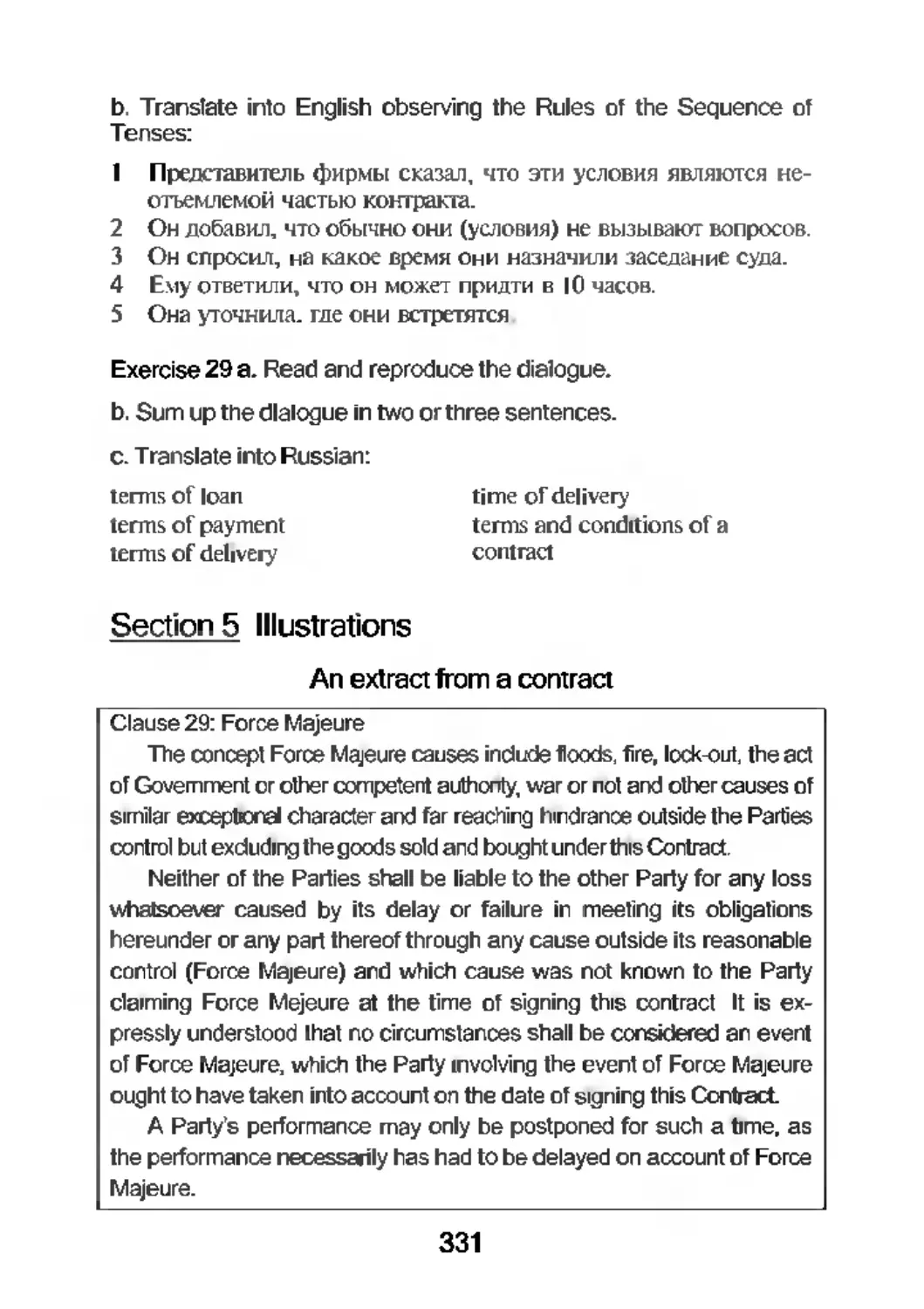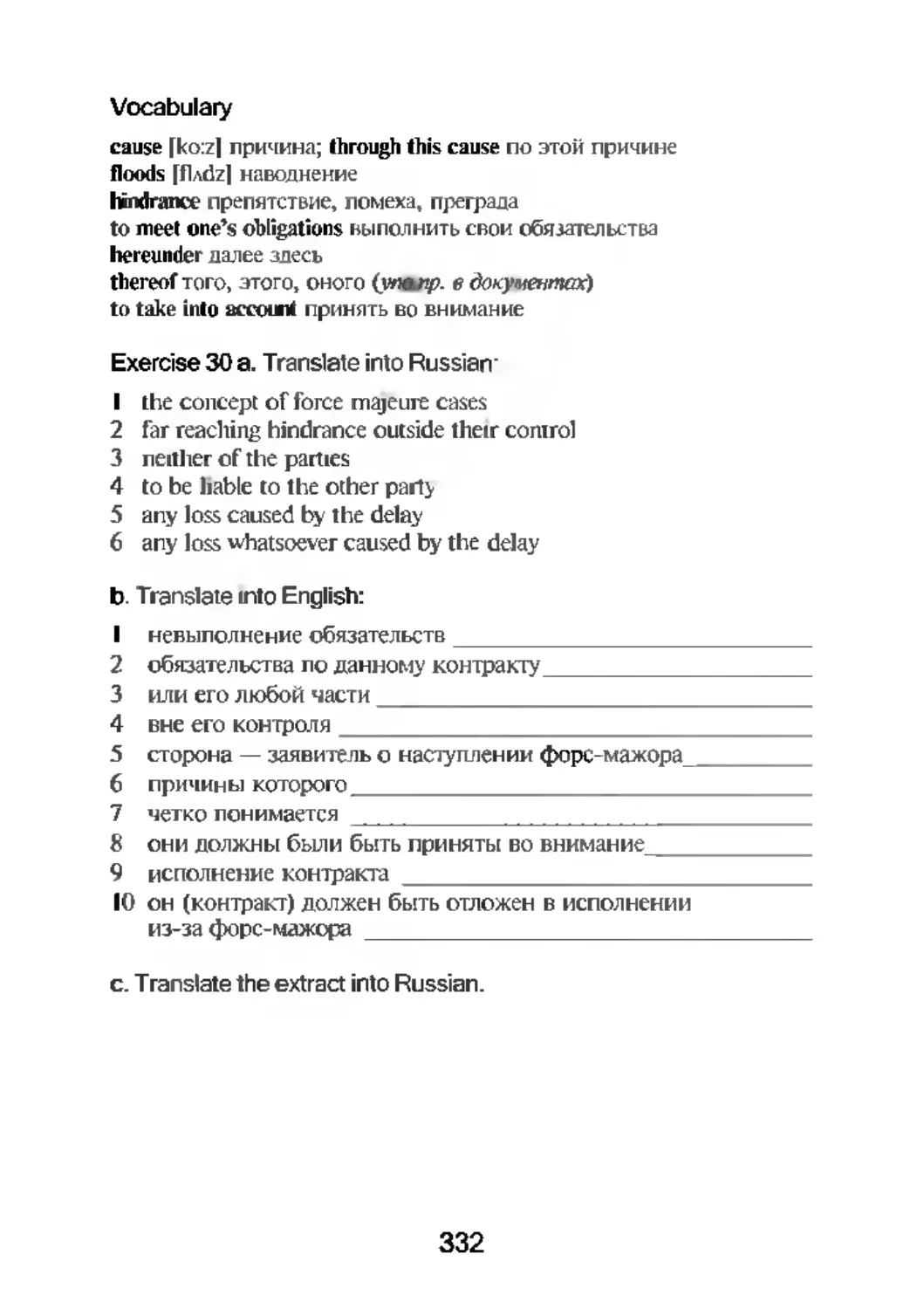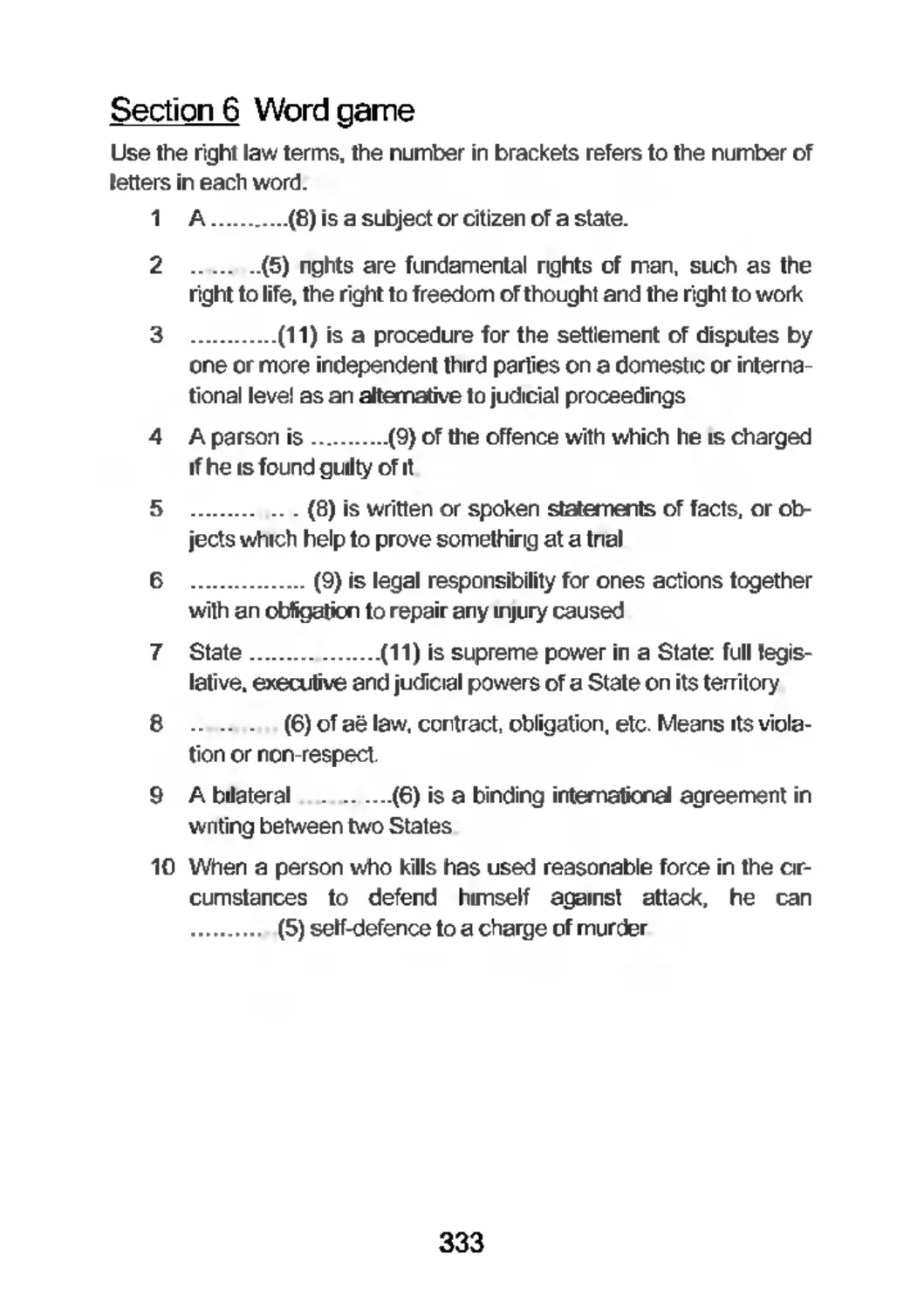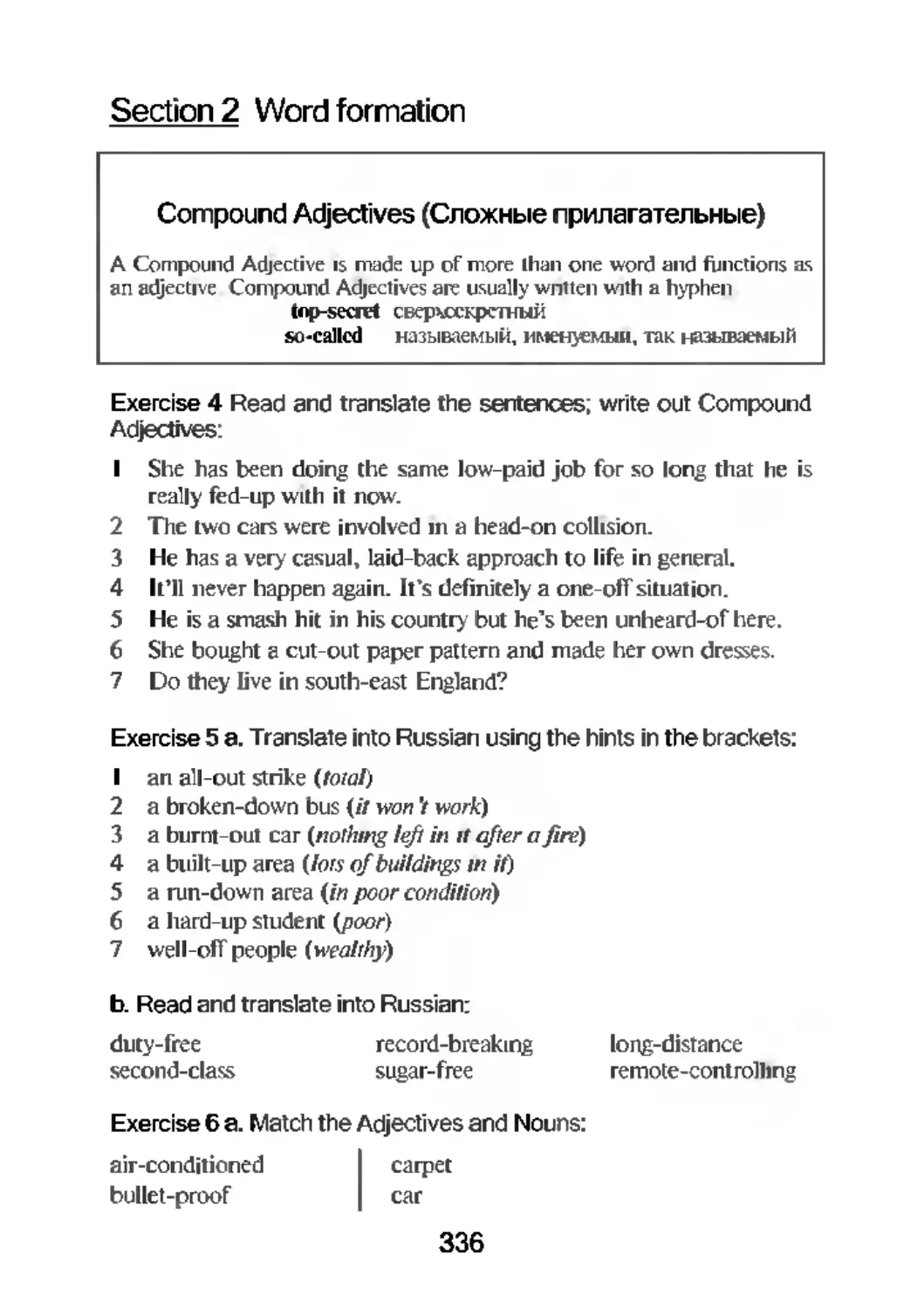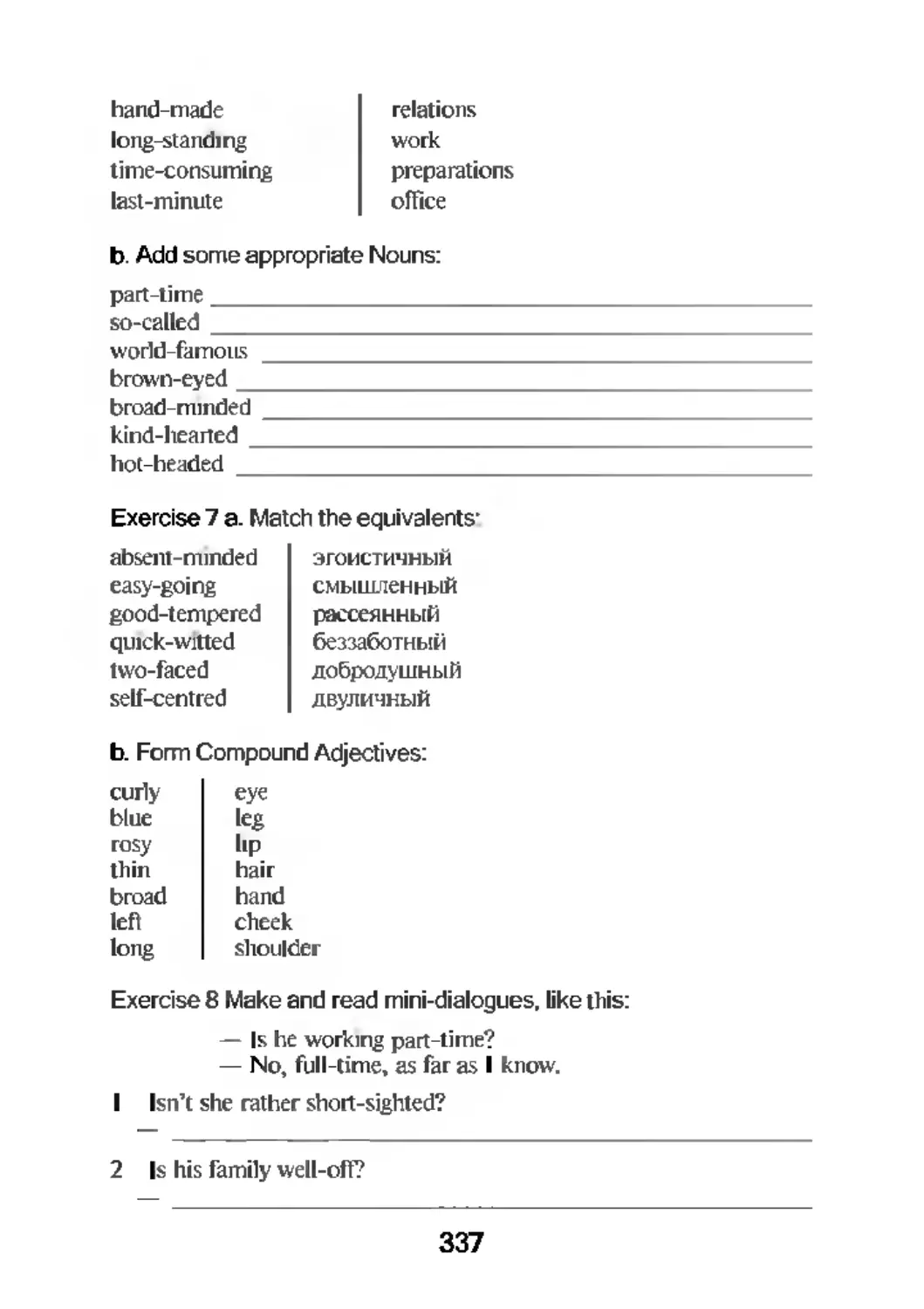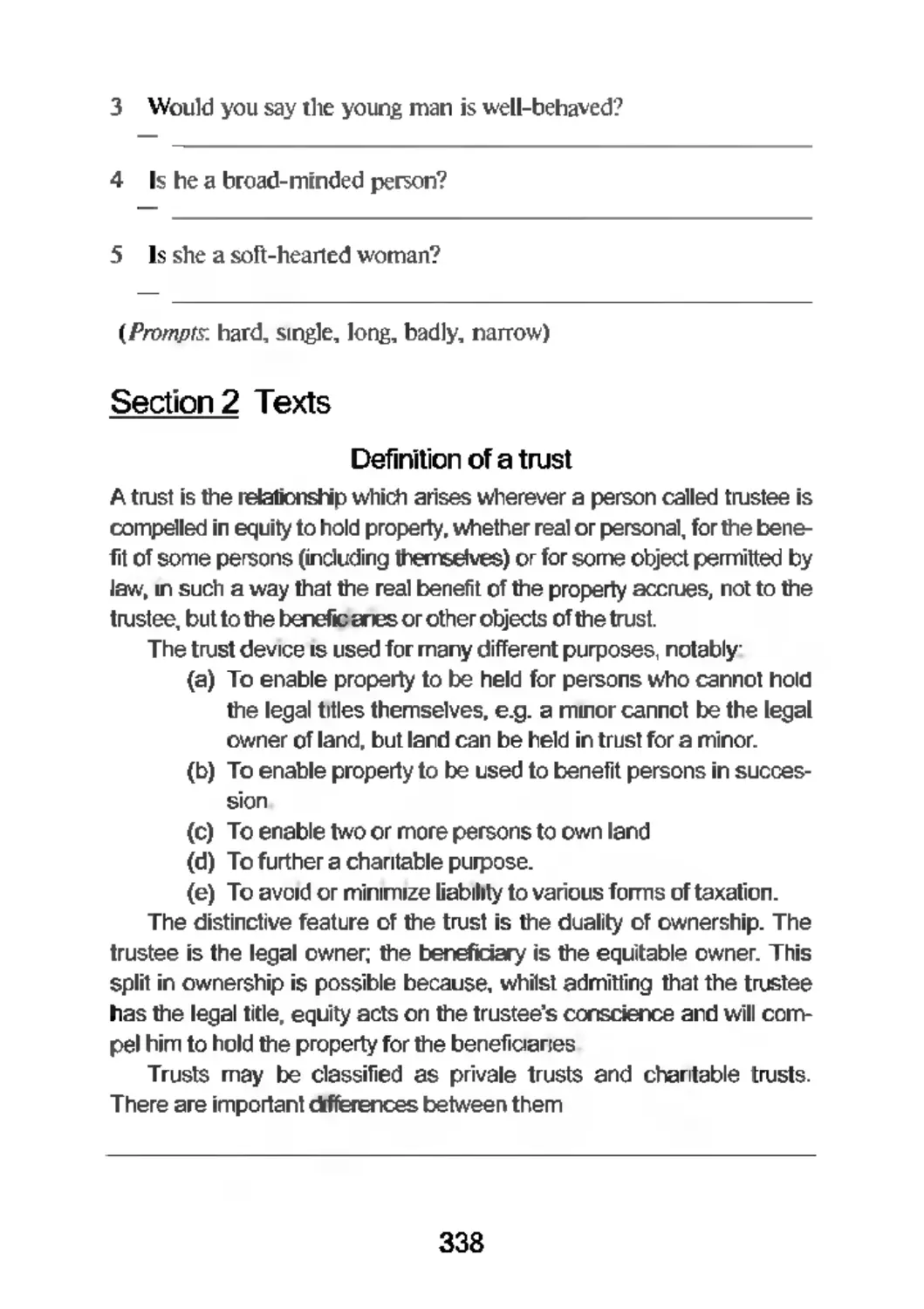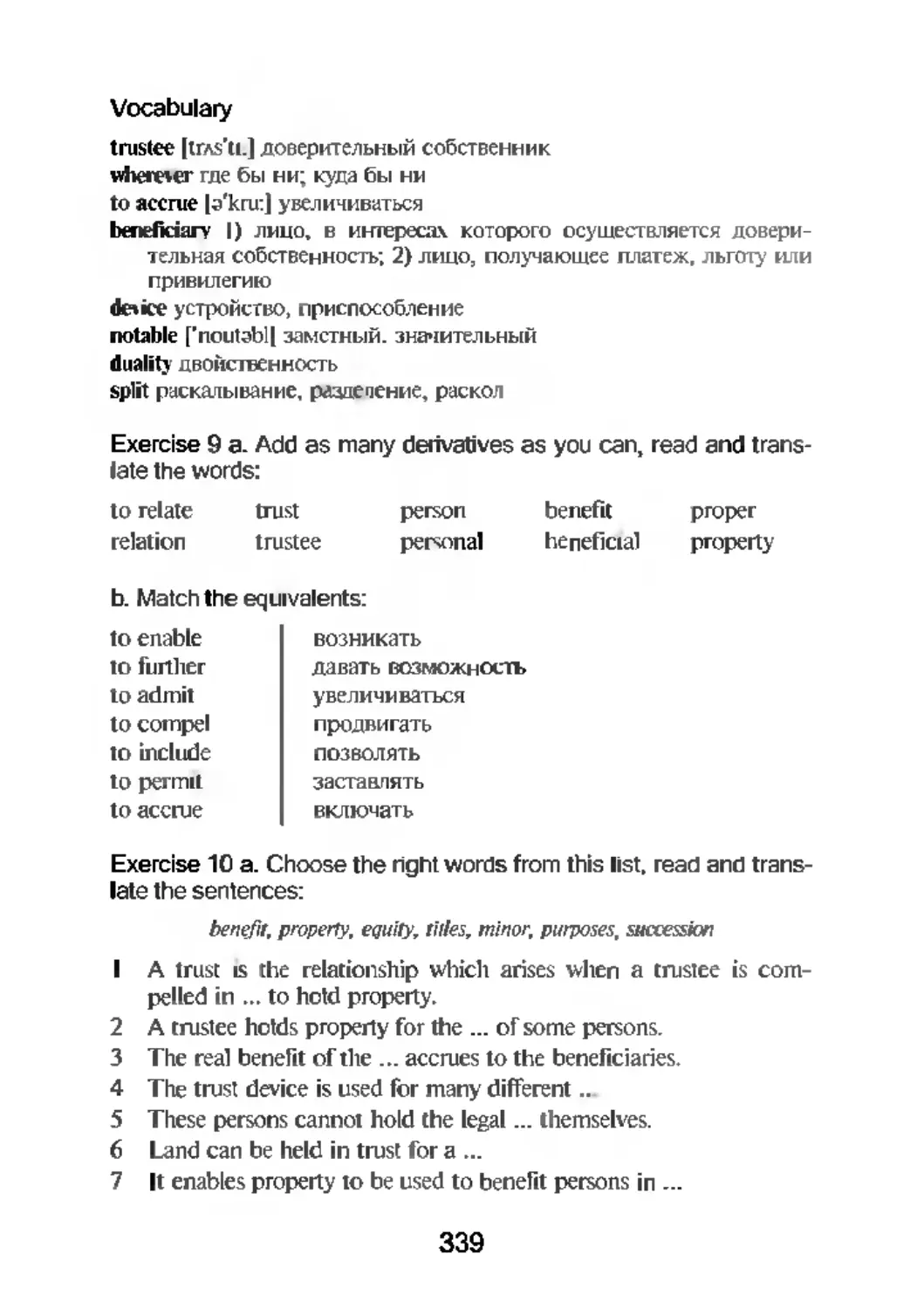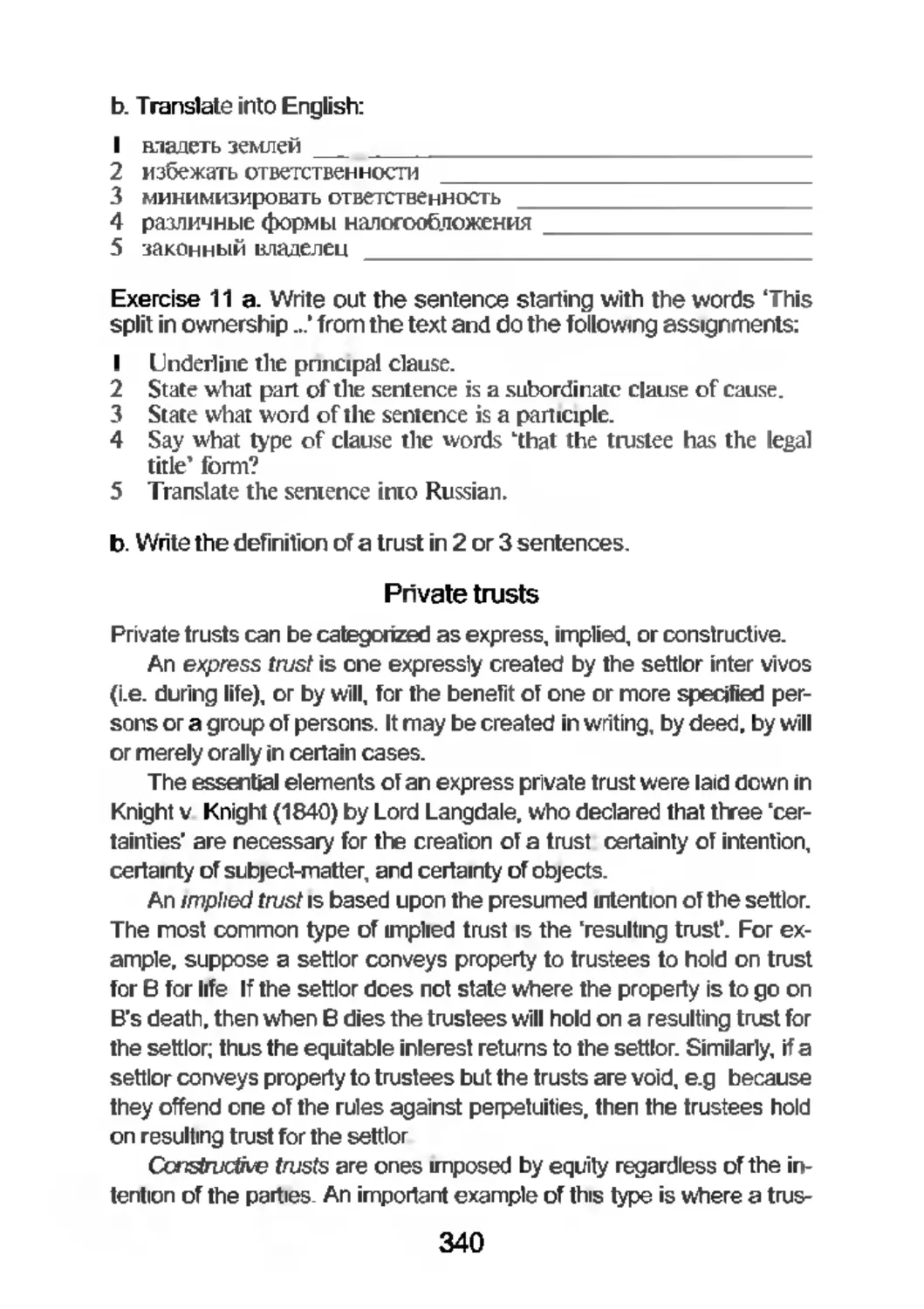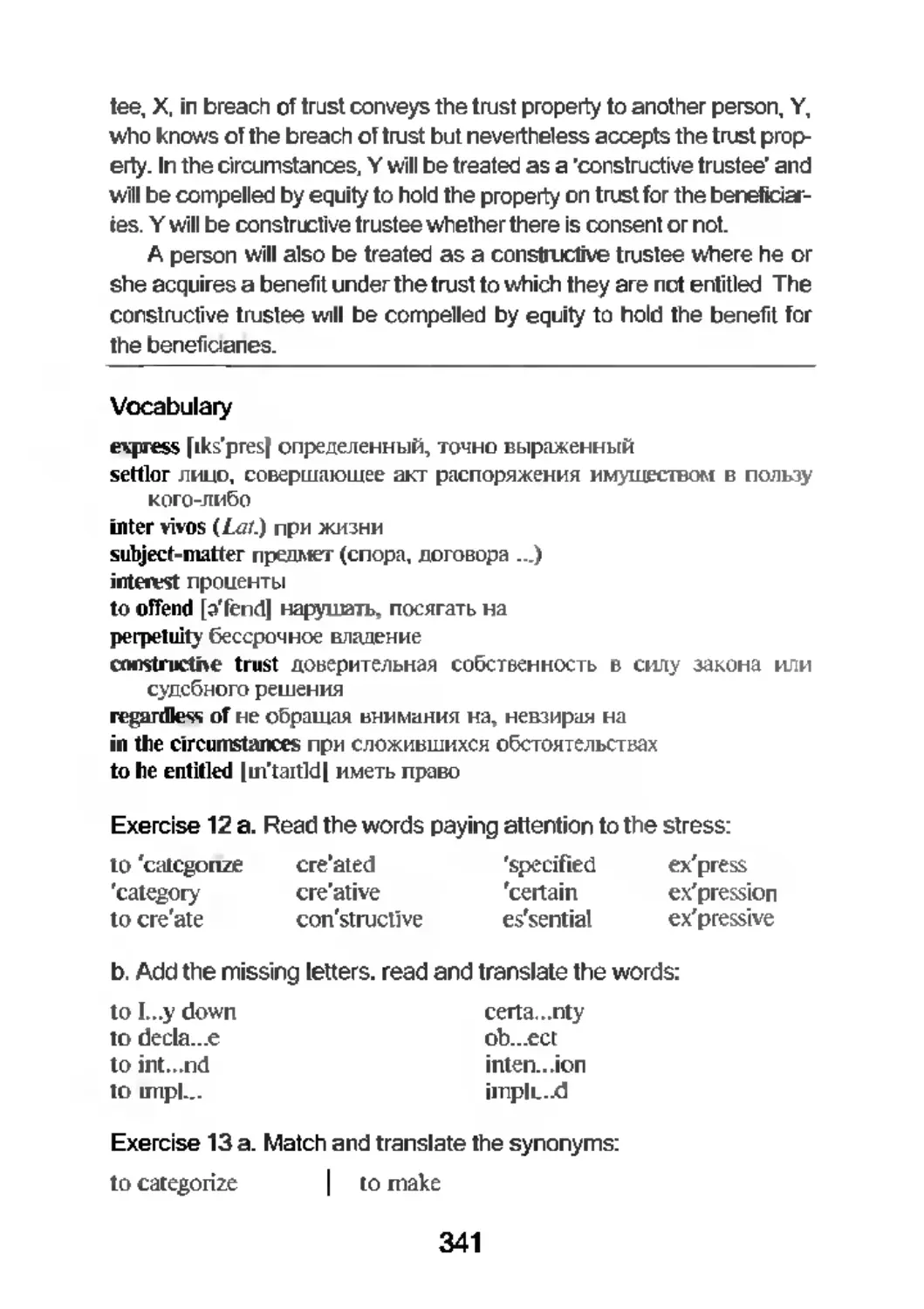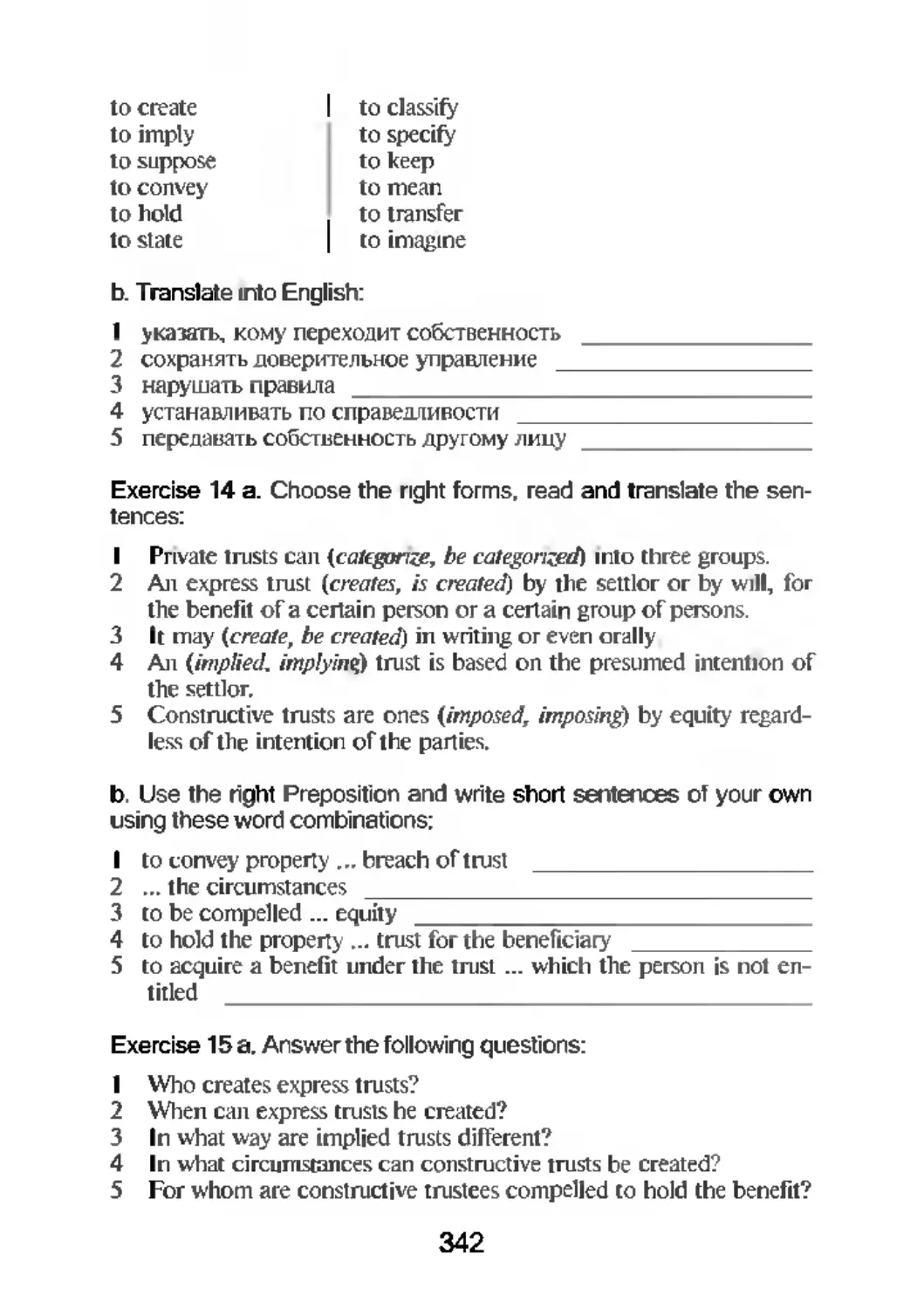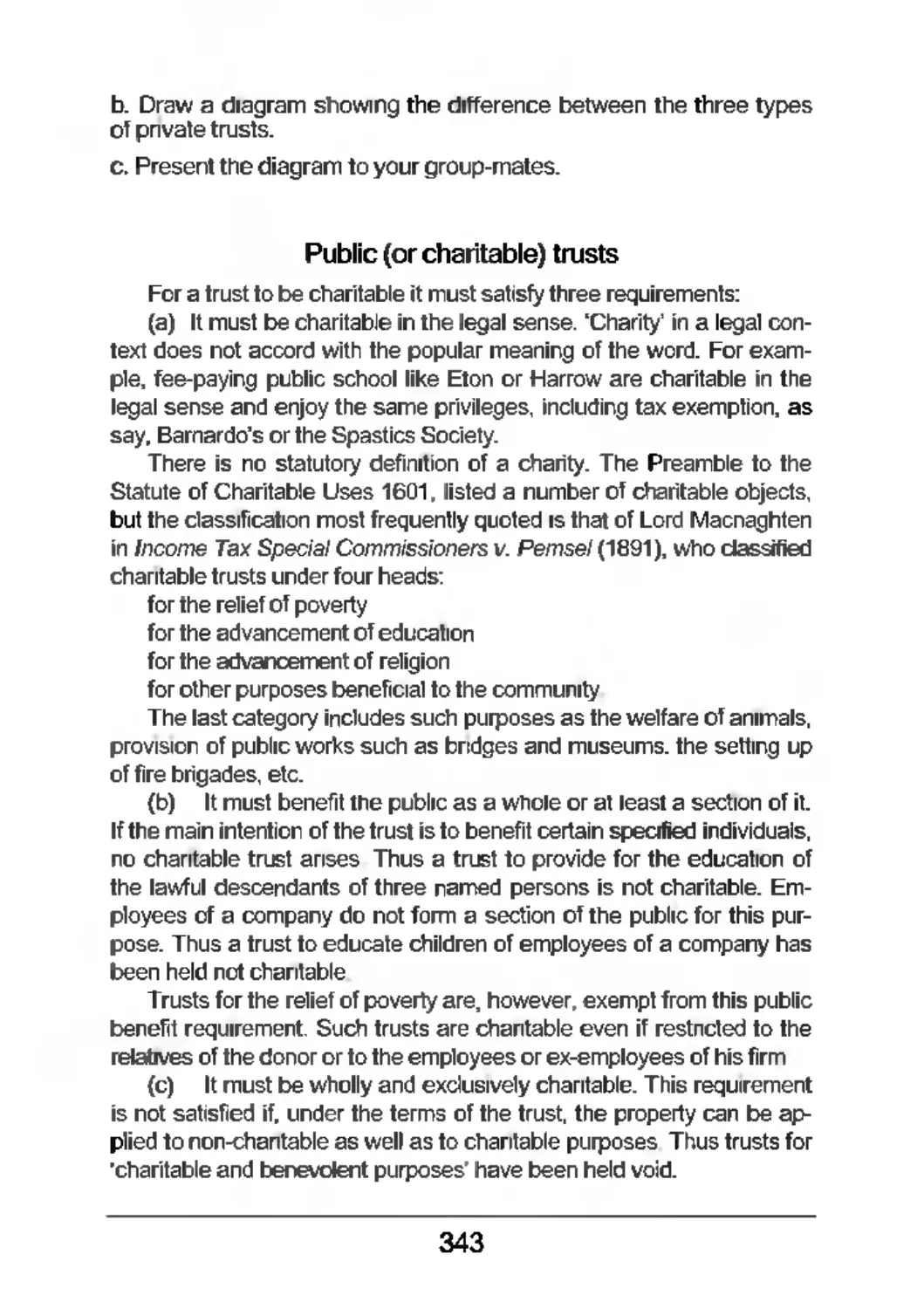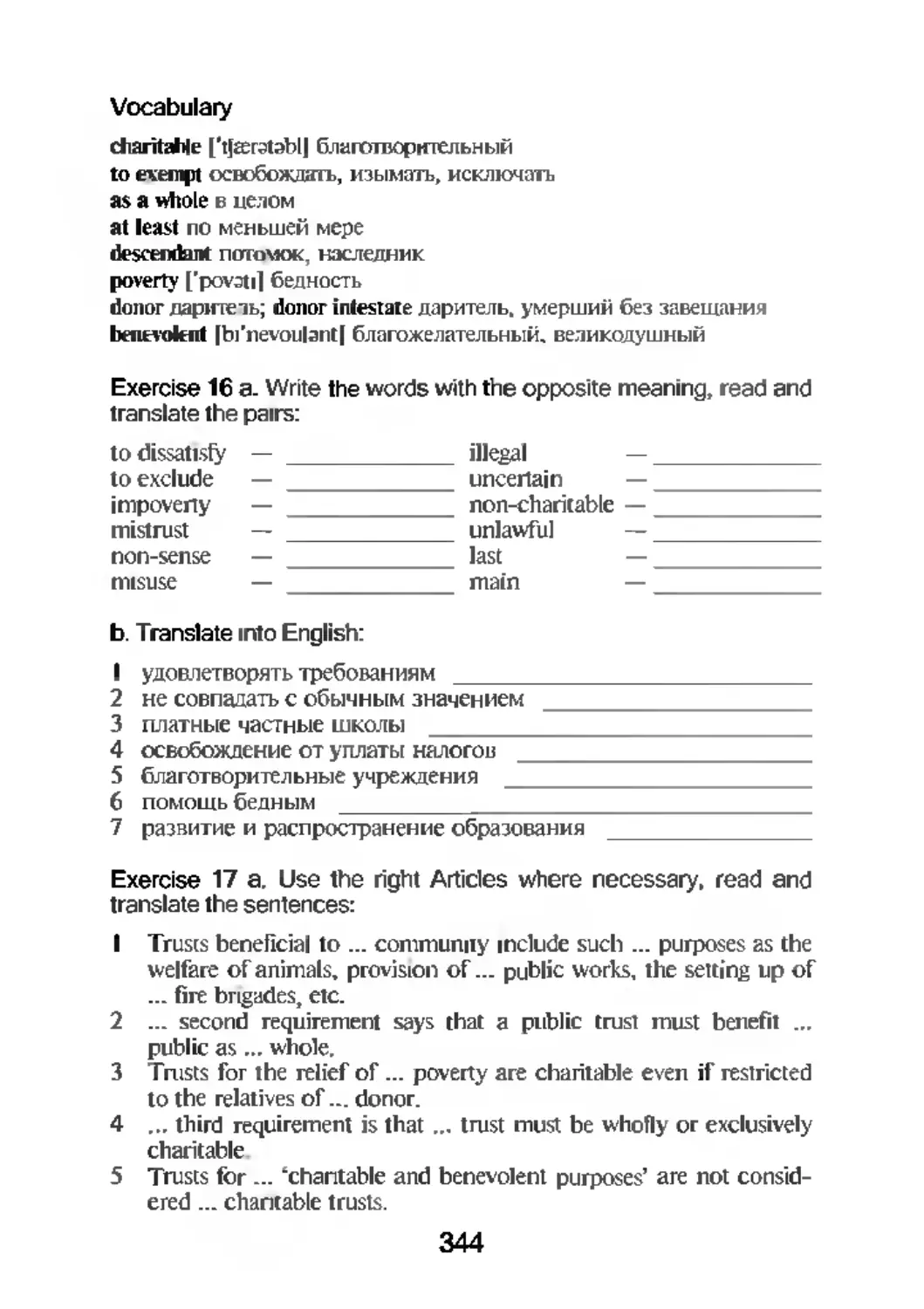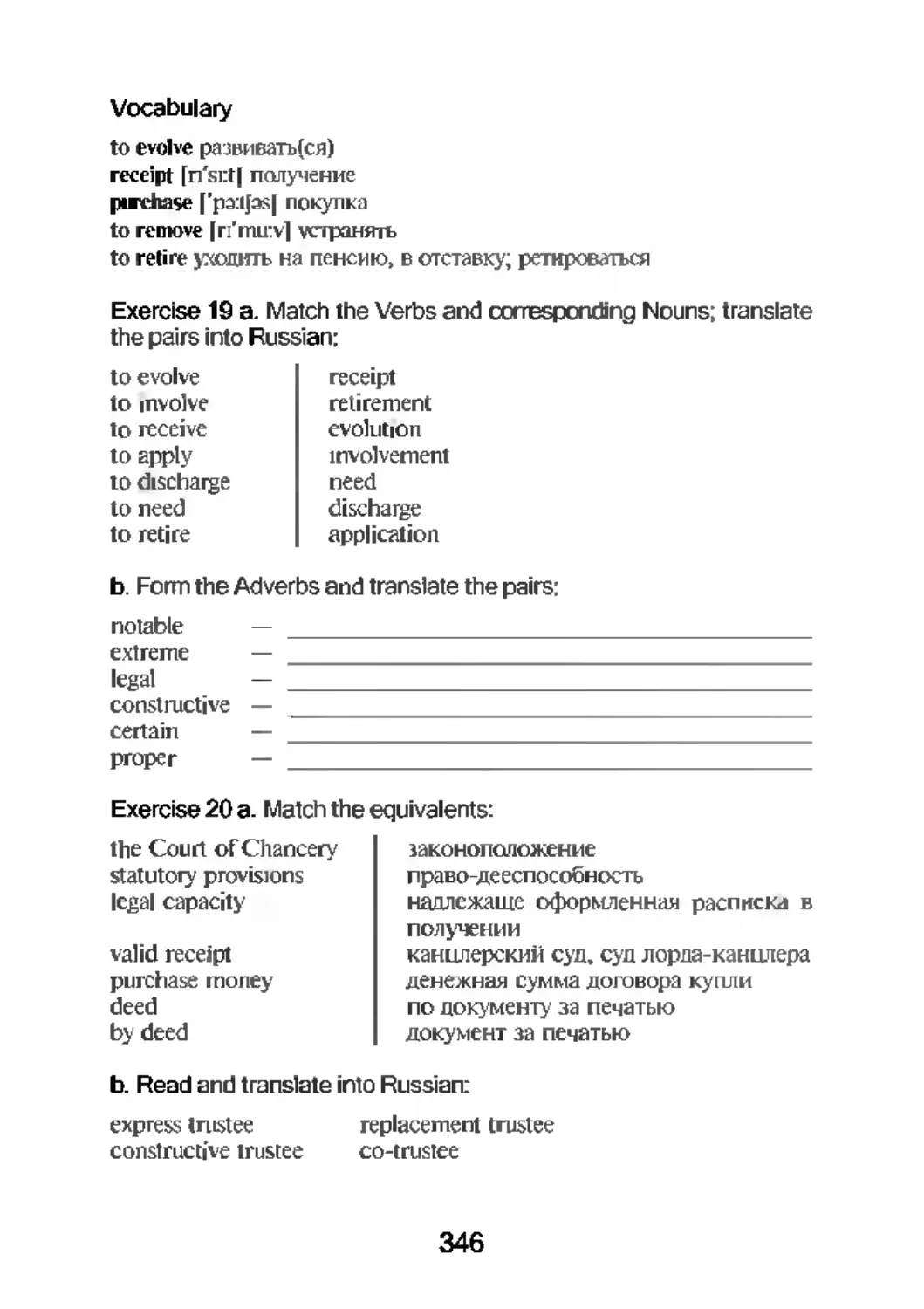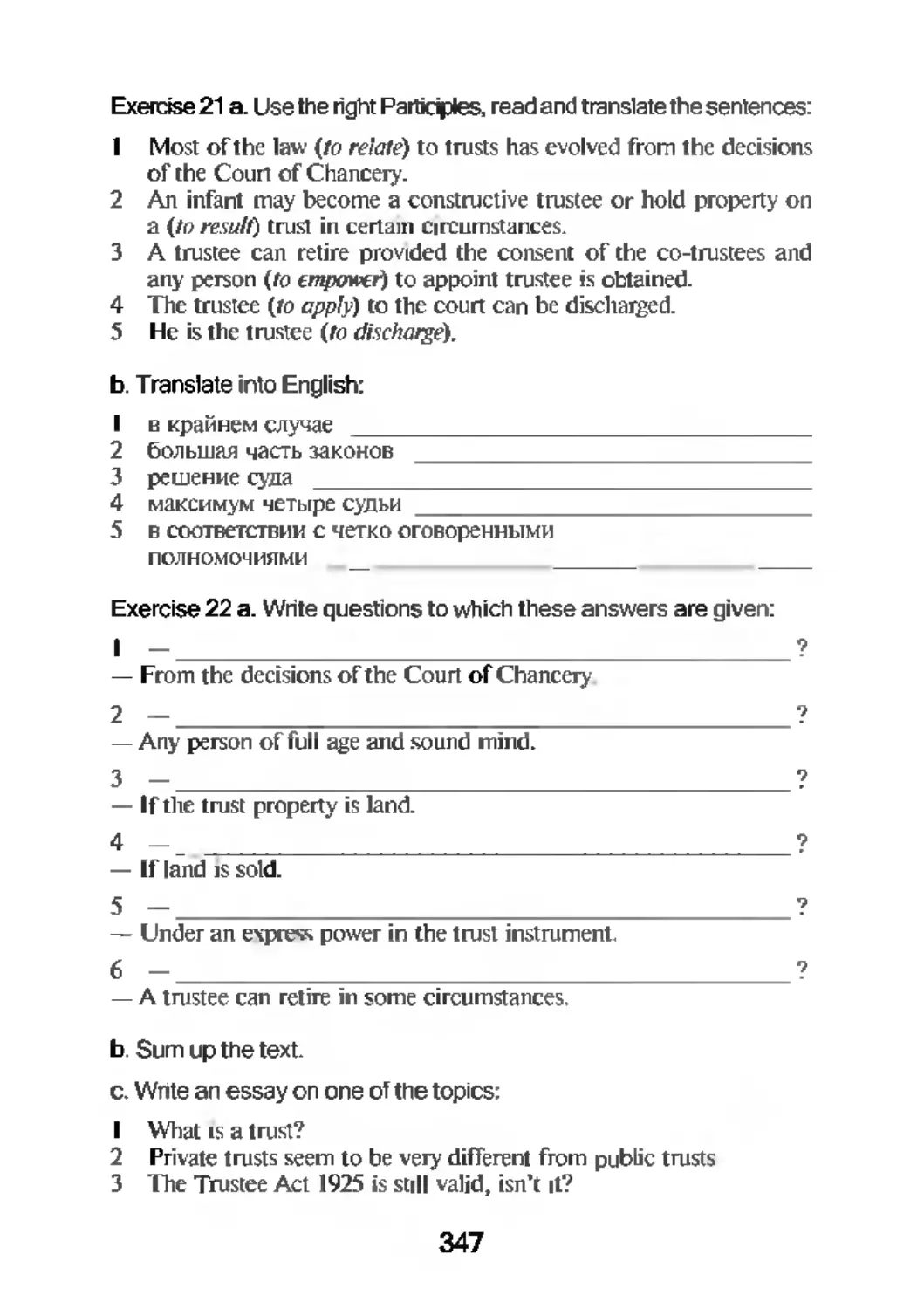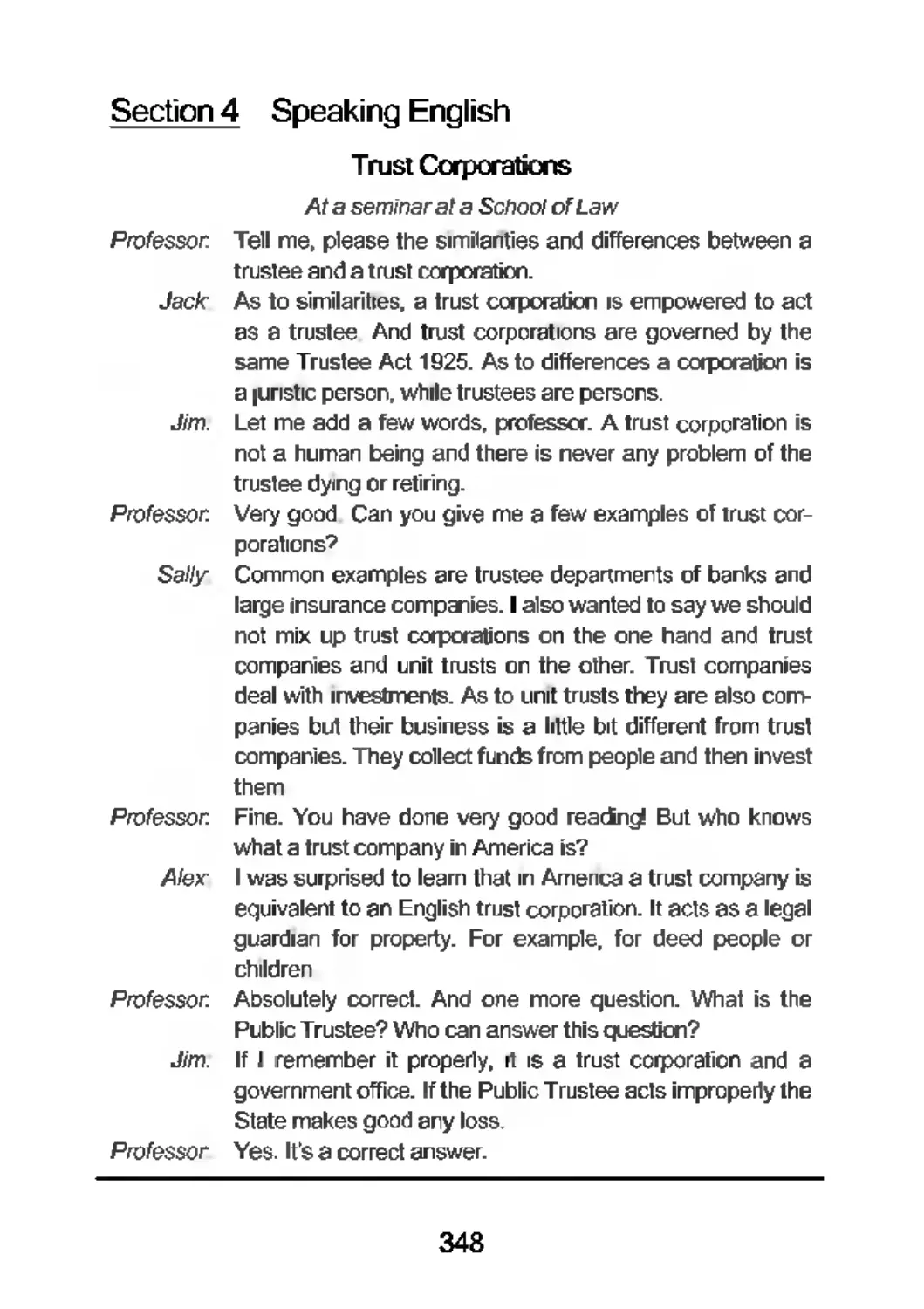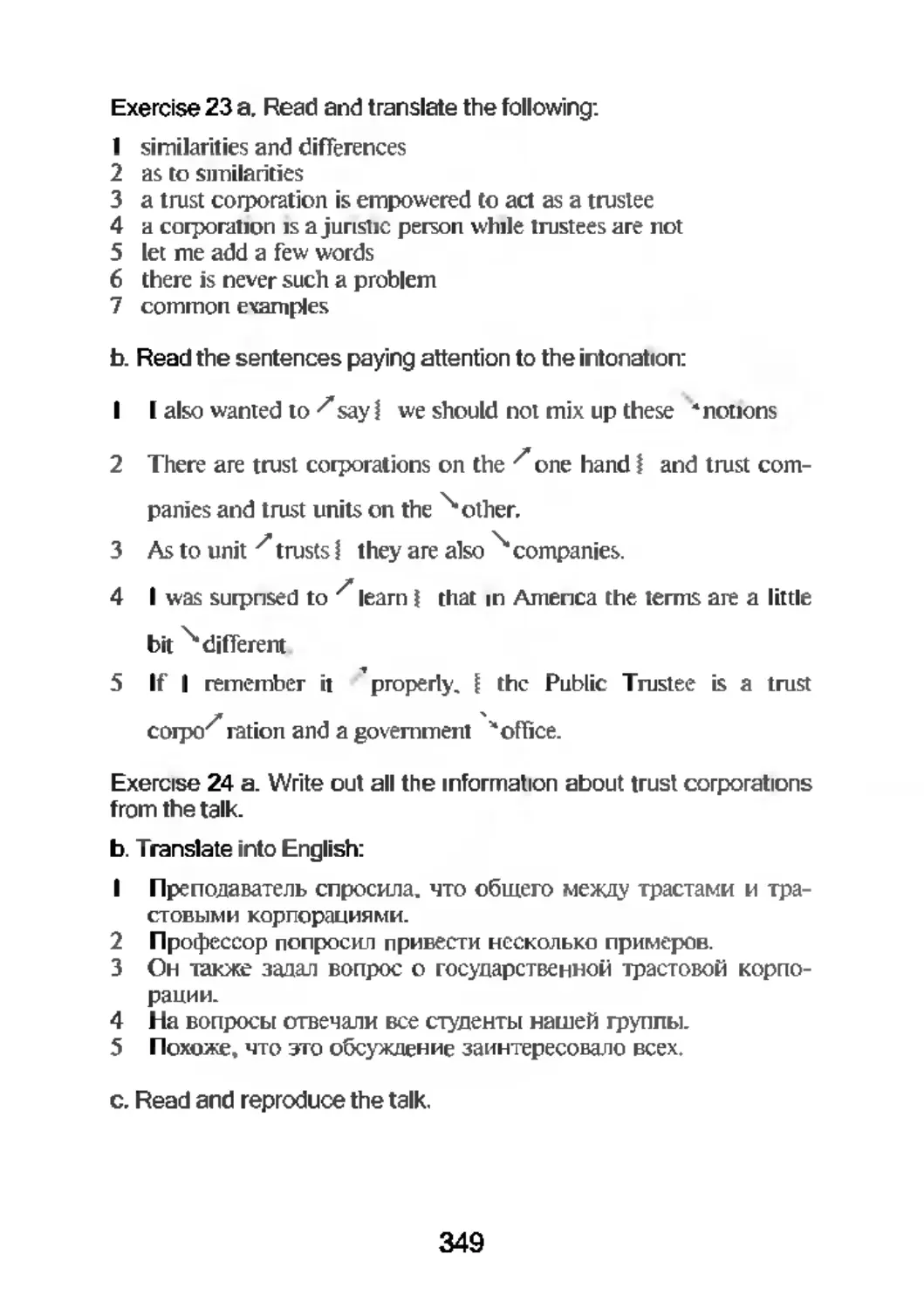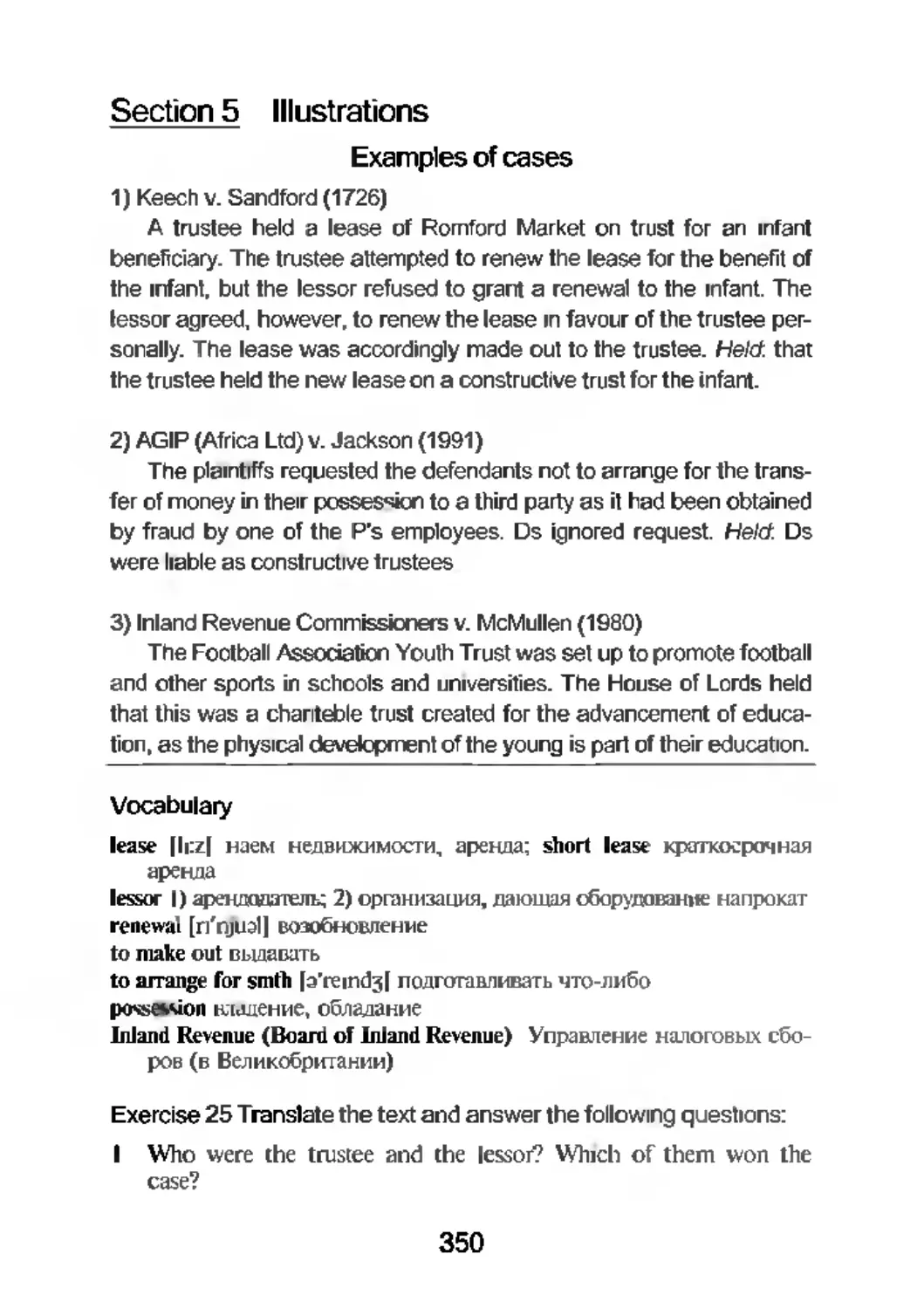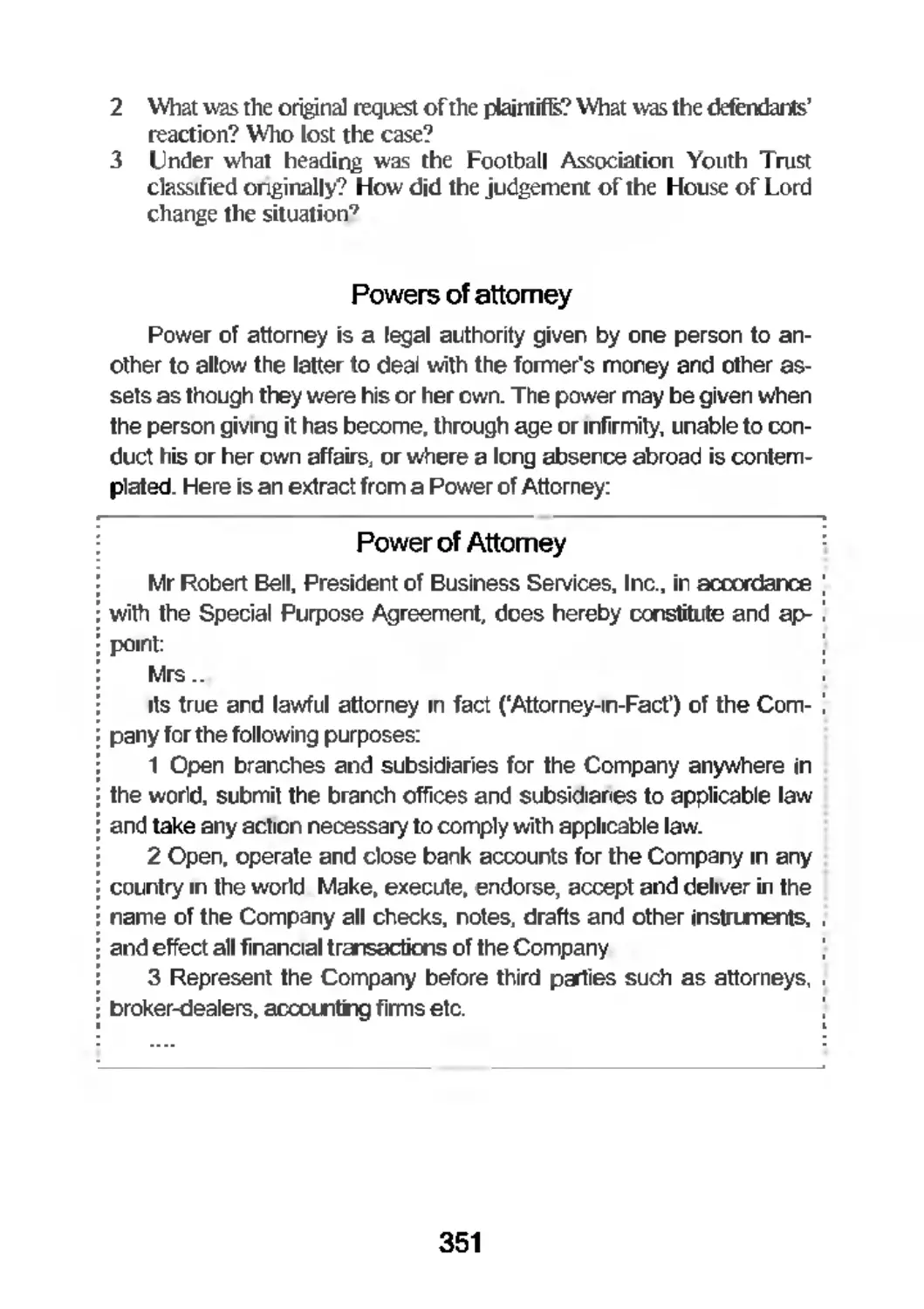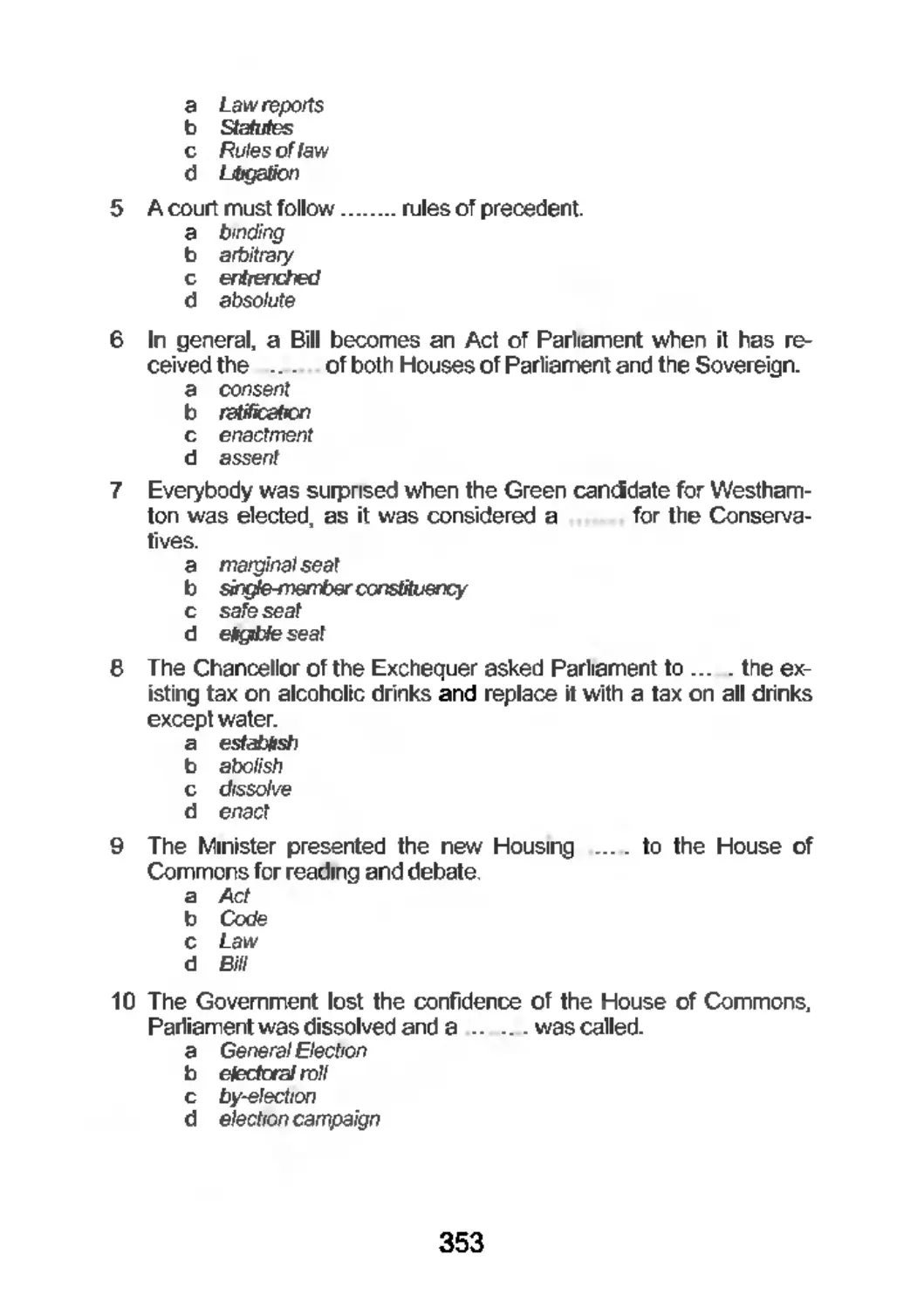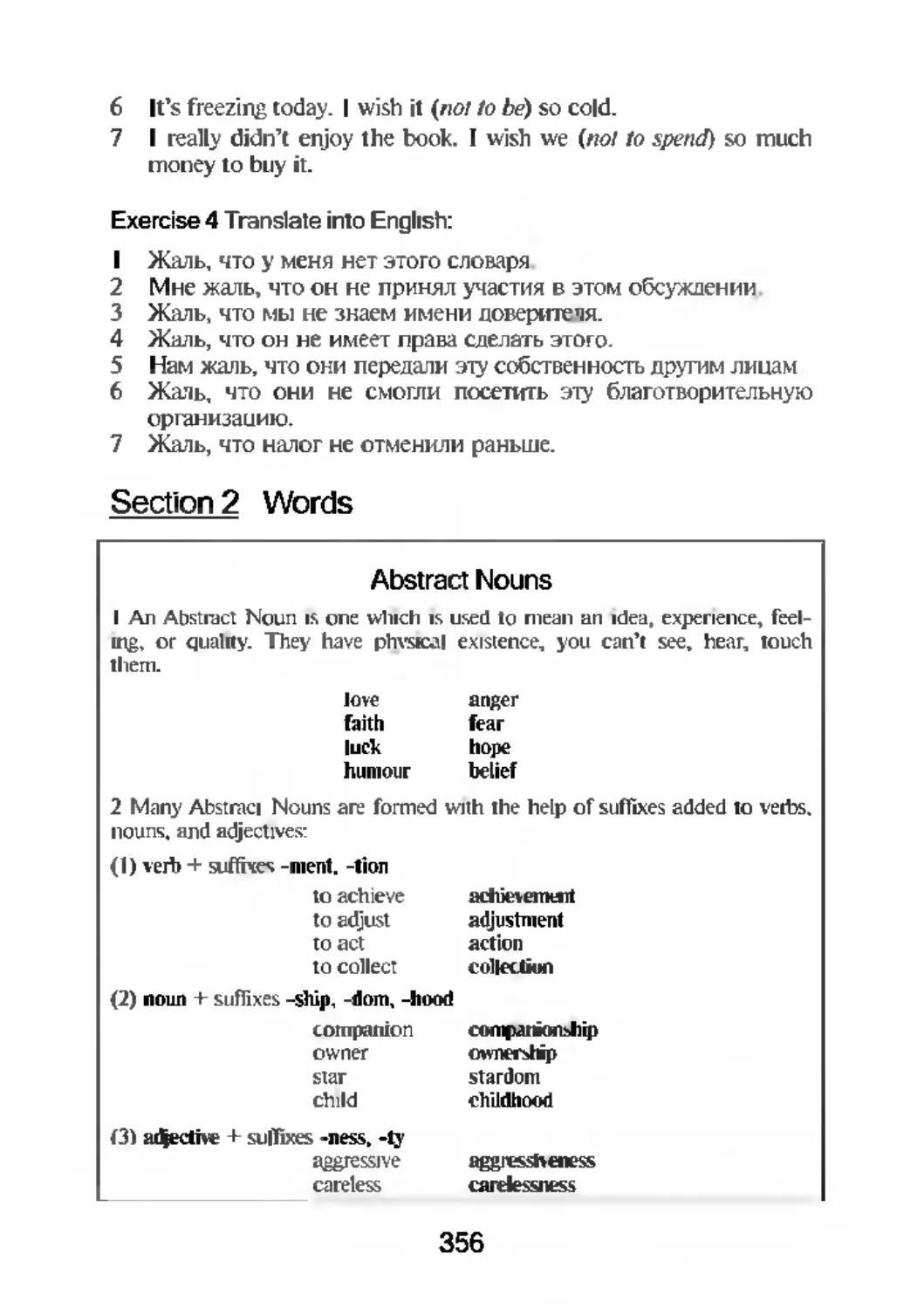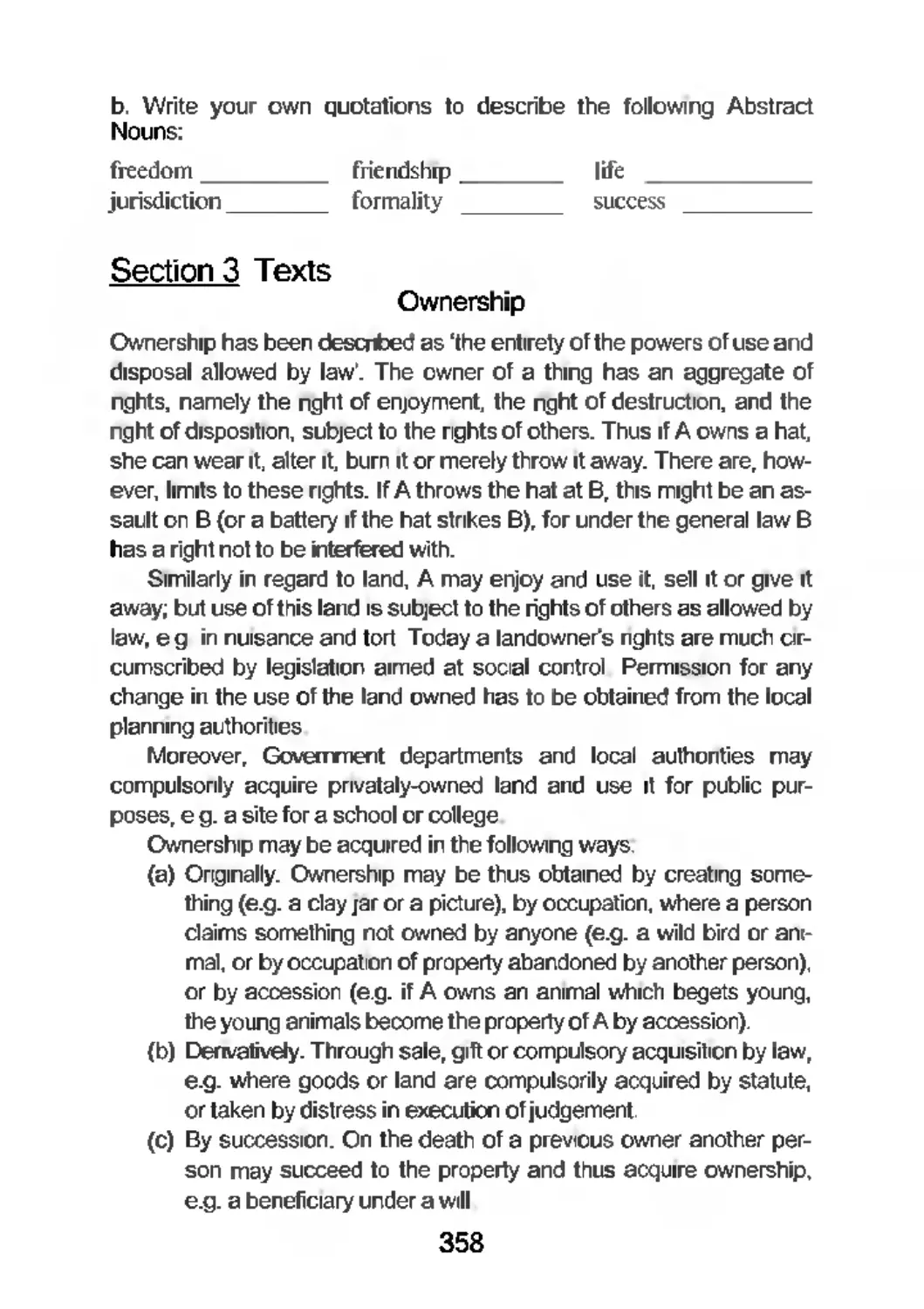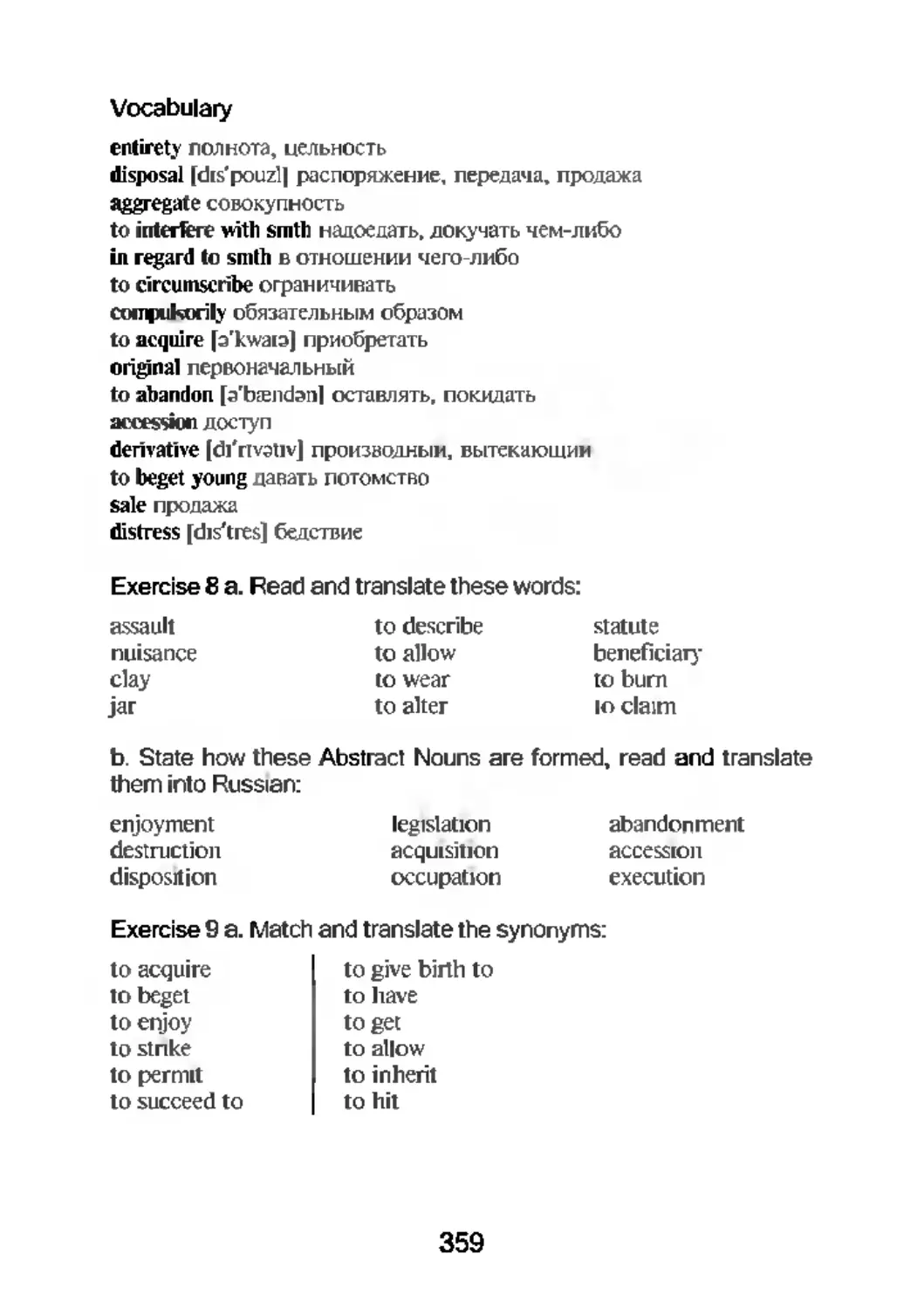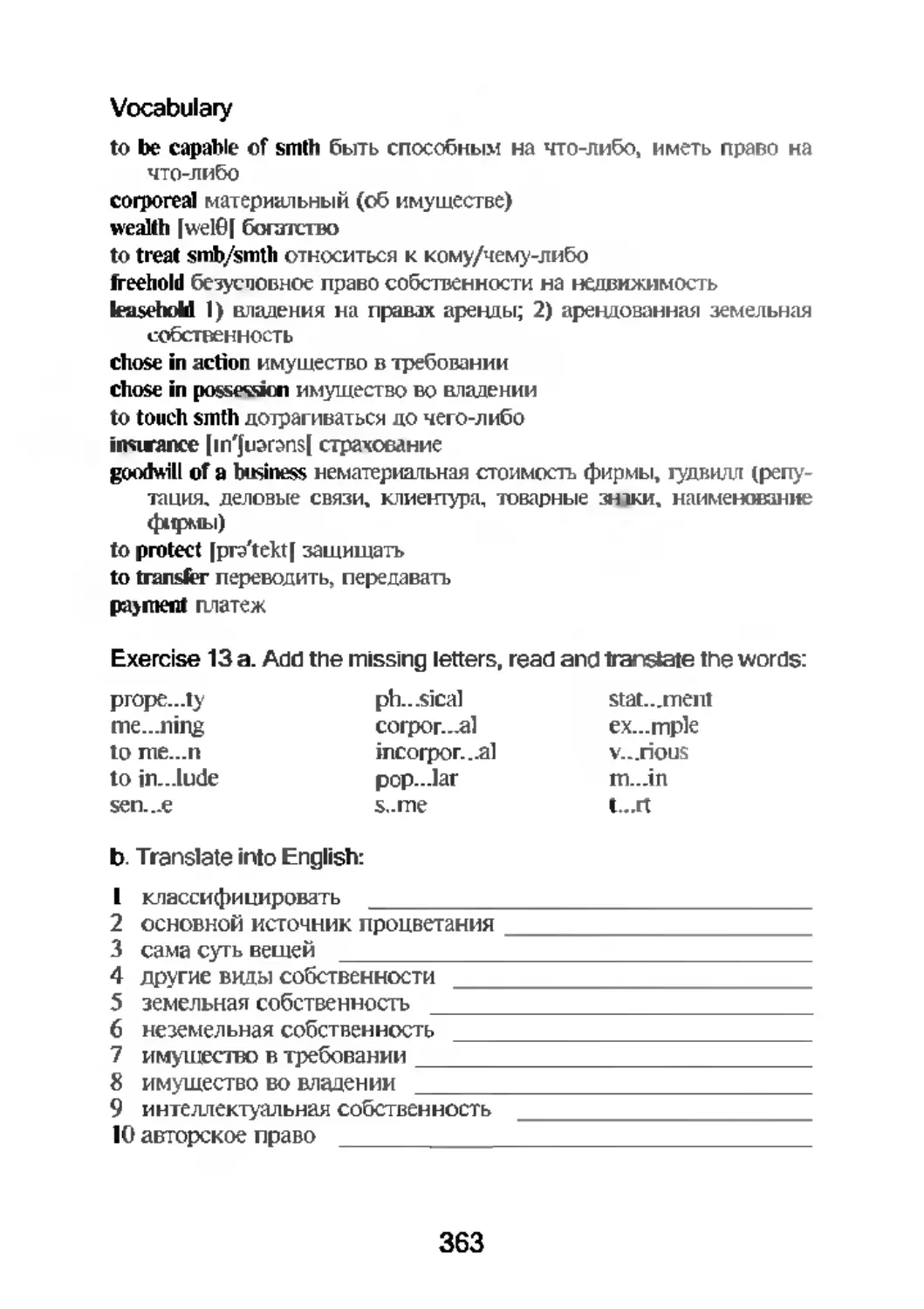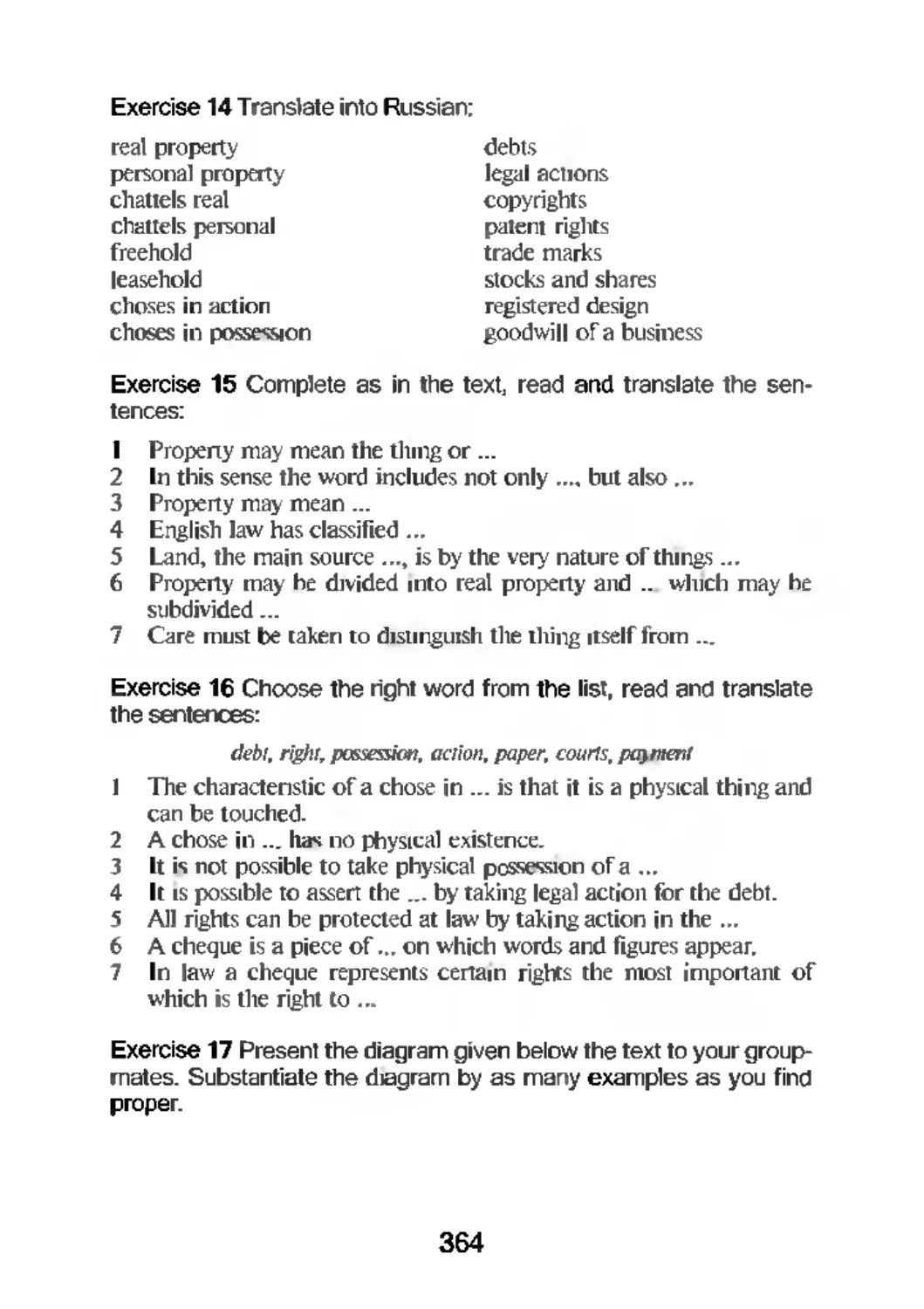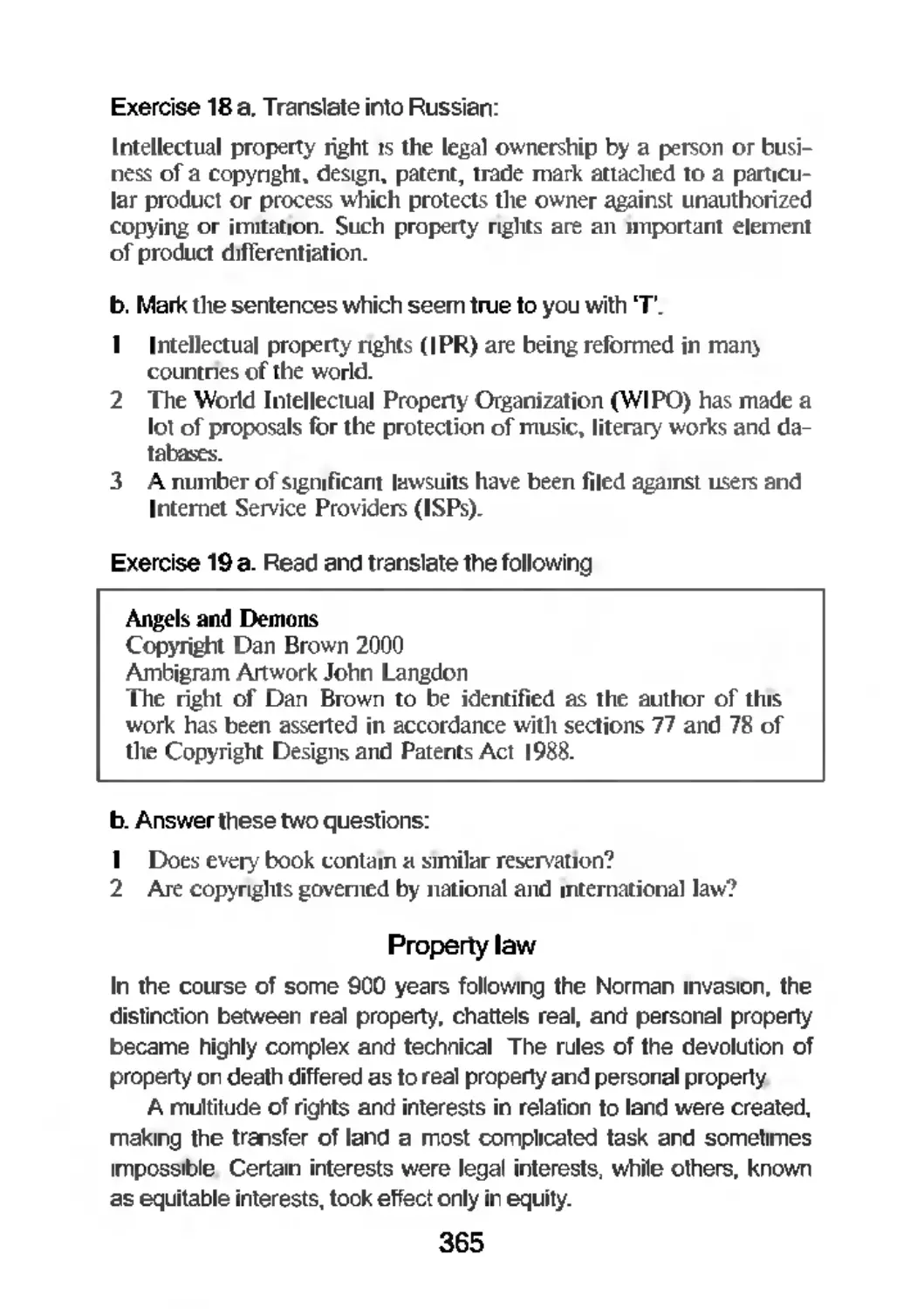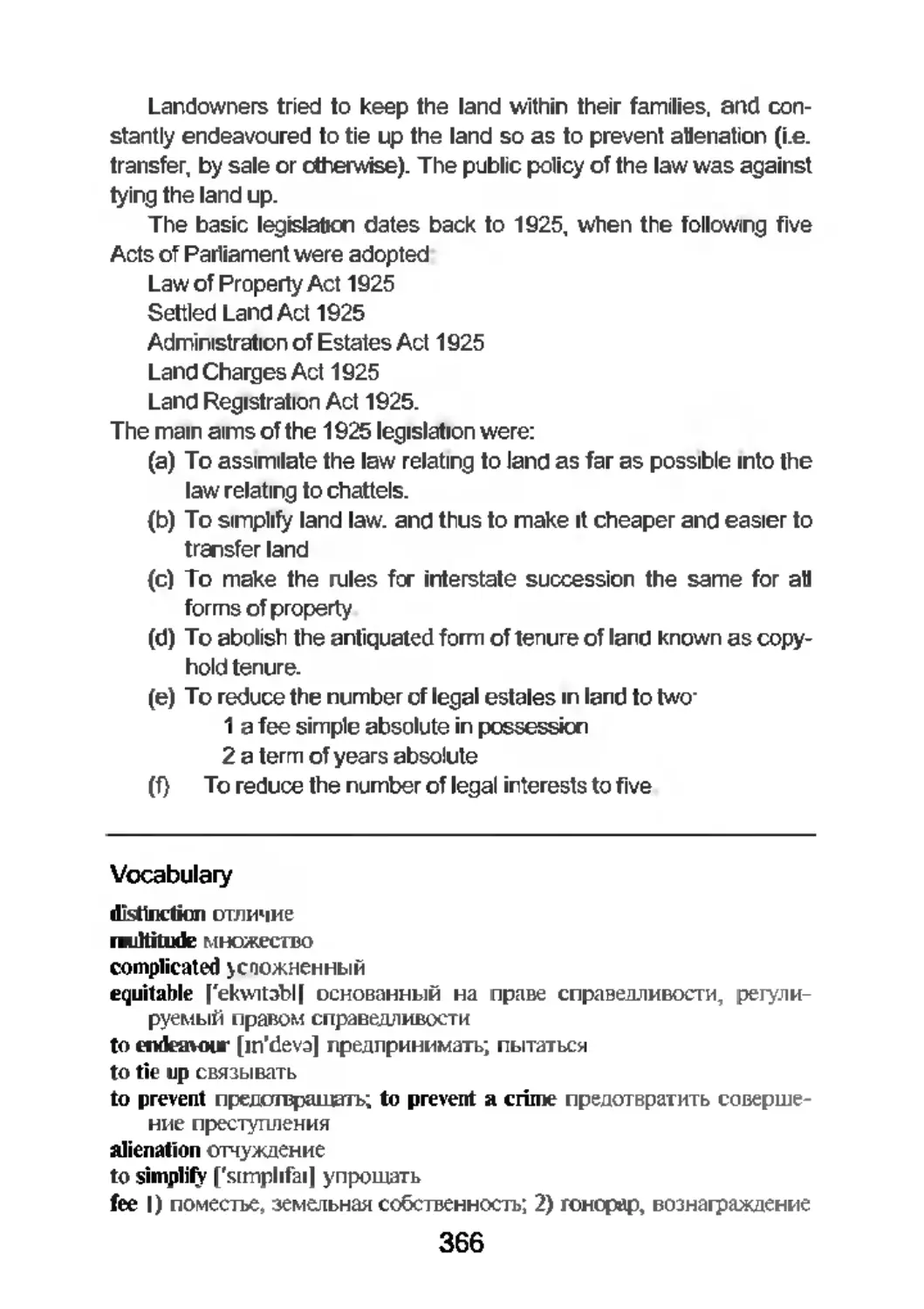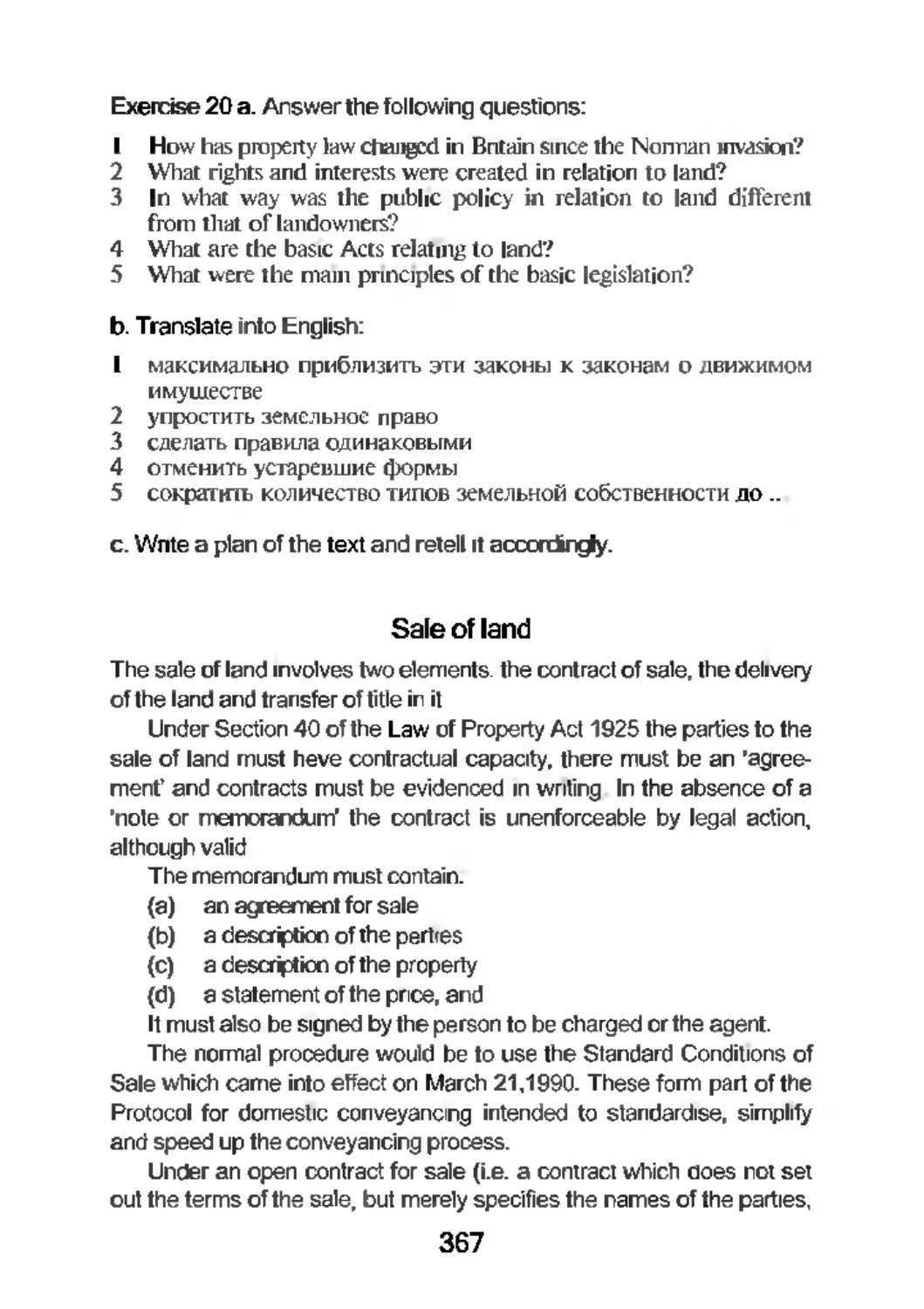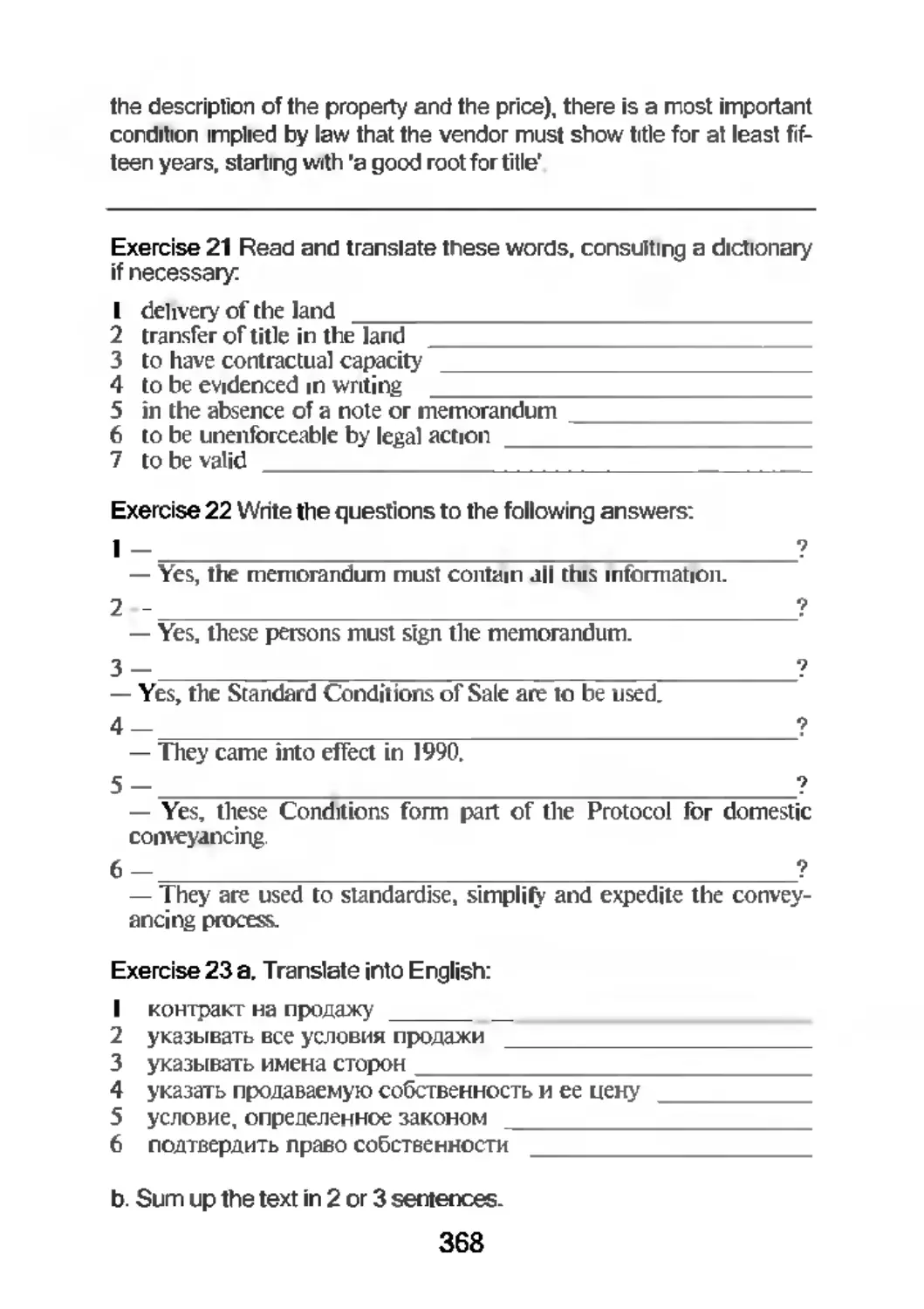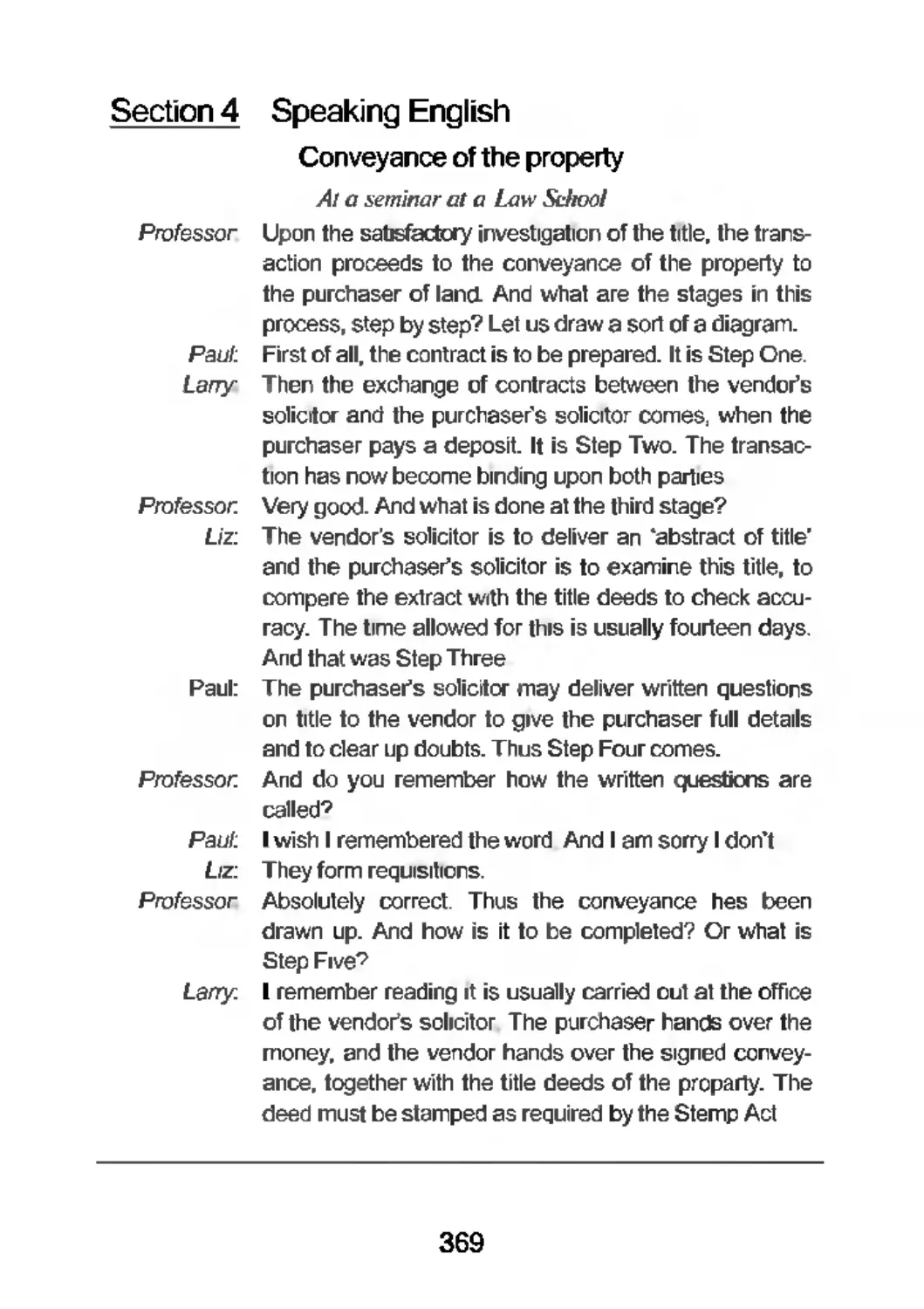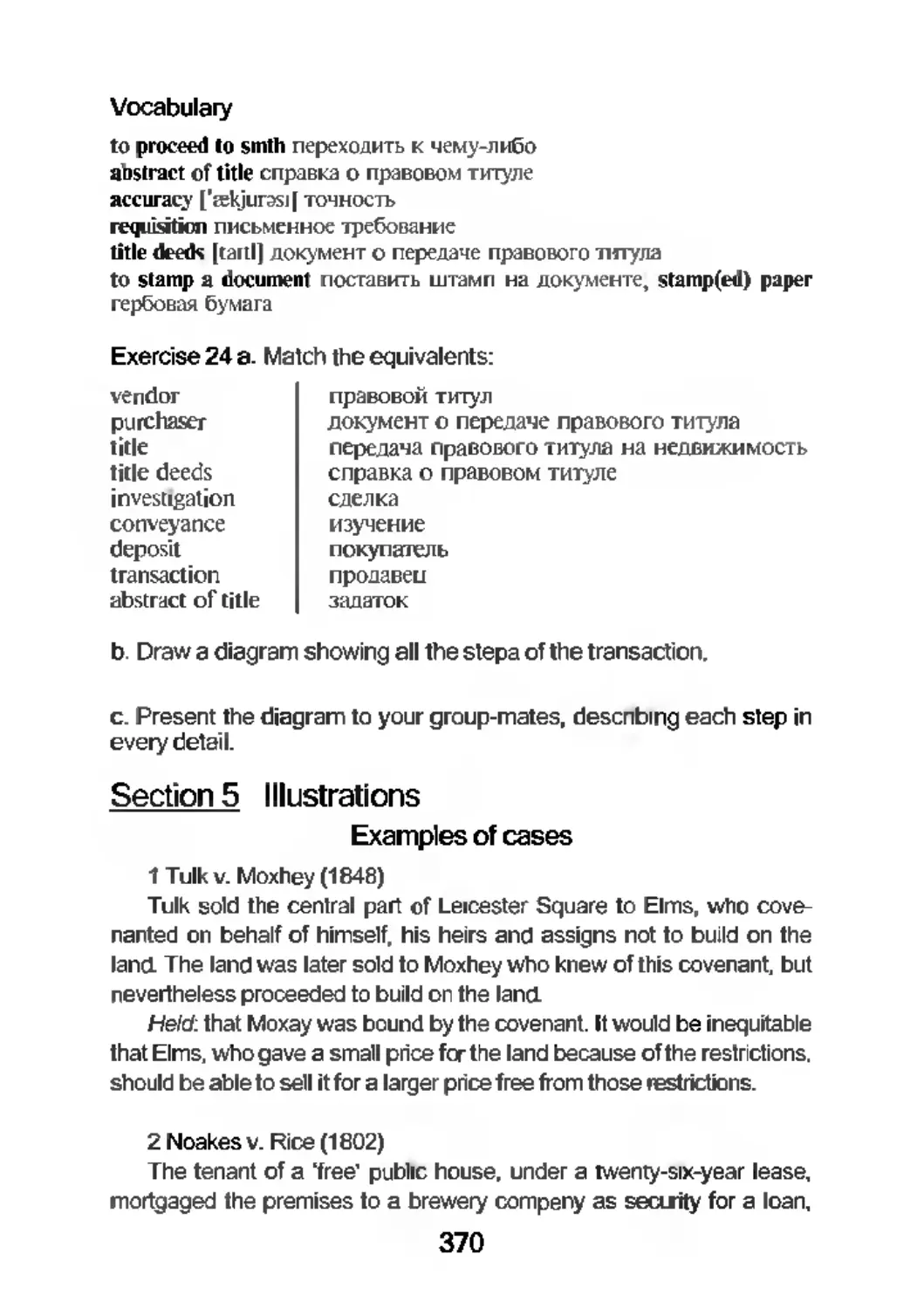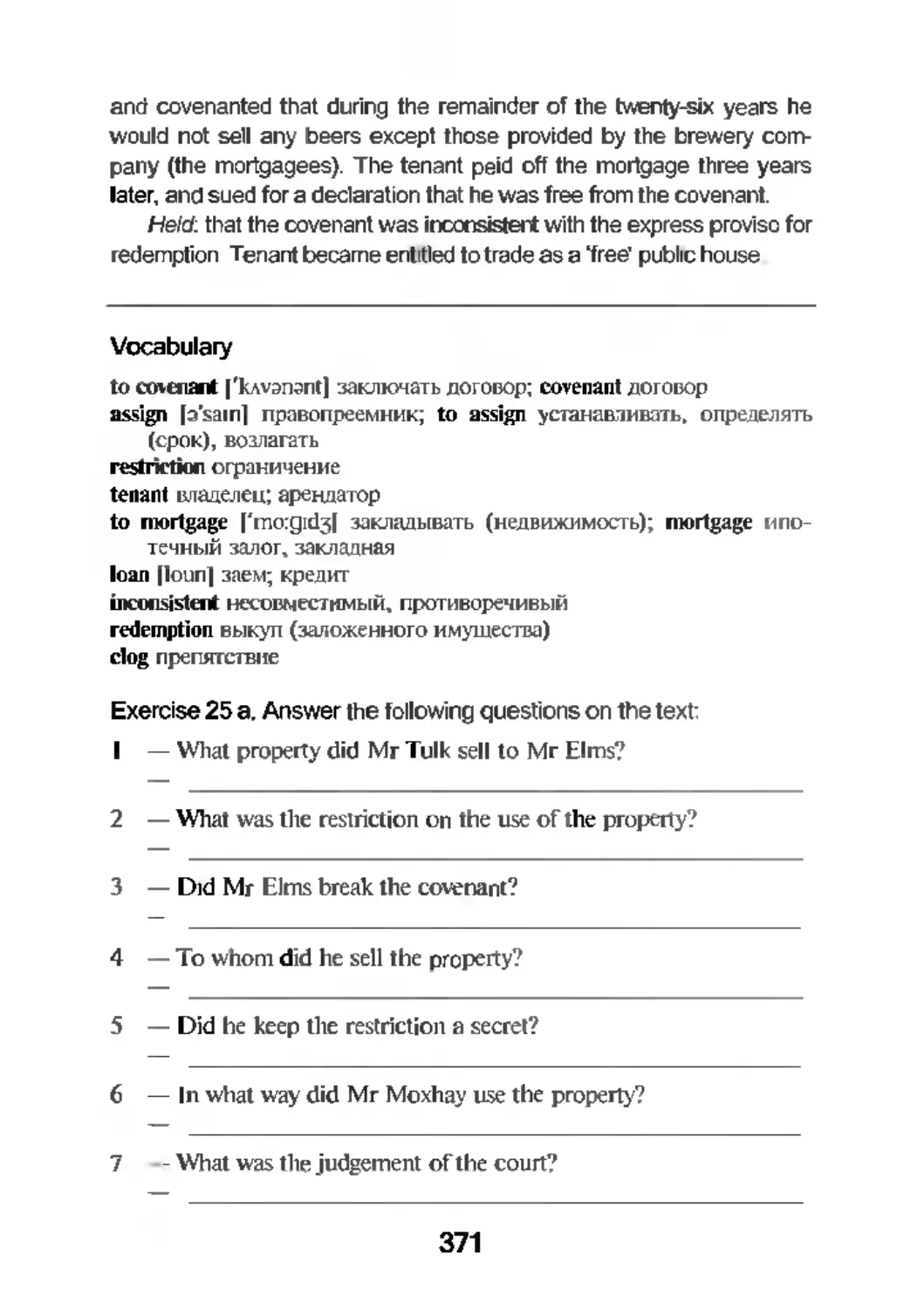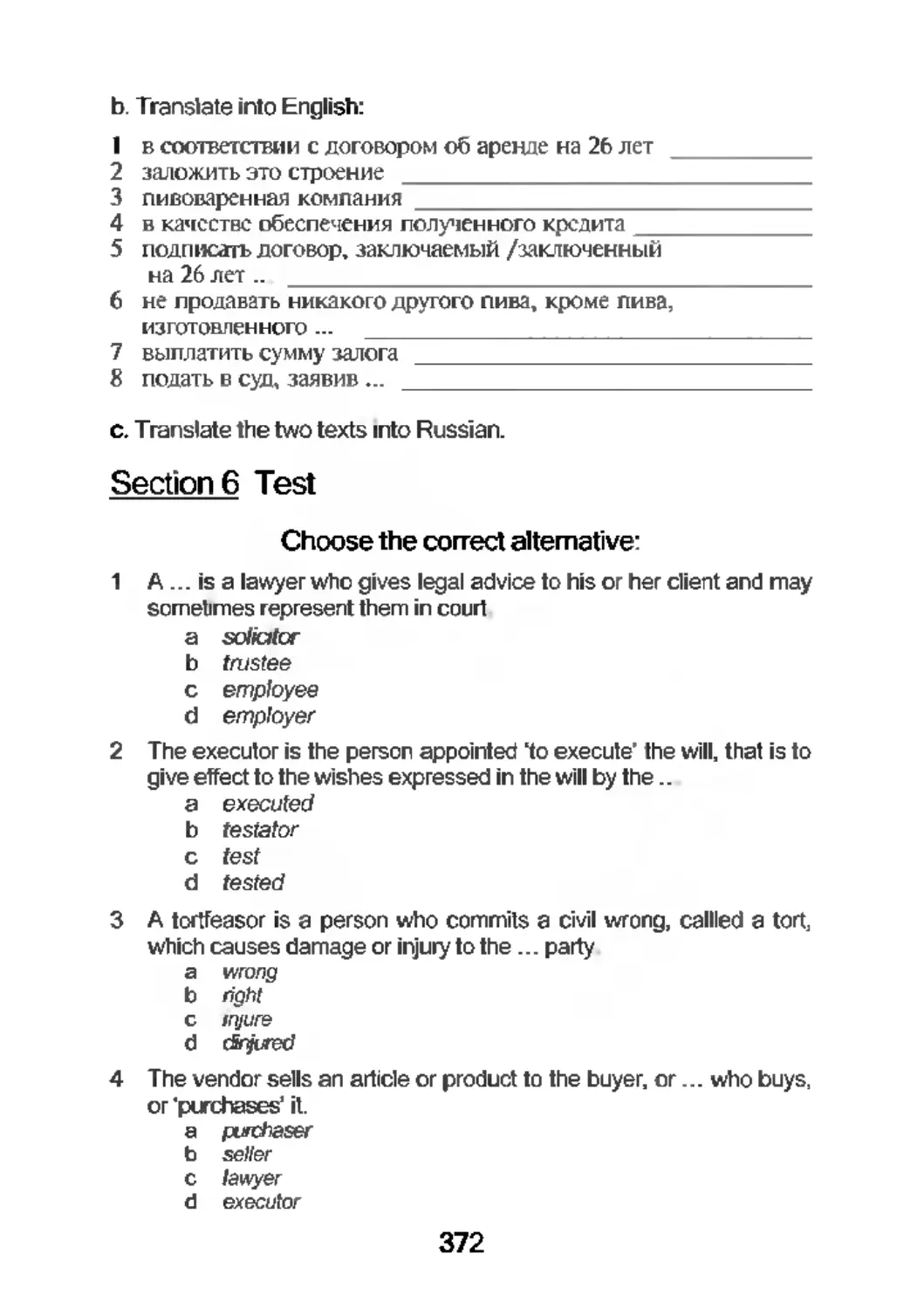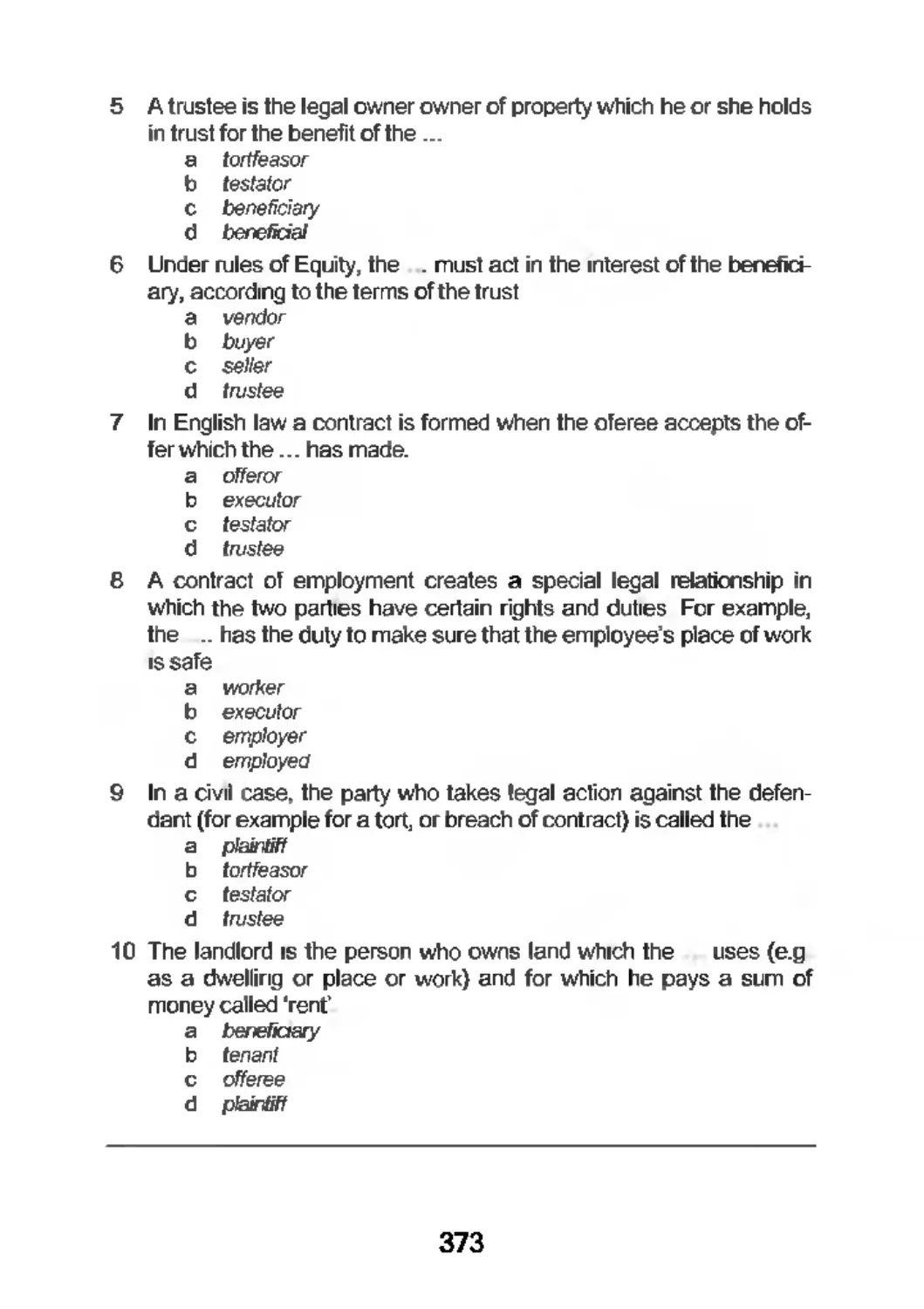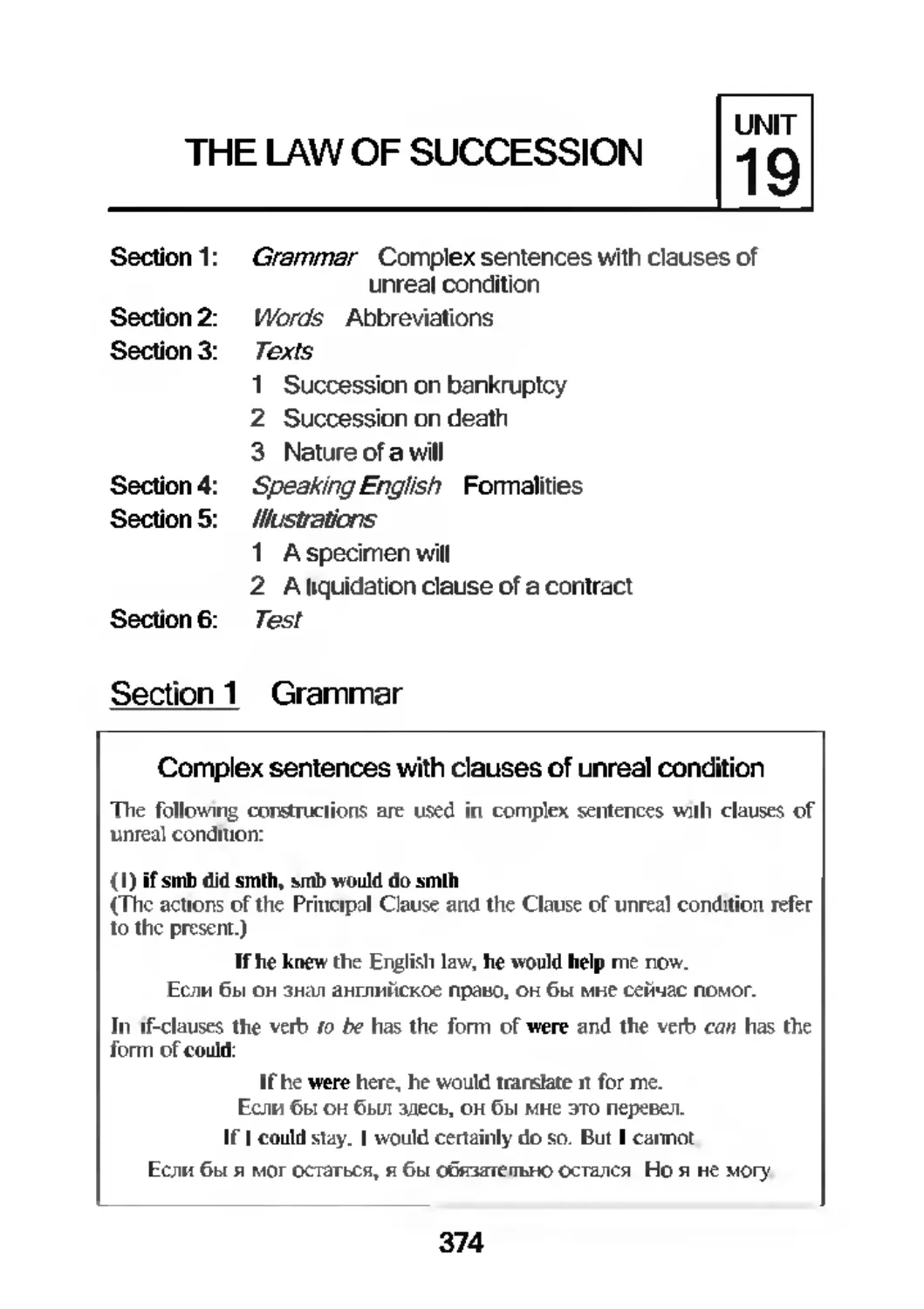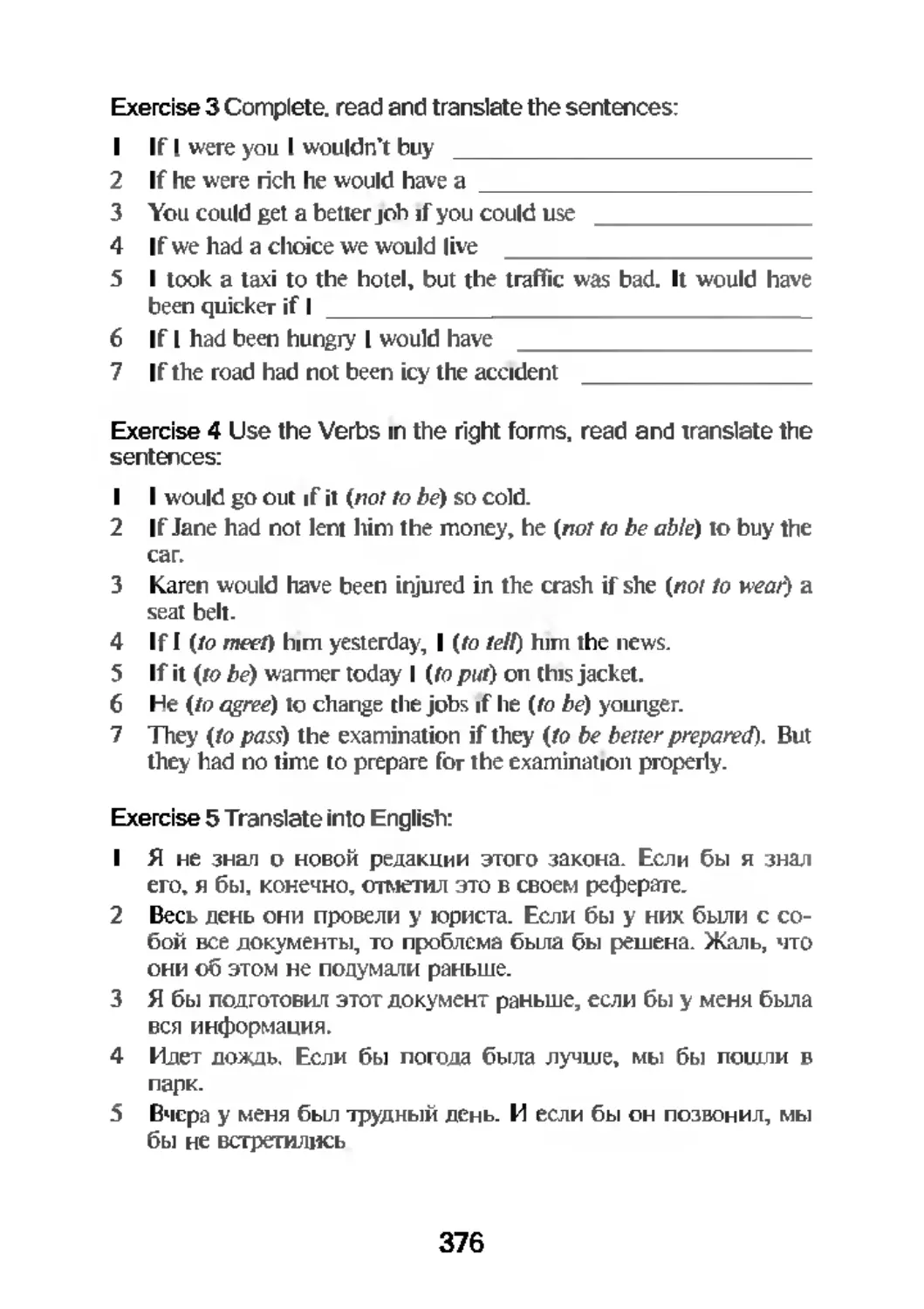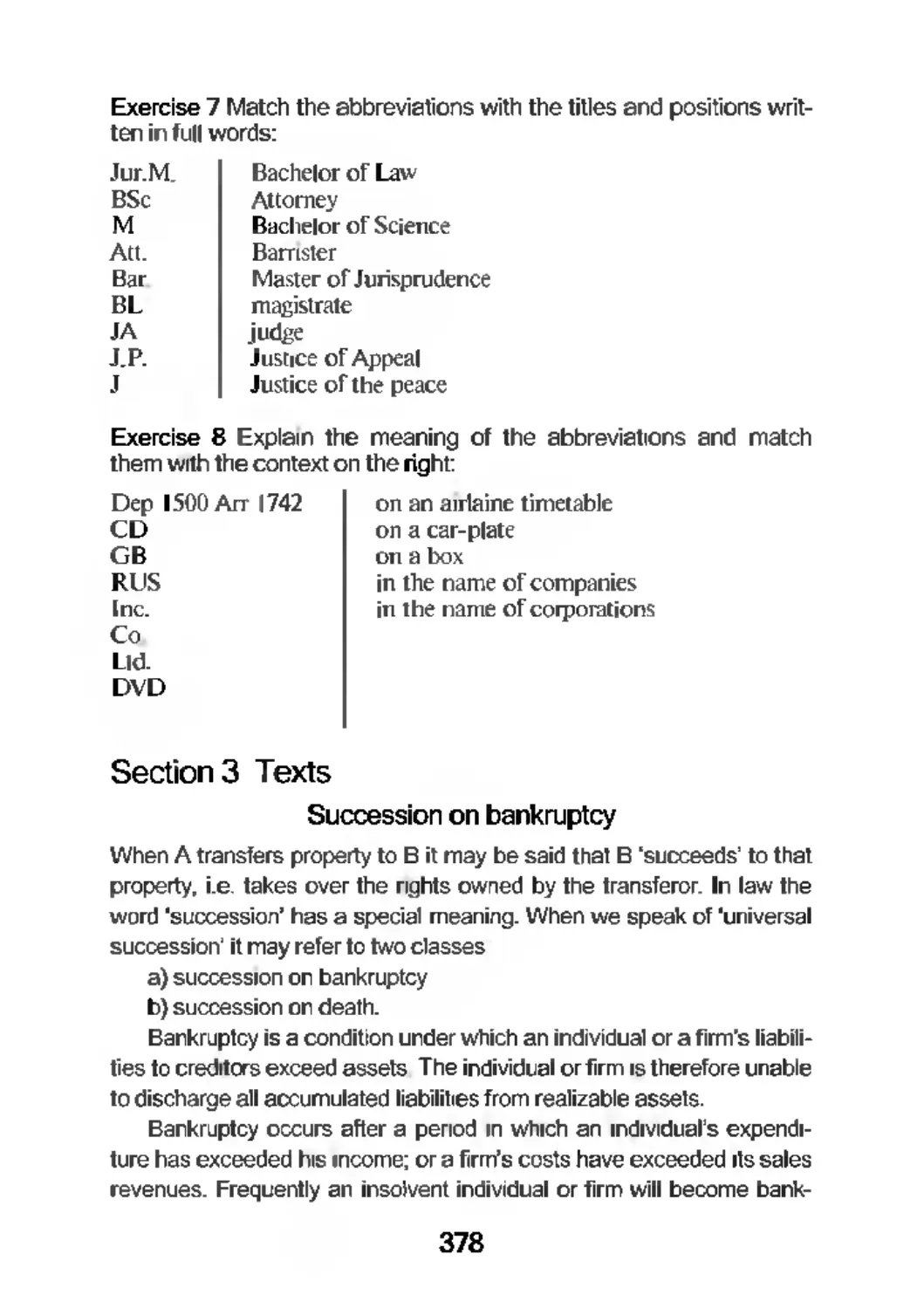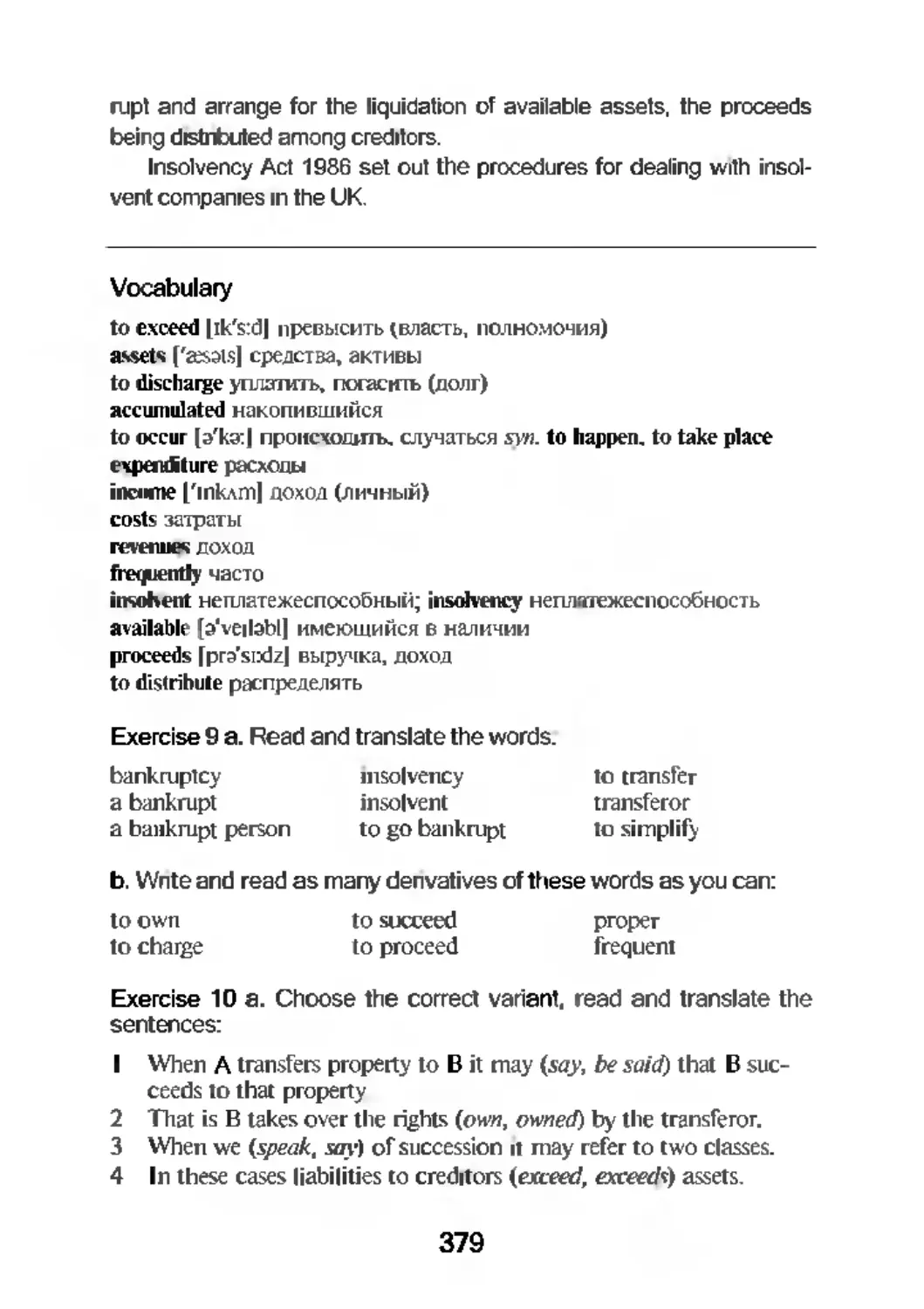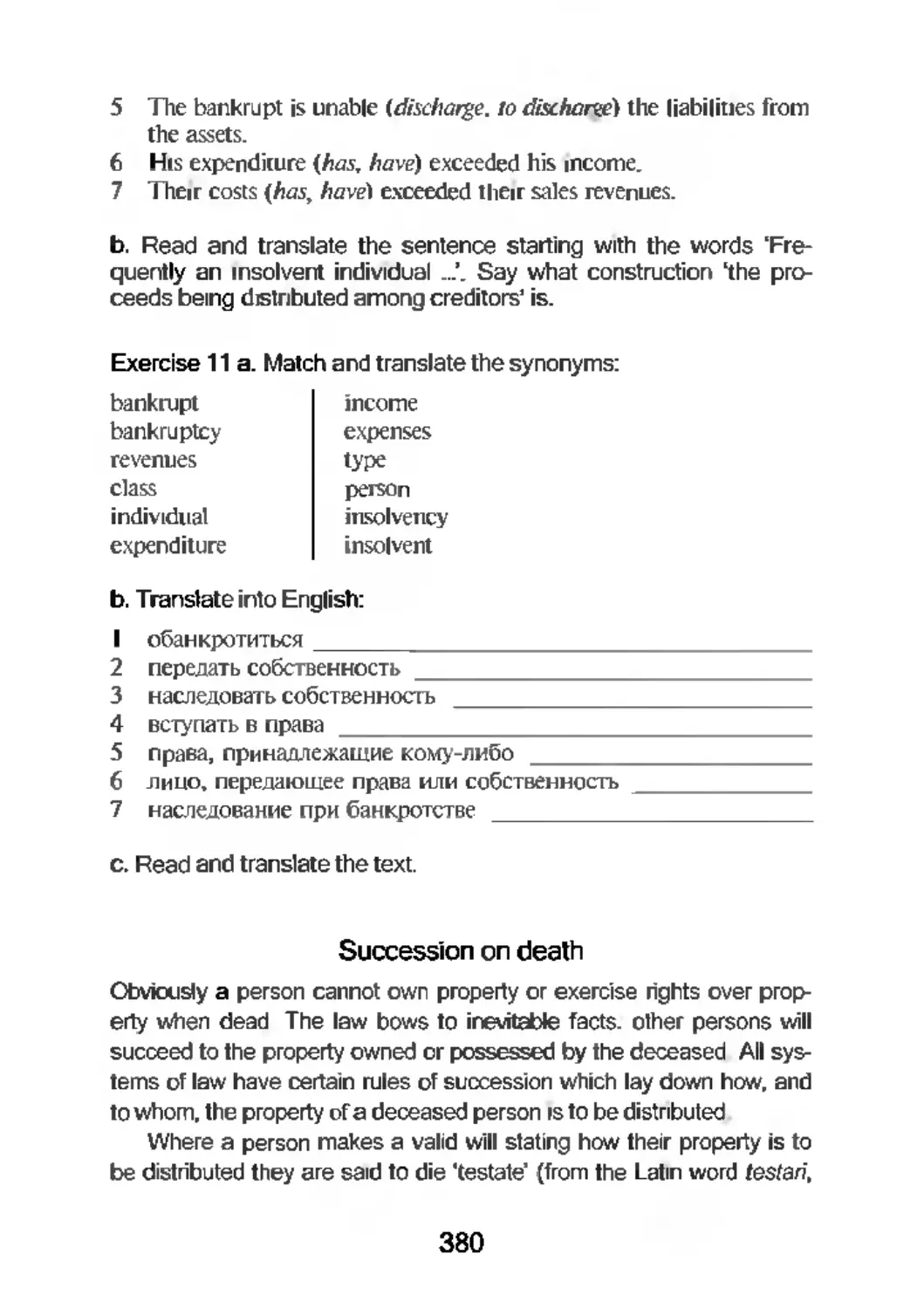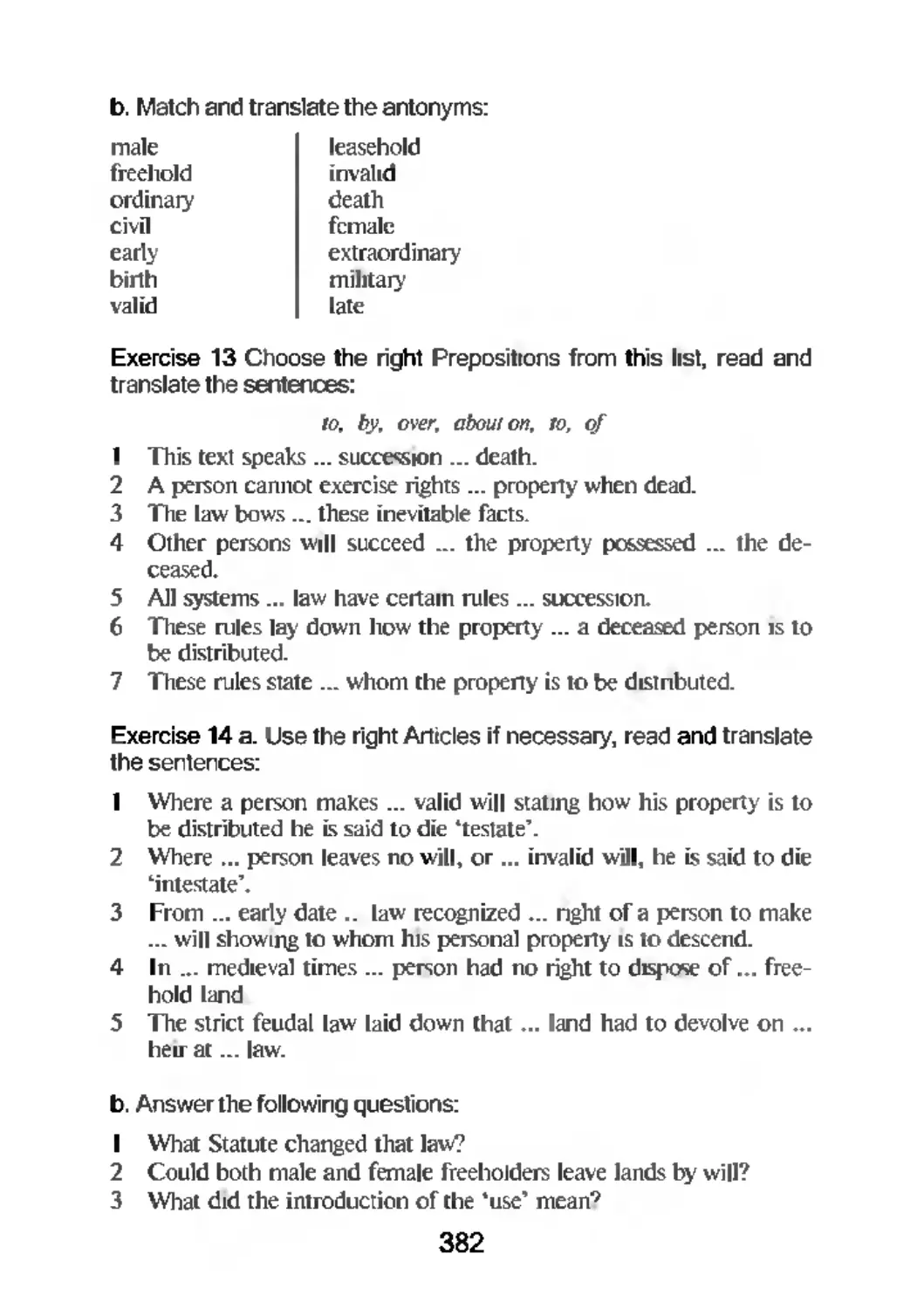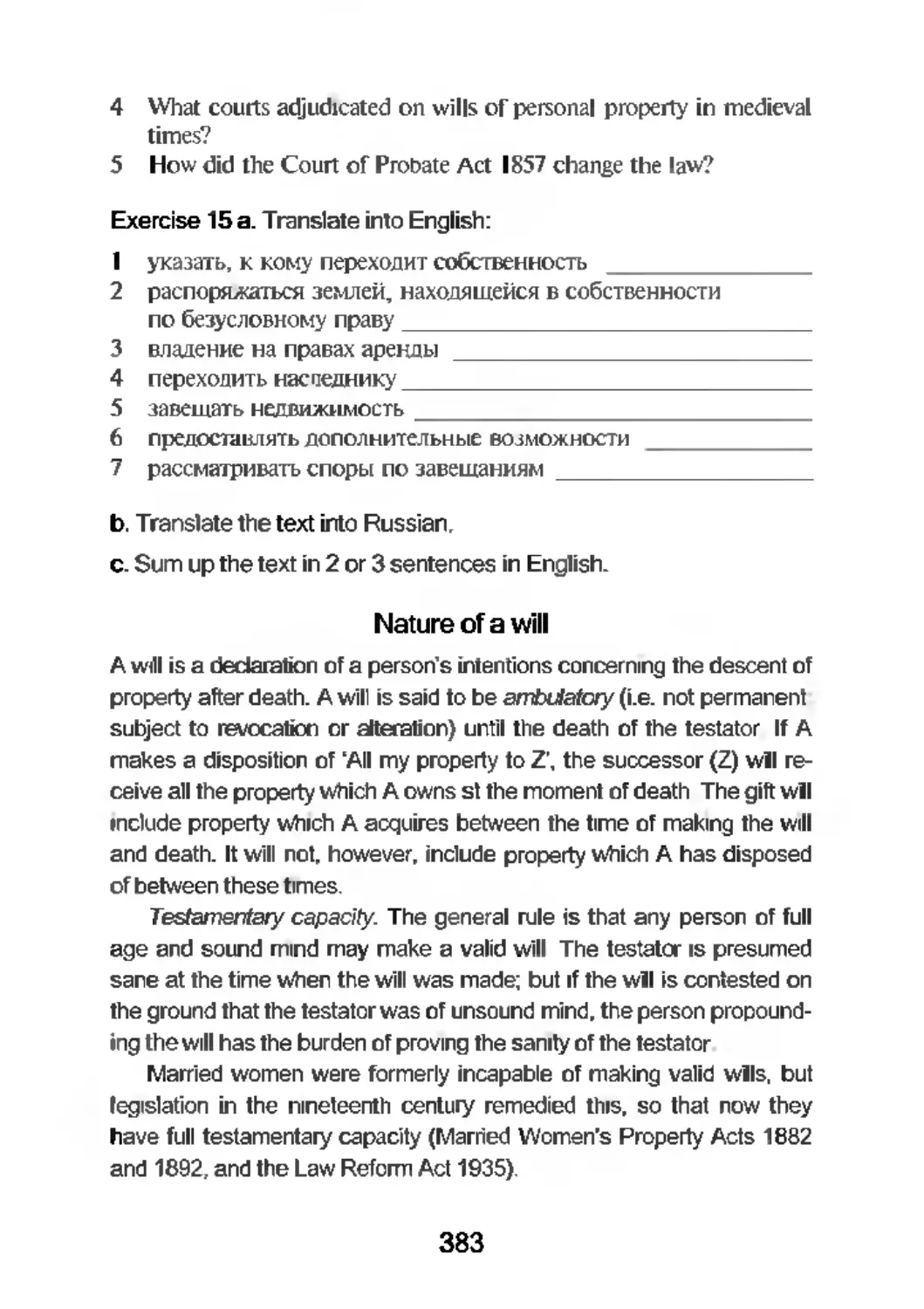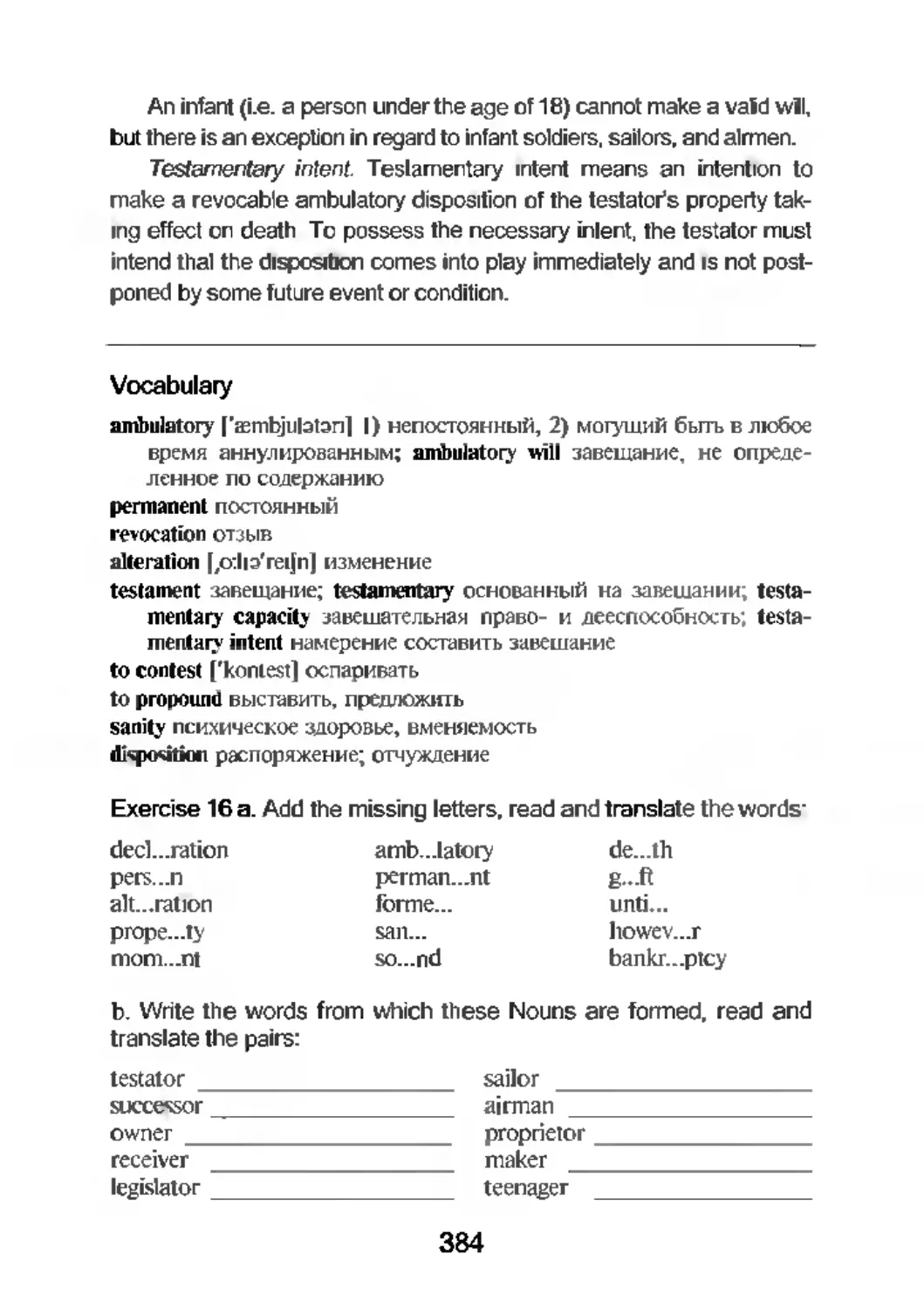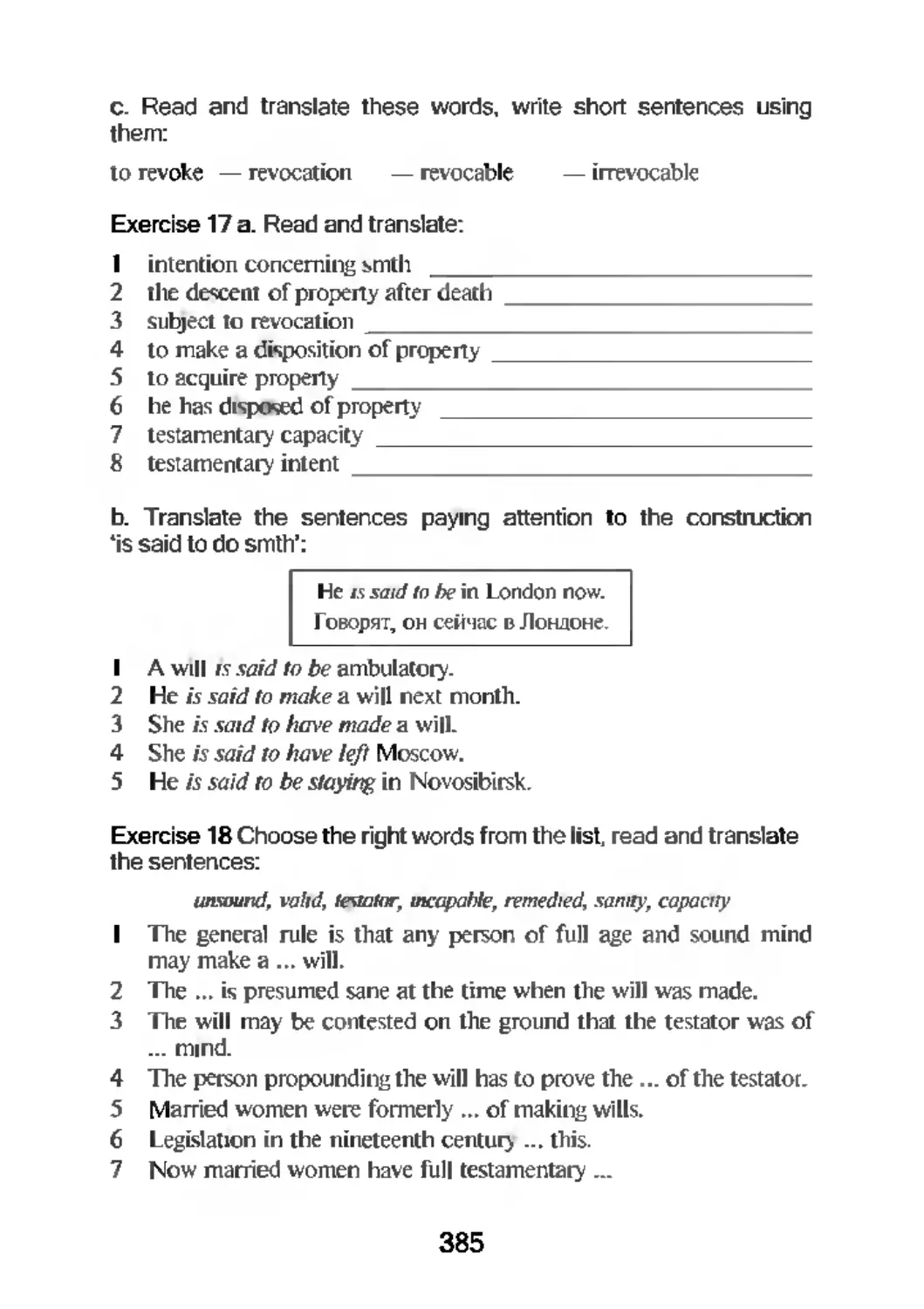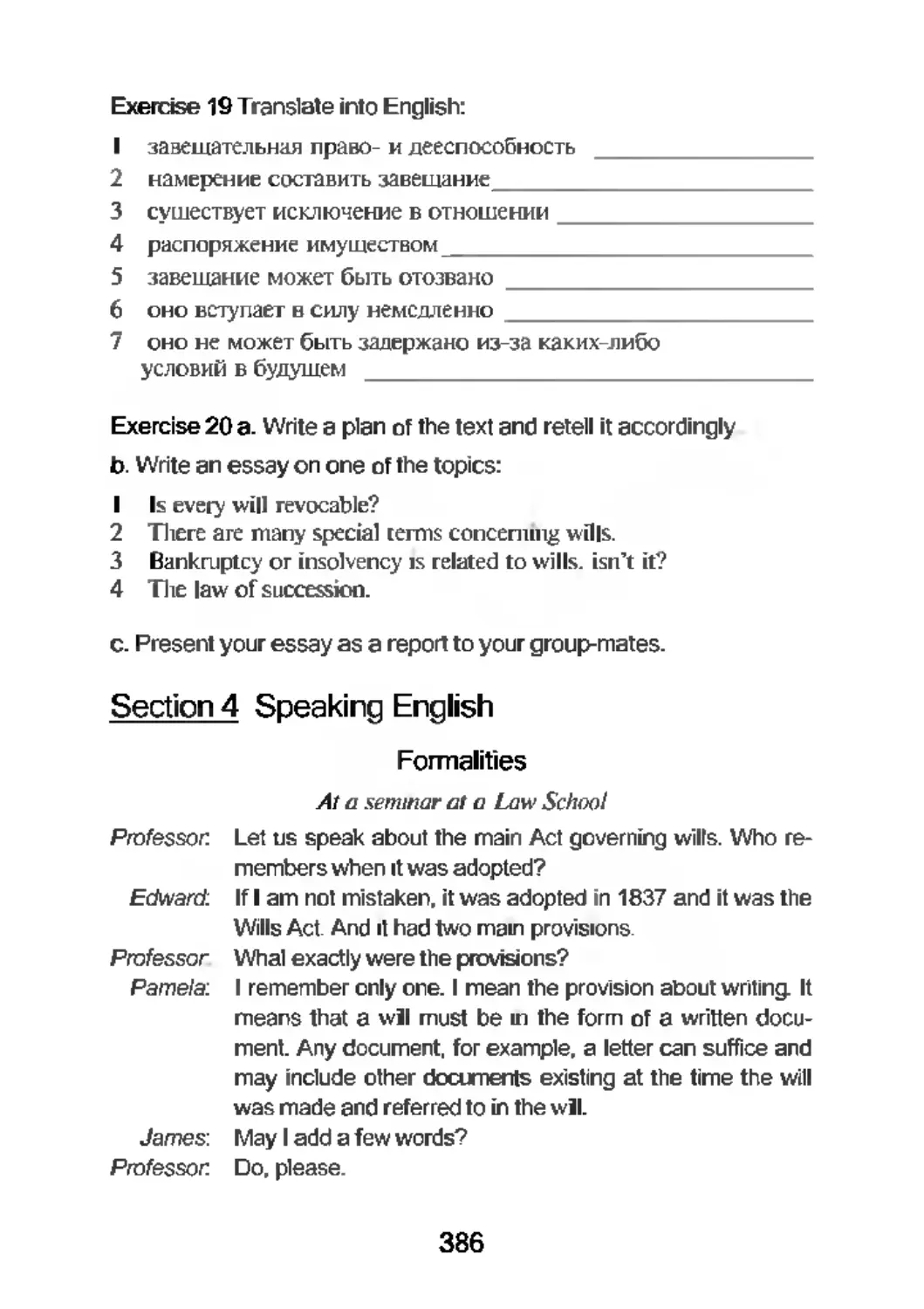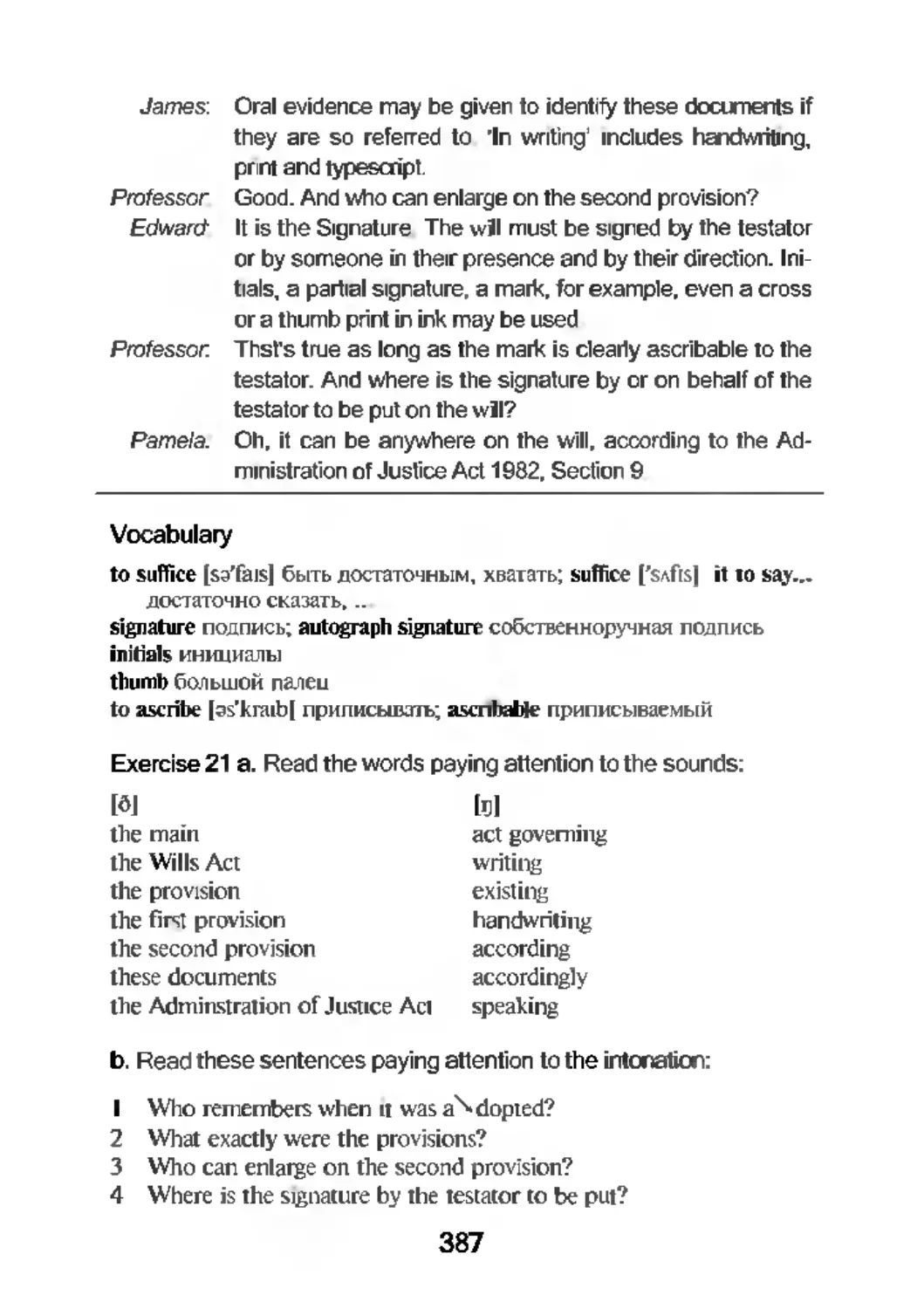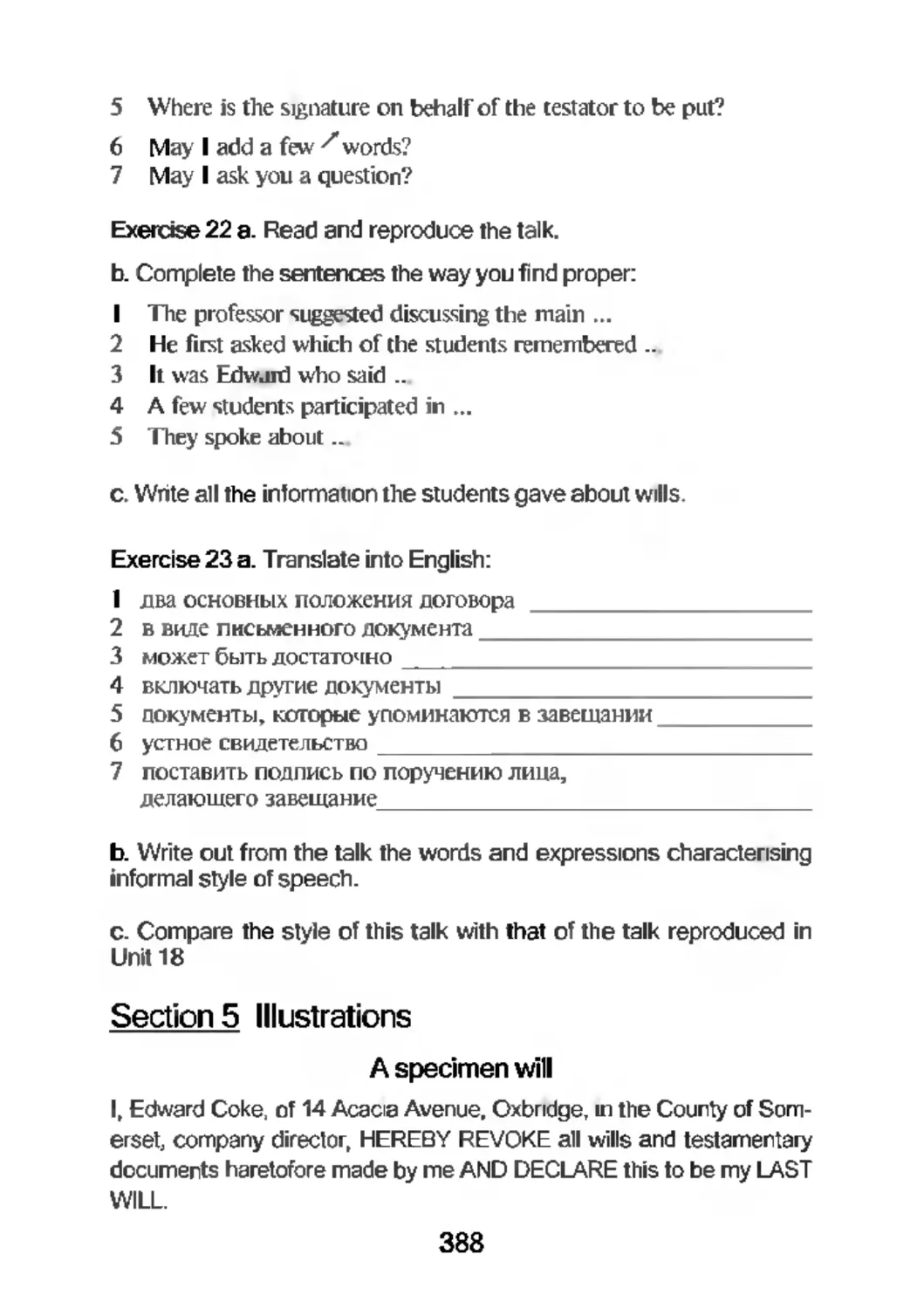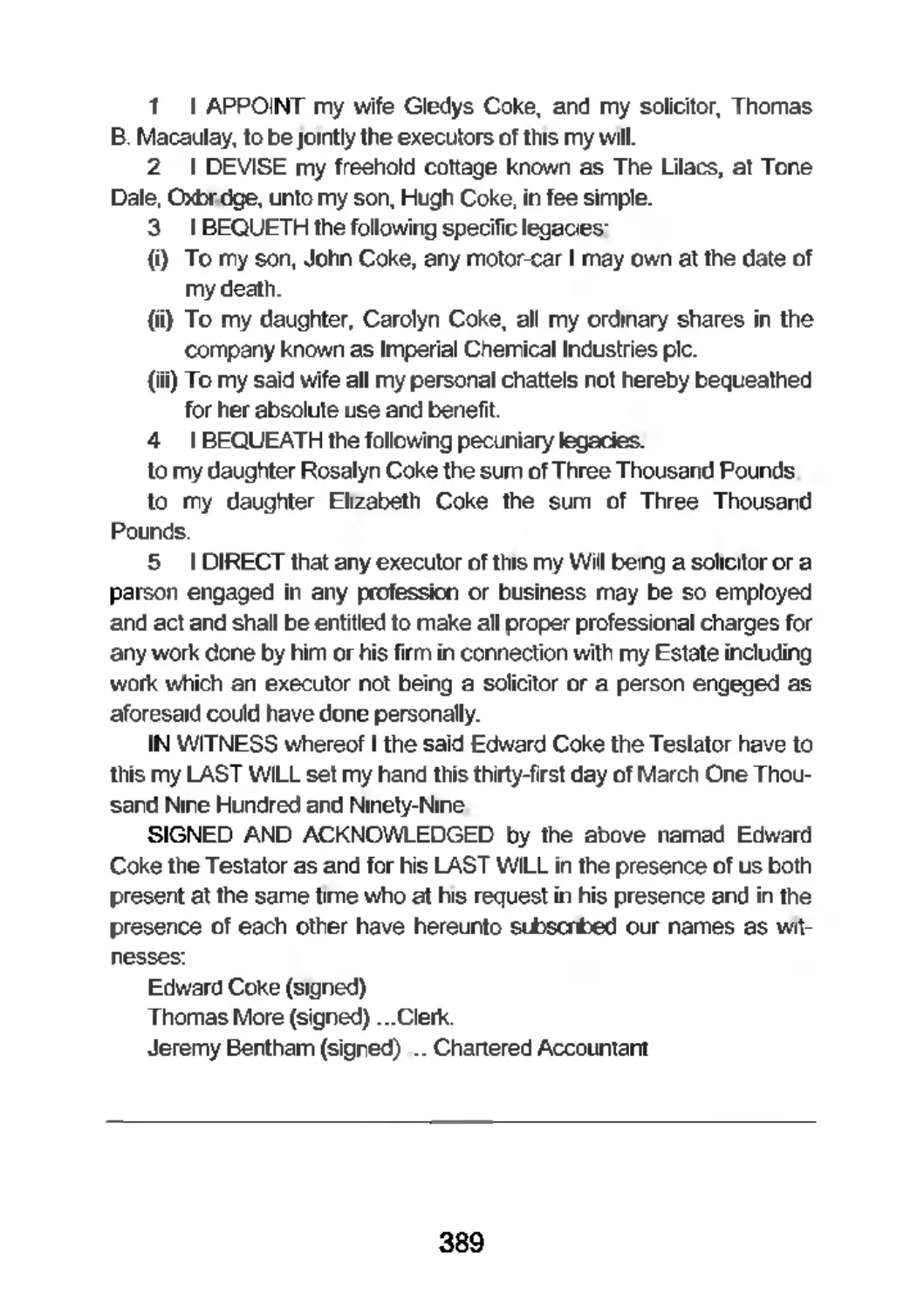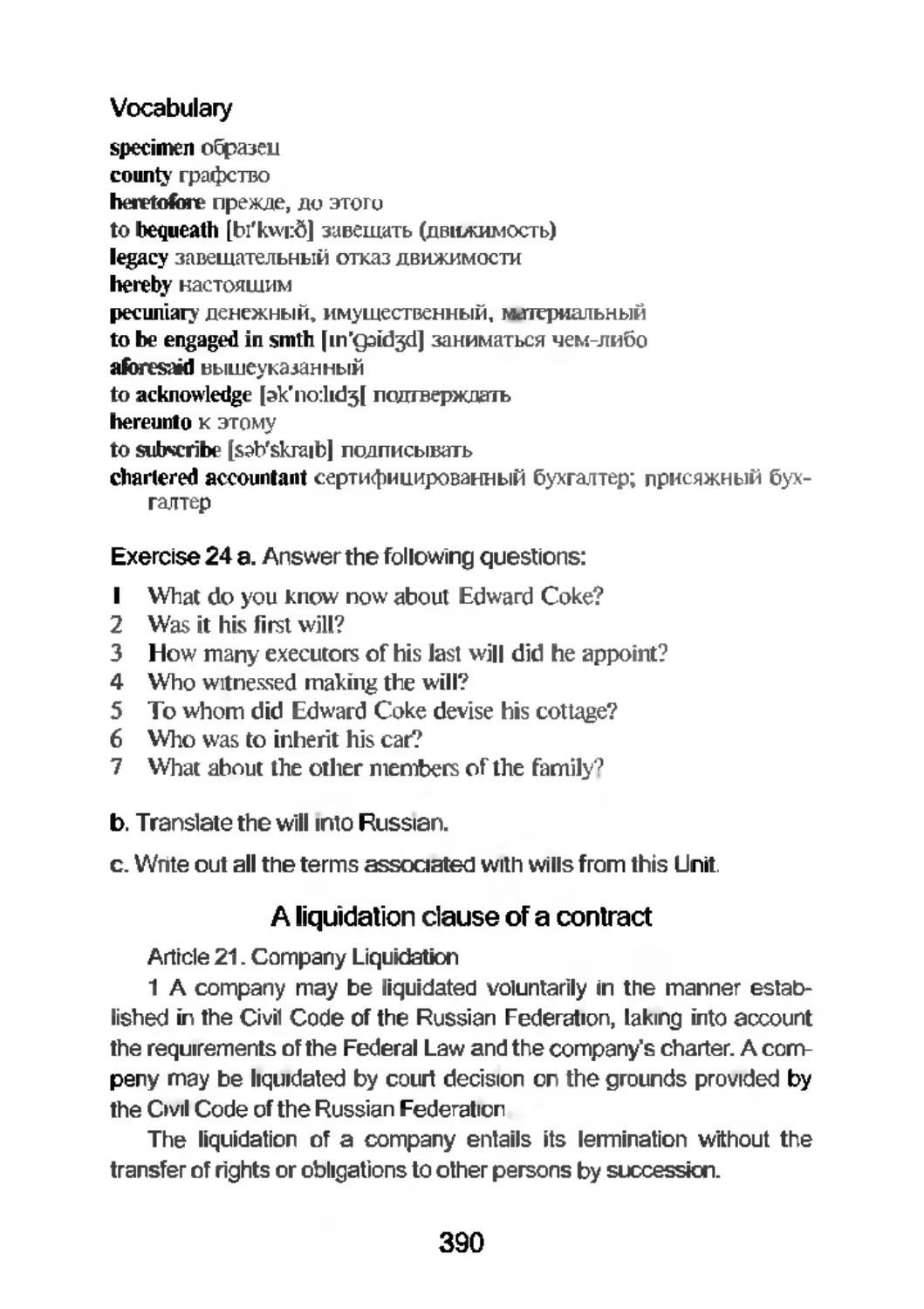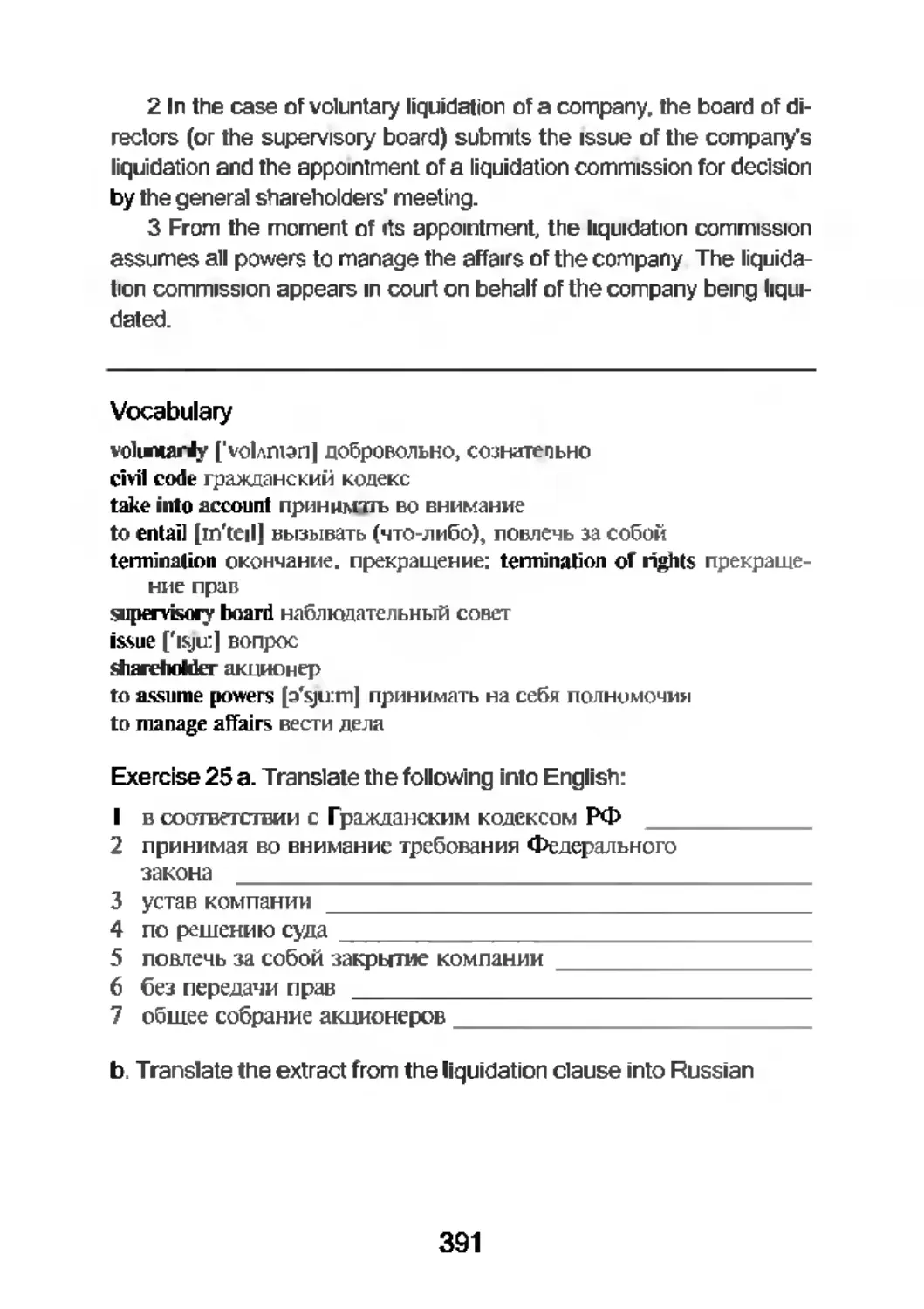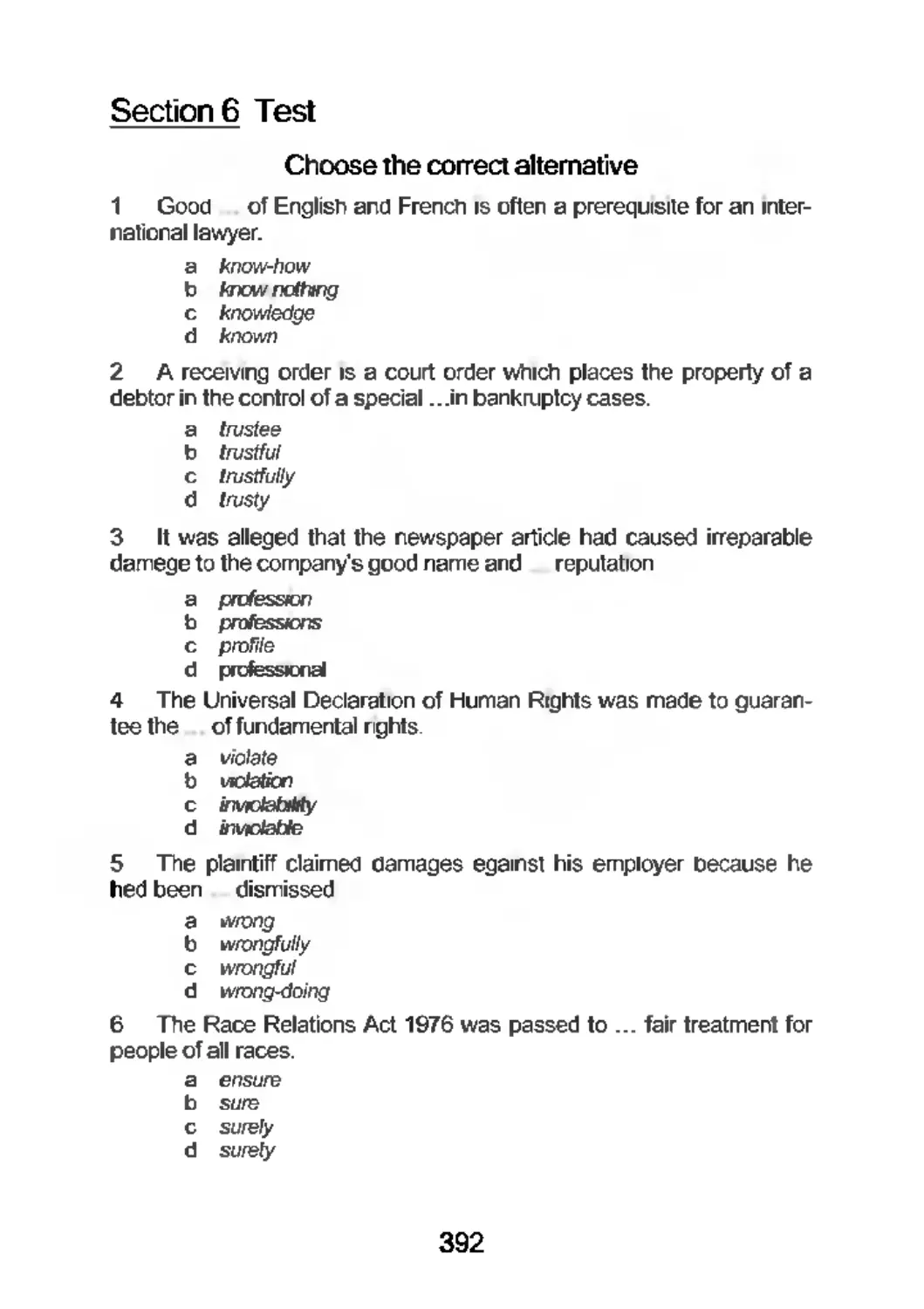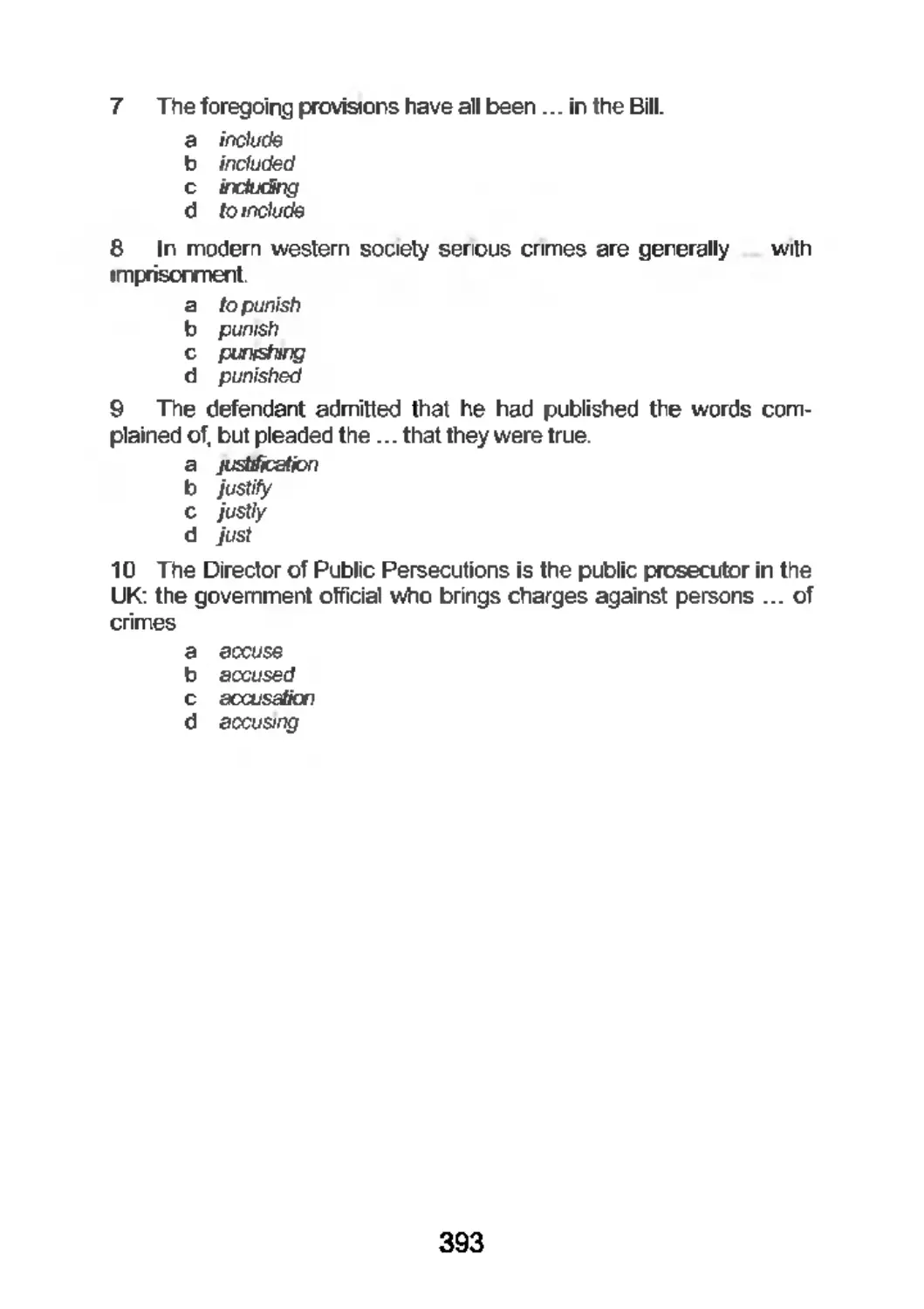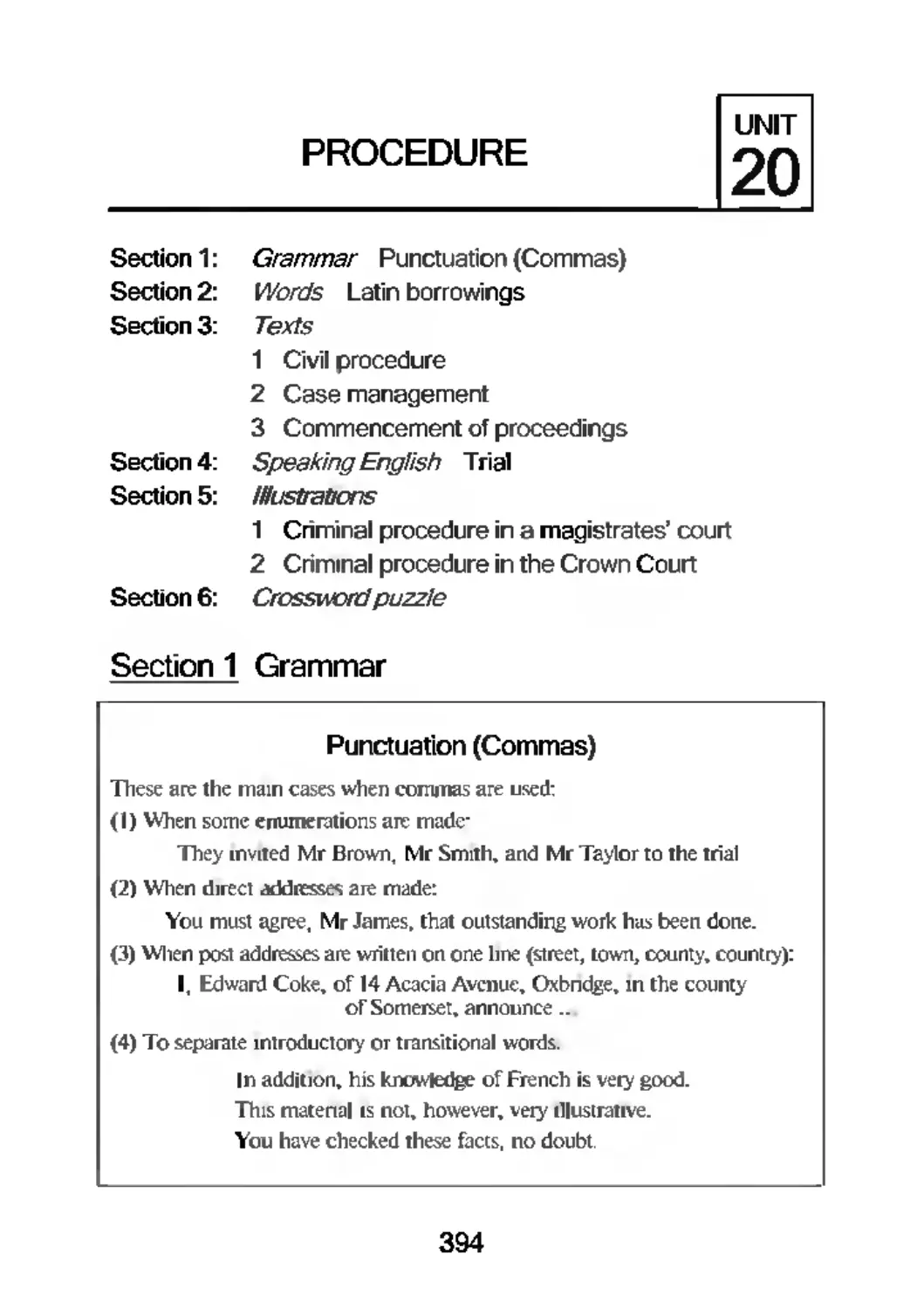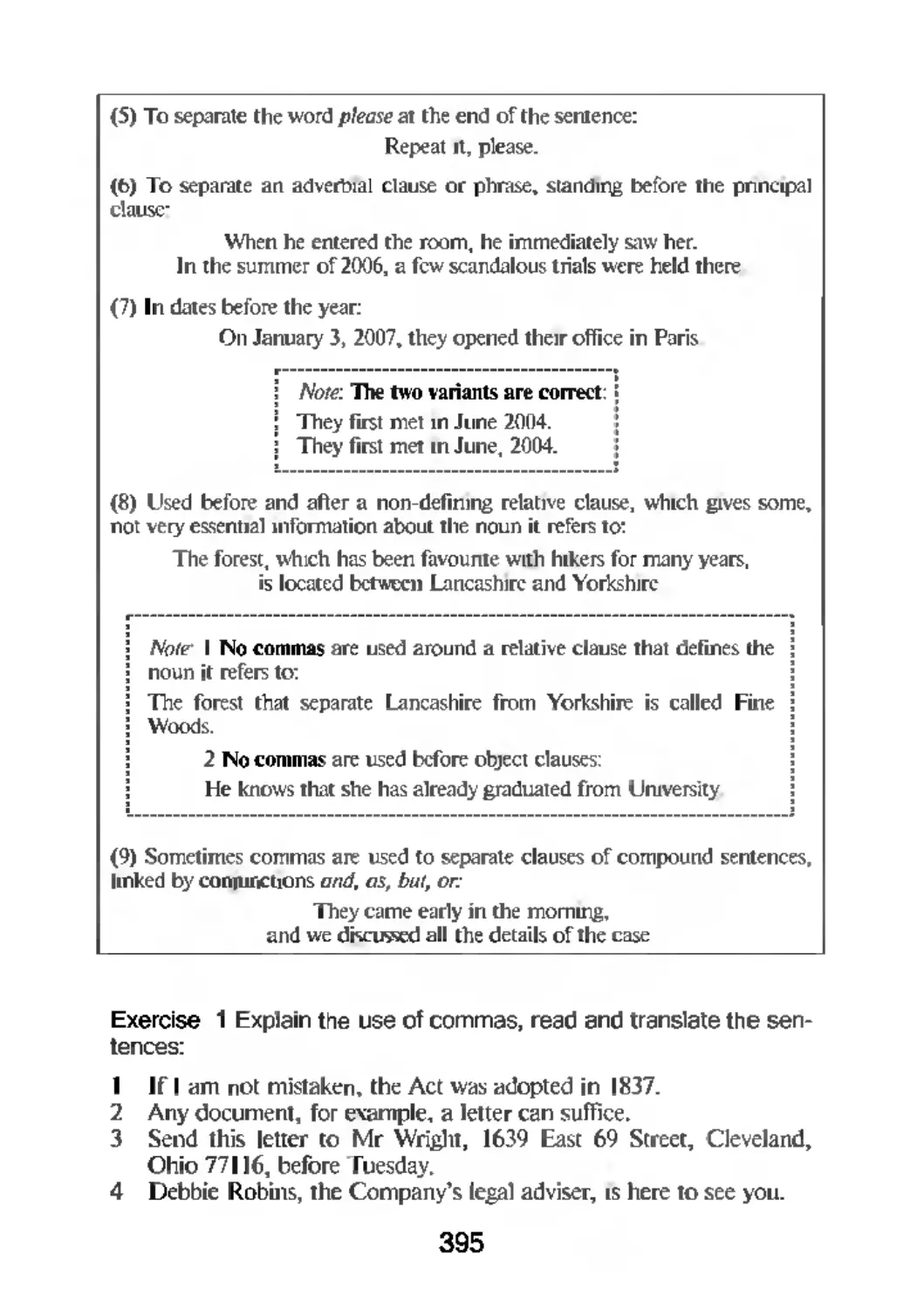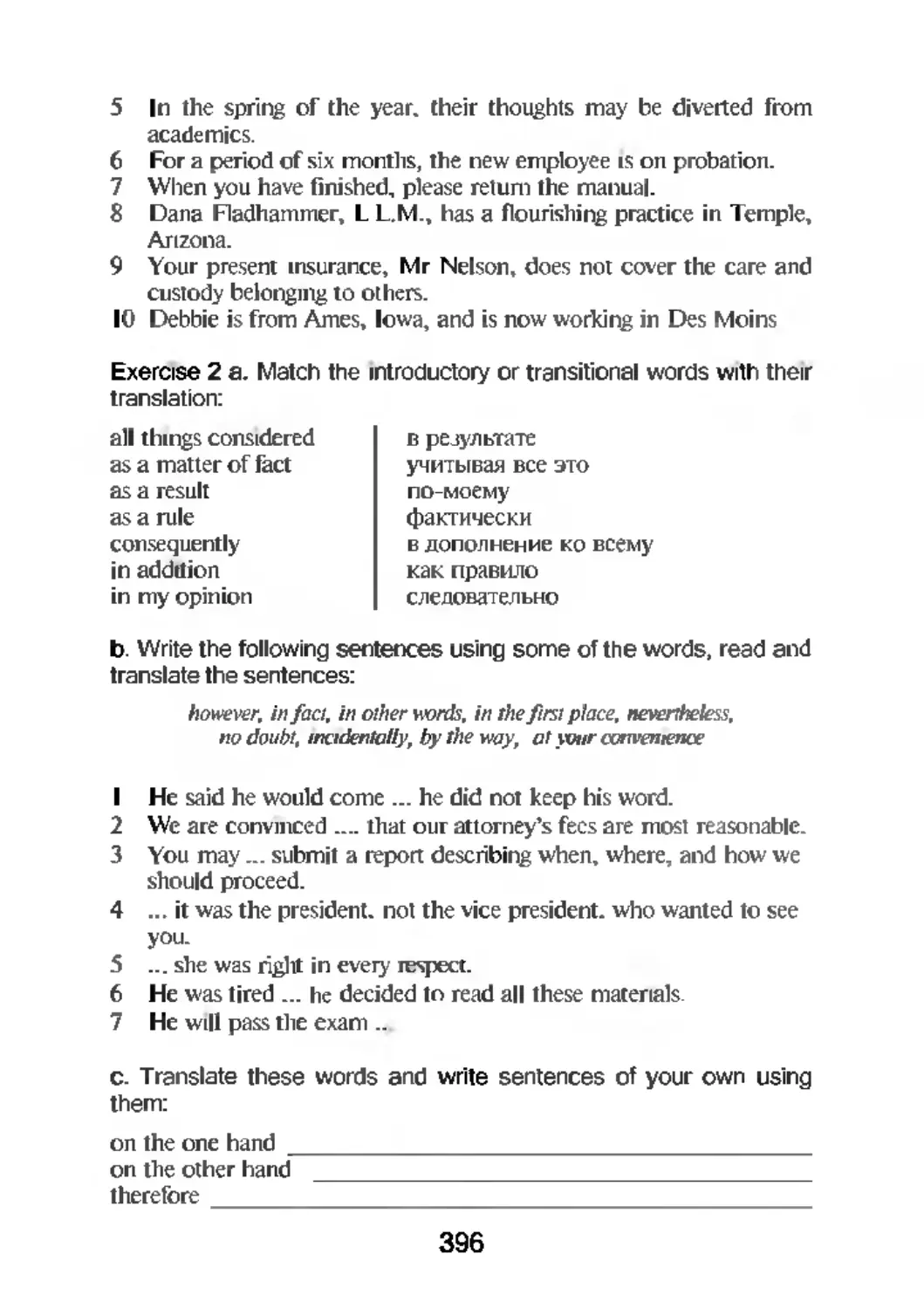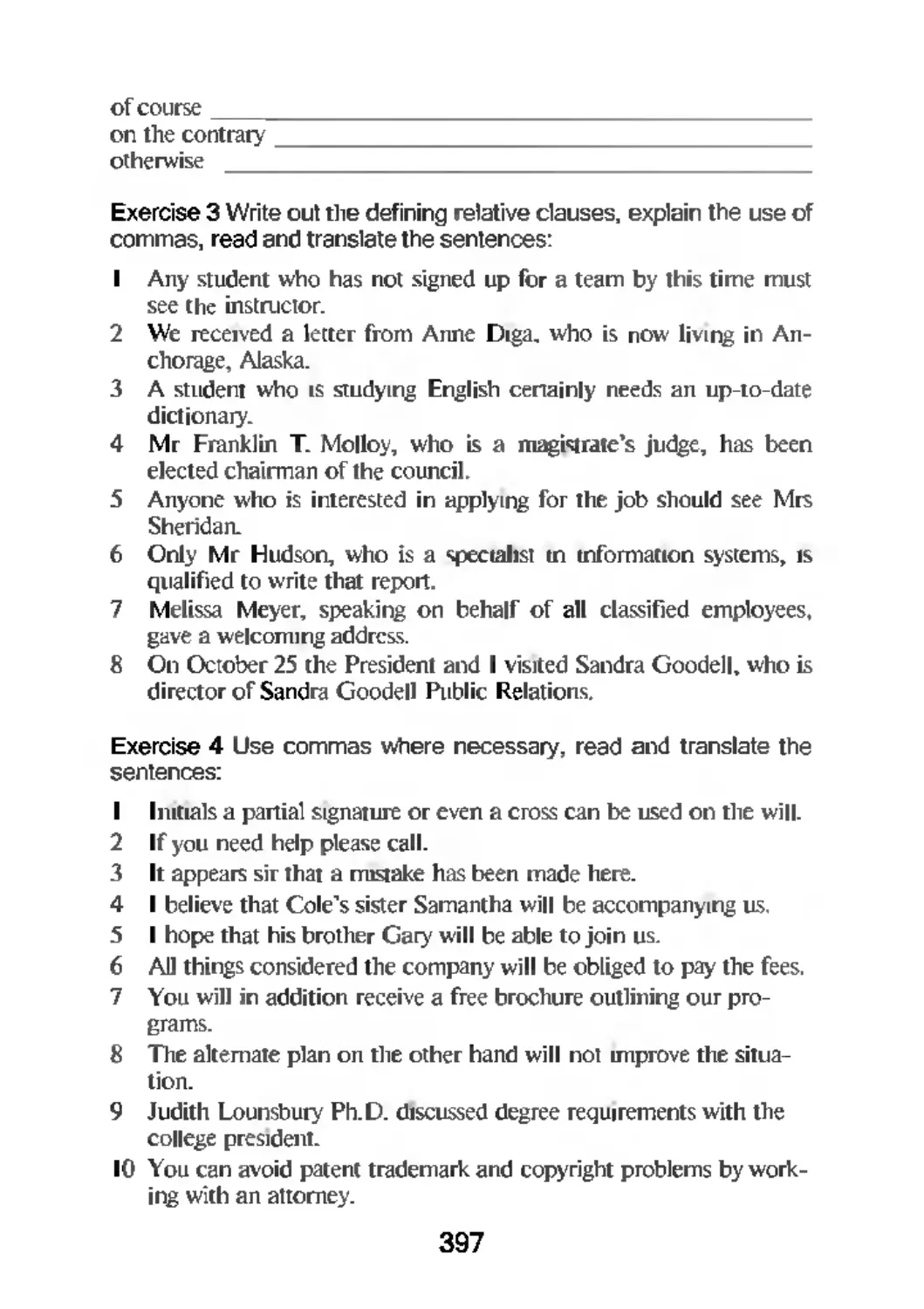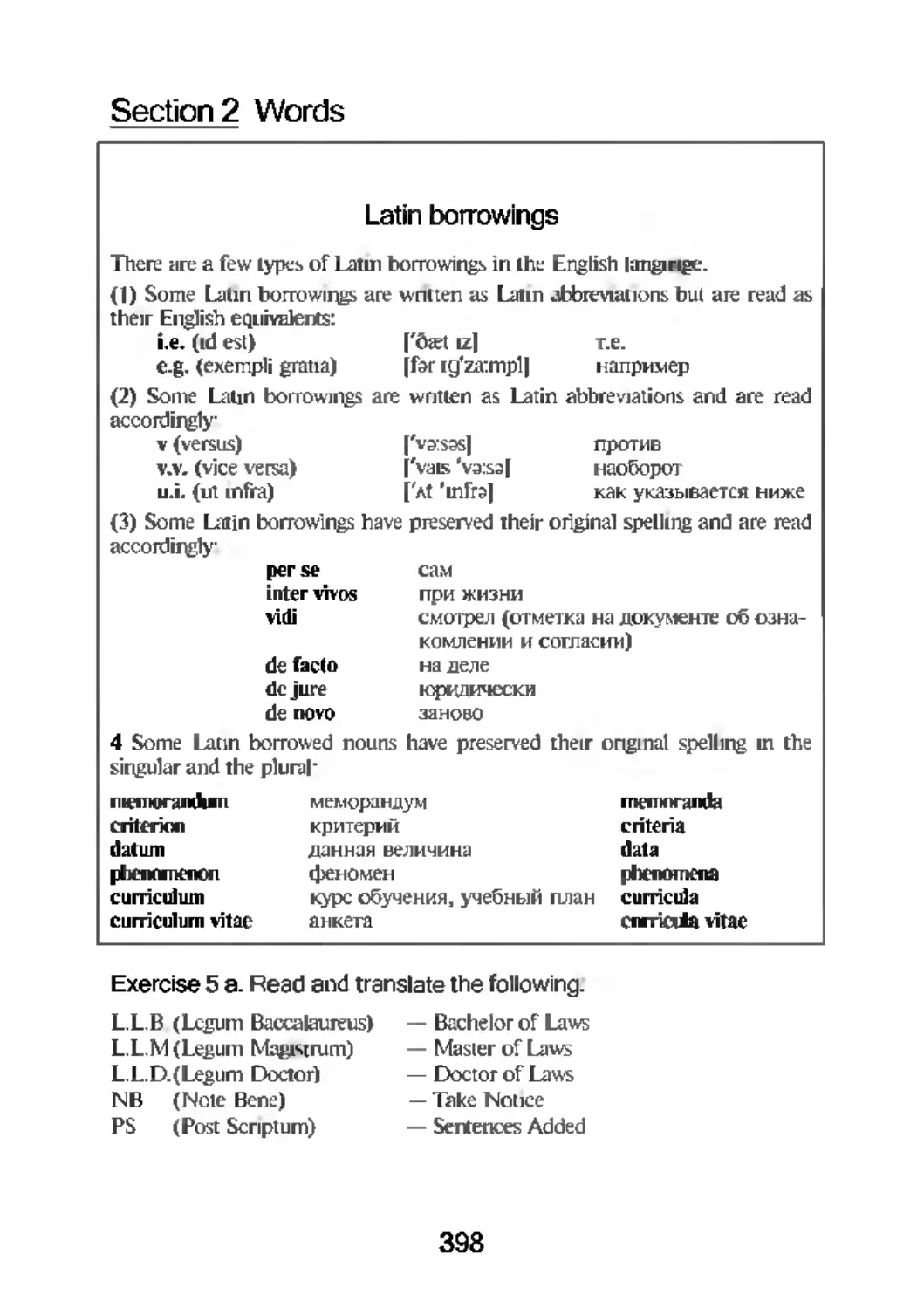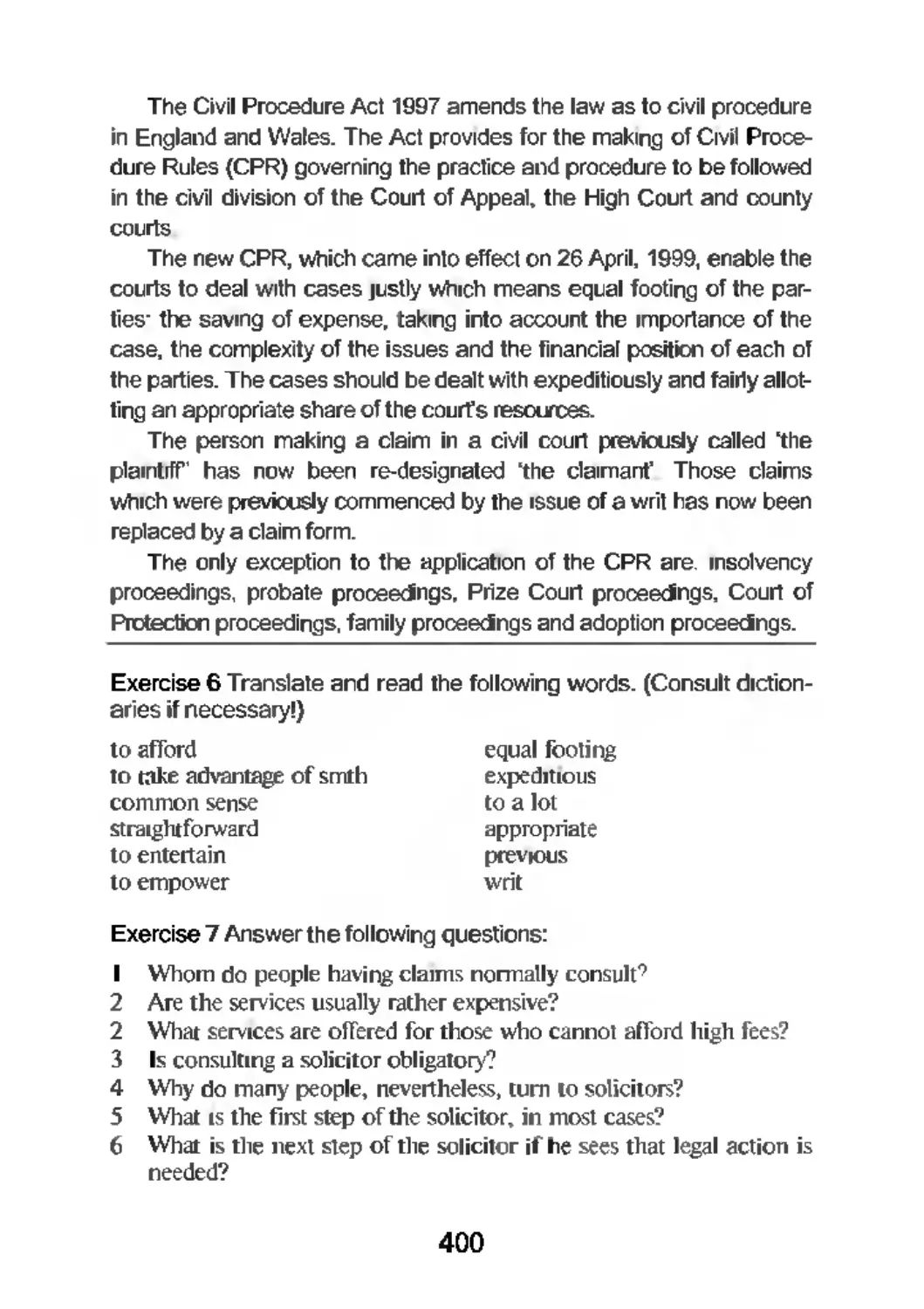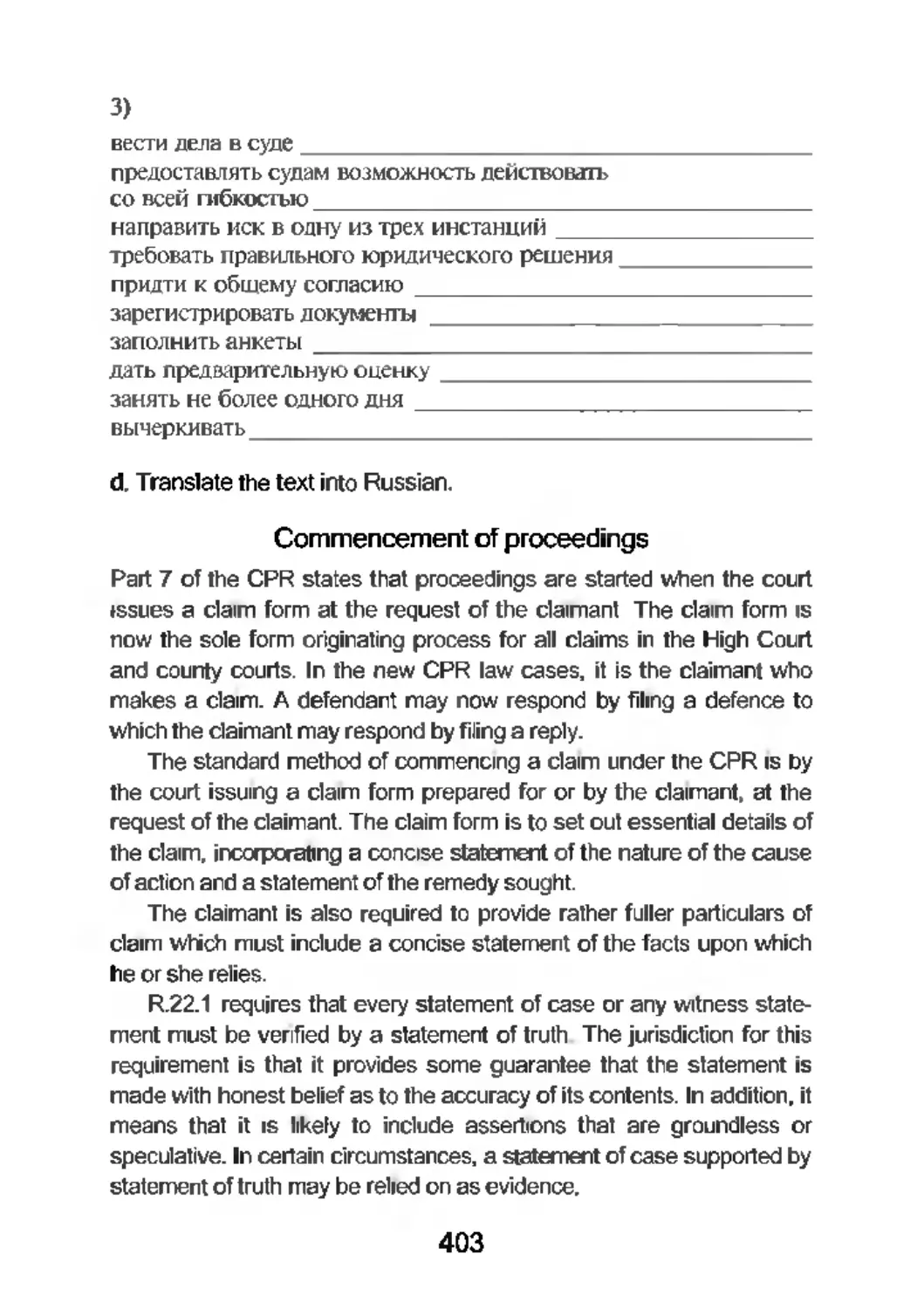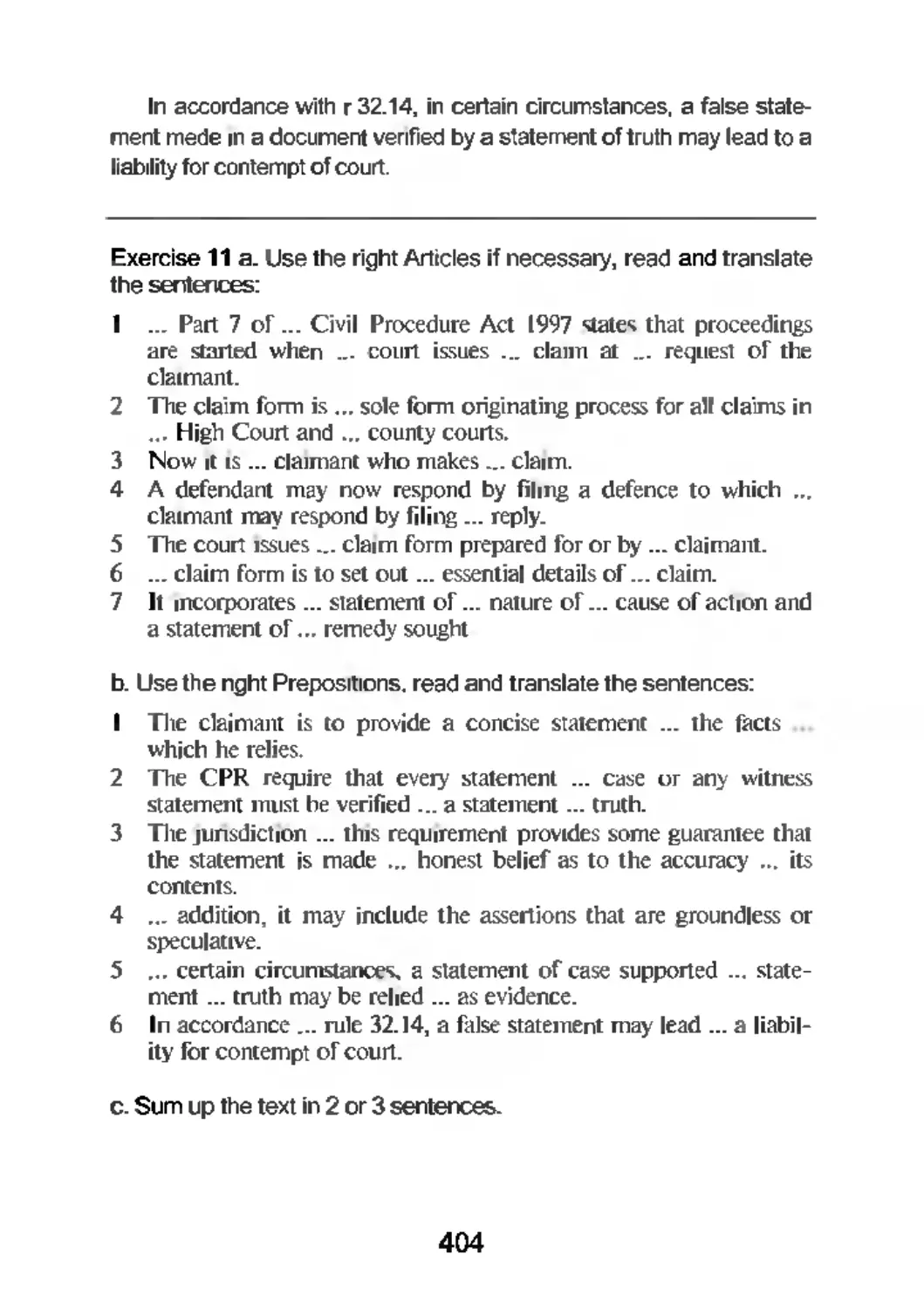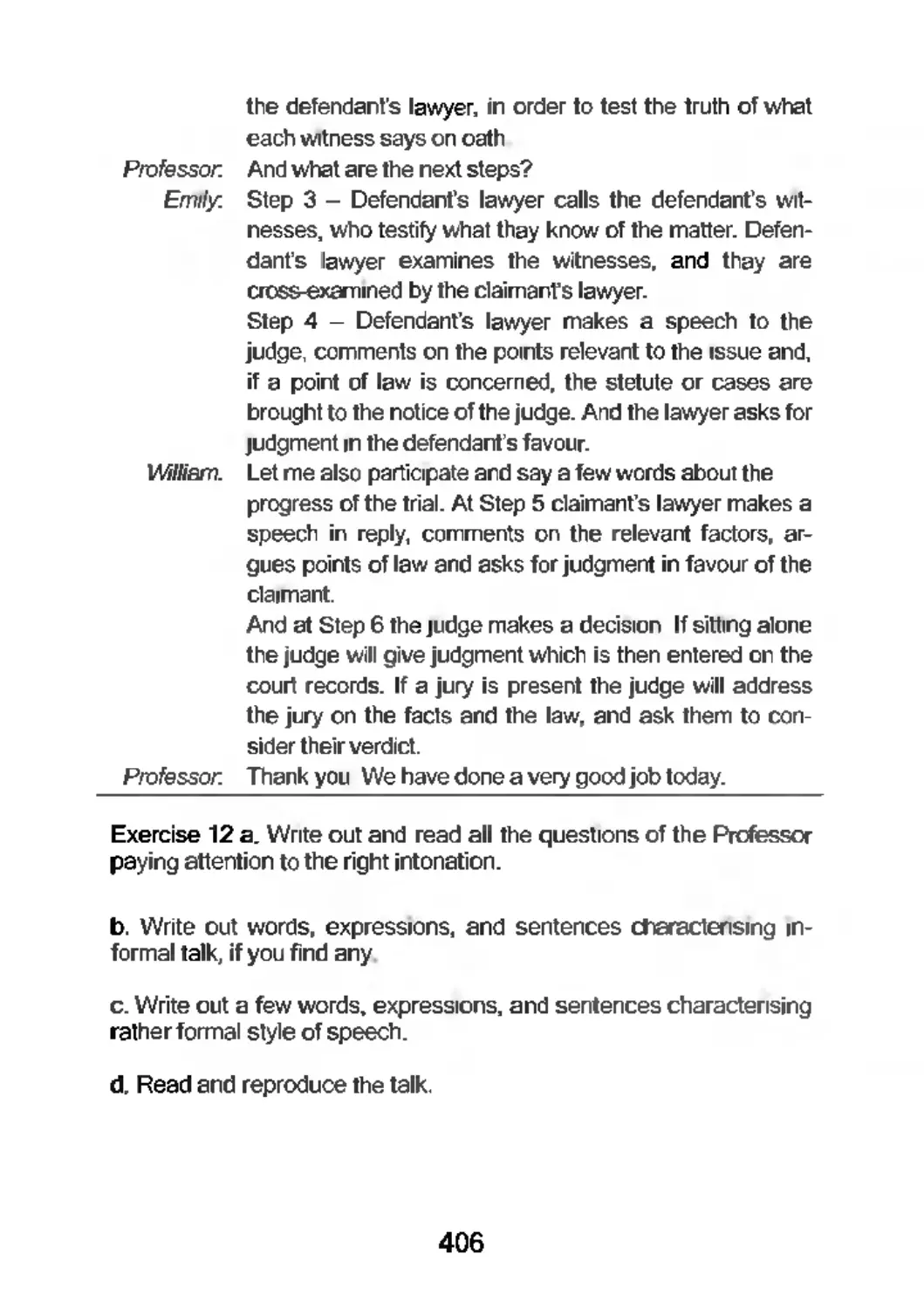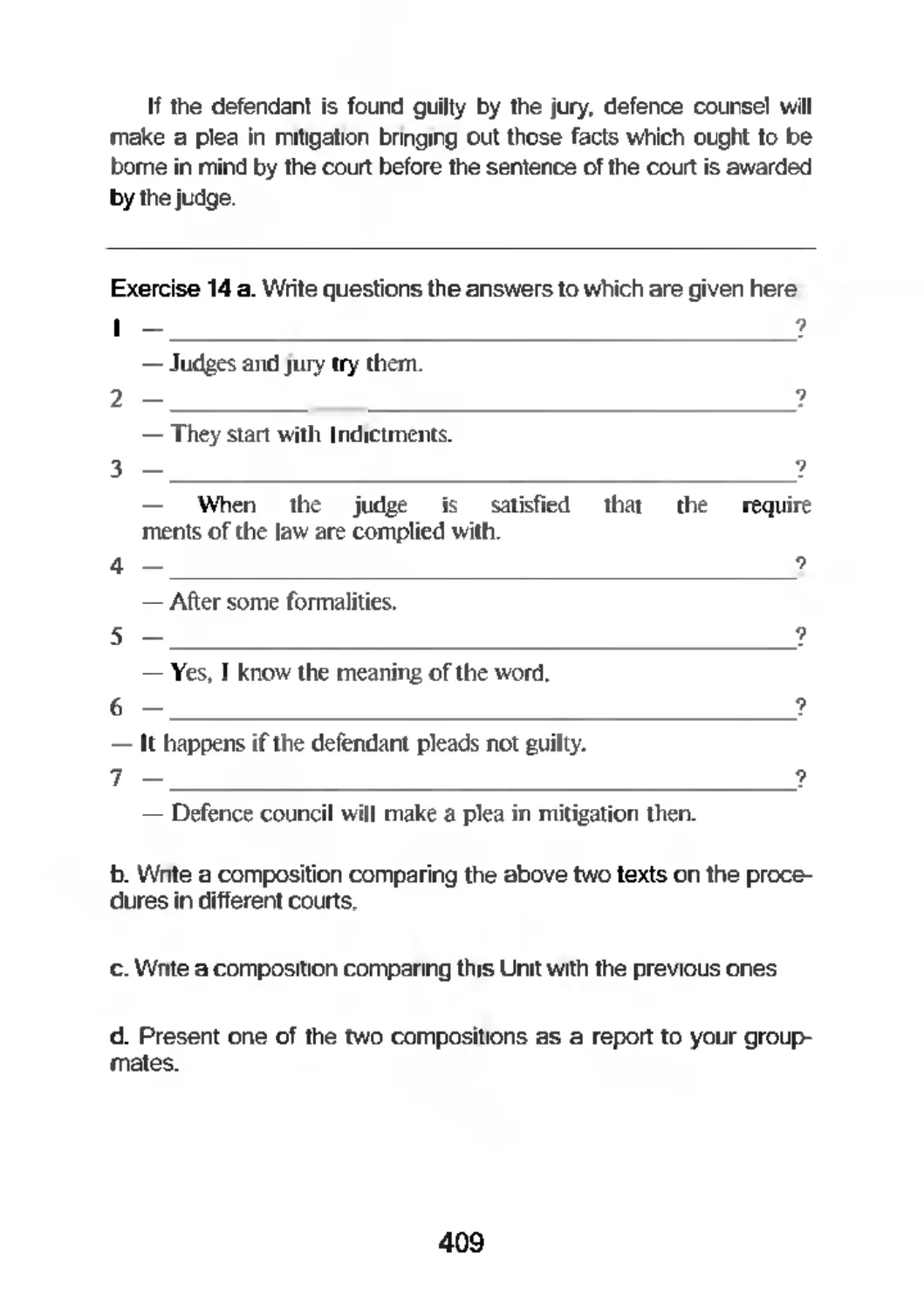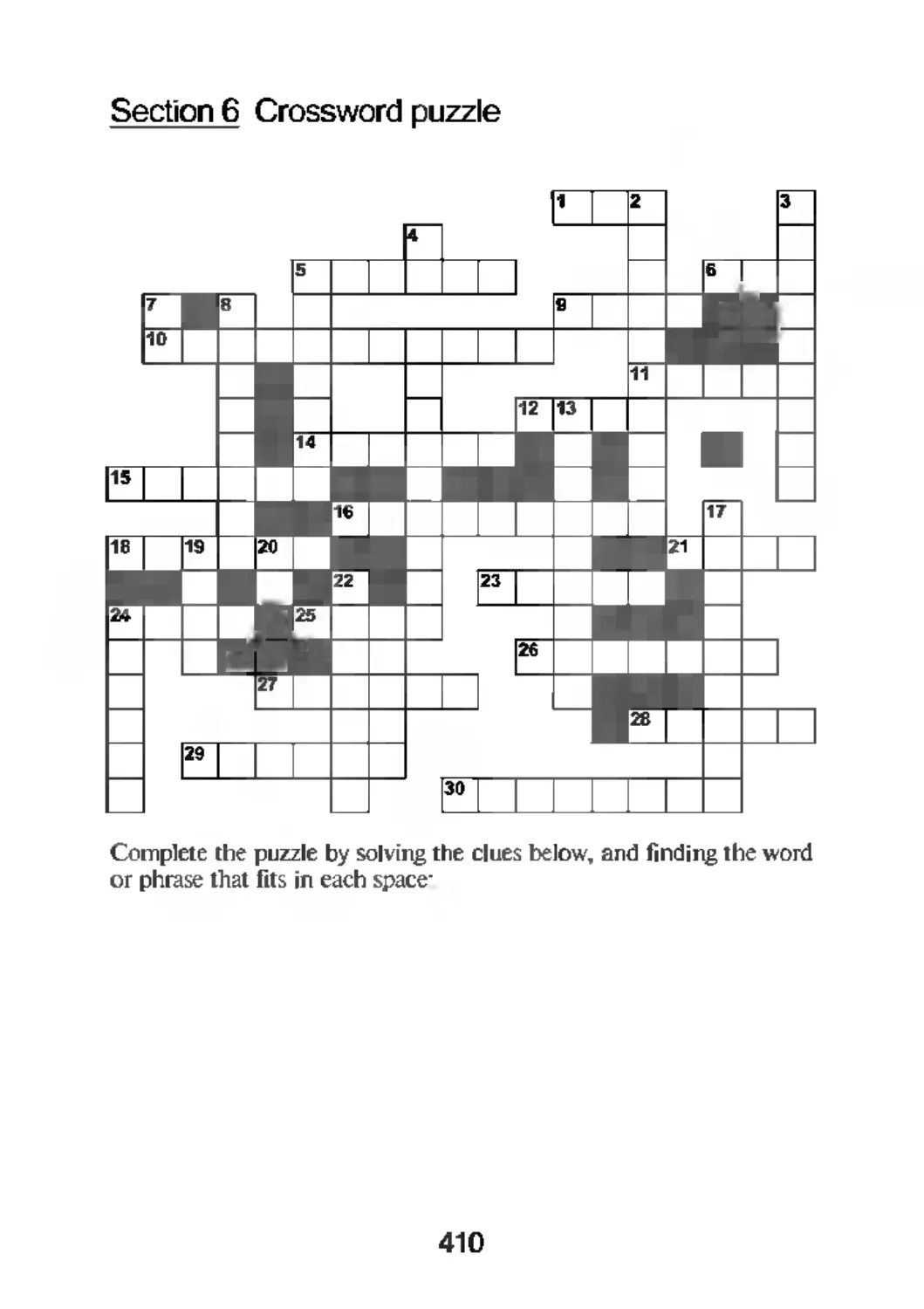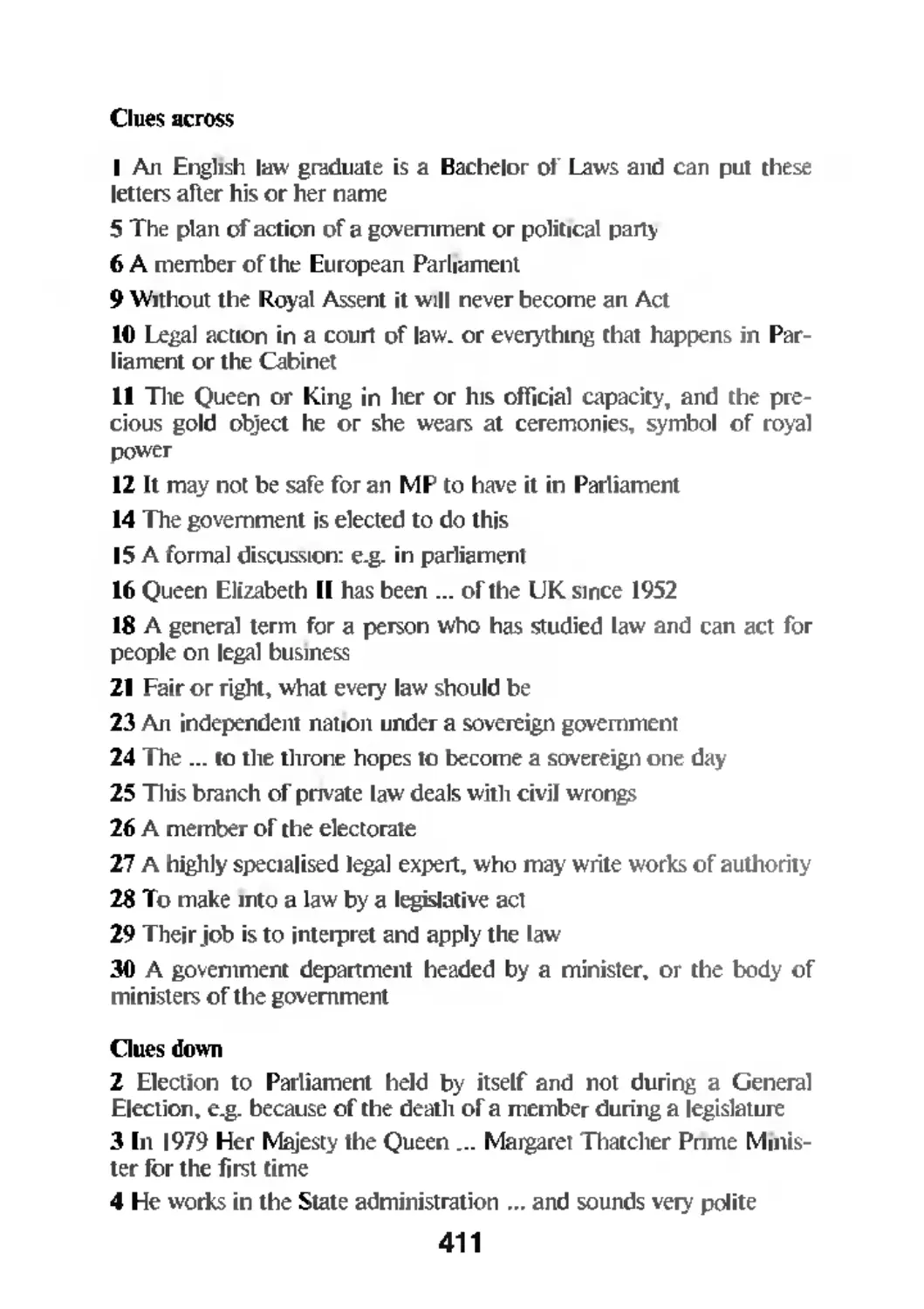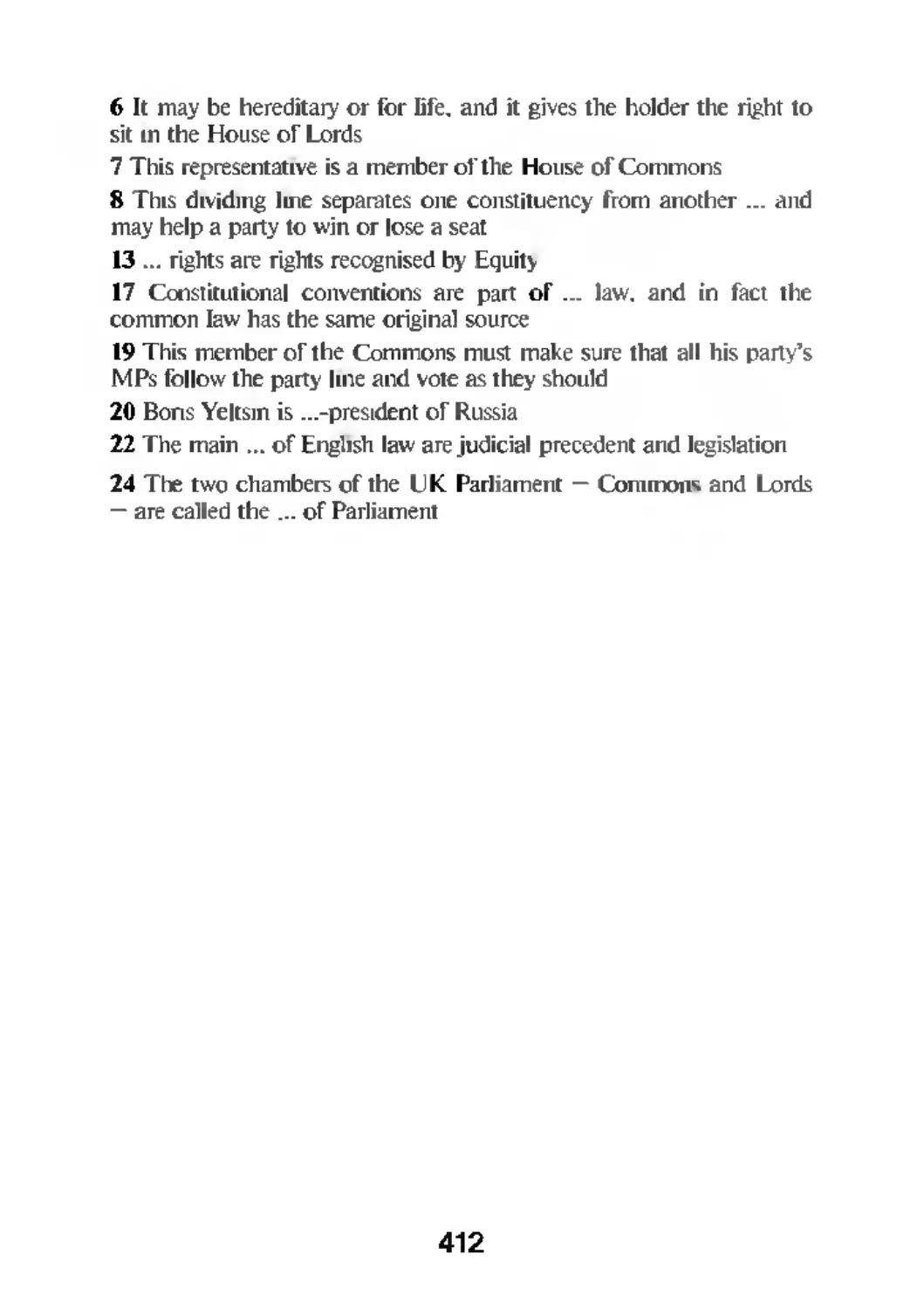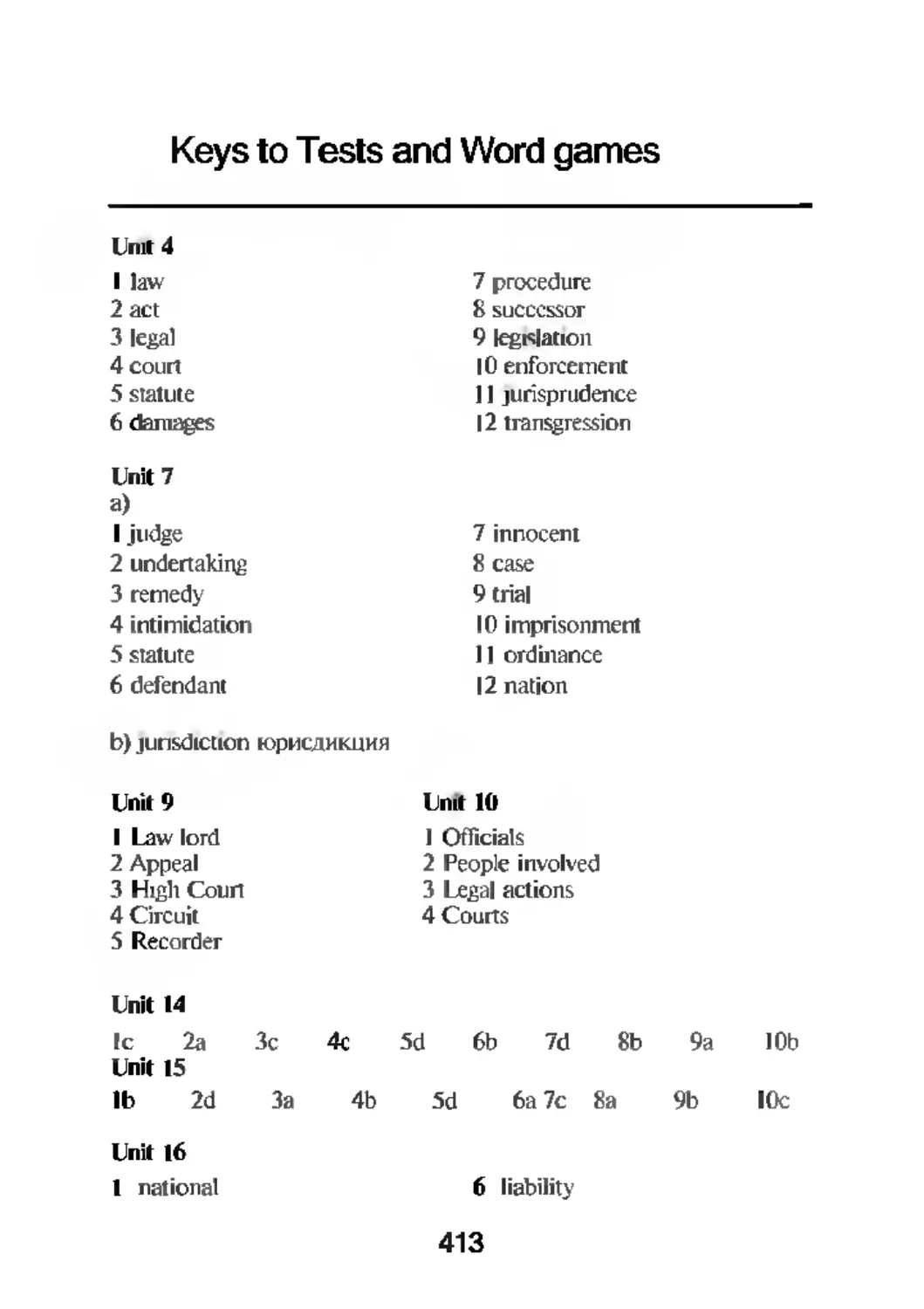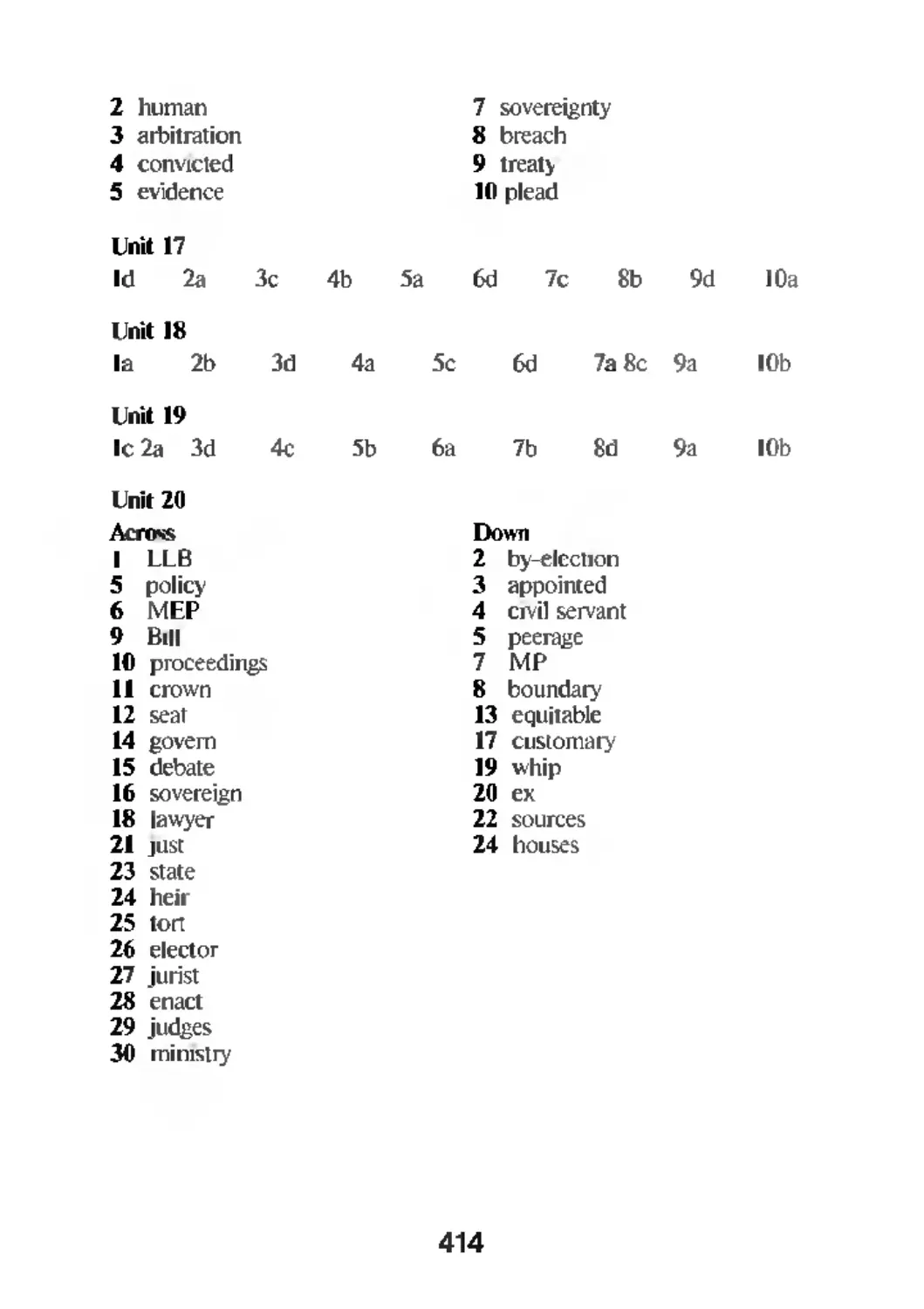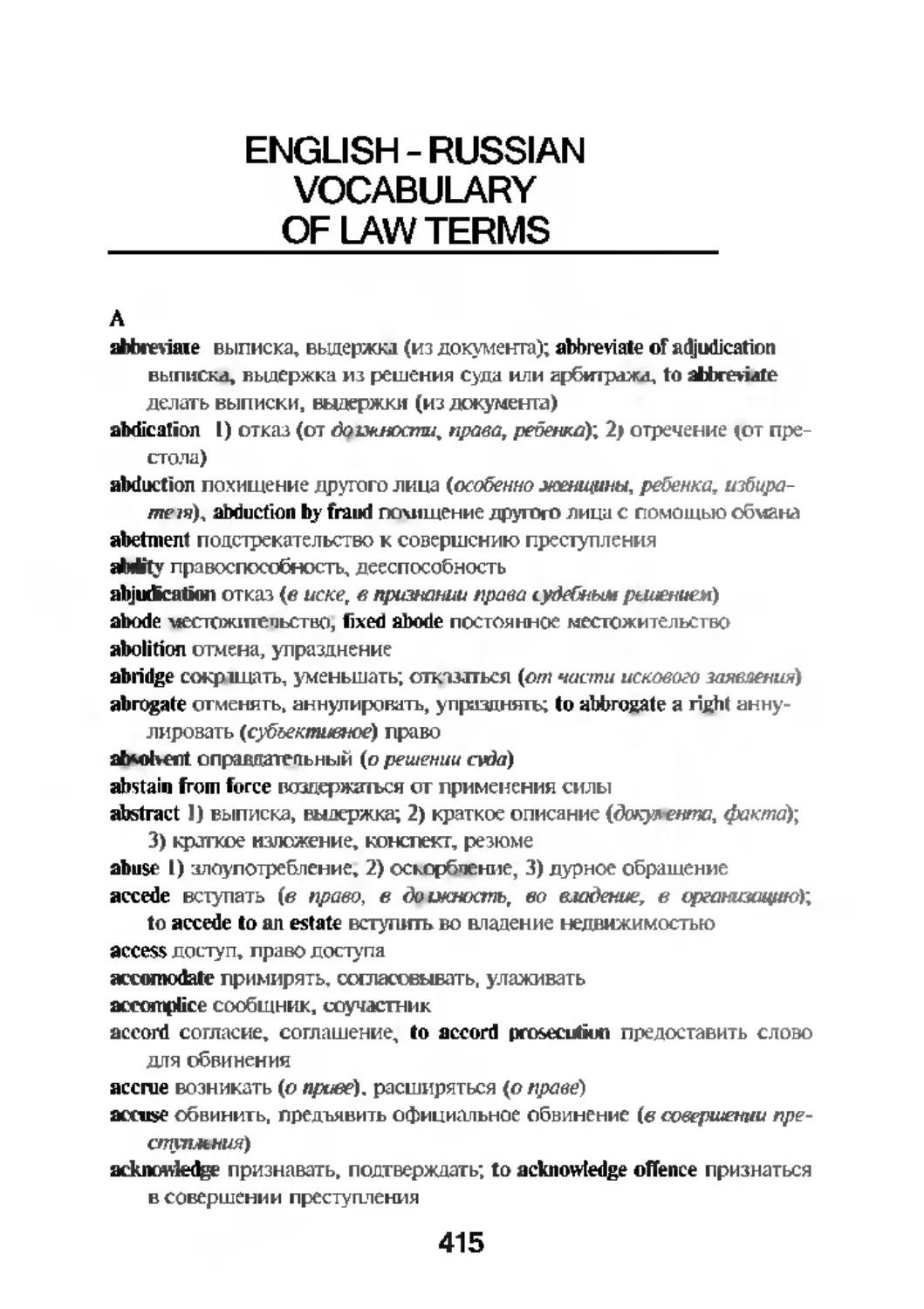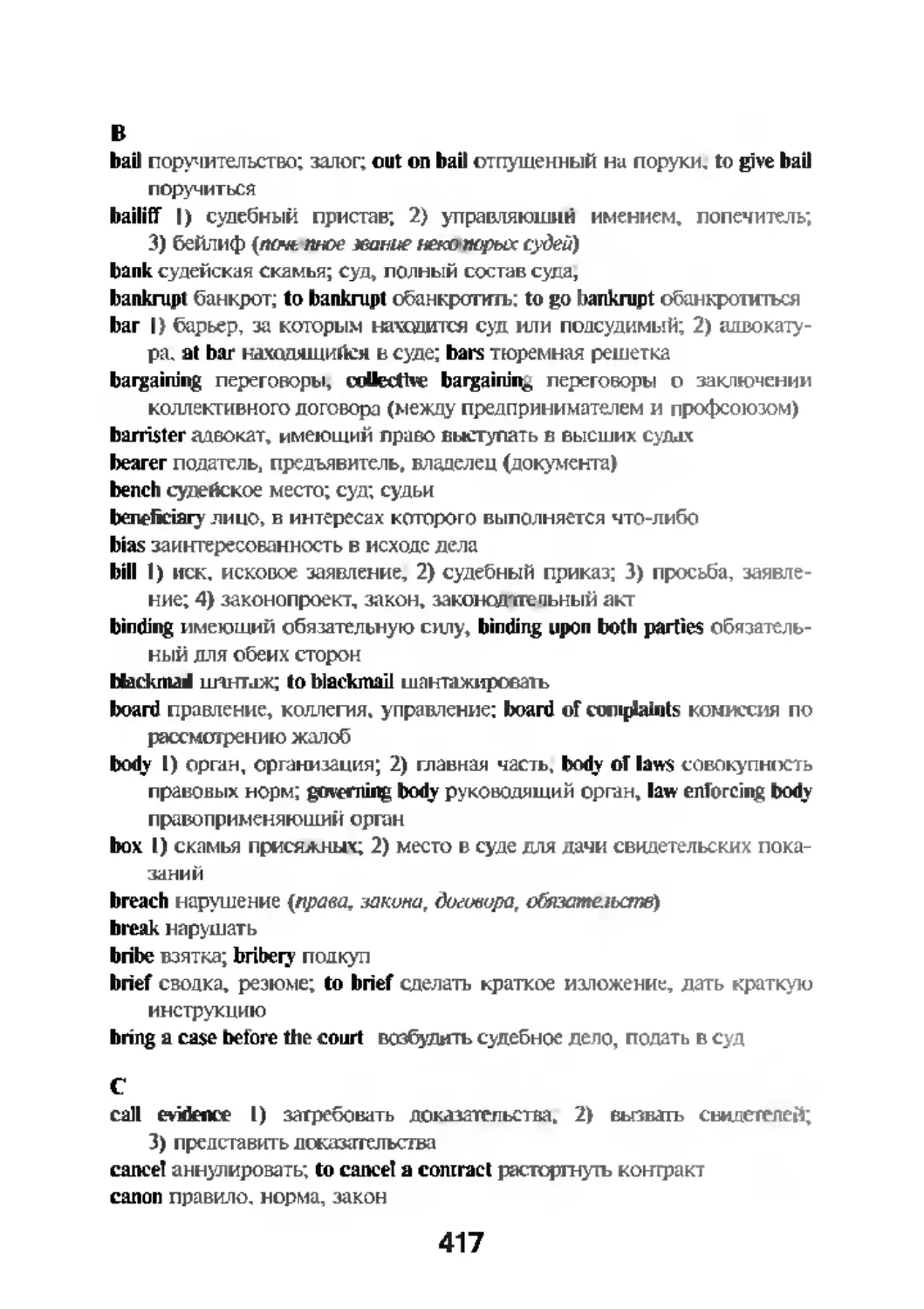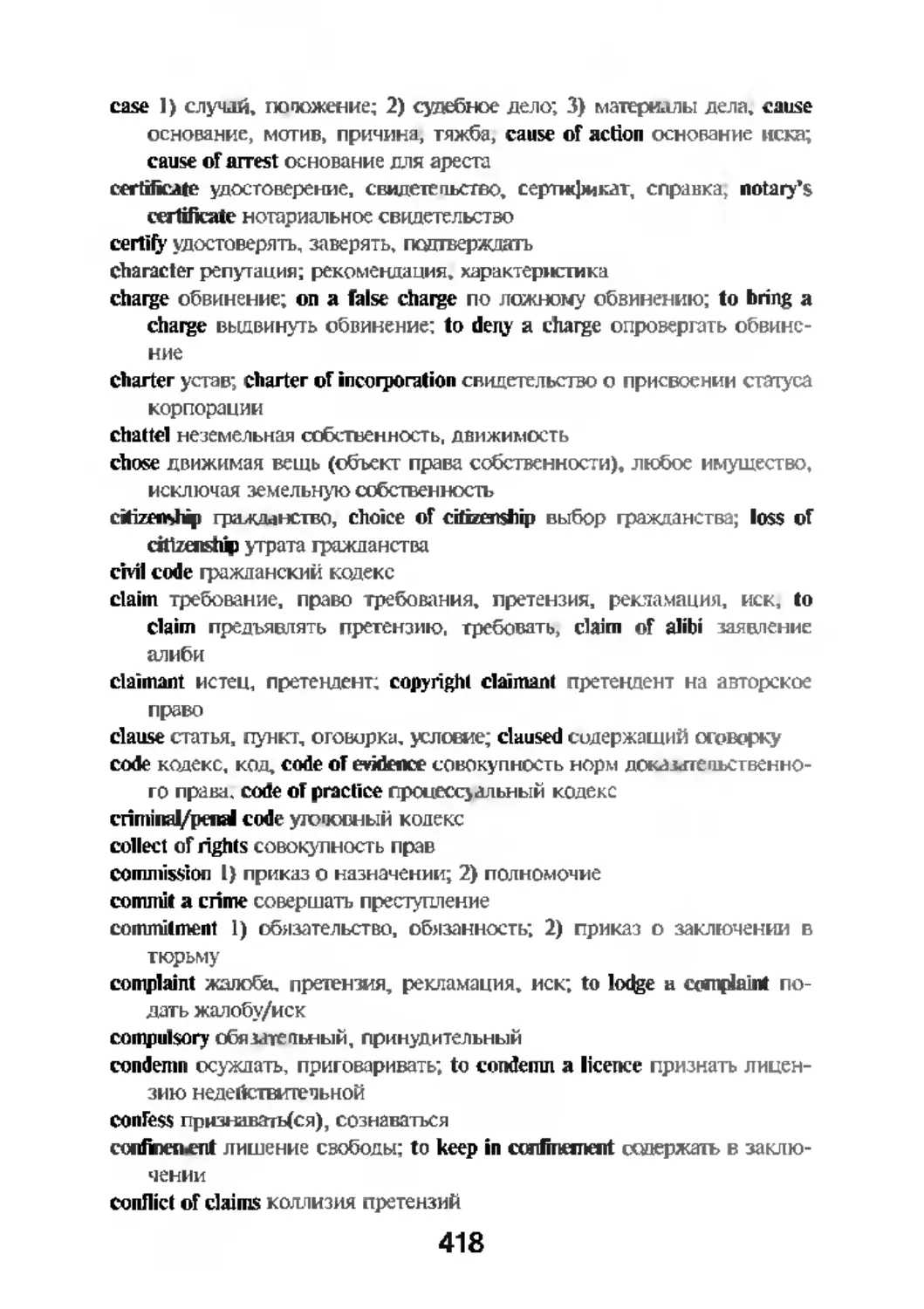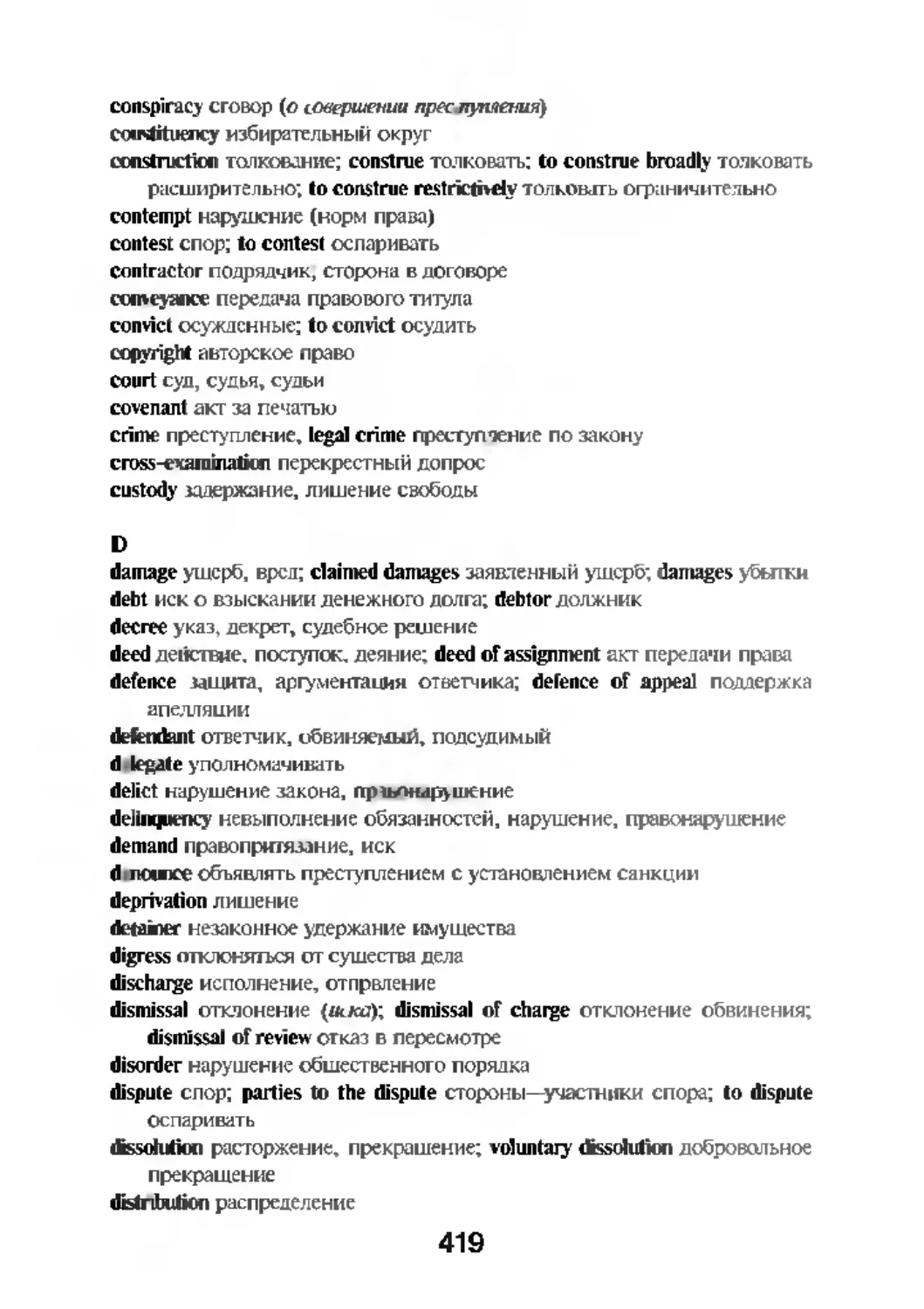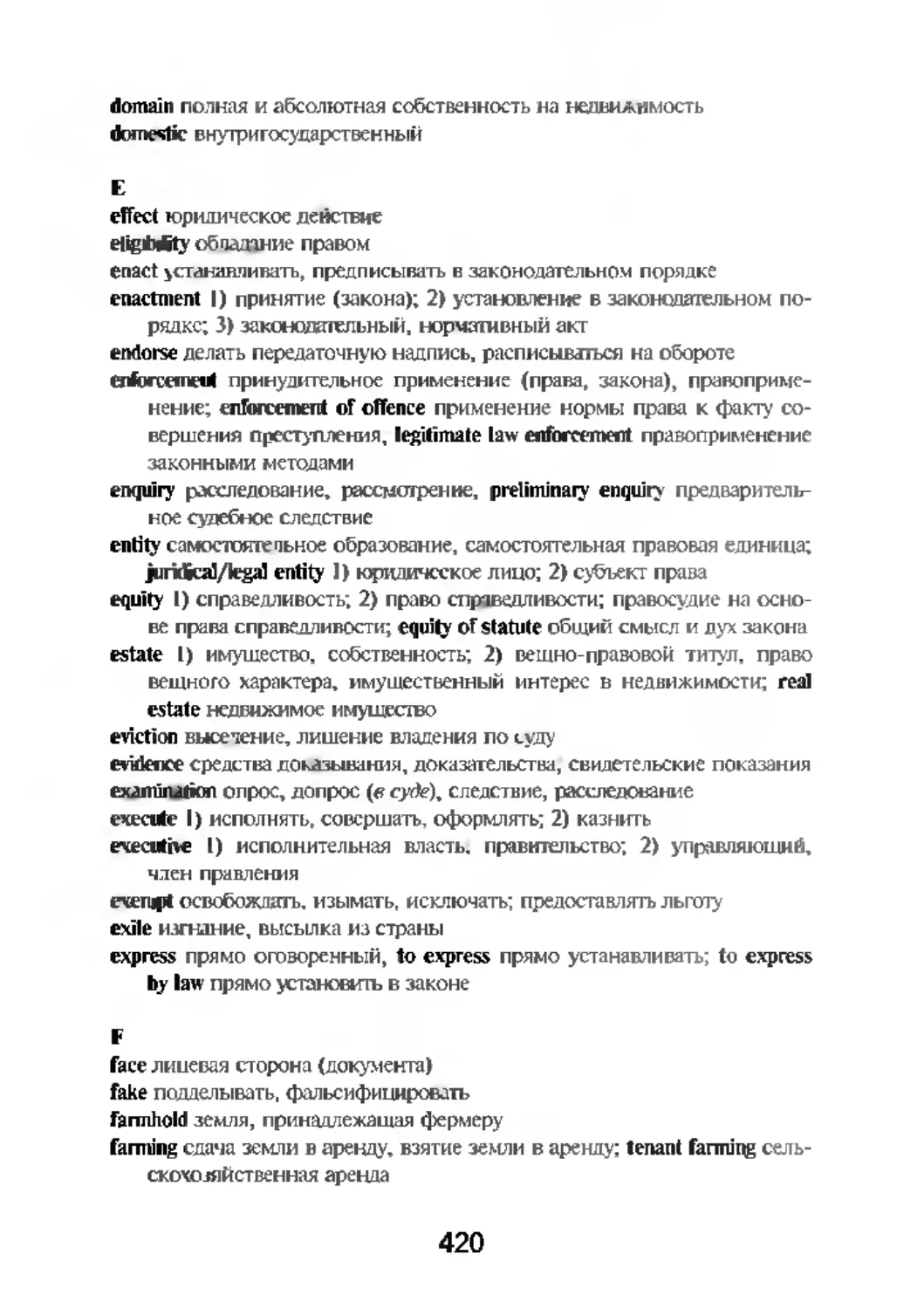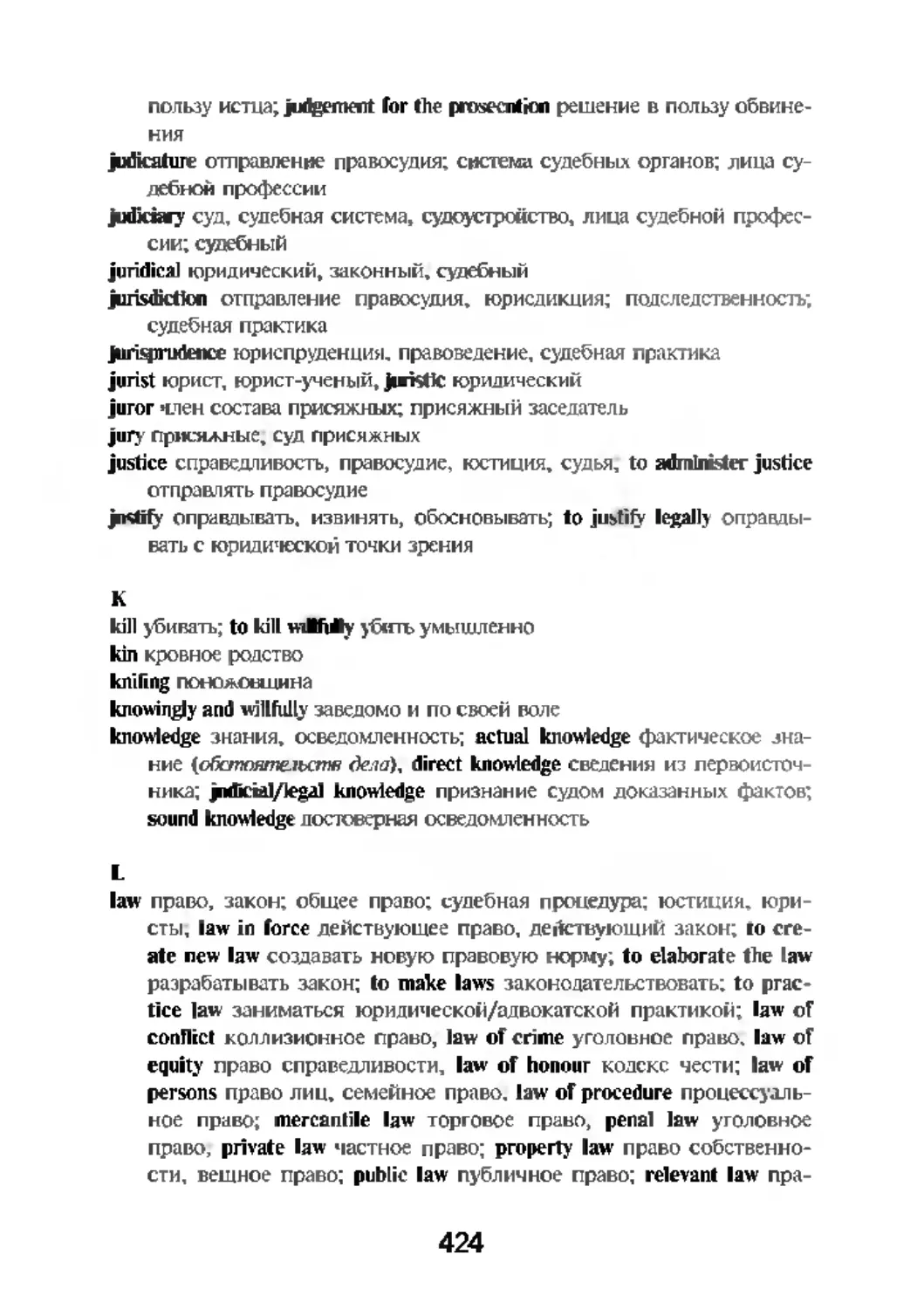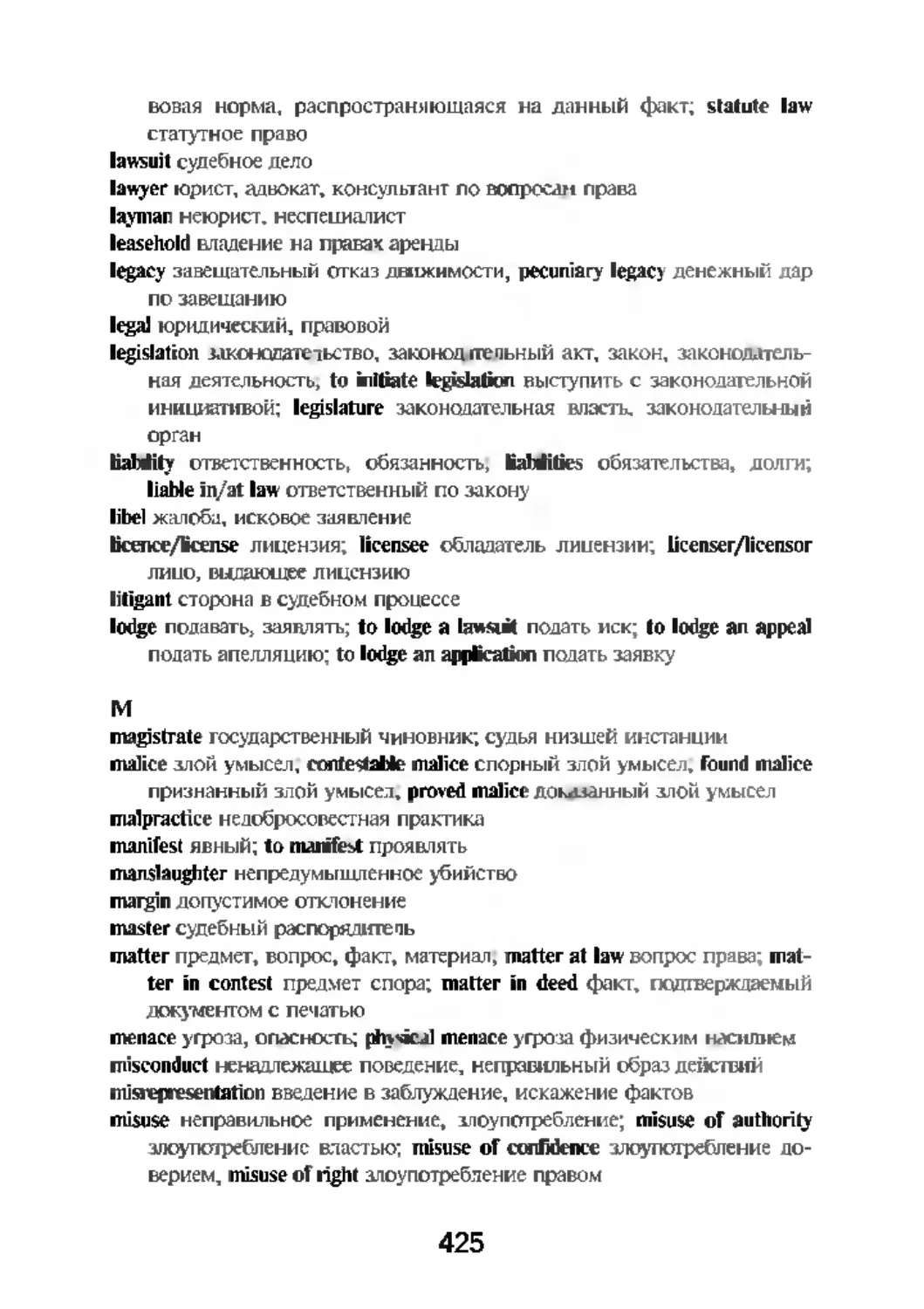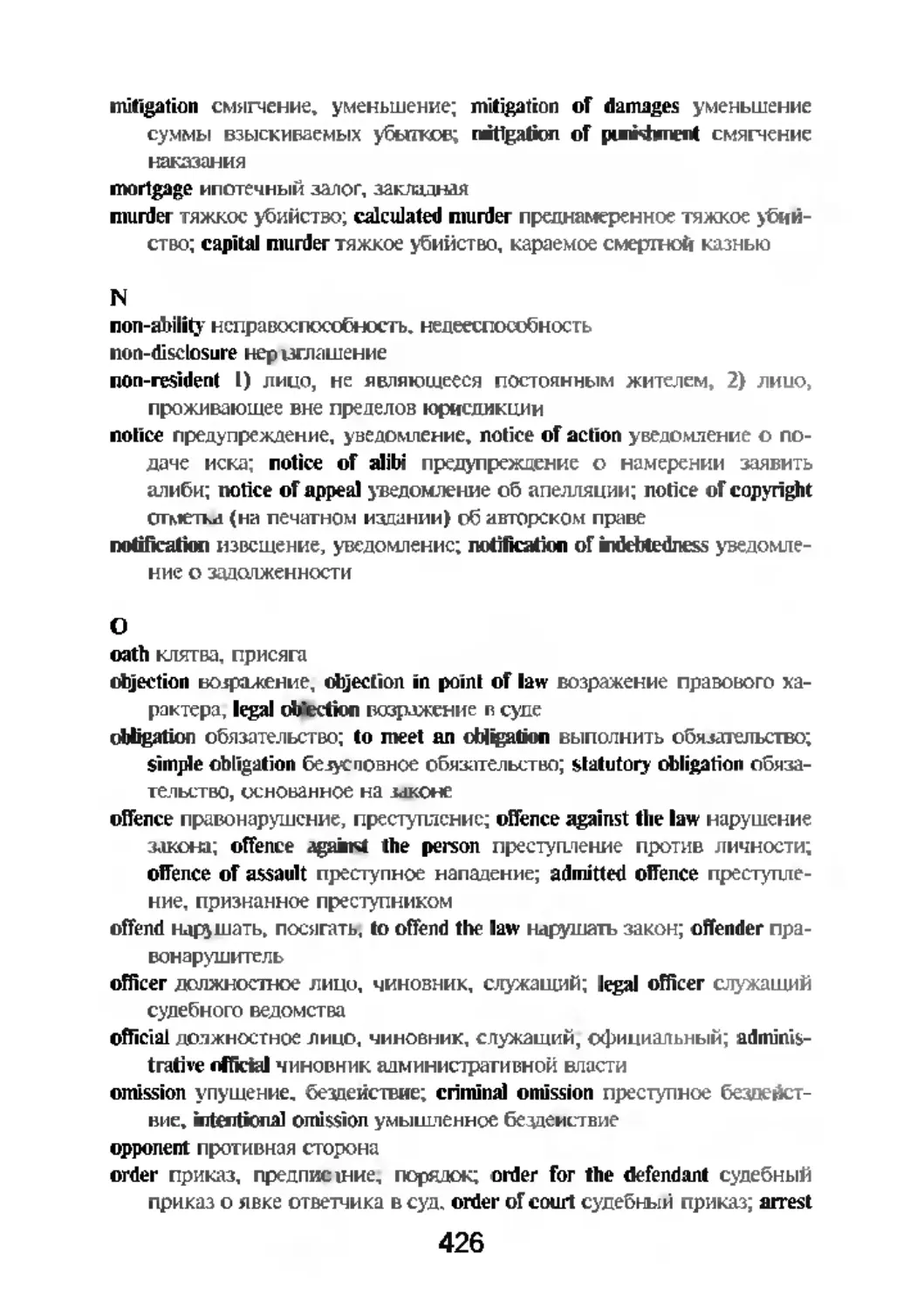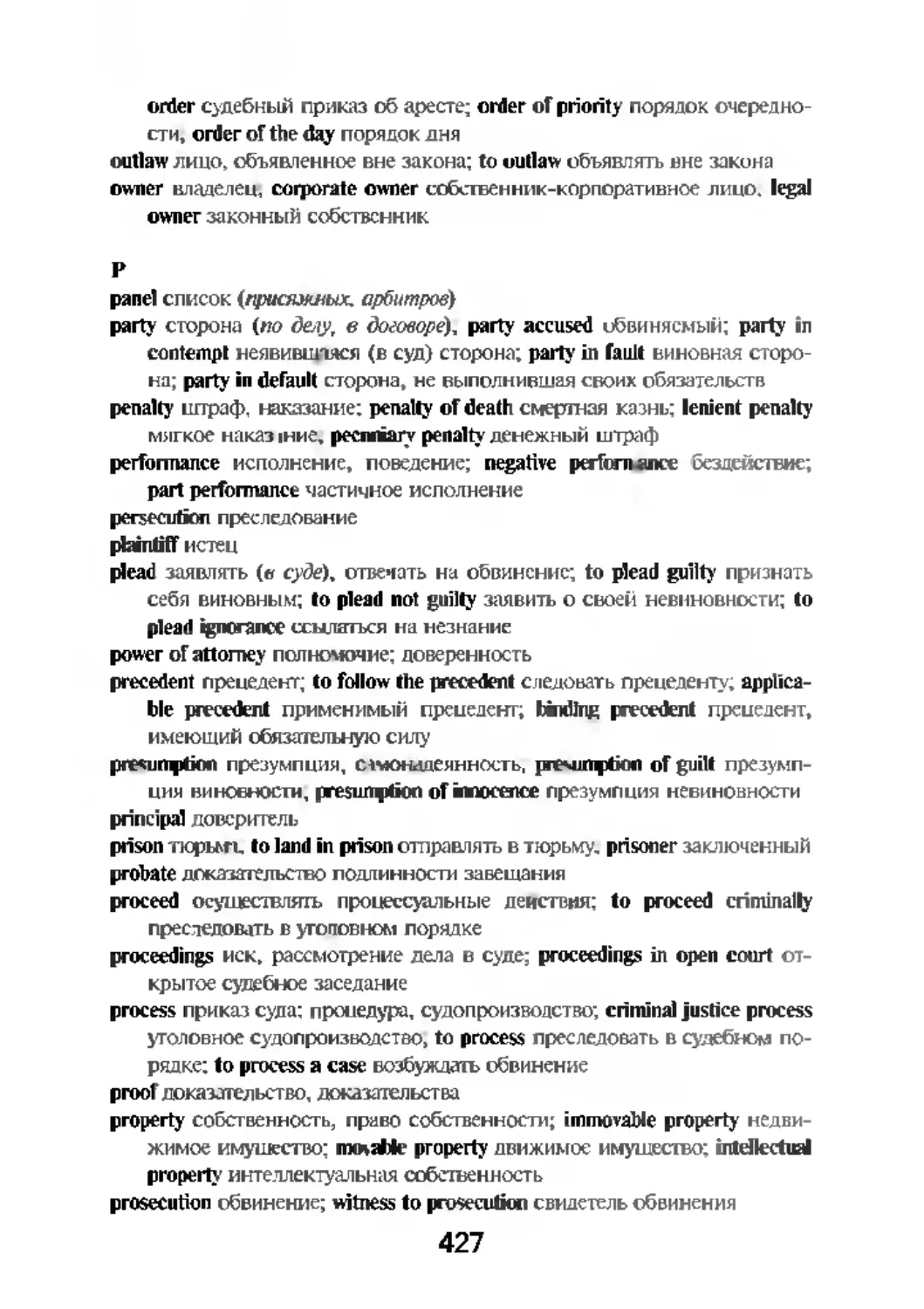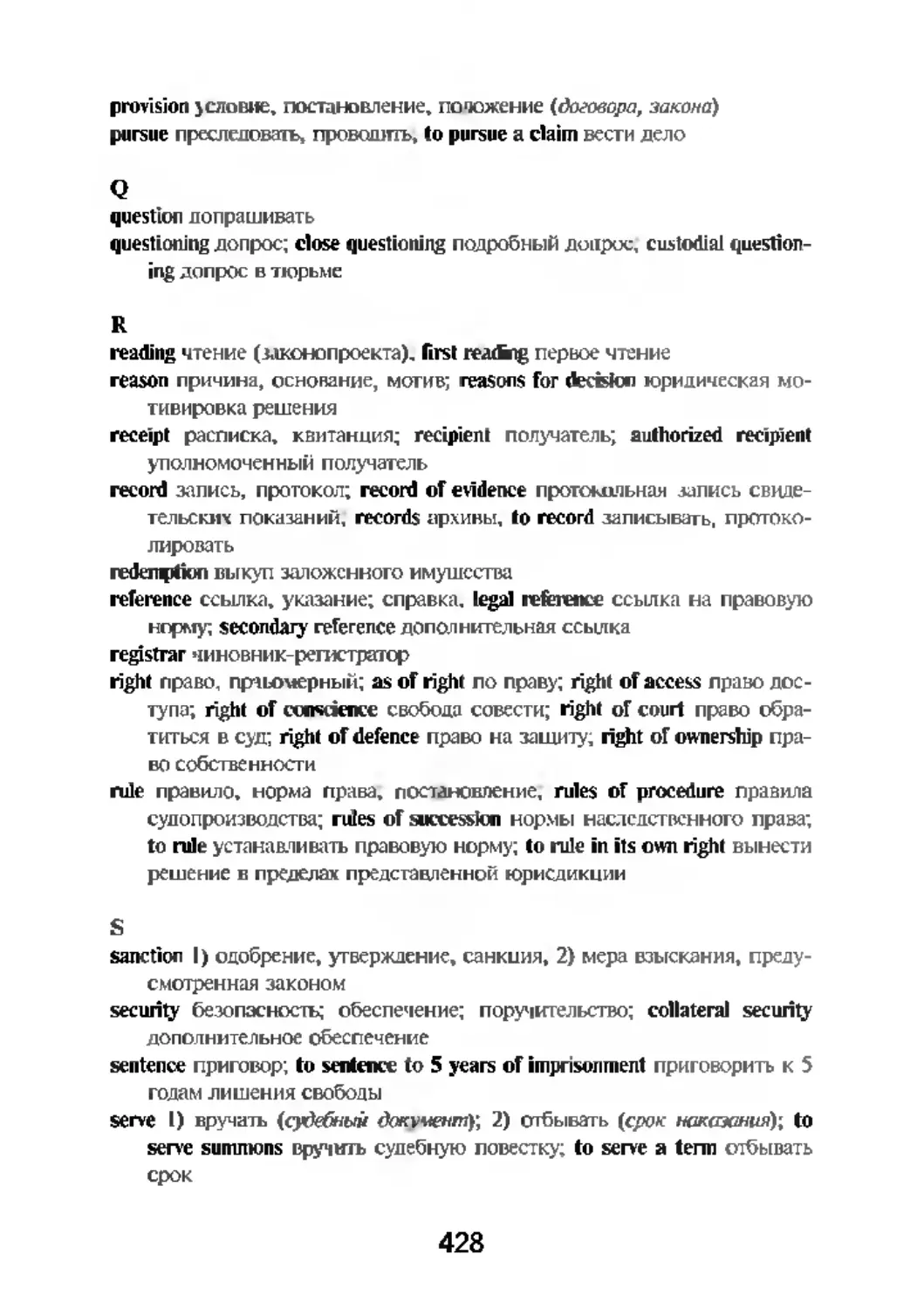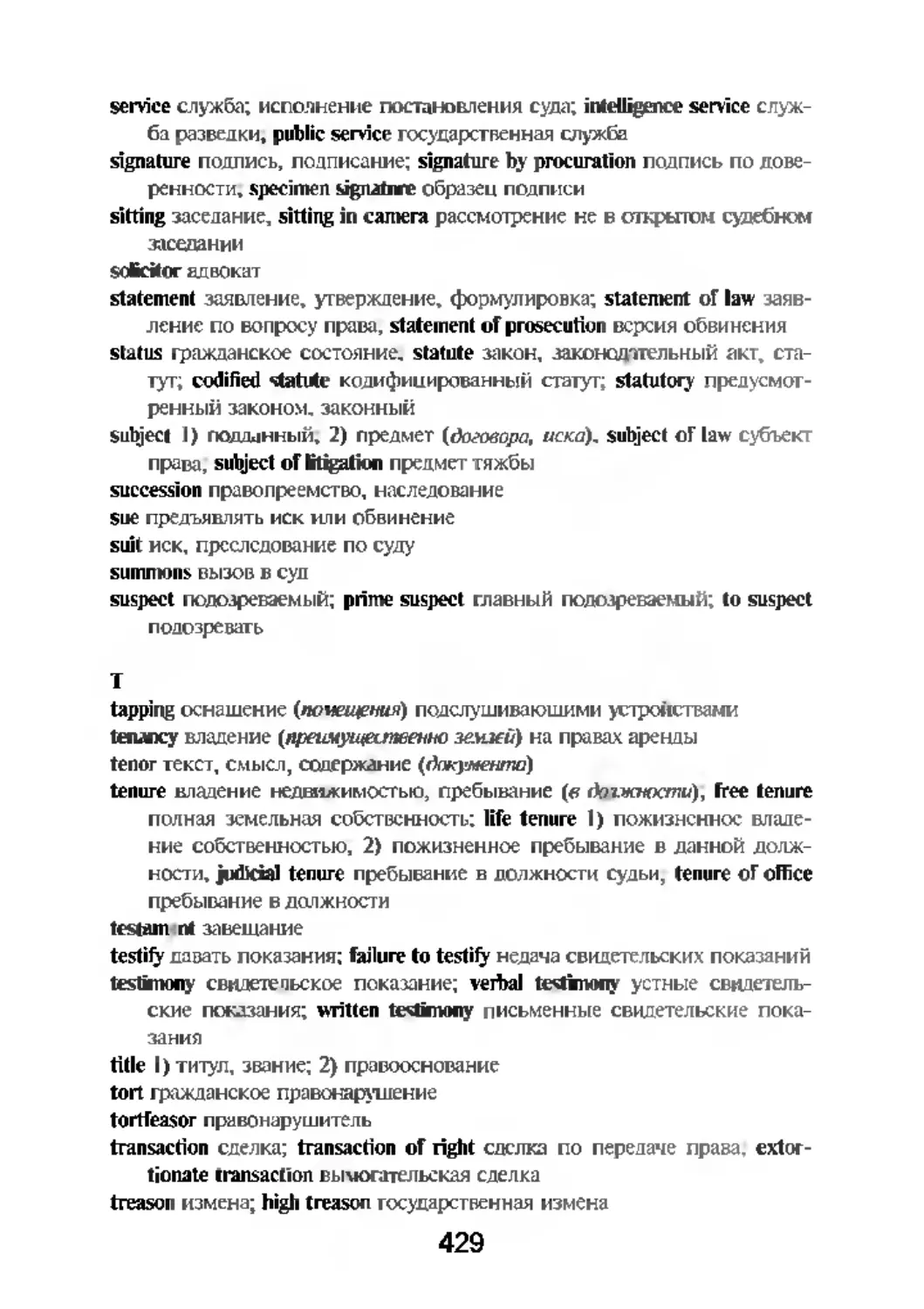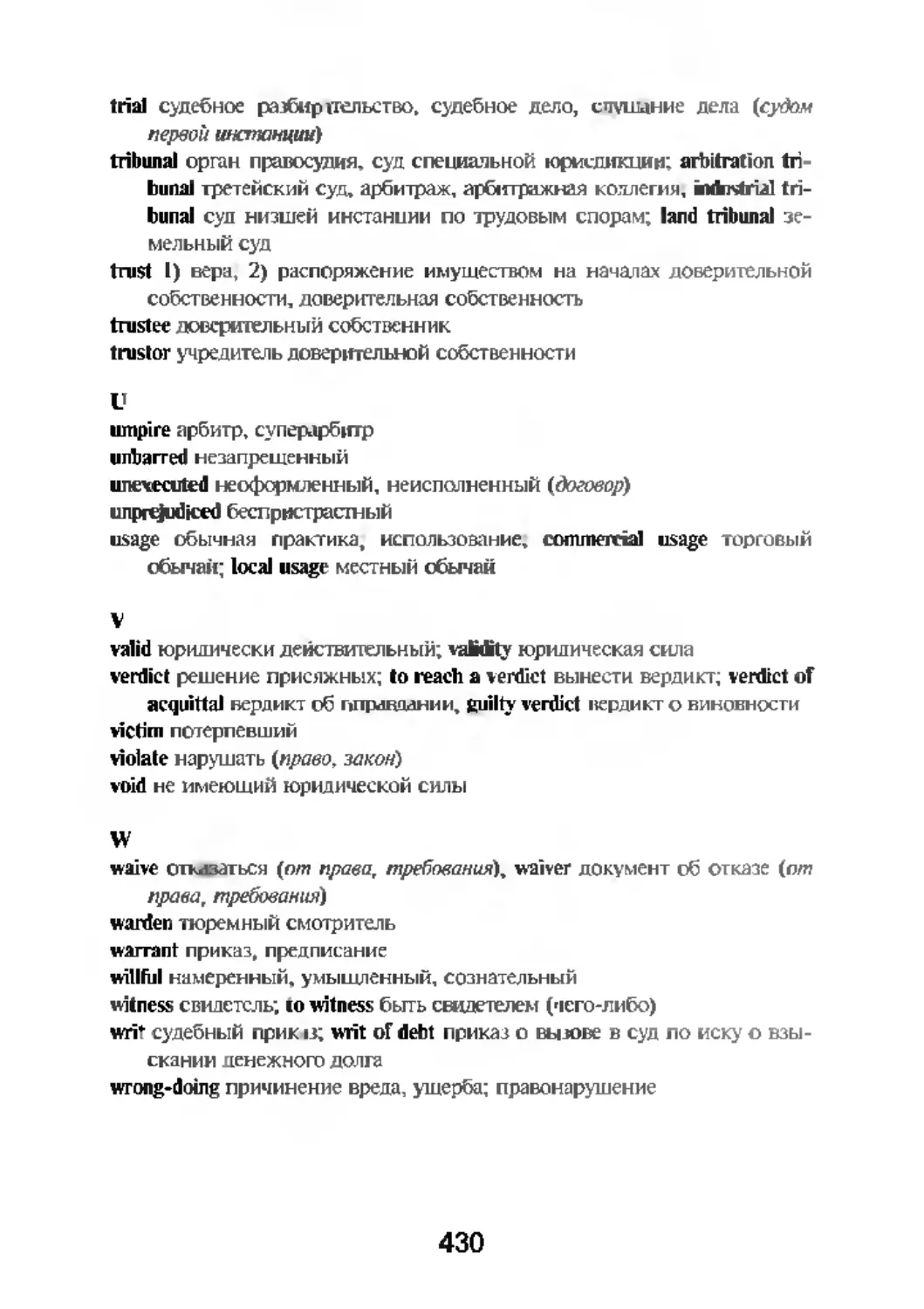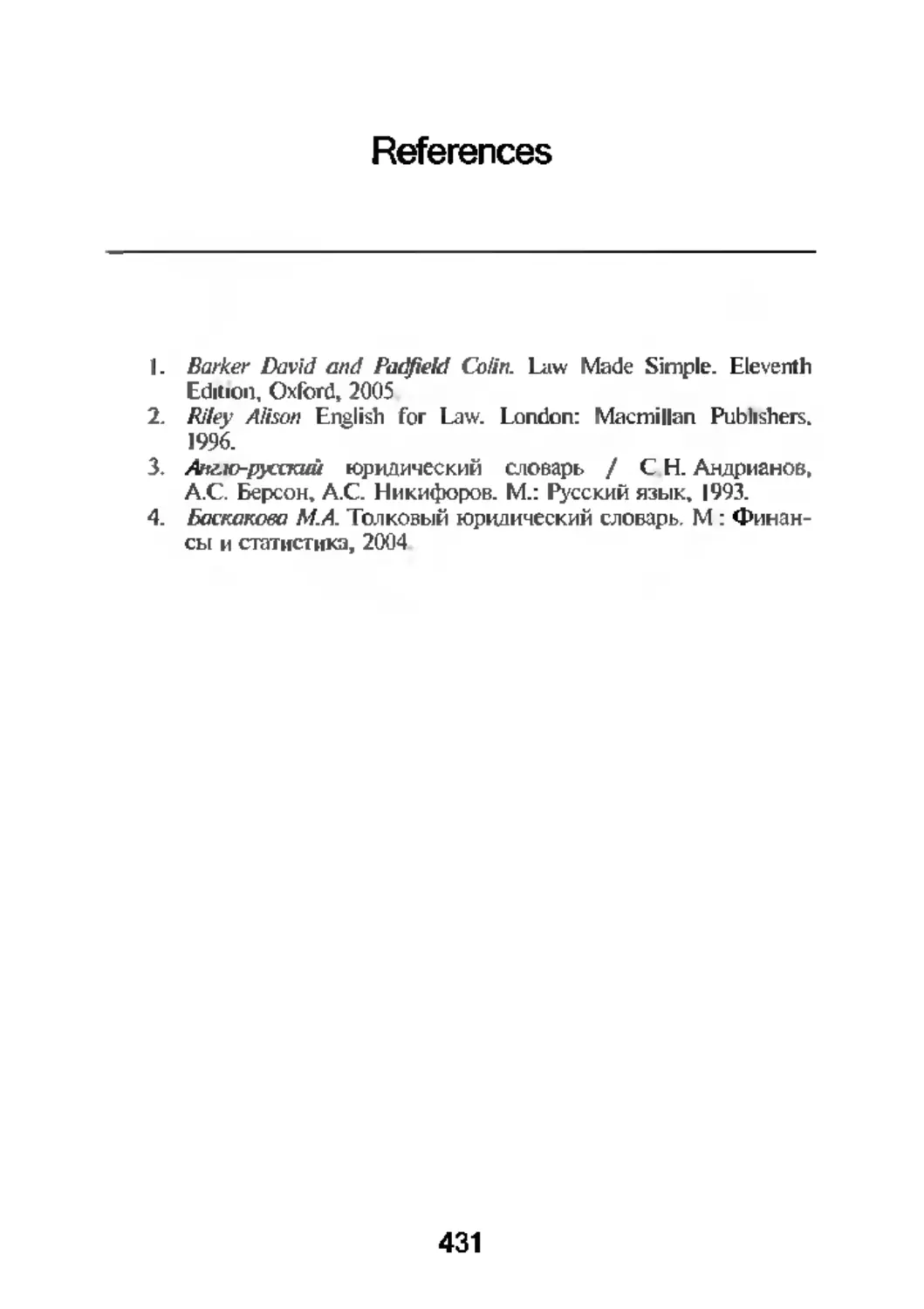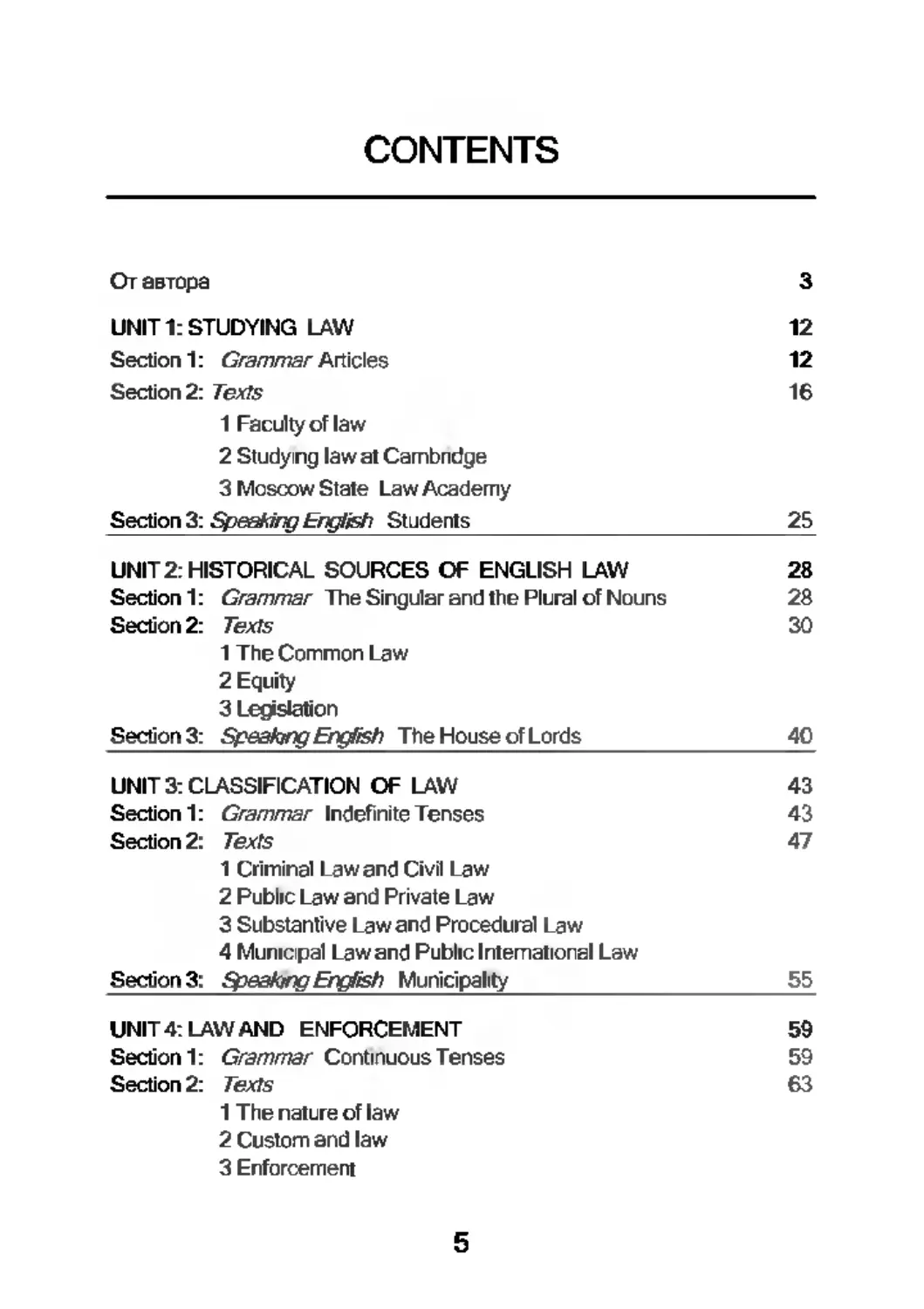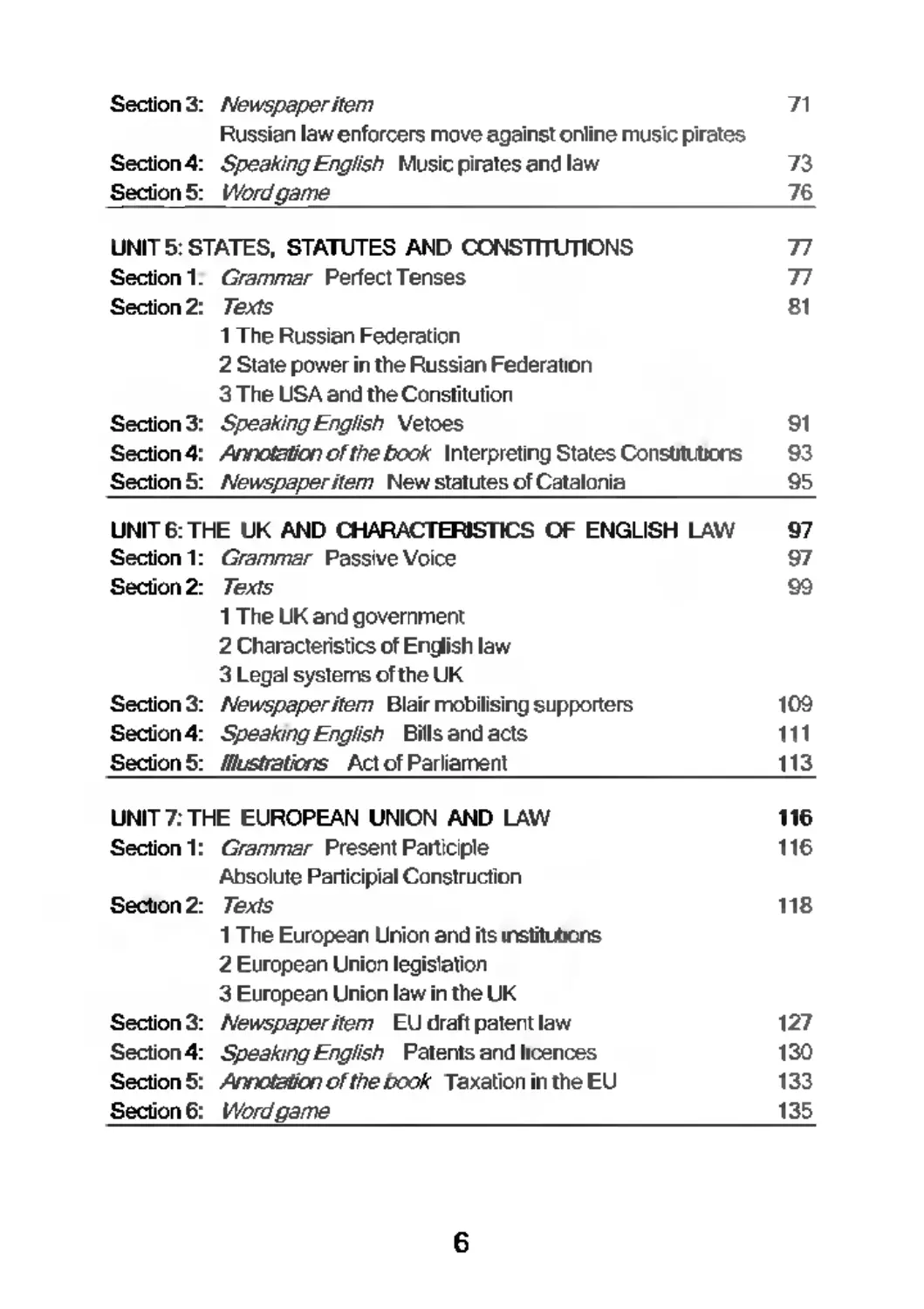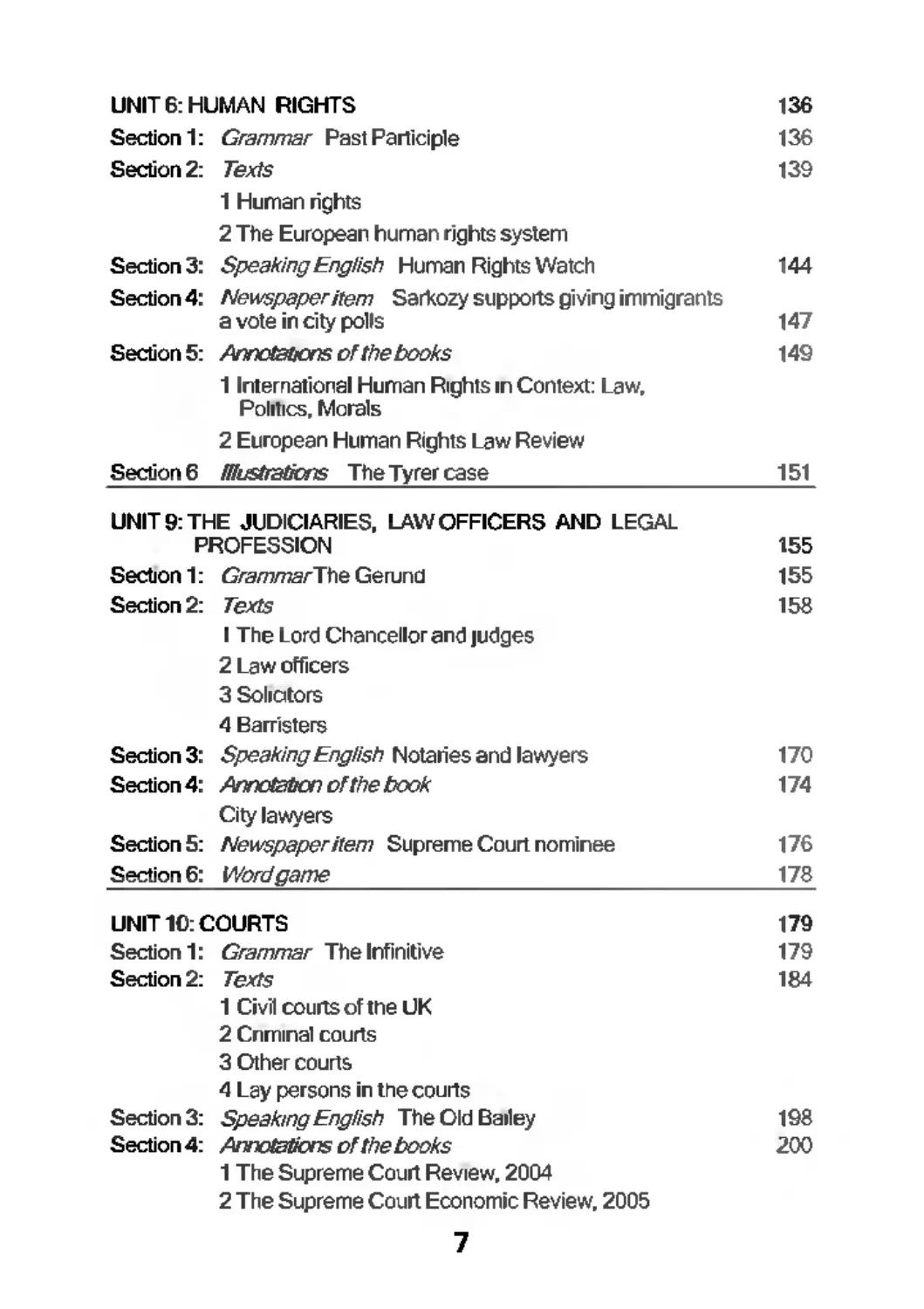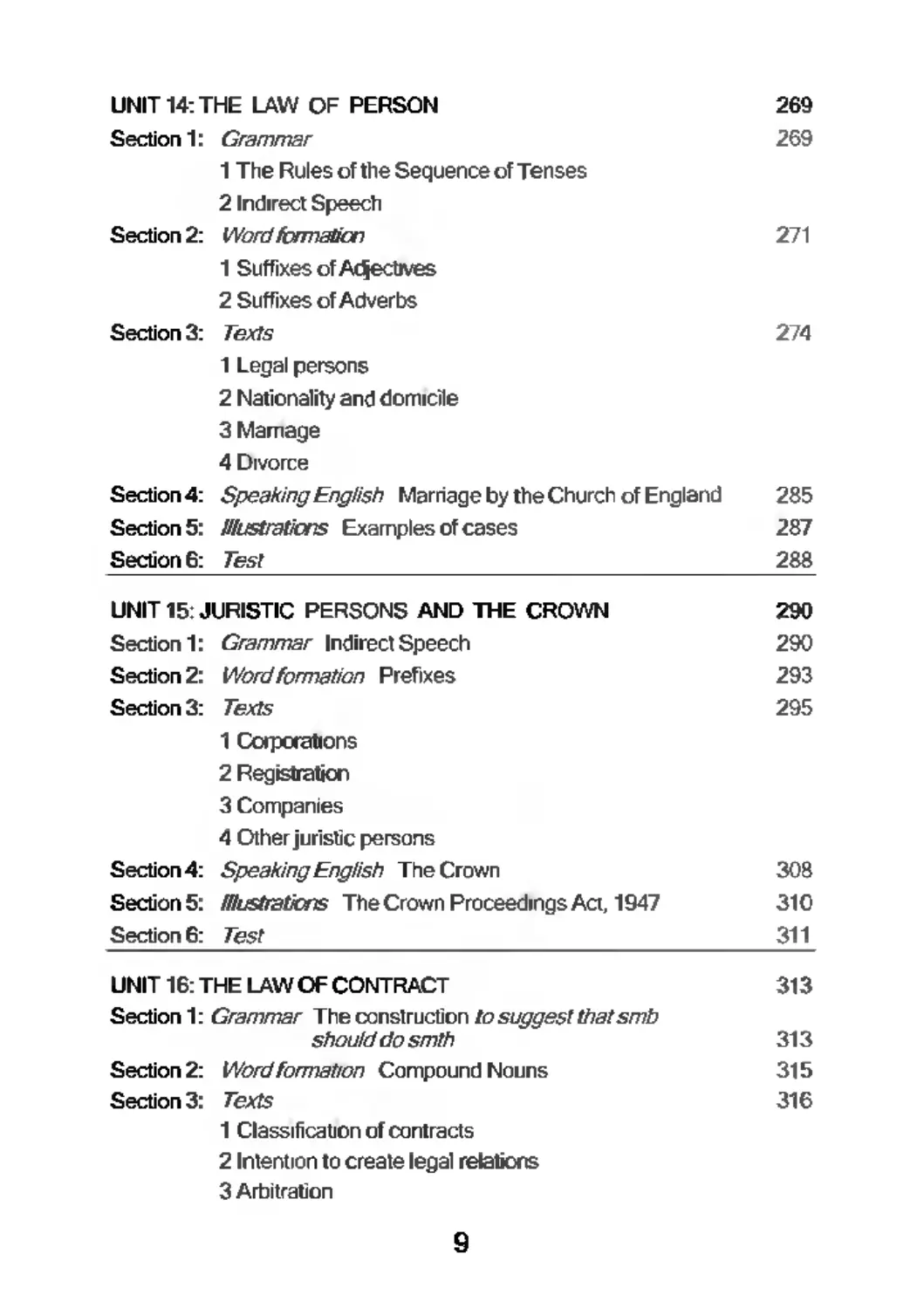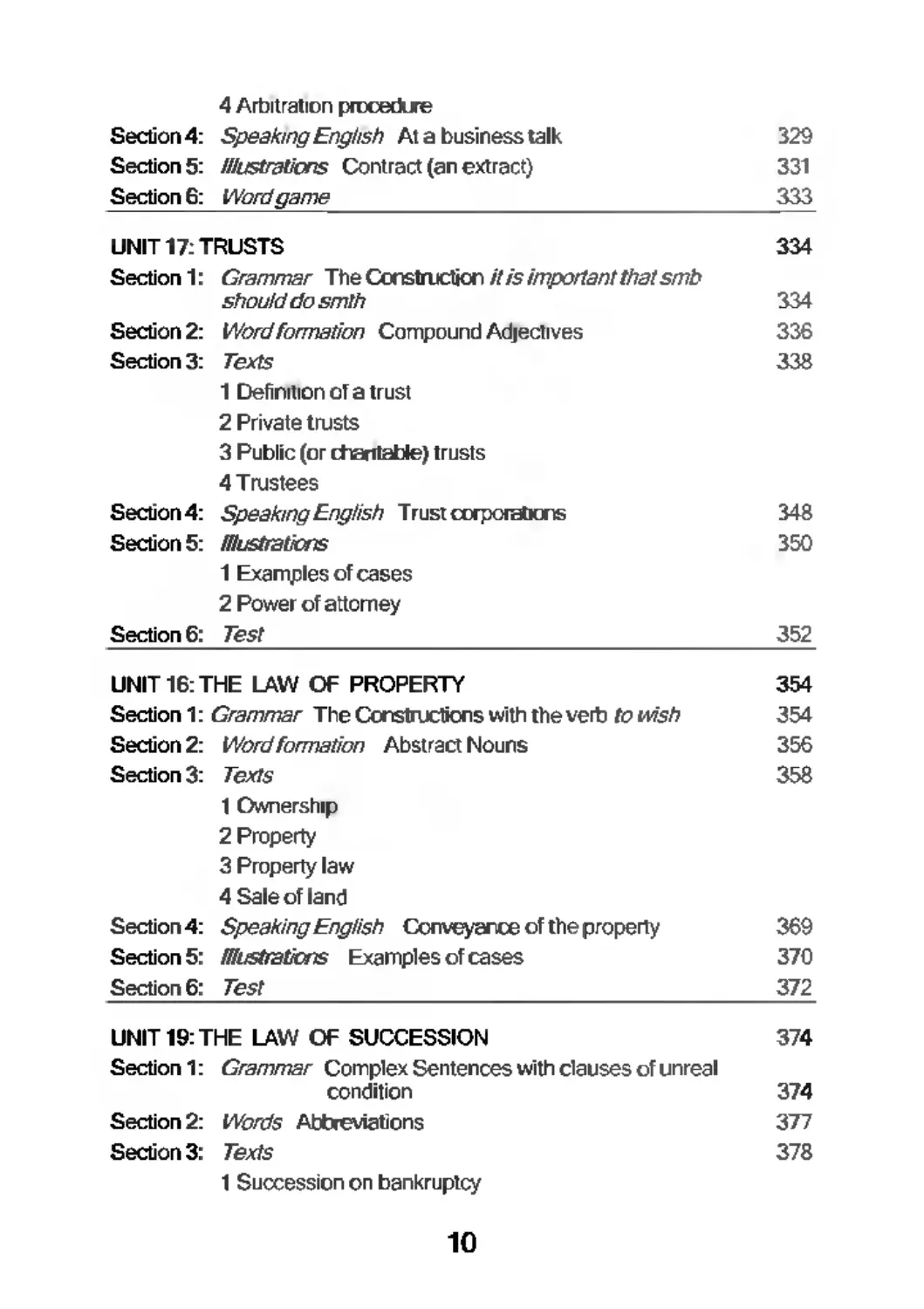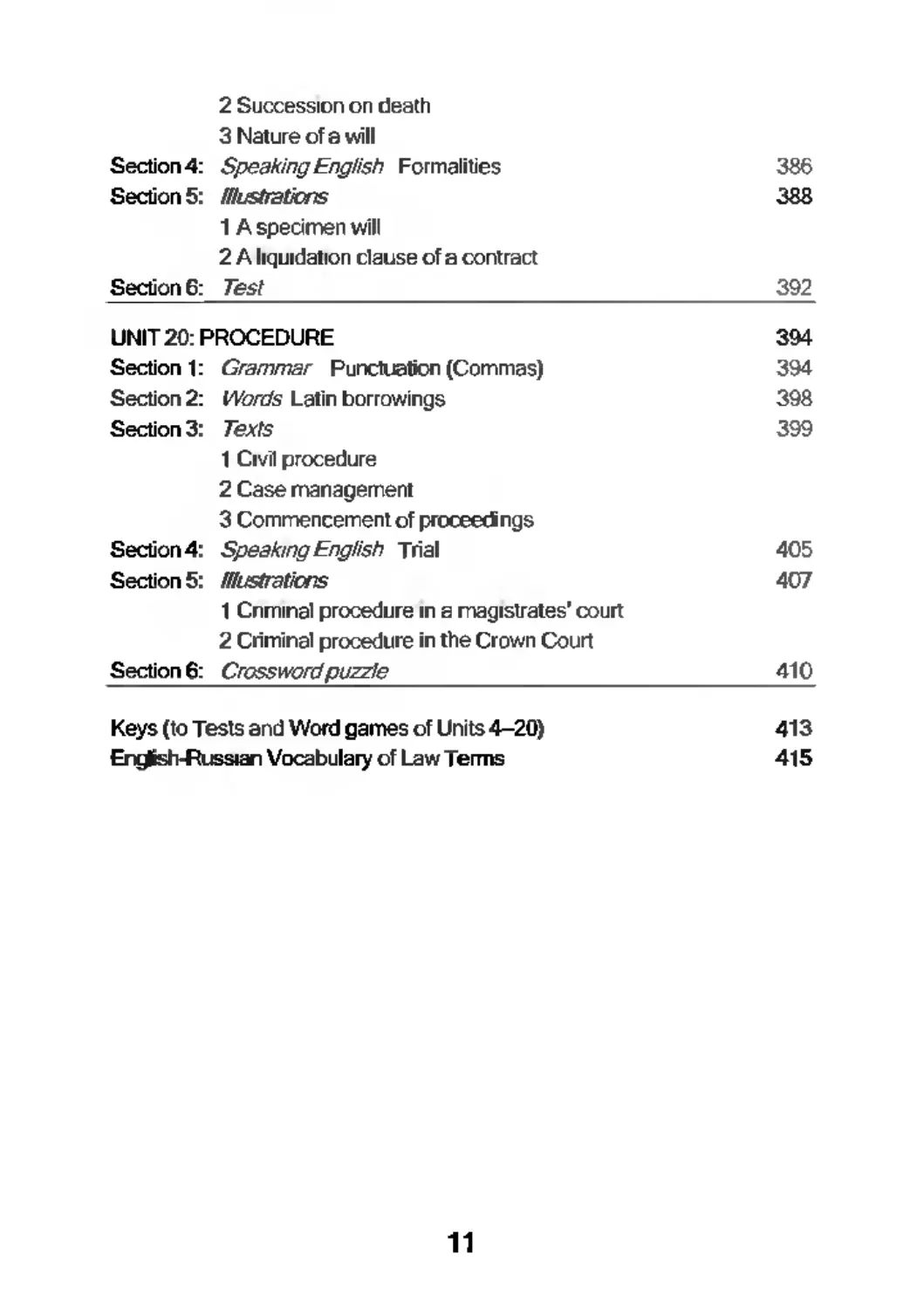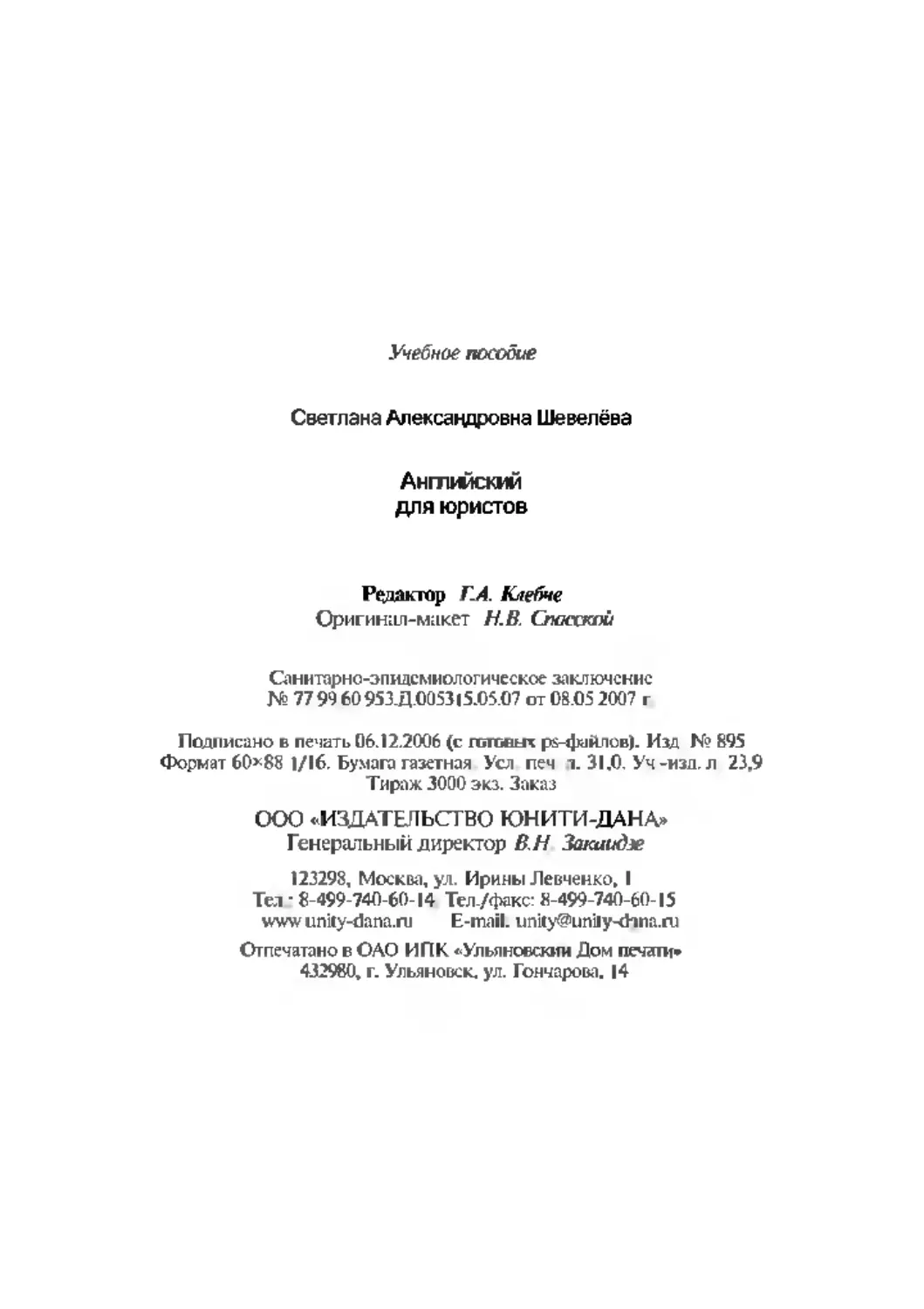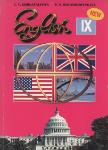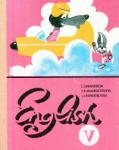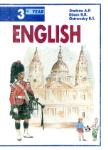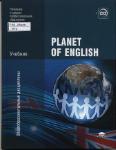Автор: Sheveleva S.A.
Теги: english english grammar english language english for lawyers english text book unity publisher
ISBN: 978-5-238-01
Год: 2009
Текст
C.A.IIIeBeJIeBa
v v
, r JII1I1 ·
JI5I
IOIH -J£
. H3,l];aHHe
En
lish
tor
la
ers
2nd edition
P&.
W
IOHMTM
UN I TY
AHml1i1cKI1i1
Afl IOpocrOB
SA Sheveleva
English
for lawyers
Second Edition
Textbook
t..
IOHI'ITM
ii"""iiiTV
MOCKBa . 2009
C.A. WeBeneBa
AHr.nIilViCKIiIVI
Aflfl IOplilCTOB
BTopoe 1t31laHHe,
CrepeOn1nHoe
hKoll!lliJoeoHo MUNlICt11efX.1116lJ 06/qe.?O u
bHCW fbccuiIctmUrhrJepa uu
6Kll'K!t.116e}"il.'6IIolvflOC()(jundmLnyiJeHm08
6btCUJUXJ JtHJt!iJeHuij,v6}'KlIOUIUXt:11
nO lLIIUlel{lHJdbH()Cmf!M
fuo Yi«iitro- ljeHmpoM
../lpoifJec:c.voHbHbI(j} UI(J>8f{C1'Iff.7II6(!}'ieii#Iod)noco6UJ/
f11J1cnrytJeHmaJBblCUIUXVYF6Hw. ,vfiJ
no IIl/IIfJlllL1RHIO «lOpucnpyrJe#lJCWI. (0305()(J)
a
IOHI1TiI
iiNITY
MOCKBa.20C/9
YJJ;K8IUII(07S.8)
66K81.2AHrn-923
UI37
PCUCIi3eItTbI.
'<ar/Jedpa1llKXmfXlH'blX1B"'KIJ6Moa.. }IIUIlI'pCIl1tIIMBI1Poccuu
(1i3'1anbHIiKKa.pc:lIPbIK3Hl1IOPIill_HBYK.npoocp, HA. rOpWCIi B!I),
npoct>eccopB.B.WI1jJbIH08
(MOCI(oBCKHiirocynapcweHlib]itJ1I1Ii BlIlT\t'IeQ\IIHYIiHBePCHTr:r')
r3laaHblr; >_:n:"M:IIIooIR'JIbCnl",H.n llI,
KaHllItillITIOPHl1l1'1CCKI1XHIIYK.HOKTOP3KOHOMH'ICCKHXHIIYK.fIPO<1>c:CCOD.
JI.J.)pe.nnpeMI1I1 npil0I1Te..1LCTDa Pt1>B06J1acTH HaYKI1 11 TeXHI1KI1
lIIeBeJleBa, CBeTnaHa Ar1eKautnpoBua.
1IJ37 AHfJll-1i1CKl1tJ JL'ISI IOpl1CTOIJ" yqe6. noco611e lU1S1 C1)'lleHTOB
BYJOB. 06)"J8fOUlHXCJl no IOpI11lM'IeCKMM CrteUHWIbHOCTJlM I
c.A. WeBeJleBa. - 2-e 11311" crepeOTMn. - M: IOHI1TJ.1-
D.AHA, 2009. - 367 C
ISBN 978-5-238-01 190-5
AreHTCTBO CI P prE.
B noc0611e BKi1IO'1eHblCDC.!IeHHJI noljxJHeTliKe H rpaMMantKe H3OCHOoe
CrrMUt3JIbHoHflI-'OI1JecoKJH:I.%HO;;J1O>CHKH
OCHOBHOH III'm:pI1"Ll COJILI»K'fTTeKCTbl COC.'I01I<1pHbIMH nOJICHCHHJlMH 11
pa-"""I6p.DHblMI1 yrrpBJKHCHI1HMH (CMblCJ10BblMI1. 1IOI1'"",CKHMI1,TIIOP'1eCM1-
MI1 11 T.n) TCNII"rnKa TeKCTOB 3KOHOMI1'1eCKHe npeCl)'nneHI1J1 11 3aKOHQ!UI-
TeJlbCTOO, 3<lKOH H OTMblDaHI1C HeHCI". 6opb6a c Hilp.(06H HecOM. NeAJl)OO-
pollHoe npaBO. 3aUlltTa np3B 'ICJ10B K3. roprOBC>e npaBO, I1MnH"M HT 11 TJI.
TCKCTblOCHODaHbI HactJaKTII'ICCKOM t1a1epl11!I!', )l()'pHaJ1bHbIXCTIlTbJlX,HOi<y.
Byqc6110c no..,.1o-mc-BKi1lO'-1CflblHCTCKTHOHble p'C.KI3bI 113BeCTHbIXIIMC-
pHKBHCKHX H BHnl1ltC1(H'( nHcaR.,cii (-reerbJ 11 3aIDlHI1H KpaccK33aM nOMO-
rnlOT npot;offfpOllltpoBaTb npaBH.lbHOCTb nOHI1MaHI1J1 TeKCTOB). IITIlIOKCPYC-
CKo-3HrJ1HiicKHiiC!loB3pblOpH.!I.H'IeCM'%TepMI1HOH
noco6lten03BO.ll1Tpa3BltTbl13aKpenI1ThIi3BblKII'lTeHI1J1.nepeBQlUl.yer.
HOro H nllCb...,HHorol1:1.10:':CHH>1 nP<-><t>eccHuH'tlbHblX....-n"pHaJIOO. MOJKCT
6b1TbnOJlCJHoBceM.113)"IIIIO!llI1MBHfJJHIICKIIHH3b1K.
EEK81.2AHrn.923
ISBN 978-5-238-01190-5 @H:IDATEJlbCTBOIOH,m1-lJAHl\. 1W1,1OO7
npHHl!I.oeJKHT HcKJlIO"HTe.rlbHDe "Pimo till HC-
IJOJIbJOllaHHeHpacnpocrpaHeflHC":maHHJI
.HHCDCdjKIII1 IIHJ]I1K.1KOR.J1I160ce
.,aCTIt,,0o6b1MH \II'H.'HBK"Kol'i-JIH60
q,oP"C."TO.t"HCJI BHIfreJJIII'T-<%III,Janpew.a-
C'TC fie3 nHCb.\t HIiOro pa3pc:weHI1 1\3.'laTe.lbCTlla
iO<poP'l.'CHI1C IOHHTI-1-ilAHko.1007
OT ABTOPA
Y'-le6Hoe noc:06He English for LaV1l8rn coop,aHO AnR 6YAYLl1HX IOpHCTOB -
CT)'.qeHToB SY30B 101 $JK}'IlbTerOB noco6L>1e}"-MThIBa8T Tpe-
60saHIiIR K 06>13aTenbHoMY MI1HI1MYMY CQ,QepIK8HIotR OCHOBHOI:! 06pa30sa.
TeJlbHOi:1 nporpaMMbl IOplo1CTa no cneUVlanbHocTH «lOpVlcnpy-
,/J,eHLlI1R»
rloc06l'1e op Ha paJ8HTllle YCTHOi-i 1<1 nl1CbMeHHoH pe'-llo1 Ha
ocH08en Hn1p0B8HHoj.jTeM8TI'IKI'I:
38KOH1'1 npaso
npas8'-!eJlOSeKa
CYAbI H CY.QbH
yronoBHoe npaBO
ceMei1l-1oe npaso
npaso co6crseHHocH1
CoIOJ
no
TeKCTbl npe,QCT8BJ"1SlOT co60i1 He6o.nbwllle orpblBKI1 1013 pa3JlM'-IHbIX ay-
TeHTIo14HblX MaTepVaJlOB, ra3eT,,QOKyME!HTOEI xapaKTepa,
.QeJlOBOj.j nepenl1CKIII. B noc06101lo1 Wl'lpOKO npep,craeneH8
p8'-1b, ClfTyaLll'I1'l 06L11eHI1R Ha 38Hs:ITHRX B Davies's
School of El19ish (IlOH.D,OH), a TalOKe Ha C8MIiIHapax AnR cry.QeHTOB IOplA,lJ,l'I.
"IecKL-IX $JKYIlbTerOB yHIiElepCl'lTeTCBAHr.J11'11<1
B KIDl';QOM pa3,!:\ene ,AaerCR He6o.nbWoe I«I"I'H8CTBO CneLjlllanbHO 010-
6paHHbiX rpaMMaTI1'-1ecKIIIX npaSI'IIl C HecnOlKHblMIII 1<1 paJHoo6paJHblMI'I yn.
paJKHeHIo1RMIo1 31"0 apnU<nIo1, BpeMeHa rnaro.nOB, CTpaAar8I1bHbli'i 3anor,
MO.QanbHble rnarQJ1bl, I>IHcJ;Il-1HIo1TI'IB, npW-laCTI'IR, , I'IH<1JL<1HHTI'IB B
pa3JWI'-IHbIX QxJpMax iii T..Q
6anbWoe BHIIIMaHl'le Ha6a3eIleKCI1KI1
06Ll\8ro 1<1 npOltJeCCI'IOHaJlbHOro xapaKTepa 3TH bl CO,[lep>KaT
t<p8TKllle npaBlma 1'1 He6orJbwIo1B ynp8JKHeHI-15'1
Onpe.Qef1E!l+l8R yaCTb ynpalKHBHI1Ci HanpaeneHa Ha orpa60TKY 3SYKOB,
y,!!,apeHwl,IiIHToHaLlI-1H
K TeKCT8M oQalOTCH ynpaIKHeHI'IH AIl" paJBIiIH1H YCTHOi-i (,QIiICKYCCIiIIiI,
npeJeHTaLl1iI1iI cxeM, KPaTKlile J:jlilanorlil 11 T ,Q.) 11 nl1CbMeHHoi-i (nept'!BO.QbI,
aHHOTaLll1l1, peJlOMe iii T -J], ) pe41i1
MHorL1e pa3,D,8nbl co.o,ep)l(8T mecmbl L1 UZpbl Ha npoeepKY ycs08HHoro
rpaMMaTIINeCI((I{)L1 MaTepL1ana.
B KOHLIe noc06L1>1 npL1BOA>lTC>I IUltO'-lL1 K 3a,QaHL1>1M L1 aHmo-pYCCK\llM
cnoeapb TepML1HOBl.1nOHRTL1M
Pa60Ta no ,QaHHOMY }"-Ie6HOMY noco6L11O np<',QI1OnaraeT cne,QyIOLl\OO
pacnpep,eneHL1e yYe6HbiX '-laces
npoXOIt\D,eHlo1e MaTepL1ana noc06L1>1- 280 '-laces (14 4aCOB x 20 Pa3A8-
m,)
nL1HralfJoHHble 3aHs:ITL1>1-40 '-laces (2 '-Iaca x 20 pa3Jl,eJlOB)
KOHTponbHblE! pa6oTbl-20 'Jacos (1 'Jac x 20 pa3,Qenos)
!lnR nlllHralfJoHHblx 3aH>lTL1M peKOMel-l,!J,YE'T nlO60M
OpL1rL1HanbHbIMnL1Hra4>oHHbIM KYpccTpaH HanpasneHHOCTH.
!lnR KOHTponbHblX pa60r peKoMel1AYeTCSI I1CIlCIIb:D38Tb TOT MarepL13n
ypoKa, SbI3S3n Y CT)',QeHTOs HaL16onbWL1e TPY,!!,HOCTH S ycsoeHL1L1
rlpL1 3TOM n}"-lwe IIIcnonb30saTb Sl1,[\bl 38.D,8HL1M, npep,naraeMblX S noco6L1L1
)f{eI1aeM DaM 6oI1bwMX )lcnexoB B DaWeM pa60rel
4
STUDYING LAW
w
Section 1: Grammar Articles
Section 2: Texts
1 Faculty of law
2 Studying law at Cambridge
3 Moscow State Law Academy
Section 3' Speaking English Students
Section 1 Grammar
Articles
The Indefinite Article The Definite Artide
qlon the
QcHOBHbl8 npaBW1a )f1OTp66neHI-1A apnumei1
I. The Indefinite Article (HeOOpene.II8HHblJ;J apTMK.I1b) ynurpefi1rnen:Jl C
I1C'II1CJUleMbIMH CVll TBlUeJ1bHbIMl1 B elllUJCTBeHHOM 1I11C.IIe. Kor.na 11M
.QaercJ-I I-!d3tiaHl1eWmOnl1Care!]bHlliI "<dp1"1t"pMCTI1Ka.
Hels.II.studem.
He IS a very good student
He is an mlelhgent student.
Z. The IJt>IHtl' Article (onpe-.u.eIleHHblii 1IPTHKJ1b) ynOlpe6JHleTc>I
(I) C I-IC'II1CJISJeMbIMH cyIlIOCl1JIff8fblMI1 B e.lUiHCTBeHHOM 11 MHO-
>KecTBeHHOM <lI1CJ1e, eCJ\11 pe'lb MeT 0 KOHl<peTHbIX .rrnuax rum
"""""""
The student is at the lecture now.
The students of our group are In the library now
(2) C IfC'lI1CJ151eMbIMM cyweCTBI1T<:J1bHblMI1 B e.DIlHCTBeHHOM <l11CJ1e.
Koma paCKpblBaI:TCfl If X nOH>l1l1tJHoe conepJKaHl'le
The student IS a person who IS sludYJJ1g al a college,
polytechmc or umverslly.
(3) C HeliC'II-ICJlHeMbIMI1 CyJlIeCTBI1TeJlbHblMI1. KorlIa pe'lb l11leT 0 Ka-
Kl-tX-J1I160 BernecTBil'<. COOncTIk1X rum SIB!1eHWIX, orpaHl1'leHHblX
MeCTON. BpeMeHeM rum o6croSlTeJ1bCTlW,1I1
The atlTlO'qJhere was very fnendly at the exam.
12
Apn1KfwIII8 ynorpe6nRIOTCI'I
(I)c I1C'II1CJUlfMbJMI1 C}ll.If1."THI1Tei1hHhIMI1 HO MI-1OJM:CJBeJ-1HOM 'il1cne,
Korna l1"t D.aeTCR Ha3BaHI1e ruTH oOwaR xapmm:plICTI1Ka
Theyarelav.yers.
They an: very hard-working !';ludenL
(2)c HeltC'lltCfJJleNUMI1 cywecT1IIfImhHhlMl1, eCJII1 11M llaeTCR Ha3Ba-
Hl1e rum oOwafl X,.-q:w("repI-tCTI1Ka
At rccanrneanfeelings
(3) c 6o!1hWI1HCTHOM I1MeH Co6crBeHHh!X
R!.s;I3, Moscow, london, Oxford, Pete Brown
f-. -.ib;.R -F d .(ih;"RF).-...--.-.-1
: theUnnedKingdom(theUK) i
L_____ _ _ _ : _ :_t: _ :. ! }.__j
(4)c HHIJ3.Hl1flMI1YHI1Hepcl1TffOO
Cambrrdge Umverslty, Oxford Umverslly, london Umversny
r..;.o-..-.-.ilie.utiiversii;;-ofLOndon----..-..-...-:
: the Umvel'ilt)' of Moscow !
L__________! _ _ _ _____.__ __J
(5) C H<1IfMeHOBaHI1RMI1 Ha)'K If nprnMCTUD
law, litcrnture, mathematics, history, geography, medicine
f---- ----th;-i;;.; ii;-RF--------------------------------1
L_________ :_ I _ :: _ _ 2_ I _ 1_ :_ j
(6)c IfC'JIICJISJeMbIMH cyruccTIIlfJeJlhHblMI1 B t'llIIHCTBeHHOM 'iIfCi1e,
eCJIIf OHl1lIalOTCfl C yJ<aJaHI1CM HOMepa:
EXeTCis I, Unit 3, Section 5, Group 2, page 33
(7) c IfC'JIfCJ\lIeMbIMH cYilleCTBlfreJ1bHb!MI1 B e1lHHCTBeHHOM 'JIfCJle,
eCJIIfOHl1n.uon:1B3afOllOIJ)(ID(
Faculty of law
(8) C I1C'JIlCrutfMblMIi C)'l1IfCTIIfTf.fH B eID1HCTBeHHOM IJI1C11e, ynOT-
nOCJle HblXrJJarnIIOBWlHnpe!IJloroB
to go to school/university / coUegf
to be at school / universlly / college
to go by bl1s, 10 be on business
(9) C H<1IfMeHOBaHI1RMI1 Jl3hIKOB:
English, French, German, Russian
in El1glish, to speak English. to translate from El1glish into Russian
r-- -;;-------ib;-E;;gi; , -j;;; ;;g -------------------!
: Ihe French langu!\gc i
: Iheltaltanlanguage :
L._.__._.__ . . _ _ ___._.__._.____._.j
13
Exercise 1a. Use Ihe right form of the Indefinite Article (alan), read
and translate the nouns:
... unit
... law
... section
...artlcle
...text
...Ianguage
n' dictionary
...word
('ju:mt)
113:)
IsekJn)
('R:ltkl)
Itekst)
('lrenQWI d 3)
('dlkJann)
Iw;;.:d)
'. faculty
'. university
.' student
n leacher
...group
...college
..question
['frekaltt)
[ju:m'v :sltIJ
['st)u:dant)
['tt:lfa)
['ek'\aSalz)
[gru:p)
[' koh( 3)
['kwestJn)
b. Read the nouns used with the Definite Article paying attention to
the sound [(')) and translate the words:
the unit the group
the units (he college
the law the word
the faculty the words
(he exercise
the language
(he questions
(he dictionary
Exercise 2 Underline the Articles, explain their usage, read and
translate the sentences'
I This IS Unit One. The untt speaks about: studYIng law. There
are (hree sections in (he unit. There are three texts III the UllIt.
2 I am a student. I am a law student. I am studYIng lI1(ema-
tionallaw. He is a student wo. He IS a very good student. We
are studYing in the same group.
3 They are students. They are students of an English college. I
don't know the name ofthe college.
4 She is studying an orientallarlBlJ3!e. It is Japanese. It is a very
difficult language. Do you know (he J8p3nese language? I
don't know Japanese.
S It is a very interesting book. Have you read the book? Who IS
(he author of the book? The book IS rea11Y vel)' interesting.
6 It is a very strange word. Is i( an English word? I have never
come across (he word. You may find (he word m a dictional)'.
7 I have got a question. What is the question? I J.m afraid I
cannot answer (he question. It is a very diffICult question.
14
Exercise 3 Choose the correct variant, read and translate the sen-
tences (n1pe 03Ha4aeT OTcyrCTBl1e aprI1Kflfl):
It is (a, an) Eng1ish university.
It is (a, the) vel)' old university.
He is a professor at (the, -) London University.
She is a student at (an, the) University of London.
He is at (a. -) university now.
When he leaves (a, -) school he wants to go to (the. -) university
Do many peopk go to (the. -) umversity in your country?
If I <1m not mistaken (the, -) Mrn;l;ow State University is the old-
est university in Russia
9 (The, a) university is a multi-stroreyed building.
10 Excuse me. where is (the, -) lingUistics Umversity?
Exercise 4 Read and reproduce the text paying attention to
theArtIc1es:
Oxford Umversity is the oldest University in Britain. Oxford Univer-
sity was founded in the first half of the thll1eenth centul)'. There are
about 12,000 students in Oxford. and the University and the town live
happily side by SICIe. Oxford Umverslty IS located in the town of Ox-
ford. The town is rather small. but vel)' beautiful.
Exercise 5 Translate into English:
51 Cl)'neHT.
51 l13)"1alO aHrJ1ItMCKItf1 H3bIK.
MHe HpaBHTCH aHrJ1ItWCKItW fl3blK.
OHa CeH'laC Ha l1eKUHJ'lX B ItHCTmyre.
3w MOCKQBCIGlf1 rocy.aapcTBeHHblit )lHltBepcl-freT ItMeHIt M.H.1Io-
MOHOCOBa
OH IOpItCT.
OH 01.JeHb OnbfTHblH IOPItCT.
15
Section 2 Texts
Faculty of law
At an English university Law is divided into different subjects or
'branches' for study Here is a list of subjects students study in the Law
Faculty at Cambridge University:
UNIVERSITY OF CAMBRIDGE
FACULTY OF LAW
Choice of subjects
The papers for the Law Tripos. which are divided mto Groups I-IV, are
as follows
Group I
Paper 1 Roman Law
Paper 2 Constitutional Law
Paper 3 Criminal Law
Paper 4 Law ofT ort
Group II
Paper 5 Lawof Contract
Paper 6 Land Law
Paper 7 International Law
Paper B Roman Law
Group III
Paper 9 Administrative Law
Paper 10 Family Law
Paper 11 Legal history
Paper 12 Criminology
Paper 13 Criminal Procedure
and Cnmlnal Evidence
Paper 14 Equity
Group IV
Paper 15 CorrmercIaI Law
Paper 16 Labour Law
Paper 17 PrinciplesofConveyandng Law
Paper 18 Company Law
Paper 19 Contract and Tort
Paper 20 Conflict of Laws
Paper 21 E.u. Law
Paper 22 French Law
Paper 23 Jurisprudence
16
Vocabulary
choice IIJOIs) Bbl60p; to choose IIJu:z) Bbl6l-1p:m.
Tripos r'tralpOs)3K3<1MeH 1UTSI nOJ1)"1eHI-HI OlJ1W-II-I.II (B 1<eMf5pit.IDKe)
paper nl1CbMeHHa.II pa6oTa; HaY'IHblii llOKi1WJ.; llHcCepnUH.II
legal 11I:f';11 IOpI1llH..ecKitii. npaBODOii. 3<lKOHHbJii. neraJIbHbJii
tort rpIDK1I:lHCKoe npaBoHapyrneHl-1e. lleJIl-1KT
evidence l'evJd:msl CBJ-UJ.eTeJIbCKlte nOKa33HI-1.11. ynl-1KH. 1l0K333re.llbCTBa
equity l'ekwJtl1 CnpaBeJ]JlItBOCTb, npaBO CnpaBe1UJHBOCTIf
to convey Ik;m'vel) nepenaBaTb; come)ance (k;m'vel ns) nepena..a;
comreyatIcing IkJn'VelJnsllJ) nepella..a HM}'I1lOCTB3.. COCTaBJJeHl-1e HO-
npl1aJ1hHh]J( aKTOIi 0 nepella..e HfI1YWfi:TIIJ
law
lawyer
legal
faculty
subject
Exercise 6 Match the words and their transcription, read and trans-
late the words:
1 1''''b'l
(J:):)
(J:);j:;»
(Jlgl)
I'fa::kJlu)
branch
Cambridge
group
paP"
labour
I f'",bd"kt)
['kelmbnd:5)
Ibra:ntJl
['petpJ)
Igru:p)
the choice
thesul!lect
the choice of subjects
Exercise 7 Read the following paYing attention to the sound 10] and
translate the words into Russian:
theevJdence
the law faculty
[helOwn
the branch
the papers
the law papers
Exercise 8 Read the words paying attention to the stress:
,uni'versity ,inter'nal:ionaJ ad,mim'stration
,consti'tution ju,ris'prudence ad,mini'strator
,COnSh'[ut!onal ,cnmi'noJogy psy'chology
ad,mmi'strative ,soci'ology ,termi'nology
Exercise 9a. Match the English and Russian equivalents:
Roman law }leJlI-1KTHOe npaBQ
law of tort TpyLloBOe npaBO
commercla11aw 3eMeJlbHOe npaBO
17
E.U.law
labour law
company law
land law
I pHMCKoe npaBQ
npaBO EBlxmewcKoro Cm03a
ToproBOe npaBQ
npaBo, peryJU-IpYfOUlee Ile.llTeJ1bHOCTb aKUHO-
HepHblX oOll1ecTB
b. Read the words and translate them Into Russian:
principles of the law criminology
cmdlict of laws cnminal procedure
conveyancing law cnmmal evKl.ence
law of contract legal history
c. Translate into English:
KOHClHI)'lliIOHHoe npaBC _ nOTOBopHoe npaBo _
MeJK1l..VHapollHoe npaBO _ ceMe Hoe npaBQ
yrOJlOBHoe npaBQ _ WlMHHHCTPaTHBHOe np3Bo_
Exercise 10 Mark the meaning in which these words are used in the
text
paper 6YMara
branch
IlOKYMeHT OTpaCJIb
nHCbMCHHIDI pa60Ta (j:JI1JlHIif1
subject study HJy'leHHe
npe.IlMeT, IDICUHIlJ1HHa Ha)'Ka
nO.1l1l8HHblM HaY'-IHaH pa60Ta
paOOJl1 K8GHHer
TPyn
Exercise 11 Explain the use of Articles, read and translate the sen-
tences:
I We see a list of sul:!jects at the Facu1ty of Law at Cambndge
Umversity.
2 Law io;; divided into a few branches.
3 1118 papers are dIvided into five groups.
4 Group One comprises four papers
18
5 Group Two inc1udes four papers as well.
6 Roman Law is divided into two parts.
7 Paper l1tirteen deals with Criminal Procedure and Criminal
EVJdence
8 1 don't remember wIth what subject Paper Fourteen dea1s,
9 Paper Nineteen is concerned with Contract and Tort.
10 Paper Twenty Three is the last in the list.
Exercise 12. Use the right Articles where necessary, read and re-
produce the text:
... Cambridge is one of ," towns of ... East Anglia. l1tis is only...
small town, but no University IS one of on biggest In no country. .
University of Cambndge IS famous allover n. world. no Cambridge
University was established in ',. second half of ... thirteenth century
whIle no Oxford Umversity was founded in the first half oC same
century.
Now both .n men and on women study at this University. fhere are
more than 20 colleges in no UniversIty. no oldest college of.n Univer-
'iity i'i Peterhouse
Exercise 13a. Read and translate into Russian:
1118 papers are a'i follows: ,.
l1te subjects are as follows: .
His answer was as follows: .
l1te evidence was as follows: .
l118'iul:!jectsarea'ifoIlOW'i: ,
Read the following questions: n
Trans1ate the fallowing sentences into English: .
Spe11 the following words: .
9 Do the following exercises for our next lesson: ...
10 Remember the following rules: .
b, Translate into English:
1 BoT cnHcoK npellMeTOB, KOTopble OHI-1 1-13}"-1alOT.
2 OHI-1 1-13}"1alOT C!leLJYfOlUlte npellMeTbl: ,
3 B Ipynny 3 BXOllHT weCTb TeM.
4 rpynna 4 BKJ1IO'meT lleIDITb TeM
19
5 T eMbl llenslTCfI Ha 'IeTblpe rpynnbL
6 OH l-13)"JaeT npaBC B KeM6pl1ll)Ke.
Exercise 14 Reread the text and answer these questions:
What subjects does Group One dea1 with?
What branches does Group Two cover?
What are (he subjects of Part Three?
What branches is Part Four concerned with?
Studying law at Cambridge
The law course at Cambndge UniverSity gives a good basis in the prin-
ciples of law from an academic rather than a practical point of View.
Many undergraduates who read law want to practise In future. Others
want to go into administration, industrial management or accountancy.
In the first year, undergraduates reading law for three years study Ro-
man Law, Constitutional Law, Criminal Law, and the Law of Tort.
In the second year, five subjects are studied. The choice of subjects
is wide - from Adminlstratnte Law to Roman Law MostlUldergraduates
take Law of Contract and Land Law as two of their papers.
In the third year, five subjects are studied. An undergraduate may
study Property Law (including Trusts and Ccrn.oeyarri1g Law), Commercial
Law, Public Law (including Admiristralive Law and E.u. Law), or in more
academic and sooological aspects of law (such as legal History, Criminol-
ogy, Labour Law, and .linsprudenc:e). Candidates may also participate In
the seminar course, subnutting a dissertation in place of one paper.
Candidates for the postgraduate l.l.M take any four papers selected
from sum branches as legal History, InternaIiroaI Law, English Law,
Civil Law, Public Law, and CarpacDve Law and legal Philosophy
Vocabulary
from this point ohiew c 3TOI1 TO'lKI1 :lpeHI-1
to graduate from uniwrsity ('grredju;jtl 33KaH'II1BaTb YHi-IBepcl-ITeT
undergraduate L/l.nd;j'grredjuJt) Cl)'1l8HT CpeLlHI-1X 1-1 CTapllIHX J<ypcOB
postgraduate !.poust'grredjuJtl Cl)'neHT cTapWI-1X K)'pCOB; acnl-1paHT
20
accountancy [;j'kaunt IlSII6y.m.urrepcKoe DeJlO
property I'prop tJII1M)'lll8CTBO. C06CTBeHHOCTh
to participate [pa:'tISlpeltl )"t3C1lJOB:lIb
to submit (s:;Ib'mttl npellCTaB/UlTb Ha JTiCCMUIpeHl1e
L.L.M. (Legum I\-IagMer Lat.) MarHcTp npaBa
'e [k m' rntlvl cpaIlHI-rreJlbHbli1
Exercise 15 Read and translate these intemational words:
course
academic
to select
prlnclpJe
public
candidl!1:e
seminar
philosophy
to practise
basis
mdustrial
rn8JlaI!ement
civ]1
aspect
dissertation
practicaJ
Exercise 16 Read and translate the words having the same roots:
to practise pnnclple academy base
practICe pnncipa1 acaderruc basIs
practical principa1ity academician basic
Exercise 17 Use the correct Article where necessary, read and
translate the sentences:
on law course at this university gives a good basis in ___principles of
...Iaw.
Many students who read... law want to practise in ...future.
Some students want to go into '.. admmistration.
lltese students want to go into ... industrial management or ...
accountancy..
In __' first year undergraduates lake four papers.
In .u second year they study five subjects of... law.
In ___ third year they study five sul:1jecls and may attend
course.
21
b. Use the Indefinite Article where necessary. read and translate the
sentences:
Law is taught from ...academic point of on view.
lltey discussed this law from no practica1 point of n. view.
In the third year undergraduates may submit ". dissertation in ..
place of olle paper.
He io;; still .u undergraduate.
She is.n candidate for the postgraduate L.L.M
lltey read no law.
Exercise 18 Translate into English:
C :HOW TO'fKM 3pemHI npellMeT O'feHb CJ10)KHbIH
OHI-1 It3}"laIOr npaBO.
nepBb!H roll OHI-1 H3y'-laICT 'ieTbJpe .D.I-1CUl1rtJ1I-1Hbl.
Ha BTOpoM KYpce l-13)"JaeTCH nHTb npeJlMeTOB.
MHome Bb[nYCKHHKI1 XOTHT 3aHHTbCH npaKTI1Koit
Te, KTO XO'-ieT nOJ1Y'-lI-1Tb CTeneHb Marl1CTpa. nl-1l11yr 'ieTbJpe
nl-1CbMeHHb!e pa60TbL
7 3TO pa60TbJ, BbIDpaHHbie 1-13 CJiellYlCwcro cnI1CK3: .
Exercise 19a. Write a plan of the text.
b. Retell the text according to your plan
c. Write out the names of all the subjects from the above
two texts.
Exercise 20 Translate into Russian:
I In Crimina1 Law the evidence includes everything: objects, state-
ments, documents, etc. It helps to show how a crime happened.
2 Internationa1 Law is the law which regulates or governs relations
between states.
Conveyancing Law is closely related to Land Law.
Jurisprudence is another name for the philosophy of law.
Moscow State Law Academy
The Academy was founded more than seventy years ago. The Academy
has awarded degrees to more than two hundred thousand gaduates. At
22
present the number of students is about fifteen thousand, besides about
five hundred research students are working for their Doctor's Degree.
Graduates, posIgaWaIes and researchers of the Academy work in law
rourts, publicprosecutor'soffices, differenti1strtuticnsand
The major subjects taught are Civil Law, Criminal Law, Calstdu-
tional Law and Internatiooal Law, and others.
The Academy has about thirty chairs, forty major courses, ninety
special courses and seminars
OVer one hundrad professCfS and three hundrea assistant profes-
sors teach students at the Academy. Apart from teaching they publish
numerous monographs, text-books, manuals and articles on different
law subjects.
The Academy maintains relations with a number of foreign umversl-
ties and law schools
Vocabulary
to found Iraund] OCHOBbIBaTb, CO RaTb; syn. 10 eSlablish II'streb!!J]
to award [ 'W;):d] HarpIDKJIaTb. npl-JCy.1(llaTb; BbJHOCI-:ITb (peweHl-:le)
degree [dl'gn:1 creneHb
research In's :IJl I-:ICc.'JellOBaHl-:le; researcher IICCJlellOBm"eJlb, HaY'!Hblw
pa6arHlIK; research student acmtpaHT
court Iko:lJ cyn
prosecutor rproslkju:I ] 06oI-JHI-:lTeJlb; Jfl)SeWkIr's office npOlcyparypa
major I'meKl FII r.naBHblw, craplUl-IW; major npo4Jl-1JIl-:lp'flOlUa5I nI-lCUI-:IIT-
JlI-:IHa (B KOmlellAti")
chair [tJe;J1 K*lIJXt; chainnan ['tJe;JlTQnl 3<IBfJ1YKXllI111 Kat1Jenpoii; chair-
woman ['tJe;Jwum nl.J3lJelIYlOlUaSi Ka4>ellpol1
assislantprofe<;<;ornpe[]()llaB.}Te.%
apart from KpoMe. He C'lI-:ITa.II; apart from this KpoMe 3TOro, He Cljl1TIl.ll
=m
to publish ('pAbhJ] ny6J1I-:1KOBaTh
numerous I'nJu:m::JIdSI MHoro'Jl-:lcneHHblti
text-book}I'Je6HI-IK
manual rma:nju ll P}'KOBOllCTIlO. cnpallO'lHI1K
articiecTaTWI
to mainlain Imelll'tem] nODJ1epJKJ1BaTb, coxp.utHIl>
relations In'lelJllZ1 OTHOlUeHI-IH
23
Exercise 21 Read and translate the following sentences:
I 1118 Academy was founded about seventy years ago.
2 Many different branches of law are taught there.
3 A lot of monographs and articles are published on law every year.
4 Relations are maintained with foreign countries.
5 ScientifIC degrees are awarded to graduates and postgraduates.
6 Different exams are organi'ied.
1 Various seminars and special courses are organised too.
Exercise 22 Translate into English:
EiOJlee 200 TblC. <ieJIOlleK 3aKOHYl-lJlIt AKMeMl110 npaBa
Ce <Jac II AKalleMlt1t YlaTC.ll OKOJlO 15 TbIC. C1)'lleHTOB
AKMeMItSi. 6bVla OCHOBaHa 60nee 10 neT Ha3M.
ACnl-:lplHThl rnroBmCSI K :mulI-ne llHeCepTauH .
B pa3Hb!X crpaHa'\ cyweCTB)'1OT paJJIW-IHble HayJHble CreneHI1.
KpoMe TOTO, II pa3Hb1X }'HItHepCItTeTaX OLLHO CTpaHbl cyweCT-
ByJOT paJJIlt<iHble Ha3BaHIDI creneHeil.
Exercise 238. Read the following questions and Write answers:
I How many chairs are there at the Academy?
2 What types of students study there?
3 What majors are taught at the Academy?
4 What types of teachers does the Academy have?
5 Does the Academy have any contacts with foreign institutions?
b. Sum up all the information about the Academy.
Exercise 24 Write and read your answers to the following questions.
Where are you studymg law?
Do you like your studies?
What subjects are you studying?
What IS your favourite subject?
What other branches of law will you study?
Exercise 25 Wnte an essay on one of the following topics:
I Cambridge University
2 Law students
3 Law Academies
24
Section 3 Speaking English
Students
Ann is attending a course In the Englisl1language in Davies's School of
English in London There are ten young people in the group from differ-
ent countries They have all come 10 London 10 have a better command
of the English language dunng a two month course At the lessons they
read texts, listen to tapes and have various discussions Am and her
group-mates often ask their teacher questions on different topics. Some
of their talks are given in this book.
Ann: Excuse me, I am not sure I understand the meaning of the
word 'underyraduate' What does it mean?
Teacher: Usually, students who have not got a first degree yet are
undergraduates. But in some unwerstties, first year students
are called freshets. And undergraduates are second and
third year students. But after a student has completed his
course al university and has got a first degree from the uni-
versity, the student becomes a graduate
Pete: And what is the first degree?
Teacher In En9ish universities there are several different kinds of
degree, depending on the level of specialisation. The first
degree is usually awarded after three years of studies. It is a
bachelor's deg-ee Bachelor of Arts, Bachelor of Law,
Bachelor of Education, Bachelor of Uterature and others.
Ann: And when can they get the second degee?
Teacher: Some students continue 10 study or return 10 university
some years later and become postyraduales. They take a
second more specialized degee called a master's degree
Master of Arts, tv1aster of Law and so on and so forth.
25
Vocabulary
meaning I'mI:I1IIJ) 3Ha'JeHl1e; to mean 03H3'JaTb
to complete (k;)m'pll:t) 3aKaH'J111k1Tb, OKaH'JI1BaTb; 3anOJlH Tb; completion
rkJrn'ph:Jn) OKOH'laHl1e. 3anOJlHeHI1e
level [lcvI) ypOlJeHb; at this level Ha 3TOM )'pOBHe
and so 00 and so forth TaK na.rree 11 TOMY nOll06Hoe
Exercise 26 Match the English and Russian equivalents:
Bachelor of Arts 6aKaIIaBp rpffiKlIaHCKOro npaBa
Bachelor of CIVil Lav.. 6aKaJlaBp IJCK)CCfB (oomUI$TCJIb
BachelorofE uca[iOn : HbIX
Bachelor of Literature / Letters 6m<amlBp 11I-rrepaTYP )
Bachelor of Science 6aKallaBp ne.uarorn'JeCKI1X HayK
6aKaJIaBp HaYK
Exercise 27 Read the following sentences paying attention to the
intonation and translate them Into Russian:
I I am not sure I I understand the meaning of the word 'un-
der"graduate'.
2 E"cuse / me,! I am not / sure I I understand the meaning of
this "word.
Wha[ does [he word 'undergraduate' "mean?
What does il "mean?
What is the first de "gree?
And what is the first de "gree?
And wheu can [hey get the second de" gree?
Nol..-3HaK! yKa3blB.JeTHanaY3y.
Exercise 28 a. Complete the teacher's answers.
I Students who have not got a first degree yet are ... But in some
universities, first year students are caUed ._. And undergraduates
are second and no But after a student has completed his course ..
26
2 In English univeTSltles there are several kinds no The first degree is
usually awarded... It is ..
3 Some students continue to study or return . They take a second
more specialized ..
b. Repoduce the talk
Exercise 29 Write and reproduce your report for your group-mates
on one of the topics:
I English universities and scientific degree.
2 UnIVersIties and scientific In Russia
You may start with the words' Let me say afew words about.
Z1
HISTORICAL SOURCES
OF ENGLISH LAW
UNIT
2
Section 1: Grammar The Singular and the Plural of Nouns
Section 2: Texts
1 The Common Law
2 Equity
3 Legislation
Section 3: Speaking English The House of Lords
Section 1 Grammar
The Singular and the Plural of Nouns
(E,QLIIHCTseHHoe ..., MHO)KeCTSeHHoe LlVicno
cyw,eCTBJIITenbHblx)
I fu'lbW HCTDO cyruecTBIfRQbHblX 06paJj.er M Hoe 'UJCJ10 c no-
MOlUbIOOI(OH'ffiHI-tSl-.v
lIJ1I(
text
I,w
sectIOn
practice
units
texts
laws
sections
practicl$
['junilsl
Ileh[ 1
[hzl
IsekJnzl
['prrektls!z)
C}'lU':C1I!IrreQbHblt.OKaH'I3BaIOWl1eCII Ha-yCnpelIUJOCTI!yltHCOrnacHoi1.
MeHSlJOT-YHa-i:
raculty
""""""
city
faculties
cities
['ftek lllzi
[ 'b:d;!mlzl
['SIlIZ]
m,"
woman
chllc
basis
HeKorupul' cyIUeC'JBllreI1bHble 06pawwr MHO)l(eCTBeHHoe 1j1{CJ]0 He no npa-
Rl1JIaM
me>
-,
children
""',
Imenl
['WJm:lnl
I'IJIWr;ml
['beISIZ)
28
2 Ecn(1 cyurcTBltrelJbHOe B npe.iJ.IlOJKeH(1(1 BUnQJJHAeT 4JYHKUl-lJO n01lJ1eJKa-
IDero, OHO B'mCJ1eCOCIGl3yeMbIM:
TIlis man is II lawyer
These men are lawyers.
C06HpaTeJ1bHble CYlUeCTBI1TeJ1bHbIt. He I1MelOllIlie OKOH4aHI1$1 -s, L -
IOTCII co CKa3)'CMbIM EO MHrnI{CC1lJtHHOM 'mCJ1e:
The jury are In anolheT room now.
Thepeop1earevel)langl)l
The police are after him
Pml C).'llJXTBII"KQbHblX, I1MelOlUI1X 01lH)' <f1oP"1)' WlJI ellHHCTBeHIIOro 11 MHO-
JKeCTBeI-JHoro 'I.11CJ1a. cornacYlOTc$I co C".Bye bIM TOJlbKO B elll1HCTBeHHOM
lj(1CJ1e
.......
illf"mnation
ney,s
p ogress
-
YJ1(1Ka,y}](1KH
CBelleH(1e.CBelleHIUI
HOBOCTb,HOBQCTIi
ycnex,ycneXI1
3HaH(1C.3HaHml
All the evidence IS mst him
TheIr infonnalion IS vel)' Impol1am.
C)'Il1fC11Mtl'}tbble, 060JJ--J1'mOIlUtl' Ha:yKH 11.1I(1 y<le6Hble IDlCllIIlliI(1HbJ 11
OKaH'l.I1Ba1-Oll111ecJJ Ha -s, COf"Jw:yIOTCJI co CJGI3)'eNbiM B ellHHCTBeHHOM lj(1CJ\e:
politics 1JQJ1I-fTHKa
mathcmatics Ma1l'NaTillaI
!ics 4J11311Ka
u:ononucs 3IillI-1ONHIaI
ell'Ct onics 3J1eKlpOHI1Ka
PoIilicslsherfavountesubjecL
Exercise 1 Write and read these Nouns m the plural:
college _ umversity_
teacher study _ woman
student day basis
noun library _ crisis
source Sunday _ synopsis_
29
Exercise 2 Choose the right variant, read and translate the
sentences:
The jury (was, were) in doubt
There (is, are) many people n(:ar the doors.
Extra police (was, were) needed there.
This illformation (i , are) quite reliable.
What (is, are) the p.--og.-ec;s of the maner?
HIs knO\\l\edge ofthe subject (was. were) very good.
Mathematics (is, are) his weak poinL
Politics (was, were) taught by Profeo;sor Mills.
9 There (is. are) not enough evidence.
10 This basis (is, are) very strong.
Exercise 3 Translate into English:
KpYJMI-:IHOJlOrMH - em J\I06I1MbIH npellMeT.
Ero 3HaHIHI :noro npellMe-ra O'-JeHb my60Kl1e.
Bee CBeneHl-:lfI 04eHb HaaeJKHble.
HOBOC"n1 6bllll1 04eHb HeO)1(II11aHHblMI1.
Ee npoctJeCCI10HaJlbHble ycnexiIJ 6bllll1 OT1I11'-J:HbIMI1
OKOJlO llOMa 6blllO Pomoro Hapona.
HY>KHblllOJ<.nmeQbCTB3.
Exercise 4 Read and reproduce the following:
Pohhcs IS the sCience or art ot govemmenr: covenng pohtlcal Vlews.
affairs, questions. etc. There are many approaches to the study of
politics, 'Politics is much more difficult than physics', said Einstein.
Section 2 Texts
The Common Law
Engish law has developed from a number of sources: custom, the rules
worked out by the common law courts and the courts of equity, canon
law, the law merchant, legislation etc
EJ1j:Jlish legal development started In 1066 when William of Nor-
mandy gained the Crown of England established a strong central gov-
ernment. The changes made by William the First included separation of
30
lay courts and churcll (or clerical) courts. Each type of courts hed its
own jurisdiction. The law enforced In the cllurcll courts was Canon law,
which was influenced by Roman law. Wmiam and his successors
achieved the uniformity of the law, making It the common law.
Out of the varied and different customs, there was formed w11at is
now known as the common law of England It was called so because it
is the law common to all parts of England and Wales. The famation of
the common law was complete by about 1250 when Bracton wrote his
famous Treaflse on the Laws and Customs of England
The Statute of Appeals Act 1532 brought the churcll courts in Eng-
land more and more under the control of the State, but their separate
JUrisdIction continued on into the nineteenth century when Canon law
was incaporated in the common law of England.
The law merchant, or mercantile law was applied In medieval times
in mantlme courts In coastel towns, and local courts In certain market
towns AB England became a trading and seafaring nation the JUrisdic-
tion of the maitrne courts increased.
Gradually, however, the courts merchant declined in importance as
the common law courts became more efficient and reliable and became
centralized in London By the middle of the eighteenth century the
common law courts hed absorbed nearly all the jurisdiction of the courts
merchant
The common law is described as the unwritten part of Englisll law
or the common or universal custom of the country. The pnnclp1es of law
formulated by the judges, which in fact make up the body of the com-
mon law, have been enforced by the courts of law for some 900 years
Vocabulary
conunon I'kom;m) 0611UJW. npoemw, 06b1KHOBeHHblW; conunon law 06-
wee npaBO
custom ['kAst:Jm) 06bl'JaI1 syn. rndtion
canon ('ka-:n;;)n] rlpaBl-iJlO. KpHTepHW. KHHOH. KaHOHHK canon law KaHO-
HW-jCCKoe npaBO
mercbant I'm;l:tJ:Jnt) Kynell, TOProseU; law merchant Toproooe npaBO syn.
merc.uIIile law ('m:J:k;lntaJJ]
31
legislation I.led3,s'lelJl1J 3aKOHQJJ1ITt'JIbCTBO, 3aKOI-J()J],:.ITeQbHIDI ne.llTeJlb-
H='
crown (kraunl KopOHa, npecTOJ1, KopOJ1eOCKa.II BJl3CTb
lay (lei) CBtTCKI1W. Ml1pcKOH, He uepKOBHbIW. He npmlJeccl1oHaJlbHb!M
(He SlBJI.IIlOlllI1i1C.II IOpMCTOM); lay court CBeTCKl-Ji1 cyn (B OTJ1l1'll1e OT
uepKOBHoro); CYll np"C.II)KHhIX
church (IJ;r.tJl UepKoBb
jrrigIiction I,d3uns'dlkJn) I) ompaBJIeHl1e npl!BOCYIDI.II. IOpHCilHKllH.II;
2) nQ1ICYllHOCTb; 3) cyne6Ha.II npaKTHKa; 4) opraH BIIacrH
to enforce [m'fo:s] npl1HYllHTenbHo npl1MeHHTb
(s;!k'scs;J) npeeMHI1K, HacJlCllHI1K
to achieve smth (;!'tJI v)llOCTHraTb 'lero-nH60
treatise ('m:llz) lJKIKTIlT
statute ('st uu:tJ 3aKOH. 3aKOHOllaTei1bHbli1 aKT; YCTaB
appeal (:I'pd( 3neJ]JlSlUH.II; to appeal aneJlJll1pOBaTb
act JaKOH. 3KT; llei1cTBHe. lle.llHl1e
to incorporate (lJ1'ko ltl n BKJIlO'I3Tb B ce6.11; 2) pentCTpltpOBaTb.
<$opMJISlTb
to apply [;;I'p1311 npl1l11eHJlTb
to decline (dl'klam) OTKJIOH.IITb
dficient (;;I'[]JI;;Int] 3$<PeKTHBHbIW. KBRnI1!tJHW1P0BaHHbIW
judge (d3Ad3) cynb.ll; to judge CYlll-ITb; OueHI1BaTb; c'lI-nan
Exercise 5 Match the words and their transcriplion, read and trans-
late the words:
to develop I (m'klju:dl
to include (bnlJl
toillfluence (:lb'zJ:b)
tobrin,g I
to continue
to absorb
(k:m'tIJ1Ju:)
(dl'vel;;lp]
(m'flu::lns)
Exercise 6 Read these words paYing attention to the sound (W] and
translate them into Russian:
wo"
to work
to work out
equity
twelve
twenty
Wi1Iiam
was made
was formed
was worked out
wa" enforced
was achieved
was formulated
was mCOIporated
32
Exercise 7 Read the words paying attention to the stress and trans-
late the words:
,legis'la[10I1
ju£ls'dlction
,sepa'ration
,um'formity
mu,nici'palit)'
,Iegis'lative
e,xami'natlOn
,funda'meJlta1
in,corpo'ratlon
Exercise Sa. Wnte the Nouns in the plural and translate these word
combinations'
a number of (source)
a number of (lay court'-
a number of (custom) ---==
certain (town)
certam (CI[Y)
certain( r)_
b. Translate into English:
HeCKOJlbKO BeKOB
HeCKOJlbKO CYllei1 ==
HeCKOJlbKO npaBl-fJI _
HeCKOJlbKO CYllOB _
onpene.neHHbJe 113MeHem1H _
onpene.neHHoe 3aKOHOllaTeJlbCTBO _
onpeneJIeHHble 3aKOHbJ
onpeneJleHHIDI pa60ra -
Exercise 9a. Write the following years:
two thousand and six [welve fifty
one thousand sixty six - fifteen thirty two _
one thousand and ten - nineteen seventeen
b. Read the following years:
2007 2010 1990 1632 1066 1250 1532
C. Write and read your answers to these questions:
I WIlell were you born?
2 WIlCll elld you leave school?
3 WIlell did you (or your f£lend) enter the Uiliver.;ity'l
Exercise 10 T ranslat.e into English:
06wee npaBo
roproooe npaoo
pJ-lMCKOe npaBo
CBeTCKJ-Iecyllbl
UepKOBHbIe cyztbJ
3aKOH01IaTeJlbCTBO
33
Exercise 11 Choose the right words to use, read and translate the
sentences:
common. Roman. church. jlll7Sdiction. maritime, fonnulaled. tlbsorbed
I In the eleventh centUl)' lay courts and church courts were sepa-
rated and each had its own .u then.
The canon law enforced In church courts was Influenced by no law.
The separate Junsdicllon of the... courts continued till the nine-
teenthcentUl)'.
4 Since England was a trading and seafaring country the juri'idiction
of ... courts was great.
5 But gradually, maritime courts declined and were ... by the com-
mon law courts.
6 Out of the varied <:Ind different custums there W<:lS fonned the.
law in England.
7 The pmlclples of laws are no by thejudges.
Exercise 12 Answer the following questions on the text:
What are the sources of English law?
When did Eng1ish legal system start to develop?
Did lay courts and church courts unite or separate under Wilham I?
When was the uniformity of the law achieved?
When was the common law formed?
Why was the law called 'commOn law'?
What laws did it incorporate?
Exercise 13 Write out the information about.
I the canOn law
2 church courts
3 the law merchant
Equity
In a general sense equIty means fairness. In English law, equity means
that body of rules originally enforced only by the Cabinet of Chancery.
Equity has been described as 'a gloss on the common law', making the
English legal system more complete.
34
Petitions from persons unable to obtain justice in the common law
courts were sent to the King as 'fountain of JUStice'. These petitions
were sorneOl1es examined by the King and Council and the relief was
granted or refused. Later, due to pressure of business in the Council,
the petitions were sent to the lord Chancellor who, as Chief Secretary
of State and 'Keeper of the King's Conscience' dealt with them alone.
The petitions were usually In the form of allegations that:
(a) The common law was defecIIve, e.g the law of contract was un-
developed and inadequate to serve the grOWIng need of SUitOrs
(b) The remedy of the common law courts, namely damages, was
not always a satisfactory relief
(C) The defendant was too powerful; people of wealth and power in
a county could overawe a court and intimidate jurors.
(d) The court lacked IUflsdlctlon to doode certain cases, e.g where
foreign merchants were suitors.
By the end of the fifteenth century the Chancellor had set up a
separate court which dealt with petitions for relief The Chancellor con-
sidered petitions on the basis of conscience and right.
The principles of common law and those of equity were separate
and were administered In different courts. The rules of common law
sometimes conflicted with the principles of eqUity, so that confusion re-
sulted. But soon equity became subject to Criticism.
The Judicature Acts 1873-5 set up a Supreme Court of Judicature
comprising the Court of Appeal and the High Court of Justice. Besides,
the Supreme Court Act 1981 made fundamental changes in the admim-
stration of law and equity. All branches of the Supreme Court were em-
powered to administer law and equity. Where a rule of equity and rule of
common law were at variance with reference to the same matter, the
rule of equity should preva
Vocabulary
fair [fD) cnpaBenJ[(1Bblti, lIeCTHblw. .J8KOHHhIW; fairness ['fDll ) cnpa-
Be!]JI(1BOCTb, lIeCTHOCTb, 38KOHHOCTb
Chancery ['tJa:ns;m) CYll J1oplla-KaHW1epa; Chancdkr ['ljreffiJb)
KaHW1ep; lord (High) Cbancdlor .'10Pll-K8HW1ep
35
just [d3ASt) CnpaBellJll1BblH. BePHbli1; justice I'dy.s!ls) cnpaBellJll1BOCTh,
npaBocynHe
to obtain [ b'temJ nOny'-l3Tb
relief In'Ii:f] ynoBJIeTBopc:HHe ..-pe60JJaHI1
tograntBbUJ.8ElaTh
toref'me [n'fju:z)OTKa3blB8Tb
['konJI ns)coBeCTh
to allege [ 'led3) ymep>K1CITh (oc06. 6e:J OUI06llI/uii); allegation Lre1(gelfn)
ymCp;KJIeHHe
e.g. (==exempli graua Lat.) HanpHMep -"yn. ror example 119'za:mpll
adequate ['redlk t) OOOIlJeTCT1J)IOUlJ1i1, .noCTaTO'llibli1; inadequate
Im'redJkw t) 1i1, HellocraTO'IHbli1
suitor rSJUII ll1creu
remedy ['re l) cpl'lI:C1BO 3aWI1Tbl npana
damages ['d<emld3Iz) y6b1TKI1, B03MeweHI1e y6b1TKOB
to defend [dITern'l) JaWHwaTb; defendant [dl'fel1d I1t) OTBeT'II-IK, 0681-1-
HHCMbli1
to overawe r'OUV:;'Ir:J:) nep)l(aTb 8 6113T()1"01JeftHoM crpaxt'
to intimidate [m'tlmldelt) 33nyn1BaTb, intimidation Lmuml'del!n).Janym-
BaHl-le
tolackHexmrr:rn..l1cnbIThlBaTbl-Jel1Q\.-r.rrot..
confusion [bn'fju:zn) 6ecnopHiloK, nyraHl-lua
judicature I'd;su:dlk;tJ:;ollOpllC1lHKUI1 : CYJlO)'CTpOHCTOO: Jll-lua cyne6HoH
Ilpo<peCCl111
supreme [sju'pn:m) BbICllJl1i1. BepXOIJHblH
to var:y I'v(: rl) pa3!ll1'JaThC , variance I'vc;m:;ons) paJHOlJliICl1e. P3.JMQJ]BKa;
to be at variance with pac'(01lItTbCJI BO MHeHIJSJX C
Exercise 14 Read and translate these International words:
to examine ooginal petition to grant
to conflict oogina1ly p=u", """"""
to result defect person section
to prevail defective general Fundamenta1
Exercise 15 Read and translate the words having the same root:
fair just exam to satisfy
fairly justice examination satisfaction
fairness to justify to examine satisFactory
36
Exercise 16 Match the English and Russian equivalents:
equity YTBep)f(1leHHe
Chancery cnpaBeDJ1HBOCTb
Chancellor YllOBJIeTBopeHHe Tpe60BaHH
sUitor CpelICTBO Jallil-:lTbl
defendant npOCIDKHbIt1:
juror HCTeu
remedy OTBeT'IHK
re1ief KaHW1ep
a1legation cyn Jloplia-KaHW1epa
Exercise 17 Write short sentences USing these word combinations:
to grant relief to Intimidate a juror
to refuse reilef [Q lack JurisdICtion
to allege that ..' to set up a court
to administer law and equit)' to overawe a court
Exercise 18 Wnte and read answers to the following questtons:
What is the general meanmg of the word 'equity'?
What is its meaning in English law?
To whom dId peJSOns unable to obtain JustICe pp1y In the past?
Why were petitions sent to the Lord Chancellor later'?
What court was established to deal wIth petitions some trrne later'?
What Act of Parliament are fundamental lOr administration of
equity?
7 In case of conflict. does the rule of common law or the ruJe of
equity prevail')
Exercise 19 Complete the sentences using the text
I The petqions usually aUeged that the common law was delect[\le,
for example..
Some petitioos alleged that the remedy of the common law courts ..'
Some petitioners complained that the defendant was too powert'ul ..
Other petitioners saId that the court lacked jurisdiction .n
Exercise 20a. Write a plan of the text.
b. Retell it according to your plan.
37
legislation
The basIs of Engllsl1law IS tile common law, wIlose principles are found
today in the case law built up by the judges ever since the Norman Con-
quest.
The original role of the King and his Council was merely to maintain
order and peace and to defend the state against external aggression.
To keep order and peace the King amended and altered eXisting law by
Issuing ordinances, provisions, assizes and charters, always with the
advice of his Council.
Today the Sntlsh monarch IS nominally head of the state, but has
lost practically all actual power. By CUlVeI1tion the monarch acts in ac-
cordance with the will of the Government (headed by a Prime Minister
and a Cabinet), which IS responsible to Parliament. The State was
brought about by legislation, and many areas of the common law (civil
and criminal) have been revoked and reformed.
The main source of law toclay is IegsIaIion whld1 may take the form of
(a) Statutes or Acts of Parliament
(b) Statutory Instruments, Rules and Orders (they are made by
Ministers and must be submitted to Par1iamentfor approval).
Partiament can manage between 60 and 70 Acts of Parliament per
session (one year) On the other hand there are toclay more than 2,000
statutory instruments issued each year
Vocabulary
case 1) cy.aeoHoe nellO, CJ1)"1aw B cyneoHow npaKTHKe; 2) clIY'-I3W;
case law npeue.neHTHoe npaBO
conquest['k IJaBOeBaHl1e
mere Iml;J1 npoCToH. JlBHbIH. CYIUI-:IH. merely TOlIbKO, npocm, e1ll1HCT-
ReHHO
to amend 1;J'mendll1cnpaBJIHTb, BHOClffb nonpaBKH
toalterl':):It;j] I1JMeHJlTb
to exist [lg'Zlst)cyruecTBOIJiIfb
to issue ('Isju:,' lJU:) BblllaBaTb, Bblnyc:KarbBCBel
onDnaoce ['o:dm:ms) yJal3, neKpeT
pnwisiunlpr;J'v13n) nOCTIlHOBlleHl1e, nOJlO)l(eHl1e; yc.n0llllt'
assize [;I'salZ) }'Ka3, 3aKOH, CTII1)T, JIOJIO)l(eHl1e
38
charter I'tJa:I ) YCTIm
council ['kaunsJI) corer (opraHMJaUI1.ll)
area ['£;;m ) 06_ acrb, 30Ha, cpepa
to revoke In'vouk) OT3b!BaTb
to approve [ 'pru:v] oa06p Tb; <lJIIII'(MII [ 'pru:vl) oa06peHl1e
statutory ['strequt<Jn) 3aKOHHbIW. neHcrnyJouuti1 B CHJIY 3<1KOHa, OCHO-
B.1HHbIH Ha 3aKOHe. npeaycMoTp8HHblH 3<1KOHOM
Exercise 21 Read and translate the sentences:
The principJes of the common law are to be found in the case law.
The case law is built up by (he judges.
Existing law was amended and altered.
The Government is headed by a Pnme MinISter and a Cabmet.
The State was brought about by legislation.
Many areas have been revoked and reformed.
More than 2.000 statuto!)' m<;truments are issued each year.
Exercise 22 Use the correct Articles where necessary, and translate
the sentences:
n. b3sas of English law is no common law.
Today... British monarch is nominally... head of ." state.
By... convention .n monarch acts in accordance with no will of.n
Government.
One of no mam sources of law is ..' legisJation.
Legislation takes no form of Acts of .n Par1iament and n Statutory
Instruments. no Rules and no Orders.
n. Parliament marrnge<; about 70 Acts of . . Parliament per no year.
On no other hand many more statutory mstruments are issued an-
nuaUy.
Exercise 23 Find the English equivalents in the text"
I OCHOBa aHrJlHi1cKoro npaBa - o6wee npaBQ.
2 06wee npaBO JlBJJJleTCH 'J.aCTbJO npeueneHTHoro npaBa.
3 OCHOBHb!M HCTOlJHHKOM IlpaBa JlBJlHeTCJI 3aKOHO.LlaTeJJbCTBO
4 B AHrJ1HM 3aKOHQD.Il'[eIJ:bCTBO HMeeT 4JOPMY 3aKOHOB IIJ HopMa-
THBHblX aKTOB.
A}mmWCKHw napJJaMeHT npHHI1Mae-r no 70 3aKOHOB e)KerollHO.
OH TIllOKe npHHIIJMaeT OK0J10 2 Tb!C. HOpMaTIIJBHblX aKTOB.
3aKOHOllaTeJlbHbie al<Tbl COCTaBJJJlIOTCJI MI1Hl1crpaMH 11 npe1l-
CTaBl1J1IQTCH B napJJaMeHT Ha yrBep)K[\eHHe.
39
Exercise 24 Sum up what the text said on the following:
I the roJe and powers of English Kings in the past
2 the powers of the EngJlSh Queen at present
3 the role and work of Parliament
Exercise 25a. Write an essay on one of the topics:
I The sources of English law
2 The English common law and case law
3 Monarchs and Parliament in Bntain
b. Reproduce one of the essays as a report to your group-mates.
You may start with the words' Today I would like to speak about..:
Section 3 Speaking English
The House of lords
During a break between se. ions at fiIvks School of English:
Ann. Diana, I'm reading a very InterestI1g book about... Guess
about what
Diana I have no idea. Maybe II'S a detective story
Ann' Oh, no. It's a very serious book. About the history of the
House of Lords. And the thing that surprised me is that some
law can be abolished and some time later can be restored.
Diana. And what law was restored, speaking about the House of Lords?
Ann Its jurisdiction, as a final court of appeal, was abolished in
1873 and restored three years later
Diana' And why was it abolished then? On what grounda?
Ann. Mainly on the ground that there were insufficiently legally
qualified peers
Diana And what changed three years later?
Ann The Act of 1876 made the provision for the appointment of
two Lords of Appeal In Ordinary These are salaried life peers
who have held high judicial office for at least two years, or
berristers who have practised for at least fifteen years
Diana. By the way, how many Lords of Appeal are there now?
40
Ann. I remember it now very well. The maximum number of Lords
of Appeal In Ordinary has been 'ncreased to eleven
Diana Why are you so interested in law and all these serious books?
Ann I am studYIng law for my future career.
Vocabulary
to guess (ges) yrMbJB3Tb, OTfMblBaTb
to abolish [ 'bollJ] on.teHJ!Tb. ynpa31lHHTb
to reslore [n'slo:)IJ()CCTaHaRJ1lilJaTb
ground Igraund) JeMJUJ; npl1'.JliHa; on Mat ground no K'lXOIi npWJIiHe
sufficient [s 'flf t) .QOCTaTO'lHbli1; insufficienl [ms:J'[IJ:Jni] HeJIOCTaTO'j-
HbIW; ilJ'd'lidently HeJ10CTaT04HO
peer [P] ) n3p (T1IT)lIOHdHHbIOi JIIlOPHH"H, np"HaJUleJKall!HOi K QJ1HOH "3 nHTH C-"'-
neHcii COCi1OR"" HacnelIC11JeHHhlX n3poH, IBote<:r npalIO 6bITb 'lI1eHOM Tla1arbl
10PJIOO)
to appoint [:J'pomt) Ha3HalJiUb; 1I(Jp(ftm III [ 'polntrmnt) Ha3H3IJeHl-le
Lord of AppeaJ (in Ordinary) JIOPLl-CYllb>1 no an J1ffi1I-1HM
salary ['s."Cl rr) )IHL OBaHl-le. 3apa6oTHaH n. aTa. salaried nOJl)"Jatollll-lM
)KaJ[OIlllHHe
to hold office JaHIiMaTb noCT
to be in office 6bITb y BJlaCTI1
barrister I'lRnst ) 6appl1CTep (WlBOJan. HMeK>WI1M npaBO BblC1yJ1lITb B
Bb](..wHxcYllax)
to increase [m'kn:s) YBe.rU:I'IHIIIITbCH
Exercise 26 Answerthe following questions:
About what are the two gll1s speakilJ,g'?
Why did they start speaking about this tOpIC'!
What made Ann surpnsed when she read the book?
Why was the jurisdiction or the House or Lords as a finaJ court of
appeal, abolished m 1873'?
When was q restored?
Who is a Lord of Appeal in Ordmary'?
What is the maximum number of such Lords in the House of
Lords?
Exercise 27 Read the following paying attention to the intonation:
I I am reading a very interesting: "book.
41
I have no j"'dea. Maybe it's a de "'tective siory.
What law was re "'stored,' speakmg about the House of'" Lords?
And why was it a "'bolished then?
And what changed three years "'later?
By the /'way,1 how many Lords of Appeal are there .....now'?
Why are you so mterested in "'law?
Exercise 28 Complete and translate the sentences:
And the thing that surpnsed me is that some law can be '.
Malllly on the ground that there were insufficiently legally..
The Act of 1876 made the provision for the appomtment of...
These are sa1aried life peers who have held '.'
The maxImum nwnber of on
Exercise 298. Reproduce the talk of the two girls.
b. Write out the sentences and words which characterise informal
talk. for example:
I (contractedform ) I'm reading a very mterestlng book.
2 (IffY short sentences) I have no Idea.
3 (i ete sentences) On what grounds?
4 (colloquial exprmions) by the way
Exercise 30 Translate Into English:
I IOpI1C1lI1KUI1H IlaJWTbl JIUpLlOB K<JK BblCwero aneJUlflUI1UHHOro
cYlla 6blJla BOCCTaHOB.'leHa B 1876 rollY.
Cei1.,ac B narraTe JlopllOB.nO 12 JlOPllO&-<:y.nei1 no aneJUlHWUIM.
J]OP1\--<:YllMI no aneJUlflUI1S1M nOJl)"-taeT }I(3JIOBaHbe 33. paCCMOT-
peHl1e aneJIJlSlUI10HHblX }((aJl06, Korna naJIaTa J3.CeliaeT KaK aneJl-
JlI-IUYlOHHblti CYll.
4 n3P - 3TO HOCIle.ucmeHHblJ:i TlfJyJl. n3P I1MeeT npaoo 6bITb
1JJleHOM naJIaTbl JlopliOB.
5 :nuuo, 'ITO 6appHCrep - 3TO MBOK3.T, I1MelOl1U1ti npaoo Bbl-
CIynaTb B BblCWYlX CYllax.
42
CLASSIFICATION OF LAW
[]J
Section 1: Grammar Indefinite Tenses
Section 2: Texts
1 CrimInal Law and Civil Law
2 Public Law and Private Law
3 Substantive Law and Procedural Law
4 MUnicipal Law and Public Intematronal Law
Section 3: Speaking English Municipality
Section 1 Grammar
Indefinite Tenses
I rpynl18 Indefinite Tenses BK1U0'l8eT CJ1eJ1ytOU1Jle BpeMeH8
Present Indelinile H8CTmlluee Heonpe.aeJleHHoe BpeM>I
Pasllndelinite JUlft Heonpe.aeJJeHHQe BpeM5I
Future Indefinile 6Yll,Ylllee HeonpeIleneHHoe npeMH
3m BpeMeH8 BblproKalOTOObl'lHblC. WlI'I pa:xmblC.lldicrBwI
rum COCTOSlHml. npJIlC\QIIIDl1He B HacrollweM, npo!U.l10M I-tJ1I1 6ynyureM.
2 Bee maro.%!, 3a ('jCKJlI(J'IeHl1eM ma Oi1a 10 be, 06pa3ylOT Indefinite Tenses
CJJeDyIOUlHM05pa30M:
Presenllndelinite
Ymepmrre.ru,Ha54JoPM8 l,lv.ejtheylikeEngllsh.
He/shelike:s EngJtsh.
0Jp1-lUaTeJ1bH811 <!;IoPM8 Ifwejthey don'l speak German
He/she does nol speak GenTIan
BOnpOCl-ITeJlbHasI $JpM8 Do you/they speak EnglISh?
Does he/she speak English"
PasllPdefinite
Ymepmrre.ru,Ha54JoPM8
OlpHu:nelJbHIDI 4JoPM8
BOnpOCm-eJlbHasi $JpM8
l,lhefihe/wejthey met the girl ycsterili1y
l,lhefshe,twejlhey did nol attend that lecture
Didyoujhefshe/theyaltendlhat lecture?
43
Futurelndefidtt!
Yn!l; pl!H i1bHa5I 4JoPMa If we fmD read i1 tomOITOW
Hefshefthey ",ill read it tomorrow
OrpHU3Te.11bHIDI 4JoPMa If we shall/Will nol do II tomorrow
Hefsheftheywillnoldoi1eltl1er
BOnpOCm-eJlbHIDI 4JoPM:1 \\111 you/hef<tJef!hey do It tomorrow'!
3 06pa30BaH c Indefinile Tenses m:1roJ1:1 10 be
Presentll1delinite
YreepmITelbH:1H4JoPM:1 lamastudent
HeJsheisas!Udem.
Wefthey are sludems.
OrpHU:1Te.11bH311 4JoPM:1 I am not a teacher.
HeJshcisnotateacher.
Weflheyarenolleachers.
Bonpocm-eJlbHIDI $JpMa Are you a sluclent?
Is hcf h<: a'iludent'1
Are you/thcyslUdentS?
Past Indefinile
4JoPMa lwasp s<:ntatthckssoll
HeJshcwaspre'\Cfltatthckssoll
We/lhey ",'ere present at Ihe lesson.
OtpHu:nellbHast 4JoPMa Ifhe/she was not present
Wefthey were not present.
BonPOCl-\TI:J1bHIDI 4JoPM:1 Were you/they present'.'
Was hcJsh<: present?
Future Indtfime
Ymep.;urrellbHIDI 4JoPMa If we !!IbaII/WIB be al home in the evening.
He/shejthey will be al home 100.
(hpHU!ITeJ1bH311 OOPM3 If we <oIJaI,hnB nol be at work.
Hefshefthey",illnotbeatwork.
BonpOCI-ITe. bHIDI $JpMa Will }oufhe,lshejlhey be ill home?
Exercise 1 Use the verbs in Present Indefinite. read and translate
the sentences:
There (10 be) a few sources of Eng1ish law.
The ta..is of English law (to be) the cornmon law.
En,g1and (10 be) still a trading and seamring count!)'.
44
In a general sense equity (/0 mean) fairness.
We sometimes (/0 discuss) very serious matters.
He (not 10 know) anything aboUl: conveyancing law
My friend (not 10 like) doing Grammar exercises.
Exercise 2a. Write the following irregular verbs in Past Indefinite:
to be to have to do to make
to see to hear to know to get
to come to understand to gIve to take
b. Use the verbs in Past Indefinite. read and translate the sentences:
English legaJ development (to . tarl) in 1066.
English histonans consider William of Normandy or Wilham I (to
establish) a strong government
Lay courts and church courts (10 have) their own junsdiction
The law enforced in the church courts (/0 be) canon law.
The fonnation oft] connoon law (to be) complete by about 1250.
I (to reael) all this information last week.
I (not to make) any reports last month.
Exercise 3 Use the verbs in Future Indefinite, read and translate the
sentences:
TI-e pobce do not know who (/0 give) eVIdence.
Most probably they (to diS£u..s) this topic one of these days.
I am sure he (to attend) a1l the lectures next term.
He (to study) the law of tort only in two terms.
She (not 10 speak) aboUl: the results of their exam.
Many graduates of our UniversIty (to work) In tbese offices
The post-graduates (not to panh.ipote) in the seminar
Exercise 4 a. Read these questions and wnte your answers:
When did you start studying law?
How old were you then?
Do you like your studies at University now?
How many students are there in your group?
What is your favourite subject?
45
b. ReJ;roduce the questions and your answers as a dialogue.
c. Wtite a summary about you and your studies
Exercise 5 Read and reproduce this short text about a young man:
Gary is a student. He IS studYing History at university because he
wanls to become a teacher. He believes that education is somelhing
of great Importance He has examinations eveI)' two months, and this
makes him feel tired sometimes. He often stays up very late doing
revision and he spends lots of time in the library looking for additional
books which may be of help in his studies He does a lot of prepara-
tion before every exam Hopefully, one day he will !lave a successful
teaching career1
b. Translate into English:
OHa TO)((e H3Y'1aeT HCTopmo B aHmHHcKoM YHHBepCJ1TeTe
11 OHa TO)!(e cnaeT 3K3aMeHhl IGl)!(1lbJt' DBa MeOlua?
HacKOJ1bKO 11 3HalO, OHa <{acTO cnaeT KaKl1e-TO 3K3aMeHbL
OHa o<{eHb MHOro <{HmeT H nmlleT KOHCneKTbI.
OHa npoBOllHT B 6H6JJHoTeKe MHOro BpeMeHH.
Exercise 6 Read this letter and write a similar one (imagine you have
gol an Engbsh pen-fnend):
Dear Robbie,
I'm sorry I did nol wnte to you for a long time but I was very busy
As you know, I was anxious to hear from the universities that I ap-
plied to in June. Well, Southborough University, the university that I
always wanted to attend, accepted my application! Isn't thai greal?
Although I thought about living on campus, I dooded not to I
looked through the ads for a flat and my mother and I are going to
Southborough tomorrow We made appointments to see tlTee flats
I am excited but also a little nelVous as I have never lived on my
own before
What are you doing these days?
I hope all is well.
Take care,
Steven
46
Section 2 Texts
Criminal Law and Civil Law
Criminal Law is thai part of the law wtich d1arad.erizes certain kinds of
wronadolngs as offences against the Slate and pUnishable by the State.
For example, to commit murder is an offence against the Slate because
it disturbs the public peace and security, so the action is brougl1t by the
Slate. Crime is defined as 'an act of disobedience of the law forbidden
under pain of punlshmenl' The punishment for crime ranges from death
or imprisorment to a money penalty (fine) or absolute discharge.
The police are the public servants whose duly is the prevention and
detection of crime and the prosecution of offenders before the courts of
law. Private dtizens may legally enforce the cnminallaw by beginning
proceedings themselves, but rarely do so In practice
CIvil Law IS concerned with the nghts and duties of individuals to-
wards each other and includes the following laws'
Lawof Contract
LawofTort
Law of Property
Lawof SUccession
Family Law
The main distinction of oVlllaw from criminal law is that in civil law
the legal action is begun by the private citizen to establish rights (in
which the State IS nol primanly concerned) 8!l81J1st another citizen or
group of CItizens. whereas criminal law is enforced on behalf of or In the
name of the State. Civil Law is sanetimes referred to as Private Law as
distinct from Public Law.
Vocabulary
offence I Tens] npaooHapyweHl1e, npecTylllJeHl1e; offender (;}'[encb] npa-
BOHapYIllHTeJ1b, npecT)'nHI1K
to punish ['pAnlIl H8Ka3b1Ban; punishable ('p",mJ:JbllI-J31<a3yeMblf1
to commit murder [k:J'mlt] COBepW3Tb y6I1HCfBO
to disturb (dls't :bll-Jap)IIlill1h. BOIIHOlk1Tb, npl1BOllHTb B 5ecnopmloK
to obey (:I'bel] nOll'1I-1H.IITbC.II; (dlsJ'bldJ:lns] HenOll'UrneHl1e
47
to forbid (forbade, iJJtiddoJ) [f 'bldl 3anpell{aTb
to range Iremd3J KOJle6aTbCfI B onpeJIeJ1eHHblX npe.aeJlaJ(
impri.'DII1D1Illm'pnz;;.nm;;.ntJ TlOpeMHoe 3aKJ1lOlJeHI-Ie
di<iChargeldls'tJa:d3Io c BCfio.4cneHI-Ie
to pret.ent Ipn'ventl npenomp3LUaTb; pret.enlion npellOTRpal1\eHl1e
di'itinction IdJs'tmkJnl pa:lfU1LJl1e
on behalf of Ib!'ha:f] OT I-IMeHI-I
to refer to rOlJOpl-lTb o. YI1OMI-:IHaTb. OTHOCI-ITb K. CCbUlaTbCfI Ha
Exercise 7 Match the words and their tranSCl1pllOn, read and trans-
late the words:
tocharacterise I lraltSJ
wrongdoing I'penoJltll
pena1[y I'kreroJkt ra]zl
absolute I,rorJ'du:lrJl
to proceed I IProJ'SI:dlrJZI
proceedmgs 1'n; "1
rights l'rebsoJlu:11
rarely IproJ'sl:dl
Exercise 8 Read the words paying attention to the sound Iv] and
translate the words:
to prevent
law of torn
civil
pnvate
servant
themselves
a group of citizens
on behalf of [he State
in the name of [he State
!awofcomract
law of tort
!awofsuccesslon
Exercise 9 Read and translate the words having the same roots.
to punsdl [0 obey prison [0 prosecute
punishable obedience prisoner prosecutor
plUlishment obedient to impriSon prosecution
punishableness [0 disobey imprisonment prosecuting
Exercise 10 Match the English and Russian equivalents'
offence I OCB06mKneHl-1e Primarily 1 ""1"'<1>
prevention JaKOHHO rarely Ilpl'J1Ol1Jp8weHl-1e
pena1ty rJJalJHblM 06PaJOM whereas JTpaBOHapyweHl1e
dischar:ge pellKO lega1ly Toma KaK
48
Exercise 11 Write out the English equivalents from the text:
I npaBOHapyweHl-UI H31\<oyeMbl roCYllapcTBOM.
2 3m 3KT HenOBI1HOBeHI1.11 3aKOHY.
3 H3Ka3aHl-f.II B AHrJll1H Mmyr 6blTb CaMblMI1 pa3J1I-11lHblMI1:
CMCpTHOro npHroBOpa 110 He60J1bWOrO neHe;KHoro urrpa4>a.
COBepweHHe y611i1:CTBa JlBJ1l1eTCH yroJ10BHbIM npecryIUJeHl1eM.
J],eJ1o B036)1)K11.aeTCI1 roCYnapcTBOM.
3au.a'-la nOJ1I1UHI1 - npellOTBpallleHl1e I-UlI1 paCCJl81l0BaHl1e npe-
CTylUleHI1H.
7 Ee 06.113aHHOCTb - npe1l"bl1BJ1eHHe 06BI1HeHI111 npaBoHapywHTC-
nlO 111111 npecrynHI1J<y.
Exercise 12a. Answerthe folloWing questions:
On whose behalf is cnmmallaw usua1ly enforced?
May private citizens enforce the crimina1 law and begin proceed-
ings by themselves?
What is [he main dlslmction of civil law from crimina1law?
With what ca es does civil law deal?
With what laws is civjllaw closely connected?
What is private law?
b. Sum up what the text said about:
I Cnminal Law
2 Civil Law
Public law and Private law
Public Law comprises Constitutional Law, Admlnistrctive Law, and
Criminal law
Constitutional Law has been defined as the rules which regulate the
structure of the pr nc pal organs of government and their relationship to
each other, and determine ther principal furdions. This subject in-
dudes choice of monarch, his or her powers and prerogative; the con-
stitution of the legislature; powers and privileges of members of Parlia-
ment, the relationship between the separate chambers of Parliament;
the status of Ministers; the cIvil service, the armed forces; the police;
the reIaia1s between the central govarment and local authorities, the
49
making of treaties; admission and rights of ali8l1s; the courts of justice;
liberties of speech, of meeting, of assoCiallon; and voting nghts.
Administrative Law IS defined as that body of legal principles which
concerns the rights and duties arIsing from the impact upon the individ-
ual of the actual functioning of the exewtive instruments of government
For example, administrative law determines the legal rights of a pnvate
citizen whose house a local authonty Intends to acquire compulsonly
Vocabulary
toCOllJllliselbm'pralzlBKJlIO'IaTb
to define Idl'faml onpelle]] Tb
to detennine (dl't :mmJ onpene.rl.llTb, ycraHaRJIHRaTb, peWaTb
chamber ['tJremb;}1 na.runa
treaty I'tn:lIl norooop
[ 'mIJnl npHH THe.llonymeHl-1e. npH3HaHHe
alien I'ellj;ml nOll1l:tHHbIH npyroro rocYllapCTBa. npoJKJ-:IBaJOLlli1H B llaH-
HOi1 CTpaHe; }IHOCTpaHeLl
liberty I'IIOOIIJ cao6oaa
to vote rOJl "lGUb; voting rights npaBO }"lacTJrn B I!bI6qJax
to arise (arose, arisen) 1 'ralZl B03HHKaTh. nmlBJUlTbCH
impact ['IITIprektl BII(1.11Hlte. 001!l8HCTBHe
actuall'rektj 1Jq:.aKTHqeCKHtI
necutil.e Ilyzekjutlvi (1CnO.llHme.nbHbIH
to acquire (:I'kw,II:I) npHo6peraTb
compulsory [k 'p"I 1 npHH)'Hl-lTe]]bHbIR. II>IH}')K!l8HHbIR. oOH33TeJ1bHblri:
Exercise 13 Read and translate these international words
regulate priviledge prerogative
structUR: separate functionmg
0",,0 status local
funcbon 0_1 associanon
Exercise 14 Write out English equivalents from the text:
KOHCTlnyllOOHHoe npaBo onpelle.lleHO KaK...
MMHH(1CTpaTHBHoe npaBO onpenemleTC.II K3K ..
50
3T11 HopMbI perynHPYIOT C1]JYKTYDY n
3T11 HOpMbl onpelleJUlIQT QCHOBHhle 4JYHKlU1H...
OcHOBHhle opraHbl ynpaBJIeHnR ..
COBOK}'J1HOCTh npaBOBhlX npMHUl1nOB n
npaBa (1 06 3aHHOCTH ..
Exercise 15 Use the correct Prepositions, read and translate these
word combinations:
oJ. between, from, for, upon
n. example
choice ... monarch
the constitution ... the legislature
members... Parliament
the executive instruments ...
government
the status... MIIlL<;ters
the relations... governments
rights ...all811s
to anse on the impact
impact ... the indlviduaJ
courts...justice
Exercise 16a. Translate the text into Russian
b. Write a review on Public Law In Britain. (Use this text and the pre-
vious one.)
c. Read the review to your group-mates.
You may start with these words: 'I am vel}' glad to have a chance to
read my review to you. My review,s about...'.
Substantive law and Procedural law
Substantive Law regulates the nghls. duties and liabilities among citi-
zens and goverrments.
Procedural Law lays down the rules governing the manner in which
a right is enforced under the civil law, or a crime prosecuted under the
criminal law. Thus a legal action is started by issuing a claim form In
civil cases, by a summons or an arrest in criminal cases, and ends by
the trial and judgement in the court Itself, followed by the execulioo of
the judgerrert. Procedural law governs the steps m the progress of the
civil legal action or criminal prosecutioo.
51
The distinction between substantive law and procedural law is not
always clear. It IS an Important rule of law that the prosecution may not
(except in speaal circumstances) refer to the accused's bad character
during the course of the trial, for this could clearly prejudice the case.
(English law presumes that an accused person is Innocent until proved
guilty) This rule may be regarded as either substantive or procedural,
depending on the view taken of Its nature.
Vocabulary
SIJbstantiw law I'SAbst:mtlv} MaTepl1W1hHoe npaBO
procedural law npoueccyarrbHoe npaBO
liabilities r.lm 'bdd:1Z1 06.113<1TeJ1bCTBa, nOJlfl1
to lay down the law ycraH3M BaTb, 4x>PMyn pOBaTb 3aKOH
thus T3K, TaKI1M o6pa3oM
claim 3a.llMeJ-1Me npana, npaBOnpl1TfJ3aH e, CK
summons ['SAm;mz) Bbl30B B CYll. cyne6HafJ nOBeCTIca
trial [tml l) cyn; during the course of the trial I! xOLie cyna
judgement ['d 3m;jntl cYlle6Hoe peweHi-le
to execute I'eksll\)u.t) I1cnOJ1J-U1Tb; exectdioo [,eksOJu:Jn) CnOJlHeHHe;
(Ik'septl KjJOMe, I-ICKJlIO'I35I
circumstances ['S;j:k;mtSt nslz) 06cmmeQbCTBa
to accuse smb ofsmth [ 'kju:zl 06BI1H51Tb Koro-I1 60 B 'JeM-nI-l60;
an accused person 06BI1H.11eMblH, the accused 06BI-IHfleMbli1. 06BI1-
HfJeMble
to prejudice I'pred3UdlsJ C031l3IJaTb npe.ny6eJlU1fHI-I
innocent I'II1 s;)nt) HelJl1HOBHblH
guilty IgJlIII BI1HOBHbli1; to be guilty of6bITb BI1HOBHblM B
to prove (pru:v)llOKaJblFlaTb
to regard paceMaJpI1F1aTb, C'lI1TaTb
Exercise 17 Read and translate these International words:
procedure to regulate to presume regulatloo(S)
procedural regulator presumption nature
52
Exercise 18 Use the verbs in Present Indefinite. read and translate
the sentences:
Substantive Law (10 regulate) these nghts. duties and liabilities.
Procedural Law (to lay down) the rules governing these matters
Procedural Law (to govern) civil legal action or crimina1 prosecu-
tion.
A legal ,K11On (to end) by [he triat
The execution of the judgement (to foRaw) the tria1 and judge-
ment.
This distinction (not to be) always dear.
En,ghsh law (to fJIT!SUI11t» that an accused person (to be) innocent
until proved guilt}.
Exercise 19 Write out English equivalents from the text:
I Marepl1aJ\bHoe npaBO peryJ1l1pyeT OTHOWeHI1H Me;t(Jl)' rp8)I(JIaHa-
MI1 11 racyn.apcTBOM.
npoueccYaJIbHoe npaBO YCTaHaBJII1BaeT HopMbL..
CYlle6Hoe neJIo Ha'lI1HaeTCH C COCTaBlleHI1R I1Ct.OBOrO 3aJ.\EIJleHI1H.
B yraJ10BHblX ne.nax npoueIlYpa Ha'lI1HaeTCH C Bbl30Ba o6BHH5I.e-
Mora B cyn HJlI1 era apeCTa.
5 OH C'JI1TIleTCH HeBI1HOBHbIM, nOKa He noKaJaHa era mma.
Exercise 20a. Translate the text into Russian.
b. Write and read your reply to this question:
Why is the distinction between substantive law and procedural law
not always dear?
Municipal Law and Public Intemational Law
M.Jmcipal or National Law IS the law operative within a State. One
branch of that law is the law relating to conflict of laws, otherwise known
as Private I Law, which determines wtich national law gov-
erns a case in which there is a foreign element
Thus Jenkins, a British subject, makes a contract in Rome with
Boussac. a Frenchman. for the supply of footballs to a team In Madnd
53
If Jenkins now takes action against Boussac in an English court of law
for alleged breach of contract, the court will have to determine by the
rules of Pnvate International Law wtich law is to be applied. English,
French, Italian, or Spanish.
However, the International Cnrnlnal Court Act 2001 recognized the
esteblishment of the International Crmnal Court and the provision for
offences under the Law of England, Wales and Northern Ireland corre-
sponding to offences within the lunsdlction of the Court
Public International Law is the body of rules of law which govern the
reIaia1ships between states, particularly rules of war. Certain writers
l10ld that since there is no world authority with power to enforce the
rules or laws and that, as public internatirnal law is incompatible with
national sovereignly, the essential d1aracIeristi.cs of law are absent
Vocabulary
law (national law) BHyJ1Jl-lrocynapcmeHHoe (HaUI10HaJlbHoe)
npaBO, M)'HI-IUl1naJ1bHoe npaBQ
suppIYls 'plm] nOCTIlBKa
to break (broke, broken) a contract [brelkl HapyillaTb KOHTpaKT; breach
of contract Ibn.IU HapyweHl-le KOtfTJJ81-.Ta
to recognise ['rek;J{JnalzJ npl1JHaBaTb
to provide Ipr.J'vmdl 06eCne'll-maTb, npeJIycr.uHpI1BaTb, nOCTIlHOIlfUITb;
pnn.i.Joo Ipr 'vl3nl 06ecne'JeHlte
to corre<opond I.kons'pond) COO'IreIC1OOBaTb
to hold (held, held) npl1JHaBaTb; nepJKaTb
ilJCOl11!3fible (,mkJJTI'pretlbl) HeCOBMeCTI-IMbli1
essential (I'senJI:lI) cyweCTB8liHbli1, Heon.eMJIeMbJi1
Exercise 21 Answerthe following questions'
What IS the idea of Private International Law?
Whar: example does the text quote'}
When was the International Criminal Court established?
What makes PublIC International Law subject to criticism?
54
Exercise 22 Write out English equivalents from the text.
I MYHHUl1naJIbHoe Hnl-1 HaUI-10HaJlbHoe npaBO !letfCTByeT BHyrpH
CTp<\Hbl.
OllHa H3 HOpM :noro npaBa CBHJaHa C KOH<t>nI1KTOM npaB.
ECJlH OH B036Y!lI1T !leno, 3lli1BHB, 'ITO 6bU1 HapyrneH KOHTpaKT, ..
Cyn llO]J)f(eH onpelU:.f]}ffb, KaKOe npaBO llOJDKHO 6bITb npHMeHeHO.
HeKOTopble CneUHaJll-1CTbl 3aHBJlHIOT, 'ITO OCHOBHble XapaKJepH-
CTHKH Me>KllYHaIXHlHoro ny6.nH'IHoro npaBa He onpeneJ1eHbl.
Exercise 23 a. Sum up the inforrnation about National law and Pub-
lic Internalionallaw.
b. Write and read your summary of the classification of law given by
the English author. (Use Texts 1--4 of this Unit.)
c. Translate the terms given in the diagram showing a different
classification of law, write and present YOll" report on it"
Section 3 Speaking English
Municipality
At a Jesson at Davi ' School oj English
Teacher. Can anybody explain what the word 'municipality' means?
Michael, what would you say?
55
Exercise 22 Write out English equivalents from the text.
I MYHHUl1naJIbHoe Hnl-1 HaUI-10HaJlbHoe npaBO !letfCTByeT BHyrpH
CTp<\Hbl.
OllHa H3 HOpM :noro npaBa CBHJaHa C KOH<t>nI1KTOM npaB.
ECJlH OH B036Y!lI1T !leno, 3lli1BHB, 'ITO 6bU1 HapyrneH KOHTpaKT, ..
Cyn llO]J)f(eH onpelU:.f]}ffb, KaKOe npaBO llOJDKHO 6bITb npHMeHeHO.
HeKOTopble CneUHaJll-1CTbl 3aHBJlHIOT, 'ITO OCHOBHble XapaKJepH-
CTHKH Me>KllYHaIXHlHoro ny6.nH'IHoro npaBa He onpeneJ1eHbl.
Exercise 23 a. Sum up the inforrnation about National law and Pub-
lic Internalionallaw.
b. Write and read your summary of the classification of law given by
the English author. (Use Texts 1--4 of this Unit.)
c. Translate the terms given in the diagram showing a different
classification of law, write and present YOll" report on it"
Section 3 Speaking English
Municipality
At a Jesson at Davi ' School oj English
Teacher. Can anybody explain what the word 'municipality' means?
Michael, what would you say?
55
Mchaet:. Well, you see, I am not sure, to be frank.
Nick It seems to me it's a town, a city or a district with local self-
government.
Ann: If I am not mistaken there are two meanings of the word. II
can also mean the local self-govemment itself, in other
words the governing body of a town
T sacher: Absolutely correct. And can you give me any examples of
municipal buildings?
Olga: I have consulted a dICtionary and now I know that there can
be rather many types of municipal buildings. For example,
municipal public libraries, municipal town halls, etc.
Victor: Some time ago I read a very serious article in an En ish
newspaper about some municipal undertakings The article
spoke about municipal bus service in some English seaside
towns. And it called for better service.
Vem: May I Interrupt you? Jane mentioned town halls Are they
official buildings for local authoribes?
Teacher: Practically speaking thay are We have town halls, city halls,
county halls, halls of justice, festival halls And in co11eges at
English universities halls are large rooms for meals. But in
Oxford University, Halls are similar to Colleges
Vocabulary
to explain hk'splem) 06bJ1cH5ITb; e>qJlanaliOn Leksp!;}'neIJn) OUbJlCHeHl1e;
explanatory hk'splreoot:Jll) 06.HICHI1TeJ1bHbl
to be frank OTl<poBeHHO rOBopH
to consult 11 tIctimary Ibn'sAltl nUCM01peTb ClIOBO B (.nOBape
to consult smb npOI<OHcY1lbTHp y Koro-1I1160
to give 11 consultation to smb I.kons;}l'telJnl KOHCY1lbTI1pOBaTb 1<010-111160
ban 3illIHI1e, nOMeweHl1e o6IUeCTBeHHoro xapaKTepa: 3aJI, BeCT1161OJ1b.
XOJlf1; town ban paT)'wa
undertaking I,And;J'telkl1J) n npl1H.IIToe 06mareJ1hCTBO; 2) npe,Qnpl1ml1e
tocallfo npI13b[RaTbK
autho-iJ:ies 1:I'eo:nhz] BJJaCTI1, opraHbI ynpaBJIeHlliI
similar I'slm!l:J1 nOXOJlUtw, nOll06Hblw
56
Exercise 24 Answer-the following questions:
Who started the conversation about municipalities?
What are the two meanings ofthe word 'municipality'?
What examp1es of muniClpa1 buildings did the ..tudents give?
Did Victor mention municipa1 undertakings?
Do you remember all the types of halls the teacher named?
Exercise 25 Read the following sentences paying attention to the
intonation:
I am not 'sure. to be frank.
It seems to me It'S a '-town.
If I am not mi.i" staken I there are (wo meamngs ofthe '-word.
4 Now I know that there can be '-many types.
May I inte.i" rrupl you'!
Are they officml '''bUildIngs?
1 Practically speaking they '- are.
Exercise 26 Complete and reproduce the talk
- Can anybody explain what the word ...?
-Well. you see,...
- It seems to me it's u
- If I am no! mi'itaken there are two... It can a1so mean n
- Absolute1y correct. And can you give no?
- I have consu1ted ...many types no For examp1e. ..
- Some tnne ago I read u. municlpa1 undertakings. The article spoke
about... And it called for.n
- May I no? Jane mentioned town halls. Are they no?
- Practically speaking ... We have no And in c01lege ... But In Ox-
ford University...
Exercise 27 Write out English equivalents from the dialogue-
I OrKPOBeHHO rOBOpH. H He YBepeH.
2 MHe J«UKeTCH:. "ITO 3TO ropoll c MeCTHblM opraHOM caMoynpaB-
neHI1H.
57
ECJU1 JI He oWH6aKICb, eCTb DBa 3HalleHHSI 3TOro CJlOBa.
llpyrnMH CJlOBaMH 3TO opraH caMoynpaBJIeHHSI.
CywecrnyeT MHOro BI-1JlOB MYHHUlma.nbHbIX J11aHHH H npennpH-
JlTI1f:i..
PaJpellIlf1e nepe6J-JTb BaC?
Crporo roBOp5l. y Hac MHOro pa3JIHlIHblX 06weCTBeHHbIX J11a-
HHH.
Exercise 28 Write out the sentences, words and expBSSIons which
characterise informal talk, for example:
1 (very short sentences) What would YOli say?
2 (coffoquial phrases) Well, you see...
3 (.' peClaJ expreuion..d it seems to me, practically speaking
Exercise 29 Translate Into English:
I. nywmllHoe npaBo KacaeTC5I 0611Iero, ny6J1HlIHoro HHTepeca
2. K ny6J1HlIHoMY npaBY, Hanpl1Mep, OTHOC5IT KOl-lC1Wl)'llltoHHoe H
c1>HH3HcoBOe npaBO.
3. B poMaHo-repMaHcKoH npaBOBOH CI1CTeMe ny6JJWIHoe npaBO H
'1acTHoe npaBO -.D;se COCTaBHble lIacTI1 KOHTIJHeHTIlJIbHOro npaBa.
58
LAW AND ENFORCEMENT
rn
Section 1: Grammar Continuous Tenses
Section 2: Texts
1 The nature of law
2 Custom and law
3 Enforcement
Section 3: Newspaperitem
Russian law enforcers move against online music
pirates
Section 4: Speakmg EnglIsh MUSIC pirates and law
Section 5: Word game
Section 1 Grammar
Continuous Tenses
1 rpynna Continuous Tenses BKJ1JO'lalOT CIIeD.ylOlWIf: BpeMeHa.
PresentConfinuouo;;
Past Continuous
Future Continuous
HaCTOHluee npo.llOJDKeHHoe epeMH
npowenwee npono'DKeHHoe BpeMH
6ynywee npoIlOJl)l(eHHoe BpeM51
3TH BpcMeHa Dblpa)Ka1OT DJlI1TCi1bHbIC He3aKOH'ICHHblC llCIfcTDwI. KUIUptle
CVB<:))1lJ'UOJCJI B HdCTOJIwl-ti1 MOMeHT l1J111 COaepl11a.l1l1Cb B onpe.aeJ\eHHbIH
MOMeHT B npoUIJ10M rum BOJN())IUJbI B 6ynyweM.
Present Continuous MO;KeT TIlKJKe BblpMcrtTb llewCTBI1e, J3TU1aHl1poBaHHoe B
6.1I-\)l([lWWeM 6ynyweM.
2 B ('ontiJwouo;; Tenses He yncrrpeO.fISIlOTCSI rnaroJlbl. BblpM<alOlillIe "I)'BCTBa.
Boc:npmrl1lH, YMCTBfHHblC COCTOHHI1H:
to know to want
tOlillderstand to remember
to see tofolEel
to hear (Ci1bIW8Tb) to believe
10 like 10 love
J],nH Bblpa;KeHiUr il!1HTeJlbHblX He3aKOH'!eHHbIX neftcmltH 3TI1 rJI<1roJ1b1 ynOl-
peOmllOTCJIBI:ndEfiRffoTenses
59
3 05pa3(1B3Hl1e Continuous Tenses
Present Continuous
Ymep!lI1TeJlbHa5lq:.opM3
BOnpOCI1TeJlbHafl$JpM3
OrpI1uareJ1bHIDI<boPM3
Past
YTBep,m-rreJlbHIDIIJ!oPM3
BonpOCl1TeJlbHIDI $JpM3
OrpI1UaTeJ1bH311 IJ!oPM3
FutureCootinuoos
Ymepmrre.ru,Ha5$JpM3
BOnpOCI1TeJlbHaI!$JpM3
OrpI1uareJ1bHa5I $JpM3
I am Wld)i.-.:: 13W.
He/she is stud)q law
We/theyarestndyingI3w.
Are yov/they studying law?
Is he/she studying law"
I am not studyi.-.:: physics
Hejshe is nol stud.ving medIcIne.
Wefthey are not studyiIJg dynamics.
Ifhe/she was mIIing a book.
We/they were preparing for an nam
,.vhatwe eY(llJ/theywriting
Vvhat was he/she writing"
l/he/she was nol 'SJII' at that
momem.
Weftt-eywere not spealling.
Ijwe shalVwill be swinuning at [his
time.
HefsheftheyWlllbesll-inuningtoo.
Will youjhe/she/they be sum.atmJg
at this tlme 9
I/we shalVwil1 not be sunbathing.
He/she/they will not be sumatmlg.
Exercise 1 Use the verbs in Present Continuous, read and translate
the sentences:
My fnend (10 study) administrative law at the.
What subjects on your fnend (10 study) now?
About what .. they (to tall<.) now?
I (not to go) to university today.
Listen to her. She (to speak) a foreign langtnw:. Whit language is it?
What case '.' they (to heat') now?
The police still (10 prepare) the papers.
60
Exercise 2 Use the verbs in Present Continuous or Present Indefi-
nIte, read and translate the sentences:
no she (to visit) her parents this week?
They (to visIt) their parents every other Suru:'lay.
I have gol a computer, but I (not to use) it much
The company I work for (nollo do well) so well this year
At first I didn't like my job, but I (to begin) to enjoy it now.
Please, don't make so much noise. I (/0 try) to work.
What's all that noise? What no (/0 go on)?
Exercise 3 Translala into English:
I MHe Ha<U1HalOT HpaBHTbCSll1eKUHI1 no MYHHUl1rlaJlbHOMY npaBY
2 KOMnaHHSI, rlle OHa pa60TaeT JOpHCKOHcyJlbTOM, nOllnl1CaJla
O'JeHb KpYnHbl KOHTpaKT.
3 OH XO'JeT POOoTaTb Ha 3TOW 4mpMe. n03TOMY H }"JHT €!JPaHIl,Y3-
CKI1HJl3blK.
4 Y MeHJI eCTb 6011bWOit IOpl11lH'JeCKI1H C110Bapb, 11 JI 'l3CTO 06pa-
UIaJOCb K HeMY.
nOCMOlpHTe 3J1eKTJXIHHyJU nO'ny! LITO nl1WeT JOjJI1CKOHCYJlbl"?
LITO BblCeW'laC 'lI1TaeTe?
He WYMI1Te. 3aH.IITI1.11 H8'laJ1I1Cb.
Exercise 4 Read and reproduce these mini- dialogues:
a) - What are your p1!:1ns for tomorrow night?
- We're going [0 the opera.
b) - What perfume are you wearing? It smells lovely.
- Thanks. It's called 'Angel'
c) - Did you like the restaurant?
- Oh, I am never going there !:Igain The food was horrible!
d) - I don't really see what the problem is
- No, I don't understand it either.
e) - Are you seeing your brother tomorrow?
- Yes, we are going to see the match together.
Exercise 5 a. Answer the following questions:
Are you working or studying?
Where are you worklll,g/studYlng?
61
Do you like your job/studies?
And what about your friends? Are they all working?
Do you often meet?
Are you seeing them tomorrow?
What are you going to do then?
b. Rep"cd.Jce the questions and your answers as a dialogue.
Exercise 6 a. Use the verbs in Past Continuous or Past Indefinite,
read and retell the text:
The moon (to shine) its light on the still waters of the lake as the am-
mals (to hunt) for their dmller III the forest. III the tmy log cabm,
Jack Cagney (10 sit) in franl: of the fire, trying to wann his cold feet.
It had snowed earlier that day and Jack (/0 chop) wood in preparation
for the long wmter ahead.
Suddenly he (to hear) a strange noise. He quickly (to pul on) his
boots, (to grab) a torch and (10 go) outside. He (/0 shine) the torch
into the darkness but (to see) nothing.
A few seconds later, he (to hear) the noise again. WIth his heart
thumping, he (climb) the ladder leading to the roof When he (to
reach) the top, he (/0 ee) two huge eyes staring at him. Realising
wlmt it (lobe), he (to chuckle) and (to sigh).
'Abigail You nearly (10 scare) me to death!' The owl, which Jack
(10 nurse) back to health after she had broken her leg, (to hoot) and
(to flutter) her wings.
b. Translate into English:
31"0 CJ1Y'U1!10Cb OllH8;K!IbJ Ha ceBepe AHm1U1.
HacT)'TlaJIa cypOBa>! 3HMa.
OllHH H3.)K1fitl]eH 1l0CeJ1Ka lloeXaJI B J1ec, .-n06bl Hapy6HTb npoB.
Kor.ua OH CrnIe!1 H rpeJiCH B CBOeM MarreHbKOM DOMe, OH
YCJlbiwan O'-leHb CTpaHHbH 3BYKH H HcnyrllilCH.
5 Ho Kama OH nOllHHJlCH Ha Kj)bJWY, TO YBrnIe!1 Bcero-HaBcero
COB)'. OHa CH1J.eJla H XJlonarra Kj)bUlb51MI1.
62
Exercise 7 Read this letter and write a similar one (imagine you have
got an English pen-friend):
Dear Kate,
How are you? I'm writing to you from Ball. I'm here on holiday. The
weather is hot and sunny so I have got a great tan! I get up early every
morning and go swimming in the warm sea. I'm going on a boat trip to-
morrow morning. I'm really looking forward to it.
Right now I'm sitting on the beach. There is a restaurant nearby and
the food smel1s wonderful! I'm starting to feel very hungry. Food in Bali
tastas lovely I must be careful, though, as I think I have already gained
some weight!
Well. I'm coming home on Tuesday. My parents will meet me at the
airport
See you soon,
love, Jenny
Section 2 Texts
The nature of law
The term 'law' is used in many senses. we may speak of the laws of
physics, mathematics, science, or the laws of football. When we speak
of the laws of a state we use the term law in a special and strict sense,
and in that sense law may be defined as a rule of human conduct, im-
posed upon and enforced among the members of a given state.
People are by nature social animals desiring the compamonshlp of
others, and In primitive times they tended to form tnbes, groups, or so-
cieties, either for se1f-preservatioo or by reason of social instinct.
If a group or society is to continue, some form of social order is
necessary. Rules or laws are, therefore, drawn up to ensure that mem-
bers of their society may live and work together in an order1y and
peaceable manner The larger the commumty (or group or slate), the
more complex and numerouS will be the rules
People resort to variOUS kinds of rules to guide their lives. Society
may well dIsapprove of the transgression of different moral and ethical
precepts. The law, however, is not concerned with such matters and
63
leaves them to the individual's conscience or moral choice and the
pressure of public opimon' no legal action results
Have a look at the diagram showing a certain degree of overlap be-
tween moral and legal rules.
[)Qnolcovel
[)Qnotdelamethedead
[)QnOlbea'roganl
Murdel
Fraud
"oft
Parl<ingoflences
Con1racts by deed musl
sealedand
Vocabulary
senseIJYBCTBO;CMbICJI
strict CTpOrHW
conduct ['kondi\kll nOBelleHl-1e. 10 conduct (k;m'dAkt( BeCTH. conpOBQ)!(-
llan
to impose upon smb I'lmpouzl Hanaran Ha Koro-nl-160
totendl1'-1eTbTeHlleHIlI1IO, KJ10HI1TbCH
tribe n. eMH
society (SJ'saIJII(06wecTBO
order nopHllOK; npMKaJ; 10 order npMBOlll1Tb B nopHllOK; npl1KaJb1Bal"b;
orderly aKKypaTHb!f1. opnlHIUOBaHHbJfI. peryn!-lpHblfl
thereIi:Jre ('6EJbl r103TO"IY
to draw up (drew, drawn) [dro:. dru:. dm:n) COCTI1BJJ Tb
to ensure [m'Ju;J( 06 cne'll1naTb
to resort to smth [n'zO:I) npll6eran. K 'JeMy-nl-160
to guide (galdJ 1J C'fI1. HanpaBJJ Tb
to disapprove of smth [dl!'.;}'pru'vl He 01lO6p.llTb IJTo-n1160
Iran!igression [trrens'grelnl HapyweHMe (HOpM npaBa)
precept [pn:'septl H3CTaBJJeHl1e. npaBl-lfJO; npennl-1CaHl1e
overlap f'oUV;J!repl 'laCTI-J'IHOe COB[]WleHl1e, nepet<pbl11t8
Exercise 8 Read and translate these International words:
instinct
moral
football
commune
to consult
consu1tation
64
morale
morality
ethics
ethical
community
human
humani1)
humanism
consulting
tendency
private
defininon
Exercise 9 Use the right Prepositions, read and translate the sen-
tences:
with, up<Jn, if 11, mrmg, In, to
I When we speak no the laws ..2 state, law may be defined as a rule .n
conduct, imposed ... and enforced no the mcmbers no a given state.
2 Laws are drawn up to ensure that membef'i ... their society ma}
live and work together no an orderly manner.
People resort ... different kinds.n rules.
Society may msapprove no the tran<;gression on different precepts.
TIle law IS not concerned '.. such maners.
TIle law leaves such matters no the individual's conscience.
TIlere may be some pressure on public opinion.
Exercise 10 Translate into English:
I 3TOT TepMHH HMeeT MHOro pa3l1W-lHbIX 3HaileHHH.
2 3L1eCb 3TOT TepMHH yrrOTpe6!1fleTCH II oc06oM 3HaileHI1I1.
3 Heo6xomtMa KaKa5l-JlHGo $JpMa 06mecTBeHHoro nopMKa.
4 npaBOBble 3aKOHbI COCTaB.lUlfOT 0CH0By npaBoBOro rocynapcTlIa.
5 '-IeM 60JJbwe rocy.u.apcTBO. TeM C.I10)((Hee 11 MHoro4HC.I1eHHee
3aKOHbl.
3TH BonpOCb! He COCTaBJIHIOT npeLiMeTa npalm.
HHKaKID: Cy.ne6HbIX HCKOII He B03HHKaeT.
Exercise 11 Write short sentences uSing the following:
a) to be a law
to break the law
to lay down the law
to amend the law
b) to have a n,ght to cIo smth
to have no n,ght to cIo'imth
to have not much right to cIo smth
to give smb the right to cIo smth
65
Exercise 12 a. Answerthe following questions:
How is the tenn law defined in the text?
How are people charactensed?
I.. ..orne fonn of'iOcial order alway; necessary?
For what purpose are laws drawn up')
Does law regulate a1l spheres of life?
b. Retell the text.
c. Present the diagram given below the text to your group-mates.
You may start with these words: Mav J have .vour attention and say 11
few words l1bout ..
Custom and law
When referring to the 'law' Englishmen usually Imply the whole of the
law, however It may have been formed Much of Engbsh law was
fcrmed out of the customs of the people. But a great part of the law has
been created by legislation, i.e. the passing of laws.
Common law and alatutory law together comprise what is referred to as
the 'Law of England'
The legal author John Austm (1790-1859) asserted that law was a
command of a sovereig1 and thai cillzens were under a duty to obey
that command. Other writers say that men and women in primitive so-
cieties formed rules themselves, i.e. that the rules or laws sprang from
within the group itself Only later were such rules laid down by a sover-
eign authority and imposed on the group or people subject to them.
The law IS a living thing and it changes Ihrough the course of his-
tory Changes are brought about by various factors such as invasion,
contact with other races, material prosperity, education, the advent of
new machines or new Ideas or new religions. Law responds to public
opinion and changes accordingy
People desire justice in their personal, social and economic deal-
mgs. There is no universal agreernen1 on the meaning of Justice, and
ideal or perfect justice is difficult to attain. People strive for relative jus-
tice, not perfect luStlce, and good laws assist to that end
66
Vocabulary
to imply Ilnt'plall n MeBaTb; implication I.llTlPh'kelJnl nO.D.TeKCT,
CMbICi1
to create Ikn'eIl) CO:maIJaTb, TBOpHTb
i.e. (id est Lar.) = Ihat is TO eCTb
10 pass a law npHHlIJIITIb 3<1KOH; statuloryjstatute law CTmyrnoe npaBO,
nJxmo. IIblpa;KeHHoe II JaKOHOllaTei1bHbIX aKTaX
10 assert 1:I'sJ:t] yrnepJKIJa1b, 3aJIlHwaTb
to spring (sprang. sprung) IIOJHMKUTb
to invade Im'veld] 3dXII.rIbIBaTb, iIJvasjon Im'veI3n] JaxBtIT. oKK}'nalllUl
JIIO'iIHrit.y lpr;Js'pentll 11pOllBeT3H1Ie; prosperous f'prospJrJSl npoUBe-
TaIOWI1H
advent f'redvJnl:1 npI1X01l. npit6blTHe
to respond [ns'pondl OTlle'IaTb, pearHpollaTb
8CflIIdng1y 1:I'k1:dllJlI) COOTEJ8TCTEIeHHO
to deal (deall, deall) MMeTb lleJIO; dealings lle;']OBble OTHOllJeHIDI
agreement I:lg'n:m:mt] COrJI3WCHHC: COrJI(lCHe
perfect f'p;J:fJktl COBeprneHHbIH
to altain (:I'tem) nOCTl1rH)'Tb, 1lO0HTbC.II
to strive (strove. striven) CTapaTbC.II. 6opOTbC.II
to assisll:l'sistl nOMOrctrb; assistance nOMolUb, n01I1lep)KK!l
to thai end c 3TOH lleJIbiO
Exercise 13 Read and translate these Intemabonal words:
command materia1 persona1 idea
contact religion ideal ideal
to contact religious universa1 au[hor
Exercise 14 Read [he words paying attention to the sound Ig].
referring accordingly reading
passing dealings wri[lng
living meaning speaking
spring intclprcting replacing
followIng referring beginning
fi1
Exercise 15 Use the right words. read and translate the sentences:
/JniversoJ. Mal/Jtory, re/aliw, public, peiferl, socia!, good
Common law and .nlawtogether make up the 'Law of England'.
Law responds to ... opinion and changes
People c1eslI't justice in their personal .n and economic c1ealmg..
1l1ere is no n' agreement
... justice is difficult to attain.
People stnve for m Justice.
... law assist to that end.
Exercise 16 Use the correct Articles where necessary, reaa and
translate the sentences:
I When refemng to .n law Englishmen usually imply... whde of
the law.
2 Much of '.. English law was formed out of the customs of m peo-
ple.
m great part of the law has been created by m legislation.
m lega1 !!uthoc John Austin consIdered that law was n. comlR..Uld
ofa sovereign for m citizens to obey.
n. law is m living thing
The law changes through ...course of ... history.
Law responds to .n public opiJ1lon and changes accordmgl).
Exercise 17 a. Reread the text and answer the following questions:
I Was Engli h law mainly formed out of the custom of the people?
2 What two laws comprise the Law of England?
3 What did many legal wnters say about the ongin of law?
4 Who was John Austm and what was his opinion about the nature
of law?
Why does law have to change?
What do people think about justice?
Is perfect justice attainable?
b. Write a plan of the text
c. Retell the text in accordance with the plan.
68
Enforcement
If the rules or laws are broken, compulsion IS used to enforce obedI-
ence. We may say, then, that two ideas under1ine the concept oflaw:
(a) order, in the sense of method or system
(b) compulsion, i e the enforcement of obedience to the rules or
laws laid down.
Unless a law is enforced It loses its Effecbveness as a law and
those persons subject to it wiD regard II as dead. The chief characteris-
tic of law is that it is enforced, such enforcement being today carried out
by the State
Thus if A steals a waUet from B, A may be prosecuted before the
court and may be punished. The court may then order the restilul:ion of
the wallel to its rightful owner, B. The 'force' used IS known as a sanc-
tion and It is this sanction which the State administers to secure obedi-
ence to Its rules.
Vocabulary
enforcement Im'fo:sm;Jntl npl1HYDI1Te.r1bHoe npMMeHeH(1e (np8aa, 3aKO-
H:1); np,monpHMeHeHl1e
compulsil.-! (k;Jm'pAIJn] npm-1YlKIleHl1e
to underline ('lInd<llam] nOll'JepKMBaTb, BbUleJISlTb, dM1eHTI1poBaTb
unless (An'les) nOK8 He, eCJ1M He
wallet ['woht] 6}'MIDKl1I-tK
to own Ri1aJ1eTb; oWller MalleJIeu, co6CTBeHHI1K; OWl! npaBO co6CT.
BeHHOCTH
to secure (S;1'IgU;J) 06ecne'-lI1BaTb; oxpatffiTb, 33lli11lill1Th
Exercise 18 Read and translate these international words
concept
effect
effective
effectiveness
economic
restitute
restitution
sanction
method
discipline
characteristic
methodical
pIrate
administrative
admimstra(lon
69
Exercise 19 Read and translate the sentences paying attention
to the words to enforce, enforcement:
If laws are broken, compulsIon IS used to enforce odedlence.
Compu1sion means enforcement of obedience to ru1es and laws.
Unless a law IS enforced i[ loses its effectiveness.
Today enforcement is earned oU[ by [he State.
The headmaster could not enforce dIscipline a[ !>chool.
The teacher tried [0 enforce silence.
T11e authorities tried to enforce a certain course of action upon
the employee...
Exercise 20 a. Translate the word combinations using the word
rightful.
3aKOHHblii Bllaae.neu nOMa
3aKOHHbJJ;! BIIMeJleu 3eMJUJ
r]JaM roCYllapcTM no npaBY
r]JaM IJ:1I1PMbl no npaBY
3aKOHHbJe lletl:CTIIIDJ
3aKOHHbJfi HacJlellH(1K
b. Write sentences using these words:
mful le l
compulsion enforcement
restitution return
to underline to stress
[0 secure to ensure
Exercise 22 Read and translate the sentences:
These rules are often broken.
Unless a law is enforced. it is ineffective.
This law IS regarded as dead
The force used IS known as a sanction.
This method IS rarely used
Two ideas can be underlined.
This person may be pra;ewted.
70
Exercise 23 a. Reread the text and answer the following questions:
When IS compulsion usually used?
What two ideas emphasise the concept of law?
In what cases is law regarded as dead?
What IS a sanchon?
About what restitution did the text speak?
b. Translate the text into Russian.
c. Write a summary of the above three Texts.
Section 3 Newspaper item
Russian law enforcers move against online music pirates
(Financial Times. February 2005)
RusSIan law enforcemenl agenCies have taken their first action against
rampant online music piracy. They launched an investigation into one of
the country's leading music Websites.
The Moscow prosecutor's office is considemg charyes against
'Allo.com' - which sells mUSIC around the world - folewing separate
investigations by the city's police computer crimes unit and the Interna-
tional Federation for the Phonographic Industry (IFPI).
The move reflects mounting concern over piracy In Russia, where
more then two-thirds of aU musIc sold IS thought to be Illegally copied
MusIc Industl)' groups have uryed govenynents to crack down on pirate
CD factories and unlicensed websites, claiming the revenues under-
mine legitimate sales and support organized crime.
The website IS accused of dlstnbuting Illegally COPied tracks online
for about 5 US cents each, compared with an industry average of 99
cents on legitiTlate download services.
The Moscow City Prosecutor's office has 30 days to decide whether
to proceed with a criminal prosecuhon
Igor Pozhltkov, regional director of the IFPI, said the Russian case
was an important test for protecting the sale and digital distribution of
copyrighted music.
71
Vocabulary
rampant ('nemp;mt) pacnpocrpaHlUoUlHti, pacnpocrpaHeHHblti, CBHpen-
cmylOWHti, 6 YllepJKHhlti
to launch [lo:lltf) HWlI-:IHaTb, :mnycKaTb
investigatiOll(m,vesu'geIJn) pacr:neD.OBaHl1e
unitl101lp33ll81l8Hl-le, eD.I1Hl-:lua
to mount [maunt] paCTH
concern Ik Il's :Il] 6ecnoKoMCTBO
to claim (klelm) Ja5IRJUlTb
revenues ['revJIlJu:zloo'IDIDd
to IDIermine rllnd mallli nOllPblBaTb
legitimate (le'd3Itnn:lt) JaKOHHhl!t; Onl. illegitimate He3aKOHHhl!t
to dimlbute Idls'tr:rbju:tl pacr:rpoclp3Hffib, pea. lnOBbIBaTb
;nerdge I're\F.Ir.xl.3) CpellHI1t1; cpellHee apl1l]J\reTW-jecKoe
digital ('£11311:11) UH<WOBOW
COf))rig1It ['koplran) aBTopcKoe npaoo; oxpaH eMhl}] 8aTOpCKI1M npasoM
Exercise 24 Translate the word combinations of nouns, remember-
mg the following:
Cywecmm:nbHoe MO)KeT CJ1)?KHTb onpeuenetmeM K lIpyrOMY cywxTBI'I-
Te.I1bHOMY, KOrDa OHO CTOI-fT nepell HI-IM:
tawelljiJrcf!r CfflJIJd';uKnpaeoopu.'>ff.fI1IIOUI/!OjJCGHa
w npany taw npa6G, pei!y1UpJll(JU(l!f! tJfflme.lblKXmb GK-
lJ,UDI4fJ'IWXIWWfGl/UU
online music pirate
law enforcement agency
the city's police computer crimes unit
pirateCDfac!ory
the Moscow CIty Prosecutor's office
Exercise 25 Use the verbs in Present Indefinite or Present Continu-
ous, read and translate the sentences:
The authorities (to consider) charges against this company.
This move (to reflect) mounting concern over piracy.
T11e Prosecutor's office (to have) thirty days to make a decision.
I (not to know) much about this problem.
Many Ill'WSJEper:s and other mass media (to dIScuss) this tOpiC
nowadays.
72
6 Many of them (to call) It a disease which (to grow) with time.
7 A far a I (to know) they (to take) legal actions against downloadeJ1;.
Exercise 26 Translate Into Engbsh:
npoKyr.mypl ropona MocKBbI
cnellHillibHoe nonpa:menem1f' no 6opb6e c KOMnbJOTepHblMI-I
nl-lpaTIlMI-I
paCCMaJpI-lBaTb OOBI-IHeHl1f1, BbUlBHHyrble npoTHB...
GOJlee He)'X JpereH npol1aBaeMblX MY3bIKaJlbHbiX 3anl1Cei1
C'U1TI1eTCfI. 'ITa OHI1 GblJll1 CJIeJJaHbl IlHpaTCKHM OGpa30M
nplUblBaTb K YHH'ITO)!(eHl-lfO 3THX KOHJp$KTHbIX llHCKOB
OJpHUaTeJlbHO CKa3b1BaTbC}l Ha npo,OruKe RI-:lUeH3HOHHbIX llHCKOB
Exercise 27 a. Answerthe following questions:
When was this artide published?
Are many people interested m this matter?
What bodies are meant by "Russian law enforcers'?
What were their actions agams! the pirates?
What was the oplmon of musIc industry officia1s?
Agamst whcrn was the charge made?
What was the opimon of the regional director of the Intemationa1
Federation for the Phonographic Industry ((FPI)?
b. Retell the newspaper item.
Section 4 Speaking English
Music pirates and law
During a break at DaVies s School of English
Nick Yesterday I found a vel)' curious report In the Internet
Ann About whal was it?
Nick It concerned iUegal music fans. The report said thai people
who Iegally share musIc files online were also big spenders
on legal music downloads.
Pete. Oh, I a1so read this report and I was very much surprised. As
far as I remember the report was made by the digital music
73
research firm They found that music pirates spent five times
more on paid-for musIc downloads than averC\ge fans.
Nick As to me, I paid attention to that part of the report which spoke
about some remedies. Instead of taking legal action against
Illegal downloaders, music industry needs to make them use
legalaltematives
Ann' But I read sornev.tlere that legal downloads tripled dUring
2005.
Nick And can you Imagine that In the firsl half of 2005, some ten
million songs were legaUy downloaded? So things are really
changing for the better
Vocabulary
curiouoi['kJUTI:lSJJ[106onb1THbl
tosharelleJ1I-1ThCH
to spend 1paTI1Tb
as to me '-no l<acae-rcSi MeHSI
iDstead oflm'sted) BMCCTO
to make smb do smth 3aCTaBJ1HTb l<oro-J[[l60 lleJUlTb 'no-Jm60
to triple yrJJOHTbClJ
to change for tbe better mMeHlffbC.II I< JI}n_uueM)'
Exercise 28 Answerthe following Questions:
Who are the young people?
About what are they talking?
Whar: started the conversatIOn?
Is the situar:ion changing for the worse, according to the talk?
Which of the young men gave most interesting information. to
your mind? What was that mformation?
Exercise 29 Complete these sentences as in the talk:
I The report said that people who illegally share music files online
were also ...
The report was made by the digital...
They found that music pirates spent five times more on no than
average ...
4 I paid attention to that part of the report which sJXIke ..
74
5 Instead of taking legal action against ___. music industry needs to
make them...
But I read somewhere... dunng 2005.
So things ..
Exercise 30 Write and read your own sentences uSing the following:
I as far as I remember
2 as to me
3 to pay attention to
4 to share files
5 to take legal action against smb
6 to spend five times more
7 to make smb do smth
Exercise 31 Read the following words paying attention to the sounds
Is] and (z]:
music
music fans
music files
as far as I remember
as to me
What was it?
I was very much sUiprised.
curious
It concerned
this report
research firm
instead of taking legal action
the first half
some people
Exercise 32 a. Read these sentences paying attention to the Intona-
tion:
I Yesterday I found a very curious re 'port.
2 The report / said ! they were a1so big spenders on 'lega1 music.
3 I a1so read thIs re/ port I and I was very much sur'prised.
4 As far as I rememberthe report was made by a specia1 '\.fiffi1.
5 As to / me, I I paid attention to that part of the report which
spoke about some 'remedies.
b. Reread and reproduce the talk.
75
c. Write out the sentences, expressions and words characteristic of
informal talk (rhetorical questions, short sentences. cdIoquiaI
phrases, special expressions and words).
Section 5 Word game
How many dilTerent (erms do you know now referring (0 legislar:lon?
Can you complete the box?
I
2
3 ' L E , A L I
4 1 C 0 , R T I
5 1 s T ? T U T E I
6IDA?AGESI
7 IPROC?DUREI
8ISUCC"SSORI
9 1L E G ? S L A T I 0 NI
!OlE N F ? R C E MEN TI
II IJ RISPRUD?NCEI
12 I T RAN S G RES ? ION I
76
STATES, STATUTES
AND CONSTITUTIONS
UNIT
5
Section 1: Grammar Perfect Tenses
Section 2: Texts
1 The Russian Federation
2 State power in the Russian Federation
3 The USA and the Constitution
Section 3: Speaking English Vetoes
Section4: Annotationofthebook Irteq:reIi"'g S1ates Constluoc:ns
Section 5: Newspaperitem New statutes of Catalonia
Section 1 Grammar
Perfect Tenses
I rpyn[Ja Perfect Tenses BKllJO'IalOT cne.![YKJUlI1e BpeMeHa
Present Perfect HatmJllUee COBepweHHoe Bpe!tUl
Past Perfect npoIllellllJee COBepIUeHHoe BpeM>I
Future Perfect 6y.u:YlUee COoepWeHHQe BpeMJI
31-11 RpeMet13 HhlpaJKIII(Jf l!eHCTRI1n, CQHepllleHHble K H3CT05IWeMY MOMelfT)',
WII-t K YK.:naHHoMY MOMel-flY B npolUJ\O I-L I-t 6ynyIlleM
Z O6pa3oBaHl1e Perfect Tenses
Present Perfect
YmepllItTeJlbHaJI 4>oPM3
(hpHuaTeJ]bHall tlx>PM3
BOnpoclITeJlbHaII 4>oPM3
Past Perfect
¥TI!epmrrenbH3H4>oPM3
(hpHUfITe;JbHall fl:JoPM3
Bonpocmt'lJbHasi 4>oPM3
IfweJthey have read the text.
HeJshc has read the text
Ifweftheyhave not read the text.
Hejshehasnolreadlhetext.
Have you/they read 111e text?
Has hefshe read the text"
l{tr4 jwe/they had done the ses.
'/he/she/we/they had not done them
Had youJhef'dE they done tl1e exercises?
77
FuturcPerfect
lbHIDI4>oPMa
BonpOCl1TeJ1bHIDI 4>oPMa
Ijwe shaI/wIIl have IransJaIed it.
HefshcftheywiUhave translaledit
IjweshaIjwJIIhave 1I0ttranslaledit
1-Ief->he,fltrl.<witlhavenoIIraiblaledJt
WiIl}OlJ/hejshe/lheyhavedoneit"
OJplJuaTeJJbHa 4>oPMa
Exercise 1 a. Use the verbs in Present Perfect, read and translate
the sentences:
We (to cove" four units ol"thls text-book.
We (to n'Wse) two Grammar Tenses.
I (nor to do) some exercIses of Umt Three.
He (to buy) a few books in English.
Kate (to know) Tom since 2000. They met for the first time in
Kiev.
Ann (to calf) her friend today to tell her the latest news.
He (to send) her ten letters this month.
b. Translate into English:
B 3TOT lleHh OH 3BOHWI eM HeCKOJ1bKO p3.J.
Bhl )0Ke ompaBWlI1 eM I101lijJaBl1TellhHYJO unqJbIll<}"?
11 3HalO ee c npoWlloro rona. Mbl nOJHaKOMWlI1Cb B 3MMHI1e
KaHMKYJlbl.
Bbl J<ynl1J1I1 ee HUBblii POMaH?
11 HI1Kor.na He 6bln Ha 130J11'e.
I3hl 6blnH B 3TOM Tea-rpe?
MbI eme He BMJIeJlI1 :noro c»HJlhMa.
Exercise 2 a. Read and answer the following questions:
I How many films have you seen this year? Which was the most
mteres!in,g?
Have you bought any video films this yeaf' What are they?
To what mterestin,g places in Russia have you been lately?
To what foreign countries have you been?
Have you been to Britain? What was your ImpressIon?
78
b. Read and reproduce these mini-dialogues:
I - How long have you known him'!
- For about a year.
2 - He has just fimshed painting the livin,g room. Doesn't It
look great?
- Oh, yes. It's really beautiful. And it seems to me you have
changed the furniture, haven't you?
- We have changed on1y chmrs.
3 - I haven't been to the theatre for ages.
-Neither have I.
4 - Have you ever been to Paris?
- I have been there twice this year.
5 - Has your fnend left Moscow?
- Not yet. But he has booked the tickets for the trip. He is
leavIng next week.
Exercise 3 a. Use the verbs In Present Perfect or Past Indefinite,
read and translate the sentences:
He (to rerum) home a few minutcs ago.
He (to return) home. Telephone him. Or he may leave soon.
They (to tllTive) in Barcelona last week.
He (to come) home, (to go) to the kitchen and (to make) some
coffee on the coffee machine.
When no you last (10 see) him?
I on not (to see) him for a very long time.
We (to book) three tickets for Chns Ree's concert.
b. Translate into English:
Bbl )0Ke J<ynl-UlI1 61-1J1eTbl Ha 3l)' npeMbepy'?
11 6blJl Ha ero KOHuepTe HeCKOJ1bKO JleT Ha3M.
Korlla OH llaBaJI KOHUepT B CaHKT-nerep6ypre?
Kor.ua OH npl-1exaJ] B MocKBY'?
OH HaXUlll-1TCH B MOCKB\: )0Ke HelleJUO.
79
Exercise 4 a. Use the verbs in Pasl Perfect Past Indefinite or Pasl
Continuous, read and translate the sentence .
They (10 Irons/ate) the text by the rime the teacher (10 come).
I (to wrile) the essay by 12 o'dock.
He (to wrile) the essay the day before yesterday.
I (10 phone) her at seven o'dock last night. She on already (to
write) the essay.
I (to watch) the football game on TV at 8 o'dock last night.
We (to pia)') chess when the lights (to go ouf).
Natalie (tojly) her kIte while her sister (10 ride) her bicycle.
b. Translate into English:
Koma OHa npHlliIIa llOMO ,llel11 )0Ke ClleJIaJIH ypoKH.
OH Hanl1CaJI eH nl1CbMO ewe Ha npollilloH HelleJIe.
11 npHexaJ] K HeMY B'-Iepa. OH y}f(e nepeBeJ1 3l)' CTaTblO. 11 JI
npOCMOTpeJI nepeBOll.
liTO OH neJIaJ1 nOKa Bbl npocMaTpHlJaJlH H cranM!
11 He 3HaJO, Korna OH Ony6.r!HKOBaJI 3l)' craTbJO.
Exercise 5 a. Use the verbs in Future Perfect, Future Indefinite or
Future Continuous:
He (to have) a hOliday in five months.
At this time tomorrow morning he (to have) an EngJlsh lesson.
I hope he (tojinish) this work by noon.
We don't know who (10 read) these lectures next week.
I (to meet) him if he comes to Moscow next week.
If he reads aU these book he (M be) able to write a good essay.
He (to come) at eight. I am sure he (10 read) something in hIs
study-room.
b. Translate Into English:
11 He 3HaJO, Korlla 6ylleT CeMI1Hap
Bbl HanHWHTe 3TOT pe4JepaT KO BTOpHHKy?
11 nyMaJO, 'ITa B 3TO BpeMH OH )0Ke 6yneT B JIOI-illOHe.
11 n03BoHIO BaM, KOnl.3 CLlaM 3K3aMeH.
11 npo'lI1TIlIO 3l)' CTaTblO, eCJ111 HaftJIyee B I1HTepHeTe.
80
Section 2 Texts
The Russian Federation
A Stata is a territonal division in which a community or people lives sub-
ject to a uniform system of law administered by a sovereign authority.
Laws are laid down by some authority such as a monarch. dictator or
group of people in whom special power is vested.
The Russian Federation, or Russia, which names are equal accord-
mg to the Constdubon of the RF, is a democratic federallaw-govemed
State with a republican form of government
The Constitubon was adopted on the 12th December, 1993.
Here are a few exlracts from the Constitution of the Russian Fede-
ration.
Article 4
1 The sovereignty of the Russian Federation shall cover the whole of
Iisterntory.
2 The Constitution of the Russian Federation and federal laws shall
have supremacy in the whole territory of the Russian Federation.
Artic:le5
1 The Russian Federation consIsts of republics, territories, regions,
cities of federal importance, an autonomous region and autono-
mous areas - equal subjects of the Russian Federalioo.
2 A republic (State) shall have its own constitution and legISlation. A
territory, region, City of federal Importance, autonomous region, and
aultt1OO)[)U$ areas shall have its charter and legislation
3 The Federal structure of the Russian Federation is based on lis
state integrity, the unity of the system of state authority, the division
of authority and power between the bodies of state power of the
Russian Federatia1 and bodies of slate power of the sWjeds of the
Russian Federation, the equality and self-deterrmnation of peoples
in the Russian Federation.
4 In relation with federal bodies of state authority all the sutljects of
the Russian Federalioo shall be equal.
81
Section 2 Texts
The Russian Federation
A Stata is a territonal division in which a community or people lives sub-
ject to a uniform system of law administered by a sovereign authority.
Laws are laid down by some authority such as a monarch. dictator or
group of people in whom special power is vested.
The Russian Federation, or Russia, which names are equal accord-
mg to the Constdubon of the RF, is a democratic federallaw-govemed
State with a republican form of government
The Constitubon was adopted on the 12th December, 1993.
Here are a few exlracts from the Constitution of the Russian Fede-
ration.
Article 4
1 The sovereignty of the Russian Federation shall cover the whole of
Iisterntory.
2 The Constitution of the Russian Federation and federal laws shall
have supremacy in the whole territory of the Russian Federation.
Artic:le5
1 The Russian Federation consIsts of republics, territories, regions,
cities of federal importance, an autonomous region and autono-
mous areas - equal subjects of the Russian Federalioo.
2 A republic (State) shall have its own constitution and legISlation. A
territory, region, City of federal Importance, autonomous region, and
aultt1OO)[)U$ areas shall have its charter and legislation
3 The Federal structure of the Russian Federation is based on lis
state integrity, the unity of the system of state authority, the division
of authority and power between the bodies of state power of the
Russian Federatia1 and bodies of slate power of the sWjeds of the
Russian Federation, the equality and self-deterrmnation of peoples
in the Russian Federation.
4 In relation with federal bodies of state authority all the sutljects of
the Russian Federalioo shall be equal.
81
Vocabulary
COIIIDIIIRtylk;l'mju:mtllooo1lrnecrno
subject to smth ('sAbd?jlktl nplt YCJlOBItI-l qero-J1I160
to vest power in smb llalJ3n. BJlaCib KOMy-JU160
to adopt a con<;tilution npl1HI-IM3Tb KOHCTlfT)IlII1lO
extract rekst ktl OTpbIBOK: to extract 11k'sl ktl HeJmTb Bblilep)l(](l1
article CTaTbIJ (OOKYMeHT3)
to cover ['k.w 11) ocseWUTb; 2) nOKPblBaTb
suprcmacy ISjU:'prem;)s111) BepXOBHa5I BIJaCTb; 2) npeBOCX01lCTBO
integrity n uenOCTHOCTb; 2) npHMOTa. qeCTHOCTb
body of state power opraH roCYllapcTBeHHOH BJlaCH:!
equal ('lkWJ11 p<1BHbli-t; equality paBeHCrnO
self-determination caMoonpcllCJ1eHl-:le
Exercise 6 Read and translate these International words:
division
republic
regIon
autonomy
sovereign
monarch
dictator
group
structure
authority
uniform
to administer
Exercise 7 Read these words paying attention to the stress:
,consti'IUllon 'federal de'mocracy
,consti'tutional ,fede'ration ,demo'cratic
,Iegis'lation 'terntory de,terml'nation
,legis'latlve ,tern'tonal 'self-de,tcrml'nation
Exercise 8 Read and translate the sentences into Russian paying
attention to the verb shall.
B RKCTaX 04-IUltaJlbHblX JlIJK)IMeH1OB rJUlroJI shall 06bl'lHO BblnOJ1-
H CT WI-JKUl1I-t MQl1WlbHOro rJ1amla. npl1 :NOM rnarOJ1 shall" cnc-
ny1011l11ii: 3a HI1M CMblc.10OOii: rl.lron nepeB01I.HTC Hik.--rooIllI1M Bpe-
\teHetI.
The sovere\g!lty of the RF shall coverthe whole of Its territory
CyaepeHltTeT P<D pacnpocl1)aID1eTCSI Ha BCIO ee TepfJlfJOplllO.
I The Constitution of the RF and federal laws shall have supremacy
in the whole territory of the RF
A republic shall have its own constnU[lon and legislature.
A territory, region. city of federal importance shall have its char-
terand legislatIon.
82
4 Autonomous regions and autonomous areas shall have their char-
ters and legislation too.
5 In re1ation with federa1 bodies of S(ale authority a1l the subjecrs of
RF ..hall be equal.
Exercise 9 Translate into English:
I rOcyn.apcTBO - ,no nOJIlfTWlOCKaJI opraHI13aWfH 06wecTI a c
onpcllCJJeHHOM Q)QP IO}I ynpaBJIcHIUI.
npaBOBlliI CI1CTeMa peamoyeTOI rocynapCTBeHHO BJIaCTblO.
HOBbl (})enCp3JJbHbliJ 3aKOH y)l{e onyfulHKoMH
3TI1M opraHaM llaHa oco6aJ1 BJl3CTb.
Hl1)1{e npHoolUlTcH HeKoTopble CTaTbl1 KOHCTHl)'UHI1.
Exercise 10 Answerthe following questions:
I What kmd of state IS the RussIan Federation. according to the
Constitution?
When was the ConsmUlion adopted?
What IS the make-up of the RussIan Federation?
What is the basIs of the federal structure of the RF?
Do you think that the complete text of the two Articles was quoted?
State power in the Russian Federation
Article 10 (of the Constitution of the RF)
State power in the Russian Federation shall be exercised on the basis
of its division into legis1ative, executiVe and judicia1. The legislative, ex-
ecutive and judicial auU10lities shall be kldependent
Article 11
6 State power in the Russian Federation shall be exerCised by the
President of the Russian FederaIion, the Federal Assembly (the
Council of the FedetaJoo and the State Duma), the Government of
the Russian Federabon, and the courts ofthe Russian Federation.
7 State power In the subjects of the Russian Federation shall be
exercised by the bodies of state authority created by them.
8 The division of authority and powers among the bocies of stale
power of the Russian Federation and the bodies of stale power
of the sWjeds of the Russian Federatioo shall be effectuated
by this Constitution, federal and other treaties on the determina-
tion of the authority and powers.
83
Article 12
In the Russian Federation local self-government shall be recognized
and guaranteed. Local self-government shall be independent within the
limits of its authority The bodies of local self-government shall not be
part of the system of state authcntJes.
Article 15
1 The Constitution of the Russian Federation shall have the su-
preme jUdicial force, direct application and shall be used on the
whole territory of the Russian Federation. Laws and other legal
acts adopted In the Russian Federation shall not contradict the
Constitution of the Russian Federatioo.
2 The bodies of slate authonty, bodies of local self-government,
officials, private dtizens and their assocrabons shall be obliged
to observe the Conslltution of the Russian Federation and laws.
3 Laws sl1all be officially publisl1ed Unpublished laws shall not be
used. Normative legal acts concerning human rights, freedoms
and duties of man and citizen may not be used, if they are not
officially publisl1ed for general knowledge.
4 The universally recoguzed norms of international law and in-
ternational treaties and agreements of the Russian Federation
sl1all be a component part of its legal system If an international
treaty or ageement of the Russian Federation eslablishes
other ruies than those envisaged by law, the ruies of the Inter-
national agreement shall be applied.
Vocabulary
to power ocywe<:11illHTh RJIaCTb
judicialld3U'dJfl;Jl) cyne6Hb] . cyne cKl-l
independent He3<lIlHCHMb] ; ilJdepmdmtly He3aIlHCI1MO
to effectuale h'fektjuelt] COlJeplll<1Tb, npHBOD.i-ITb II HcnO_ HeHHe
detennination I) onpelle.neHHe, }'CTdHOIIJIeHHe; 1) peWHMOCTb
application npHMeHeHHe
to contradict npoTHBO)Je'lHTb
to observe (;Jb'zJ:v) COfu!IQ1UITb
to emisage (m'vJZld3] npflI}'CMalpHBaTh
Exercise 11 Read and translate the following:
I slale power
2 Council of the Federation
84
3 the courts of the RF
4 the bodies of state authority
5 the subjects ofthe Federation
6 within the limits of its authority
7 to have the supreme Judicial force
8 human rights
9 duties of man and citizen
10 legal acts published for general knowledge
Exercise 12 Choose the right Preposition, read and translate the
sentences:
I State power is exercised (in, on) the basis of the division (in, into)
three branches.
All these branches of power are independent (of, on) each other.
State power in the Federation is exercised (by, with) the Presi-
dent. the Federal Assembly. the Government and the courts.
4 The divisIon (m, ojJ aUl:honty and powers is effectuated (4'. from)
the ConstiWhon and treaties.
5 Local government is independent (wlthm, with) (he limns of its
authority
6 Laws and normative legal acts may not be used if they are not
officially published (for, with) general knowledge.
7 Special power is invested (10, in) these authorities.
Exercise 13 Fill in the blanks with the right words, read and translate
the sentences:
oUfhr;mty, pan, wlpu$, gavemmem, oc/$, componem, [!Qwer
I State power in the... of the Federation is exercised by the bodies
of state authority created by them.
In the Russian Federation local... is recognized and guaranteed.
The bodies of local self-government is not no of the system of
state authorities
4 The Constitution has the supreme judicial n' on the whole terri-
tory of the Federation
Laws and other legal u. ..hall not contradict the Constitution.
The bodies of state ___. bodies of local self-government. officials, citi-
zens and their ns are obliged to observe the Constitution.
7 The universally recognized norms of international law are a .
part of its legal system.
85
Exercise 14 Read and translate the sentences paying attention to
the Pronoun 'thathhose:
B reJ<CTaX HOK)'&teHTOB MOCIOOMel-JHe thatjthOS€
"acTO ynCYi1Jefu1J1elUI KaK 3aMeHI1Te.J1b fn'--'bHoro, CTQ>I-
IUeronepelll-JHM:
The treaty establishes othe rules than those envisaged by law
D,OroBOp YCTIlHaBl111BaeT llPyme J1jXIBI-tJla. a He 1"8 (npaBIDJa). 'ITO
npellycMCJrpeHbI 33KOHOM.
I If an international treaty establishes other rules than those envisaged
by law. the rules of the inlemauonal agreement shall be applied.
This treaty is different from that signed last month.
Our practice is different from that of Ireland.
Their tradrtions are similar to those preserved in many oriental
countnes.
5 Their legal system IS different from to that described in their con-
stitUtion.
Exercise 15 Translate into English:
I ocywecTBJlflTb rocy.u.apcTBeHHYJO BJlaCTb
1 3aKOHOllareJibH8.II, I1CnOJlHI1TeJJbHlliI 11 cYlle6HlliI BeTBI1 BJIaCTI1
3 opraHbl BJlaCTl1
4 paJrpaHI1'1eHMe npellMeTOB BelleHI1H 11 nOJlHOMO'lI1H
5 c3MO)'npaBJIeHI1e B npe.ileJ1ax CBOHX nOJlHOMO'JI1t1
Exercise 16a. Translate the text.
b. Write the summary of the two texts on the Constitution of the RF.
c. RepocU:e the summary as a report. (Imagine you are speaking in
public.)
You may start with the following:
Ladies and Gentlemen
J am here to answer your questions nbout a few certain articles
of the Constitution of the Russian FederatIOn. But first let me
sum up these articles ..
86
The USA and the Con5titutia1
The United States of America is a federaJoo, an Indivisible union, of 50
staies. For this reason, the national governnent of the United States is
called the federal goverrment. Each state a1so has its own government,
the state goverrment, and every city, town, village, and borough has its
own local government
The US Coostitut:ioo was drafted at PhiladelphIa, Pennsylvania, In
1787 by a convention of delegates from the 13 states comprising the
United States at that time The Constitution was ratified by the states
over the next two years and became 'the law of the land' in 1789
The Coostitubon of the United States IS made up of two parts: the D0cu-
ment and the Amendments. The Document contains a Preamble, which is a
brief slatement expressirg thelnlentions oftheaulhors. The Preamble slates
'J#tliepopko.ftlie'l/nitdStller,ittOrrier to
ftrm t1 pifl!dfl tstIJiiM.fusba,
111Stm4ome.rt:i£'I pmvitkftrtlie
-"'f='.P""""'''''pn=!
'Hf././=,aJ.set:Imtlie o.f£ikrty
tDour.>dUuaJDlJTPo.<teri'y, tfoonhin
aJ0tt:5/MIliisDmstitutWttftrtlie
'lIl1itd..Jtgtao.fJlmeria.
1-
.'
-"-'
I
"
The Document also contains the Articles which outline the structure
and operation of the government
Article 1 establishes the legislative branch of the government and
lists its powers.
Article 2 establishes the executive branch of the goverrrnent and
lists its powers.
Article 3 establishes the judicial branch and lists its powers.
Article 4 eslablishes a uniform relationship between the states
Article 5 eslablishes a procedure for amending the Constitution
Article 6 Establishes the CmstitutiOI1 as the supreme law of the land.
Article 7 establishes a procedure for the states to ratify the Ccnstitution.
If1
Amendments to theCoosIitutioo have been made from the very begin-
ning of its acceptance as law Amendmerts are made to add or to change
the Ct:n3titutIcrJ. The first 10 anencments to the Consbtution were ratified
in 1791. These 10 amendments are known as the Bill of Rights. About 20
amendmerts!lave been made to the USACcnsti1utioo since then
In accordance with the Document of the Constitution the exeaJtive
branch of the government is headed by President, the legislative power
is vested in Congress and the judicial power - in the Supreme court.
consisting of nine justiceS, who are appointed by President for life term
There are eight associate Justices and the Chief Jusllce in the Su-
preme Court.
Congress conSists of the House of Representatives and the Senate
The diagram on page 89 shows !low Congress makes laws.
Vocabulary
borough ['bm) oKPyr
amendment nonpaBKa. I-IJMeHeHl-le, nonOJlHeHl-le
to conlainCOilepJK[lTb
preamble [pn'rembl) npear.16yna. BBOllHa lJaCTb
briefl<paTKI1i1
statement3aliWIeHl-le
10 intend HaMepeDaTbC ; intention HaMepeHl-le
tranquililyrlTren'klld:l) cnOKOWCTBl1e
10 pro\'ide for smth rprn'vau:J) npenycMarpl1DaTb, ycTaHaRIII-JDaTb 'ITO-]JJroO
defI'nre 301!llHTa; def't>nre aUorney aIlBOKHT 3aWI1Tbl
10 promote smth cnocoOCrBODaTb, cOneWCTBOBaTb 'IeMY-JII160
welfare ['welfE;)) 6naf\)COCTORHl-Je
blessing 6JIaroCJ10BeHl-le; 6naro
posterity nOClIeJ1YIOIllHe nOKOJleHl-I.II
10 ordain nOCB.IIUk1Tb; npenonpeneJ1.11Tb
to oulline ['auUam) H<lMe'fI-:lTb B 06lli11x 'Jcprax
associale justice 'VIeH CYlW
to hold hearings npOROlIl1Tb CJTywaHl-I.II
10 schedule ['skedJu:l) H<lNeTKIb. COCTUBI-ITb
to fail He YlWBaTbC\J; Ihey fmled 10 come 10 an agreement OHI-J He npHlWI11
K 06ureMY cornocl-llO; failure npOBilll, HeYllalJa; without fail 05\13a-
TCJlbHO, TO'iHO
10 override urnepmTb. He npl1HHIIITIb BO BHI1M<lHl1e
88
If Congress IS In
sessIa1,thebili
becomes law
withhoutlhe
-.
signaturem10
days.
How Conwess 1\-1akeJ Laws
89
Exercise 17 Read and translate the following into Russian:
I an indivisible union
1 to drall a constitution
3 to ratify a constitution
4 the 13 states comprising the United States
5 a unifonn relationship between the states
6 amendments have been made
7 amendments are made to change the Constitution
Exercise 18 Fill in the blanks with correct Articles, read and translate
the sentences:
no Constitution of no United States is made up of two parts
... Document of... Constitution contains ... Preamble and... few
articles.
... Article I establishes ... legislative branch of no government.
___ ArtIc1e 5 establishes no pocedure for amending the Constitution
no frrst ten amendments to no COuslltu[lon were ratified in 1791-
These amendments are known as on Bill of Rights.
Here IS no dIagram showIng the way laws are made
Exercise 19 Translate into English:
I C -rex nop npI-JH TO 60Jlee 20 nonpaBOK.
1 B COOTBeTC11J m c KoHCTIf1)'Lll1eW CiliA I1CnOJlHI1Te.JlbH)'1O
BJ1aCTb BO]TJ1aBJ1.11eT npe31-J1lf:HT CWA.
3a"""OHW:Ia1CnhH3.11 BJJacTh npl1HaLUle>K11T KOHJpeccy.
Cylle6HlliI BJ1acTb B03rJIaBJI.lleTCH EepXOBHhlM CYllOM
CYllbl-J EepxoBHom cyll8 HI:I3H8'I8IOTCSI nO>KJ-:l3HeHHO.
E03maBII.lleT EepxoBHblii CYll fJlaBHhlii cy.nb.ll.
E C()(.T.U.I EepxOBHom cy.na BXOruJT TalOKe BoceMh 'VIeHOB cy.na.
Exercise 20 Translate Into RussIan paYing attention to the words
10 fall failure. without failure:
I If Congress IS not in session, the bill fails to become law without
the President's signature I:Iller 10 days.
They failed to form an appropriate committee.
They wIll refer the bill to the committee wIthout failure.
They failed to introduce the bill last week.
They failed to schedule the bill for debate next month.
gO
Exercise 21 Translate into Russian paying attention to the verb 10 do.
ByrnePIUfTenbHbIXnpellJlO:>KeHI1HXllilHYCKJleHI-t.II3HatleHI1Hrnaro-
1Ia, cromuero B Present Indefimte KJlI1 Past Indefimte. I-IHOrna
BCIl()M(r.ITe1JbHbltir1larOJ1do/dId:
They did/ailla form the Committe<: last }'tar
B npoUli10M may OHI-I TaK 1-1 He opraHIDOB."Ut1-l 3TOT KOMl-tTer.
We do ord 1J1 this Constitution fur the benefit of the country.
They did write so m the Preamble.
He did sign this paper.
I do sometimes meet him there.
They do discuss such problems in English.
Exercise 22 a. Read and translate the Preamble into Russian.
b. Present the diagram showing how Congress makes laws
c. Answerthe following questions:
How many states aTe there in the USA?
What is the federal government?
What IS the state government?
What do Americans usuaUy mean when they say 'state'?
When was the USA Constitution adopted?
d. Write a few questions you would ask an American about the USA
Constitution.
Section 3 Speaking English
Vetoes
At a lesson at Denies s School of English
Mary: Am I right to say that the word 'veto' IS used both as a noun
and as a verb?
Teacher. Yes, you are quite right. And do you all know what the noun
'veto' means?
Ann: Can I read the definition? I have copied it. It is 'a ronstitu-
91
tional right of a sovereign, I=fESidenI. legislative assembly or
other body to reject or forbid something'.
Kate. In other words it is a statement thai rejects or prohibits
something.
Teacher Absolutely correct. And what about the verb '10 veto'?
Ann: It seems to me it means 'to prohibit, to reject'. In the diction-
ary I found a few examples about the police who vetoed a
certain demonstration, about some parents who vetoed their
son's plan to buy a motor-cyde.
Kate: And I liked the expressions '10 put a veto on something' or
'10 exercise the veto'
Ann. And 'the right to velo'. tsitcorrect?
Teacher Yes, certainly But many people don'llike the word It is
rather categorical And they try to avoid it But as to offiCial
documents, like conslitutioos, for example, they certainly
conlaln such clear-cut words
Vocabulal)'
l1e611i1ion Ldefi'mJn) onpeLleJlel-Uie
to reject [n'd3ekt) OTKJlOHHTh
clear-cutSlcHblti, ..eTKI1H
Exercise 23 Read the sentences paying attention to the intonation:
Am I right to say /' this:
Am I right to say that it is used as a /' noun:
Am I right to say that it IS used both a" a noun and as a /' verb?
In other words it is a statement that rejects '\,something.
5 But as to official/' documents, they con 4tain such words.
Exercise 24 a. Complete and read the semences:
And do you know whaI the noun velO ...:
It is a constitutional right of u. to reject ..
In the dictionary I found a few examples about the police who
about 'iorne parent" who ..
4 And I liked the eqJ ions to put u or to exercise ..
92
But many peop1e don't""" It """ categorical.
And they try ..
But as to officIal documeJ1l:s, like """. they certamly n
b. Write out the words, expressions and sentences from the talk,
which characterise informal oral speech.
c. RepodJce the talk.
d. Act out a similar talk. (You may speak about such words as 'stata
- to state, structure - to structure, list- to list' or others.)
Section 4 Annotation ofthe book
Interpreting State CalsIitutia1s
(Annotation of the book of 312 pages written by James
A. Gardner, a professor at the University at Buffalo Law
School)
Inte1pretmg State ConstIlIAIa1s examines and proposes a solution to a
problem central to contemporary debates over the enforcement of civil
liberties: 110w courts, goverrment officials, and lawyers should go about
IIlIerp"ebng the constitutions of the American states
With the Supreme Court's retreat from the aagressive protection of
mdlvidual nghts, staa courts have begun to interpret stata constitutions
to provide broader protection of liberties. This development has re-
versed the polarity of constitutJonal politics, as liberals advocate unim.
peded state power whle conselVatives lobby for state subordination to
a constitutic:nallaw controlled centrally by the Supreme Court.
James A. Gardner here lays out the first fully developed theory of
subnational coostitutionaI interpretation He argues that states are inte-
gral compooents of a national system of OI.IE!I1appng and mutually
checking authority and that the purpose of this system IS to protect lib-
erty and defend against federal domination. The resulting account pro-
vides valuable prescriptive advice to state courts, Sl10Wlng them how to
fulfill their responslb ltles to the federal system in a way that strengtl1-
ens American constitutia1aI discourse.
93
Vocabulary
to interpret Iln't:!:prn) 1-BlrnraTb; nepeBOlll1Tb (YCTHo); intel]lldation
[m,t;r.pn'tcIJI1) TOJIKOB3Hl1e, o6"b5J:cHeHl1e; nepeBOll
to propose IlpeIlllaraTb
to solve a problem paJpewaTb npo6JJ:eMY; solution peWeHl1e
coBpeMeHHbln
to retreat Int'n:tl OTclyrlaTb
to reverse nOBO)XI'Il1BaTb{C.II) B npOTI1BOno. Q)KHOM HanpaR1TeHI-II-1
to .ocate I'redvokelll OTClaI1BaTb, BbICT)'IlaTb B 3aUlIfI)'
unimpeded 6ecnpenm\.'TBeHHblii
subordination 1l011'1MHeHl1e
to la)" out Il.fUIHltpOBaTb, paJ611BaTb (ruIaH, }"IaCTOK 11 T.1l.)
to argue I'a:gju:] cnopt y6e>K!mb.llOKa3blB3Tb
i .aI ['lntegrJI( HeOTbeMl1eMbli1, cyurecweHHbli1
mutuaJ B3aMMHblf1
valuableueHHbli1, nOJ1e3Hbli1
to fulfill (Am. to fulfil Br) BblnOJ1H5ITb, l1CIlOllH.IITb
to 1m1gthen I'streneJn) yCI1JlI1BaTb(C )
di Idl 'ko:s] paccvJKlK'Hl1e (yc-rnoe I1JIM IlItcbMeHHoe), JleKUl1.11,
llOK.JIaJl,pellb
Exercise 27 a. Read the annotation and answer the following ques-
tions'
What annotation is this?
Is the name of J.A. Gardner familiar to you?
Do you think the annotation was published In a catalogue of new
books?
4 Was it eao.y or difficUlt to under.,1d.nd the !del:> 01 the author 01
the hook?
b. Write out and translate the semences whiCh, to your mind, ex-
press the main ideals) of the book wnten by J.A. Gardner.
c. Translate the annotation Into Russian.
d. Write an annotation of one of the books on law you have read re-
cenlly. (It may be a book in Russian.)
94
Section 5 Newspaper item
New statutes of Catalonia
(Financial Times, November 2005)
Catalonia demands Independence that will ba debated in the Spanish
national parliament on Wednesday.
The wealthy region of 6m people wants to be called a nation. It also
wants control over Its own tax affairs and most aspects of Its economy,
including the regulation and supervision of financial markets, energy,
infrastructure and telecommunications
Under the new statutes, control would be extended over police and
the judiciary, the prison service, ports and airpOlts. The region would
administer its own European Union funds and would have to be con-
sulted by the Spanish goverrment on all matters, Including International
treaties, that affected Catalan intarests
Catalan politicians devoted almost two years to drafting new auton-
omy statutes that aim to redeFine Catalonia's relationship with the rest
of Spain. The 111-page document was approved by an overwhelming
majority of the regional parfiament at the end of September.
The text must now ba reviewed by the Spamsh parliament But it
has already provoked the wrath of poorer Spanish regions, wtlch fear
they wID loose out If Cataloma slops contributing to the national budget
Vocabulary
to demand [dJ'ma.lldl1JJe6oBaTb
independence He3aBHCHMOCTb
weaJlhy I'wel(l1160raTb!i:t. COCTO.IITeJlbHblH
affair 1:J'fEJI1l811o, affairs Hem, oonpocbl. legal affairs npaOOBble BonlXJCbl
to wpeniu CMOrpeTb, Ha6J110JlaTb (3<1). supervi<il.. HaIDop, Ha6:1lO11eHl1e
to nlend pacnpocrpaHHTb; npoll.lleBaTb
judiciary Id3U'dIJI nl CYllOYcrpOWCTBO; CYll
toaft"ectBIII1HTb(Ha)
to devote nocmlluan
to draft CQCTaRl1mb IlJU3.H; Ha6paCbIBaTb lIepHOBI1K
to redefine I1JMeHl-fTb onpelleneHl1e
IJVl'l'Wbelming majority []()J],3RflS[I( 6onbllJI1HCTBO
to mie. o6o:;peBaTb; nepec!\mpliBaTb
to pn...._ npoBOUl1pOBaTb
95
m-ath Iro:81 meB, IJ03M}'llit'Hl-le
to loose out Oc.na6eBan
to COnlnDute to smth cnoco6cTBoBaTb ljeMY-J11-160
Exercise 28a. Read the newspaper item and write your answers to
the fOllowing questions:
I What did the newsp1pM" Item say about the economic position of
Catalonia as compared wIth the rest of Spain?
What did Catalonia demand?
What did the new statutes envisage?
Where were the statutes approved In September. 2005?
How has the situation chauged since then?
b. Sum up all this information. (Imagine you are speaking for your
group-mates.)
96
THE UK AND CHARACTERISTICS
OF ENGLISH LAW
UNIT
6
Section 1: Grammar Passive Voice
Section 2: Texts
1 The UK and government
2 Characteristics of English law
3 Legal systems of the UK
Section 3: Newspaper item Blair mobilising supporters
Section 4: Speaking English BiDs and acts
Section 5: IIIustratJons Act of Parliament
Section 1 Grammar
Passive Voice (CTpaAaTenbHbl 3aJlor)
I fJJarOJ1bl ynoT"pe6.11S1IOTCSI B crpan:are1IbHOM 3a.IIOre, eCJ111 nQMe)l(;l!Uee
o603H!I'laeT J1I1UO 11i111 npcllMI:T. nOllBeprn lleWCTBl1fO co CTOpoHbl
IIp}TOrO J1l1ua I1J1I1 npellMeT3 npl1:fTOM 06bl'lHO He )'KBJtfl!3ITC5I, co CTO-
poHM K.aKoro J1Hua I1m-l npel\flteTa nOlJ)ll';tGIuree nO.LLBepraeTC5I lll'HcmIuo.
rJ13TQi1bl B CTpMaTeJ1bHOM 3IIJI0re yncnpe6ijJlIOTCII (I Indelinite. Continuous
1-1 PerfecrTenses.
2 06pa30BaHl-le PassIve VOice
InllefinileTenses
Law:<; are prepared by special commiHees
This law was dopted in May
This bill will be discussed next week
ContinpousTenses
A new constItution is being discussed now
When (he delegates entered, Miele 34 was being debaled.
Perfect Tenses
All the amendmems have been appI"(fted
They knew the Slatemenl had aIreddy been made
97
THE UK AND CHARACTERISTICS
OF ENGLISH LAW
UNIT
6
Section 1: Grammar Passive Voice
Section 2: Texts
1 The UK and government
2 Characteristics of English law
3 Legal systems of the UK
Section 3: Newspaper item Blair mobilising supporters
Section 4: Speaking English BiDs and acts
Section 5: IIIustratJons Act of Parliament
Section 1 Grammar
Passive Voice (CTpaAaTenbHbl 3aJlor)
I fJJarOJ1bl ynoT"pe6.11S1IOTCSI B crpan:are1IbHOM 3a.IIOre, eCJ111 nQMe)l(;l!Uee
o603H!I'laeT J1I1UO 11i111 npcllMI:T. nOllBeprn lleWCTBl1fO co CTOpoHbl
IIp}TOrO J1l1ua I1J1I1 npellMeT3 npl1:fTOM 06bl'lHO He )'KBJtfl!3ITC5I, co CTO-
poHM K.aKoro J1Hua I1m-l npel\flteTa nOlJ)ll';tGIuree nO.LLBepraeTC5I lll'HcmIuo.
rJ13TQi1bl B CTpMaTeJ1bHOM 3IIJI0re yncnpe6ijJlIOTCII (I Indelinite. Continuous
1-1 PerfecrTenses.
2 06pa30BaHl-le PassIve VOice
InllefinileTenses
Law:<; are prepared by special commiHees
This law was dopted in May
This bill will be discussed next week
ContinpousTenses
A new constItution is being discussed now
When (he delegates entered, Miele 34 was being debaled.
Perfect Tenses
All the amendmems have been appI"(fted
They knew the Slatemenl had aIreddy been made
97
Exercise 1 Choose the right forms. read and translate the sen-
tances:
Supreme power (vests, is 'eS/ed) in this body.
They (will adopt, will be adopted) these resolutions at next sitting.
A few questions (have discussed, have been discussed) this month.
New bodies of state authority (will create. will be created) in ac.
cordance with this amendment to the law.
5 This new formation (has not recognized. has not been recognized!
by international organisations.
I am afraid it (will contradict, will be contradicted) our practIce.
These nonne;; (d(J nor envisage, are nor envi3.aged) by fa'W
Exercise 2 Use the VerDs in the right forms:
I In the United States, elections for president (to hold) every four
years.
When... next election (to hold)?
It's a big notal)' company. A hundred peop1e (10 empfoy) here.
The letter (10 pas!) a week ago and it (10 arrive) yesterday.
The park gates (to lock) at 6.30 p.m. eveI)' evening.
The boat hit a rock and (10 smk) quickly. Fonunatelyeverybody
(10 rescue).
7 When he was on an excursion, his camera (to sreal) from his hotel
room
Exercise 3 Read and reproduce these mini-dialogues.
a) - This house looks vel)' old. I wonder when it was built?
- I don't think that anybody knows the answer. Mo 1 probably
it was built more that fifty years ago
b) - A lot of money have been stolen In the robbeI)'.
- Yes. I have heard about this robbeI)'. And have the robbers
been arrested?
- No news yet.
e) - He is a very careful driver. He always remembers that many
accidents are caused by care1ess dnving.
- Yes, I know tllis. But it seems to me he is 100 cautious. He
always drives vet)' s1owly.
- I would not agree with you. Aren't many accidents caused by
dangerous driving?
98
Exercise 4 Complete and read the sentences'
The information ... was obtained from a reliable source.
The minutes were circulated prior to the meeting ..
It has been agreed by all pre<;ent [hat .n
It was reported that some members of the committee were dissat-
isfied with [he fonnat of the report ...
5 A new sy tem has been proposed whereby each member of the
group will take it in tum to chair the meeting .n
6 Without coming to an agreement on Point 8 on the agenda, the
meeting was adjoumed n
7 There have been rumours about a possible bankruptcy of the
company, but this has been denied by .n
Exercise 5 Translate into English:
npc-D.J](DKCHa HOBM CI1CTCM8 ronocOBaHI1H.
EbLllO BblCKa3aHO HeCKOJlbKO npeDJ\O)l(eHI-JJ;!.
rne npoxOlll1nO 3aCellaHl4e?
Korna nOKYMeHT 6yllCT nOllnl1CaH?
CPOKH nOllJmCaHI1.11 y:>Ke COrnaCOBaHbl.
Bbloopbl npour.rm B anpeJ1e npoWJ1oro rolla.
Korna cocroJITCH CJiell)'lOm le Bbl60pbl?
Section 2 Texts
The UK and government
The United Kingdom comprises a partiamentary union of England,
Wales, Scotland, and Northern Ireland. It is a unitary Stata, not a fed-
eration of States The United Kingdom IS a constitutional monarc1w
without a written coostitutioo
The powers of the monarcll and most of the functions of the
Queen have been limited by COI1\/eT1tion and statute. They are mostly
exercised on the advice of the Prime Minister Nonelheless, the
Queen retains an important formal role within Parliament. Public
measures are proposed and enacted In the name of her government,
and it IS her assent that converts bdls passed by both Houses of Par-
liament into statutes.
gg
The UK Parfiament at Westminster comprises two houses - the
House of Lords (the upper house) and the House of Commons (the
lower house).
The House of Lords is made up of about 1200 peers, peeresses,
archbishops and bishops, none of whom is elected The House of
Commons consists of Members of Parliament elected for five years by
universal adult suffraae.
The House of Lords scrutinizes biDs passed by the House of Com-
mons, and proposes amendments. It j:roVides a means of introducing
minor public bills, allows additional opportunities for the debata of pri-
vate member's bills, bears the burden of debate concerning powers un-
der delegated legislation, and debates private bills The House is also
the supreme civ and criminal court in the United Kingdom
The composition and procedures of the House of Lords give a dif-
ferent emphasis from that of the Commons. Scrutiny is usually less de-
taded, but procedures more flexible and the debate less partisan Ihan in
the Commons.
The House of Commons is the dominant element within Parliament
today. Its 651 Members of Parliament are the basis of British parliamen-
tary system. Finance is central to the Commons' power The House has
the sole right to deliberata Issues of taxation, or 'supply' as it IS known,
without which government would ba impossible
Vocabulary
to retain COXpaHrn'b
assentl;j'senI.ICOrJIac e
peere¥> .lKelilliI1Ha-n-)p, n3pecca
ardtbioJhopapXl1enl1CKOn
bishopcnl-lCKOn
suffrage npaoo ronoca, In6 paTeJlbHOe npaBO
to SCI1II.iIUe r'sknrunalzl nuaTenbHO paccMatpJ-l&1Tb; smdinity nua-
reJ1bHoe paccM01peHl1e
a means Iml nz] cpellCTBO, cnoc06
OfIJKII"IUrHy HOCTb
to bear the burden (bore, borne) HOCIlt 6peM
compositioncOCTIIII
empbasis ['emf Jsl ynop, ynapeHl1e
100
bIe fI16KI1i1; ycryn'II-IDblW
partisan [.pa:Ij'zrenl Y3KOn(lPTI1i1Hbli1; []pI1Bep)KeHeu, CropoHHI1K
sole elll-:lHCTBeHHb!fI. MOHOnOJlbHblfl
to deliJenrte 06cyJtuJArb; cosewarbCH
issue ['IJU:, 'Jsju:1 BOnpoc. pa:JHor.rraCl1e, npo6neMa
parliamentary
unitary
constitutional
convention
Exercise 6 Read and translate the following words:
to convert
dominant
detailed
element
universal
debate
private
procedure
Exercise 7 Match and translate the synonyms:
to comprise to study
to exercise to make
to debate to carry out
toretam to secure
to emphasise to keep
to scrutinize to discuss
to provIde to stress
oct
active
action
to enact
Exercise 8 Read and translate the words of the same root:
to convert
convertible
unconvertible
conversion
power
poweJful
powerless
to empower
Exercise 9 a. Write the figures:
lone thousand two hundred
2 three thouSdnd five hundred and ten
3 six hundred fifty one
4 one million three thousand five hundred
5 three million twelve thousand
1200
'400
b. Wnta these Numerals in words:
210
320
650
651
101
Exercise 10 Use the Verbs in the right forms. read and translate the
sentences:
The powers of the Queen (to limit) by convention and statute.
Most of the functions of the Queen (to limit) in a similar way.
Ttr Queen (to retain) an important formal role within Parliament.
Public measures (to propose) and (to enact) in the name of her
government.
The British ParlJamenl (to comprise) two houses.
The House of Lords (to make up) of about 1200 peers, peeresses,
archbishops and bishops.
7 The House of Commons (In consisI) of more than 650 Members
of Parliament
Exercise 11 a. Translate into Russian paying attention to the words
in Italics:
bills passed by the House of Lords
bills passed by the Commons
bills passed by both Houses
Members of Parliament elected for five years
American Senators elected for four years
American CoItgfN'men elected for two years
the Constitution adopted that year
b. Translate into English:
3aKoHonpoeKT, npJ-:lH}JTblti 06eI1MI1 naJIaTaMI1
'IJ1eHbl napJ1aMeHTIl, J-:lJ6paHHble Ha nOCJ1eL\HI1X Bbl60pax
KOHCTl1l}'Ui1S1, oLlo!5peHHIDI napJ1aMeHTOM
llOnOJ1HeHI1S1. npeWlO)l(eHHble B npolIDlOM MeCHue
BonpoCbl, 06cy"A\1l8BIlJl1eCH Ha npolIDloti HelleJ1e
Exercise 12 Translate into Russian paying attention to the emphatic
construction it is ... that...:
/t is her assent that converts bills passed by both Houses into statIn:s.
TonbKO c ee CQuldClII-I 3aKOHonpoeKTbl. npl1HIITble o6ellMI1 nana-
TIlMI1,CT:JHOBIITCH3aI':OHa\l11.
/t was he who lrutJal:ed the BilL
MMeHHo OH BbIC1)'Tl11J] C I1HI1W1aTHOOH 3TOro JaKOHOnpOeJ<Ta.
102
It is this bIll that caused severe disagreement.
It is the House of Commons that dominates Parliament.
It is the Speaker who heads the House of Lords.
It was our guide who said so.
It was my fflend who has bought this book for me.
Exercise 13 a. Answer the following questions:
What slate is the United Kingdom?
Is the Queen the head of the State?
What are the hmitmg factors ofthe powef'i ofthe Queen?
The UK Padiament consists of two Houses, doesn't it?
What is the difference between the Houses?
How big is each of them?
b. Retell the text.
Characteristics of English law
English law is traceable to Anglo-Saxon times. The common law, i.e.
Judge made law, which forms the basIs of English law, has endured for
900 years and has continuously adapted itself to changing social and
economic needs.
Old rules of law remain law despite their age, unless expressly re-
pealed.
Thus in the case of Ashford v. Thornton (1818), an appeal against
alleged murder, the appellor claimed and was granted the ancient Nor-
man right of trial by battle. In pOInt of fact the appellor's opponent re-
fused to fight, and the right was abolished by statute In 1819
The Treason Act 1351 IS still good law and may be invoked today
despite its age.
Whereas Continental countries have been subject to contlnua1lJ1va-
sions, revolutions, declarations of Independence and the like, the geo-
graphical separation of England from the Continent, couplad with the
Englishman's traditional respect fo law, have influenced develqrnent
of English law.
Another cllaradenstJc of English law IS absence of codification A
legal code is a systematic collection of laws so arranged as to avoid
103
inconsistency or overlapping. Codfication was a feature of Roman law
and was adopted by nearly all CaltilentaI countnes, notably France,
Germany, Austria, and SwItzerland The English common law was
formed from the custom of the people. Under the Norman kings these
unwritten laws achieved a fairly uniform legal system. Only certain parts
of English law have today been codifiad, e g Bills of Exchange Act
1882, and the Sale of Goods Act 1979, though the Law CommissIon IS
now working towards a codification of cnrmnallaw and contract law
The early Norman judges were important figures appointed by the
Crown whose justice they administered. The common law was largely
1udge-made' from the existing customary laws. The records and repCIts
of cases tried by the judges show how judges formed the common law
Although today Judges may develop the common law within fairly nar-
row limits, they are mainly concerned with interpreting and applYing
statute law which is now the main source of legal cIeveIcpment.
Vocabulary
trace CJIeJ1; traceuUe npoc11e;KHBaeMblH
to endure Im'dJu;J1 BbJ;KJtBaTb: to endure pwjsRn III mUbJBaTb HaKaJ.aHlte
de<;pite smth HeCMC:JJ]»I H>I 'lTO-1JIt60
to repeal OTMeHJITh (3aKOH)
ancient npeBl-1l1W, crapllHHbIW
treason (m:zn] 113MeHa (rocy.napc:meHHaII)
to invoke Im'v01Jk) nplt3blBaTb, B3bJBaTb; npHMeHHTb (HOI'MY, CTaTblO)
to avoid smth m6eraTb 'lero-1Jl16o
bill of ndIange 'IeK. BeKCeQb
to try CYllHTb. paCCJle.nOBaTb ClleJJO. CJIy'JaH}
Exercise 14 Read and translate the fOllowing words:
chamaenstics dec1arauon mvaslon
basJS mdependence revolution
to appeal geography separation
appelor hical continent
opponem to separate continental
104
Exercise 15 Match the En ish and Russian equivalents:
cCl(lIfica[!on 3aru-lCb, npOTOKOJ1
common law OCHOBHO McrO'IHM)(
code KOllHIfIMIGlUMH
customary law pa3BHTHe IOpl1lll1'-1eCKotf CHCTeMbI
stal:ute law KOll
records 06wee npaBO
main source 06bl"lHoe npaBO
legal development craTymoe npaBO, npaBO Bblpa:iKeHHoe B
3aKOHOJG:tre/]bHbiX RKThX
Exercise 16a. Write these years:
I thirteen fifty seven
2 eighteen oh five
3 eighteen twenty fIVe
4 eighteen hundred
5 two thousand and four
6 two thOlJ<;and
7 two thousand and twenty five
b. Read these years:
1350
1351
1818
1819
1882
1900
1979
2008
Exercise 17 Fill in the gapa with the right Prepositions, read and
translate the sentences:
English law IS traceable... AngJo-Saxon tlrnes.
It was an appeal no alleged murder.
This right was abolished on statute in 1819.
Another characteristic no English law is absence no codification.
Codification was adopted... nearly all Continental countries.
Only certam parts '.' English law have been codified today.
Statute law is now the main source .n Icg:ll development.
Exercise 18 Write out all the Information from the text about the fol-
lowing:
a) judge-made law
b) codification
c) legal development ofContmenta] countnes
105
legal system of the UK
M.Jch of English law was formed out of the customs of the people But a
great part of the law has been created by legislation, i.e. the passing of
laws. Common law and statutory law together comprise what is referred
to as the 'Law of England'.
Today in Britain laws are laid down by a sovereign body, namely
Parliament. Parliament at Westminster legislates for England, Scotland,
and Wales (although, in accordance with recent legislation, Scotland
and Wales now have separate parliamentary assemblies which are em-
powered to legislate with regard to specified Internal affairs such as
education) and also in respect of some matters (such as defence and
coinage) for Northern Ireland.
The United Kingdom does not have a single system of law within
the State There are separate systems oparating in England and Wales,
Northern Ireland, and Scotland
Due to the doseness of the assoCIation Since the twelfth century be-
tween England and Waies on the one hand and Northern Ireland on the
other, these countries have similar legal systems
There are, however, differences between the law of SCotland, Influ-
enced by Roman law, and that of the remainder of the United Kingdom,
although Since the Union with Scotland Act 1707, these differences are
now less marked on broad issues Thus Scotland has its own legal sys-
tem, different In many ways from that of England and Waies, and has
been mfluenced by Roman and Continental law to a far greater extent.
Two important links uniting the systems are as follows.
Parliament at Westminster is the supreme authc:rity throughout the
United Kngdom
The House of Lords is the final court of appeal.
Vocabulary
recent He1k1BHI1i1
wil11 regard to OTHOClITeJ1bHO, B QTHowel-U-m. <ero I(aC3eTCSI
10 matter I1MeTb 3Ha'leHl1e. it doesn't matter He MM= 3Ha'leHMH; matter
Bonpoc. neno, npell\1eT
coinage MOHeTHaH CI1CTe"KI; 'leKaHKa MOHeT
106
due to sodh [dju:l6JJarQilllp.ll
on the one hand c OllHOH CropoHb!; on the other hand c llpyroi1 CropoHbJ
the remainder In'memd l OCTaBWa.IIC.II '-.IlICTh
to mark OTMe'UlTb
to a great extent B 3HlI'-Jl-I bH0i1 creneHI-I; to a far greater extent ropa3-
110 1:1 60nbweif creneHI-I
tlIroug/Jout IBru.'aut] nOBCI01IY; BO BCeX OTHOllJeHI:I.llX
link HliTh, CB.IIJb; JBeHO, U8nb
Exercise 19 Read and translate the following words
assembly difference parliamentary
assocl8l:ion authority contmental
soveogn final treason
separate to influence alternative
Exercise 20 Match the equivalents:
i.e
e.g.
namely
in accordance with
with regard to
due to
however
in many ways
to a great extent
a HMeHHO
6JJaro.nap>l
OllHaKO
BO MHOroM
B 6onbWOti creneHI:I
ToeCTb
HarrpHMep
B COOTBeTCTBI-m C
'-.ITO KacaeTCH
Exercise 21 Choose the right words from this list to complete the
sentences, read and translate the sentences:
supreme,jinal, siflJtfe SlatlJI«y, internllt, separate, Roman, similar
Common law and no law compnse Law of England.
PadJament IS the no authority throughout the United Kingdom.
The House of Lords is also the .n court of appeal.
The UK does not have a no 'i)'sf:em of law within the State.
Scotland and Wales now have parliamentary assemblies which are
efITJowered to legislate with regard to some .0. affairs.
England and Wales have no legal system".-
The law of Scotland is influenced by no law.
107
Exercise 22 Use the right Articles where necessary, read and trans-
late the sentenres:
I Much of no English law was formed out of no customs of n. peo-
ple.
Smce no twelfth century England and \Vales have been very dose.
On ... one hand England is associated with Wales, on .. other it
is dose to Wales.
n. Union with Scotland Act came into force m 1707.
n. legal system of Scotland is in many ways different from that of
England and Wales.
6 To... great extent ... legal ..-ys(em of Scotland has been influenced
by n. Roman and Contmentallaw.
no United Kingdom does not have __ single system of law.
Exercise 23 Translate Into English:
I aHrJ1I1i-icKoe npaBO
2 CTaT)'THOe npaBo
3 npMHHMaTb JaKOHbl
4 napnaMeHT npmmMaeT JaKOHbI
5 aei-1cTBYJOT OTDenbHble npaOOBble CI1CTeMbl
6 npaBOB<l5I C(1CTeMa WOT11!!Hll(11-:!
7 pl1MCKOe npaBO
8 !!HrJ1I1HCKllti BeKCeJlbHblti JaKOH
Exercise 24 a. Write a plan of the text and retell it accordingly
b. Reread the three texts and write a report on one of the topics.
Parliamentary union of the UK Parliament at Westminster
Judge-made law Law of Scotland
Absence of codification Law of Northern Ireland
C. Read or present your report to your group-mates.
You may use such words as:
J know rhis is 0 very complicated sufdect but...
Let me quote some words n
Let me remind you u
108
Section 3 Newspaper item
Blair mobilising supporters
(FITIafIdat Times, April 2005)
Tony Blair's hopes of gaining a signiFicant majority in next week's UK
general election depend heavily on supporters of his ruling Labour
party.
The poll was conducted by MORI between April 21 and 25. It
showed Labour with a 10 percentage poInt lead over the owosmoo
Conservative party. Winning with a 10-point margin would secure a
148-seat majority in the 646-member House of Commons.
MORI found 61 per cent of those polled were 'absolutely certain to
vote' - two points above the 2001 election's turnout but well below lev-
als in most European countries.
Throughout the campaign, labour hes been beset by the problem
of getting its own supporters out to vote.
MORl's latest figures showed thai 80 per cent of people who sup-
ported the Conservatives said they were certain to vote but that only 64
par cent of Labour backers would do the same
Note: MORI'" Market and Option Research Intanational
Io1CCJl8J\OsaHM pblHKOB It! 05LJ.jecTBeHHOro MHeHItlA (EipKT8HCKaA
1IICCS18,!\C5aTe.nbCKa>lopraHItI3aI.jlllA MHeHIIIR)
Vocabulary
to support Is 'po:tI nOll1lep;KJtBaTb: supporter CropoHHI1K
to gain nOJ1}"1HTb, 1l051-1ThC.II; Bbll-lrpblBaTb
significant3H8'1IITeQbHblit
general election 05WI1e Bbl60pbl; by-election 1l0nOllHJ1TeJlbHble Bbl50pbl
(Bc.l'1"1aeCM pTl\'L1CHanapnaM HTa. nepeXQ!Ul'li1eHa nap aMeHTaB nana1)'J10pilOB
"Jilt C'O",eH"" 11M C c 6 nOJ1HOMO'IItH)
heavily ('hevlhl Cl-lJ1bHO
to rule npdlJlfTh. rule npaBltJIo. HopMa npaBa
poJl onpoc 06rnecmeHHOro MHeH UI
margin ['ma:d3m] paJHHua; Kpaw; 3i). npeHM}'llit'CTBO
turnout 3i). pe3)'JlhTaT
tobeset[bl'setl ocIDKllan,
109
Exercise 25 Read and translate the following words:
Labour to mobilise opposition
Labourist per cent certain
Labounsts percentage lead
Conservative point leader
Conservatives to lead leadershiP
Exercise 26 a. Wnte these dates In figures:
I the twentieth of January
1 the twenty second of June
3 the eighteenth of July
4 the thirtieth of Augu'>t
5 the thirty first of December
b. Read these dates:
April 11, 2006
February 25, 2007
September I'", 2000 May 9,1945
March 8 ' \ 2010 June 22, 1941
Exercise 27 a. Read and translate the fOllowing.
I 60 per cent of those polled 6 a 148-seat majority
2 80 percent of people 7 (he 646-member House of Com-
3 10 per cent mons
4 a 10 per cent point 8 the 2007 election's tumout
5 a 10 per cent point lead 9 the 2007 ejection's date
b. Translate into English:
I nepeBec rOJ1QCOB B 5 npoueHTOB
2 40 npoueHTOB HaceJ1eHI-1S1 nOll1lep)KaJll-1 KaHllI-11l8Ta
3 60 npoueHTOB nporOJ1OCOBaJlI{ npoTI-1B
4 35 npoueHTOB onpoweHHblx
5 napmSlnoJ1}"-fI-1J1a Ha 150 MeCT 60JJbwe
6 llal1aTa 06uu1H, COCTOSlI1la5I1-13 646 'VIeHOB napJ1aMeHTa
7 KOHrpecc, COCTOSlWHH 1-13400 KOHIpeCCMeHOB
Exercise 28 a. Translate into Russian:
I to gain a significant majority in next week's general election
110
his hopes depend heavily on supporters of his part)
to conduct a poU
the poU conducted by MORI
to Win the ejection with a to-point maJEin
they are certain to vote
they said they were certain to vote
b. Translate into English:
EblJl npoBelleH Onpoc 06WeCTBeHHoro MHeHl-Ul.
Qnpoc nOK:DaJT nepel3ec J]e J6op"CTOB Hall KOHcepBaTOpaMI-I Ha
10 npOueHTOB.
3m o6ecne"IIJT GOJibWI-:IHCTBO B Hr}]I-:II1CKOM nap1JrlMeHTe.
nOCJ1ellHI1W onpoc nOKa3aJ1 Te >Ke caMble UM<PPbl.
OHM 3a5IBI-IJII1, "TO 06J13aTeJ1bHO npl-iM)'T }"-IaCTlIJe B BhlGopax.
Exercise 29 a. Answerthe following questions:
About what general elections did {he newspaper write?
How many days before the election was this item published?
What were the hopes of Tony Blair?
What poJl was conducted?
Was the forecast optimistic for the Labour party'?
Did Tony BlaIr win in fuct?
What majority, if an), do the Labourists have in the House of
Commons now?
b. Retell the newspaper item.
Section 4 Speaking English
Bills and acts
Ar lliession llr Davies' School of English
Ann: Excuse me, I am afraid I do not understand the differ-
ence between the words 'act' and 'bill'. Could you ex-
p1ain it in simple words? To my mind, they are some-
times used IJ1terchangeably. Am I right?
Teacher Oh, many students have asked me this question A bill
is any proposed legislation before Parliament. Once a
bill has completed Its passage through both Houses of
111
Parliament and received royal assent, it becomes law
and is called an act
Ann: Is It correct to say that a bill approved by the Queen is
an act?
Teacher:. Thafs true. But officially they are called Acts of Parlia-
ment. In the USA acts are called Acts of Congress. In
other words acts are made by legislative bodies. And at
the same time, you were nght to say that sometimes
these words are used interchangeably. Traditionally, or
historically, some acts are called b ls. For example, Bill
of Rights.
Pete: But does the word 'act' have any other meanings?
Kate: Yes, I remember consulting a dictionary to see what the
meanings ofthlS word are It can also mean something
done, and also a division of a play.
Teacher:. Oh, yes Most words of the English language have
more than one meaning
Vocabulary
ble Lmt 'tJemd3 bll B3aI1MOJaMeWleMbli1
pa. npo.\O>Kll8Hl1e; npoXOll
Exercise 30 a. Read the following words paymg attention to the
sound [w]:
I between the words 'act' and 'bill'
2 in simple words
3 in other words
4 you were right to say that
5 these words are sometimes interchangeable
b. Read these sentences paying attention to the intonation:
I E"Cll'>e "" me, I I am afraid I don't understand the ""difference.
2 To my / mmd, I they are sometimes used inter""ch:mgeably.
AmI/right?
Is d correct [0 say / so"!
Does it have any other / meamng?
112
Exercise 31 a. Complete the talk:
- Excuse me, I am afraid... Could you, p1ease, ... To my mind, ..
- Oh, many students... A bill is any proposed... Once a bill...
is called an act.
- Is It correct no is an act?
- That's true. But officially 'n In the USA ... In other words ... And
at the same time we were n,ght to say .n
- But does on other meanin,g'J
- Yes, I remember consultln,g . dIvIsIon of a play
- Oh, yes. Most words n
b. Rep'ocU:e the talk.
C. Write out the sentences, expressions and words which character-
ise Informal talk.
Section 5 Illustrations
Criminal Evidence Act. 1979
Chapter 16
An Act to amend paragraph (f) of the proviso to section 1 of the Criminal
Evidence Act 1898 and corresponding enactments extending to Scot-
land and Northern Ireland
Be it enacted by the Queen's most Excellent Majesty, by and with the
aclvice and consent of the Lords Spiritual and Temporal, and Commons,
in this present Parliament asserrtJIed. and by the authority of the same.
as follows.
1 - (1) In paragraph (f) of the provISO to each of the following
enactments, that is to say, section 1 of the Criminal Evidence
Act 1898, sections 141 and 346 of the Cnmlnal Procedure
(Scotland) Act 1975 and section 1 of the Criminal Evidence
Act (Northern Ireland) 1923 (under which an accused person
who has given evidence against another person charged with
113
the same offence may be cross-examined about his prevIous
convictions and his bad character), for the words 'with the
same offence' there shall be substituted the words 'in the
same proceedinfls'
(2) Notwithstanding subsection (1) above, a person charged
with any offence who, before the coming into force of this Act,
has gIVen evidence against any other person charged In the
same proceedings shall not by reason of that fact be asked or
required to answer any question which he could not have
been asked and required to answer but for thet subsection.
- (1) This Act may be cited as the Criminal Evidence Act
1979.
(2) This Act shall come Into force at the end of the period of
one month beginning with the date on which it is passed.
Vocabulary
proviso OrOlJopKa ('JOCTb CTaTbH 3aKOHa W111 norooopa. HlNl1HalOW!UlCfI
co CJlOBa prD\-iding)
enactment 33KOH01l3TeJ1bHbltl, HopMaTHBHbl1{ aKT, HopMa npaBa
J\ F!eJll1'JeCTF!o(mumj:J), Her ee F!eJU1'JeCTBO
lords spiritual 'llyxoF!Hble nopllbl» (26 apXl-tenl-tCKOnOB I-t enl-tCKOnOB B
niLlaTeJI0plloB)
lords temporal CBe1CKI'J8 <v1eHbl llanaTbl nopllOB
to charge smb with 06Bl-tHSlTb Koro-nl-t60 B
to cross xamine nOllBc:pfHyrb nc:peK()OCl1-loM)' nonpocy
bad character nypI-IaSi pm}'"Jawm
to substitute ['SAbstlljutl3aMeHflTh
notwilhstanding HeCMUI]JSI H3, BonpeKI-t
to cile UI-tTHpOBaTb, CCbIJl3TbCSl H3, YKa3blBaTb H3l-tMeHOBaHHe 3aKOHa
Exercise 32 a. Answer the following questions:
How many enactments were amended by Ihis Act?
What words were 'iubstituted?
What transItional provision was made?
When did the Act come into force?
What is the short title of the Act?
114
b. Translate into English:
I TO eCTb
1 o6BMHSleMbiti
3 llaBaTb CI!JUlcreI]hCJ(Me nOKaJaHIUI nparMB
4 06BMHJlTb no TOMY >Ke caMOMY lleJIY
5 MO)((eT nOJI.BePfliYThCJ nepeKpeCTHOMY nonpocy ..
6 Ha TOM >Ke caMOM npouecce
7 110 BC1)WIeHH.!I naHHoro 3aKOHa II CHJIy
c. Translate the text into Russian.
d. Translate into English:
AHrnt1iiicKaSl npaBollaSl CIIICTeMa t1MeeT 60raT)'1O t1 CQJ:\ep}fQITE!J1b-
HYIO IIICTOplll1O cBoero pa3BIIITIIISI, B xo):\e KOTOpOro Bbl):\enlllIlaCb caMD-
crOSlTeJ1bH8S1, BecbMa 6o.nbW8S1 np8BoB8S1 C8MbSI, nonY'1t1BW8S1 Ha3Ba-
Ht1e - CIIICTeMa 06ll1Bro npaBa B HaCTOSllllBe BpeMSI 3Ta C8MbSl BKJ11O-
'-IaeT rpaBOEIbI8 CHCTeMbl BC8X, 3a HeKoTopblM t1CKJ1IOLleHllleM, 8HrIlOSl-
3blLlHbiX crpaH Ct1CTeMa 06ll1ero npaBa 6blIla C03,Q8Ha II AHrnt1111 nocne
HopMaH,QCKOro 3alloellaHIIII'I, IInocne,QCTBIllt1 oHa II 3H8L1-1Tef1:>HCiiii Mepe
OKa3aIla BIlIIIRHt1e Ha CTaHOBIleHt1e " pa3BIIITllle npaBOBblX Cl-tCTeM
crpaH, KOTopble nOIlt1Tl-tLleCKH 6blnl-t CBSl38Hbi C AHrIlt1eiii. 061l1ee npaBO
AHrnlllt1 OK83ano peW810IlIee lIo3,QeiiiCTBl-te Ha p8311t1Tllle npall080iii CIIIC-
TeMbi CWA, KOTOp8S1 8 H8CTOSlIJ.jeE! IIpeMSI 80 MHOroM OTnIll'-jaeTCSI OT
npaBOBoiii Cl-tCTeMbl COBpeMeHHoiii AHrnlllt1, HO BXO):\l-tT BM8CTe C Heiii B
C8MblO 06ll1Bro npaB8
05L11ee npaBO OK838IlO 6o.nbwoe BIlt1S1Ht1e H8 4:JOpMt1pOB8Ht1e co-
BpeMeHHblx npallOllblx CHCTeM LifH"Ql-tt1, n8Kl-tCTaH8, PS1.Q8 crpaH A<ppl-t-
KI-t. CnE!JIYeT 38MeTHTb, LITO 8HrIlllliiicKoe o6Li1ee npaBO He RBIlSleTCSI
npaBOM Bent1K06pl-tT8HIllt1, OHO npl-tMeHl'leTCI'I H8 Teppl-tTOpl-t1ll AHrIlt1111 t1
Y3IlbC8, 8 WOTn8H,QIIISI, CeBepH8S1 It1PIl8H,QIIISI, OCTpOB8 Jl8-M8HW8 t1
OCTpoe M3H He nO):\'4I11HRIOTCSI 8HrIlllliiiCKOMY npaey.
115
THE EUROPEAN UNION AND LAW
UNIT
7
Section 1: Grammar Present Participle
Absolute Participial Construction
Section 2: Texts
1 The European Union and its ins1itutiOOs
2 European Union legislation
3 European Union law In the UK
Section 3: Newspaper item EU draft patent law
Section 4: Speaking English Patents and licences
Section 5: Annotation of/he book Taxation in the EU
Section 6: Word game
Section 1 Grammar
Present Participle (nplll'-lacrne HaCTOfll1l.ero BpeMeH(II)
I Present Participle COOTBeTCmyeT PYCC(,()My I1pI1'1acrHIO HaCTOJlruero Bpe-
MeHI1. till BOnpoc '1l11()tJeIOHJUQlIi!. '1111() tJe.106UIIlii!. I-UII1
n.eenpl1'laCl1UO, OTIJe'IaIOUIeMY Ha BOnpoc 'I/no iJeAaJ/? Present Participles
I1MeIOTClKCJH4<\HI1>1-i/W.
2 Present Participle B OCHOBHOM ynorpe6;rnen;H B nl1CbMeHHOIl pe'l.I1 I{
BbIJ1O;:[HHeT H npe.lU10)KeHI1I1 CJ1eJ:1yIOU-llie 4JYHKUHI1
(I}onpe.llt'.lleHi1>1
There were numerous QUestionS arising from this discussIOn
(2) oOcrO.llTeJlbCTl!<I opeMeHi1
Congress was unammous passing thIs law
(3) oGcrmlTeJlbCTBa np"'JI-IHbl
Being iIItem;Ied In the new rules, the admimSIr.ltlve bodIes tried
to popularise them IJ1Hi1fduItely.
(4) oOcTmrrenbCTBO 05pma neHCTBHJI It conyrcTB)'IOIUHX 06crmrreJIbCTB
They study Public Law paying mool attemion to Admimstrauve Law and
Ellfopean Umon Law.
116
3 Present Particip le ynorpe6::UleTCSI B COCTare CJXD1<H()f1) .nonO.l1HeHHSI
noc.'Ie l1a 0i10B to ee, to hear
We saw the journalists leaving the building
I have neverheardhtmspeaking English.
4 Present Panlclp1e ynurpe6rme"lol B COCTaae caMOCTOmeJIbHOro npw'la-
CTHOro o6oporu (Absolute PartIClp1a1 Construction) with some-
bodyjstJmethulg doing CaMOCTOSlTC.I1bHblW npl1'1acTHblW o6opar COCTOIIT
H3C}'lUOC11J1fiC'IbHorol1 npl1'lBCTI1S1 HaCTOffilIC[ODpcMCHI1 ncpcnc)'Illc-
crOl1"fe.l1bHblM MOJKeT CTOSlTh npe.lU10r ",iIh, (,()l(Jpblti 06bl'lHO He nepeBO-
.tlI1TCIIHBpycClmtiIl3bIK
TaKUil o6op:JT \IruKI:J CTO)1Tb D HB'Iane I1fll1 KOHue npe.lU1oJKeHl1)1
nepel!O.nl1TCR "IilI<Oit o6opoT Cd\lOCIUJ(1eflbHb!M n !I..'IOJKeHl1eM. npl11la-
TO'IHbIM npe.i:LI10JKeHl'JCM BpeMeHl'J lUIl1 npl1'JI1Hbl.
lllC law was approved in 1989, with an essential amendment beinx pro-
posed the next year.
3aKoH 6bUl npl1HRT B 1989 . npl'I'IeM B CIIe.l\}'IOUteM rOJJ.y 6bUlB npeil-
110JKeHBO'leHbCVll\OCIBPHHa)1 nonpaRKB.
UlIJUC'JOJIreJlbHbln npl1 wt o6opar ynorpe6/IsIe'Jo B ot1JHUHallb-
HblXJJ:OI<YM8HI"dX.
5 Present Part1clp1e HCIlOI1b3}IeTCII TaKJKe WUI 06pa30BaHI1S1 ContInuous
Tenses.
Exercise 1 a. Read and translate the following word combinations:
the resu1ting account 6 the enactments extending to
conveyancing law Scotland and Northern
existing law Ireland
compnsing elements 7 the amendments changing
the ruling Labour party the structure of the Committee
b. Read and translate the following sentences:
There are several degrees depending on the level of specialisation
There are separate systems operating in these four paf'i of the UK.
The judicial power is vested in the Supreme Court cOCl'iisting of
nine justices.
He made a few mistakes speaking about the procedure.
Procellural Law lays down the rules governing the manner III
which a nghl is enforced under civil law.
6 People are by nature socia1 anrrnals desmng the companionship of
others.
7 II provided recommendation to courts showing them how to fulfill
their responsIbilities In such cases.
117
Exercise 2 a. Write a few similar sentences:
I I saw my group-males walking along the slreel
2 I could hear il mimng.
3 Listen! Can you hear a baby cryiJlg?
b. Complete these sentences:
The mIssIng children were lasl seen plaYing near ..
She looked out of the window and saw Nick riding his bike aJong ...
Jim hurt his knee playing football with...
A man ran out of the hOlL e shouting ....
Ele careful when crossing the road...
He made a few notes readIng u
She consulted many dictionaries while preparing ...
Exercise 3 Read and translate the sentences:
I The Committee approved the first resolution. the other resolu-
lions being adjourned for nexl week.
2 With population rapidly increasin,g. the new law was of utmost
Importance.
3 Their steps were severely criticized. with allegations being made
by their opponents.
4 They could not sign the agreement with some important papers
mlssillg.
5 He funshed to t:a:Ik w.h the audience still waiting for his allatlon.
Section 2 Texts
The European Union and its institt.Jtia1s
The European Union replaced the former European Community and
had originally fifteen member stetes, namely France, Germany, Italy,
Belgium, the Netherlands, Luxembourg, the United Kingdom, Denmark,
the Republic of Ireland, Greece, Spain, Portugal, Austna, Sweden, and
Finland A few other European countries have Joinad the European Un-
Ion since then, a few others are pending their membership
The institutions of the European Umon have the po.ver to take binding de-
oSioosandronSistofelected representatives. Thelnslitubons areas fol '
The European Parliament (called the 'As5eniJIy' in the founding
treaties)
The European Council
The Council of the European Union (Council of Ministers)
118
The Commission of the European Communities (European
Commission)
The Court of Justice of the European Communities
The Court of First Instance and
The Court of Auditors.
The Secretariat of the Parliament is based In luxembourg, whde ple-
nary sessions take place in Strasbourg, with most Committee meetings
teklng place in Brussels.
Here is the table showing the six institutions of the European Union,
their authonty and functions'
AUTHORITY
Electedle<lderscf
member slates
::nledbymember
Staflrecruitedlhrou,gh
selection
--
tivescfmemberslates
.AppointedrrhsErs
fromgovemments
Direcllyelectedby
Europeanvolers
.Appointedbymember
stategovemmenls
The European policy process
INSTITUTION
Develops proposals for
newlawsandpolicias
Rapresentsintarestsol
European Union
Unclertakespreparalary
v.orll(andtakesmanyol
lhedeClSloos)1or1he
Coo.ndlolMlrosters
Makesfinaldecisionson
Commission proposals in
corjln:IioowithPar1ia-
:: r:.::: ::r-
WorksWllhCouncilol
Ministers on arnar-Ulg
proposals_Represents
interests olEU cilizens
Ifr1)IemenIabonamlen-
forcementollaw
N(}/ COREPER (Fr) Commll! ofPermment Reprc<entallveS
: :Wllh
treaties REpesenlsm-
tereslsoiEU
119
Vocabulary
to replace JaMeHHTb, B03BpaLJ.!aTb
fonner6b!BlUlifi
to join smb/smtb npltl.-oemtHliTbCH K KOMY/'IeMy-nI16u
pending He3aKOH'IeHHblfi, O)!(]{llUIOlUHii peweHIiH
to bind CBH3bIBaTb; binding 06H3aTeJ1bHblii
instance I'ms!;Jllsl npI I1HCTaHUlliI; of first instance r]8pB(Jli IiHCTaHUHI1
auditor 1'0:dlt;JlaYllI1Top
proposwnpelUlO)l(eHlie
competitive KOHKypeHTocnoco6HbiU
to IlDdertake rAnd;Jtelkl (undertook, IlDdertaken) npeJU1pl1HI1MaTb, 6paTb
Ha ce6H 06HJ<lHHOCTb
iIr withBMecrec
to implement ['Implumnr) F!b!nOJ1HHTb, ocyureCTBJ1HTb; i tion
BbInOJlHeHl1e. ocyIlleCTBlleHl1e
Exercise 4 Read the following words paYing attention to the stress:
'Europe 'Ponu,gal The '1'Iether1ands
,Euro'pean 'Austria 'Luxembourg
'Germany 'Sweden ,repre'sentative
,secre'tariat 'Finland ,impJemen'tatlon
'Italy 'Denmark ,insti'tution
Exercise 5 Read and translate the sentences:
The Institutions have the power to take binding decisions.
In foundlll,g treaties the European Parliament IS called the Assem-
bly.
Here is the table showing the six institutions.
Plenary sessions take place in Strasbourg with most Committee
meetings taking p1ace in Brussels.
5 The Secretariat IS based In Luxembourg, wIth plemn")l sessions
taking place in Strasboul];
Exercise 6 Translate into English:
I B 1992 r. EBponeiicKOe 6blllO n B8Ho B
EBponei1cKI1i1: COlO3 (EC).
2 HeKoTOpwe CTpaHbl O)KJ{ll31OT peweHWI 06 I1X BCTynJIeHIUI B EC.
120
3 B COCTaB EBponei-icKoro COBem BXO.IDlT r113Bbl rocynapCTB H
npaBHTeJlbCTB CTj)aH-<uleHOB EC.
4 B COCTaB KOj:j: KOMUCCHH BXOll.HT 20 'l11eHOB, H33HallaeMblX
CTpaH3MH -}"-I3CTHHKaMH.
COCTaB Ha6HpaeTCH Ha KOHK)')XHOi-i OCHOBe.
EBponeuCKItii COBeT npellCTallll.lleT HHrepeCbl crpaH-}"-IacTHHKOB.
OHH 6epyr Ha ce6.11 nOliroTOBlm:JIbHYJO pa6my.
Exercise 7 Answerthe following questions:
Whar: coulll:nes onginally made the European Umon (EU)?
How has the composition ch:mged since then?
How many institutions are there in the make-up of the EU?
Which is the b institution of the EU?
Is it possible to say wluch seems most Important?
In what way do the functions of each differentiate?
What Institution represents Interests of EU citizens?
Exercise 8 Make a presentation of the table. The European policy
proces1.
The followlIl,g may be of help:
First I woutd like to draw your attention to ...
It is a rarher illustrative table.
condw KfJORIKuil
expficit RCHbiU, lwiJpo6HblU
European Union legis1ation
The Treaty on European Union was signed on 7 February 1992 (the
'Maastncht Treaty' or the TEU)
There are two main sources of Community law The first are the
treaties (primary source law) and the second are laws created under the
authonty of the treaties by the Commumty Instlb.rbc:rls (secondary
source law)
There are three founding treaties
European Coal and Steel Community Treaty 1951
European Atomic Energy Community Treaty 1957
European Economic Community Trealy signed In Rome In
1957.
121
The EEC Treaty or Treaty of Rome (now the European Treaty) is
the most legally relevant of the three founding treaties
The Maastncht Treaty amended the previous three Treaties of the
European Community and created the European Union, replacing the
former European Community The TEU established common policies In
the member states In relation to foreign and security policy, Justice and
home affairs.
Secondary legislation comprises the bulk of European Union law
and includes regulations, directives, decisions, recommendations, and
opinions of the Council of the European Union and the European Com-
mission. The secondary legislation of the Union is published officially m
the Official Journal.
One of the recent amending legislation IS the European Commum-
ties (Amendment) Act 2005 which was ratified and came Into effect In
May, 2006.
The basic alms of the legislation were to Improve processes, In-
crease effectiveness and bring the EU closer to the ordinary cibzen.
Among the changes incorporated in the legislation were a new number-
Ing of the EC Treaty, authonty to creata legislation aimed at prohibiting
discriminallon and, in preparation for enla'gement of the EU, the Euro-
pean Parliament to be capped at 700 MEPs and the Commission at20
No/e' MEP - Member of Europ'm Parliamcnt
Vocabulary
primar:y I'pralm nl nepBI1'IHb] . rnaSHblfi
secondary BTOpl1'IHb] . BC[]()M()[meJlbI-blH
re1evant OTHOCHWI1 CH K liMY
bulk Mocca, 6o.%woe KOJIl1'leCTBO
I.reQlu'lelJnz] npemmCaHI-IH. npaBl-lJla; ycraB
opinionMHeHl-le
to aim at smth CTpeMl-ITbCH K 'JeMy-m-t60; aim ueJ1b
to improve YJlY'lwaTb, cOBepweHCTF!OJlaTb
otIargonent Im'la:d3m:Jntl YKpynHeHl-te
to cap nOKpblBaTb, nepeKPblBaTb
122
Exercise 9 Read and translata the following words:
coal legislation economy
steel reguJations economic
energy recommendatJons discrimination
journal preparation puhlication
Exercise 10 Read and translate the words, slate what pans of
speech they are:
laQile
enJarge
enJargement
laQilelY
authonty
au(bonse
autbonzahon
Noun (II)Cywec-rBm-eJ1bHOC
lIerb(v)rn:lron
Atfjective(al!T1 npHJ1:1I1JreJ1bH0e
Ath'£rb (adv) HapelJl-te
to sign
sign
signature
signato!)'
create
creation
creative
decision
decide
decisive
decided
effect
effective
effechveness
Exercise 11 8. Read and translate the sentences paying attention to
the construction there IS.
There are two main sources of Community Iav..
There are three founding treaties.
There are six institutions within the framework of the EU.
There were a few issues they wanted to discuss.
There will be a few people who WIll 'ipeak on the maUer.
b. Translate into English:
I CyweCTByeT HeCKOJIbKO XIKOHOB. peryJlllp)"l<IllIfX lle.llTeJlbHOCTb
3T1-IX HHCTHl)'1OB.
no 3TOMY BOnpocy eCTb HeCKOJ1bKO MHeHl-tw.
B 3TOM 3aKoHe 6o.JIee 200 craTeJ1.
K llOKJ13JI'II-tKY 6blllO MHoro BonpocoB
B nOKllaae 6YlleT HeCKOJIbKO npHMepoB.
123
Exercise 12 Read and translate the sentences paying attention to
the Present Participles:
I This Treaty created the European Union replacing the fonner
European Community.
2 The most recent amending legis1atlon IS the Act. whIch came mto
effect in May, 2006.
3 Secondary legislatIOn comprising the bulk of European Union law
mcludes numerous regulations, directives, decisions, etc.
4 He spoke about the legis1ation bringIng the EU closer to the ordi-
nary EU citizen.
5 This is a law prohibiting discrimination.
Exercise 13 Translate into English:
I OCHOBHble ItCTO'IHItKM npaBa
2 BCnOMOnrreJlbHble ItCTO'-JHmrn
3 rplt OCHOBOnQrtaTaJOll1KX n.OroBOpa
4 C03LU'lTb ofiwHe npltHUHnbl
5 1t3MeHeHIt.ll B 3aKOHollaTeJ]bHotJ CItCTeMe
6 nOllroToBKa K paCWltpeHlt10 EC
7 'lJ1eHbl EBp:)fie cKoro n8pJlaMeHTIl
Exercise 148. Answer the following questions:
What EU treaty is the basic one and when was it signed?
What are the two sources of European Uruon law?
What types of documents does Ihe secondary legislation of the
EU comprise?
What are the basic aims ofthe EU legis1ation?
What changes have been illCOl}JOrated in the EU Iegi.'ilation?
b. Retell the text.
European Union law in the UK
1$1 January, 1973 is the date of Britain's entry Into the European Eco-
nomic Community (European Commumtles Act 1972), The Act
acl1ieved the result of incorporating the laws of the European Communi-
ties into the domestic law of the United Kin9=l0m. The Act has since
been amended to reflect the current legal status of the European Union.
124
The European Communities Act 1972 added a new source of law,
namely the law of the European treaties (e.g. the Treaty of Rome 1957)
and of the secondary legislation made by the community institutions
(e.g the EU Council, the Commission and the Parliament). This law
constitutes a new legal order standing alongside both the statute and
common law and, in the event of conflict, takes precedence over them.
The courts and lawenfarernent aaencles are to apply Union law as
part of domestic law, unless there IS an Intentional and express repudia-
tion of Union law in the United Kingdom legislation. In practice, only
provisions of Union law with direct effect have force equal to a statute.
There is some debate as to the status of Union law in relation to
later statutes enacted by the Parliament of the United Kingdom.
The principle of direct effect IS that individuals can rely on European
Union law in actions before national courts It was first raised In the
case of Van Gend v. Nederlands Administratie der Selsatingen (case
26/62) This was known as a 'vertical' direct effect between an Individ-
ual and a state. The notion of 'horizontal' effect occurs where a treaty
obligation is raised between individual and individua1.
Vocabulary
current f'kAr;mtf TeKYWI1W, coQJellleHHblH
alongside PmIOM C
in tbe event of B CJ1}"me ('lero-mmo)
precedence neplJeHCTBO, np01wecrB06aH e
Ilks'presl onpeJIelleHlibli1. TO'JIiO Bblpa)!(eHlibli1
repudiation OTpl1lli1lil1e; OTKa3 npl1limb
torelyonllOJ1araTbCH Ha
toraisenOllHI1MaTb
to occur [ 'k :] CJI}"laTbC.II
obligation [.obh'ge.jn] 06.11JarenbCTBo
Exercise 15 a. Match and translate the antonyms:
,nt",
domeslic
n,w
vertical
secondary
I p,im,,,,
eXit
foreign
nJd
horizontal
125
b. Fill in the blanks with the right words. read and translate the sen-
tences:
effect, onJer. source. obIigal1On, taws
I The Act of 1972 achieved the result of incorporatul,g the EU ..'
into the domestic laws of the UK
The European Communities Act added a new no of law.
This law constitutes a new legal..
The principle of direct ... is that individuals can rely on EU law
in actions before national courts.
5 The notion of 'horizontal' effect occurs where a treaty... is raised
bernttu individual and individual.
Exercise 16 Use the Verbs in the right forms. read and translate the
sentences
I The Act of 1972 on sInce (to amend) 10 reflect the current legal
'itatus of the European Union.
This law (ta constitute) a new legal order standing.
In the event of conflict this law (to take) precedence over the stat-
ule and common law.
4 The courts and law enforcement agencies (to be) to apply Union
law as part of domestic law.
5 EU law (to appfy) unless there (ta be) an mtentional or express
repudiation of Union law in the UK legislation.
There (to be) some debate as to the status of Union law.
This principle (to know) as a 'vertical' direct effect baween an
individual and a state.
Exercise 17 Translate into English:
I BCJynneHl1e CTpaHbl B EBpondi.cKI1H COIC3
2 nocmraTb cyrneCTBeHHblX pe3YJJbTaTOB
3 BKJ1IC'IaTb 3aKOHbI EBponeacKoro COIC3a
4 OCHOBblBaTbCH Ha 3aKOH3X EC
5 cOBpeMeHHb!W 3aKOHOllaTeJlbHbltJ: CTal)'C
6 ycraHaBJII-:lBaTb HOBbItJ: 3aKoHOllaTeJlbHbli!: nopMOK
7 OTh.13 OT npl1MCHeHI1H TOro I1Jll1l1HOro 3aKOH!! -
8 a I1MeHHO
126
Exercise 18 a. Write a plan of the text.
b. Retell the text In accordance with the plan.
c. Wnte an essay .European Union law and present it for your
group-mates.
The following words may be of help:
I would like 10 stress thal.n
Let me remind you that ..
It is quile natural that n
Section 3 Newspaper item
EU draft patent law
(Financial Times, December 2005)
Controversial European Union proposals setting out a new patent re-
gime for the software inwstry cleared an Important hurdle yestenIay,
when EU inwstry ministers broke a 1o-month stalemale and voted m
favour of the draft law.
Their decision sets the scene for a fierce battle with the European
Partiament, which is deeply sceptical of the law but which must bac\<. the
proposal before it can lake effect
The legislation has already caused a deep rift within the high-tech
industry: while large companies such as Nokia, Philips and Siemens are
strongly in favour, smaller companies and indvidual software develop-
ers are opposed In its present form, the law - often described as the
software patents directive - would allow companies to register a patent
for software that makes a 'technical contribution' and would concentrate
patents in the hands of big corporations.
Member states had Informally agreed to support the law last May,
but Poland repeatedly refused to honour that deal, delaYing formal
adoption by 10 months
While yesterday's vote breaks the deadlock among EU member slates,
tI1e battle over the directive is certain to go on. It now requires approval by
tI1e European Pa1anert. which last month demonstrated its hosItIy to the
proposal by calling for tI1e lagsl<trve process to begin afresh.
127
Vocabulary
co l);.onm'vJ11] npOTl1Bopetll1Bblfi
to clear the hurdle B3HTb OOpbep
stalemale Mep-rBaH T01.JKa, "I)'IlI1K
ill favour of ('few;;!] 3<1, B nonb3y
draft law 3aKOHonpoeKT; SJ". draft legi atioo
fierceOCTpblM. Cl-1flbHblM
riftpa3pblB,pa3Monm<a
to honour l'o:n 1 ollo6pIHb
deal cne::n(3. C0f113llJeHl1e; 31). nOKYMeHT; to delay OTKJlalIblBaTb, 3:\!I;ep-
.lKHBaTb; delay OTCp01.JKa, 3:\!I;ep)j(Ka
deadlock"I)'Ill1K
hostility Ih s'tlh"] BpmK!le6HOCTb, Bpa;+w.e6Hbli1 3KT; hostile BpmK!le6Hbli1
Exercise 19 Read and translate the following words:
patent technical scene
regime sceptical battle
software proposa1 to develop
industry company developer
Exercise 20 Match and translate the antonyms:
hostile gentle
hostility infonnal
fierce disapprova1
lall'le hardware
formal RgaU1st
approval small
softwdre fnendly
in favour of friendhness
Exercise 21 Use the correct Articles, read and translate the sen-
tences:
The proposa1s set out.. new patent regime for .. software industry.
The ministers voted in favour of no draft law.
no European parliament IS deeply skeptical of '. law.
128
The law has already caused on deep nft wIthin no high-tech incUstl)'.
Patents would concentrate m ..' hands of big cOlpOrations.
Last May member states had infonnally agreed to support .. law.
It required approval by '.' European parliament.
Exercise 22 a. Write out principal clauses from the text, e.g..
I Controversial European Union proposals c1eared an important
hurdle )N:erday.
2 Their decision sets the scene for a fierce battle with the European
par1iament.
b. Translate the sentences Into Russian.
c. Write out the sentences where Present Participles are used and
translate the sentences
Exercise 23 Translate Into English:
I npOTMBope'lI4Bble npeJInQ)KeHWI
1 l43JJ3.raTb HOBYJO naTeHTHYJO CI4CTeMY
3 nporoJlOCOBaTb 3a 3aKoHOnpOeKT
4 OTHOCHTbC.II K naHHOMY 3<lKOHY O'leHb CKenTMl.JeCKM _
5 nQllJlepXIDb npennO)l(eHl-J.II
6 BC1)'nl4Tb B CI4J1Y
7 Bbl3BaTb pa:3HOmaCM.II
Exercise 24 a. Answerthe following questions:
I Had the draft patent law been approved when this information
W.1'i published?
What mdustry did it concern?
Who backed It?
Who opposed it?
What was the stand-pomt of Poland?
What broke the deadlock?
What was the attitude of the European Union?
b. Sum up this newspaper item.
129
Section 4 Speaking English
Patents and licenses
During a coffee hreak at Davies s Schoo! of English
Mike. By the way, !lave you ever seen any palent?
Nick No, iI's not my cup of tea. Frankly, I am not interested But I
certainly know that patents are issued to protect inventions.
Mike' And I wonder who Issues patents here, In Britain
Kate' As far as I know, it's Patent Office, a government department.
And there must be a palenllaw.
Mike' You seem to know everything. MIss Know All!
Kate: I wish I knew more. But in fact I don't know many things.
Mike. You are a very modest girt. And do you know what a license is?
Kate' No idea
Nick But I can tell you that ii's a wntten statement, whiCh gives
penTIlSSlon from an authority to do something.
Ann' I know there are driving licenses, licenses to practice as a
doctor But I don't know anything about the regulations and
the bodies who issue licenses.
Kate Neither do I Oh, our break is ovel
Vocabulary
by tbe way Me;t(ll)' npO'lI-lM
it's not my cup of tea TIO He MOR CTI1XI-HI
frankly OTKpOBeHHO roBOpH
invention [m'venJn] l-no6peTeIUJe
I wonder._. I-1HTepecHo, ..
as far as I know HaCKOJIbKO fI 3H81O
in fact I»aKTHlIeCKI-t
modest ('mtxbst] CKpOMHbltl
to pennit pa3pewaTb: pernWjon pa3pewelil-1e
driving license BOlli1reJ1bCKi1e npaBa
neither do I 3a. 11 Sf TO)«e He 3H81O
130
Exercise 25 a. Read the words paying attention to the sound [t]:
patent
it's not
cup of tea
not interested
to protect
a government department
in fact
I can rellyou
a written statement
a doctor
b. Read the sentences paying attention to the intonation:
Have you ever seen any /' patent?
Do you know what a license /' is?
Who issues patents' here?
Who issues patents' here, t in' Britain?
5 I wonder who issues patents' here,! in' Brirain..
Exercise 26 a. Read the sentences paying attention to the direct
word order in the object clauses:
Do you know what a license is?
Do you know where the Patent Office is?
I don't know where it is.
I remember what he told me yesterday.
I undersrand whaI he is saying.
I wonder when he will come.
I wonder what he will do.
b. Translate into English:
Bhl He 3HaeTe. me Moil CJlOBapb?
Bhl HC 3HaeTe, Koma 6YllCT CJlen.YIOWHii CeMI-:lHap?
R He nOHHJ1a. 'ITO OHa cKaJaJla.
R TO'IHO 3HalO, 'ITO y Hero eCTb BOlll-lTeJ1bCKl1e npaBa.
OHa nOHI1Mae-r, 1JTO OH XO'leT nOJ1)"1I1Th naTeHT.
131
Exercise 27 8. Read and translate the sentences paying attention to
the verb to seem
I You seem to know everything
2 He seems to understand the text.
3 She seems to believe his words.
4 He seems to think SQ.
5 There seems to be no ob-
jections.
b. Translate into English:
,oHBce3HaeT.
Kffiren:JI, HeT HI1KaKJ-IX
lIonpoCOB
3 KIDKeTC$I. 3lleCb KalGfe-TO
OWI16KJ-I.
, OHa MeHH nOHI1MaeT.
OH KIDKeTC$l 01.JeHb C1.J3CTl1l1-
IIbIM.
6 KIDKeTC$I, IJTO 3TO 6bVIO B1.Jepa.
Exercise 28 a. Read these statements and responses
- I like this talk. - I don't like thi<; text.
- So do I. - Neither do I
- I haven't read this book. - I shall write the essay tomorrow.
- Neither have I. - So shall I
- I slllm't do this exercise.
-Neither shall I.
b. Translate into English:
- $I 3TOro He 3H81O.
- H TO)I(e.
- $I He 6bUl B AHf11I1I1.
-HSlTO)I(e.
- $I 06$13aTel1hHO npo1.J1)' :ony KHI1[J'.
-HSlTO)I(e.
Exercise 29 a. Complete and reproduce the talk:
- By the way, have you ...?
- No, it's not my no Frankly, no But I certainly know.. to protect
inventions.
- And I wonder who n.
- As far as I know no And [here must be __
- You seem n
132
- I wish I knew more. But In fact ..
- You are a very ... And do you ...1
- No idea.
- But I can tell you ..
- I know there are ...But I don't know anything.
- Neither ... Oh. .h over.
b. Write out the sentences and expressions which characterise in-
formal talk.
Section 5 Annotation of the book
Taxation in the EU
(Annotation of the book of 352 pp written by David
Buch, Senior Fellow. Centre for law Studies. Unl-
versily of london)
In recent years the Increasing European mobibly of capllal, firms and
consumers has begun to conslrain tax policies in mosl European coun-
tries, playing a major role in reforming national tax systems.
Buch uses the theory of internaticr1al taxation to consider the fun-
damental forces underlying this process, covering both factor and com-
modily taxes, as well as their Interaction
Topics Include a variety of different irIternatirna1 tax avoidance
strategies - capital flight, profit shifting in multinalional firms, and cross-
border shoPPing by consumers.
Situalions in wlich tax CCJITf>E!Iition creales connicling Interests be-
tween countries are given perticular consideration.
Buck addresses the complex issue of coordination In different areas
of tax policy, wilh special emphasis on regional tax harmonization In the
European Union.
Also included is a detailed Introduclion to recenl theor€tJcci Iiteratt.re
Vocabulary
00II'UJ1er (bn'sju:m<l) nmpe611TeJlb
to constrain npI-:lH}')K1l3T1>; CllCp)IWBaTb
133
factor ('frekt.J1 KOMItCCItOHep. areHT. nocpenHItK; factor tax HaJlOr Ha
nocpe1lHll'I.ecKl1e onepaultlt
to underlie ne)!Q1Tb B OCHOBe
variety IV:I'raT::m] pa3HooOpa3l1e
;noidance ItJl)e)l(,ilHlte; aHHYJlltpoBaHlte
to shift nepeMewaTb
to compete Ik::Jm'pl11 KOHKYPHpOBaTb; competition [,kompJ'IIJnl KOHKY-
peHUIDJ
Exercise 30 a. Translate into English:
I 3anOCJJellHite ronhl
2 BOJpacTIlIOWlliJ Mo6HJlbHOCfb
3 MeWaTb c60py HaJlOraB
4 ItrpaTb r118BH}'IO poJJh
5 pe MltpoBaHlte CItCTeMbl HaJloroo6JJO)l(eHItH
6 Cl111bl, 11e;K3Ull-Je B OCHOBe npouecca
7 Koopi1MHaUHH P<IJJ1It..HhJX lJonpOl;OIJ
Ha. oroo6noJl;:eHItJj
b. Write out and translate the sentenres where Present Participles
are used.
c. Write out and translate the sentence where the Absolute Participle
Construction is used.
d. Translate the annotation into Russian.
e. Wnte an annotation of one of the books on the European Union
you have read recently. (It may be a book in Russian.)
134
Section 6 Word game
a. Translate the following words Into English (the last three letters of
the E bsh terms are written for you):
I ......... DOE
2 _________-'NO
3 mmm.EDY
4 ___m....lON
5 ___nom. UTE
6 mnm..ANT
7 mmm.ENT
8 mmm.ASE
9 . .mm..IAL
10 mmm.ENT
II ..........NCE
12 mm....ION
-cYllb.ll
- 06f13aTeJlbCTBO
- cpeD.CTBO 3alllHTbI npaBa
- 3anynIB8HHe
- 3aKOHOllaTeJlbHblii atcr
- HeBMHOI3HbJH
- cyne6Hoe ne.no
-cyn
- Tlope:>.moe 3aKJItO'-JeHl1e
- YKaJ, neKpeT
-HaWUI
b. Write and translate the English term. formed by the first letters of
the above English terms.
135
HUMAN RIGHTS
00
Section 1: Grammar Past Participle
Section 2: Texts
1 Human rights
2 The European human rights system
Section 3: Speaking English Human Rights Watch
Section 4: Newspaperitem Sarkozy supports giving
immigrants a vote in city polls
Section 5: Annalations of the books
1 International Human Rights in Context: Law.
Politics, Morals
2 European Human Rights Law Review
Section 6: IIILts1n3Iions The Tyrer case
Section 1 Grammar
Past Participle (nplll'-laCTllle npowe,Qwero BpeMeHIII)
I Pas! ParticIple COOTlJen:TByeT PYCCKOUY npl-l'taCTlUO H'tCTOJIllI8ro I-U1I1
npoWCllwero BpeMeHI1 C1pI!IaTCJ1bHOro 3aJI0ra -HHblU I1JII1 -MbIU 1-1 QTBC-
'IalQWeM)' H3 oonpoc Ifwroil' P<lSt PartICIple - 3-JI $JpMB rnaroJ1a
P<lSt PartICiple B OCHOBHOM )'I1CITpe6lJJ1eTC.II B micbMeHHOtI: pe'll-ll1 BbJnOJUffi-
eT B npen]J()JKeHI-rn $YHKUI1IO onpeLleJ1eHI-I.II.
Z EClII1 npil'lOCnle He I1Metl 3aBl1C.II'-UI1X OT He o CJI08, OHO 06bl'lHO CTaBIJT-
cSinepencyurecrnHTelbHbJM:
The documenL were not sulf1cienl.
npencr.mJleJ-Ulblx LlQKVI.te1-ffQ8 6bVlO He1l0CTaT0'IHO.
B o:Pl1Ul1aJ1bHOH nl-lCbMCHI-JOH pe'!11 npH'IaCHle. He I-IMelOUlee 3aBllCJllUH'l: OT
Hero c.. OB. MOJKeT l.T.!.BllIbCH nOCJ1e cylllfCl1!lJTellbHOfO.
The resolutIon approved was sent to the Committee on October 10, 2007.
IlpI1H5ITIDI pe3O!1lO11I1H 6b[}Ja H3f1P3B-"JeH 1 B KOMI-fTeT 10 OKHI6p51 2006 .
136
3 ECJlll npw-mCTHe ynarpeOJ:meTCH C 3aBHCHlliHMH OT Hero CJlOBaMH. TO OHO
CTaBHTCHnOCJlecyIUeCJBHJeJlblro.
the rlocumellIs presented to Ihe Lnv'i\':JS
AOKYMeHTbl, npellcnlBJleHHble 1Opp(';TID1
the software palenled 111 Britamlast year
nporpaMMHoe 06eCne<leHl1e. 3anaTeHTOBaHHQe
B Be;oJl-IKOOpHTJHI111 B npoUL OM ro.ay
4 F'Jst Pm11clple TJKJKe ynmpe6nsJeTcsJ B COCTaBe CJIO)U-j()f"Q nOnOJlHeHHH
nOCJle rJmro..'JOB 10 want, 10 wish, 10 like, 10 hate. 10 haw
Thejudge wJllIed the rlocumellls presented Ullmedbtely.
CyllbH XOTeJI. tnOObllIO"-)'!ItiITbI. 6bU1(j npencr.mneHbl HeMenneHHO
llley had a copy of the patelll utade
(11}.! ClrIJd/lI1 wmno:rroro mrretrnJ..
5 F'Jst Pa1lclple llcnorn.Jye1CSl Jl]tH OOpa:JOBaHllH Perfect Tenses (j p,J<;Sf\Ie
VOIce'
Theyhavesignedalltherlocumellls.
The patelll was issued last week.
Exercise 1 a. Read and translate the following:
I the papef'i divided mto five groups
2 the subjects selected from this list
3 the Academy founded more than 70 years ago
4 the major subjects taught
5 the actions forbidden under paIn of pUnishment
6 a crime prosectJ(ed under the criminal law
7 the judges appci.nted
b. Translate into English:
I npl1HHTbltl JaKOH
2 npeJ1\teThI. KOTopble npenonalOT B 3TOM }'H(jBepCHTeTe_
3 TeMbI, Bbl6paHHble Cl)'n.eHTaMI4
4 co6paH(je, OTJIO)l(eHHoe 110 CJlen.yKXUe[O BTOpHI4Ka _
5 pellJeHl1e, ollo6peHHDe 6o.rtbW14HCTBOM
6 !lOCTHfH:yTble pe3ynbTIlTbl
7 CTaTbH, nepeBeneHHaH 3TI1M Cl)'n.eHTOM
137
Exercise:2 a. Read and translate the following sentences:
It depends on the view taken.
Law may be defined as a rule of human conduct, imposed on and
enforced alT1Ol1g, the member;; of a given 'i1ate.
3 They called for a constitutlona1 law controlled centra1ly bv the
Supreme Court.
4 The geographical separation of England from the Continem, cou-
pled with the Eng1L<;hman's traditional n:<;JX:d for law, have mflu-
enced development of Eng1ish law
5 The early Norman judges were imporrant figures appomted by the
Crown.
b. Translate into English:
OHH BCTpel1UIHCb C HOBblM CYDbeti. Ha3HaqeHHblM TOJlbKO B'Iepa.
.!Ienyrar COCJIaJICH Ha 3aKOHo.1l3TeJlbHblW nOpJUIOK, npHHSlTblj..i B
:noticTpaHe.
.!Ienyrar rOBOpI1JJ 0 JaKOHonpoeKTe. nOllrOTOBJIeHHOM 3TI-IM
KOMI1TeTOM.
Pe3Y11bTaThl TOJlOCOBaHHSI. ony6.r!HKoBaHHble B noA raJere.
OT11I1'JaIOTCH OT £$ItUI13JJbHbIX pe3Yl1bT3.TOB.
Or'IeT, nOllrOTOBJJeHHblH 3TltM I1HCTHT)'TOM, Bb13BaJ1 MHoro
BonpocoB.
Exercise 3 Match two parts of the sentences and translate the sen-
tences:
I The records and report of cases ..
2 There are differences between the
law of Scotland, no, and that of the
remainder ofthe UK.
3 The agency found 61 per cent ...
were absolutely certain to vote.
4 The person may be cross-
examined
S That was the law ..
of those polled show how
judges formed the com-
monlaw
c1mr&ed with the same
offence
created under the author-
ity of the treaties
mfluenced by Roman law
tTied by the Judges
Exercise 4 Complete the sentences in your own way:
They listened to the person char&ed with ...
Those were the changes incolpOrated in the legislation of no
138
3 They spoke about the legis1ation made by the Communities insti-
tutions. such as __
4 There is some debale as (Q the SUlIUS of Umon law In re1ation 10
later statutes enacted by the Parliament ..
j They meant the nationa1 tax system reformed
Section 2 Texts
Human rights
Human rights are rights to which people are entdIed by virtue of being
human Human fights are 'universal' in the sense that they beiong to all
humans ralher than to members of any particular state, race, religion,
gender or other group. They are also 'fundamental', unlike civil fightS,
they do not depend on the freedoms and status accorded to citizens in
particular sodelies.
Supporters of the doctrine of human fights portray them as univer-
sally applicable moral principles. Opponents, on the other hand, argue
that it is nonsense to suggest that individuals have rights that are sepa-
rate from the traditions, cuhures and Sodetles to which they belong
The relat:ia"lShip between law and morality IS one of the problems m
sCience. On the surface, law and morality are very different things. Law
IS a dlstlnc!ive form of social control, backed up by means of enforce-
ment; it defines what can and whet cannot be done.
Morality, on the other hand. is concerned with ethical questions and
the cifference between 'right' and 'wrong'; it prescnbes whet should and
what should not be done. Moreover, while law has an oI:jective character,
In thet it IS a social fact, morality IS usually treated as a subjective entity.
that IS, as a matter of opinion or personal Judgement Nevertheless. natu-
ral law theories that dale back to Plato and Aristotle suggest that law is,
or should be. rooted In a moral system of some kind
In the early modern period, such theories were often based on the
idea of God-given 'natural rights' This assertion of a link between law
and morality became fashionable again as the twentieth century pro-
gressed, and it was usually associated with the ideas of civil liberties or
l1umanrlghts.
139
Vocabulary
to be enlilled (m'tanld)I1MeTb npaBO
by virtue of smlh B CHJ1Y '1ero-nl160, Ha OCHOBaHI-II-I '1ero-nl160
gender L'd end;;l] POll
to accord 1:J'kJxllnpeJlOCTaBII.llTb
on the surface f's;r.f;;lsl BHeWHe. Ha nOEepXHOClH
distincthre OTnWU1TeJ1bHbIW. Ja\reTHbIW
to pm;cribe (plds'kmlb) npellnl1CbllJtlTb
moreover 6QJ1ee Toro
to treat smbjsmth as OTHOCI1TbC.II K KOMyj'-JeMy-nl160 KaK
entity f'cntlll] cyIlU'IOClb, cywttTI!O. opraHI13t1UI-I.ll: JOpHlU:I'IeCKOe mmo
rIe\oerthelessTeM He MeHee
to (SA'd3est) npe.wroroITb. npeLlnOJlaraTb
to root nycKHTb KOpHl1, BHe1lp.llTb(C>I); OCHOBblBaTbCH
assertion ymepJKlleHl-le, npl-lT.ll3aHl1e, CYJKlleHl1e
Exercise 5 Read and translate the words:
nght
system
society
opponent
culture
fundamental
fashionable
individual
ethical
character
morality
control
theory
penod
doctrine
Exercise 6 Read and translate the words. state what Parts of
Speech they are:
human
humanity
humanism
humanistic
trndItion
traditional
traditionalism
tradItionally
toappl)
applied
applicable
application
separate
to separate
separation
separati<il
moral
morality
morally
moralize
object
tool:!ject
ol:!Jective
objection
Exercise 7 Match the English and Russian eqUivalents:
define llaBaTb npaBO
belong n BaTb
base npHHaJIIle)l(aTb
140
progress
a"-Sociate
support
entitle
I onpeltenslTb
pa3BI1BaTbC
OCHOBblBaTb
accommpomlTb
ExercIse 8 TranSlate into English:
I ecrecrBeHHhle 11 rp<UUIaHCKHe npaBa <seJ10BeKa
2 OHH npHHaJlIle)((aT BceM JUO.DJ\M
3 B oum'me OT rp<UUIaHCKHX npaB
4 rp<UUIaHCKl1e CBOOOllbl
5 C OllHOH CTOpoHhl, C .u.pyrow CTOpoHbl
6 MOpa% onpf:lle1lJlf:T, 'no MO)l(HO lle.naTh
H <{era HeJ]h3 lleJIaTb
7 3TO ClN3aHO C BQnpocaM(1 3T111ill
Exercise 9 Read and translate the sentences, write out the Past Par-
ticip1es:
I They do not depend on the freedoms and status accorded to citi-
zens In particular societies.
2 Law is a distinctive form of socia1 control. backed up by means of
enforcement.
This is the law roored in a social sysIem.
This theol)' based on his works is vel)' fashionable again.
He spoke about moral principles associated with human rights.
Exercise 10 a. Answerthe following questions:
In what way are human oghts dIfferent from ClvJI rights?
What do supporters and opponents of the doclnne of human
rightssay'?
What IS the re1ationship between law and mora1ity?
In what connection are the names of Plato and Aristotle men-
tioned in the text?
5 About what link does the last paragraph of the text speak?
b. Retell the text.
141
The European human rights system
On May f!', 1949 In a desire to shield themselves from the NazI horrors
of the past, Belgium, Denmark, France, Ireland, Italy, Luxembourg, the
Netherlands, NOlWay, Sweden and the United Kingdom signed the
Treaty of London that established the CounCil of Europe. Currently the
Council of Europe has 46 member states. The Council of Europe is an
Institution Independent of the European Union and It has functions dif-
ferent from those of the Union
In 1950, the Council of Europe inspired by the United Nations Uni-
versal Declaration of Human RLghts of 1948 drew up the European
Convention for the Protection of Human Rights and Fundamental Free-
doms. The European Convention was created to protect many essential
rights such as the ri to life, freedom from torture and slavery, free-
dom of thought, consaence and religion, the right to marry and found a
family, freedom of peaceable assembly and association, and the rlj:Jht to
a fair trial
Later, the Convention created the European Commission of Human
Rights to nvestigcte complaints of breaches of the Convertion and
where possible to reach a friendly settlement
In 1959 the European Convention established the European Court
of Human Rights The Court was set up In Strasbourg
Only states which are parties to the CorrventicrI and the European
Corm-.ssIoo of Human Rights have the r,g,t to bnng a case before the
Court. Some states have incorporated the Convenba1lnto domesbc law,
but Britain has not So that it is not directly enforceable as British law. How-
ever, British cases have lead to some changes in the UK domestic law.
Vocabulary
desire Id"zaJ;I] >KeJlaHHe; npoch6a, 3anpoc
to dtieId 3aIllHwaTb, npHKpblBaTb
hoITor I'hor 1 }')Iffic
to inspire DHywaTb, 1lll0XHOBlUlTh, HHcnHpltpOB!ffh
torture ['to:tJ 1 nLITJ((!
slavery pa6cTBo
to investigate pacCJ181l0BaTb; (3)"1aTb
[k m'plemtl >Ka.fIo6a, npeTeH31li1
142
Exercise 11 Read and translate the words:
settlement ypery.nl1poBaH e
party to the ComentkIJ CTOpoHa, nOllnl1CaBWlliI KOHBeHUHIO
institution
dec1aration
associar:loo
investigation
independenl
currently
essentially
enforceable
peaceable
possible
Exercise 12 Match and translate the synonyms:
to shield I to study
to desIre to protect
to establish to wish
tomvestigate [0 result m
to lead to to found
universal
U1corpcrated
fair
domestic
settlement
Exercise 13 Read and translate these word combinations ot nouns:
the UK law
bCTBOBBeJ[MK()(jpImuJI1I1
member states
ClJI<1Hbl-)"IaCTHI1KM
I the Umted Nations DeclaratIon
2 the United Nation Universal
Declaration
3 natural law theones
4 mosl Committee meetin.gs
5 Commumty law
Exercise 14 Translate Into English:
I )0KaCbl npoWJ1oro
2 He3aBl-1C Mb[ti OT EBponeticKoro Cmo3a
3 C0311aTb EaponetiCKyIO KOHBeHUI1IO
4 381llIfi1ITh QCHOBHhle npaBa
5 cB050.aa COBeCTIt 11 Bepo cnOBe.aaHI1H
6 cB050.aa c05paHI1ti
7 paccMaTjJ BaTb CJJy'-J81-1 HapyweHl-JR KOHBeHUI-II1
8 .D.OCTHrHyrb MlfpHOro ypery.nl1pOBaHHH
6 the EU law
7 law enforcement agency
8 commodity taxes
9 tax avoidance
10 capital flight
II party members
143
9 I1epeIIaTh ]1e110 B EBponeocKI-1i1 cyll
10 npl-1BeCTI1 K 1-13MeHeH(fSiM B 3aKOH0DZreJIbCTBe
Exercise 15 a. Answerthe following questions:
When wa the Council of Europe formed?
Who were the founders ofthe Council?
When was the European Convention of Human Rights drawn up'?
What rights did the Convention protect?
What Commission and Court did the Convention form?
What influence did the Convention have on domestic law of the
member states?
7 Who has the n,ght [0 bnng cases before the Court of Human RJ,gItts?
b. Write a plan of the text
C. Retell the text in accordance with your plan
Section 3 Speaking English
Human Rights Watch
At 0 jemmar Dr Davies:" School of English
Teacher: By the way, do you know anything about Human Rights
Watch?
Peter: If I am not mistaken, It IS a non-govemment organization
with its headquarters in New York
Mary: Not long ago, I listened to the interview of the head of this
organization. I don't remember his name. But I remember
thai he has a law degree from Stanford University.
Nick: I know that they work throughout the world, In more than
seventy countries. They mostly work In crisIs zones where
human rights are violated. They try to influence govern-
ments to change practices that abuse human rights.
Teacher: And they regularly publish reports on their site In the Inter-
net. They report in real time from the spot and try to prevent
human right crises from gOing out of control Thelrwork is of
great importance, to my mind. They have been doing this
job for about ten years.
144
Vocabulary
to walch smb/YI11h t1ilGJIIOJlaTb 3il KeM/'1eM-JII1Go
tJeadquarto-s ('hedkwo:t zl WTaG-KBapfl-lpa
throughout the world no BCeMY M PY
rno II'y IJ OCHOBHOM
crisis ('krmslsl KPH3ItC; pT. crises ('kralSIZI KPlt3ltCbI
to riolate ('vm lelt] Hapyw.nb
to inflllence smb/smth 811IUITb Ha KOro/4TO-1II-t60
to abuse OCKOp6.rJ Tb; 3Jloyncrrpe6nHTb
from the spot c MeCTa COGblTI-tW
Exercise 16 a. Read the following paying attention to the sounds [6J
and[lJ]:
by the way
the mterview
the head
this organization
with its headquarters
anythm,g
somethlll,g
nothing
through
throughout
b. Read the sentences paying attention to the intonation:
By the way. do you know /' anything about II?
If I am not mistaken. I['S a non-govemmeJ1l: organi'zation.
Not long ago. I listened to the interview of the head of the or-
gani . zation.
They mostly work in crisis zones where human ri.ghts are 'violated.
They try to mfluence govemmeJ1l:s to change practices [hat abuse
human '.n.gh[s.
Exercise 17 a. Read the sentences, paying attention to this Tense
and translate the sentences:
Pre:sent PerfectCootinuousyncrrpe6nJlMcJI,lU1JI Hblp;DKet1I1J1J{eH:-
CTBI-tJl. KOTOpoe Ha<laJIOCb B npolllJlOM I-t eille I-t
cefl'lOC:
They have been doif(gthlsjob for about [en year.>.
OHI-t BblnOi1HJlIQT 3T)' pa6oT}' OKQi10 J{e<:JlTI111eT.
145
They have been doing this work since 1996.
I have been studying English sInce 2005.
He has been studying Greek for fIVe years.
How long have you been reading this book?
How long have they been talking?
b. Translate into English:
I nO-MoeMY, OH l13}"-1aJOT :JTY npo6J!eMY}')Ke HeCKOJIbKO JleT.
2 llenyraTbl o alOT 3TOT 3aKoHonpoeKT}0Ke HeCKO!lbKO
MeCflueB.
3 ECJm JI He ow 6alOCb, OH co6 paeT MaTepHaJJbl DJlJI CBoero
1l0KJIaIIa}0KellBe Helte!lH.
4 Me>K11Y npo'-lHM, CKO!lbKO ceMecTpoB BbI H3}"-1ae-re HCTOp 1O
npaBa?
5 KID< HO!lro OH pa60TaeT Ha 3ToHIfJ pMe?
Exercise 18 a. Write and read a few sen1enres using the following:
I 10 listen to smb 4 10 belong to smb
2 10 influence smb 5 10 depend on smth
3 (0 prevent smb from doing smth 6 from the spot
b. Translate into English using the verb to prevent.
OH nOMeWaJJ eMY rOlJOpHTb.
3m He D.a!l0 HM B03MO>KHOCTH npl11lTH K comacHIO.
3TH Mepbl He n03BOJ!1tJI1-:! HapyWHTb KOHEleHUHIO.
npe.anpl-:!H.IITble npaBHTe.%CTBOM Mepbl He HaJJI-:!
ElblHTI-J 113-nOll KOHlpoJ1R.
HH'lTO He nO!l-lf:waJJo eMY Elb!CTynHTb Ha KOH$epeHUHH.
OH npellOTBpaTI1Jl cosepweHHe npeC1)'llJleHl-:!fI.
Exercise 19 a. Complete and reproduce the talk:
- By the way, .. Human Rights Watch?
- If I am not mistaken, no headquarten; in ..
- Not long ago I on head of no I don't remember .. But I remember
... degree...
- I know no throughout on They mostly work in crisis zones on vio-
lated. They try [0 influence ..
146
- And they regularly publish no They report no from the spot and try ..
- Their work is '.' TIley have been ..
b. Write out all the words and expessioo characteristic of infol111al talk.
Section 4 Newspaper item
Sarkozy supports giving immigrants a vote in city polls
(Financial Times, December 2005)
Nocolas Sarkozy, France's interior minister and head of the ruling
UMP party, made a contraverslal call for long-term foreign residents to
have the right to vote in municipal elections
Despite the French attachment to the idea of citizenship, a survey
published yeslerday in the weekly journal Joumal du Dimanche shows
that almost two-thirds of those polled favoured giving immifjrants the
right to vole after 10 years in France Moreover, 61 per cent of the 959
people q.JeStioned by IFOP, the pollster, said they believed giving im-
miarants the right to vole In cily elecllons would help to Inlegrate these
communities into French society.
The survey comes as calm began to return yesrerday to the Pansan
suburb of Cllshy-sous-BOIS, a high-rise nelghbourhood largely occupied
by African immigrants. Rioting broke out over the weekend after two
black teenagers, thinking they were being chased by police, were elec-
trocuted wilen they hid In an eIectncity substation
Official statislk::s put the national jobless rale al about 9.B per cent.
but the rate among immigrants and their children is far higher.
!\It Sarkozy, an advocate of posilive diSCrimination as well as a strict
Quota system for Immigranls, sparked controversy last week wilen he
suggested he would be in favour of giving Immigrants the nght to vote in
cily polls. Some of his closest supporters in the UMP have criticised his
proposal, argulrJ£ that any ri£ht to vole should be gIVen only to those
wIlo choose to take full French c::itizenshp.
NOle:. UMP - Umon MaJoniaire Parlememalfe MIDKopHTIlpHbltl f1apJIa-
MeHTCKI1i1CoI03
IFOP - InS!llut Francais d'Oplmon Pubhql1e $paHUY3CKI1J;J l-IHcrn-
1)'f HOro MHeHl11j
147
Vocabulary
interior rriINer (Fr) MI1HI1CTP BHyrpeHIiI1X.Den
attachment npl1BepJKeHIiOCTb
SlIneY ISJ'Vell o{'i3op, 06CJIelIOBaHl1e; O"NeT 06 06CJIenOJlaHI-tl-t
to fa\'our 6J1aronpwITCTBOBaTb; n01lllepJKI1BaTb
calm [ka:m] c[](u::oitcmJre
suburbnpl1ropoll
neighbourhood pawoH, OKpyr, 0I<p0Cl110CTh
riot [ral:1tl HapyweHl1e 06weCTBeHiiOro nopmuca, 6ecnopSlllOK, 6:yHT,
pm!)'11; pI riots MOCCOBhle 6ecnopSlllKI-I
to chase npecne1lOlk1Tb
to dectroCute JC33HI1Tb Ha ::meKlJ'lI'JOCKOM C1y11e
jobless rate ypoBeHb 6eJpa6OTI-1Ubl
far higher Ha\iHoro Bblwe
to spark 3WKl1raTb, (06)')K11ATb
Exercise 20 Read and translate these words:
cOJ1l:raven;ial
municipal
despite
integrate
elect
p01ls
journal
immigrant
teenager
controversy
""""
.....".
citizenship
discrimination
proposal
Exercise 21 Match and translate the synonyms:
p01ls polling agenq
affection elections
survey love
pollster review
calm unemployed
nei,ghbourhood peace
riot district
jobless supporter
advocate disorder
Exercise 22 a. Answerthe following questions:
Who IS Mr Sarkozy?
What was his proposal concerning the rights of African immi-
grants in France?
3 Did the party support him?
148
4 How had [he police treated [he African immigrants?
5 Whar was unemploymem rrn:e among immlgmn(s?
b. Sum up the newspaper item.
C. Wnte an essay on one of the topics:
Are [he nghr:s of African immlgranl:s in France VIolated?
Is Human Rights Watch an effective or&anization?
Human nghts institutions in Europe
Whar human right seems most important to you?
d. Rep-"oWce your essay as a report for your group-mates.
At the end of the report try to use some expressions like these:
In conclusion I can .my that no
I hope my repo!1 was of interest to you and no
I thank youfor your attention and n.
I appreciated your attention and..
You are a very good audience and..
Section 5 Annotations of the books
International Human Rights in Context: Law, Politics, Morals
(Arn:taticnofthe book written by HemySteiner, senior lecturer in law
and Professor in the College at the Uril.ersityofChicago)
This IS a useful starting pOint for any researcher of the European human
rights system because it is a system within the current international and
regional context both at the goverrrnental and non-govemmentallevel
Part of the 1d h chapter on regional human rights arrangements is
decicated to the European Convention and the following human rl£hts'
the right to social welfare services, the right to equal opportunity and
equal treatment In employment without discrimination, the right of work-
ers to take pert in determining and improving their working conditions,
the ri£ht of the elderly to social protectioo
149
European Human Rights Law Review
(Annotation written by David Sfrauss, Professor of Law at the UnlVe1Sily
of Chicago Law School)
This journal views itself as a forum for serious debate on the European
Convention on Human Rights. The authors published are UN fu1cticn-
aries, and UK barristers and judges. On the editorial board are repre-
sentatives of the European academy and non-governmentel organiza-
tions, UK pracbtioners, lawyers of the European and UK judiciary Aside
from featured articles, the Journal also contains summary of the cases
of the European Court of Human Rights, under the rubric 'Cases and
Commment'
Vocabulary
to dedicate smtb to ('dedlkenl nocmllQaTb IJTO-n1160 (lJeM)'-nl160)
social welfare Cl1CTeM3 COllHaflbHOro 06eCneIJeHIUI
treatment f'm:tmJntl OrnOlUeHl1e
the elderly nlOlll1 nml(l1JIoro BO"JJDCTII
functionarylJl1HOBHI1K
ediioriall1J1l8TeJlbCKI1M. peJJ.aKllI10HHbIM
board 100:£11 mQflerHSI, COlleT, ynpaBJIeHl1e
aside from nOMI1MO
featured article f'fl:IJ dl OCHUBH8H CTaTl»l
Exercise 23 a. Answerthe following questions:
What system did the fiJSl: lxx:Jk describe?
In what connection was the European Convention meJ1l:lOned?
On what rights did the author concentrate?
What journal did David Strauss review?
Who were the authors of the artides in the journal reviewed?
What practical material did the journal contain?
Which annotation was more interesting to you?
150
b. Translate the following into English:
I oTn)J<1IJHIDI TO'-lKa _
2 npaBO Ha comlanbHoe 06ecne<leHl-le
3 paBHble OOJMO}I(HOCTI-I
4 )"-IaCTBOBaTb B OU8HKe 1-1 Y1TY"weHI-II-I
ycnoBl-lti TPYD.a
5 COlQ1aJJbHIDI 3aWl-lTa nO)f(I-InbIX JlIO)Jeti
C. T rans1ate the annotations into Russian.
Section 6 Illustrations
The Tyrer case
A few years 890 four boys of 15 years of 8ge, citizens of the United
Kingdom and residents of Isle of Man, faced a trial at the localluvenlle
court. They pleaded guilty to unlawful assault occasioning actual bodily
harm to a senior pupll at the school The assault was motivated by the
fact that the victim had reported the boys for taking beer into the school.
The four boys were sentences on the same day to three strokes of the
birch in accordance with the relevant legislation
Antony Tyrer, one of the four boys, appealed against the sentence
to the High Court of Justice of the Isle of MCI1. The appeal was heard
and dismissed
Then Mr Tyrer appealed to the European Commission of Human
Rights The applicant claimed bafore the CommiSSion that the facts of
his case constrtuted a breach of Article 3 of the Convention which pro-
vides. 'No one shaU be subjected to torture or to inhuman or degrading
treatment or punishment'
In its report, the Commission expressed the opinion, that judicial
corporal punishment, baing degredlng, CCflStitute a breach of Article 3
and that, consequenlly, its infliction on the applicant was in violation of
the provision. And the Commission referred the matter to the European
Court of Human Rights.
Here IS an extract from the court decIsion
151
EUROPEAN COURT OF HUMAN RIGHTS
JUDGEMENT
The European Court of Human Rigl1ts sitting, in accordance with ArtI-
cles 43 of the Ccnvention for the Prctection of Human Rights and Funda-
menial Freedoms (hereinafter referred to as 'tile Convention') and Rule 21
of the Rules of the Court, as a Chamber composed of the following judges:
Mr G Balladore Pallieri PresiderJt,
MrJ Cremona,
Mrs H Pedersen
Mr Thor Vilhjalmsson,
Mr P H Teltgen,
MrF.Matscller,
And Mr H Petzold, Deputy RegIstrar,
Having deliberated in private from 17 to 19 January and on 14 and
15 Marcil . ,delivers the following judgement, which was adopted on
the last-mentioned date:
Procedure
1 The Tyrer case was referred to the Court by the European Com-
mission of Human Rights The case onglnated in an application against
the United Kingdom of Great Britain and Northern Ireland lodged with
the Commision on 21 September .. under Article 25 of the Conventioo
by a United Kingdom citizen, Mr Antony Tyrer...
General background
13 The Isle of Man is not a part of the United Kingdom. It has some
links with the UK but mainly governs itself.
14 Judicial corporal punishment of eciJ1ts and juvemle was abolIshed
In England, Wales and Scotland in 1948 and in Northern Ireland In 1968
15 The punishment remained in existence in tile Isle of Man...
For these reasons, the Court
1 decides unammously not to stnke the case out of Its list,
2 holds by six votes to one that the judicial corporal punishment In-
-mcted on Mr T yrer amounted to degrading punishment within the mean-
ing of Article 3,
3 holds unanimously that in the present case there are no local re-
QUirements Within the meaning of Article 63&3 which could affect the
application of Articles 3;
4 holds by six votes to one that the salo punishment accordingly
violated Article 3.
Note:. the Isle of Man OCTpOB MoIH
152
Vocabulary
jmeJIIle court I'd3u:v;malll CYll no .ne1l3M HecoaepWeHHO;JeTH(1X
to plead guilly {ph:dJ nplnH3BaTb ce651 BHHOBHbIM; plead not guilty CD;e-
.naTb 3al-umeHHe B cy.ne 0 cBOeti HeBHHOBHOCTH
assault [;I'so:lt] I) H3naneHHe; 2) C.I10aeCHOe oCKOp611eHHe. yrp03a d!H-
3H..eCKltM HaCl-UmeM
to [;t'keI3n) C.I1Y)KHTb nOI:lOLlOM, nai:!aTb nOBOLl, BbI3bIU.tTb, npl1-
..I1HSlTb
victim I'vlkuml .>KepJBa
to sentence smb to npHfOBapl1BaTb KOro-.nIIDO K, sentence npl1roBop
to di..... I) mKllOHmb (I1CK), mKa3blFlaTb (B I1CKe); 2) npeKpawaTb
(ilCJ10)
corporal punisbmem TeJJecHoe HaKa3aHl1e
conseguently I'ko J...vr.mthl c.nellOBaTeJ1bHO
infliction HaJlO)KeH(1e. npl1MeHeHl1e. HaK3J<U-1I1e
to deliver the judgement tlblHOCI1Tb pewe!-1I1e
to lodge an appeal n01l300Tb ane.n.nSlUI1IO
UDaI1housIy Iju'memmJshl 81lHHOrJIaCHO
Exercise 24 Translate into English:
I npellCTaTb nepell cynoM no neJJaM HeconepweHHOJ1eTH(1X_
2 OHI1 npM3HaJlI1 ce6J1 BMHOBHblMI1
3 He3aKOHHOe HanMeHMe. Bbl3BaBwee
TellecHoe Hl1e
4 HanMeHl1e 6bU10 cnpoOOUHpoBaHO TeM, 'lTO
5 OH c006UU1J1 0 TOM, 'lTO pe651Ta npMHeCJU1
B WKOJIy nl1BO
6 }IX npl1roBopMJ1}1 K Tj)eM ynapaM p()3raMM
7 nOllliTb aneJlJUlUl1to npoTHB peWeHI151 cyna
Exercise 25 Complete the sentences with the right words from this
list, read and translate the sentences.
constituted, di91lissed, referred, subjected
I After the High Court of Justice of the Isle of Man heard and ...
the oIppeal, Mr Tyrer appealed to the European Commission of
Human Rights.
153
2 The applican[ claimed [hat the local court decisIon no a breach of
Article 3 of the Convention.
The Article said [hat no one could be no to degrading treatment.
The Commission agreed that judicial corporal punishment was
degrading and no a breach of Article 3.
5 The Conunission ... the matter to the European Court of Human
Rights.
Exercise 26 a. Answerthe following questions:
I How many judges, as a Chamber, con'iidered [he appeal in the
European Court?
How long did they hear the case?
Was corporal punishment legal in the Isle of Man according to
the G nerdl back,ground?
Whm: was the Judgement of the Court?
Was it unanimous?
b. Translate the extract of the judgement into Russian.
154
THE JUDICIARIES, LAW OFFICER
AND LEGAL PROFESSION
UNIT
9
Section 1: Grammar The Gerund
Section 2: Texts
1 The Lord Chancellor and judges
2 Law officers
3 Solicitors
4 Barristers
Section 3: Speaking English Notaries and lawyers
Section 4: AnnaIBtion of the book City lawyers
Section 5: Newspaperitem Supreme Court nominee
Section 6: Word game
Section 1 Grammar
The Gerund (repYH.QVlA)
r cpyJ-illHA - 3TO HCnH'IH<UI rnaroJ1bHIDI I]xJpMa, o5nanalOL1JWI CDOHCTIJaNI1
l(aK cyurcnnne%Horo, raK 11 rJlaroJJa. fepyHllHHI1Met':T OKOH'IaHI1e -ing 11
no BHClUHCW I):IopMC co C npl1'IaCllICM HaCTO>IlUcro cpcMCl-m. B pyc-
CKOM Jl3blKC 00011JCTCTD}'KI Ip<IN/IIaTI1'lecKall I]xJpMa cocyrcmyeT r 1;-
PYI-llUIH MOJKeT nepeOOlll-tTbC$I Ha pvccI<HH mbJK C}'lUfC11!ItreI1bHb!M, rl1aro-
]JOM D 1I11'1HOH I):IopMC. llec:nptl'laCTtlCM. IfH4JI1HHTHOOM B npe!lJ10JKCHI1I1
rePYH1111H BblnO::IHSleT CJK:lI!'IOIlIH8 4!YHKUI1I1:
In nOll.fTCJKawero
ReadingJournals helped her to get necessary mfonnatlon.
'-JTeHl1e )!.,1'Pfi!UIOO nOMorno CMY c06p<tTb He06xQ!IJ1M)'1O I1H4JoPMalllIIO
(2) I1MeHfiOi1 'laCTlfCOCTaCHorOCKa3}CMOTO
Herre<q)Oll!>lbilitywas thecal.alogue.
& 06S1JaHHOCTblO 6bUlO C0CTa1li1etfl1e KaT3J10ra.
(3) 'IaCTIf COCTaBHOro rJ1arOJlbHoro CIGuyeMOfo nocnc rJ1aronoB 10 sIan, 10
begm, 10 CCJI1linue, tofinish, lu tikI', luprefer, lu DllUidl-i D.P.
He swrtcd writing the article las\ W(:ek.
OH Ha<l8J1 nl-ican. craTblO Ha npoUlJ1oi1 HCJJ.eJ1e.
155
(4) onpeneJJeHI1.11 nOC.lle cyurecrBffi"eJlbHblX way, me/hod. means, idea 1111P.:
They cl his wayofparticipatiug in the conference
Om:! 06cYllMJII1. KaKl1M oOp.DoN OH Gym:T}"IaCTIIOBa"Ib B KOH4>epeHUHI1.
(5) 1l0nOJIHeHHH nOCJ1e maronoo to thank, to d1in/.., to o&ecl. to inns/I111P.
I-Iethanked the audience for coming 10 the leaure.
OH no6naronapl1lI CJ1 1IeI1311 TO, '-no OHI1 npHUL 11 Ha l1eKUHIQ.
(6) oficnJHJenloCma npeMeHl1, 06pa.Ja JlftlCTDI-tH. npl1l1l1Hbl. UJnyTt:IB)-JOIJlHX
OOCTOHTeJlIoCTB
After p-esenang Ihe !abies he asked the studems a few questions.
OH 3MaJI c1)lnel-fraM HecK011bKO BOnpocoB, nOC11e Tore
KaKnpenCTaBI1J1H1MI1Ubl.
He demonstrated some fnendliness by giving 'iOme more examrle'-
OH npQJ:\o.tOHcIpI1IX1Ba11 .I\pyA;f:'JKJ6He. .I\1IB ellle HeCKOJ1hKO npl1Mepoo.
Exercise 1 a. Read and translate the following word combinations:
I wntingessays
2 inr:erpreung state constituttons
3 lodging complajnr:s
4 his way of preparing for the discussion
5 their manner of investigating cnmes
6 many methods of senhng tlus problem
7 no means of communicating with the company
b. Translate into English:
I pelUeHl1e Bonpoca
2 paccIllUfpeHl1e TeMbl
3 06C}')K1leHl1e pe3}'JlbTaTOB
4 cnoc06bl 33ll1IIThI 06BHH.IIeMoro
5 cpe,aCTBa c60pa I--tHrIx>PMaUl-i11
6 nyrM YCTpaHeHl-ifI 0lUM60K
7 cnoc06bl OKa3aHHfI BJlI1S1HM.II
Ha 113611paTeJlei1:
Exercise 2 Read and translate these senr:ences:
He spoke about the usual means of introducIng bills.
The Act achieved the result of mcorpcratlng the EU laws into the
domestic law of the UK.
156
The region wanted to stop contributing to the national budget.
The poJiticians devoted a few year;; to drafting new statutes.
They were accused of distributing illegally copied tracks.
It was an important test for protecting the saJe and distribution of
copyrighted music.
7 In civil cases a legal action IS usually started by ISSUing a c1alrn
form.
Exercise 3 a. Wnte a few similar sentences:
She hkes reading books IJ1 the onglnal.
He dislikcd being mterrupted.
They were interested in seeing the scene of the crime with their
own ""
They started violating the rules some time ago.
He began reading the report of the Commission the d<lY before
yesterday.
6 I am afraid the authorities will continue limiting the rights of the
immigrants.
7 They stopped issuing thisjoumallast year.
b. Translate into English:
Korna OHI-t Ha<SaJU1 l-tJ1laBaTb 3TOT >KYPHaJI?
nO'leMY OH Ha<SaJI roBOpI-ITb Ha 31)1 TeMy?
OHa npOltOmKaeT l13}"1aTb aHfnM'iCKoe npaBa?
I<IDKeTcfl. OHM He nlO6HT 06cyAWaTb nOlt06Hb!e BonpOCbL
Haw yJ-IHBepcHTeT JaHHTepeCOBaH B YCTaHOBJ1eHI-m CBHJeH c
YHIIJBepcltTEJOM :noro lllThTh.
Exercise 4 Complete the following sentences in your own way'
He wanted to avoid speaking ..
We are main1y concerned with interpreting n
The Commission IIt...i<:ted on his applYlIlg statute law .n
Winning the coming election wou1d be of great importance for ."
The delegates are disappointed by the problem of getting more
votes ...
The legis1ation was aimed at prohibiting discrimination in ...
The consumers played a major role in reforming n
157
Section 2 Texts
The lord Chancellor and high-rank judges
The Lord Chancellor of Great Britain IS apPOInted by the Queen on the
advice of the Prime Minister This position combines duties which are
legislative, executive and judicial, It is therefore an exception to the con-
sbtubonaI doctrine of the 'Separation of Powers'.
In his legislative capacity Lord Chancellor presides over the House
of Lords, may take part in its debates and can vote in all of its divisions.
In this executive capacity the Lord Chancellor is a member of the Cabi-
net, Its chief legal and constitutional adviser And in a judicial capacity
the Lord Chancellor is head of the ludiclary and presides over the
House of Lords sitting as a court of appeal He IS head of the Chancery
Division of the High Court. He advises the Queen on the appointment of
puisne judges of the High Court, circuit Judges and recorders. M39iS-
trates and chairmen of certain administrative tnbunals are also ap-
pointed by the Lord Chancellor
The following judges are appointed by the Queen on the advice of
the Prime Minister:
The Lord Chief Justice
The Master of the Rolls
The President of the Family DIvision
The Lords of Appeal in Ordinary
Lords Justice of Appeal.
Vocabulary
advice I;,d'vals) COBeT, KOHcyl1hTaUI1 (JOpItcra)
to combine coellHHflTb
duty I'dJU:n)llOJlr. 06H3aHHOCTb
On(1CKJJI01.jeHl1{'
sittin,g3aCell8Hlle
puisne ('pju:ml MJ1aullll-t no paHfY. 3BaHI-JID (CYllHl)
circuit I's;):kltl cYlle5Hblw OKpyr; BbleJ,!lHillI cYlle5HillI ceccl-1 ;
6appl1CTepbl
recorder fn'ko:d;J] pefltCllJaTOP. apXl-tBapl-lYc
158
magistrate l'm<ed?';lstreltl CY.Dbfl, MI-1POBO cyllbSl, CYllbH nOJIHuei'icKoro
eym;
Master of the RoIls 'X03f1I1H CBHTKOB': rJ1aBa rocynapCTBeHHoro apxl-:lBa.
qneH BhICOKOro cyna. npenceilllTeJ1h AneJ1J1S1UHoHHoro cyna
Exercise 5 Read and translate these words:
legislative to preside doctrine
executive debates separation
judicial Cabinet tnbunal
judicmry Chancery appeal
Exercise 6 Match the English and Russian equivalents:
Lord Chancellor
Lord Chief Justice
Lord of Appeal in Ordinary
Lord Justice of Appeal
Master of the Rolls
President of the Family DivJSlOO
ofthc HJ,gh Court
""""""","b_
eym;
J10pn-fJlaBHhl}t cynb.ll
npellCC1UiTCJlb OT.DeJleHitSl no
ceMer:iHhlM lleJlaM
110pn<ynh.ll
J10pn- KaH W1ep
Exercise 7 Translate into English:
I JIOPD:-KaHW1ep JlBII.IIeTC.II 'lIIeHOM KaOHHeTII MI-1HI-1CTpOB,
cnHKepoM naJIiITbl110pnoB. npe.QcemrreJleM BepxoBHoro CYlla.
2 JIopn-fJlaBHblH cynMi SlBllSleTCfI npe.ucemrrelJeM OTlleJleHI.-fSl
KOpOJleilcKor:i C"-ThlbH BhJCOKOTO CYlla npailocYllHH.
JIopn nl1Tep ATKHHCOH BbJCI}'nl1Jl B'lepa B na. aTe 110pOOB
3TO JOCe.lIEIHMe BeJ111opll<ynb.ll 3uuut CHMncoH.
KTO cer:i'Jac npencena-renh AneJ1J1HUHOHHOTO cYlla?
Exercise 8 Fill in the blanks with the right Prepositions, read and
translate the sentences:
on, by, over, 10, in
I The Lord Chancellor is appointed no the Queen no the advice of
the Prime Minister.
2 It is an exception no the constitutional doctrine 'Separation of
Powers'.
3 That's an exception .. the rule.
159
The Lord Chancellor presides no the House of Lords.
Lord Chancellor may take part ... the debates.
no his executive capacity he is a member of the Cabinet.
He advi.-.e') the Queen . the appointment of pUisne judges of the
High Court
8 Magistrates and chalOnen of some tribunals are appointed no the
Lord Chancellor.
Exercise 9 a. Answer the following questions:
Is the Lord Chancellor ejected or appointed?
Why IS his posItion called an exception to the constitutional doc-
tnne?
What are the duties of the Lord Chancellor?
What tu.gh-rnnkJudges does the Queen appomt?
On whose advice does the Queen make these appointments?
b. Sum up the Information of the text.
Law officers
The Attorney General is a member of the House of Commons and his
or her duties comprise the following
(a) Represents the Crown in the courts in civil matters where the
public interest IS concerned, and may prosecute in important
and difficult cases in the criminal courts
(b) Advises the Cabinet and Government departments on impor-
tant legal matters.
(c) Certain criminal offences must be reported to the Attorney Gen-
eral and his or her consent IS necessary before criminal pro-
ceedings may be taken in certain cases, e.g bribery, incest,
corrupt practices and offences against the OfFicial Secrets Act
1911 to 1989, The Misuse of Drugs Act 1971 andvanous other
Acts. He or she is head of the English Bar.
The Solicitor General is deputy to the Attorney General and his or
tier duties are similar
Masters of the Supreme Court are salaried officials, lawyers of at
least ten years' standing, attaclled either to the Queen's Bench DivIsion
or to the Chancery Division of the Higll Court.
160
The Director of Public Prosea.rtion is responsible for all criminal pro-
ceedings on behalf of the police (other than minor criminal offences).
The Attorney General is appointed by the Pnme Minister, and the
other law officers are appointed by Attorney General from among solici-
torsorbarnslers
Vocabulary
attorney [ 'to:n!1 npoKypop; Attome'y General reHepa.ribHbiM npoKypop
torepresenlnpl:LlCTdBJIflTb
civil f'SIVIIIIJJIDK.IliIHCKJ-IM
public rocynapcTBeHHblW; 06weCTBeHHblt:!
toconcemrk;m's;:m) KOCaTbC.II, 3a1pIIr11BaTh
to prosecute ['pros::Jkju.t) 06BMH.IITh. npecne.noooTb B CYlle6HOM nop.ll1lKe
consentcor.1OCMe
proceeUJg(s) MCK. paccMOJpeHMe llCJIa B cYlle
bribery nOllKY[]
iDcest f'IIlSl:stJ KPOBOCMeWeHlte
ni<wo;;e HenpaBl-l'lbHoe I1CnOJlh3QBaHl1e
various pa3Ho06pmHbljj
bar aJIBOKarypa. KOJl. erlHl aIl8QJ..JJOO
solicilor ["J'hsll ) COJlI1C11Top. CTp5lJ1'II1W: IOpItCKOHCYJlbT
deputy JaMeCnrrCJlb
master cyne6Hhlt:! pacnopruurrenb
10 attach 10 npWlaraTb K
either... or... ['ai3::J] WlI1 no WlI1..
neither ... nor no HM no HM ..
benchcKaMbJI
Exercise 10 a. Match and translate the synonyms:
duty hearing
consent responsibility
salaried agreement
matter experience
proceeding paid
standing issue
161
b. Match and translate the antonyms:
I m,jo,
pnvate
similar
cnminal
easy
trivia]
various
cIvil
mmor
public
important
difflCull
Exercise 11 Fill in the blanks with the right words chosen from this
list, read and translate the sentences:
cases, matters, crown, Bar, proceeding.
I The Attorney Genera] represents the no in the courts in civil mat-
ters where the public interest is concerned.
2 The Attorney Genera] may prosecute in Important .. in the
cnminal courts.
He also advises the Government departments on important legal..
His consent is necessal)' before crimina] no are taken in certain
cases.
5 He is also head of the English ..
Exercise 12 Use the right Articles where necessary, read and trans-
late the sentences:
n' Solicitor Genera] is deputy to .'. Attorney General
Masters of .n Supreme Court are no sa1aried officials.
They must be of at least n. ten years' expenence.
They are attached to no Queen's Bench Division
Or they may be attached to .n Chancel)' DivisIon of no High
Court.
The Director of Public Prosecutlun acts on behalf of no police.
The Attorney Gencralls appollltcd by 'u Prime Ml1l1ster.
Exercise 13 Translate into English:
I lJXUKIlaHCKHelleJia
2 npe.n:CTaBJIHTb rocynapcTBO
3 co06lli8Tb reHep8JlbHoMY npoK)'pOpy
4 CJiywaHlte yrOJlOBHOro ):IeJla
5 8HrnltitcKUI MBOKa"I)lpa
6 JaMecn.nerrb TeHep8JlbHoro npoK)lp0p8
162
7 Cyne6Hblit paCIlOpSlIDITe1Ib PYKOBOllHT npellBap 1Te.nbHb[M
npOl-l3BOll:CTOOM M IlOlIIOTOBKOlt neJIa K cJlywamoo
Exercise 14 Sum up aU the infonnation about:
the Attorney Genera1
the Solicitor Genera1
masters of the Supreme Coun
the DIrector of PublIC Prosecution
Solicitors
There are two branches of the legal professron in Brifaln. solicitors and
barristers
The solicitor IS a person who has either completed a law degree, or,
If a non-law graduate, has completed the Common Professional Exami-
nation, and undertaken a one year Legal Practice Course followed by
two terms as a trainee solicitor. Then the person may be admitted a
solicitor by having his or her name enrolled. Enrolled solicitors thereby
become officers of the Supreme Court, and each receives a Certificate
to Practise which is renewable annually. Solicitors are permitted to ad-
vertise, on certain terms, properties for sale and to form partnershps
with foreign firms
Most soliCitors are employed In private practice, others are em-
ployed in the public service, industry, and commerce.
Practising solicitors are consulted by, and receive 1ns1ruct1CflS from,
lay dients on a wide variety of matters both civll and criminal, e.g. the
making of wills, administr<tioo of estates, family matters, the formation
of companies, drawing up of documents, criminal offences of all kinds
In cases of unusual difficulty the solicitor takes instrucI:ions from the di-
ent, prepares a brief and approaches a b<l"rlster (counsel) to give an
'opinion' or represent the client at the tria!
The reIa1iooship between solicitor and client is based on profes-
sional confidence, and a solicitor cannot be compellad to disclose in
court communications made in a professional relationship.
163
Vocabulary
to train }"II1Tb, rOTOBI1Tb; trainee CTalKep, npaKTI1KaHT. trainer I1HCTPYK-
mp
to admit nonyCKaTb; to admit a fact npl13HaBaTb $aKT
toenroll[ 'mlt)3a'I(1CJ1S1Tb
thet'eIIy TIlKI1M 06pa30M, TeM CaMb!M
to practise npaKTHKOrnlTb, practice npmmn<a
reIII'WabIe In'nju bll oOHoBITSlelllblW
annual e>KeroJlHbli1; annual\,yelKeroIlHo
to advertise peKJI8M(1pOBaTb; advenisenmI: peKJIaMa
property I'prop IIII1I1I\'lll8CIBO
partnership TOnapl1WecTBo. KOMnaHI1S1
public service rOCYllajJCTBeHHaSl CJJyJKfu
will 3<'lOernaH(1e; to will away ]lI1WaTb HaUJelICT(Ia
estate f'lsteltl (1MeHI1C. nOMeCThe
brief Ibn:f) KpaTKoe n(1CbMeHHoe (1JJ]OlKeHlfe c npHBlTe'leH(1eM $<'lKTOB (1
1l0K)'MeHToB. c KOI"OpbIM CTOpOH3 BblC1)'naeT 0 cyne
to approach smb K KOM)'-JJ(100
counsel f'kauns 11 MBOKaT; Jq)I.ICKOHCYJlbT; rpynna MBOKaTOB (0 KaKOM-
]1(100 lleJIe, npouecce)
relationship OTHOWeHl1e. OJal1MOOTHOWeHl1e
confidence ('konfld:ms) nooepwe
to compel 3aCTIlD. SlTb, npHH)')KHJTb
to disclose Idls'k]ouzl pacKjJblBaTb
Exercise 15 Read and translate these groups of words:
to train to relate to complete
tramer relation compJellon
trainee relationship compJete
training relative completely
to examme ne\'i to admIt
examination to renew admittance
exam renewable admi'iSion
examiner news admissible
e'CllJlinee newsprint admissibility
Exercise 16 Choose the nght form, read and translate the sen-
tences:
I He (is rompIeted. has romp/eted) a law degree.
164
2 This man (rompleted, f..ompIetes) the Common Professional Exa-
mmation. undertook a one year specia1 course and llad two tenns
as a trainee s01icltor.
3 They (admitted, were admitted) ..olicitors by (have, having) tl1eir
names enroUed.
She also (had, having) her name enrollcd.
(Enrolling, enroTled) s011citors become officers of the Supreme
Court.
6 (Enrofling, enroTled) solicitors receive Certificates of Practise
wl1ich (is, are) renewable annually.
7 Solicitors (permit. are permitted) to advertise properties for sa1e.
Exercise 17 Use the words in the sIngular or plural read and trans-
late the sentenres:
I Solicitors are also permitted to form (pat1nership) with foreign
(/inn).
Most (sollCltar) are employed in private practice.
(Other) are emp10yed in the public service. (industry) and com-
merce.
4 Practising (solicitor) are often consulted by lay dients on a wide
vanety of (matter).
5 They are consulted on the making of (will). family (matTer). on
the drawIng up of documents and many other (matter)
6 Sometimes the (solicitor) prepares a (brid) and approaches a (bar-
rister) to represent the dient at the (trial).
7 The relatIonship between solicitor and client is based on profes-
sional (confidence).
Exercise 18 Translate into English:
I nOJl)"lltTb creneHh B 06J1acTI-J npaBa
2 CTaTh 1JJleHOM BepXOBHOro CYDa
3 ItMCTb '12CTHYIO npaKTHKY
4 KOHC}'l1hTHpoBaTb KJllteHTOB no Wl-JpoKOMY
KPyry oonpoCOB
5 COCT3BJ1eHlte 3,mewaHItf1
6 ynpaBJIeHHe HMYLUeCTBOM
7 o6pa30BaHHe KOMnaHHtt
165
Exercise 19 Answerthe following questions:
What are the cducation requirements for a solicitor?
When does a solicitor receive H Certificate to Practise?
How often io; the Certificate to be renewed?
Are all solicitors empJoyed in private practice?
On what matters do practising soliators give consultations to lay
clients?
What is the basis of the relations between soliCitor and client?
Are the fees solicitors recelVf very high, as far as you know?
Barristers
Anyone wishing to become a bamsIer must Join one of the four Inns of
Court. Gray's Inn, Lincoln's Inn, Inner Temple, or Middle Temple These
four Inns of Court are incorporated bodies of medieval origin, owned
and controlled by their senior members called the Masters of the Bench.
The Senate of the Inns of Court and the Bar, fOl111ed in 1974, can
be regarded as the governing body of the Bar today
Intending ber-nsters must make a certalJ1 number of attendances
(known as 'keeping term') at their Inn, and to qualify for Call to the Bar
they must either be a law graduate or, If a non-law graduate, have com-
pleted the Common Professional Examination This is followed by a
year's Professional Training course before undertaking one year's pupil-
lage In chambers. After SIX months barnsters have the fight of audience
in any court of law In England and Wales
A banister is essentially an edvocate whose task is to present his or
her dient's case effectively In court. Their work includes the drafting of
opinions on difficult points of law, the setting of pleadings and advice on
evidence and procedural matters
The differences between the two branches ofthe profession may be
summarized as follows
(a) Banisters are advocates; solicitors are not necessarily so.
(b) Barristers have the righf of audience in all courts, soliCitors
have only a limited right
(c) Banisters specialize In certain branches of the law, soliCitors
tend to be general pradit:ioners.
166
(d) Banisters deal with legal matters, solicitors may be consulted
about many non-legal matters, e.g family, business or manaal
matters
(e) Banisters are instructed by solidtas, who are instructed by the
lay client
(f) Barristers cannot sue for their fees, solicitors can.
(9) 8amsters may not be bable for negbgence In the conduct of a
case; solicitors may
(h) Banisters are controlled by their Inns of Court and the recenlly
established Senate, non-staMay bodies; solicitors are con-
trolled under the Solicitors Acts 1839--1974.
Vocabulary
Inn WK0J18 nOllrOTOBKI1 GapPHCTqxm
Temple Inner BI-fYl"peHHHW T3Mnn (011H8 1-13 Ilenrpex aHrnHftCKIfX [ll](0II
nOnrOTOBKI1 Gappl1CTepoB)
medieval cpe11HeBeKOBblli
senior I'SlllJ ] CTIlplUltW
master of Ihe bench cyne6Hblt1 pacnopml.l£renb
to attend nocewaTb, aItmdance (;itend ns) noceweHHe
to qualify OTRellaTb TpeGOBaHl1\lM
Call to the Bar npltCBoeHHe 3B8HHH Gappltcrep8
pupillage oG)"JeHlte
task uaalla, 331l3-HHe
to plead (plrd) 3a WI Tb {B cyne), OTBe48Tb Ha 06BI1Het1He; pleadings
COCUI3aTI'QbHbie GYMarlt: 3!UlWleHI1 OCHOBaHI1t1I1CKa
to sue (!iJU:) npeCJ1ellOBaTb no CYllY, npellhllBl1mb HCK
to be liable [linbl) HeCTI1 OTBtTcrBeHHOCTb, 6blTb 06H3aHHbIM
Exercise 20 Write what parts of speech (Present Participle, Past
Participle, or Gerund) the words in italics are, read and translate
these word combinations
anyone wishing 10 become a barrister
these Inns are incorporated bodies
they are bodies owned and controlled by their senior members
called the Masters of the Bench
167
the Senal:e ofthe Inns of Court and the Bar./onned in 1974 ..
governing bod}
intending barristers
before UlJdertnking one year's pupillage in chambers
Exercise 21 Read and translate the following worcl combinations
paYing attention to the verbal nouns:
Verbal N(Jull (orrJ1a onbHble cYJUeCTBI1T nbHble) I1MelOT OKOH'Ia-
Hl1e -ing. ynOTpe6J\JIIOTCH C 3jJT11KJ1eM. 3a OTr.JJaronbHblM CYfU('(."T-
BI:lTeJ1bHbIMCIJeDYl:Tnpcl1lTorofl1
the readi'l8'orboo IfreHl1e KHl1r
the drafting of opinions
the setting of pleadings
the reading of the minutes
the joimng of the Inn
the making ofthe documeJ1l:
the writing of a brief
the sInging of a song
the sigmng of a writ
Exercise 22 Match the English and Russian equivalents'
I Inn of Court a KOJUIenur auBoKaTOB
2 chambers b KOHTOpa anBONlTa
3 master of the bench c WKOJ1a nOllroTOBKI-J
6appI-JcTeJxm
d cYlle6Hblf:! pacnopHllIfTeJ1b
e 06wl1f:! npcx1>ecCI-10HaJlbHblf:!
3lUaMeH
f npl1COOeHi1e 3BaHWI
"""Herepa
examination g 06)"-1eHHe
profe<;sional training course h I<)'pc npor\JeCCI-10HaJlbHOH
nOliTOTOUKH
the bar
call to the bar
pupillage
the common professIonal
Exercise 23 Read and translate the sentences paYing attention to
the Modal Verbs:
IntendJng oom<;ters must join one of the four Inns.
They must make a certain number of attendances.
The differences may be summarized as follows ..
Barristers may not be liable for neg1jgence in the conduct of a
case.
168
Soliciwrs may be liable for neg1jgence In the conduct of a case.
The Senate and the Bar can be regarded as the governing body.
He can now be regarded a a highly profe iona1 solicitor.
Exercise 24 Read and translate into Russian:
I a law gmduate
2 a non-law graduate
3 a year's course
4 one year's course
non-lega1 matters
a non-statutory body
a lay client
non-professional
Exercise 25 Translate into Engbsh:
OH llOJDKeH nOC1)'llIITb B OllH)' H3 WKOJI IlQlIIUTOBKI-I 6apPHCTePOB.
KOJUIerHH MBOKaTOB AHIJII414 6bUla 06paJoBaHa B 1974 r.
OHa YCITelllHO CllMa 3TOT nJXl4>eccllOH8JIbHbJit 3K3aMeH
Eapp14crep 14MeeT npaBO np ICVICfBOB3.Tb Ha :mcellaHI414 mo6oro
cyna.
OH npeD.CTaBJUJeT 14HTepeCbl KII14eHTa.
Eapp14Crepb! BblnOJiHHIOT pa3..'IW-JHble 4>YHKlll114.
3T11 pa3JI14t,!}fH O'-JeHb CYllleCTBeHHble.
Exercise 26a. Answer the following questions.
I How many Inns of Court are there in London'>
2 Who controls the Inns?
3 What is the BaT-'
4 Who is the governing body ofthe Bar'?
5 How are intending barristers tramed?
b. Draw a table showing the differences between berristers and so-
licitors.
c. Present the table to your group-mates. Try to use some of these
expressions:
Let me underline thar no
It f. fII!Cf!fSlJrylOslrt!'iSlhat...
asitis..
There is one more point ...)
d. Wnte an essay on one of the following tOpiCS:
I The Lord Chancellor is a unique position.
169
Are all the judges appointed by the Queen?
Who are law officef'i?
Solicitors and barristers work together, don't they?
Section 3 Speaking English
Notaries and lawyers
During a coffee break al Davies:S School of English
Kate' Yesterday I got acquainted with an English young gir1. She IS
an assistant of a notary.
Ann. Oh, it's a very serous job. I know that notaries are officials
with authonty to perform certain kinds of legal transactions
Kate. That's true about notaries. They are to record that they have
witnessed the slgmng of legal documents. But Elsa IS not a
notary She is practically a typist only. She prepares docu-
ments for the notary. It means she fills in the forms, which are
mostly computerised
Ann And does she like her job?
Kate' I don't think so. She IS studYing to become a lawyer. DUring
the day she works In the office and she IS attending the local
adult education centre in the evenings
Ann: And how long will she study there?
Kate I didn't ask her But she hopes she wm find a good job after she
passes her final exams. Elsa dreams that she will practice law
In london and become a successful lawyer when she IS thirty
Ann. Oh, a very ambitious person!
Vocabulary
to get acquainted with 5mb rlOJHaKOMI1TbCH C KeM-JlI100
transaction cneJlK8
to record In'ko:d) 3aIlI1Cbl!JaTb (BJ npoTOKO'I; They are 10 record .n OHI1
llOn)KHbl 3anl1CblBUTh (II) npDTOKOJI .... record I'rek;JCI11) 3aIlI1Cb, npo-
TOKOJI, .nOCbe. lle.l10; 2) 1lO1':)'MeHT; 3) \f2R")JHaI1bI cYlleoHoro .nella,
rll1CbMeHHoe npQHJB011CTIlO no lleny; 4) npoUlJlCJe (06I1HHHeMoro)
to witness smlb 6bITb CIIl-Ul8T8JIeM ttera-millo; to witness to smtlJ llalk1Tb
CDI-tJICTeJlbCKHe nOKa3aHI1H 0 tteM-JlI160; witness Clll-tJleTeJlb
to attend (:I'lend) nocentaTb
170
adult ('redAltl BJpocJIblit
to dream Me'lnlTb
success lsak'sesl ycnex; successful ycnewHblM: to succeed Jl06lITbC.II ycnexa
Exercise 27 a. Read these words paying attention to the sound [:!:]:
girl work person
thiny worker personal
certain to concern personally
certainly concern tenn
to work concerning first
b. Read these sentences paying attention to the intonation:
I got acquamted wIth a young 'girl.
They perform certain kinds of legal tran'sactlons.
The notary witnesses the signing of legal 'documents.
She is practically a typist 'only.
She prepares documents for the ' notary.
Exercise 28 B. Read and translate the sentences paying attention to
the use of Tenses and this rule:
B npltllHJO'lHbl'l{ npe.MO)l(eHlUIX ycJIOOI-Ui 1-1 llpeMeHI-I. Bb!paJlilllO
WI-tX 6YllYlliee nericrnlte. rnaroJl ynmpe('.iIrneR:sJ II HfX no1IU4l''11 (a
He II 6YJlYW M) BpeMeHIJ
I shall..peakto her when I see her
She will find a good Job after she passes her final exam.
Elsa hopes she will become a I l2\ryer when she is thirty
If you ask her she wID tell you about her job
He will sign these legal documents as soon as she types [hem.
The transaction will be made provIded all the parties come to an
agreement.
b. Translate Into English:
I ECJm OH npoi-tlIeT co6ecellOBaHl1e, TO 6YlleT nocewaTb B8<JepHl1e
32H.IIU1.11.
2 ECJlI1 OHa 03HaKOMI1TC.II co BCeMI1 KHl1ffiMI1 1-13 :noro CnI-1CKa, TO,
KOHe>-JHO, Hlinl1WeT XOPOWl1it pet\>epaT.
171
3 ECJll-I OHa 3aKOH'U1T KYPCbI. TO CMO)((eT l-ICJ10J1b30BaTh 3TH KOM-
nbJOTepHb]e nporpaMMbl.
4 II nyM8K1, OHl-I Hafinyr pa60lY eme no TOro, KaK 3IlK0H'JaT YHH-
lIepcl1TeT.
5 II nOllroTOBJlKI Bee .!IOJ<..)'MeHTl:l, eCJII1 nOJl)"IY TIlKOe 3a.uaHHe OT
weq:,a.
Exercise 29 a. Translate the sentences paying attention to the verb
to witness.
I T11ey are to record that they have witnessed the signing of legal
documems.
He did nOI witness this legal transaction.
Many official.. witnessed signing the agreement.
He wltne:s<cd the truth of the statement.
She witnessed to the road accidem.
b. Translate into English:
OH 6b]JI CBJ{1leTt'JIeM 3TOro 1l0pmKHoro npoHCIlIeCTBHH.
OH eme He BblCTynaJI CBlfJJeTe./JeM no 3TOMY lleJIy.
OHa naBaJla CBl-J.1IeTeJIbCKHe nOKd3aHH5I. II cyne?
II 6bUl CBJUleTt'JIeM HX cnopa.
KTO 6b]JI CBI{1l8TeJ1eM 3TOA ccopu?
C. Match the English and Russian equivalents:
witness against a defendant I CBI11leTeJlb 06B11HeHlul
witness against an accused nomrTOH npM 06b1CKe
witness for the prosecution nOHSITOl! npM apeCTe
witness of arrest CBI11leTeJlb l-ICTua WU1 06B(1I-f8H(1f1
witness of search CBl11leTeJlb 06B11HeHl-ISi
Exercise 30 a. Complete and reproduce the talk:
- Yesterday I got acquainted no of a notal)'.
- Oh, It's a vel)' serious job. I know the notaril: are officia1s with
authority to ..
- That's true about notaries. They are to record .. But Elsa is not ..
She is ... It means she fills in ...
- And does she like on?
172
I don't think so. She is studying no During the day she works ...and
she is attending ..
- And how long on?
- I didn't ask her. But she hopes.. final exam. Elsa dreams ...a suc-
cessful lawyer..
-Oh,8very..
b. Write out the sentences, expressions and grammatical forms
whIch charactense mformal talk.
c. Read and translete this certificate stamped by a notary:
}J.cJ!'11f!'
?u
JiP
-I« \I I.lliI !lill'lill"-'lI o ",,,>.I' iIoo
I. Secretary of State of the State of New Jersey, DO HEREBY
CERTIFY that the records of this office show that the above named
Limited Liabdity Company was filed in this office on the 4 th day of
July A.D. 2006 and so far as the records of this office show said Limited
Liability Company continues as an existing limite liability Company
within the State of New Jersey
I FURTHER CERTIFY, that tha location of the registered office IS
111111 Hamilton Avenue, Trenton, New Jersey 086291.
IN TESTIMONY WHEREOF, I have hereunto set my Hand
and affix my Official Seal at Trenton this 7 day of July
AD.2007.
Secretary of State
173
Section 4 Annotation of the book
City lawyers
(ArnctaIic:f1 of the book written by Rebecca L Nelson, Pro-
fessorofLawalNorft1weslemUniversdy)
Over the past several decades, the number of lawyers in large cities
has doubled, women have entered the bar at the unprecedented rate,
and Ihe scale of firms has greatly expanded This Immense growth has
transformed the nature and social structure of the legal profession. In
the most comprehensive analysis of the urban bar to date, City Lawyers
presents a compelbng portrait of how these changes continue to shape
the field of law today.
Drawing on extensive interviews with Chicaj:Jo lawyers, the author
demonstrates how develq)ments in the profession have affected virtu-
ally every aspect of the work and careers of urban lawyers - thatr rela-
tionships with dlents, their lenure and satisfaction, Income, social and
political values, networks of professional COIY1eCtions, and patterns of
particpalion in the broader community. Yet despite the dramatic
changes, much remains the same Stratification of income and power
based on gender, race, and religious background, for instance, sliD
m81nlains Inequality within the bar
The author of City Lawyers concludes that organizational priorities
wiD likely determine the future dieclioo of the legal professioo. And with
this landmark study as their gUIde, readers wID be able to make their
own informed predICtions.
Vocabulary
decade ['dekeld) necm1tJJeTHe
scaJe Macwm6. p.13\t8p; 3iJ. KO,ll1<JeCTBO
to e'JIIIDd [iks'pa:nd) paCWl-tp TbCfI. pacTl-t
immense orpoMHbli1
COIJ1ftbmshe 06Wl1pHbli-i, BCeCTOpOHHl-1fi
174
to date H:1 cerollilll; after date no HaCTY!1lIeHl-tl-t YKaJaHHoit IDITbI
to shape 4>oPMI-1POlk1Tb
to draw on an inteniew npOBO!lMTb I-1HTepBblO
extensive Ilks'tenslvl 06Wl-1pHbli1, npOCl1l:1HHbIW
virtuaJly $aKTIf1leCKM, B cyIllHOCTH
tenure rtelllu 1 npe6blNlHI1e (B 1l0lUKH0cm); 3iJ. pa60ra
incOmellOxOD.
value ueHHOCTb, ueHa; valuable ueHHbli1
pattern rpret nl MOllenb; CMCTeM:1. ClJ'YKTYPa
dramatic JHa<.!I-rreJlbHblit
background 4>oH, llaHHble
for instance HanpMMep; syn. for nampIe
to maintain n01ll1ep)!(I1RaTb, y.aep)!(MRaTb, CQxpaHSlTb
IildYDCpOHTHO; IJe(XMrHbIiJ
landmark Bcxa, nOBolJ()THbli1Il)'HKT
to predict (pn'dlktl npelICKHJblBaTb, npopo'llITb; prediction Ipn'dlkJnl
npelIcKa3aHI1e, npqJO'l8\.'TIIO
ExercIse 31 a. Translate mto English:
I 3a nOCJlelIHl1e HeCKQJ1bKO lleC5ITI1J1eTMf1
2 KOJlI1'JeCTBO yl.leJ111'U1JIOCb BAl.loe
3 l-I3MeHl-ITb BI1Ll
4 caMblf1 my60KI-1I1 aHaJ1113
5 npoBO.1IMTb Cepbe3Hbie I-1HTepBblO
6 nOBJIl-15ITb Ha lle5ITeJlbHOCTb
7 BM ylaCTMSI
8 HeCMOTj)5I Ha 6o.rJbWI-1e 1-13MeHeHI1H
9 oprdHI1Jam10HHble npl-10pl-1TeTbi
b. Match the synonyms:
unprecedented
immense
compelling
virtua1
broad
I grem
powerful
practical
wIde
unusuaJ
c. Translate these word combinations.
I to enter the Bar to enter the Anny
to enter a profession to enter the Navy
to enter the Union to enter a room
175
2 to maintain equalityjinequa1ity to maintain law and order
to maintain friendly relations to maintain rights
d. T rans1ate the annotation of the book.
e. Write an annotation of one of the books on law professions you
have read recently. (It may be a book in Russian.)
Section 5 Newspaper item
Supreme Court nominee
(Financial Times, December 2005)
OVer the weekend Mr Bush was working to rebuild his presidency, cen-
tering on a new nomination to the Supreme Court, following the with-
drawal of Harriet Miers, his top White House lawyer, from the process
The unhappy wdhtta\.val of Ms Miers' nomination is perhaps a most
damaging to Mr Bush's authonty
By choosing Ms Mers, a dose fnend, he made Ihe nomination Into
a personal, not ideological choice. Her pubiic shunning is a very per-
sonal blow. He asked SLppOrters to trust him. They did no!.
Mr Bush could now be forced to lake dictation from his base and
pick a hard-line conservative Judge
That carries risks - it could spark a bitter war in the Senate and re-
affirm Mr Bush as a partisan president at a time wilen jua1 29 per cent
are satisFied with the country's direction Faced with entrenched De-
mocrat hostility, Mr Bush has no choice but to heal his breach with so-
cial conservatives, for wIlom the Supreme Court is the defining issue.
A new nomination could be announced early this week, and Mr
Bush is expected to pick a dearly conservative nominee to reunite his
base, a move that could spark a bitter partisan fighlln the Senate.
Vocabulary
to wilhdraw (witIxk'ew. withdrawn) OT3bIBaTb. InblMaTb. }"«llUm.:
withdrawal OT3hIB, IlThMTIIe. }'XOII
to damage ['dremld3J noope>KDarb, 1-J3HOCl-1Tb ywep6, damaging l-JaHOCSI-
Wl1ti BpeII, .DI-1CK()e1ll-ffitpylOWl1ti
losbun 1-136craTb, OCTCperaTbCH
blow Lblou) ynap
176
to entrencb 3aKPenlITbCH. 3aHHTb npo'lH08 nOJlO)l{eHl-le
tohealllll:I)I1JJ1e'lI-iBaTb,I1Cut'JUlTb
Exercise 32 a. T ranslele into Russian:
I [0 rebuild his presidency
1 to center on a new nomination
3 the unhappy withdrawal
4 most damaging to his authority
5 her public shunning
6 to take dictation from his base
7 to pick a hard-line conservative jidge
b. Translele Into English usmg the conSDuction to be expected to do
smthused in the newspaper item:
I npelWO)l{eHl1e npe3J-J118HTOM CWA :noi-1 Kal-fJJ.lfJI$l)bl CeH8T He
nO)]jlep)l{aJl.
3m BbI3BaJ10 HeQ1l06peHI1e [J,eMOKpaTH'IeCKUI1 napTl1H.
npennonaraeTCSl, 'frO npe31-1lteHT Bbl6epeT onpeneJleHHO KOHcep-
BaTI1BHYIO JlI1'1HOCTb.
::hOT war MO)l{eT Bbl3BaTb CTOJlKHOBeHI1H MHeHl111 B CeHaTe.
HOBoe npeWlO)l{eHl1e KaHDHlla1)'pbl cynbl-1 B BepXOBHOM cy.ue
Momo 6b1Tb ClleJIaHO 'Iepe3 HeCKOJlbKO llHew.
c. Answerthe following questions:
Have you heard anything about this unhappy nomination?
Why didn't the Senate support this nomination?
How did the President change his tactics?
How many people supported the President at that time?
Was the President's nomination to be approved by the Senate in
accordance with the Constitution?
d. Retell the newspaper item.
177
Section 6 Word game
Fill in the gaps In the lable by putting the flghl words from the list in Ihe
correct spaces. Appeal, lawlorrJ, High Court, Recorder; Circuit
JUDGES
Called Court Referred Tille Addressed In Relinngage
,"" court
LordofAp- House 01 Lord Wise Peerage My'od "
pealmOrdi- lords Lord Wise
nal)'01
Lord Juslice CourtofAp- Lord Justice Knighthood My'od "
'" "" Wise Sir John Wise
Judge H hCourt Mr(orMrs) Knighthood My'od "
JlJs1u;eWise SIrJohn(vr My"'"
Dame Jean)
W
. Judge rown Court HIS (or Her) OOM YourHooour-72
orCounlry HOIlourJudge
Court Wise
Crown Court Mr(orMrs) OOM YourHonour 72
RecorderWise
* Judges of the Old Bailey, although strictly ordinal)' circuit judges, are
addressed as My Lord'
You may notice that there are no female titles for judges sitting in the
Court of Appeal and House of Lords. The old Act of Parliament creating
these offices was passed at a time when women did not hold such POSI-
tions. As a result women judges in these courts are called 'Lord', not
'Lady', e.g. Lord Butler Schloss, the first woman judge ever to be ap-
pomted In the Court of Appeal
178
COURTS
[1Q]
Section 1: Grammar The Infinitive
Section 2: Texts
1 Civil courts of the UK
2 Cnminal courts
3 Other courts
4 Lay persons in the courts
Section 3: Speaking English The Old Bailey
Section 4: Annalations of the books
1 The Supreme Court Review, 2004
2 The Supreme Court Economic Review, 2005
Section 5: IHustmtions An Arbitration Clause of a contract
Section 6: Word game
Section 1 Grammar
The Infinitive (I-1Hq,ItIHMHtB)
1I1H4JI-tHIfTHB, rum f\}J .papMa ["1D["(lIrI., OTBe'laerHaoonpoc '1mo
Oe,J/lmb '1mrJ cde10mb? 11 06bl'lHO }nC:nPe6nHe-rDJ C 'Jacrnuei1 to.
2 B npe.wlO)l(eHlflJ I1H4JIfHIfIl1B 06bI'-JHO BbmOJ1IU1<:T CJJe.II)'IOIl1I QJyHKUI1If.
(I) 'IaCTI1COCTaDHOroCKa-3)eMoro
I am happy to see you.
Our plan was to discuss the matter later
(2)'1aCTl1COCT'dElHorof1]aronbHoro (nOCJ1ernaronOBlObegin.1rI
tJJJ1Imue, to want, to hope, 10 decide, 10 be gomg I-t MQ11aJ1bHbJX maronoB):
He began to speak as soon assaJence fell.
I amsorty I must go now
N(JI ' n()cne r1aro. OB to begin, to c:GIIImuR MOryr TalCf{e ynorpefirIsI1l. npll'laCTIiJi
"aCTO Ulero IlpeMeH't
(3) np Moro 1l0nOnHeHI1H
He a ked supporteP.i to lrust him
He loldher 10 wai(
179
(4) onpe.lleJleHI1.11
He had no reason to "'ail for them
Y Hero He 6t, "IO HI1KaKOti npl1<jI1Hbl. <jr06bl }!(WITb I1X
II's a good Question 10 1is<:'tNs.
3ro xOPOWl1ti oonpoc. KOTOpblW H)'}KIiO 06cYlll1Tb
No/e' B3TI\Xc.1Y'1a X"H4>I\HIfTI\B'IaCTOnepeBOl1llTCll nplI.!J.arO""bIMnpcjLIIOJK H"eM
COTTeHKOM.no.nKf:'lCTBllIl.]HII .
(5) o6cro reJ\bC:T1J3 uenll
She is studying 10 become a lawyer.
He interrupted the speake to ask Iha! Ques110n.
(6) o6crosrrel1bC:T1J3 CJle.fiCTOII!l:
I 00 not know him well enough 10 Idep1toue hIm
She IS too busy 10 write artICles fo thisJouma1.
3I1H$IIHI-ITIIBTalOKe ynarpe6JUleTC.II
(I) II COCTaBe o50pora C npelIJIOroMJor
It was e.J<;}' forthe S!uc\erd 10 read rlocumerns m French.
To my mmd. II was neccssary forthc \\fJIt(CTS 10 the Job
the same week
(2) II COCTaBe o50pora 4CIIO>KHoe 1l0nO!1HeJ-ftII:> (nOCJ1e rnaroJ10B 10 want, 10
exper:t,Iosee, 10 hear, 10 make, 10 tel 1111P)
They warned us to be presenl at the tool.
Tlley c>,poctcd. thc trial to be,"el)' short
No/e
1J:: ,; arOJloo 10 St't'. 10 heor. 10 moke. 10 let l1I"I)I1HI1111B1I ynOTP"fu1 IOTC fio) 'Iac-
lsawhimlea etheroom.
He mad m rewrite Ih report
nOCJ1 .1ar0i100 rosel!, rohetJrMoryrraK"'e I1p.t'I3CTl1n HaCTO w ro
Bpt:MeHIt
(3) II COCTase o50pora "I1MCHI1TenbHb!W naue;t< C I1H$I1HI1T1UJOM» (npl1 :nOM
CK3J}eMbJe Bblp3)KeHbl marO!1f1MI1 10 expecl, 10 repori, 10 QRrIOIJlfCt', 10 know,
lOSlaleIlC1]X\llJfe'JbHoM3More)
The tna1 was e>.pcctcd. to be over at 6.00
npennonaraJlOCb, 'ITO cyn JaKOH'II1TC.ll B 6 'IacOB.
1l1e law was reported 10 come into force on t Decembe .
Coo6llla1lOCb, 'ITO 3aKOH BC1)'mn II cl-tJ1y IlleKaOp.ll.
NtJl..-ToIMlenpe.rUJo",eHHn nepeHQAllrcn HapyccKI1i1n3b1K,Ha'UlHlliIcTl1aronallHc-
onpelieneHHO-JTH'IHOH oJx>PMe (npeJl.l1OJ1ardJ1OCb . CoofiwanOCb )
(4) II COCTase C3\1OCTO.IITeJlbHOrO I1H$I1Hl-ITl1l1HOro o50pora
They planned a press conference at two o'clock m the afternoon,
the tnal to slart at ten in the morning.
OHI1 J1JJ3I-1HPOBa.II npoBeCTH npecc-KoH4JepeHUl1lO II 14 'lac..
aCynHa'lI1HanCRIIIO)'I1)a
180
Exercise 1 Read and trfrlslate the sentences.
It is an Act to amend paragraph A of Section I.
They had the authonty to create new legi<Jal:ion.
His task is to presem the dient's case effectively m COUI1.
They have the right to marl)' and found f.unilles.
Only states which are parties to the Convention and the Commis-
sion have the right to bring a case before the Court.
6 Some delegates argued that this right should be given only to
those who choose to take full French citizenship.
7 Human Rights Watch try to prevent these cnses from gOIng out of
comro1.
8 The European Convention was created to protect many essential
rights
9 The battle is certain to go on.
10 They are preparing for the enlargeml:nt of the EU. thl: European
Parliament to he capped at 700 MEP<i.
Exercise 2 Choose the right Infinitive from this hst, read and trans-
late the sentences:
to come, 10 cleJiver, to be. to 'iU{JfJOI1. to jonn, to lake. to e1I.Wf.'
She is certain __. a good speech.
He is expected ... to his native place In a few years.
The reform was announced .__ p1ace next year.
He was considered no a good lawyer.
They are known... a partnership with foreign finns early next year
These rules were said no stabIlity.
This country was reported ...this proposa1.
Exercise 3 a. Use the particle to where necessary. read and trfrlS-
late the sentences:
They wamed these faaors no COIlS(ram [axe
Solicitors are permitted no advertISe properties fOr sa1e.
The assemblies were empowered __.legIslate with regard to internal
affairs.
The journalists saw many voters ... come to the paUing stations.
Nobody heard him no say such words.
They hoped n. return to his native p1ace a few years later.
He made the children... leave the room.
181
B Let me no introduce the interpreter who will work at the confer-
ence.
9 This reacuon made her no keep silent.
10 The secretary let him no take a seat.
b. Translate Into English:
I PaJpewl1Te npeliCTaBI1Tb BaM r-Ha neTpoBa. MBOKaTa. '1J1eHa
MOCKoBcKoti KOJlJlCrHI1 aIlBOKaTOB.
06cTOSrreJlbCTBa 3aCTaBI1JII1 MeH 3a.!lep)((aTbCSI.
3m n03E1OJlI1JlO HaM onepaTMElHO noDJOTOBHlb OTBeT.
Mbl XOTMM, 'lT06b1 Bbl nOCM01peJlI1 3TM JIOKYMeHTbl.
liTO 3aCTaBI1JIO ero npOMOJl'laTb?
Exercise 4 a. Complete, read and translate the sentences:
The mam purpose of this meelin,g is to discuss ..
The firsl thll1,g we need to do is 10 review n
He requested us to copy ..
He reque:.t:ed us not to write ..
He was requestcd to..
She asked the audience not to ..
She was d'iked not to ..
b. Translate into English:
I OH nonpocl1Jl nocenrreJ1e" nOJIO)l(!laTb H 04JMce
2 CeKpeTapb nonpocJ{JIa I1X He KYPI1Tb.
3 Hac nonpocl1JIl1 npltJITM 3aBTpa
4 I1x nonpOCl1Jl11 nOKa HI1KOM)' HIt'Jero He roBOpl1Tb.
5 KTO C006WJ{JI 11M 06 3TOM?
2 The European CommissIon
was created
The law allows companies
Member states agreed
They had a desire
Exercise 5 Match two parts, read and translate the sentences
I The Act has been amended to shield themselves from the
horrors of the past
to support this law last May
to investigate such complaints
to register only patents of this kind
to reflect the current legal status
of the European Union
182
Exercise 6 a. Read this official letter:
Dear Sirs
We are writin,g to infonn you that our Bill No ... has not been hon-
oured.
We have waited a month for your reply to explam why you have not
made payment.
Although we are reluctant to take legal action to recover the amount,
you leave us no alternative. Therefore, unless we receive your remit-
tance within the next ten dayi, our solicitof'i will be instructed to start
proceedin to recover the debt.
Yours sincerely,
b. Match the EngUsh and Russian equivalents
to honour a bill nOJl)"ll-1Tb IlOJ1f
to make paymem nOJly41-1Tb nepeOOll
to be reluctant nOJlY'II-1Tb D.8HHYIC CYMM)
to recover the amount OflJ1aTltTb C"IeT
to recover debt npmuJJeCTH n.rmre)((
to receive remittance He I-1MeTb £eTI:1HI-1.11
c. Trans1ateinlo English:
Mb! >K1l8JI1-1 BaUJero OTBeTa B Te<JeHl-1e MecHua
Mb! HaL\e.IIJTI1Cb, "ITO Bb! 06"bHCHI1Te. nO<JeMY Bb] He npolilBeJll1
n.rurre)K
Mb! He XOTeJll1 6b1 H<I'Il1HaTb cyne6Hb]e n.eAcTmm.
Ho y Hac HeT lIJJYroro BblXOlla.
ECJlI1 Mbl He nOJl)"lw'>l JUJaTe>K B Te'!eHl1e lleCHTl-1 llHeH. HaUJH
tOpl-1CTb] nepe1l8.ilyr lleJlo fi cyll.
d. Read and Iransiate these words characterising the official style of
letters:
Dear Sirs
We are writing to infonn you __
Weare reluctant to..
Yours faithfu1ly
e. Translate the letter into Russian.
183
Section 2 Texts
The Civil courts ofthe UK
'"" !
Supreme
Courtm
--
The House of Lords stands al the apex of the judicial system, and IS the
final court of appeal in civil and criminal matters, unless It IS a matter of
European Union Law, which can be appealed to the European Court of
Justice As a court of appea it is composed of the Lord Chancellor,
twelve Lords of Appeal in Ordinary, who are judges specificaUy ap-
pOInted for the purpose, and other peers who have held high Judicial
office. A quorum of three is necessary to constitute the court Each
judge may deliver a separate speech, the verdict being by majority. Five
members often sit
The Court of Appeal IS composed oflhe Lord Chancellor,lhe Lord
Chief Justice, the Master of the Rolls, the President of the Family DIVI-
sion and Ihe Vice Chancellor of the Chancel)' Division, who are all ex
officio, and 35 Lords Justice of Appeal Normally in civil cases the Mas-
ter of the Rolls and the Lords Justice of Appeal sit. However, any Hiflh
Court judges may be requested by the Lord Chancellor to sit The Law
Lords may also sit. The quorum of the court is three, and the court may
sit In five divisions at the same time The court may uphold, amend, or
reverse the decision of a lower court, or order a new trial
184
The three divisions of the High Court of Justice are of equal compe-
tence, so each is errp:rwered 10 try any action, but for administrative
purposes and convenience specific mailers are allocated to each divi-
sion.
County courts were first eslabllshed by the County Courts Act,
1846, to provide cheap, speedy and local justice - so obviating the
need for bringing actions al Westminster or before the courts at nisi
pnus The county courts proved efficient, and their Junsdicllon has been
enlarged from time to time. The County Courts Act, 1984, which con-
solidated the County Courts Act, 1959, with certain later enactments,
now governs the COfl1)OSition and the jurisdiction of these courts
Vocabulary
county ['kauntll I) Jpa4>crBO (aaMI1HIICI]JW1IBIiIDI C1U:lHJ1U8 B AHrnl1l1';
2) oKpyr (8 CWA)
apex r'elJXIksJ B , BepllJl1Ha
ex officio Lal. no 1l0lDKHOCTII
to uphold (upheld, upheld) n01l1lepJKl1BaTb, JaWHIU3.Tb
to fIl1)01'oet' ynOJlHOMO'-JI1R8Tb
to aUocaie ['a;l ked:1 pacnpe!lCJ1 Tb: acCl1rHOB3Tb
to obviate 11J6eran., YC11JaHHTh
nisi prius Lat. (eClIl1 He 6bLJIO 110 ::noro) cyne6Hoe 3acellHHI1e no JpIDK-
llaHCKoMY liMY C Y'lacTHeJ\l npltCSlACHblX no nepOOMI1HCTaHUHI1
Exercise 7 Read and translate the words:
The Supreme Court of Judicature The Lord Chief Justice
The High Court of Justice Lords of Appeal in Ordinary
Queen's Bench Division The Vice Chancellor
Chancery Division law Lords
The Lord Chancellor The County Courts Act
Exercise 8 a. Read and transiate these groups of words:
specific specla1
specifically specia1ly
to specify especial
specification particular
specifics particularly
185
b. Translate these Latin words used in English:
ex officio
nisi prius
e.g.
i.e.
to hold high judicial office
to constitute the court
to be composed of
to sit
to uphold a decision
to amend a decision
to reverse a decISion
Exercise 9 Match the English and Russian equivalents:
for the purpose JaHI1MaTb BtAUKHe nOCTbl B cy-
lle6HoH CI1CTeMe
I1MeTb npaBO BeCTI1 3aCenaHHe cyna
COCTO Th H3
c 3TOH ueJib/O
n01lllep.>KaTb pellleHl1e
I13MeHHTb peweHlte
BepHyJ"b peweHlte
y'JaCTBOBaTb B 3aCellaHItI1
Exercise 10 Translate into English:
I HMeTb paBHble npaBa
2 KIDKllbIH I1MeeT npaBO
paCCMaTpltBaTb m060e neJ10
3 B a!lMHHI1CTjJaTI1BHbIX ueJlHX
4 onpeneJ1eHHble oonpocbl 3aKpermeHbl 30'1 KIDKllblM _
5 cynbl 6blJ111 OOpaJOBaHbi B COOTBeTCTBI1H C 3aKOHOM
___roM
6 OTMeHI1Tb He06x01lIfMOCTb paCCMOTpeHI1H B cyne
7 OHIt OKa3aJ1HCb 31KPeKTHBHbIMIt
Exercise 11a. Answerthe following questions:
What IS the top of the Bntish Judicial system?
What IS iL composition and power?
In what way are the functions and composition of the Court of
Appeal different?
What are the lower civil courts?
How long have they been functioning?
b. Retell the text.
186
c. Present the diagram. The 'ollowing words may be of help:
If you look at the top..
down..
at the borrom line
Here comes..
These arrows (cmpe.fIKuJ show no
Criminal courts
The courts wI1ich hear cnmnal cases are
The House of Lords
The Court of Appeal (Criminal DIvIsion)
Divisional Court of the Queen's Bench DiviSion
The Crown Court
Magistrates' courts.
The House of Lords hears appeals from the Court of Appeal (Crimi-
nal DIvision) and from the DIvisional Court of Queen's Bench Division.
Either prosecutor or defendant may appea provided that the Court of
Appeal or the Divisional Court certify that a point of law of general pub-
lic Importance IS invo1ved In ItS decIsions. Either the Court of Appeal (or
the Divisional Court) or the House of Lords gives leave to appeal on the
ground that the point is one wI1ich ought to be considered by the House
of Lords (Admimstration of Justice Act 1960)
The judges wI10 Sit in the Court of Appeal (Criminal Division) are the
Lord Chief Justice, the Lords Justice of Appeal, and judges of the
Queen's Bench DivISion A quorum of three is necessary
The Crown Court takes over aU 'first instance' business above the
magistrates' court level The Crown Court has jUrisdiction over indict-
able offences and offences for wI1ich a defendant has been committed
by the magistrates Ioc trial by the Crown Court.
187
.
'"
,
(10] 191
ai.A.i...i....
(15)
1 High Court Judge Circuit Judge or Recorder
2Jusb= ofthePe ce (not more than <I)
3ClerkoflheCrownCourt
4Defer11ir'gBarTisler(slanding)
5Proseculi Barrisler(seated)
6 SoIidlororsclialQ-'sderkinaltendance(Deferoce)
7 SoIicilororsoliala'sderl<.inaltendance(F'la!eaJtiool
Bf'IOOaIicnOfficer
9Accused
10Warderfromprison
11 Court Usher
12 Witnesseswhohaveglvenevldence
13Jul)'
14 Press reporters
15Publlc
16WitnessesforPtosecubcnoulsidecourtwaitin,gtogiveevidence
17WitnessesforDeferoceoutsidecourtwaitin,gtogiveevidence
1BWitness
19Shorthandwriter
188
'"
121
UB)
":!I
m_ ft
\1(;1
1111
The Crown court has about 90 centres, chosen as far as practicable
to be within the travelling distance of the whole popu1ahon. There are
six circUitS.
South-eastern (with London as its administrative centre)
Midland and Oxford (Birmingham)
Norlh---€astem (Leeds)
Wales and Cilesier (Cardiff)
Western (Bristol)
Northern (Manchester)
Magistrates' courts
Magistrates' courts (or courts of petty sessions) deal with more
cases than any other court in the English legal system. They deal with
criminal prosecutioos, some civil cases and perform certain administra-
tive duties, particularly in licensing matters.
1
D
171 (5)
'"
g
l
'"
1101
1ChailTTlanolJusfice
2Jus\ice\OoIlhePeace
3Clerl<lotheJus\'ce
4 ProsecullngLawyer(sea.ied)
5Defer11ir'gLawyer(slanding)
6 Probahon Officer
7 Defenda.nl
a Usher
9Wilness
100therwitnesses
11 Press
12 Public
189
The jurisdiction of MagistraEs' courts falls under three main headings:
. as a court of trial
. as a court of preliminary investigation
. miscellaneous.
The jurisdiction of the court of tnalls exercised by from two to seven
Justices, and the pUJ1lshment that may be Imposed for anyone offence
IS SIX months' Imprisonment or a fine of £5,000.
As a court of preliminary investigation the Magistrates' court IS
called upon to determine whether an accused person, who is brought
before it by means of a summons or by arrest, shall be committed 10
stand trial at the Crown Court.
As to misceUaneous jurisdiction, Magistrates' courts perform admin-
Istrative functions In regard to liquor licensing (approving applicants and
premises), betting licenSing, theatre and Cinematograph licensing, and
have a limited Jurisdiction in regard 10 civil debts (e.g unpaid income tax
where the amount due is less than (30) and have some other duties.
Vocabulary
to hear 3aCJ1YW(1BaTb; hearing C1IyrnaHlfe (nena)
rnagistrate(s') court cyn MaJlICIpaTa, MarHClpaTCKlfM CYll, M(1pOOOM CYll
provided npM yo.;.nOOMM <{TO. eCJ1H
point nyHKT. MOMeHT, BOrlpoC
to invotve (m'voulvl BOBJleKaTb, BK!lIO'JaTb
to give leave llaBaTb pmpeWeHI-Ie
to take over npl1H(1MaTb (OT 11Pyroro)
indictable Im'dall:lbll SlRJ1S1IOUlHWCSI QCHOBaH(1eM 1U1S1 yronOBHoro .QeJIa
no 06BI1H(1TeJIbHoMY aKl)'
to commit an offence COBepwaTb npaBOHapyweHI-Ie. npeCTyJU1eHlfe
attendance [:I'tend nsl SlBKa, npHcyrCTBl1e
warder TlOpeMHblti HM3Hpattnb
usherCY.Qe6Hblii Il]JIICTaII
petty MeJ1KHW, BTOpOCreneHHblii; petty sessions CYll MaJlblX ceccllW
prOOation [p]d'beIJn] I) nOJG1:JaTeJ1bCTBO; 2) IfcnbrraHlfe; 3) ycnOBHoe
ocyJKI18Hlfe
preliminary npellBaplfTeJ1bHblM
rniscdlaneoos l,mls 1emj;Js] paJHoo6pa3Hb!ii; pa3Hoe
190
finellIIpa4J
premises f'premlslzi nOMeweHI-Ie
to bet .Qep)l(aTb napJ-l, nenaTb CTaBKJ-I
Exercise 12 Read and translate these words and word combinations:
"""",",0'
circuit judge
solicitor's clerk in anendance
probation offICer
shorthand writer
defendant
witnes." for defence
pubhcsector
first instance cases
to deal with criminal pm;ecut:ions
to perform admmistrative dutie8
to fall under three headings
to exerCise jurisdiction
to Impose pumshment
to bring an accused person by
summons
to!>tand tnal
the amount due
Exercise 13 Translate these word combinations. paying attention to
the word order:
magistrate court level
probation officer
press reporter
shorthand writer
Midland and Oxford CircUit
six months' rrnprisonment
liquor licensing
theatre and cinematograph li-
censing
income tax
Exercise 14 Fill in the blanks with the right preposition chosen from
this list, read and translate the sentences;
on, over, obove, m,lJy,jor, to, with
I They give leave to appeal .n the ground that the point ought to be
consIdered on the House of Lords.
A quorum ofthree judges is necessal)' no the Court of Appeal.
The Crown Court takes over all first instance cases on the magis-
tratecourtleve!
The Crown Court has JunsdlC!IOn on mdictable offences.
The defendant was committed by the magistrate on trial by the
Crown Court.
191
Magistrate couns dea1 no criminal prosecutions.
Magi'itrate courts also perform administrative functions in regard
no licensmg.
Exercise 15 Translate into English:
I 3Ta aneJ1JUIUI-fSi llOJ1>KHa paCCMaTj)I1BaTbCSI B naJIaTe 110pllOB.
2 Heo6xOJDlM KBOPYM lpex CYlleit. KOTOpble 3ace.na1OT B
AneJU]SlUItOHHOM CYllC.
B AHrJ1l-m $YHKUI-fOHI-IPYeT OKOJIO 90 OTlleJleHI-li-1 Cyna KOpoHbl.
B AHrJll111 CYllleCTBYeT weCTb OKpyroB. B Kafopux lleiiCTBylOT
3TH ueHlpbl.
5 MantcrpaTCl(He CYllbl paCCMaTj)I1BaJOT 60JlbWe neJI. <{eM KaKHe-
111-16011pyrue cyllbl B AHfJlI-fI1.
Exercise 16 a. Answerthese questions:
I Why do you thank magistral:e courts are called courts of petty ses-
sions?
Under how many headings does their jurisdictIOn fall?
How many judges sit at a trial?
What punishment can they impose?
In what cases do these courts asct as courts of preliminary investi-
gatioll?
What does mlscellaneousJunsdiction of these courts cover?
What is their limited jurisdiction in regard to civil debts?
b. Write an essay The essenlial ctfferences of Crown Courts and
magistrates' courts.
C. Present the picture snowing a Crown court.
Other courts
Courfs-MattiaI Appeal Court hears appeals from conviction by court-
martial. It is composed of the judges of the Court of Appeal and the
Queen's Bench Division.
Employment Appeal Tn"bunal is composed of Court of Appeal and
High Court judges nominated by the Lord Chancellor. It hears appeals on
questions of law from tribunals under the Equal Pay Act,
192
1970, the Sex Discrimination Acts, 1975 and 1986, the Race Relations
AdJ:., 1976 and 2000, andthe leglSllcQon,1978to 1982.
Coroners' courts are of ancient ongin in the UK. The main duties of
the coroner are to investigate the death of any person which has been
sudden, violent or unnatural (I e against the course of nature), deaths
of prisoners, deaths in mental institutions. deaths IJ1volving the police A
coroner must summon a JUry when there IS reason to suspect that the
death IS due to murder, manslaughter, infanticide, a road aCCIdent. poi-
soning, or notifiable disease. An inquest may be held in any place (e.g.
a court or a private house). Proceedings are carried out in a formal
manner. The public are admitted to the court except when this would be
prejudicial to national security.
Mmmistrative tnbunals of the UK hear over 200,000 cases a year,
dealing with the rights and duties between man and the State For ex-
ample, Adams is injured at work which disables him from continuing his
erT{JIoymer1t. He can claim a pension under Social Security legislation,
but his claim may be repudiated by the Adjudication Officer on the
ground that it is not within the Act.
Many such disputes occur between a private individual seeking to
protect their own pnvate rights and a Mnister, Government department,
local authonty or other person to whom authonty has been given by law
to administer a particular Act The position occupied by adminlStrntive
tribunals and the type of law applied therein, known as administrative
law, IS a matter of greallmportance
Vocabulary
court-martiaJ BoeHHblU cyn, 80eHHblU TPI16yHaJI
comictioo OCY)I()leHl-Je; cynl1MOCTb
coroner KopOHep, CJleJ]()BIUeJJb (no pacCJiellOMH111O CJly-JaeB l1acl-:l.flbCT-
BeHHOMl-:I.fI11 BHe:>anHOM CMepTl1)
violent f'v<I(;Il;mtf H<lCl1J]bCTBeHHbIW
to suspect n01lOJpeBaTL
dlielosmthl13-JalJero-J11160
I1I3D'JIav.gbter ['mrensb:t;;)) Henpe.ayMblWJ1eHHOe y611ikTBO
infanticide neroy611HCTBO
to poison OTpaIJJUlTh, poison WI, mpaBa: SUlOBI1TbIU
193
to notiry YBellOMJI.llTb; notifiable nOllJ1eJKallil1H pefMC1paUHl-t
(I1judice I'pred3Udlsi I) BpeI!, Ylliep6; 2) npeJJ.Y6e;+:)1eHl-te; )ftjuIdaI
I.Pred3U'QIJI] I) H3HOC.IIlllHW Bpell, Ylllep6; 2) npeJIBJffiHli
secauit) [s 'IiJU:ntl) Ge30nacHOCTb
to injure ['mQ3;!] npW-j}jH>lTb Bpell; HapywaTb npaBa
to disable ClleJJaTb 11JI}j 06b.11BHTb HelIeecnoc06HbiM
to rqJIlIiaIe OTKaJb!BaTbC.II, umepnm.
n I) npHJH3HI-1e, YCTaHOBlleHI1e; 2) paCCMOlJ)eHl-1e, peweHlte;
3)oC)')KlleHlte
['QlSpju:t) crrop, KOH4mI-1KT; parties to di!;JJute CropoHhl B KOH-
c1ml1KTe (mope): labour dkpute TpyJIOIJ0I1 KOHc!Jm-tKT: family diqrule
l:eMeHHhIH KOH4L HKT (mop): to be in dispute cnopHTb. KOHc!J_ I-1K-
TOBaTb
Exercise 17 Read and translate into Russian:
I Employment Appeal Tribunal
2 Equa1 Pay Act
3 Sex Discnminatlon Act
4 Race Relations Act
5 Social Security
6 Adjudication Officer
7 Queen's Bench DIvisIon
8 Government department
Exercise 18 Choose the correct vanant, read and translate the sen-
tences:
I This court (composed, is composed) of the judges of two other
courts.
2 The Tribunal consIsts of judges (nommoted, are nominated) by the
Lord Chancellor.
3 The main duties of the coroner are (investigote, to Investigate) the
death of persons in some particular cases.
4 There was reason (suspect. to suspect) that the death was due to
murder.
The proceedings (carried, were CllJrietJ) out In a lormal way.
The public usually (lldmitted, llre admitted) to the court.
Administrative tribuna1s (hear, are heard) over 200,000 cases a
year, (dealt, dealIng) with [he n,ghts and duties between man and
the State.
194
Exercise 19 FiR in the blanks with the right word from this list read
and translate the sentences:
10 protect, occur. O«upied, is given. IOlIdmimster, ted, opplied
Many such disputes .n betv.een a pnvate and an official.
People seek ..' their own private rights
Authority no to these officials by law
The officials are no particular laws.
The position ... by admimstrative tribunals is a matter of great
importance.
The type of law no is also very important
Adam's dalm my be no by [he Adjudication Officer.
Exercise 20 Translate Into Engbsh:
PacCJ1eltoBaHHe MO)!(eT npol'lOD.HlbC}l B llf060M MeCTe.
PaCCJ1eJ!oBaHHe npOOOllHJlOCb H B CYllC. H B <l3CTHOM nOMe.
OH nOJl}"-l1-Vl Cepbe3HyJO 1]JaBMY Ha pa604eM MeCTe.
Pa604l1i1: ncrrpe60BaJI BblfUlaTbl neHClIH.
OH nOJ1Y'D-UI 01K.ll, nOCKOJ1bKY ero CJ1Y'I3i1: He nOlln3JlaeT n01\
llef1cTBlIe :noro 3aKOHa.
Exercise 21 a. Write a plan of the text
b. Retell the text according to your plan
C. Write a few lines about another labour dispule.
Lay persons in the courts
Lay persons Oustices of the peace, jurors, and assessors) assist a profes-
sional Judge or lawyer In the speaal courts and administrative tribunals.
There are some 21,500 lay justices of the peace in the magistrates'
courts and Crown Courts. They regularly adjudicate on a wide variety of
matters and perform numerous administrative duties. These Justices
deal with more than 98 per cent of the criminal cases in Britain
Lay Justices are required to undergo training In the basIc duties of
their office This does not render them lawyers, but assists them In un-
derstanding the meaning of 'acting judicially' so that they may more effi-
195
ciently administer justice to the local people, from whose members they
are drawn and whose pUblic Interests they serve.
Jurors, as lay persons, compose Juries. On their shoulders rests the
final detel1T1ination of verdicts in criminal cases. The criminal jury consists
of twelve persons of either sex in the Crown Court Juries are not used In
magistrates' courts. The basic qualification for a juror is that of citizenship
as eVidenced by Inclusion In the Electoral Register Anyone between the
ages of 18 and 65 registered as an elector who has lived here for five
years or more since the age of 13 becomes liable for jury service.
Anyone who has been imprisoned in the past ten years is disquali-
fied from serving on a jury as is anyone who has been on probation dur-
ing the previous five years. Peers, judges, M.P.s, cIerm'n"en, baTisIers,
solicitors, medical practitioners, members of H M Forces and police
officers are among the persons exempt from JUry service. rv1entally ill
persons are ineligible.
Lay assessors are found in the following courts and tribunals'
. 111e Admiralty Coun oftheQueen's Bench DIvISion
. The Restrictive Practices Court
. Admlnl<;tm!tve Tnbunals
Although the constitution of each may vary in detail, the common
factor is the presence of lay persons, usually drawn from bodies such
as local authaities. employers' organizations and employees' organiza-
tions. Usually the chairmen are legaUy qualified, but the presence of the
lay persons ensures that tribunals have the benefit of industrial or other
experience.
Vocabulary
assessor 1:J'sesJ)3KCnepT-KoHcYl1bTaHT; "ll-IHOBHHK HarIoroBOIt cll}')K6b1
to [Ig'zempt) 0CB000>K1l3Th
eligible I-1MelOlUHit npaF!O; ineligible He I-1MeIOWHi1 npaBa
restrk:tiw orpaHWmTeJ1bHbIW. peC1JII-JKTHBHbIW; 1't'Sbictkt' agreement
orpaHI1"UITeJ1bHbl i1 110rooop
to ensure Im]u:Jl 06ecne<DIlk1Tb, rapaHTl-lposaTb
benefit ['benefIt) n011b3B. BblfQl1B. npeHMYWecTBO
Exercise 22 a. Match the abbreviations and full words
196
MP I European Union
MEP Member of Parliament
H.M. Member ofthe European Parliament
UK Her Majesty
ELJ United Kingdom
b. Write short sentences USing these words:
I lay persons
2 to adjudicate on a wide variety of matters
3 to perfonn numerous admmistrative duties
4 to deal with cnminal aKeS
5 to undergo training
6 to administer justice
7 to seIVe publIC miereSIS
c. Translate into English:
I nplVDKHblit
2 BblHeCTH BeplU1I<T
3 MO':+::eT 6bITb Bbl3BaH Ha 3aCeJIaHHe cyna B Kl<leCTBe
npl-1CSnKHoro
4 OH I-1Mee-r npaao 6blTb npYJCmKHblM
5 OH He "MeeT npaBa 5blTb npI1C.IDKHbIM
6 eCTb orpaHH'leHHfI. yJ<333HHb!e B 3aKOHe
7 He JlJMen. IOpl1.llM'leCKoro 06pa30BaHIUI
Exercise 23 a. Answerthe following questions:
What lay persons can be found in maglstate courts?
What are the requirements for lay justices?
Who can be qualified as ajuror'!
Who is not elligible as a juror'!
From what bodies are lay persons usually drawn?
b. Retell the text.
C. Write an essay on one of the topics.
Would you .J@tt to be a juror one day?
The COUI1 sy<iIem in evety country is different.
197
3 It is next to impossible to remember the titles of all officla1s In the
UK courts.
Section 3 Speaking English
The Old Bailey
During a break between the sessions at DaVies' School of English
Mary: Ann, have you ever been to the Old Bailey?
Ann I'm sorry to say I don't know what It is
Mary: It's a criminal court in London. Officially it is called the Central
Cnminal Court in the City of London It IS one of the 90 cen-
tres of the Crown Court
Ann: And why did you go there of all the i1teresting places of Lon-
don?
Mary: I have heard it is one of the curiosities of London. And it is
really very interesting. Now I can say so. I saw it with my own
eyes.
Ann Are visitors usually allowed in?
Mary Oh, yes. I came to the Old Bailey al about ten last morning.
There was a long queue near the Court Visitors are allowed
to most hearings. The list of hearings for the dey is exhibited
near the entrance and you may choose any hearing you like
and go to the public gallery of the chamber where the case
you have chosen is heard. It's like a theatrical performance.
Ailiudges in uniforms and wigs The accusedl The witnesses
Intenogated! And all that!
Ann: How very Interesting! I should go and see it too. Where ex-
aclly IS the Old Ba ey?
Mary: In the western part of the City, within five minutes' walk from
81. Pauls' underground station. Now I know that the Old Bailey
houses many courts and some of Britain's most notorious
murder trials have taken place here. The Lord Mayor and al-
dermen can Sit with any judge In any type of case in the Old
Bailey
198
Vocabulary
curious mo60nbITHbli1; curiosity J11060nb1THaH BeLUb
to queue rkJu:) CTOHTb B OlJepeJlI1; queue OlJepeJlb; syn. line
wig napHK
to inttnogate 1l0npaWl-1Bau; interrogation nonpoc
notoricJuoJ [n;)'to:I] ) nella.rIbHO H3BeCTHbli1, n0J1b3YlOillHi;jc\1 Jm)HOf1 CJ1a-
BOW ant. rwnous rfelm:lS)
alderman (':J:ld;Jm;Jn] OJIbllepMeH, 'VIeH roponCKoro caMoyrrpaBJIeHlliI;
cmpei1wHH8, cyne6HbIw IDIH aJIMHHIIClpaTItBHblW <JHHOBHHK
Exercise 24 a. Read the words paying anention to the sound [r]
(which IS ptrICU1CE!d before vowels):
during are allowered
break visitors are aUowered
sorry are exempt
criminal are infonned
really
interesting
are announced
are expected
b. Read the sentences paying attention to the intonation:
Have you ever been to [he Old /' Bailey?
Why did you '\.go there?
When did you '\.go?
Where exaclly '\.is It?
What did you see '\.there?
Exercise 24 a. Wnte out aU the Information about the Old Bailey.
b. Complete and reproduce the dialogue:
- Have you ever been to the Old Bailey?
- I am sorry to say I don't know what it is.
- It's a criminal n.
- And why did you go [here of all the mteresting p1aces of London?
-I haveheardn
- Are visitors usua1ly a1lowed in?
- Oh, yes. I came no queue... lis! ofhearir ... gaUery... theal:ncal__.
- How vet)' interesting. I sbou1d go and see it too. Where e'<aCdy n.?
- In the western part n. f[\le minutes ...statlon. Now I know the Old
Bailey houses n
199
C. Write out words. expressions and sentences characterising infor-
mal talk.
Section 4 Annotations of the Court Reviews
1 The Supreme Court Review 2004
(Annotetlon written by Geoffrey Stone, Distinguished Ser-
vice Professor of Law at the University of Chicago Law
School)
Since its nterception in 1960, The Supreme Court Review has been
lauded for providing authontative discussions of the Court.s most sig-
nificant decisions.
Distinguished participants here analyze current and prevIous public
Issues and sentiments and discuss the implications of court decisions
2 The Supreme Court Economic Review 2005
(AmotatIon written by Daniel Polsby, direc10r of the Law and
Economics Program at George Mason University School of
Law holding a joint appointment as Distinguished Professor
of Law and Ec:onorrics at the University of Milan School of
Law)
The Supreme Court Economic Review IS a peer-revlewed, Inter-
disciplinary series focusing on economic consequences, precedents,
and reasoning based on the work and decisions of the U.S. Supreme
Court
Recent topics have included the evolution of patent law at the Fed-
eral CircUit and Supreme Court levels, censorshiP of economic theory,
probability errors regulating tort and contrac1 law, the psychology of
punishment. and more
200
Vocabulary
l1istinguished [dIS't!!)QWljt] Bbl!lalOllil1tic , 3HaMeHI1TbI
intettqJtion nepeXBaT; no.nc.nYllil1BaHl1e
tolav.dxIIMI1Tb, npOCJIatlJ1HTb
COffi£1luence['1:orlS:!kw.:ms)llOCJl8llCTBWe
to reason )JdCCY.-KJJ.aTb, o6cyJ11.!1aTh.: reason 1106011, apryMeHT
recent He.naBHI1i1, nOCJleJlHI1i1; recent crime HeJlaBHO COBepllJeHHOe npe-
cl)'l1JIeHl1e
error ['cr.J1 OWI16Ka; syn mistake
authorItatIVe
significant
current
recent
Exercise 25 a. Read and translate the words:
prevIOUS
mterdlsclp1inary
censorship
psych010gy
b. Match the synonyms.
"ro,
issue
sentiment
implication
decision
distinguished
current
economiC
evolu[lon
patent
circuit
malt"
meaning
ITIIstake
judgement
outstanding
present
feeling
c. Match the antonyms:
to laud I to deregulate
to join tocritiCise
to include to leave
to reguJate to exclude
Exercise 26 a. Translate into Eng6sh:
npelICT3B11HTb 3BTOpHTeTHble 06C)')K!leHI1H
caMble 3Ha'lI1Mble peweHI1H cyna
aHaJlH3I1poBaTb pa3JIWlHble BOnpocbl
cocpe.aorn'II1BaTbCH Ha 3KOHOMI1'JeCKI1X nOCJlCL\CTBI1HX
apryMeHTbl, OCHOBaHHble Ha pa60Te 11 peweHI-IHX cy.na
b. Translate one of the two annotations into Russian.
201
c. Say why you chose that particular annotallon.
ct Write a short annotation of one of the books about courts in a cer-
tain country. (The book may be in Russian.)
Section 5 Illustrations
An extract from an Arbitration Clause of a c:ontract
1 All disputes and cifferences which may arise out of or in comection
with the present Contract will be settled as far as possible by means of
negotiations between the Parties. If the Parties do not come to an
ageement. the matter, without recourse to Courts of Law, is to be sub-
mitted for settlement to Arbitration, with its seat In Stockholm, Sweden.
2 Arbitration shall be established as follows.
The Party which wished to refer the dispute to hI:drabon shall notify
the other Party by a registered letter stating the name and the address
of the arbitrator chosen who can be a c.itczen of any country, as well as
the subject of the dispute, dale and number of the Contract. Within thirty
days of receipt of the above letter the other party shall choose its arbi-
trator and inform the claimant by a registered letter of the name and
address of the arbitrator chosen.
Exercise 27 a. Translate the following into English:
I Bee cnopbll1 pa3Horl1acMfI. KOTopble MOJyr
B03HI1KHyrb
2 yperyl1l1pOBaTb, HaCKOJlbKO 3TO B03M())KHO,
nyreM neperOBOpOB
6e3 HanpaBJIeHtIfl II CYll
nepellaTb II ap6HTjJIDK
IIbl6paTb ap6HTjJ8
Bbl6paHHbiti ap611TjJ
Coo61Jl11Tb BTOpOO CTopOHe
b. Translate the extract into Russian.
202
Section 6 Word game
Put the followlIl,g l1el-ldings m the correct spaces marked 1-4 and .add
other words you remember on the subJects:
Courts
0jJi00"
People involved Legal lwions
"YP' O MWi1",""
L'W "atiO",1
hearing courts
203
LEGAL SOURCES
[11J
Section 1: Grammar Modal Verbs and the Infinitive
Section 2: Word formation Conversion
Section 3: Texts
1 Judicial precedent
2 Legislation
3 Textbooks
4 Local customs
Section 4: Speaking English Customs
Section 5: Annotations of the book law'sLimits
Section 6: IIIusratJons Examples of cases
Section 1 Grammar
Modal Verbs and the Infinitive
MOlUlJlbHble fJlaronbl can, may, must, should, ought, need, shalil-le ynorpeo-
l1RIOTCR CaM(JCJClH1"e1]bHO, a To. bKO B C04eTIll1I1I1 C I1H4JL1HI1TI100M CMhICllO-
BO omarOJUI.
l'IJ-14Ji1Hi1HIB, C1Jl'lIYlOUlIIW 3a 3TI1Ml1 MO.!IaJIbHbIMI1 r.naroJJaMIf. 3a I1CK!UO'le-
Hl1eMought.yncrrpe6JHleTcR6e3'iaCTL1Ublto
MO.IDlJlbHble rnaronbl BblPIDKaIOT:
can/could
B03M())I(H()CThH.fIMcnoc06HOCTb
I cap come and see)'Oll tOlOOrrow
He can spe.al a fewfOreJgn languages.
I was !ilttil"\g at Ihe back of the chamber but coo1d hear very weU.
The boy couldn't SWIm.
npocb6y (B BOnpocl1TeJlbHhIX npeJJJlOJKeHI1Hx)
Could you repeat It. please'1
204
may/might
BOJMC»I-J-IDCThl1J\I1pa3peUJeHHe
He may read all the documems tomorrow.
II may be true. (II mighl be Inle)
He may know about thIs fact. (He might know about this fact)
m,,'
lIOi1.KeI1CIllQl3.aHl1e, Hf06xcu:utMOCTb, HacTOllTfJlbHYIO peKOMelUl3.LII1IO
It IS very Iltle.I muslgo.
YovrnvstrcadthisartJCIebyallmeal1S
You mustkcep it a secret
need (OObI'JHO yJlUIJ)e6lJ.11l"fCJ1 B OlJII1UaTe!1bHoi1 q,opMe)
urcyR:11IHl'l-rectjxOliltMOCl11
We have got plenty oftime We needn't huny.
We can kcep this a secret between We needn't teU an)bodye\se
shall
lIOi1.KeI-1C:JllC)BaHl1e (}'I1OIJXfirmeTcfJ BllOKYMeJ-nax)
The Parties shalilry [Q come to an agreement.
oonpoL- ( MOJJI1 C!IeJJaTb 'uo.mroo)
Shall I sJgI1trusforrn?
should, oughl (6JII13KH no 3Ha..eHHIO)
peKOMeIUl3.UI1IO,COBeT"
You look tired. You should have some res!.
YOli shouldn'l believe everything he says.
She has been studYIJ1g hard for the exam, so she ought to pass.
Exercise 1 Read and translate the sentences:
I The Lord Chancellor may take part in the debates in the House
of Lords.
He can vote in 1.111 of its divisions.
The Attorney General may prosecute in important and difficu1t
cases in the criminal courts.
IntendilJ,g barristers must join one of the four Inns of Court.
They must make a certam number of attendances at thelT Inn.
Elanisters cannot sue for their fees.
SolICitors can sue for their fees.
Exercise 2 Use the particle to where necessary, read and translate
the sentences:
I The European Parliament which i'i deeply sceptica1 of the law
muSI on back the proposal before It can on take effect.
205
The nomination could ..' "Park a bitter partisan fight m the Senate.
Where a rule of equity and rule of common law are at vanance with
reference to the same matter, the rule of equity should n. prevail.
A bounWry dispute IS a quarrel where a boundary IS or Ougl1t .u be.
legIslation may no take the fonn of Acts of Parliament on the one
hane! and Statutory Instruments on the other.
Parliament can ___ manage between 60 and 70 Acts per sessIon.
fu Constitution shall no have the supreme judIcial force and di-
rect application.
Exercise 3 Choose the right Infinitive from this list, read and trans-
late the sentences:
wo ,m w w m w ,w
I Private citizens may le.gaUy '.' the law by beginnilJ,g proceedmgs
by themselves.
Society mll)' well .u of some precepts.
An lUldergraduate may .' Property law. Commercial law or
Public law at this school.
Candidates may also no m the !>t:TTImaf course.
There must on a lot of people who are Interested in these sul:!jects.
You must not ___your car on double yellow lines. It's agml1St the law.
I needn't .n him now. I am seeing him tomght.
Exercise 4 Complete, read and translate the sentences:
I You needn't buy these expensive books. You may borrow them
fromu
You needn't take a taxi. Mr SmIth will dnve you to u
Robert must be very talented. He can play the piano, u
If she sings well, she might win the prize in the competition in n
I could finish my report .'
I must be on the platform by 10 o'dock or '.'
I ought to apologlse to u
Exercise 5 Read and reproduce these mini-dialogues
I - He must be Tom's son. He looks just like him!
- That's true. There is no mistake about it.
2 - Could you explain it in simpler words?
- I am afmid I can't. Try to consult a few dictlonanes and I
hope you will understand the meanilJ,g of this expression then.
206
3 - Thai can't be Jane walkm,g down tile street. She is in London
now studying law. I am sure it isn't Jane.
- But II seems 10 me ii's Jane.
4 -Ifit gels colder tomorrow, it may snow.
- But I don't think It wIll get colder. I have heard tile forecast.
S - Shop assistants ought to be polite to tile customers.
- But unfonunalely some simp as. istant<; fOlEet tllis rule
Exercise 6 Translate Into English:
Bhl nomKHbl BHI-IM8.TeJlbHO npD'II-!TaTb :nOT llo"1'IIIel-IT.
HeT HIfKaKow He06XOllMMOCTIf nepenl-lChlBaTb 3TO JaHBJleHl-le.
MO}KHO BOCnOJ1b30BaThCH: BaWJ-:]M COBeTOM?
B03MO)l(HO, OH n03BOHl1T cerOllHH Be<lepoM HJ]1f 33HIp3 yrpOM.
OH MO)l(eT nOllrOTOBIfTb BeCb naKeT llOK)'MeHTOB B Te'leHHe TpeX-
'1eThtpfXD.Heft
nurepneBwafl cTOpOHa 1l0J1)1(}{a HeMe1llleHHO o6p<rrnn.rn B CYll.
CYll He MO)l(eT Ha'laTb CJI)'lllaH(1e :noro lleJla.
Section 2 Word formation
Conversion (KoHBepCI.1R)
KOHBCjXlfH - 01l1fH 113 caMblX pacnpoC11X1HCHHblX cnocoOoB OOpaJOBaHIfH
C\Illr\.'TBI'lTeJlbHbIX OT rnaro.J\olJ If rJlaro.cIOB OT CYlUeOBI1TenbHblX fie3 113Me-
HeHHH<!>oPMbICJIOoa.
to work paOOTaTb work pa60Ta
to support nOMepJKI'IBaTb support nOMt':p)l(Ka
npl'I KOHBejXMIf I--IfEURJIJbI8 CJIOBa MeHHIOT ynapeHlfe:
tocon'vict OCYlll'ITb 'convict ocyJKlleHHblH
to dis'pute cnopl'ITb 'dispule cnop
Exercise 7 a. Read and translate the verbs, write the corresponding
nouns:
10 question
10 answer
10 report
toretum
(0""""
to witness
to fine
to rule
2r.r7
to date
togrent
to lack
to judge
toappea1
to petition
b. Translate into English and write sentences using these words:
I MeHHTb, nepeMeHa
2 noiiTIl Ha KOMnpoMHCC, KOMnpoMMCC
3 3aKaH'lHBaTb (YHHBepCHTeT), BblnYCKHHK
4 pa6oraTb, pa60rJ
5 ane.rrnHpOBaTb, ane.rrnHUlUI
6 nbITaTbCH, nOnblTKa
Exercise B a. Read and translate the words
I to record (recoros.. recorded, recording)
record (his records)
2 to conduct (conducts, conducted, condoctlng)
condoct (her conduct)
3 to progress (progresses, p , p ng)
progress (their progress in)
4 to subject (subjects., subjected)
su ect (two su ects)
su ect to your approval
b. Read the sentences paying attention to the words in italics, state
what Parts of Speech they are, and translate the sentences:
I The convict IS a person convIcted of crime 2nd undergoilJ,g plm-
ishment.
He was convicted of murder.
All the supporters were certain to vote.
Today judges TD3}' deve10p the common law within fairly nl-JITOW
limits.
This rule limits their activities.
Do women in your country have the vote in YOur (;ountJy?
Law may be defined as a rule of human conduct, imposed upon
and enforced among, the members of a given state.
R Who will conduct the meetilJ,g?
9 It was a matter of great importance.
10 The number of participants did not mailer.
208
c. Wnte your own sentences using these words:
to convict to conduct
convict conduct
to dispute to progress
dispute progre<iS
Section 3 Texts
Judicial precedent
In English law substantive rules of law derive their authority from the
follOWing judicial precedenla, legislation, certain anCient textbooks and,
to a very limited extent, local custom These are called the legal
sources.
Judicial precedent IS of fmdamental importance In the English legal
system, for the pr'napIes of the common law, which have developed
gradually through case-law over the centuries, are the main source of
English law
The English courts are bound to follow decisions of higher courts In
the judicial hierarchy; further in many cases they must also follow their
own decisions. Decisions of inferior courts, however, do no! have the
binding force Decisions concerning the Interpretallon of statutes are
a1so binding. Thus English lawyers must always refer to case-law even
if the facts of the case they are preparing are covered by statute-law
and no! common-law rules. The law reports are therefore basIc works of
reference for members of the English legal profession
The hierarchy of courts in this matter is as follows:
Court of Jus!ice of the European Communities
House of Lords
Court of Appeal (Civil DIVision)
Court of Appeal (Criminal Division)
Queen's Bench DiviSional Court
High Court.
11 has no! been determined whether decisions of the Crown Court
are binding on magistrates' courts, but In effect they are not since they
are not reported in the series of law reports and because appeals on
point of law are by case stated to the Divisional Court of the Queen's
Bench.
209
The two divisions of the Court of Appeal are of equal status and are
not strictly bound by each other's decIsion, but In practice each does
pay attention to the rulings of the other and each has a strong persua-
sive influence on the other to ensure certainty and uniformity of the law.
Vocabulary
to derive [dl'rmv] nOJl}"(aTb, 1£JBI]8ICaJ"b; ycraH(lBJlI1BaTb I1pOHC'«)>KJl8Hl1e
forF!CJ1e11CTBl1e, no npl1'-II1He
graOOaIy ['graxJ.Ju hl nOCTeneHI-IO
case-law npeuelI8HTHoe npaoo; ca.<;e law reports c60pHI1K cy.aeoHblx
npeuelleHTOB
to bind (bound, bound) CBH3bIBaTh; to be bound 6bITb cBH3aHHbIM; billling
06HJaTeJlbHbIW
further ['f i':I 1 JIaflee
inferior I-IIDWI1 . MJ1aJ1WI1(:i; XYllWI1(:i; onto ..qH.'rior BblClUl1R, crapwl1R.
JI)"IWI1M
however OllHaKO
refermce I'refr;msi CCbLf1Ka; cnpaBl<a
nillng nOCTaHOBJIeHl1e. OnpenerJeHKe. peWeHl1e
per.;ua<ihe [p;J'swelslvl y6eJIJ-:lTeJlbHb1M
certainty onpelleJIeHHOCTb, ysepeHHOCTh
Exercise 9 Read and translate these words:
precedenl
hierarchy
substantive
authority
ancient
the main legal sources
suh.tantlve rules of law
sulN:antive law
basic works of reference
over the centunes
Exercise 10 Match the English and Russian equivalents:
to derive their 8mhomy 6blTb B8)!(Hb!M
to 8 very limited e)((ent OTHeCTH K npeuelleHTHOMY npaBY
to be of importance npl1HI1MaTb peWeHI1H
to follow decisions I1Men, 06H3aTeJlbHYlO Ci1JJy
to have the bindilJ,g force B OIJeHb orpaHI1'leHHoi1 CreneHI1
to refer to case-law nOllnanaTb nOli CT81yrHOe npaBO
to be covered by statute law I1MeTb I1CTO'IHI1K npasa
210
Exercise 11 Choose the right words from this list, read and translate
the sentences:
EjJect, serief, law hinding, hound, decision.'!, status
I It has not been detenTIined jf decisions of the Crown Court are .
on magistrate courts.
2 In ... decisions of the Crown court are not bindllJ,g on these
courts.
These decisions are not reported in the... of law reports.
Appeals on point of no ar by case stated to the DivIsIonal COUrt.
The two divIsIons of the Court of Appeal are of equal..
The two divisions are not strictly no by each other's decision.
The English courts are bound to follow... of higher courts.
Exercise 12 Read and translate the sentences paying attention to
the WlStruCbOn 'it does pay attentiort:
B ymepmrrerIbl1blX npellJlat<eHI1HX 11JlH ycuneHl1.II 3Ha'le-
HIiH OCHOBHoro rJlaroJla nepen HI1M MOJKeT CroHTb COOT-
J;e'JCTh}'IOIIlHA:ocnoMOrnreJIbHblfj mamn:
I do remember It
11 O'leHb Xopowo nOMHIO 3m
Each division does pay attention to the mJings ofthe other.
Sometimes lower courts do follow their own decision
They do know these rncts.
We do dIscuss such problems wLth professIonals.
He does possess a lot of reference books.
Exercise 13 Translate Into English:
npIfHW1J1b! 06wero npasa
CYllbl Bblcwew IfHCTaHUl11f
OHIf 06H3aTeJlbHbi K IfCl1OJ1HeHlf1Q
TOJIKOB3Hlfe 3aKOHOllare.!IbHblX aKTOB
npl1H(1MaTb BO BHIfM3H(1e nOCTaHOBlJeHmt cy.na
o6ecne'l(1BaTb onpelleJleHHOCTb
o6ecne'lIfBaTb YHIf4!IfUHposaHHOCTh npaooooii:
CIfCTeMbl
211
Exercise 14 a. Answerthe following questions:
What are the four sources of English law?
Which of them IS the basic one?
What IS the nature of different court deCIsions?
Do Eng1ish lawyers have to refer to case law or ..tatute law"
What IS hierarchy of Eng1ish courts?
How are the two dIVi:.J{KI'; of the Court ot Appeal mterrelated?
b. Retell the text.
Legislation
The sovereignty of Parliament means that Parliament is Iegislative1y
supreme and can make and unmake (I.e repeal) laws to any extent
Moreover, there IS no body which can declare its legal enactments to be
of no effect; the only limit on the legislative power of Parliament is that it
camot bind its successors In power
Any Act passed by Parliament which is of general application is ab-
solutely binding on aU persons within the sphere of Partiament's jurisdic-
tion However conlroversial a particular statute may be, a Judge is
bound to enforce its provisions, although there may be some scope for
ludj:)es to Interpret a new statute in a particular way
A stalute may be defined as an express and formal laYing-down of a
rule or rules of conduct to be observed in the future by persons to whom
the statute is expressed, or by Implication, made applicable. A statute
and ajudgement may be contraSted in this way:
Statute
(a) Creates new law
(b) Lays down general
rules for the guidance
of future conduct
(c) Is imperative GIVes reasons
The first step In legislation IS the drafting of the Bill This IS a skilful
and sometimes long process requiring the services of Parliamentary
Counse who are lawyers attached to the Treasury
Once drafted, the Bill passes through the following stages to enable
Parliament to consider and reconsider its proVJSioos as thoroughly as
possible:
Judgement
Usually discl<nms any atIempIto create re.v Ict.v
Usually applies an eXisting law to a p<l1ICU-
tar set of circumstances
212
(a) First reading in the House.
(b) Second reading In the House
(c) Committee stage, when a Committee is to consider the detalls
of the BiD clause by clause
(d) Report stage, when the chairman of the Committee formally re-
ports to the House and at this stage amendments to the BiD are
often made
(e) Third readlfl!! in the House
After its Third reading in the Commons, the Bill is sent to the Lords
where it goes through a procedure similar to that in the Commons.
Having passed the House of Lords the bdl is ready for the Royal
Assent, which may be gIVen by the Queen personally or by ttree Lords
Commissioners Once the Royal Assent is given, Ihe Bill becomes an
Act of Parliament and takes effect immediately, unless some future date
is specified In the Act.
Vocabulary
to declare Idl'kl ) O6-wlBJISlTb, 38.SIB!lHTb
scope MacLUTa6, pa3Max, paJ\reP
8JtIIicabIe [;;\'phk;;\bl) npI1MeHI1Mblf1: l-JMJ1e>KaLUI1i!, COOTJ'IcrCTByIOWI1f1
to discIan OTKa3bIBaTbCSI OT
to attempt nbUctIbCSI: attempt nOnhITKa
skilful YMeJlblw. I-JCK)'CHbIH
the Treasury l'tre3;;\n] MI-JHI1CTepcTBO 411-1HaHCOB (B AHrJlI1I1). KaJHa-
'1eWCTBO (B CWA)
to enable llaBaTb 1I03MOAlI-JOCTh (KI1I1 npaBo)
tIxrougIjy r(lhrJIl] TwaTeJ1bHO, OCHOBaTenhHO
clallse nYHKT, CTIITbSl
ynOJ1HOMO'leHHbIM. KOMI-JCCap
to speciFy ['speslfal) TO'lHO onpelleJ]SlTb, yCTaHa6JlI-JBaTb
Exercise 15 Read and translate the words:
sovertign
sovereignty
enactment
successor
supreme
controversial
particular
similar
application
sphert
royal
personal
213
Exercise 16 Match and translate the synonyms:
to repeal to apply
to specify to unmake
to require to state
to declare to review
to draft to announce
to observe to need
to reconsider to prepare
report stage
committee stage
magistrate court
county court
Exercise 17 Read and translata these combinations of Nouns
crown court
family law
company law
probation officer
Exercise 18 Match the English and Russian equivalents:
to any extent
to be of no effect
to be in jX)Wer
to be of general application
to be bound
to observe rules
in a particular way
by implication
6blTbYRJlaCTI-J
COOJ1lOnaTh npaBl-1!Ia
OCOOblM 00pa30M
B pa3ll1IJ'JHoi1 creneHI-J
KOCIJeHHO
He B03bIMeTb llet1cTBHH
OblTb Wl-JpoKO npl-JMeHI-JMblM
6blTb oOH3aHHhlM
Exercise 19 Choose the right Prepositions from the list, read and
translate the sentences:
of, to, through. in, by. qfter
The first step no legIslation is Ihe drafting n. the bill.
This process requires the services of lawyers who are anached .
the Treasury.
The Bill passes .n a few stages
no the third reading no Ihe House of Lords. the Bill is sent no the
House of Lords.
The Royal Assent may be given... the Queen personall}.
Or It may be gIven ...three Lords Commissioners.
214
Exercise 20 Translate into English:
I 60Jlee TOro
2 HeT TaKOH opraHl-OaUHl1, KOTOpa51 MO)l(eT ...
3 06H3areJlbHb1H llJIH Tex, !<TO ..
4 npl1HHMaTb H OT3b1BaTb 3aKOHbI 8 nJ060n HX IJIlCTH _
5 JaKOH, npHHJHblW napJlaMeHTOM
6 38K0HQl18'feI1bHbIH ma MO)I(HO onpelleJlHTh KaK ..
7 HX MO)I(HO Cpa8HI1Tb CJle.nyIOWHM OOpa30M
Exercise 21 Read and translate the sentences paying attention to
the word once:
B npI1.MTO'lHblX npe.i:U10)KeH(t5lX E!peMeH(t COI03 once nepeBO.QI1TC5I
COlO30M nOCRe mom KaK
OncetheblU ISJJ3$OO. all the orntls arc mvaM
noc.'Je TOro KaK 3<1KOH npHlUIT, Bee ero 3dKOHOIJPIY'KTbI TeP5l1OT
'MY
Once drafted, the Bill passes through the following stages.
Once signed, the document IS sent to the Head Office.
Once translated, the articles are reviewed by experts.
Once appointed, the clerk starts his work the next day.
Once stamped, the certificate is returned to the graduate.
Exercise 22 Read and translata the sentences paying attention to
the Perfect Participle:
B nl1CbMeHHOH pe'lI1, KpoMe npNaCrHfi HaCTo}Uue o (t npowetl-
lUero Bpo-teHI-t, yncrrpe61!J11OTC5I neprpe,.._ npuwx:tRWI (Perfect
ParticLples):
Having passed the House of Lords, the BIll IS ready for the Royal
Mem.
nOCJ1e npHIUlTHII 3aKOH3 rl8JIaroi1 J10pllOB OH JlOJ1)KtH nOJ1)"1l-trb
KoponeBCKYIO CaHKLLI1IO.
I Having considered all the details, the Committee returns the Bill
to the House of Commons.
HaVIng di the expenses, the Company approved the project.
Having visIted the Company. they signed the Protocal.
215
4 Having made the statement, they turned to the notary.
5 Having finished the course, he joined the Bar.
Exercise 23 a. Wnte a plan of the text
b. Retell the text accordingly.
c. Present the table showing the difference between statutes and
Judgements.
The following may be of help:
First,..
Secondty...
It is of great im{JOl1ance.
We should not forget ..
There are many on that testify to ..
Textbooks
The firs! Important work on the Engbsh common law was Glanvll's
Tracfatus de Leglbus ef Crnsueiudnibus Angllae, produced in the
twelfth century. This work was followed by Bracton's De Legibus Con-
suetudinlbus Angllae, written In the thlrtenth century, and described by
Maitland as 'the crown and flower of English medieval jurisprudence' It
contained references to decided cases.
Later works IJ1duded Littleton's New Tenures (1481), Sir Matlhew
Hale's History of the Common Law and Pleas of the Crown, which ap-
peared in 1730, Sir Edward Coke's Instttues (1628-41), Sir William
Blackstones's Commentaries (1765), and Sir Michael Foster's Crown
Law (eighteenth century)
The above works and a f€!W other earty wort<.s written when law re-
porting hed berely begun, are accepted as books of authority and there-
fore as an original source of common law
The modem texlbook is no! a source of 18'W, and no! a book of authority.
However, such works may have persuasI\Ie au!honty; counsel may adopt
the view of a dsmguished academic writer and the court may accept that
View of the law In ths way the wnter IS IrfiIenc:I1g the law Works by
Cheshire, Dicey, Winfie1d, Salmond, Williams and Smith and Hogan have
often been referred to in this way, particlJaly on points which are no!
216
covered by authority or where there is some doubi about the authority. As
Mr RJ. Walker has commented, 'On the whole the persuasive authonty
of a standard textbook is of considerable weight'
Similarly artides in legal journals such as the 01mmaI Law Review,
the Law Quarterly Review and the Cambridge Law Journal have been
referred to in the courts.
Vocabulary
above r 'h\V1 BbIWeyK.:J33HHblJ-l
to accept I k'septl npHHHM<lTb, COrJUUllaTbCH C
to distil1guNl pmJlI-i'laTb, OTMeIJaTb
to doubt IdautJ COMHeBaTbCH B
to comment on smth KOMMeI-ITI1pOlk1Tb 'lTO-J1H60
on the Mlole a uenOM; Mlole nOJ1Hblil
to weigh Iwcll BeCl-JTb; weight lweltl Bee
Exercise 24 Choose the right variant, read and translate the sen-
tence:
I The firsl Imporl nt work (wrote, was wntren) III the twelfth cen-
tUiY.
2 The other significant work (published, was published) a cenwJy
later.
3 They (call, are called) 'the crown and flowers of E lish medieval
jurisprudence'.
All these works (aaepIed, are urxepred) as books of authority.
Articles in cenain legal Journals Cllm'f' referred. have been referred)
to in the courts.
He (referred, refernng) to the Cambridge Law Journal.
What reference (dId, do) he make?
Exercise 25 Translate Into English:
I cOllep)l(aTb CCbUlKI1 Ha CYlle6Hble nena, no KOTOpblM npHwlTbI
peweHHH
Gonee n031lHl-te pa60TbI
pa6OTbI, KO-.opt.te nOHBI-tJ1HCb B
Gonee paHHHe pa60TbI
Korlla 3anl-tCH DeJ1 TOnbKO-TonbKO Ha'lHHaIDlCb
217
6 COBpeMeHHble Y'-Ie6H KH He SlBJHIIOTCH I1CTO'lH KOM
npaBa.
Exercise 26 a. Answerthe following questions:
Whar: firsl works contamed reference to decided cases?
What works are considered an original source of common law?
Why does the text say (hat (he modern textbook may have persua-
sive authority?
4 In what cases are contemporary academic writers referred to in
court?
5 Are articles published in certain lega1 journals also of considerable
welgh(?
b. Sum up the text In two or three sentences.
local customs
A local custom is a usage or rule which has gathered the force of law
and is binding within a defined area upon the persons affected thereby.
Common examples are local right of way or nghts of common
The onus of proof of a local custom rests on the person daiming
that such a custom eXIsts. Judicial recognition win be given and the cus-
tom will be enforced If it IS:
a) Reasonable.
b) Certain as to the subjecl-matter of the right, the person benefited
by It, and Ihe locality.
c) local, in the sense that the custom must be applicable to a dis-
trict known to law, e 9 a parish, manor, or shire.
d) Of Immemorial eXLstence, with the commencement of legal mem-
ory in 1189, the first year of the reign of Richard I. Because of the diffi-
culty of proVing this, courts presume that Ihe custom existed then
unless there is clear evidence of the contrary.
e) Peaceably used.
f) Continuously observed
g) Compulsory
h) Nol conlrary to any statute
i) Consistent with other customs and not contrary to them..
218
Vocabulary
lI e rJu:S:ld3)I-1CnOJlb30IJ3Hl-1e, ynorpe6JJeHl-1e
to gather C061-1paTb
right or common npaBo COB\lecTHOro nOJlbJOBaHI-1H (06lliI:CTBeHHbIM Bbl-
roHOM CKOTa, o6wecTBeHHoH JeMJIew)
onus roun J 6peMH, urneTCTE!I'HHOCTb, 1l0Jl1
npl1JHaHl-1e
subject-matter leMa, COllep>lGlHl-1e, npellMeT
parish UepKOBHblii npl1lma, (rpa;KLlaHCKl1ii) oKpyr (AM)
manor (.peOJ1aJlbHoe) nOMecn.e
shire Hal:l) rpa4>crBo
commencunent Ha»ano. 1JCl)'[]I-1Te.11bHaH 'JaCTb 06BI1HI-1Te.11bHoro 3KT3;
COIm1eIIC01IetII or action (Am.) nona'Ja I-1CKa
the contrary npOTI1BHOe, npoIJ1IJonOJlo)K}{oe; consistent nOCJ1ellOBaTe.l1b-
HblW,COOTIJeTCTBY!Ollil1W
contradictory [.kontr:l'dlkt:ln) npoTl1Bope'laWl-G1
ao"
toafTect
thereby
therem
Exercise 27 a. Read and translate the words:
compulsory
beneficial
!!IJpllcabie
continuous
rea'\Qhable
observed
rrnmemorial
contrary to law
b. Read and translate the words having the same root$ add a few
other words:
loca1
locatIOn
loca1i[y
to=
usage
"'"
to rule
ruk
ruJmg
[0 define
definition
definite
Exercise 28 a. T ranslata into English:
I npJ106peTaTb CI-IJIY 3aKOH3
2 H3 onpe.neJIeHHoti. TeppMTOpMI-1
3 6blTb 06HJaTeJ1bHblM K I-1CnOJlHeHl-11O
4 eCJlI1 HeT TO'lHblX nOKa3aTeJlI>CTB 0 npoTl1BHOM
S 6b1Tb B COOTBeTCTBMI-1 C npYrMMI-1 06bl'l3.llMI-1
6 MeCTHble 06bI'lliH 1-1 TpllilI1Ul11-1
219
b. Answerthe following Questions:
Whar: are (he common examples of local oglltS In England?
On what conditions will the custom be enforced'!
What dar:e IS considered to be the commencement of legal
memory in Eng1and?
Is immemorul exIstence easy to prove?
What mc(ors are u..ually consIdered 10 presume that the custom is
of Immemorial existence?
Exercise 29 a. Write an essay on one of the topics:
I Are local customs considered the most important legal source?
2 Judicial precedents and decisions of court
3 Statutes and judgemems
4 Legal sources in nther legal systems
b. Present your essay as a report to your group-mates.
Section 4 Speaking English
Customs
After the sessions at Davies's School of English
Ann: Can we cross the street now?
Tom Yes, certainly The IIQl1t is green We can safely cross the street
now The traffic lights are similar in all countries, to my mind.
Ann. As far as I know they are And the zebras are similar too.
Tom. Do you mean streek:rosslJ1gs marked with broad wtute stnpes?
Ann. Yes, to my mind, al sucl1 crossings pedestrians l1ave priOrity
over traffic But I've noticed a very Interesting thing People
usually walt for the green kgl1t to cross the alreet
Tom: But I noliced anolher curiosity. Why do people gesture to thank
motorisls who stop, as the law requires, al zebra crossings?
Ann Because of an in-bred pedestrian Infenonly complex. But I don't
think there IS much l1arm in it.
Exercise 30 a. Read the words paying attention to the sound [h]
which should be very light:
to have hierarchy however
harm hostile hospitality
220
h,
him
h"
hostilit}
h%l
"""".
horse
home
house
b. Read the sentences payilg attention to the intonation:
Pedestrians have pn ""ority.
Do they always have pri/orily?
There isn't much ""haon in It.
I don't think there is much ""harm in it.
I didn't mean any '\. harm.
He didn't mean any '\. harm, I / did he?
7 Where is he ""now'?
c. Re(:rodJce the talk.
d. Writa an extensive answer to this question-
Is the talk in any way related to right of way and local customs?
Section 5 Annotatirn of the book
Law's Limits
(Annotation of the book of Nell Komesar, University
of Wisconsin, Madison)
What law is can be determined by the character of Ihe inahlutlons thai
make, Interprel and enforce law. The mteradlOO of these institutions
moulds the supply of, and demand for, law. Focusing on this ilteraction
In the context of US property nghts law and the debates about privata
property and the rule of law, Komesar paints an unconventional picture
of law and rights shifting and cycling as systematic: factors. such as in-
creaSlJ1g numbers and complexity.
Ttis strain produces tough i1stJtuIionaI choices and unexpected combi.
nations of goals and instituta1s. It also frustrates the hopes for courts, nghts
and law emOOdied in nobons sum as the rule of law and ccnsIiMJonaism
221
Although there may be an importanl role for law, rights and courts
both In the US and abroad, II cannol be easily defined This book pro-
poses a way to define thai role and to reform legal education and legal
analysis.
Vocabulary
conventional OObl'IHblfl, npltH.IITblfl. lpallItWIOHHblfl; unconventional
He06bl'lHblfi. Help!!1lHUI10HHblfi
to cycle (saiki) COBepW3Tb W1KJ1; C)cicaI crises UHK.fIH'JOCKJIe Jq)I1JItCbl
Iy CJlO)l(HOCTb, JanyraHHOCTb
strain Hanp.ll)l(CHHOCTb
tough (tAf]>KeC1KIIIi,TpYllHblf1
goal ue;lb. legioJitfue goal UeJib JaKOHOnaTC:lJI
to frustrate [frns'trelt] cpblBaTb, paccrpallBaTb
to embody BQJUlOWaTb; BKJlIO'JaTb B ce6.11
notion InouJn( nOHJlTl1e; legal notion IOpHllI1'JecKoe nOHmlfe
Exercise 31 a. Add the correclletters. read and translate the words:
to dete...mine
toT...fonn
tofoc...s
tointe...pret
cont...xt
c...aracter
instit...tion
anal...sis
toenfor...e
s...slem
cond...tion
C...stom
b. Translate Into English:
I OllpelleJlHTb, 'JTO eCTb 38KOH
2 npMMeHJHb 3al<OH
3 4>oPMltPOBaTb npellJlO)l(eHHe H cnpoc
4 YlleJHHI OCHOBHoe BHHMaHHe
5 3aKOH, B03MO)l(HO. Hrpacr ll3)I(HYIO )XIJlb
6 KaK B CllJA, Tal< It B npyrux crpaHa"{
7 onpelleJlI1Tb pOJIb
Exercise 32 a. Write oul the sentence which slarts with the words
Focusing on this ffIler8ction....
b. Underline the principal clause in it.
222
c. Answerthese questions:
I Whatisitssuliect?
2 What is its predicate?
d. Translate the sentence.
e. Translate one more sentence of your choice.
Section 6 Illustrations
Examples of cases
1 Mercerv. Denne (1905)
Defendant owned part of a beach and proposed to erect houses
thereon Local fishermen sought to step him by claiming that they hed a
local customary right to dry their nets on the land. WItnesses proved
thet the custom dated back for some seventy years and reputedlyear-
lier. This raised the presumption of antiquity. Held. that the defendant
must not build the houses on the land: the local customary right was
upheld
2 Dashwood v. Magnlac (1891)
A had devised an estate to B with 'a power to cut timber for the re-
pair of the estate' Evidence was edmitted to show that trees were In-
cluded in the term 'timber' in the locality. Held: that 'timber' included
beech in eddillon to the usual meaning of oak, ash, and elm
Vocab ary
v (\I'..sos Lat.) npcrnlB (npweM B Ha3BaHIUIX cyne6Hhlx.nen npH 0603H3-
'leHml CTOpOH B npouecce)
to seek (sought, sought) I-ICKaTb, }'3HaBaTb
reJlule In'pju:t] o6wee MHel-nJe; penyraljl-tSl; by repute B CI-UlY ocoo6wei1
I-13BeCTHOCTH;repuledH3BeCTHbIW
timber nee, npeBeCHHa
Exercise 33 a. Answerthe following questions:
I What land did Mr Mercer own?
2 What did he want to construct on the land?
3 Who opposed his p1an?
223
What did the witnesses prove?
Who were the witn , to your mind?
What was the decision of the court?
b. Sum up the cases.
Exercise 34 a. Say who won the second case quoted.
b. Mark the meaning In which these words were used In the text of
the case:
to devise
1 3ailelll3.Tb He11BH}KJ.JMOCTb
l-no6peTaTb
power
I ""'m
llep)!(aBa
cnOC06HOCTb, npaBO, nQJIHOMO<IHe, KOMne-reHUlUI
c. Match the equivalents:
I -"
'""
""
'""
K'''H
OCHHa
o'k
beech
llih
<1m
maple
fir-tree
d. Say what actions could follow the decIsion of each case.
The followIng may be of help:
To my ml11d. In the firsr case...
Most probob/v...
J would say...
224
CRIMINAL LAW
Section 1: Grammar The Passive Infinitive
Section 2: Word formation Suffixes of nouns
Section 3: Texts
1 Definition of crime
2 Ctirnlnaillability
3 Offences
4 Economic crimes
Section 4: Speaking English Frauds
Section 5: Newspaperitems Foreign tax fraud is within
reach of US law. says court
Section 6: IHustmtions Examples of cases
Section 1 Grammar
The Passive Infinitive (naccVlBHblIIIIIIHcJ:IIIIHIIITIIIB)
I naccl-tBHblfi I-tH(}IUHI-tTHB o6pa.J}eTCJI C nOMOlliblO BCIlO\IOr.ITl'JIl1fU [1]"I[{illil
tobel-tl1Jlll'lftCTIlJlIJIOlIte1IllICIOBpeMeIIIICMblCJlOBOrornaro.rm'
to be "Titten. to be stated. 10 be convicted
naCCI1HHblH I1HI1IHHI1TI1H (ITIIe'la Hil fIOnpoc '1/1/(/ oo1aemcR? '1/1/0 crJe.MlIJcP. 11
060:JJ-J.waer, 'IT01leI-1CWItl'00IJeI)llJ:.'If HMJ1I1UOM I-UII-I nIX'llMe-roU.
2 IlaCC(tBHbl(J HHq.I1HI1TI1B Bb!J1Oi1HJle-J B npe.1lJ10JKeHI1(t coeJ:\yIOIUIte 4>YHK-
UHf1:
(l)'IaCTI1COCTaDHororJ1arOJIbHoroCKa-3}UllOffi
Shewantedtobetrosted
011:1 '«JTt'./Ja, 'Ho5bJ di 1l0Beprull-t.
fhe work must be collJllleled lomorrow
PaOOTa.llOJ1JKHa 6bITb JaKOH'ieHa JaBTpa
Nm('" nOCJ1 MQlIa)IbHbIX J1aIW10B, :Ja "CKl1IO'I "' J1alW1a OIIJhI. l1aCCl1SHbIH HH-
HltTHB 6eJ'IaCTIIUbi lo.
225
(2) 'Jacm cocrnJIHO(O CKa3yeMOro
He was ham to be enrolled
OH 6b1Jl C'JaCTnl-tD. '/TO ero 3alJ11CJ1W11-1
(3)onpelleJ1eHIHI
She had no ITd!.OI1 to be olfended
Y Hee He fibUlO npl1'JI1H 06J[Jl(dIDCJI
3 IlaCCI1RHbl£1 I-IH4JI1HI1TI1R ynorpe6nJlCTCIi TdK}I(e:
(I) B COCTaBe CJ10}l(HOro 1l0nOJ1He1iI-lW
He e"q}OCtOO the m..<>istant to be promoted next month
OH O)l(J{1la. . 'JTO nOMOIUHI-IKa nOBblC.IIT B CJJeDYJOI-I-1C' MeC.IIue.
(2) B COCTaBe ooopara «I1MeHl-ITeJ1bHblW na/lCX< c I-IH4JIfHlfnmoN.
He IS certain to be appointed.
OH 061133.TCnbHO nOJ1)"1l1T :!TO Ha3Hd'leHl1e.
(3) BCOCTaBeC bHoro I-IH4JI1HI-ITIfBHOroOOOpara
llley planned to go to court. the trial to be held two days later.
OHl1 WJaHl1poBWlI-I noitrn Ha CYll, npouecc 1l0Jl}l(eH
6b1JlCOCTOlITbClI'Iepc311BallHII
Exercise 1 Read and translate the sentences paying attention to the
Passive Infinitives:
Certmn cnmmal otTences must be reported to the Auomey GeneraL
His consent is necess:ny before criminal proceedings m be
taken in certain cases.
3 A so1icitor cannot be compelled to dtsclose the client's commuflI-
cations m court.
Sohcltors may be consulted about many non-legal matters.
1l1e Senate can be regarded as the governing body ofthe Bar.
The difference may be summarized vel)' easily.
He could be forced to take dictation from his opponents.
Exercise 2 Use the PassIve Infinitives, read and translate the sen-
tences:
I The Trea on Act I :.tdl good law and it may (10 Invoke) today
despite its age.
Some laws can (10 abolish) and (10 reslore) later.
State power shall (10 e"ff'rCise) on the basis of its division into leg-
islative, executive and JudIcial branches.
226
Mora1ity prescribes what should and what should not (to do).
Natural law theories 'iIIgge<it that law should (to roof) in a moral
system.
I'm afraid nothmg can (to do) now to help her
Everybody expected him (to erect).
Exercise 3 Complete, read and translate the sentences:
A new nomination cou1d be announced ..
The differences between the two branches of the profession may
be summarized..
Everybody wanted him to be granted ..
T11ey expected the meeting to be adjourned ..
There was no reason to be '.'
He didn't want to be .u
She can be..
Exercise 4 Use the right form of the Infinitives and translate this offi-
cial note from the boss to a group of workers in an office:
Memorandum from Mr Braneless (Managing Director)
To: All steff
Date. The third of May. 2006 Reference. 04057/DC
May I (to remind) you that all new laboratory equipment should (to reg-
ister) with Stores and Supplies, Room 354 (extension 2683). Please
note: new items must (to notify) before five o'clock in the afternoon on
the last day of the month of purchase, that is, within the current budget-
ing month. All account numbers must (to record).
Exercise 5 Translate into English:
3m nl1ChMO Heofu.onHMO 3apemCJpl1pOBaTb cerollHjl.
Pa:JpewMTe HanOMHI1Tb BaM 0 COBelilllHHI1. KOTopoe Haifl1HaeTCjl
ifepe3 IS MI1HYf.
EMY HeOOX01lIfMO COO6WHTb 0 nepeHoce illlTbl c06paHI1 .
CPOK Dei-iCTBH5! JlI1ueH31f11 MO)l(eT 6blTb npoDJIeH.
Mbl HaneWlI-:ICb, ..TO OHa 6yn.eT HarpMUleHa 33 CBOi-i Tpyll.
227
Exercise 6 Have a look at this funny picture and translate the words
given below:
J Jlltr]
Damn it, Brookner, it seems to me
your time could be better spent than
by consolidating all your little notes
to yourse1f mto one big neat one'
Section 2 Word formation
Suffixes of Nouns
06pa30BaH e CYl.l\fC11!lrJeijhHbJX OT .IIpymx 4ilC'Jn1 pe'll1 - rJ13IDnOB
11 npi1J\,mrre-ijhHhIX - MOJKer npcuII:1(I)1lHTh C nOMOlUblO CytP4JI'IKCOB.
Hal150nee 'Iacro yn0"JTle5m1lOTC>I CIJl'l1YlOlUIIe CytP4JI'IKCbI"
-erf-ur to work worker
toprosecule proseculor
- totnlst lrustee
-ant to defend """"""
-oc tosuJt suilor
-tion loseparale separalion
-menl "'.- judgmt nt
-oy to bribe bribery
-aI to approve approval
-oom to free freedom
-ice just justice
-d"" criminal criminology
-ance Imponant ..........
-Iy proper property
-ship citizen citizeI1o;tDp
Exercise 7 a. Wnte the words from which these Nouns are formed:
offender
researcher
teacher
sollcl[or
inventor
elector
228
driver
supporter
writer
lawyer
tutor
supervisor
shopper
b. Form and translate Nouns:
to direct
to manage
to read
toruJe
to interpret
to report
to&!
to proVide
Exercise 8 a. Read and translate the words paying attention to the
suffixes:
employer
payer
licensorjlicenser
appealu'/appellant
employee
P"Y"
licensee
appellee
b. Complete the table, read and translate the words:
verbs pet:5Vll-1Iouns ac/ions / abstract nouns
to pmc;ecute prosecutor prosecution
to own owner ownership
to detect detective detection
to serve servant service
toeJecl elector ejection
to preside pre ident presIdency
to murder murderer murder
to legislate
dictatorship
informer
Exercise 9 a. Write the words from which these Nouns are formed:
incOIpomtion
taxation
provisIon
division
229
regulation
adrmnistration
institution
foundaJ:.on
confidence
efficience
difference
violence
b. Form Nouns with the help of the suffix men! and translate them
into Russian:
to enforce
to punish
to manage
to amend
to achIeVe
togovem
c. Write the words from which these ones are formed.
precedent _ injury _ redundancy _ remov..d _
criticlsm_ herolSffi_ sociology _ psychology_
Section 3 Texts
Definition of crime
Criminal law is concerned with conduct which the State considers
should be punished, whereas civil law is concerned with private rights
A crime may be regarded as a publIC wrong; but conduct which is harm-
ful to the public is not is not necessarily criminal.
'Crimes, then, are wrongs which the Judges have held, or Parlia-
ment has from time to time laid down, and are sufficiently injurious to
the public to warrant the application of criminal procedure to deal with
them: (Smith and Hogan)
Immoral conduct is not necessarily criminal, but conduct which
would not be regarded as Immoral may be criminal on grounds of social
expediency
'The domain of criminal jurisprudence can only be ascertained by
examining what acls at any particular period are declared by the State
tobecrimes ..'(LordAtkin)
This means that crime can only usefully be defined by reference to
procedure: 'A crime (or offence) is a legal wrong that can be followed by
criminal proceedings which may result in punishment.' (Granville Wil-
liams)
230
Many criminal offences were originally created by the common law
courts and the definition of some of these offences are to be found even
today only in case law, e g. murder, involuntary manslaughter, common
assault.
Vocabulary
hann Bpell; harmful BpellHblt1
injurious l'md3ui.lS] npellHblt1, HecnpaBellJll1Bblt1, OCKOp6VlTeJlbHblt1
towarr3nt ('wor;Jntl I) Tb, pY'UITbCH. rdp<1HTl1pOlJ<ITb;
2) CJly..KUTb OCHOB3HI1eM, onpaBll3Hl1eM; warrant I) npl1KaJ. opnep,
npellnl1CaHl-le; 2) npaBOMo'me, nonHoMO'llfe
expediency hks'plI:\j;msll UeJlecoo6pa:JHocTh
domain 06J1aCTb, c4Jepa. reppl1TOpl1.11
toascertainyCTaH3fJJ]l1lJ<ITb,y
vo1untary l'velAnt=tnlll06pOBO.'IbHblt1. C03HaTeJlbHb!M. involuntary Henpo-
113BQJIbHbIM. HeYMblUJJIeHHbIW
Exercise 10 a. Read and translate these words:
wherea1;
wro""
immoral
assault
procedu
offence
proceedings
to conduct
manslaughter
conduct
elector
murder
b. Add the missing letters, read and translate tha words:
harmf...1 parti...ular orig...nal
inj...nous cnm...nal invoL.ntary
immor...1 suffic...ent ...sychology
...ry soc...al useful...y
Exercise 11 a. Match the English and Russian equivalents:
whereas I B nJ060M onpelleJleHHblM nepHOll
from time to time nepBOHa'-laJIbHO
on grounds of B TO BpeMH KaK
at any partICular pened UpeM.II OT upeMeHI1
originally no npW-JIfHe. Ha OCHOB8H1-1I1
231
b. Write what Parts of Speech the words in italics are. read and
translate the sentences:
A crime may be regarded as a public wrong.
Crimes are ,, which the judges have held.
Crimes are wrongs which Parliament has laid down.
A crime is a legal wrong that can be followed by criminal proceed-
ings.
A crime is a legal wrong which may result m punishment.
It was wrong of the boy to borrow the book wIthout asking her
pennission.
That was a wrong answer.
Can you prove that I am wronff!
It is wtrHJgtolie.
Exercise 12 a. Write a few sentences using the following:
crimmal law offences
civil law to be concerned with
case law may be regarded a
crimes should be punished
b. Translate into English:
I npaBOMO'll-Ie, n0J1HOM04I1e
2 HenpenHaMepeHHoe y6I1Hcmo
3 06JIaCTb. c4:Jepa
4 neHHI.-fH
5 co CChUlKoti Ha
6 yr0J10BHlliI cyne5HlliI npat<Tl1K3.
7 paccMOTpeHHe yroJlOBHblX lleJ1 B cylle
Exercise 13 a. Wnte out all the definitions of Crime from the text
b. Say which ofthem is the most explicit, to your mind.
C. Translate this definition:
Criminal law is the body of law that defines the public wrongs that are
punishable by the stale and establishes methods of prosecution and
punishment It IS distinct from civil law, which deals with legal relation-
ships between individuals (inc1udlfl!! orgamsatlons).
232
Criminal liability
Almost all common law offences and serious statutOI)' offences require
two elements, actus reus and mens rea; in the words of the Latin
maxim actus non tacit reum nisi mens sit rea
The easiest way to understand these elements is to think of actus
reus as the physical act, and mens rea as the Intent to do that act
Some offences are satisfied with neglij:Jence Instead of mens rea Many
minor statutoI)' offences require proof only of the actus rea these are
called strict liability offences. In addition, a person may sometimes be
vicariously liable in criminal law for the act and even mens rea of an-
other person. Lastly a corporation, a non-human, may be held person-
ally liable for acts of its directors or servants
Actus reus IS the prohibited act which is necessal)' for all crimes
and is to be found in the definition of the crime Professor Gianvilile Wil-
liams defines actus reus as 'the conduct that is forbidden by the rule of
the criminal law on the assumption that any necessal)' mens rea is
found to eXist... with the external elements of the offence, includifl!! the
negative of defences'.
The following may amount to conduct:
(a) A physical act, e.g. a blow.
(b) Words, in strict offence as incitement, conspiracy. blackmail: and
where the words indJce an act by an Innocent aaent.
(c) An omiSSion, where there IS a legal duty to act either at common
law, or by statute, or by undertakifl!!, e.g. a parent has a duty to provide
food and medical attention for his or her children.
(d) Possession. e g. drug offences.
(e) A stale of affairs, e.g. being found in a dwellifl!! house for an
unlawful purpose'
(f) Conduct of others In vicarious liability
If the conduct is not willed by a person it will not count as his or her
act, e.g where A is pushed by B into C, it is not A's act Similarly, the
conduct of a sleepwalker In his or her sleep is not willed conduct
Mens rea consists of intention or recklessness It is necessal)' to
distifl!!ulsh them since some crimes require nothinj:Jless than intention,
e.9 attempt and woundifl!! w',th intent under section 18 of the Offences
Against the Person Act 1861 (Belfon, 1976)
233
Vocabulary
liability I.laJ 'brhn) OTBeTCTBeHIiOCTb
actus reus (Lat.) nponmonpaBIiQe neflCTBHe; npaBOHapywel-nie
mens rea (Lal) BHHOBH3JI BOJ1 ; BHHii
maxim IOpI1.llH'JecIGUI MaKCMMa, npi.IBOBOH npMHUHn. npHBI1J10 nOBelle-
HHH
intent Im'tentl HaMepeHMe
proof 1l0KaJHTeJlbCTBO; to prove Ipru:vllloKa3hIBaTb
vicarious 3aMeJll(llOlllItw. neilCTIl)'lOllllu1: no nonHoMo'IMIO, lleMCTBYlOllliIW
UMeCT011Pyroro
to forbid (forbade, fOrbidden) :mnpewaTh; to forbid utterJ.y nOl1HOCThlO
3anpeTHTh
assumption 1 'SAmpln] npe.nnorK»KeHMe
to amounl COCTIlBIUlTb, paBH.IIThC.II
blow }}I3P; bodily blows n060H, m6HeHI-1e
indtm mt Im'saJtm ntl nOllC1peKaTeJ1bCTBO (K npecryJ1l1eHHIO)
[bnS'palF.)Sl] croBOp, 3arOBop
blackrnailwm-rrruK
to induce Im'dju:s) CKl10H.llTh, BOBl1eKaTb
posseo;;'iionB.:uUleHI1e
dwelling house >KI-UlOW 110M, >KI-Uloe :uIaHMe
to count CLJl1TaTh, nOAC'JI-1ThIBaTb
sinuIarty TaK >Ke. non06HbJM 06p::!JOM
reckless 6 nHbJW. OnpOMeTLJl1BbJW. nep3KHW= recklessness 6C3pac-
cyncTBO, onpoMer-JMBOCTb, nep30CTh
to dktitJguNJ rdls'tUlQwlJ] pa3JUI'laTb, Ufllte"1aTb, OTJUJ'IHTb
Exercise 14 a. Read and translate the words:
offence
negligence
strict
serous
to require
to prohibit
to provide
to possess
physical
innocent
to conduct
to undertake
b. Read and translate these word combinations
crimmalliability
to be liable to duty
to be liable for the act
to be vicariously liable
vicarious liability
to be held personally liable for
some acts
some proofs
234
Exercise 15 a. Match the Efl!Ilish and Russian equivalents:
common law offences I npeliHaMepeHHO
senous statutory offerlces npaBoHapyweHI1 no o6weMY npaBY
actus reus BHHOBHoe newcTBHe
mens rea Cepbe3Hhle npaBoHapyweHI1S1
with mten[ BHHOBHaSi BOJ1
b. Translate into Russian.
strict liability offences - serious statutory offences
c. Add the synonyms and antonyms of these Adjectives:
Ai!iecfives "...."", antonyms
"'>' simple difficult
major mam minor
strict rigid flexible
legal illegal
innocent .h guilty
=""'Y obligatory ...
negligent careless m
Exercise 16 Choose the right Prepositions from the list, read and
translate the sentences:
by, with, by, [or, oj, 01
Some offences are satisfied on negligence.
These words induced an act on an mnocent person.
There was a legal duty to act ....common law.
There was !:I legal duty to act n. statute.
In this case there io;; legal duty to act ... undertaking.
He was Found in a dwelhng house ... an unlawful purpose.
Mens rea con<;ists ...in[emion or reckkssness.
Exercise 17 Choose the right form of the Verb, read and translate
the sentences:
I These offences lore required. require) two elements: actus reus and
mens rea.
2 In other words. actus reus (he, is) the physical aCI, and mens rea
(he, is) the intent to do that act.
235
3 Many minor statutory offences (are required. require) proof on1y
of the actus rea.
Such offence.-. (are called, called) stnci liablh[yoffences.
A peJSOn may sometimes (to he, he\ vlcanous1y liable for the act
of another person.
Actlls reus IS (to find, to he fOlIntl) In the defimtion of the crime.
Some crimes (he required, require) nothi less than intention.
Exercise 18 a. Translate into English:
I paccMaTpl1U3Tb I1CKH no HeKOTopblM npaooHapyweHI1HM c onpen.e-
JleHHOH IIOJIew He6pe)K)-!OCTIl
2 Tpe60BaTb IIOKa38TeJ1bCTBa BI1HOBHOro IIeHHI1H
3 HeCTI1 OTBeTCTBeHHOCTb
4 3TO He 6YIIeT C'lI1TIlTbCH IIeflHl1eM
5 Henpen.HaMepeHHO
6 nOll06HbiM 00pa30M
7 B COOTBeTCTBI-II1 c nYHKTOM
b. Write a composition on one of the topics and present it to your
group-mates:
I Actllsreus
2 Mensrea
Offences
(a) Offences aaalJ1st persons
HomiCide, the klllinj:J of a person, may be lawful if it is done for self-
defence or prevention of violence or if it is accidental, i e. without mens
rea or negligence
The forms of unlawful homicide are murder, manslaughter, Infanti-
cide and causing death by reckless driving, malicious wounding, admin-
istering poison. sexual offenses, etc.
(b) Offences aaainsl propeny
Theft, robbery, burglary, removal of articles from places open to the
public, taking a motor vehic1e or other conveyance without authority,
dealing in stolen property, blackmail, forgery, trespass, etc.
236
(c) Road traffic offences
Offences under the Road Traffic Acts are construed stridly unless
mens rea is expressed or implied or the offence is one of the negli-
gence. Some of the offences are: careless driving, inconsiderate dnv-
lng, dangerous driviflj:J, causing death by da1gerous driving, drivlflj:J un-
der the Influence of dnnk or drugs, etc.
(d) Terronsm
(e) Violence or dison:ler at matches
(f) Computer misuse
Vocabulary
homicide I'homlsald] JlI-1WeHl1e 'JeJ]05eKa >K113t-JH
\-iOIWCe HOCl-tJ1tJe, OCKop6JleHl-1e ne!1cnn-teM; criminal Violence npeCTymioe
HaU-1!1I-te
accidmtaICJ1y'-Jai1Hbli1
malicious [m::J'III::Jsl3J106Hbli1, 3J10...ar-.repfHHbli1
theft Kp:DK'L, personal theft Kpa>Ka Jll1'JHoro l1uyIl1t'CTB3., lesser theft MeJ]-
"I='"
robbery po66epl-t, rpa5e)f( c HaCl-t)1l1eM (WII-] pa360tl)
burglary HO'IHlrn Kpa>Ka co B3!lOMOM
removalln'mu:v11 nepeJ\tell!8Hl1e. yctpaHel-1l1e. ynaneHl1e
vehicle llOpo)l(HO-T)HHcnOj)THOe cpe.aCTBo
comeyance -rpaHCnOj)Tt-Joe cpeJlCTBO
to steal (stole, stolen) KpOCTb, to steal smth. from smb. )'I-<.paclb 'JTO-TO Y
KOro-TO. steal KPa>Ka. BopOBCTBO, KPaneHCJe
forgery l'fo:d3::Jn] nOMor 111111 nOJIDeJlKa .QOK)'MeHTOB
trespass HupyweHMe BJ1WIeHI1H llPyroro Jll-1ua (06b1'JHO C npl-t'JMHeHMCM
Bpe.aa), nOCHraTeJlbCTFIQ (Ha 1IMUO, C06CTBeHHOCTb, JaKOH)
to construe Ik;m'slru:] TOJIKOBaTb (npaBoByJO HOPMY. JaKoH.lloroBopJ
inconsiderate He0611YM3HHbli1
Exercise 19 a. Read and translate these words:
self--defence to cause inrnnticide
prevention death woundlll,g
201
murder
manslaughter
reckless
property
expediency
toascertam
b. Read and translate these word combinations:
I to administer pOIson
2 without authority
3 to deal in stolen proper!)
4 to be e:qxeo;sed or Implied
5 under the influence of drink or drugs
6 violence at matches
Exercise 20 a. Add the missing letters, read and translate the words:
homL.ide robb...ry fOLery
th...eft tre...pass misu...e
b... lary vioL-nce unL.wful
blackm...il diso...der pos...es...in
b. Use the Preposition of where necessary, read and translate these
word combinations:
the killing ... a person
causlll,g... death
admmi'itering ..' poison
taking on a motor vehicle
drivilJ,g... a car
some... these offences
Exercise 21a Combine these words and translate the word combi-
nations:
reckle <,
malicIous
drivilJ,g under
dealuJ,gin
I stolen property
dnving
woundilJ,g
the ulfluence of drugs
b. Say what the difference between these terms IS:
reckless driving - careless drivIng - Inconsiderate driving - danger-
ollsdnvJlJ,g
Exercise 22 a. Match the terms and their definitions:
murder I stealing something from a shop
shopliftilJ,g stealing from someone's home
burglary taking something illegally into another coumry
238
smugg1ing
arson
kidnapping
terrorism
blackmail
drug-traffickIng
fQ[ ery
assault
pickpocketing
mugging
killing someone
using violence for po1itical ends
threatemng to make a dark secret public m order
to get money
buying and selling drugs
to try to pass off a copy as the real thing
physical attack on another person
stealing from someone's pocket or handbag
setting fire (0 something m a crimina1 way
taking a person hostage in exchange for money or
other favours
attacking someone, often on the street, generally
to get money
b. Present the above table to your gfTJl..4) mates
Economic crimes
Economic crimes include false accounting, false sIaIements. suppres-
sion of documents, money laundering, corruption, frauds etc
Duriflj:J a research carried out by TRANSCRIME on c:orn.p:ion In the
fifteen European Umon countnes, the folloWIflj:J SIX main patterns of cor-
ruption and different patterns of criminal responses to corruption were
oullined:
(a) SysIemabc corruption (lialy, France, Spain and Belgium)
(b) Emerging sy.;tematic corruption (Germany and Greece)
(c) Sporadic corruption (Ireland, Austria and Portugal)
(d) Casual C01l1..JJIIOIl (the Netherlands, Finland, Denmark and
Sweden)
(e) Eflj:Jlish ccmpion (Umted Kingdom)
(f) Manaying others' corruption (Luxembourg)
With reference to legal responses the main critaia used for this
analysis were:
(a) the definition of the crime of corruption
(b) the dismction between passive and active corruption
(c) the definition of passive and active subjects Involved In the
crime of corruption; and
(d) sanctions.
239
The results show that there is less homogeneity with respect to the
definition of the crime of corruption. The differences in definition are
related to the fact that corruption takes on different forms in the various
European countries, depending on each cultural and social context. It is
Important to study the cultural background of the variOUS countries Ul
order to discover the constant elemerts of corruption and thus to adopt
the most effective preventive measures.
For Instance, when referrlll!l to 'corruption prone environment' in it-
aly, we are talking about a phenomenon that is deeply rooted in the cul-
tural tradition of Italian society, in the sense that corrupt actMties are
practised and accepted by normal citizens.
The penal codes of the United Kifl!!dom and Germany envisage
vanous levels of corruption cnmes (misdemeanours or felonies), ae-
cordin!! to the position held by the actor. Another distinction IS related to
the nature of the corruption act, in that it may be linked with, or contrary
to the functional role of the actor
In the case ofthe passive receipt of a bribe by a public official in or-
der to speed up a service for which he or she is competent. the penalty
of a fine is envisaged.
On the other hand, a public official who authaises the issuance of a
licence although this IS not under his or her competence, IS committing
an offence In Austria (Article 304, paragraph 10), Denmark (Article
144), Finland (Article 40), Germany (Article 33), the Nethertands (Article
363) passIVe corruption Involvlfl!! abuse of the public function IS pun-
ished with a higher penalty than in the case of corruption that does not
involve the abuse of a public function.
Vocabulary
faJse Ifo:lsl JlO)!(Hbli1, <fJ3J1bWI1Bbli1, nOllJIeJ1hHbli1; faJse fact <fJ3J1f4Jl-tUW-
poBaHHbIW <fJmrr
aceoonting OyuJ..'ITe)JCKl-ti1 }"leT
nOnaBJ1eHl1e, 3anpelUeHl1e, COJqJb/'T1'le
money laundering OTMblBaHI1e lleHcr
fraud Ifro:dl 06MaH, Mo!UeHHW-jecTBO
240
pattern MOlleJlb, CItCTeJ\1a
to emerge II'm [l3] nmlIlfIHTbCH. B03HI1KaTb; ener-gence BblXOll, nOHBlle-
HH'
sporadic eJll-IHl1'lHbli1, CJ1Y'laWHbIW
casuall'kcl3;J11 CJ1}"IaWHblit. HenpeIlHaMepeHHblH, HeperymlpHblH
criterion (WI) KPI1TepI1H; pl. critoia
homogmeit)" OllHOPOllHOCTb
witll respectto'no KaCaeTCJ1
to be related to OTHOCHTbCH I(
prone CKJlOHHblit; colTlIjItion prone CJ.fHpHBWI1i1CJ1 c 4J<1KTI1MI1 KoppymUIH
environment Im'vmr;Jnm;mt] o lOwaJ1 cpella. 0KPYAG!IOWaH o6cm-
HOBKtI,.JrJ HaceJJCHl1e
penal code yroJIOBHbli1 KOlleKC; penal clause CTaTWI JaKOHa. YCTIlHaBJIH-
IJaIOUk"ill CaHKUl-i1O
misdemeanour I,mls(h'men:>( MI1CI111MI1HOP (KmerOpH$I H3HMeHee onac-
HblX npeCTyIllleHi-Iw. rpaHI14.llli11X C artMHH BHbIMI1 npal\()Ha-
PYWCHI-I$lMI-I)
felony lIDKKOC yrOJlOBHOC npec1)'llIIeHI-IC
contr.uy to smth Jlpon:IBOnOJlO bIH 'IeMY-JlI160; on Ihe contrary Hao6opar
to bribe smb .ili1BaTb B3HTK)' KOMY-JlI160; bribe B3HTKa; bribery B3HTOlIHI-I-
..eCTJIQ
to speed up YCKopHTb
issuance ['Isj ns] BbUI3'la (JlOK)'MCHTa)
Exercise 23 a. Wnte out the following from the text:
The types of economic cnmes
The main patterns of corruption in the EU countnes.
The main criteria used by TRANSCRIME for the analysis.
The interrelation between corruption and cultural background of
the countries.
5 English corruption..
b. Use the correct Articles where necessary:
I It concerned on Austria. ...Denmark, no Netherlands. on United
Kingdom and no other eleven countries which were members of .n
European Union at that time
no Corruption takes on .n different forms m '.' vanous European
countries.
no penal code of n UK envisages n various levels of no corruption
cnmes.
241
4 In [he case of the passive receipt of on bribe by no public official.
the penalty of .n fine IS envisaged.
5 A public official who authorises the Issuance of .. licence OUlSlde
his competence is committing ... offence.
C. Retell the text.
Section 4 Speaking English
Frauds
Here is an extract from a press conference where the Oistr CI: Attorney
of the State of Flonda, USA answers the questions about various frauds
Question If someone gives me a check for service or merchandise and
it later turns out to be worthless because of NSF, Account
Closed, etc_ What do I need to make a criminal police report?
Answer. If the goods or service change hands al the same time as the
check is passed, and the check is in the amount of $150 or
more in order to initiate a police report you will need to
1 send a notice of dishonoured check form to the last known
address of the person who gave you the check, either certi-
fied or registered mall return receipt requested.
2 have identified the person who rendered the check, this is
your respoTISIbility as the recepient of the check
3 Be wming to give a sworn statement and testify in a court of
law regarding the inddent.
Question' What If the amount is less than $150?
Answer The giving of a worthless check In an amount of less than
$150 is a nisdemeancu crime. It is not necessary to make
a police report
Question Should I forget It then?
Answer My answer is quite official. But you may call the Stale At-
torney Office in the county where you reside for the answer,
I must say.
242
Vocabulary
l1istricl attorney (Am) piiHOHHbli-1 8rropHeH
n TOsap; stolen ReR:banIlise nOXHweHHblH TOBap
"' ['wJ:£lles) Hl1lJero He CTOflWHW. 6ecnO::JeJHblfl
NSF (not sufficient funds) He 06ecne'leHO lleHeJKHblM nOKPblTMeM (OT-
MeTKa 6aHKa Ha 003El))3lilll8"lOM <{eKe 6e3 Ol1J\aTbl); HeQ6ecne'leH-
Hbli-1lJeK
notice M3BellleHl1e, }'BellOMJIeHl1e; to give nonce to YBellOMI1Tb Koro-nl160
to l1i<;honoorOTKa3aTbCI-I OnJ1a'lMJlaTb
to identiry Im'dentlfml }C1aHaBJII1DaTh JlI1<{HOCTb, npl1Han;Je)KHOCTb
reo.pomibility (n, ponSI'blhtI] OIlJeTCTIJeHHOCTb
to swear (swore, sworn) npMCfU1ITb: 10 swear to a fact nOKa3aTb 0 4JaKTe
nollnpHcHroH
to testify to smth CllltJIereIJbCTBOlk1Tb 0 lJeM-JlM60
regarding smth 0 lJeM-JlM60, OTHOCMTeJlbHO lJero-JlM60
to reside [n'zmd) )!(KTb (Ha nOCTOHliHOM Mecre)
Exercise 24 a. Read the words paying attention to the sounds (6)
and [S]:
worth
worthless
something
nothing
everything
theme
worthy
the goods
the amount
the person
the last known address
the check
path
fuith
the receplent
the incident
thIrd
think
b. Read all the questions the journalists asked the District Attorney.
paying attention to the intonation.
c. Sum up the answers of the DistnctAttomey.
Section 5 Newspaper item
Foreign tax fraud is within reach of US law, says coun
(Financial Times, January 2006)
The US Supreme Court ruled yesterday that people who defraud
foreign governments of tax revenue can be prosecuted under US law-
243
a decision that could have big implications for the cross-border applica-
tion of whitecollar criminal law, legal experts said.
The case before the court invo1ved a scheme to smuggle thousands
of cases of liquor from the US to Canada, thereby defrauding the CaJa-
dian Government of millions of dollars In tax revenue. The Justices ruled
5-4 to uphold the conviction of the men involved in the scheme under
US wire-fraud law and rejected arguments that US courts should not
enforce other countries' tax laws
'It may seem an odd use of the federal government's resources to
prosecute a US citizen for smuggling cheap liquor into Canada but the
broad language of the wire fraud statute authorises it to do so,' Justice
Clarence Thomas wrote forthe m8jonty.
Stephen Martz, director of the while-collar crime project at the Na-
tional /Issociation of Criminal Defence Lawyers, said the ruling 'clearly
has some troubling IIllplicatlons for the extraterritorial application of US
white-collar criminal law'
Traditionally, courts of one country do not collect taxes for other
countries But the majority in the ruling said prosecuting the men in the
US did not amount to a direct enforcement of foreign tax laws that
wouid normally be frowned upon
Vocabulary
to be within reach of 6blTb B npelleJ1ax llOC.llraeMOCTI-1
to defraud Idi'fro:dl 06MaHblnaTb, MoweHHW-JaTb
tax revenue ['revJIlJu:) rocynapcrneHHble JIP.'(Q1lbI OT c60pa HaJlOroB
odd crpaHHblM; crp3HHOCTb
troubling 6ecnOJ(oitHbIW, TpeBOJKaWHW
Exercise 25 a. Translate mto English:
I BblHeCl11 peweHHe
2 yJ\.ODJOb OT yrumTbl HanoroB
3 npeCJJenOBaTb B CYlle6HoM nopHllKe
4 HMen, 60JlbWoe 3Ha'ieHHe
5 BblB0311Tb 6e3 nomKHoro O OpMJIeHlliIlleWeBble
arJKOfOJlbHhle Haf1I1TKJ1
6 He TlIlan1Tb HMOnt
244
b. Translata into Russian:
I white-collar cnmmallaw
2 wire-fraud law
c. Answerthe following questions:
I What mercllandlse was smuggled from rile USA, according 10 thIs
newspaper Item?
What quantity was in question?
What wa the decision of the US Supreme Coun?
Was It ummmlOus?
Did the decision mean extraterritorial application of US law'?
What IS the tTadil:ionallegal policy in similar cases?
d. Sum up the information of the newspaper item.
Section 6 Illustrations
Examples of cases
1 Instan(1893)
A niece who had undertaken to look after her elderly aunt at her
aunt's expense and failed to provide food and to call medical assistance
when her aunt was seriously ill, was convicted of manslaughter.
2 Davies v. D.D.P (1954)
The agreed purpose was common assault but the defendant had a
knife and killed. The defendant's confederates were Ileld not to be par-
ties to the homicide.
3 Smith (1959)
The defendant stabbed another soldier in a fight. When being car-
ned to the medical centre, the soldIer was dropped twice by Ills com-
rades The medical officer conSidered the wound to be superficial,
whereas in fact it had pierced a lung, and consequently gave the wrong
treatment The defendant's conviction of murder was upheld on the
ground that at the time of death the original wound was still an operat-
ing and substantial cause.
4 Skivington (1968)
The defendant went to his sister's fiJ111 to collect wages due to her.
When the cashier refused to pay him on that day he obtained the
245
money by threatening the cashier with a knife. Held. not robbery be-
cause not theft since the defendant had a claim of right.
5 Yip Chieu-Chung v. The Queen (1995)
Yip Chieu-Ghung was convicted of conspiracy to traffic heroin. He
claimed that he did not have the necessary mens rea as his motive in
agreeing to act as a courier was to bring the criminal gang to justice.
The House of Lords rejected his claim by stating that his intention that
the crime be carried out constituted the necessary mens rea and his
motive was, therefore, irrelevant.
Vocabulary
confederate Coo6illHIIJK, coyqaCTHI1K; conl"ederation coo6l.JlttT11O. KOH$e-
llepamUi
lial[Silb'sta':nJI;)I)3Ha'lllJTeJ1bHblit
superficial nmrepxHocTHblW
to pierce npOH3aTb, npoKanblllaTb; pierring npoKOJI, YKOJI, nl-lpcl1Hf
to threaten reretn) yrpO)Karb. tbreatening yrpo""-llOwl1ii
to collect 3a6paTb, 113 Tb
due Idju:] npl-I'unmouuniol; c60p, Hanor, nOlliJll-ma; past due npocpo-
'JeHHbIM
wages 3apa6QTHaH ruJam
to consdl* COCTIlBJI.llTb, 6bITb, }]BJlHTbC . HaJH3<JiUb: to oonstituIe
evidence 6blTb 1l0KaJaTenbCTBOM
Exercise 26 a. Answer the following questions:
I Which of the cases seems most serious to you?
1 What was the judgement of thai: case?
3 How many accused people were found guilty in the five cases CIted?
4 Do you think thai: aU the decisions were fair'?
5 Do you thmk thai: some cases could result in app&lIs?
b. Write out all the terms associated with tha judgements of the
courts.
c. T ranslcta the texts Into Russian.
246
THE LAW OF TORT
[1ID
Section 1: Grammar The Perfect Infinitive
Section 2: Word formation Suffixes of verbs
Section 3: Texts
1 The nature of a tort
2 Damage and liability
3 Capacity of parties in tort
Section 4: Speaking EnglIsh Torts and languages
SectionS: Newspaperltem FrenchstudentsriotCNeferrployers'law
Section 6: Illustrations Examples of cases
Section1 Grammar
The Perfect Infinitive (nepct>eKTHbl ItfH4>ItIHItIHfB)
I nep<)JeKTHbltlI1H<]JHHI-tTI-tB UTBe>laer Ha BOUJXX- '1mo aJeMLl? 11 OOOJHa'meT
cosepweHH0e lletfcmHe neMJeKTHblW I1H<]JHHHU!B 00pa3yeTCH c nOMOUlbIO
BCnOMontTI:J1bHoro nmroJJa to have 11 IIJIH'Iac-nt!I IIpOwellJllero BpeMeHH CMbl-
C!IOBOro rnaro. a:
10 have been 1'iritten
10 hatle been slated
10 hatle been I.'OO\'k:kd
2 B npeJ1llwreHJ:ll1 nep<)JeKTHblW I1H<]JHHlIHIB BblnOJlWleT $YHKIUlI1'
(I) 'laCTH COCTaDHOrO fJ1aro,lbHoro CKa3)'C/lioro nOCJle MOllaJ1bHbIX fJ1arO-
110B, npl-t 3TOM MQ11a.I1bHb!e r.larO.l1b1 MeHHlOT CBOe OObl'lHoe 3Ha'leHl1e.
(a) B oonpJCl1T<:J1bHblX 11 OlpHuaTeJ1bHbiX npeAflrul\eHfI>lxcanjcou'Jd nblp3)Ka-
eT BepoHTHQCTb COl\epWeHI1J1 .lletkTIIHJI
Can he have already come?
HeYJKeJ111 OH Y)l( npHwen?
He can'l have already CORle.
He MO)l(eT 6blTb, 'n06bl OH Y)l( npHwen
247
(b) B ymepllrnenbHbIX npeDJIO;.:eHI-I.IIX may/miw.t IJbQXDKaeT BePOHT
HOCTb COBepWeHI1H neAcTmtll
He may have come
BepoHTHO, oH}')Ke npl1weJJ.
He might have come
MO;':I:T tibITb, OH )')Ke 11 npHWeJl
(c) must BblproKaeT y&:peHHOCTb B COBepWeH llei1CTBI1H
lllcy rnust have seen thescpapcTh
OHI1110JDKHO 6blTb )')Ke Bl111eJll1 3TH 6yMarn.
(d) need OILyn:nllle HeOfixQnnM{)(.TH B YJKe CUBepWeHHUM
nciiC11JH
You need not have copied this text
BaM He Hy.>KH0 6bUlO nenaTb KOnl1 :rroro TeKCTa.
(e) should, ought Bblp;uto;alOT ynpeK, 'ITO JleHCmlte He 6bU10 rorepweHO:
You should have told he the truth. / You ought to have told her the truth.
BbillOJU<Hbl6bUlI1CKa3aTbeA npaBD:Y.
(2)'IaCTHCOCTaBHOfOCI\W)CMOrO
He IS happy to ha\'e Ied so many IIueresting places
OH C'IacT.QI1B. '!TO noeeH-ill TIlK MHOro I1l-frepeCHblX MeeT.
3 flep<fJeKTI1bIHI1H<j:JI1HI1T1JB yncnpe61lJ1eICJ1 TIllOKe
(I) B cocraBe o60para «I1MeHI1TI:nbHblH naneJK C I1H<j:JI-tHI1TI1BOM",
She is certain to have seen him <;(IIJIeWhere before.
OHa onpeJIeneHHO me-TO Bl111eJla ero paHbwe.
(2) B COCTaBe caMOCTOHll'JlbHOro H<j:JI1Hl1rnBHoro o5opoTa
He left the offICe aI 600, all the sta!fto have left at 5.30.
OHyweJlI13cxPl1caB6'1ac.,areCbnepl:OHanywenBS'Iac.
Exercise 1 a. Underline the Perfect Infinitives; read and translate the
sentances:
He must have completed the exammanon.
I can't find my pen. I must have left it in the office.
Ann must ha\le posted the letter. It's not here now
He mllSt have given the best definition ofthe crime.
They are certain to have referred to this particular precedent.
We are lucky to have seen thIs document with our own eyes.
The results were announced at 10.00, aU the votes to have been
coumed only in the early morning.
248
b. Translate into English:
I OHI1 DOJl}KHbl 6blJ111 6bl OTMeHHTb 31Y HHCTPYKUHIO.
2 He MO)«eT 6bJTb, '-lT06bl OH y)«e yexan.
3 HeyJKeTll1 OH TO)«e GbUJ npW--JaCTeH K 3TOMY lleJly?
4 OH onpeneJIeHHO 6bUJ Ha 3aCe.naHHI1 cyna
5 EMY CJIeD0BaJ10 GbI CDeJJaTb Bee, <{TOGbI npe.n;ynpeJJlfTb 3TO Henpl1-
JlTHoe npoHcweCTBHe.
Exercise 2 Read and reproduce these mini-dialogues
I - He wanted to prevent violence.
- He should have to1d rhe police about the pJans ofrhe voungsters.
2 - I don't have any free time any more.
- Well, you shouldn't have joined aU those clubs.
3 - She says she saw Peter yesterday.
- She can't have seen him He'" on hoJiday in Spain now. I "iIW
him oITto [he airport yesterday.
Exercise 3 a. Read and translate:
Bill Brown likes bUYing expeI"I5I\Ie antiques. Recently he went [0 a
monthly show m London, where he bought an old p1ate. He thought he
was very lucky to have found it He took It to an expert to have it valued
and there he was told thet, unfortunately, the pate was worthless.
b. Read and retell:
Last Sunday, Julia got up early. She went Joggmg by the river and then
she went home to !lave breakfast. When she arrived, there was a big
bouquat of flowers on the doorstep. Julia was very much surprised. 'It
can't have been Andy who sent them: she thought to herself as she
looked for the card. Just then, the telephone rang. That was Andy.
'Happy Birthday, Julia. Many happy returns of the day1' he said.
Then he asked her if she had received the flowers. Julia replied,
'Yes, thank you. You need not have bought them for me.' They agreed
to meet for lunch later that day to celebrate Julia's birthday
249
Section 2 Word formation
Suffixes of Verbs (Cycpq:nIlKCbI f1laronOB)
06p (JOIJ3Hl1e rlIar0l10B OT cymec-rmne%HbIX lJ npl-U1.n-aTt'lIbHbIX MQ.o!<f1"
npo"n(UUnD npH nOMOLl!I1 CT.IJ)lOllU1X Cy xI)I1KCOB'
,"""'"
modem
simple
bmoo
mulhple
shmulus
-ise(or-ize) tocharacterisc
lollllJlkmke
-fy losilllJllify
-t'n 10 broaden
-y lomuJlijlly
-ale (0 stimulate
Exercise 4 a. Write the words from which these Verbs are formed:
tosubsidlse
tocomputerse
to realize
to minimize
to privatize
to falsify
to purify
to blacken
to sharpen
to ripen
b. FOffil and translate the Verbs:
legal idenuty red
local ==== code ---==== sharp _
ma(enal unit wide
popular exampl length
hannony tort soft
stable ----==== simple _ hard--====
civil _mode _strength
Exercise 5 a. Write a few Nouns which can be used with these
Verbs, as in the example:
Banks, railroads, means of commumcatron. land have
been nationaJi'(l!d. m some countnes.
have been standardised.
have been modemised.
have been computensed.
have heen centralized.
250
b. Change the word combinations using tha Verbs (with the suffix -eft):
to make a street wide - 10 wicJen a slreel
to make a pencil sharp
to make the voice soft
to make his sorrow deeper
to make the belt tighter
Exercise 6 a. Translate into English
urrpa4>oBaTb
MopamBI1pOB8Tb
aHMI13J-:1pOB8Tb
CKaHJI.MI1Tb
M0611J11130BaTb
nepcoHI14>J-:lUI1POBaTb _
ynpowaTb
tP aJ1bCl1 l3)J-:1ul1pOBaTb_
I11leHTH.pI1UHPOBaTb _
YM"""",",
b. Under1ine the Verbs formed with the help of suffixes:
to patent to patronise to search (0 stratify
to symbolise to aUract to honour to organise
to exemp]dy to appeal (0 crihClse [0 stimulate
Section 3 Texts
The nature of a tort
The law of torts covers civil wrongs as distinct from cnffilnal wrongs
The object of criminal proceedings is pr"ma ily punishment. The police
are the principal agents to enforce the criminal law. If the defendant is
found gullty the court may award the proper punishment The object of
proceedings in tort is not punishment, but compensation or reparation to
the dalmant, previously designated as the plamtiff for the loss or Injury
caused by the defendant, i.e. damages
The same facts may disclose a crine or a tor1. Thus, if A steals 8's
coat, there IS a crime ortheft (a crime), and trespass to goods (a tor1) and
cooversioo (also a tor1). If X assaults Y, there is both a crine and a tort.
Torts are trespasses in a wide sense of the term, meaning all inju-
ries to the person, goods or land Thus a personal injury to another, e.g.
assault and battery, damage to personal goods, to gates, hedges,
lands, or mere entl)' on lands or cattle trespass, etc
251
A tort has been defined as 'a civil wrong for which the remedy is a
common law acllon for unliquidated damaaes, and which is not exclu-
sively the breach of a contract or the breach of trust or other merely eq-
uitable obligation' (Salmon: Law of Torts)
Prof PH Winfield, another Important authority In this field, asserts
that 'tortious liability arises from the breacll of a duty pnmanly fixed by
law; such duty IS towards persons generally, and Its breach IS redressl-
ble by an action for unliquidated damages'. (Law of Tort)
Vocabulary
distinct Idls'ulJktJ OTJ1W-jB.lOl11I1I1C>l; as distinct from II OTJ1Wme OT
oIject l'olxJ31kti U8J1h; yn goal
proper npaBl-1fIhHhl , llOJDKHhl
reparation KOMneHCaUl1.11, B03MemeHl1e, npenocr.mneHl1e YllOBJJeTIJOpe--
Him, penapaw:1.I1
claimant I'klelm;J11I:1I1CT01; npe-reHlleHT
to designate onpe.QeJI.I1Tb, 0603HalJaTb, H83hlElaTb
plaintiffl1cTeu(}'cm.)
loss nOTep.l1; y6bITOK; rI16eJ1h; accrued loss $aKTHlJeCKJ1it ymep6
injury Bpell, ymep6; TeJJecHoe nOBpe)l(!leHl1e; HapyrneHl1e npaBa npyroro
""'"
to IliscIoo>e pacKpblBaTb, o6HapyJKItBaTb, 06h11B1lmb
battery HaHeceHl1e y.aapa, HaHeceHl1e no6oeB, I1IDHeHl1e
damage (to smth) I'c\rem d3] Yl11ep6. y6bITOK, Bpell, to damage (smtl1)
npHlJl1HHTb ywep6, nOBep damages y6bITKH; unliquidated dam-
ages HeJ1I1KBI11lHhle y6bITKI1, 3apaHee He oueHeHHble y6b1TKH
trust I) Bepa, llOBepl1e, 2) 1l0BepHTe_ bHa>l COOCrBeHHOCTb; 3) -rpeCT
equitable Ilk'w]t b]] cnpaBeDJ1I1Bblfi. peryJ1ltpyeMblfi npallOM cnpaBeJIJ1l1-
1J0l"T11
tortiousl'to:tju;JsllleJ1I1Kll-1bTM
to redress llalk1Tb 1I03MemeHlte; redressible 1I03MenraeMhlij
Exercise 7 8. Read and translate these words:
wrongs
nature
obhgatlon
cover
proceedings
enforcemem
pUnishment
..on'
remedy
compensauon
reparation
designation
252
b. Read and translate these word combinations:
to break a contract
breach of a contracl
to define a tort
definition of a term
a common law action
to act as an agent
Exercise 8 Match the English and Russian equivalents:
8S:>i:Iult 1-J36I-JI:Hl-Je
banery noupe)K/1eHl-Je
trespass y6bITKH
tort HananeHl-Je
damage npauoHapyweHl-Je
damage<; CpeOCTBO JaIllIIThI npaBa
remedy nOCHraTeJlbCTBO (Ha nlmo. C06cTBeHHOCTh. 3a-
KOH I1T.ll.)
Exercise 9 Choose the right words from this list, read and translate
the sentences:
persona'. utslilfCl. redressible. ta1!IOU{. unliquidated. p1IJCt!«!il1gf. crlnUmt
The law of torts covers civil wrongs as on from crimina1 ones.
A '.' injury [0 another is an example of a tort.
The remedy for a tort IS unliqUidated damages.
on liability anses from the breach ofa duty.
This breach is on by an action for .n damages.
The object of on proceedings is primarily punishment.
The object of on m tort IS compensation or repar.ltion.
Exercise 10 Choose the correct vanant, reaa and translate the sen-
tences
I The police (is, ore) the principal agenL<; to enforce the criminal
law
The court may (oward, be oworded) the proper punishment.
A certam compensation may (oward, be awarded) to the claimant,
previously (call. called) the plamtiff.
4 The compensation may (pay, be paid) for the loss or injury (caus-
ing, caused) by the defendant.
S The same facts may (di{cto.{e. be dlSCiosed) a crime or a tort.
253
6 Torts are tre<ipaSSeS (meant. meaning) aU injunes to the person.
goods or land.
7 A tort (hus defined, has been difined) in a few slightly different ways.
Exercise 11 Translate into English paying attention to these expres-
sions:
tofindsmbguilty
to prove smbguil/}
topfeadguilty
to be guilty if cnm€
npl13HaTb KO O-J1I160 IJHHOBHblM
llOJGO.:IlbBltHOlJHOCTbKoro-Jm60
IJpll3RtThCBOJOBHHOBHOCTb
6bITb BHHODHblM B coaepweHHH npecryruIeHH.II
CYDY npH3HaJI ero HeBHHOBHblM.
He)')KeJlH ero npl-l3HaIIl1 BHHOBHbJt.e
EI 'IeM >Ke OH 6bUl BHHoBeH:
.R He llYMalO, "ITO 06BHHHeMbIH npoH3HaeT ce6>1 BHHOBHbIM.
CYDY 6bJJlO TPYllHO llOKaJaTb, 'ITO OHI1 BI1HOBHbJ.
CYll npHCmKHb!X 06>1JaTeJlbHO npl13HaeT I1X BHHOBHOCTh B CO-
BepWeHHI1 npeCT)'J1JIeHI1>1
7 OHI111OJl..KHO 6blTb}')ICe llOKa3aJll1 ero BI1HOBHOCTb.
Exercise 12 Use these expressions in sentences of your own:
tresspass to goods HapyweHl1e BJlalleHI1.11 llBl1)f(J1MOCThIO
C npH"lHHeHl1eM npena
trespass to land HapyweHl1e a1aaeHHI-I HeI1BIUrnMO-
CTblO C npH'.JHHeHHeM Bpena
treSf/3'-" to the person nptl"ll1HeHl1e JJI1'lHOro npena
tre on the case I1CK no KOHJ<peTHbIM 06cr0menbCTBaM
nOM
trespass on the premises npoTHBOnpaBHoe BTop)l(eHl1e Ha 'l)'-
>KYJO reppmopHlO, B 'l)')Koe nOMewe-
Hl1e C npH"ll1HeHl1eM npena
Exercise 13 a. Write your own definition of a tort, uSing the text.
b. Compare it with the definition given by Prof. P.H. Winfield.
Try 10 use Ihe following:
Itseemstome..
To my mind n.
I would say..
I have to admit that ..
There is no denying the/act that ."
254
Damage and 6ability
k; a general rule, where one person suffers unlawful harm or damaj:Je at
the hands of another, an action in tort for that damage or injury arises. An
action in tort lies, for example, in the sitlaion where A negligently collides
with B's stationary car on a road and causes damage to it
Sometimes harm is done by one person to another yet the law does
not provide a remedy: ttis is described as damnum sine ;nJuna ('dam-
age without legal wrong'). Ordinary trade corrpetibon IS the most com-
mon example. For example, a giant supermar1<et sets up adjacent to,
and In competition with, a small family grocer, selling all goods cheaper.
The result could well be that the family grocer, unable to compete, is
forced out of business. Harm is done to the grocer and his or her family
m thet they lose their livelihood, yet the law offers no remedy to them.
In contrast to the above, in some other situations there can be a le-
gal wrong but no loss or damaj:Je This IS descnbed as InJuna sine
damno, and is an exception to the general rule that there must be dam-
age or injury before action may be brought Certain torts are actionable
per se (i.e. actionable in themselves). Examples are trespass and libel:
in either of these cases no loss need be alleged or proved
If A trespasses on B's land, or if A removes B's goods without lawful
authority, A may be sued In trespass; the mere entry on the land or the
mere removal of the article constitutes In each case a trespass. Simi-
larly in libel the mere publication of the libel constltuies the wrong even
though the party defamed may have suffered no loss whatsoever
In torts not actionable per se, the claimant will succeed only if it can
be proved that the defendant has infringed a legal right and that thereby
the claimant has suffered damage.
Vocabulary
trespass npwlMHeHl1e IIpelm. nOCHraTCJ1bCTBO (Ha J1MUO, :JaKOH, npallo)
to suffer crpanaTb, I1CnblTblllan; to suffer loss nQTepneTb yurep6
negIigeI1tIy I'negh?j;}nt!l) He6peA\HO, '0<1.1411-10, 6eCne'lHO
to collide CT<L1KHIJaTbCH; to collide with lIC1)'nl-ITb II npontBope'lMe c
damnum sine iqjuria (Lat.) = damage without legal injury (at \\TOng) npM-
'tMHeHMe 4J113H'lecKoro YlllepGa 6eJ JOpHllH'teCKoro yurep6a MJlM
npaBOHapyweHitfi
ordinary l'o:dm;}rrJ 06bl..Hbll1
255
giantnlrm-rrcKl-Jii
arpcmt (to smth) npHMblKalOlIDtit, cocenHIdi
grocer TOprOBeU 6aKcuIei1HbIM TOlJapaMI1
tooffernpemmraTb
injuria sine danmo (La/.) = legal wrong without damage IOpl-tllW.jecKoe
npaBOHapyweHtre 6e3 npl1<jMHeH $113H'J8CMJro ywep6a
per se IpJ'sl:1 (Lat.) caM no ce6e. no cymecrny
libel >Ka.fI06a, I1CKOOoe 3a.IIBJ1eHMe
toallegel;J'! ed 3Iymep>KJIrob.ccbIJl3TbC.I1
to succeed npeycneBaTb, 1l061.:lBaTbC.l1 ycnexa
to infringe Im'fnnd31 Hapyrnan
Exercise 14 a Add the missing letters, read and translate the words:
inj...ry
dama...e
rem...dy
infnn,g...ment
successi...n
injuri...us
_..ng
ad...8cent
cert...111
actmonable
tr..spass
deL.m:lant
equiLble
redress...b!e
tort...ous
b. Read and translate these words and word combinations:
a a general rule
for example (syn. for instance)
in contrast to the above
in some other situations
as an exception
as an excepuon to the general rule
similarly
however
therefore
nevertheless
Exercise 15 a. Write the words from which these nouns are formed,
read and translate the pairs:
suitor
"""",
trespasser
criminal
claimant
action
competition
removal
exception
injury
b. Write what Parts of Speech the words in italics are, read and
translate the sentences:
I The claimant has suffered certain damage.
2 That collision caused damage to the car.
256
3 In this partlcu1ar case that was damage without lega1 wrong.
4 How did he damage the furniture?
5 I am afraid that wjJI damage the roof of the house and the fence.
6 There can be a legal wrong but no damage.
7 There must be damage or injury before action may be brought.
Exercise 16 a. Read and translate the sent:ences paying attention to
the verb to suffer
They suffered unlawful harm.
Did they suffer any damage as well?
She suffered from headache and loss of memory.
He was suffering pain and humiliation
The company WdS suffermg heavy losses.
b. Translate into English:
I OH nOJIY'-/WI reJlecHoe IIOB))eAQIeHl1e IJ pe:>YJ1bTaTe dBTOM06HJJh-
HOH anapHH.
KOMnaHHH 6bUl HaHeceH ypoH H3-3a 386acr0BKH.
ApMH.II nOHccna 60JlbWHC non:plt.
HeyJKeJlH y6bITKH KOMnaHItH 6bUlH CTOJlb 3Ha'lHTeJlbHbl?
OHH.llOJ1>KHO 6bITb, lleWCTBl1TeJ1bHO nOHeCJIH y6bITKH.
npecrynHHK nomKCH 6bUl nOHeCTIt cyponoe Hl:lKaJaHHe.
Exercise 17 a. Read and translate the sentences paying attention to
the verb to anse.
Thus an aCilon Ifl [0[1 arose.
A new chfficu1ty has ansen.
Ifthe need arises telephone me immediately
Some obligations may anse from the proposed dause.
Serious obligations rea1ly arose from Ihis amendment.
b. Translate into English:
E ne.ne nOflBW1HCb HOBb!e l}JaKTbl.
EOlOCb, no 3TOMY BOnpocy MOryr B03HHKHyrb Cepbe3Hble
paJHomaCHfi.
MO>KeT nOJ-llll1TbCfl HeOO1(QlJjtMOCTb B BaweM npJte31le.
Ilorr;uJo 6bITb TaKIDI He06XOllItMOCTb}')Ke B03HHKJ1a.
Korlla B03HHKJ1a 3TIl He06x IMOCTb?
257
Exercise 18 a. Read and translate the sentences paying attention to
the word yetwhich can be translated as TeM He MeHee, yxe, ell/e.
Yet the law does not provide a remedy.
Yet the law offers no remedy to them.
They have not met yet.
Need you go yet?
It is strange and yet true.
b. Translatein10English:
I TeM He MeHee OH 3TOro He 3HM B'Iepa.
2 TeM He MeHee BCH 3Th I1Hi):topMaUI1H TO'-IH8J-\.
3 Ho 3TO O'leHb CTpaHHO, He TaK 1111?
4 Bbl y:.Ke n03HaKOMI1JJI-1Cb C HaWI1M HOBb!M COT)JYllHI-1KOM?
5 OH ewe He BCTpe'laJlCH C MBOKaTOM.
Exercise 19 a. Complete the sentences as in the text:
I Where one person suffers unlawful harm or damage at the hands
of another n
Sometimes ham is done by one person to another yet the law...
This is described as damnum ..
In some other sItuations there can be a legal wrong...
This is described as ;tifuria...
Certain torts are actionable ..
In torts not aCtionable per se ...
b. Write out examples of torts from the text.
Exercise 20 a. Translate into English:
3TO I-1CKJlJO'-IeHl1e 113 06wero npaBl-JJIa.
LJ.nH :noro llOJDKHO 6bJTh 3a4J11KCI1poBaHo KaKoe-nl160 TeJJeCHCJe
1-1J111 llPyroe nOBpe)!(1leHl-1e.
J],eJlo MruKeT 6blTh nepe.aaHO B CYlL
OH 6blJl npHRlle'-leH 3a TO, '1TO 3aWeJ] Ha 'laCTH)'IO Teppl1TOpl-1JO.
I1creu MO)f(eT Bbll1rpaTb 3TO lleJlO.
b. Write a plan of the text and sum up the text.
258
Capacity of parties in tort
The general rule is that anyone of full aj:Je may sue and be sued In tort
Nevertheless, there are some special rules applied in torts:
(a) No proceedings in tort may be brought against the Monarch in
his or her private capacity. The Crown IS not liable for torts
committed by the police or other public officers who are ap-
pointed and paid by local authorities, or by members of public
corporations such as the Coal Board, Gas Board, and Electncity
Board.
(b) Judfjes have absolute Immunity for acts within their Judicial ca-
pacity
(C) Foreign sovereigns are not liable in tort in the English courts of
law unless they submit to the jurisdiction, thereby waiving their
immunity from legal process. They may l10wever sue In an Eng-
lish court. Ambessadors, High Commissioners and certain other
diplomats cannot be sued in tort during their terms of office The
privilaj:Je enjoyed by ambassadors and other diplomats extends
to members of their families and to some employees
(d) Trade unions enjoy special protection In tort.
(e) Persons of unsound mind are, in general, liable for their torts.
However, a person of unsound mind who is incapable offorrmrlg
the intention or malice as required in torts of malicious prosecu-
lion or deceit, will not be held liable.
(f) Enemy aliens are members of a state with which Emlland IS at
war, or persons (including British subjects) who 'voluntarily reside
or carry on business' in that slate. Enemy aliens cannot bring an
action in tort, but they may if sued defend one, and they may ap-
pea1. Other aliens have neither disability nor immunity
Vocabulal}'
capacity Ikfpresltll npaBocnoc06HOCTb; neecnocooHoCTb; KOMneTeHWJ.II;
llOJUKHOCTb
immunity 11MM)'H1-tTeT
to waive smth Iw ]V] OTKa3aTbC.II OT 'Jero-JlI160
ambassador nocOJI
259
high commissioner nepxoBHblfi KOMMccap; 'VIeH KOMMCCI-JI-J
of unsound mind llyweBHOOOllbHQlt
malice Im;J'II:s] 3.I106a; 3J10i1 YMblCClI
deceit Idl'sl:tl 06MaH, xl.rrpOCTb; ]1)!(I-JIIOCTb
enemy I'emmll npar, npCFl11BHMK
Exercise 21 a. Read and translate these grouDs of words:
to sue
to be sued
if sued
toauthonse
authority
authorities
to commit
to be committed
commitment
immune
immullIty
to immunize
to appoint
to be appointed
appointment
privilege
privileges
privileged
b. Match the English and Russian equivalents:
capacity
party
rules
proceedings
p=
malice
deceit
alien
06MaH
3J1ofi YMblcen
npouecc
I-JHOCIpaHCU
ltcK.piX"Cl\lUI]JeHl-IelleJJaBcYlle
npaBocnoc06HoCTb
cTopoHa
npaBI-J. a
Exercise 22 a. Read and translate the sentences paying attention to
these expressions:
to be liable HCCTI:I OTB=BeHHOCTb
to hold tiable npJl3HHIl> OTIJCTClljCHHblM
tiability OIBeTC113eJiHOCTb
The foreign sovereign was no! liable in tort.
That person of unsound mind was certainly not liable for the tort
He WIll not be held hable.
He did nOI admit hability fOr the accident.
If you drive a car to the danger of the public. you make youI1iClf
liable to a he-dry fine. or even to Imprisonment.
6 I.. a man liable for his wife"s debts in that country?
260
b. Write a few sentences of your own using the words liable and
-
Exercise 23 a. Translate these words paying attentim to the verb
to eryoywhich has two different meanings (to have, to like):
They enJOY equal rights.
This person enjoyed all the privileges of the guest.
He hoped to enjoy protection of law.
Does he enjoy good health?
As Far as I know he enjoys a good income.
He has enjoyed talking to the girl.
Did you ergoy your dinner?
b. Use the correct Prepositions and Write a few sentences of your
own using these expressions'
I anyone no full age
2 to sue .n an EngJlsh court
3 during their terms ... office
4 this privilege extends ... members oftheir Families
5 to be capable ... doing that
6 to be mcapable '.' doing that
7 these states are '.' war
Exercise 24 a. Use the nght Participle, read and translate the sen-
tences:
There are some special rules (to apply) In torts.
The Crown IS not liable for torts (to commli) by the poJlce.
The Crown is not liable for torts (to commit) by other public offi-
cerseither.
He IS an officer (to appoint) by locaJ authorities.
He is an officer (to pay) by locaJ authorities.
They wanted to speak to some people (to enjoy) these privileges.
He interviewed a few students (to reside) in this state.
261
b. Translate the following sentences paying attention to this rule:
B Jl)JH!I1mJ'IHbI npen.rIOJI(eHHH nOCJle COI03a unless (rolu H€, I10KG Hi!) rJJa-
I"OJI ynmpe61JJ!eTCS1 B HaCTOJIuteM I!jX:MeHl111 B ymeplll111 lIhl-10ii I]JopMe:
I shall go to the Umvl:j1;ltYlln1ess IJa1li11
}I noi\lly B }'HI1Bepc"T1:T, eCJII1 H 3a60JlelO
I Foreign sovereigns are not liable in tort in the English court
unless they submit to the jurisdiction, thereby waiving their im-
munity from legal process.
He will be arrested unkss be leaves the country today.
He will be hospitalized unless the medicine makes a mirac1e.
You will fail unless you work hard
Unless bad weather stops me, I go for a walk every day.
Exercise 25 a. Answerthe following questions:
Can proceedmgs be brought against the Bntlsh Monarch'}
Are Judges immune in Bntain?
In what cases can foreign ambassadors be sued in tbe UK??
What are tbe privileges of trade unions?
In what cases are persons of unsound mind held liable?
Who can be classified as enemy aliens?
Can they bong an action in tort:
Can they appeal if they are sued?
What are tbe rules about other aliens?
b. Write an essay on one of the tOpiCS:
AU the three texts give only a general idea about torts.
There are many things which are not clear.
Tort is a very specific law.
262
Section 5 Speaking English
Torts and languages
At Davies's School of English
Ann Mary, yesterday I read a text about the law of torts. The word
'tort' reminded me of the Russian word which means cake
English torts have certainly nothmg to do with Russian cakes.
But this cOincidence is still very strange. Though I now know
that the English word 'tori' derives from the Latin torlus It
means crooked or twisted.
Mary: How very strange. In French we also have the word 'tori'. It
means wrong. So no problem of understanding the term 'law
of torts', though I have never studied law and !lave never
come across this term
Manc' Oh, in Italian we also have the word 'torto' as a legal term.
Diego: Excuse my interference. I overheard your talk. And if I am not
mistaken we, Spaniadrs, also have the word 'tuerlo' meaning
something wrong.
Ann. Oh, thank you. friends! It was a real research! Well done!
Vocabulary
coincidence [kou'msld:msl cOBnaueH e
crooked 1) 1130fHyrblW, KpI-JBow.l) He<leCTHblw, Henp.llMO
twisted I1JBI1lIItCTbIW. nepennereHHblw. 33IJYI3HHblW
to come across smth BCTpeTI-1TbC.II C 'JeM-J11160
interferenct>I,mt:l'fI:lr:mslBMewaTenbCTBo
tomtrlJearnOJlCl\}llilHTh
Exercise 26 8. Read the following paYing attemlon to the sounds [w]
and [v]:
,-
the EngJish language
the words
when
VaVJes' School
very strange
it derives from Latin
derivatives
twIst
twisted
twisting
twin
263
b. Read the following sentences paying attention to the mtonations:
How very '\.strange.
We also have the word'\. 'ton'.
There is no problem of understanding this teffil.
He has never studied '\.taw.
She has never come across this '\.teffil.
They also have this word as a legal '\.teffil.
I am sony I overheard your 4 talk.
Exercise 27 a. Answer the following questions:
Why (lid Ann start this talk?
About what coincidence did ..he speak?
Is there a similar word m French?
And do Spaniards have a similar legal term?
How many students were involved in the talk?
b. Complete and reproduce the talk:
- Yesterday I read a text about no The word 'ton' remmded __
But this coincidence IS still very strange. Though I don't know .__
tortus.lt means..
- How vel)' strange. In Freneh no It means on So no problem.
though I have never..
- Oh, m Italian ..
- Excuse my interference. I overheard no And if I am not mistaken
- Oh, thank '.'
C. Wnte out the words and sentences which charactense informal talk.
Exercise 28 Translata mto English:
113B HI1Te. 'ITU}! BMelliHBalOCb.
ECJu-I JI He OWl16afOCh, ..
He MO)KeT 6bITh, <iT06bl 3TO CJlOBO 6bUlO BO Bcex Jl3hlKaX.
Hey)KeJm OHO eCTh B JlnOHCKOM Jl3h1Ke?
Elbl DOJDKHO 6blTb nOHWllIJ, liTO 3TO HecKonbKo Ha.aYMaHHO.
Bbl oomKHbl JanOMHI-ITh 3T1-I TepMI-IHbl.
R llonro He Moma K BhlyJHTb.
264
Section 5 Newspaper item
French students riot over employers' law
(Daily Express, March 2006)
Riot police in France have broken up a demonstrabon by students at
the Sorbonne University in Paris.
Students had occupied the campus to protest against a change in
legislation governing employment.
Police used tear-gas to force out some 200 students The students
are against a government plan that would allow firms to hire people
aged under 26 for a two-year trial period before offering them a perma-
nentJob.
Critics say the plan would make it easier for companies to fire
young workers, increasing the feeling of insecurity that was seen as one
of the root causes of suburban riots in France last year.
Vocabulary
campus l'kretnJXlsl Cl)'I18H'IeCKl1ti ropOllOK
to hire H3HI1MaTb, apeHD:OB3Tb
to fire YOOJ1bHm-b c pa6OTbl, YOOJ1bHSlTb c llO]DKHOCTH
insecurity I.ms;;.'kJunul HeYBepeHHOCTb, HeonpelLeJ1eHHOCTb
Exercise 29 a. Read and translate the following
I to riot over the law
2 riot po1ice
3 to break up a demonstration
4 demonstration orgamsed by students
5 they prote<>t:ed against a change in legislation
6 it was legislation governing employment
7 they forced the students out of the premises
b. Translate into English:
I 3ToT J.aKOH n03BOJ!HJ1 fib! pa60lUllare1lJlM yBOJibHHTb MOJIOD.bIX
111011eH 6e3 oco6b!x ofu,HcHeHl-d1:.
2 31'0 KaCaJ10Cb MOJlQllU'\: mOllew no 26-J1eTHero B03pacra.
265
3 KpoMe roro, B 3aKOHe YKa3b1BanCH CpoK. nOCJle KOToporo
paforonaTeJlb Mor YOOJlI-JTb MOJJOJI.bI"" JIIonet:!.
31'0 llE\YXrOLlWJHbIW CpOK.
EcreCTBeHHo. 3TO Bbl3Bano Cepbe3Hble BOJlHeHI-JH.
13000HeHI-JH 6yweBaJlI-J llOBOJlbHO 1l0Jlro
KaKOBbl }!(e 6bUlI-J pe3YJlbTaTbI?
c. Retell this newspaper item and say in what way the problem was
settled
Section 6 Illustrations
Examples of cases
1 Mornss v Marsden (1952)
Defendant took a room at a Brighton hotel. While there he attacked
the manager of the hotel (plaintiff) It was eslablisl1ed that defendant
was suffenng from disease of the mind at the time of the attack; that he
knew the nature and quality of his act, but he did not know that what he
was doing was wrong Held: that as defendant knew the nature and
quality of his act he was liable in tort fa- the assault and battery. It was
Immaterial that he did not know that what he was doing was wrong.
2 Baker v Hopkins& Son,Ud (1959)
Two men descended a well wIlere a petrol pump was not working
properly and were overcome by fumes causing their collapse, A doctor
went to their assistance and was hlfTlself overcome and died from the
poisonous fumes. Held. defendants were liable since they created the
dangerous situation The doctor acted under the compulsion of a moral
duty and valenti non fit mjuria did not apply.
3 Miller v Jackson (1977)
Balls were ofI:en struck out of a cricket ground (long used for the
game) on to M's house recently built nearby The Court of Appeal
awarded damages for negligence and nuisance, but discharged an in-
lunctlon against plaYing cricket. The court was of the opinion that on
balance the interest of the public in playing cricket should prevail over
the private interests of individuals who must have realized wilen buying
their property that balls would sometimes strike it.
266
4 Harrison v Michelin Tyre. Co (1985)
The p1aintiff was inJured by a 'practical Joke' of a fellow employee
His employers argued that the employee's action constitutes a 'frolic of
hIS own'. Held. that two mutually exclusIVe questions should be asked.
(1) Although U1aUIhorised or prohibited, was the 's action
incidental to his employment? If 'Yes', defendant was liable.
(2) Was it so c:ivergent from the E!fl1JIoYrnent as to be plainly
alien to and wholly distinguishable from the errpIoyrrent? If
'Yes', defendant was not liable
On the basis of the facts the answer to question 1 was 'Yes', so that
the employers (defendant) were vicariously liable.
Vocabulary
quait) ['kwohul KO]1I-t1.jeCTBO
to descend Idl'send] cnYCKTIbCJI
well KOJIo.n.eu
fume llblM. nap C Cl1.fIbHb!M 3anaXOM
to cause Iko:zl npM'IMHmb
nuisance llocaaa. HenpMHTHoCTh, Heyllo6CTBO
to pr-evad [pn'vell) npeofirJarIaTb
to strike (stroke, striken) ynapHTb
divergent OTK.fIOH.\lJOWH C.ll
ptainly npaMo, OTKpOBeHHO
Exercise 30 a. Complete the sentences based on the description of
the cases:
The defendanr: in C.r;e I did not know ..
It was established that he was suffering n
Case 2 concerned two men who descended ..
The doctor who went to their assIstance, was hImself n
In Case 3 Mr Miller had recently built his house near ..
A Case 4 ..hews the plaintiff was injured by a practical joke ...
b. Wnte out the judgements for every case.
c. Translate into English:
I 06BMH.IIeMhle 6hlJll-t npM3HaHbi BI-tHOBHhlMl1, TIlK KID< OHM COuaJll1
onOCHYIO ClrryalliUO.
267
2 J],OKTOP .aeikTooBaJI B coumeTCTBHl1 C npOIDeCCI10HaJIbHblM 1l0Jl-
roM.
CTaTbH TPynoBoro KOlteKCa He npI1MeHI1Ma.
OH BI1HOBeH B HanaaeHl111 11 113611eHI1I1.
31'0 6bIJ111 BJaI1MOItCKJlIO'JaIOWlte oonpoCbI.
31'0 He 6bIJ10 HenOCpeltCTBeHHO CBJl3!lHO C pa6oTOO"!
31'0 HOCWIO C!lY'H\jiHb! xapatcrep?
d. Say in which case the Clause volenti non fit injuria (comaCJ1e
noTepneswerD ycrpaHRer npoTl1BOl7p8BHOC1b Sp8,48) was applied.
268
THE LAW OF PERSON
[MJ
Section 1: Grammar The Rules of the Sequence of Tenses
Section 2: Wad-formalion
1 Suffixes of Adjectives
2 Suffixes of Adverbs
Section 3: Texts
1 Legal persons
2 Nationality and domicile
3 Marriage
4 Divorce
Section 4: Speaking English Marriage by the Churd1 of England
Section 5: IHustmtions Examples of cases
Section 6: Test
Section 1 Grammar
The Rules of the Sequence of Tenses
(npaBl1Jla COmaCOBaHIr1f1 BpeMeH)
I npaBH!18M ca:JJaCOruHI1J1 DjJCMCH nOll'Il1HJ[fOTCJ[ 1l0norJHlflCIJbHbie npl11Ia-
TO'lHbIC rIpelJ.JJOA<eHI1S1. EclII1 clGl3ye",tOe r. aBHOro npe.rulOJKfHl151 EibIpd)KeJ-1O
OllHI1M 113 npowenwl1x BpeMeH. TO rnaron B npHillITO'IHOM npe1lJ]OJKeHIfH
TIllOKe ynmpe6nHeTcsJ B Q11HOM 113 npoWC1lWI1X BpeMeH.
(I) ECJ111 nciicml.1C nplwmo'lHoro npeIll10)l(CI-JI1H OODnalIOC'J no BpeMCHI1 C
.neik.'TEllreM rl11U!Horo npe!IJlOJKeHl1l1. rIlarofl npww:ro<IHOro npeDJ10JKeHHI1
ynmpe6IJJ[ercJI B Past Indefinite rum Past Cammus:
He heard that she was leamiog Ihe law of torts
OH CJ1b1UJ(l!1, 'ITO OHa H3rlael" 3aKOH 0 npaOOHapyr.uCHIUIX
(2) EC;II1 JleHcnnI!: nplJ.lJ.!ITO'IHoro npe1lJ]OJKeHml npeJJ.llJOCllM:T J\eiicmluo
rJIaBHOrO npellJIOJ!<eHH.II, rnaro.n npHJIaTO'IHOro npennruKeH1tfl }fI1UJI)e6/rneT-
C!J 11 Past Perfect W111 Past Perfect Cootinuous.
269
I was sure he had graduated from Oxford Umverslty
Jl6t, "I YBepeH. 'ITOOH3aKOH'IlU1 K(Ji1 YJ-UJllepcI1TCT
(3) EcnI1 .neJICIHIIe np11J\3TO'lHorO npe.i:Ll10)KeH('J5I CJ1et\ye-r 3a .Il!:lICl1JHeM
rnaBHoro npeMO;+:CHI1.11, rnaroJ1 npl1JlaTO'll1oro npellJlW<el-ill51 ynmpefurneT-
C5I H Future in Ihe Pa. t.
1 hoped he would be found not gUlh)-.
JI 6bLJJ yBepeH. <no e o npl13Hata HeJlI1HOHHbIM.
Z OilHaKO IIpOHII}I8 eornacOBaHI151 BpeMeH He C06JIIOWIIOTC5I B JlonOnHI1-
TeJlbHblXnpJ-tJIaTO'IHbIXIlpe1lJIOJK8HI1.11XBCJJellYlOIllHXCJIY'GU!'L
n eCJ111 nplL'l3TO'lHoe npe.i:Ll1o;+:eHl1e I!Hp1)Kdff 06w:eI13JIfCIHb!H .paKr:
He knew that Jum;prudem:e is 1:1 science and philosophy of human law.
OH 3HaJJ, 'ITO IOpl1cnpYllCHUH5I - 3TO Ha)'Ka
11 .pMOCOl]JI151 npaH<ienOBeKa.
2) e\:n\1 npJ11laTO'IHoe npe.llJlo;+:eH\1e DblproKae-r npoIUeJ]JlJee .neHcmHe B }'Ka-
3aHHOM npoUlJlOM:
I did not know that the computer mou was invented m 1968
Sl He 3HaJJ. <JTO MblWblllUlKOMnblOTepa 6bU1a l1J06pel-eHa B 1968 r.
3 Ecn('J nPlUl31O<1Hoe npej:LJ1o;+:eHl1e BblPIDKaeT J\t'IICnJll1ellbHO peanbHoe
fiy""",,"
ThIs momm,g I learned Ihat the tnal will start tomorrow
CerollH5I yrpoM J[ Y3HaJJ, 'ITO eYll COCTOIf1CjJ 3aB1]Xl.
Exercise 1 a. Read and translate the sentances:
He believed the reparation would be paid very soon.
Everybody hoped the claimant would win the case.
He was certain that a proper decision had been made.
We were sure thai: unliquidated damages had been designated.
They were not sure if the company had suffered any Iosse<;.
She heard thai: he had been offered a very well paid job.
I thought he would not accept the offer.
b. Translate into English:
I JI :!HaJJ, <JTO OH He npHMeT 3TOro npeLlJ10)l(eH R.
2 Mbl 6mIJmCb, <JTO OH1-I He BbmrpaJOT :HOro neJ1a.
3 OH 3HaJI, <JTO ee nOKa33HI1J[ 6YJIyr O'leHb BIDKHbIMI1.
4 OHa ncnoMHHJ1a, <JTO }')Ke BCTpe<JaJla :Horo <JeJ10EleKa.
5 MHe Ka3aJl0Cb, <JTO OH <JeM-TO One'laJIeH.
270
Exercise 2 Read and reproduce the mini-dialogues:
I - Did you know about that?
- Yes, I knew that he had bought a new raeing car a few days
before.
2 - Were you sure of his 'iUCce....?
- Yes, we were double sure he would win the races.
3 - What was your opinion of the city?
- I thought it had been completely restored after the hurricane.
But some houses are sull In ruins.
Exercise 3 a. Complete the sentences in your own way:
I knew I must..
I thought I must ...the next day.
He thought he should ..
I thought she ought n
We were sure we could ..
b. Translate into English:
11 3HaJ1, 'ITO OHa MO)l(eT npHllTH B Jlto6yIC MHH)'l)'
Mbl Bee nyMaJ1l1. 'ITO ew cnenyeT 113BHHI1TbCH.
OHa 6bVJa COBepweHHO YBepeHa. 'ITO CMO)l(eT cnpam1TbCH C
3THM 3aLl3HHeM
Mbl Y3HaJ1I1, 'ITO OH npHeneT TOJIbKO 'lepe3 HeCKOJlbKO llHeH.
OH Hane}IJJCH, 'ITO ero npMrJlaCHT Ha co6ecfo.u.oBaHHe 3aBTpa.
Section 2 Word formation
Suffixes of Adjectives
(CY4><P KCbl npl1JlaraTenbHblx)
MHon-te npllJl:lT3Tt'JlbHble 06pa3yJOTCH OT rJUll'OJlOB C nOMOlUbJO CJJell,YlOlUl-tJ<:
CY4$I-tKCOE\:
10 read
lodepelld
10 act
10 hope
10 hope
-able/-ible
"t
-ive
-'"
.,
readable
dependant
aClive
hopeful
hopeless
271
npIL'Jaf3Te.J1bHble MOI)'T UblTb TIllOKe Hbl OT cywecTBHreJIbHblX C
nOMOlliblOCJlenytOlllHXcy4xjJmocoo'
cultu -aI
beauty -ful
dangff
ro,"
Europe
-y
-
cultural
beautiful
dangerous
rainy
European
Exercise 4 a. Say how these Adjectives are formed, read and trans-
late them:
different
persuasive
decIsive
criminal
influentll!.1
lawfu1
academic
oomimstralwe
various
statutory
contraversial
considerable
customary
exemplary
parliamelltary
b. Form and translate the Adjectives using the suffixes. -al,
-iLe'siveAiYe
constitution
nation
practice
fo=
industry
universe
person
oTl£in
to legisJate
to compare
to create
to operate
tomteract
to prevent
too(fend
to construct
Exercise 5 a. Change the clauses for Aqectives with the suffix -able.
the rules whIch can be applIed = the opp/M:tIbIe rules
a man on whom you can rely
a question which can be disputed
the terms which can be accepted
a person who can be easily managed
a person who can be depended on
a box which can be, or io;; to be, returned
b. Form Adjectives, using vanous suffixes and translate the adjec-
tives:
272
power
to vary
to function
Iyp'
tompect _
division
to corrupt_
to injure_
environment
to redress
violence
to act
to doubt
to remove
to apply_
Suffixes of Adverbs (CyctxP\.1KCbl Hape \.1ii1)
'My
easity
naluml
I)onbWI1HCTDOHape'lI1i106pa3ye-rc5lcrr C nOMOUU>H)
cy$QJI1Kca-ly:
careful
loudb
closely
naturally
carefully
""""
1o""
d=
Exercise 6 a. Form and translate the Adverbs:
proper reckless
neccss ry official
useful serious
injurious consequeJlt
voluntary intentional
negligent substantial
vicarious eqUitable
b. Add as many Adverbs as you can:
to speak loudly,
to read something quickly,
toseesomethingweU.
to come I11to the room nOIselessly,
to fill in a form negligently,
to damage something badly,
c. Translate into English:
I 6hlCTpO PRCKPblTh npeCl)'ruJeHl1e
1 np Bl1JIbHO 3anOJlHI1Tb 4>oPMY
3 6hlCTPO peWl1Tb 3ry npo6.neMY
4 BHI1MaTeJ1bHO 113)"-1I1Th BOnpoc
5 nOJIHOCTblO 113MeHl1Tb CMbICJ1 npeWIO)I(eHI151
273
Section 3 Texts
Legal persons
The law of persons deals with legal persons, nationality and domicile,
marriage, divorce,legltimation, adoption, guardianship, IUegi!lmacy, etc
All human beings are 'persons' under English law. One of the most
Important concepts of English law IS that all persons within the realm,
mdudifl!! aliens, have rights and are subject to certain duties
This state of affairs is not universa1. Slaves in earty Roman and An-
glo-Saxon times, for example, had no riflhts. They were regarded as
chattels: a thing to be owned and used or even kiUed at the wiD of their
master or owner. A slave had, in law, no 'legal personality' Similarly in
early Norman times a criminal could be declared an outlaw: someone
outside the law's protection whom any man could kiD with impunity In
early times also, animals which had 'misbehaved' by attackifl!! humans
or cattle were sometimes hamJed In the East, gods and Idols were 0f-
fered gifts or appeased in some way as if they were persons. Whether a
human beiml or some other creation is a 'legal person' depends. there-
IC1'"8, on the law of the state where that being or creature is
In English law legal personality generally attaches to a human being
at birth and ends al death Although certain parts of the crimma] law
recognize and protectthe existence of a chdd not yet 'in belml', e 9 It is
an offence to commit abortion or child destruction (which means unlaw-
fully caUSIfl!! the death of a chid before II has an eXlslenC8 Independent
of the mother), this does not necessaily attribute legal personality to
the unborn infant.
Death puts an end to both the physical and legal personality For
example, the defamation of a deceased person IS not actionable in Eng-
lish law by his personal representatives or near relations
Vocabulary
donicile I'domlsaiJI nOMI-IW1JIb (!OpIL'IJI'Jt'CKH 3Ha'JI-IMoe MeCl{))I{Jfl"eJbCIDO,
);naturaldotnicde.aOMl-\IlIf./Ib[]OIlJXB
274
to divorce smb 1[If'vo:sl pa3lleCTltCb C KeM-Jut60; divorce JXl3BOil
legitimation JlcranJUaWHI; YJ8KOHMBaHl1e; JlerMTMMaW1H
to adopt YCbIHOBlHlTb, }':.'lO'lepHTb; adoption YCblHOBJIeHMe, Yl101.JepeHlte
guardian oneKYH; guanian....ip oneKYHcTBO
illegitimacy 1.1i 'd3Il:;'lm l] HeJ;lKOHOjX))!(1leHHOCTb; HeJaKOHHOCTh
realm KOpOJleBCTBO. rocynapcrno. crpaHa
slavepa6
chattel He3eMeJ1bHa5I C06CTBeHHOCTb, 1lI\I1JKI1MOCTb; chattels .DBIOIUtMoe
""""","",
outlaw ['aUllo:] JlI1UO, o6Nt:BJ1eHHoe BHe 3aKOHa. npeClynHMK
impunity Ilm'pjumtll OCoo6o;i(1leHMe ar HaKaJaHlliI
gift.nap
to appease I;,'pl:z] ycnOK.:lltBaTb, YMltpOTOOpHTb
creature ['kn:tj:;'l] JKMBOe (.ynrecmo: TOOpeHl1e
unborn HepOllMBlUldtCH
to defame nopO'lI1Tb, nOJopMTb; 06BI1HflTb; defamation nn$I)tIJ"1<1W:lfl
(paJmaweHMe npaBllMBblX CBelleHItW, nOJopHWMX llPyroe nlmo)
deceased YMepWMtI
Exercise 7 a. Read and translate the words'
legal nationality
human human being
important rTJflJri3ge
certain concept
independent aheJl
phYSical idol
b. Write the words from whIch these ones are formed and translate
the pairs:
legally
independently
unlawrully
nece9iarily
certamly
Ilatura1ly
generally
similarly
C. Form and translate the Adjectives:
person_
to attribute
offence
iIIegitimacy_
to create
I,w
crime
to represent _
to,,"
275
Exercise 8 Match the English and Russian equivalents:
domicile YCb1HOBJ1eHl-1e
legitimation KOpOJ1eBCTBO
illegitimacy C03naHI-1e
realm 3:Jl1lIfl<l
alien llBJ{)!(HMOe I-1MYJ-ll8CTOO
chattels He3aKOHHOCTb
protection MeCTOHaXO)K1leHHe
creallon YCbIHOBJ1eHl-1e
Exercise 9 a. Write and translate the word combinations like this:
an imponant ro k-epl-
a most imponant concept
a destructive element
a representative case
an illustrative e"'-'\mple
a beneficial factor
a significant point
a complicated task
b. Translate Into English:
Olll-1H 113 caMbiX TSDKeJ1bIX CJ1}"-1aeB
ollHa 1-13 caMblX CJ10)!(HbIX 3anaIJ
Olll-1H 113 caMblX CJ10)!(HbIX npeUMeU>B
Olll-1H 113 caMbiX I-1HTepeCHblX 3KCnepl-1MeHTOB
OllHO 113 caMbiX npoTHBope'lI-1Bb1X BblcK.Bb1BaHI-1i1
Exercise 10 Use the correct Articles where necessary, read and
translate the sentences:
lOne of no most Important conceprs of English law IS that all ..
persons within on realm are subject to no certam duties.
All human beings are on 'persons' under on English law.
In no Engli<;h law no legal personality attaches to no human being
at no birth and ends at no death.
Death puts no end to both no ph}"iical and legal personality.
.h law of persons deals with ...Iegal persons.
276
Exercise 11 Mark Ihe false statements with F. read and translate the
true statements:
The law of persons does not dea1 with mamages and divorce...
All persons within the rea1m, excluding aliens, have rights and are
subject to certain duties.
Slaves in early Roman and Anglo - Saxon times had no rights
Slaves were regarded a<; chatteL<;.
In the East, gods and idols were appeased as if they were persons.
Whether a human being IS a legal person does not depend on the
law of the state where that being is.
7 In English law it is an offence to commit abortion.
Exercise 12 a. Sum up the text In about 5 sentences.
b. Translate into English:
I OH 6bUl YBepeH. liTO paHbllle HH'Jero He lIl1TaJ1 06 3TOM npaBe B
cOBpeMeHHow AHT11I1I1.
npenOliaBaTeJlb nOHflJI, liTO Mbl He rOTOBbl K ceMMHapy.
OH cnpoclUI, KTO B COOTBeTCTBlU1 C aHTJU1t!CKHM 3aKOHOllaTeJ[b-
CTBOM SlBIHleTCSI IOpl-UtMlIeCKHM Jll1ll0M.
OHM MMelOT onpeneJIeHHble npaB8.
KpoMe roro. OHI1 I1MelOT onpeneJIeHHble 06!-13aHHOCTH
Nationality and domicile
A person's nationality means hs or her status of a atizen or member of
a particular state to which the person owes allegiance. Apart from state-
less persons everyone is the subject of some state to which they owe
poMical allegiance and loyalty, for which they may be called upon to
fight, pay taxes and support, and from which they may expect protec-
tion These are broad general statements only.
For instance, although we say tt(rt all persons must be nalional
subjects of some stata or other, we know that due to upheavals of war
there are some unfortunata 'stateless' persons who have been dis-
owned by, or expeUed from, their country of birth and origin.
Nationality is of great imp<:1tance in the field of public law. Thus,
British subjects enjoy universal franchise, i e the nght to vote at local
277
and Parliamentary electiOnS Aliens in Great Britain have no such right
They are subject to certain restnctlons concermng entl)' Into the Umted
Kingdom and employment after entry; furthermore they must register
certain particulars with the police. Citizens of the European Union, how-
ever, have a righl to freedom of movement within the State and are not
subject to the same restrictions as other aliens.
Apart from these restrictions, Engbsh law treats aliens In much the
same way as ordinary Bntish subjects. for example, Ihey are subject to
the same rules of criminal law and the same laws of tort and contract.
For example, an alien may not own, or become part-owner of, a Brilish
ship registered at a British port and sailing under the British flag.
The Bntish Nationality Act, 1981, divides citizenship Into Ihree
classes:
(a) BritishCltizenship
(b) British Dependent Temlores Qbzenship
(c) British OVerseas citizenship
British Citizenship may be acquired in the following ways
(a) By Birth
(b) By Adoption
(c) By Descent
(d) By Registration
(e) ByNaturalzaIioo
(f) ByMarnage
(g) ByStatute
Domicile is a concept distinct from nationality. Thus a person may
be a British subJect and yet be domiclled, for example, In France
'Domicile' defines the legal relationship between an individual and a
legal system of territory The concept of domicile, under Eng.sh law,
Involves two elements: actual residence and ammus manendi, i e Ihe
inlenbon to remain in thaI place or country. Where these two elements
co-exist a person is said to have a domicile in that country
278
Vocabulary
to owe [0l1[6b1Tb .DOll>KHbIM
allegiance BepHOCTb; npe6blB3HMe B [IJIDKIlaHCTBt'. nOll1laHCTBt'; double
allegiancellBoMHoe rpa;.K1laHCTBO
upheaval B03MyrneHl1e, 6eenopHllKH. 6YHT
toexpelllks'pel] MCKllIO'JaTb, BblCbUlaTb
franchise npaBO, npl1InIJ1erHfI. J1broTU
restriction orpaHM'JeHlte; legal restriction npaBoBOe OlpaHI1'JeHMe
entry ['entn] I) ocryrmeHMe; 1) 3anMCb
descenl nepexOA no HaCJIe.DCTBY
Exercise 13 a. Add the missing letters. read and trans&ate the words:
nallon...lity stat...less
dom...cile br..m
stat...s part...cular
CltIZ...n poL-tical
p...rson unL.rtunate
alL.giance cu.rtain
lo...alty foL.owing
b. Read and translate these word combinations
I to owe allegiance to the state
2 apart from stateless persons
3 they may be called upon to fight for the state
4 they may expect protection from the state
5 these are broad general statements
6 formslance
7 although we say thi"
Exercise 14 a. Use the right prepositions from this liSt, read and
translate the sentences:
10, oj. by, aI, wirh, in. into
I We say that aU persons must be nahonal <;U ts on some state or
other.
2 Due.. upheaval on war there are some unfonunale slaleless per-
SOIlS.
3 Some people have been disowned ... their country ... birth and
origin.
279
Nationality is no great importance no the field no pLbllc law.
British 'iubjects enjoy the right to vote... local and Parliamentary
elections.
6 Aliens are subject .. certain restncllons concemmg entry .. the
UK.
7 Aliens must register certain partlcuJars no the police.
b. Translate into English and write a sentence with each word
combination:
nOMI-1MO ::tTI1X OI]JaHI-1'JeHl-11-1
OTHOCI-1TbCH K I-1HOCTpaHuaM
Hanpl-1Mep. B COOTBeTCTBJII-1 C 3aKOHOM
lle.rUtTb Ha HeCKOJ1bKO rpynn
nepcnaeTcH no HaCJiellCTBY
Exercise 15 8. Use the correct vanant, read and translate the sen-
tences:
Domicile (has been, is) a concept distinct from nationaJity.
A person (must, may) be a British subject and yet (be domiciled,
domiciled) in France.
3 Domicile (defined, defines) the legal relationship between an indi-
vJduaJ and a legal system of territory.
The concept of domicile (;n YJ/ves, ;s involved) two elements
Where these two elements oo-exI'iI:, a person (says, is said) to
have a domicile III that COUlltry.
b. Translate into English:
I CymecrnyeT HeCKOJ1bKO BHJIOB nOMI-1UHJHI.
2 no aHTJlI-1 cKOMY npaBY 1l0MI-1U]{J1b npoI1C'IDJK1l8HI-15I - 3m 1l0-
MI-1UI-1J1b OTua.
3 CywecrnYeT nOMI-1U]{J1b B CI-1JlY 3aKOHa. Hanpl1Mep. >KeHa I1MeeT
TOT >Ke 1l0MHUI-1JIb, 'ITO 1-1 ee M)')K, llIDKe eCJiI-1 OHa >KI1BeT B
npyroti CTpaHe.
1l0MHUW1b He CJiellye-r nyraTb c nOH.IITJ-leM «pe3l11leHTCTBQ».
B OTnl1'me OT pe3HlleHTCTna <}M3I1'JfCKoe JlHUO, KaK npaBI-1JIO,
MO)l(eT HMen. nOMHUI-1J1b TOJ1bKO B O.llHOH crpaHe.
Exercise 16 a. Write a plan of the text.
280
b. Retell the text according to Ihe plan.
C. Wnte full answers to these questions.
I What is the notion of nationality?
2 How can Bntish citizenship be acqUIred:.'
3 What is the difference betweeJl domIcile and residency?
Marriage
The legal View of marTIafje IS that Ills a contract between two persons.
Because it fundamentally affects the status of each of the contracting
parties and imposes rights and obligatioos of a special kind, matiage is
accorded a particular ln1portance legally as well as socially.
Lord Penzance defined marriage as the voluntary union for life of
one man and one woman to the excIusioIl of a/1 others (Hyde v. Hyde,
1866)
It follows from the above definition thaI fore bIe marriage by deceit
or by mistake musl be vOid. Deceit means misrepresentabon of the es-
sential nature of the transaction, mistake means an essential mistake,
e.g. the identity of the other party, or the ceremony itself The free and
volunlary consent of the parties IS essential
A parson domIciled in England or Wales must comply with English
law as to capaclly to marry. The requirements are that at the lime of the
marriage nellher party musl be under 16 years of age, already married,
certified of unsound mind or within the 'prohibited degrees'.
The 'prohibited degrees' means close members of the family, e.g.
brother and sister, set out m the first schedule to the Marriage Act 1949
as amended Under the MaTiage (Enabling) Act 1980, it is now lawful to
contract a marriage with a sister, aunl or niece of a former wife (living or
dead), or brother, unc1e or nephew of a former husband (living or dead).
A marri8fle under English law may be contracted either according to
the nles of the Church of England, or under a certificate of a Superin-
tendent Registrar
The following marriages may be solemnized on the aulhaily of a
Superintendent Registrar's certificate:
(a) A maTiage in a registered building.
(b) A marriage in a regisler office
281
(c) A marriage according to the usages of the Society of
Friends (commonly called Quakers).
(d) A marriage between two persons professing the Jewish re-
ligion according to the usages of the Jews.
(e) A marriage according to the ntes of the Cilurch of England
Vocabulary
to exclude (Ji<S'klu:d) HCKJUO'laTb; I1CKi1JO'JeHl1e
void He1l8MCTBMH'lIbHbllt
BlJeJleHHeB336JJy)KJ]eHHe. HCKaJKeHl1el)Jal.."TOB
identity [m'dentJtI) I) YCTaHlIBJlI1BaTb nH'IHOCTb; 2) YCTIlHlII!JIHBaTb TO.:i(-
llel'TBO
to with courBeTCTBOB1IT
reqUrement (n'kwal m;;!ntJ -rpe60B3Hl1e
rite 06PHll, uepeMOHI1aJ\
to soIertmiD> eOBepllJaTh "IOp)!(ecTBeHHYIO uepeMOHI1JO
superir\IendfnI ynpaI!JIJIIOlllI1M. PYKoOOlUrreQb
quaker ['kweik;!) KBaKep ('llIeH «06weCTB3 .apyJeA». npo-fecTIlma-:oI1
ceKTbl. OCHOBaHHOM B XVII IJ 1].JK. 4toKOOM)
to profess I1CnOBfll00aTb: profess HenOBenh
to include
to many
to impose
to prohibit
to comply
Exercise 17 a. Match and translate the antonyms:
I tod"o '
to revoke
toaUow
to contradict
to exclude
b. Write as many synonyms of tl1ese words as you can:
legal
fundamental
special
essential
party_
obligatIOn
282
Exercise 18 a. Answerthe following questions:
What is the legal view of marriage?
How did Lord Penzance define marnage?
In what ca es can marriages be void?
What are the requirements for marriage?
In what cases are marriages prohibited?
How can marriages be solemmzed?
b. Translate into English:
I K<DKilllfl cropoHa KOHrpalffil
1 BblllJeyKa3aHHOe onpeD.eJ]eHl-:l
3 6paK no npl-:lH)')K1leHIUO
4 comaCHe DBYX crOpoH
5 B COOTBeTCTBIII1 C 06bl'lIDIMI1
c. Retell the text.
Divorce
Under the Matrimonial Causes Act 1973 (as amended), a consolidating
act. It is provided that the sole ground on which a petition for divorce
may be presented to the court shall be that tha marriage has broken
down irretrievably. To establish this the patitioner must satisfy the court
on one or more of the following grounds:
(a) The respondent has commllted adultery and the petrtiroer finds
it intolerable to live with the respondent.
(b) Tt'e respondent has behaved in such a way that the petitioner
cannot reasonably be expected to live with the respondent
(c) The respondent has deserted the pebbcner for a continuous pe-
riod of at least two years immediately preceding the presenta-
tion of the petition.
(d) The parties to the marriage have lived apart for a continuous
period of at least two years immediately preceding the presen-
tation of the petition and tha respondent consents to a decree
granted
(e) The parties to the marriage have lived apart for a continuous
penod of at least five years immediately preceding the presen-
tation of the petition.
283
The Act contains provisions designed to encourage reconciliation of
the parties, but where this IS Impossible and divorce IS granted the court
has wide powers to order financial relief for either perty.
Under the Act the court may make a divorce order or a separation
order, as It sets fit There is a nine month period of reflection by tha par-
ties before an application for divorce may be made.
Vocabulary
matrimoniaJCyJlpY)ICOCKHW
as amended C BHeceHHhIMI-I nonpaBKdMI-I HJ11-1 lOMeHeHI-I5IMI-I
irretriewlJJe HenorrpaBI-IMblR
adullery 1:l'dAit:ml npemo6011e.llHI-Ie
inIoIer"aIJIe Im'tol:lldbll HeBhlHOCI1MhlR
decreellel<peT.YKa3
to encourage Im'kArld ] nOOUJpmb. crroco6crBoB3Tb
reconciliationnpl-IMI-lpeHl-le
reflection 0611YMbIBaHl-le
Exercise 19 a. Use the right Participle. read and translate the sen-
tences:
The text refers to the Matrimonia1 Causes Act 1973 as (Ioomend).
It is a (10 consofidole) acI.
He was away for two year.. immediately (10 proceed) the presenta-
tion of the petition_
He consented to a decree llO grant).
The text mentIOns the provisions (10 design) to encourage recon-
ciliation ofthe parties.
b. Translate into English:
I B COOTBeTCTIIIfI-I C 3aKOHOM onpeuelleHO. <{TO
2 elll-lHCTBeHHa.ll npwulHa
3 npeLICTaBI-ITb Ja5[BlJeHl-le 0 pa3BOJJ;e
4 6paK paCnaJICH OKOH<{aTeJlbHO
5 nOlIaTeJlb 3a.11BJ1eHI-I.II c'u-rraeT HeB03),I()})(I-[blM
6 OTBeT'II1K
1 CTIlTh.II3aKOHa
284
Exercise 20 a. Translate the sentence which seems most important
to you in the text.
b, Sum up the text.
c, Write an essay on one of tha topics:
I The law of persons in the UK
2 The legal view of marriage
3 The legal view of divorce
d. Read your essay for your group-mates. Try to use some of these
words and expressions:
May I hm>e youra"ention?
q you don mind...
It IS l-erv similar to...
What me is that...
Section 4 Speaking English
Maniage by the Church of England
A//he lesson al DaViess School of English
Ann May I ask you a question?
Teacher: Yes, certainly.
Ann. Yesterday I read a text about ma"iages by the Church of
England. Are there many such marriages at present?
Teacher I am not sure. But it seems to me there are many people
who prefer this way ofmarrying
Ann: If I U1derstood it properly, a lot offormalilies are necessary
before marriage by the Church may be solemnized.
Pete: And what are they? Do you remember them? Ifs very curious.
Ann. If I remember the things proper1y, banns are to ba publiShed,
a special licence is to be issued by Archbishop of Canter-
bury, a common licence is to ba issued by a bishop, and a
cer'uficate of Supenntendent Registrar IS to be ISSUed too
Nick And what is 'banns'?
Teacher: The publication ofbanns means an announcenent mede by
a pnest three Sundays preceding tha solemnization of the
marriage.
285
Pete: And how is the marriage solemnized?
Teacher It is solemnized by a clergyman of the Church of England in
the presence of two WIInesses. Usually It IS a very colourful
ceremony and many guests are present.
Vocabulary
banns (of matrimooy) or.rmweHHe npellCTOSlwero 6paKOCO'leraHHSI
solemniration TO)JJKeCI1'IeHHlliI UepeMOHHfI; uepeMOHHSI 6paKOCO'leTaHHSI
priest CBJlweHHHK
Exercise 21 a. Read these words paYing attention to the sounds [n]
and[lJ]
certam
certainly
many
"""""'"
to solemnize
banns
Canterbury
thIs thing
this way of manying
thIs way of divorcing
preceding
following
announcing
England
b. Read the sentences paying attention to the intonation:
I If I understood it /'properlY,1 a lot offonnahties are '\.necec;sary
2 If I rememberthethings/'properly,1 banns are to be '\.pub-
lished.
There are many people who prefer this way of '\. marrying.
What is '\.banns?
How is marriage'\. solemnized?
Exercise 22 a. Complate and read the sentenses.
Ann wanted to ...
The teacher was prepared to '.'
Ann had read n. but she did not know if there were many .n
The teacher thought there were many people who .n
Ann wanted to verify ... she understood n
Pete asked a few...
He admitted it was very .n
286
b. Translate into English:
ny6.nHKoBaTb co06weHI1e 0 npencTOHweit CBallb6e
BbwaBaTb oco6oe pa3pellJeHHe
06bl"moe pa3pellJeHHe
B npllcylCnJJ.lH llBYX CBl1llereJ1eit
Ha TO(lAreCTBeHHOJi uepeMoHHH npl-:lCyrcTBye-r MHOro TOcreit
Exercise 23 a. Reproduce the dialogue.
b, Write out the sentences characterising informal speech
c, Act out a short dialogue between an English student and a Rus-
sian student about traditions of marriages in Russia.
Section 5 Illustrations
Examples of cases
1 Kellyv Kelly(1997)
A father cannot bring an action on behalf of tha foetus to restrain
abortion because the foetus has no legal personality and no rights
which can be enforced before birth
2 The natural mother opposed an adq:tion order of a single woman
living in a lesbian relationship. The child had been living with the lesbian
couple for two years and was 'well settled and fIounshmg'
Held that nothing In the Adoption Act,1976 precludes a person from
seeking or obtaining an adoption order even If that Derson IS cohabiting
in a homosexual relatIOnShip at that time
3 A Bntlsl1 atizen of Pakistani origin who was unable to have ch -
dren applied to adopt her brother's son The boy entered the United
Kingdom as a visitor and the reasons for his entry were not made clear
at this time The application was refused. The ctild's welfare was
dearly outweighed by conSideration of public policy
Vocabulary
foetus (yrp06HbIW) nnon
to restrain [n'slrem] CllepJKHBaTb, 06Y31lblBaTb; 30. npe.IlOIl!p6T1t
2ffl
to oppose smth npOTI1BI1TbClJ '1eMy-.nI160
to flourish ['flflnJl npouBeTaTb
to preclude npeD:()l"R(JdlWlTb, npenmCTBOBaTb; to preclude a right npemn-
CTOOB1Tb ocyu.1eCTBJ1eHHIO npaBa
to cohaIit C08\W'CTHO npoJKHBaTb
to outweigh nepeBelllHBaTb
COII'oideration [kJn,sJd;I'relJnJ C005pIDtu:HHe, pac..CMUTpeHl-le
Exercise 24 a. Read and translate these word combinations:
I to bring an action on behalf of smb
2 to restrain abortion
3 lega1 persona1ity
4 to enforce rights
5 before birth
b. Translate into English:
I 06JKaJ]oBaTb nOCTaHOBJ1eHl1e 06 YChIHOBJ1eHI1I1
2 HI1'1TO He MewaeT 'IeJiOBeKY nOJl)"II1Tb nQCTaHOBJ1eHl-Je _
3 XOTeTb nOJl)"UlTb nocraHOBJIeHl1e 06 yCbIHoBJIeHl111 _
4 o6paTI-rrhcH c npocb60il 06 yCblHOBJIeHl111
5 OTKaJaTb B npocb6e
C. T ransiate the three examples into Russian.
Section 6 Test
Choose the correct alternative
1 The defendant's father was charged With. for trying to influence the
Judge by offelU1g him a large sum of money
a kidnapplng c tmbery and corrupfJon
b arson d indecency
2 Juducial corporal punishment was in England m 1948.
a abolished c repealed
b endorsed d rarified
3 The parties continued negotiations for several months before a ...to
the dispute was finally reached.
a_
b sertlement
c_
d--.
288
4 The defendant's husband was kilied in the accident she had caused.
It was found that she was guilty of gross negligence, but had not in-
tended to kill the victim k; a result sl1e was convicied of
akHling
bmurder
c manslaughter
dassault
5 The Crown Court sentences him to ... for committing assault occa-
sioning grievous bodily herm.
a a suspended sentence c judicial corporal pwIShment
b a 2-year probatfon order d 5 yeam' unpriSOl7lT1EJl1t
6 The applicanfs punishment was degrading In the circumstances, ..
Article 3 oftha European Convention of Human Rights
a it was in accor-
dance with
b 8CCCJ«ingIy it was contrary to
7 The UK Governnent refused to
she was a political offender
c neverlt1eIess it COIJSIit1Jted a
breach of
d moreover it was oonsistent with
the accused on the grounds that
a convict c remand
b charge d extradite
8 A State may have to make reparatioos to victims for . of its agents
abroad.
alf7fnngements cesplOl18f1S
b damage caused by cnmmal acts d prosecutions
9 There can be no some of the rights protested by the European
Convention of Human Rights.
a derogatfon from c provtSIOO for
b Immunity from d repeal of
10 At the beginning of tha trial he stated that he had not committed the
offence, in other words he pleaded..
a gul7ty c guilt
b /Jor gUilty d gWtJiy
289
JURISTIC PERSONS
AND THE CROWN
UNIT
15
Section 1: Grammar Indirect Speech
Section 2: Word formation PrefIXeS
Section 3: Texts
1 Corporations
2 Registration
3 Companies
4 Other juristic persons
Section 4: Speaking English The Crown
Section 5: Illustrations The Crown Proceedings Act 1947
Section 6: Test
Section 1 Grammar
Indirect Speech (KocBeHHaR p b)
npH nepeoone npHMOn pelJH B KOCBeHHYJO co6JJlCIItaIOICJI crn:lJ,YIOIl3i8 npa-
Bl1na
(I) npaBll.lUl corJ1aCOBaHI-UI BpeMeH
'I have never been to Italy,' Peter said
Peter said he had never been to Italy
(2) npHMoj:j nopmIOK cnOB B npl-t.lliITO'lHOM H. BO-
opoc
'When will you see her?' he a ked
He asked me \\ben I would see her.
'Will YOli tell her about Ihe results?" he wondered.
He wondered if I ",ould tell her about Iheresults
(3) 3aMCH<1 MeCTOl1MCHI1W H Hape'lHW
thIs
these
oow
today
yesterday
ibM
Ihose
then
Ihatday
the previous day
290
tomorrow
(ltxtmonth
last month
",,'
m two months
here
Ihellextday
Ihe lIext month
the pt'riou<; month
before
twomonlhslate
there
'I shall come here tomorrow by aU means: she promised.
She promIsed that she would come there the lIexl day by all means.
Exercise 1 a. Read and transiate the sentences:
. 'iaid everybody would get very detailed instructions.
He stressed that certain hann had been done to the building.
She daimed that she had been badly lruured.
We said we did not believe her.
We repeated that she had no proof whatsoever.
b. Transfol111 the Direct Speech into Indirect Speech:
. 'I know this man very well: he said.
2 'I liked this film: she repeated.
3 'I have never been to Turkey: said the girt
4 'I wIll most probabiy read till<; book: my fnem'! underlmed.
5 'I"II speak to him bya1l means: she said.
Exercise 2 a. Use the right verbs paying attention to the difference in
the OO1SIrUCbOns:
1 /0 say someIhlllg (to somebody)
10 teN somebody someThmg
Ann (said, told) goodbye to me and left.
. wonder where Pete is now. He (said, told) he would be here at
8 o'clock.
Dan (said, told) me that he was bored with his studies.
Don waS talking too long to get ready for the dictation, so 1 (sllld,
told) him to huny up.
Sue was nelVous about the situation. . (said, told) her not to worry.
. didn't want to delay Helen. so . (said. told'! her not to wait for
me if. was late.
7 The man started smokmg, so . (said, told) that he should refrain
from smoking
291
b. Translate into English:
OHI-J coo6wl-:lJlI-J, 'ITO yx£ n0J1Y'111J11-J oce He06xOllMMble CnpaBKI-J
OH CKaJaJI, 'ITO B'lepa npotll-HaJJ nOCTaHOBJIeHHe cyna.
AnIlOKaT nOBTopl-:l.ll, 'no OHI-f 6ynyr nonaBaTb aneJ1J1f1UMIO.
OH noo6ewaJl, 'ITO nOCTapaeTCfI caM 3aHflTbCfI 3TMM neJ10M.
OH CKa3aJl, 'ITO ee OnpaBllaJIl-J
Exercise 3 a. Read and translate the sentences:
He asked me when tile other students would come
He lI1Quired if It was vel)' important.
He wanted to know wl1etller it was pure comcldence or not.
She a ked me what the result of the students' riot was.
She also asked me if Illad ever been to France.
b. Transform into Indirect Speech and translate the sentences:
'When did you last go to Italy?' he asked.
'Where were you yesterday?' she ellQUired.
'Old you like the film?' slle wondered.
'Have you finished readmg the book?' she asked.
'Are you going to see this play?' she inquired.
C. Trans1ate into English:
I OH cnpocHJI, Koma Ha'iHeTC.II 33CeJ13Hl-fe cyna.
2 .R XOTeJl YJHaTb, me MO)l(HO nOJl)"-JI-fTb 31)' cnpam<y.
3 OH cnpocl-fJl, B KaKl-fe llHI-f npl-lHl-1MaeT HompMYC.
4 OHa nOI-flHepeCOBaJlacb, MO)I(HO 11M c$oPMI4Tb Bee 3TM nOJ<yMeH-
Tb! 3a OllMH lleHh.
5 OH cnpocl4J1. CKOJ1bKO nom 3TO otlJopMJleHl-Ie.
Exercise 4 a. Read and translate the sentences:
The teacher asked tile students to read Text Two.
The Judge <KIted those present to keep silent.
The mother wanted her son not to be so late.
He begged Iler to help hIm.
She asked them not to make so much noise.
292
b. Transform the Direct Speech into Indirect Speech:
I 'Do Exercise Thrteen, pJease: tile teacher said.
2 'H!:Ind In your papers,' the teacller s!:IId to tile students.
3 'Do not translate word for word,' she said.
4 'Do not open the window, please: she added
5 'Repeat it, pJease,' he said.
c. Translate into English:
I OH nOrTpoCHJI Bcex npHcyrCTEI}'IOll{HX BCTaTb.
2 OH nonpocHJI Bcex nOllroTOBI-JTh pe<t>epaT no ceMd HoMY npaBY.
3 OHa nonpocHJJa eTO nOBTOpHTb OTBeT
4 ETO nonpocHJlI1 paCnHCaTbCJI B KHl1re nocenneJ1d1..
5 Ee nOrTjXJcHJlI-J KpaTKO paCCKa3aTb I1CTOpmo aHrI1I1WCKOro npaaa.
Section 2 Word formation
Prefixes (npec:1JIIIKCbI)
npeI1I1UC-3TO 'I:JCTbCJ10Ila, CfQJIllta5I nepe,!\ f-,(p-ieM. npeq.1KC H:weHreJ
JHatleHl-le CJ10Ba. HO, KaK npaBJ1i1o, He MeHSIeT era npII/--Ial1IIeJl K TOn I1!1I-1
I-IHOH'Iac-rnpe'll-l npe4>I1KCblycnOBHOI\lO)KH(lpa:menI1ThHa.nueIpyTlnbl:
(1) npe4:ntKCbl C UTJJI1uaTeJ1bHbIM JH:J'IemJeM
re,1 ""'"
reality ......"
in- dependent ...........
dependence .............
im- possible impossible
possibility illlJ!lWillrilil)
.- lega1 illegal
1egallt) illegality
ir- rational irrational
rotionabty ity
dis- belief di -belier
to believe lot1isbelieve
essential non-ewenlial
existellCe non
293
mis-
(2)npynteIlJJf4:JI-tKcbl
re-
inter-
,-
under-
,re-
....-
anti-
counter-
ex-
!.ub-
ultra-
tocono;truct
constructIon
able
to use
=
to""
aCllon
aCllve
tooperale
opemlion
opemtive
to pay
to pay
to pay
to date
graduate
septic
revolution
presIdent
w'y
modem
10 reconstruct
"""",,","00
10 enable
lolfi;;me
.....,
10 interact
interaction
interaclhe
to"""",,,,
cooperation
cooperative
tom"",
10 underpay
10 prepay
lopostdale
post-graduate
anli-scptic
cwnIer-reomlution
ex-)Jrf"\ident
-.,
ultra-modern
Exercise 5 a. Read and translate the Nouns:
misrepresentation
disadvamage
incap:iliility
informality
recOll'ilruction
sub-section
ex-wife
ex--<:hampion
post-modemizm
under-graduate
b. Add the missing letters. read and translate the Nouns:
d...regulation i...convenience
di...approva1 r...pJacement
...mprisonment i...dlfference
inte...dumge s...bclassdic;nion
ir...regularity r...formation
todisqua1ify
to misInform
Exercise 6 a. Say how these Verbs are formed, read and translate
them:
to deregulate
to demoralize
294
toreconstruc!
to denationalize
tomis!nterpret
to disobey
to imprint
to undo
b. Match the Verbs and their meanings:
to enforce to make or become lar&er
to endanger to cause to become poor
to encourage to make effective, to compel obedience
to enla'l'le to fix or put ideas, feelings, etc
to impoverish to put to danger
to nnplant to put or keep in pnson
to imprison to give hope, courage or confidence
Exercise 7 a. Say how these Adjectives are formed, read and trans-
late them'
ex-territorial
inconvenient
incapable
insufficient
immoral
irreparable
irregular
anti-terrorist
mu1ti-nationa1
pre-historic
b. Add a few nouns associated with these Adjectives and translate
the word combinations:
informaltalk,letter,
illegitimate 'ion,
dishonest man,
international conference,
unacceptable terms,
indifferent answer,
incomplete story,
Section 3 Texts
C<Jrporations
The law of persons Cleals wilh two Kinds of legal persons: human be-
ings and Junstlc persons.
The corporatioo is an artificial or Juristic person, created by law, with
a legal personality distinct from the indIVidual persons who control the
295
corporation. 'A corporation is a legal entity, or artificial person, with a
distinctive name, perpetual succession and a common seal:
The expression 'perpetual succession' means that once the corpo-
ration is created by law it will continue until it is destroyed, annulled or
dissolved by law
Juristic per$(JnS may be classified according to their mode of creation:
(a) Corporabons crealed by Charter (common law)
(b) Corporatia1s created by Statute
(c) Corporations created by Regislraion under the Companies Acts.
Under the common law the Crown has the power to create corpora-
tions. The Monarch may grant a charter to groups of subjects who peti-
tion for the purpose. A local authority may wish to become a corporation
to give itself added dignity and status. its council wi1I then petition Her
Majesty for the grant of a charter. The method IS used today, usually to
give corporate status to educational, chantable or scientific bodies, e.g
the new universities, the B.B.C
Corporations created by Statute are those created by Acts of Par-
liament. Thus, the National Coal Boant (now the British Coal Corpora-
tion) was created by the Coal Imustry Nationalization Act 1946. The
County Councils were created by the Local Government Act 1888 (and
recreated by the Local Govemment Act 1972). The Strategic Rail Au-
thority was created by the Transport Act 2000, which replaced the Bnl-
Ish Railways Board The Independent Broadcasting Authority was cre-
ated by the Television Act 1954 (renewed until 1996 in 1980). Parlia-
ment has generally adopted this fOnTI of i1c<xporatioo in creating all the
nationalized boards.
From the mid-nineteenth century Companies Acts were passed
which conferred the benefits of incorporation and limlled liabdity of
members on previously incorporated associations of people If they
wished to achieve this by registering under the Acts. The present law is
to be found In the Compames Acts 1985 and 1989, which replaced ear-
lier Acts. Such companies are called capcrations created by Registra-
tion under the Companies Acts.
296
Vocabulary
artificial [.a:IIT]JI I) HCKyCCTBeHHb!M
perpetual 6ecnpepblBHblW
to succeed CJlellOBaTb; succession nOCnCllOBaTC.flbHOCTh
to destroy pdJp)WaTb
mode cnoc06
ttigmy ['dlgmu)llocTUI1H'-TBO
charity 001.mmopIfTeJ1bHOCTb
to confer IbnTJ:lllaBaTb, napOBaTb
Exercise 8 a. Read and translate the words:
human be1l1g mdJVJdual
juristic person legal
entity distmctive
charter common
subject
,,'
to create
to grant
b. Add as many words as you can in each group:
legal jury to solve
illegal Juror to dissolve
legalizatIOn juristic
to legalize
Exercise 9 a. Match and translate the synonyms:
kInd method
mode power
null incorporation
authority aim
purpose organiSall0n
body type
registration vOId
b. Choose the right Preposition. read and translate the word
combinations:
according (to, with) their mode of creation
to be created (by, with) charter
to have power (with. under) the common law
297
to grant a chal1er (in. 10) groups of peop1e (for, with) this purpose
to petition the Queen (to, for) the grant of a charter
to give corporate status (to, of) educational, charitable and sCientific
instltulIOnS
Exercise 10 a. Read and translate the sentences paYing attention to
this rule:
B npHillITO'IHb!X npeI1J10)KeH HX BpeMeH , BbIpWKiUOIJlIO. 6yllY-
wee .ueiicroHe, nOCJle cOima un/if CKaJ}eMoe ynD11Je6JJ" 1I B
HaCTOsuueM BpeMeH B yrBeplUiTeJ]bHOn 4>oPMe:
I shall wait for him unlll he comes
$I 6ylIY AillaTh, nOKa OH He nplilleT.
The corporation will continue until It is destroyed.
It will go on until it is annulled.
It will soceeed until it IS dissolved.
They will consider the matter until a decision IS made.
We shall play thIs game until one of us makes a mIstake.
b. Translate into English:
$I 6yllY .!lleCb, nOIGl OH3 He n03BOHI-JT.
Mbl 6YlleM B otlJl-Jce, nOKa He nOJlY'f1-:lM 3TH nm..)'MeHTbl.
$I 6yny )K1l3.Tb no -rex nap, nOM OH He nOllnl1llleT Bee n11CbM8.
OHI-J 6ynyr PaocM<rTpHB8Tb 3TO ne.no, nOKa He BblHCHRT Bee BO-
npOCbl.
5 OH 6yneT )K1l3.Tb 110 Tex £lOP. nOKa Ha Bcex cnpaBKax 6ynyr no-
CTaBJIeHbl n8'laTH
Exercise 11 a. Use the right Participies, read and translate the sen-
tences:
The corporation is 8 juristic person, (to create) by law.
Corporations (to create) by Statute are those created by Acts of
Parbamenl:.
It was a previously (to illaJl'fJOYOte) association.
(to register) under [his Act they beC<J.me a bmited liability com-
pany.
5 He referred to the Company Act 1985 (to replace) ear1ier Acts.
298
b. Translate into English:
I OH roBOpH./l 0 Kopnopaul1l-l, cmmnmow B KOHue XIX BeKa.
2 OH CKa3aJI, 'I.TO :'nOT 3aKOH, 3aMeH(1UWI.Ji:i: 11M npeJll:UlyuIHX :}3-
KOHa 0 KOpIlO(XllllU!X. O'JeHb 'leTKI-IW.
3 CyweCTsyeT TpM nma KopnopauMti, C03llaBaeMblX Ha paJHOM
IOpl-llU1'lecKoA OCHOBe
4 II roBOplO 0 MeTOlle, (ll(1poKO MCnOJlb3yeMoM B npaKTMKe 3TO/1
CIpaHbl.
5 3aKoH, rlpMHHTblii: 24 Mafi. He pacnpocrpaHHeTCH Ha 3TH OpraHI-I-
3aUHI-I.
Exercise 12 8. Answerthese questions:
1 With what two types of persons does the Bntish Law of persons
dea1?
I.. there a similar law in Russian jurisprudence?
What does the eJCpreSSion 'perpelua1 successIon', relatUlg to cor-
porations, mean?
4 How are EnglISh corporations c1asslfied according to thei mode
of creation?
To whom may the Qucen gmnt chancrs?
What types of corpomll0ns can the Bntlsh Parliament create?
How are other companies created?
b. Retell the text.
Registration
RegIStration of a company IS effected by depositing the following docu-
ments With the Reglstra- of Companies
(a) rv1emorandum of Association
(b) Articles of Association
The Memorandum of AsscciatiorI is in effect the charter of the com-
pany defining its constitution and the scope of its powers. The Memo-
randum of a public limited company must slate
1 The name of the comp<l1Y, anding with 'public limited company'
(pic) or their equivalent In Welsh (ccc) In the case of a company
whose registered office is situated In Waies.
2 Whether the registered office of the company is situated in Eng-
land, Waies or Scotland
299
3 The objects ofthe company.
4 That the liability of the members is limited
5 The amount of share capital, and the division of it
A private company limited by shares must have 'Limited' as the last
word in Its name (or its Welsh eqUivalent, 'cyfyngedlg), the remaining
features of its memorandum being items 2 to 5 above
The Articles of ASsociation are regulallons governing the Internal
man8!lement of the company They define the duties of the directors
and the mode or form in which the business will be carried on.
These two documents may be distinguished by noting that the
Memorandum of Association governs the external wOrking of a com-
pany, and the Artides of Associatioo govern tha internal workings.
If no Articles are deposited w',th the Registrar of Compames, model
sets of Articles (described In the Companies Act) will apply, depending
on the type of company to be registered.
In addition to the above two docunents, various Written deda"abons
must be made by the persons respoosIble for the prorrdion or di"ectioo
of the intended company slating that the statutory requirements of the
Companies legislallon have been complied with
Vocabulary
to deposil rdl'poznl C1l1lB;)Tb, nOMewaTb
memorandum of association YCTaB wpl-IllHlJeCKOrO Juma (perynHPYIOWHi1
DHeWHHe DonpOCbl KOMnaHHH)
artide'i of association YCT3B IOpHliHlJeCKOro J1HUa (peryJlItp}'JOIJ.3It1 BH)'T-
peHHHe BOnpocbl KOMn8HHH)
pic (=public limited CUJ1»Uly) n)fuHIJHa KOMnaHl1>1 C orpaHw.eHlioii
OTBeTCTBeHHOCTblO (BbU1}'CTIlDillaH CDOH 8KUHH Ha coo6011Hbli1 PbI-
HOK H ny6i11-:1K)'JOLllIDI -rpe6yeMblii 06DeM Htt4:JOp\tawll-J 0 cBoeii HeH-
TeJlbHOCTH)
object r'obd3lktl ueJlb
feature ('[[II;}] lJepra. oc06eHHOCTb, npHJHaK
item ralt m] nyHKT. naparprnjJ; Bonpoc
to note npl1HHMaTb BO BHI1M8HI1e
Exercise 13a. Add the missing letters, read and translate the words:
registr...tion to efL.ct
300
reg...strar
constit...tion
equ...valent
duL.es
to am...unt
tolim...t
todiv...de
tosh...re
b. Translate into English:
BHyrpeHHHH
BHewHHH
pa3JII4'tHblj:j:
OTBeTCTBeHHblH
PaBHblH.
3ape rH CIpHpoBaHHblii
3aKOHHbIH
orpaHl-1'leHHbIj:j:
06weCTBeHHbIH -
H3JlO)!(eHHblj:j:
Exercise 14 a. Choose the right form. read and translate the sen-
tences:
I Registration of a company (effects, is effected) by depositing a
memorandum of association and articles of assoclatioll.
2 The memorandum of association must ( tate, be stated) a few
definite Items.
3 The articles of association (define, are defined) tile duties of the
directors and tile fom in whicll tile business will (carry on, be
carried on).
Be<;jde.. vanous wntten declarations must (make, be made).
The declarations must (slate, be slated) that the statutory require-
ments (have compfied, have been complied) wIth.
b. Write out the sentence starting with the words 'A pnvate company
limited ...' and do the following assignments:
I Underline the principal dause.
2 Say what tile name of the construction 'tile remallling features.
being.... is.
3 Translate the sentence.
Exercise 15 a. Complete the sentsnces as III the text:
The Memorandum of Association is in effect ..
The Articles of A"-<;ociation are regulations governing ...
These two documents may be destingui<ihed by noting that ...
If no Artides are deposited .... IYU1del sets of Artic1es ..
In addition to the above two documents, vanous written declara-
tions must be made by ..., stating ..
301
b. Translate into English:
I C".lIaOOTb lloKYMeHTbl Ha penlClpaul-Uo
2 B KOHue Ha3BaHHH llOmKHbI CTOHTb 6YKBbl
3 Ha'!(()1lllThCJl B Y3JIbCe
4 HaXOJllfTCH JIH pen-lClplfpyeMaH KOMnaHHH B
5 Tpe601JaHI-ISI, YK<UaHHble B 3aKOHe
6 KanHTaJI B aKUI-ISIX
7 pel)'JIl-ipoBaTb BHYfpeHHee c1>YHKUI-IOHl-lpOlJaHHe
Exercise 16 a. Answerthe following questions:
I With whom are the basic documents to be deposited for registra-
tion purposes?
2 Whar: data must the Memorandum of a public limited company
conmm?
3 Whar: are the reqUirements In case of a private company hmlted
by shares?
4 In what way do the Artides of i\;;sociation differ from the Memo-
randum of Associar:ion?
5 What wntten declarations are a1so nece'iS8ry for regi<;tration of a
company?
b. Sum up the text (In 3 or 4 sentences)
Companies
The ttree kinds of registered companies are:
(a) companies limited by sllares
(b) companies limited by guarantee
(c) unlimited companies
Car¥Janies limited by share is the usual form of company. whether
public or pnvate. Where a company is limited by shares, each member
IS liable to the amount (if any) unpaid on his shares For example, Rob-
Inson buys 100 &1 shares In the X pic, for which he pays £50 on appll-
callon to the company. Robinson's liability In the event of X pIc being
wound up IS to pay the outstandmg £50
In companies limited by guarantee each member undertakes to
contrtJute a certain sum in the event of its winding.up Thus a member
who has guaranteed £10,000 will be liable for that amount if the com-
pany becomes insolvent and unable to pay its debts. The member can-
not be compelled to contribute more. Under the 1985 Act companies
302
limited by guarantee and having a share capital are classed as public
companies. Companies limited by guarantee but without a share capital
are classed as private companies
Public limited companies must have a miJ1lmum of two members
(no maximum) and nwst at all times maifltam a miflimum issued share
capital of £50.000. The shares of such members are freely transferable
by sale on the Stock Exchange or elsewhere. The largest industrial and
trading companies are pi.Dlic limited companies whose shares are
quoted on the Stock Exchange lists
Private companies must have a minimum of two members (no maxi-
mum). They are gUilty of an offence If they offer their shares to the pi.Dllc.
An unlimited company IS one In which the liability of the members to
pay the debts of the company is unlimited. The unlimited company is
not common In the business world Its main use is to hold property or
provide services where outside indebtedness will not be large and se-
crecy of financial affairs is desired. Under the 1985 Act unlimited com-
panies are classed as private companies
Vocabulary
eventclI}"J-rn, c06bITHC
to wind up ynWU-fTb; 3aKOH'U:lTb
imohmt [m'soulY.)nt) He[lJ11lTe}l(('CnOCOOHblj;!:. H!'C()CI"()SITebHb[j;!:
to transrer [trans'f:l:) nepellliFlaTb, nepeBOlllITb
ekM1ere rne-J1HGo ewe
to quote (kwoutl I) HaJH1I'IaTb ueHY; 2) UHTHpoBaTb, (;CbUlaTbl-JoI Ha
indebtedness [m'dendn J 31J1Of];4(eHHOCTb: C:yMMa 1l0JIra
Exercise 17 a. Add as many derivatIVes (derivative - npoa.13BO):\Hoe.
o,QHOKOpI-If!BO cnOBO) as you can and translate all the words:
to regIster
togu2mntee
to undertake
to contribute
capItal
liable
303
b. Match and translate the antonyms:
mmrrnum extcrnal
internal pnvate
unusual maximum
public small
certain agricultural
industrial common
laJEe indefinite
Exercise 18 a_ Choose the right words from the list. read and trans-
late the sentences:
event, .-,inding-up,sale,share,lisls,}!,lKI1V/Itef'
I In the no of the public Irrnited company being wound up he was
to pay the sum of 1m dollars.
2 In companies limited by ... each member undertake<i 10 pay a cer-
tain amount in case of the no ofthe company.
3 Under the 1985 Act companies limited by guarantee and having a
no capital are classed as public companies.
4 The shares of public Imuted companies are freely transferable by
no on the Stock Exchange.
5 Their shares are quoted on the Stock Exchange ..
b. Translate into English:
I B cJ1Y'Jae 3aKPbrrnl1 KOMnaHl411 OHI4 nOJDKHbl 6ynyr BblJU]aTI1Tb
:;ny CYMMY.
2 B CJIy>-Jae nponIDlGf I!JI1PMbl OHl-1 CaMI1 6ynyr e<1JopMJUITb :m-lllO-
K}'MeHTbL
!-'Ix Karrl-lTaI1 B Bl-lLle aKUI-iM COCTaRJJ5IeT orpoMHYIO CYMMY.
OH crrpocl-1Jl. K0THpyKJTCJI1I1-1 aKUMI4 :noJ:t KOMnaHI-IH Ha 61-tp>Ke.
.R He 3HaJ1, HaXQJI,SffCJl1I1-1 I-IX aKUl-I1-I B CB06011HOM oOpaWeHI-II-i.
Exercise 19 Use the right Articles where necessary, read and trans-
late the sentences:
Companies limited by ... share is the usual form of... corr:pany.
This company is limited by on shares.
... outstanding sum wjIJ be 50 pounds.
He asked what ...outstanding amount was.
Each member of tbe company is liable to ... amount unpaid on
his shares.
304
6 The general director paid this amount on app11catlon to
pany.
7 I am afraid... company may be wound up.
Exercise 20 a. Translate the text into Russian
b. Draw a diagram showing all the types of companies mentioned in
the text
c. Present your diagram to your group-mates. Try to use some of the
following:
J can give you a very illustrative example, iTyou wish_
Would you like me 10 describe no?
Do youfollow me?
As far o. I know ...
Other juristic persons
Among other juristic persons there are uni associations,
partnerships, trade unions and employers' associations
l/rJIIlccJrpora assooaoons differ from corporations in that they
(the associations) do not have a distinct legal personality separate from
the members themselves Common examples include soaebes and
clubs such as a local tennis club, a college library society, or arts group.
Partnerships and trade unions are also unincorporated associations
A partnership is defined by the Partnership Act 1890 as 'the relation
which subsists between persons carrying business in common with a
view of profit' The relationship between the partners may be created
orally, Ul writing, or by conduct. Frequently, a deed of partnership is
drawn up legally to define the rights and duties of the partners. The lim-
Ited liability Partnership Act 2000 introduced the concept of limited
Liability Partnership
A trade union may be defined as a combination of workmen whose
principal object IS collective bargalJ1ing fa- wages or conditions of work
The 1992 Act provIdes that all unions are to have certain of the attnb-
utes of corporate bodies, e.g the power to sue and be sued In their own
305
The acts require the Certification Officer to maintain lists of trade
unions and employers' 8SSOCIat1OnS, and lay down administrative and
accounting requirements with which trade unions and employers' asso-
ciations have to comply.
The law regards trade umons, partnershlpa, and other unmcorpo-
rated associations as a collection of persons bearing Individual respon-
sibility for the association's actions. So, where an official of an associa-
tion (e.g. a secretary) makes a contract for the purchase of goods for
the common use, the offiCIal is personally liable on such contract either
alone or jointly with the committee which authorized it.
Where a tort is committed by an individual member that parson wll
be responsible m law Where a committee is appointed to act on behalf
of a number of people, the committee may, however, be held liable for
any action which they authorized Here is an example
Brownv. Lewis (1696)
The committee of a football club authorized the repair of a football
stand for use by the public. The repair was faultily performed and a
member of the public was injured when the stand collapsed. Held. that
the committee authorIZing the repair was liable
Vocabulary
inoorporated 33peIlICTpHp0B3HHh[j;j:
to subsist <:yIll.eCTBOB(f; COllep)IUITb
frequently l'fnkw;mthl "IaCTO
roIecti\e bargaining KOil11eKTL-1IJHhIH D.orooop (MelKlly npeJlnpl1HI1Mdre-
J1CM 11 npmtx:oJOJOM)
to coIapw PYWI1TbCH, Tepnen. Kpax
to authorize I'O.(!JffiIZ] ynOJlHOMO'JI1Tb
to repair frr'p<;Jf pelllOHTHpooaTh
Exercise 21 a. Write and translate the corresponding Adjectives
with negatIVe prefixes:
iocol]Xlr3too
legal
re ponsible
different
dlstmct
306
frequent
profitable
b. Wlite as many Adjectives as you can which can be use<! before
these nouns:
persons
as.<;Qclations
compailles
examples
dubs
Exercise 22 a_ Write a few sentences using these word combinations:
I (Q differ from smbjsmlh
2 to be sepamte from smbjsmth
3 to be defined by 'imth
4 in common with smth _
5 relationship between smbjsmth
b. Translate into English:
Bbl 06cvA{1laJll-1 Bee nYHKTbl :noro KOJtJIeKTHBHoro lloroBOpa?
EI HeM onpene.neHbl yCJ10BHH Tpyna?
OH cnpOCWI, KaKHe npaBa ItMelOT npo!fJcOIOJbl?
JI He 3HalO, Hecyr 111-1 OHI-I KOJ1J1eKTI-1BHYIO OTReTCTBeHHOCTb.
B 3TOM ('J!)l'Jae KIDKJIbIW COTPYllHI-IK HeceT JlIt'JH)IIO umeTC11IeH-
HOCTb.
Exercise 23 a. Write a plan of the text and retell it accordingly
b. Answerthese questions:
I Why was the case of Brown v. leWIS quoted in the text?
2 What was the judgement?
3 Do you thmk It was fair?
c. Write an essay on one of the topics:
There are m<l1Y types of juristic persons in the legi'iJation of the UK.
Is the classification of JUristic persons similar in the Russian legis-
lation?
3 Is it necessary to know the dassification of main lega1 terms?
307
Section 4 Speaking English
The Crown
At a Jesson ill Davies' School of English
Teeener. I hope you have all read the text about the Crown. Let me
ask you a few questions to see how well you remember the
facts. Whalls the Crown?
Ann. If I remember it properly, the expression 'the Crown' may be
used to describe the Sovereign, or the Queen, In her per-
sonal capacity and the Sovereign as Head of State. in her
corporate capacity.
Teacher Very good And what IS the Crown in its corporate capacity?
Pete: It includes Ministers, the Government departments and the
Civ Service
Teacher: And do you remember two ancient maxims of the common
law about the Crown which are sllilin force?
Nick: I do not remember them by heart but I have copied them.
Let me read them The firsl maxim says' No action can be
brought against the King or Queen personally, for he cannot
be sued in his Courts.' And the other is very short and
sounds like a proverb, it says 'The King can do no wrong:
Teacher: And how could you say it in your own words?
Mike: It means The Queen could not and cannot be sued person-
aUy for any wrong she has committed in parson. And as a
corporate body the Crown IS immune from legal liability
Kate: And I'd like to add a few words about the Crown as em-
ployer. It is one of the largest employers of labour in Britain.
The Trade Union Act 1992 applies to Crown employment in
the same way that It does to other errJJIoyment
Paul: And I liked the expression 'at the pleasure of the Crown'. In
the past a civil servant held office ' al tha pleasure of the
Crown' In other words he was dismissible al the Royal
pleasure. And now only members of the Armed Forces can
be discharged 'at the pleasure of the Crown'.
308
Vocabulary
ancieot llj)eBHI-tW
b.rl1eart Iha:I] liatUYCTb
proverb ['prov :bl nocnOBHWI
pIeagJre YllOBOJ1hCTBHe; BOII.II, >KeJJ3HHe, ycMUTJJeHI-Ie; at pleasure no yc-
MOTpeHl-l1O
to dismiss )'BOJIbHHTb
Exercise 24 a_ Read these words paying attention to reading the
combination ow.
crown
how
town
now
power
to own
own
owner
ownml1ip
Owen
down
follow
Owebridge
known
brown
b. Read these Questions paying attention to the intonallon:
General questions
Do you remember these /' maxims?
Are they still in /' force')
Can you say It In your own /' words?
Could you re/' peat it?
Wou1d you trans/' late it')
Special questions
What is the "\.Crown?
How can you [rans"\.late II:
Who can trans'\, late it?
Where was this word "\.used?
When did he '\, use it?
Exercise 25 a. Read and reproduce the talk.
b. Sum up what the teacher said about the Crown_
309
Section 5 Illustrations
The Crown Proceedings Act 1947
This Act was passed as a result of the unsatisfaclory slate of the law
regarding legal proceedings against the Crown The main obJect was to
place the Crown in the same position, as far as possible, as a private
parson or employer, i.e. able to sue and be sued for breaches of con-
tracts or for torts committed by servants. The Act does not affect the
Queen's personal immunity from legal proceedings.
The Act provides thai actions for breach of contract may now be
brought as of right against the Crown, without the need to obtain the fiat
of the Attorney-General
Section 2(1) of the Act provides that 'the Crown shall be subject to
aU those liabilities ill tort to which, if it were a person of full age and ca-
pacity. it would be subject:
(a) in respect ofta1s committed by Its servants or agents
(b) in respect of any breach of those duties which a person
owes to his servants or agents at common law by reason of
being their employer
(0) in respect of any breach of the duties attached alcommon law
to the OMlershlP, occupation, possession or contJ"d of property'
Crown Servant IS referred to as an officer Section 2(6) of the Act
defines the term 'officer' (in respect of whose actIOns the Crown now
assumes liabdity in tort) as follows. the 'officer' shall
(a) be appointed direclly or indirectly by the Crown; and
(b) be paid in respect of their duties as an officer of the Crown
at the material time wholly out of the Consolidated Fund,
moneys provided by Parliament, the Royal Fund, or any
fund certified by the Treasury
The police are not wholly peid OlJt of such funds, hence the Crown
is not subject to liability for torts committed by them
Vocabulary
as of right no npaBY
fiat (Lat.) lleKpeT. YKa:J. npHKaJ
to be subject to n01l'II-tH.IITbC.II
hence OOCIODa. CJ1eJ1Q1k1TeJ1bHO
310
Exercise 26 a. Translate the following paying attention to the word
order:
the Crown Proceedings Act
Crown employment
corporate employee
union employee
non-union employee
plaintiff employee
b. Translate the following peying anention to the Infinitives:
I the mam object was to pface [Ile Crown in tile same posI[ion
2 a private person is able to sue and be sued
3 these actions may be broughl against tile Crown
4 the officer sllall be nppointed directly or indirectly
S the officer sllall be pUld out of definIte funds
C. Translate the text into Russlan_
Section 6 Test
Choose the correct alternative
1 In some countries smoking In public places IS ..
.-
b_
c prohibit
d_
2 The exact meaning of 'torture' IrJ the European Convention In the
Judgement of Ireland v UK. 1978
a defined
b defines
c has defined
d was defined
3 To assess dam3fjes, the court wm consider the exac! nature and
extent of the Injury..
a suffered
b suffenng
C IS suffered
d is suffering
311
4 Some people believe that only the death penalty will really .. terror-
IsIs.
a bed&terred
b deter
c detemny
d deterred
5 International Law provides that basic human rights shall..
a protect
b have protected
c protected
d beprotected
6 He was convicted . murder and sentenced to life Imprisonment
a of
b m
c with
d within
7 Several different argumenls were presented . favour of the plaintiff.
a to
b f
c m
d at
B The exact effect of a statute depends .. the way it is interpreted by
the Judiciary
a ""
b of
c in
d by
9 States must not derogate . their intemational obligation.
a at
b from
C With
d to
10 Most summary offences must be tned within 6 months, but there IS
no time limit for trial. indictment
a te
b in
""
by
312
THE LAW OF CONTRACT
G&J
Section 1: Grammar The construction 'to suggest that 5mb
should do smtti
Section 2: Word formation Compound Nouns
Section 3: Texts
1 Classification of contracts
2 Intention to create legal relations
3 Arbitration
4 Arbitration procedure
Section 4: Speaking English At a business talk
Section 5: IlIustmtions An extract from a contract
Section 6: Word game
Section 1 Grammar
The construction to suggest that 5mb should do smth
After the verbs 10 SJWSl. 10 order, to Ins/sr. 10 rav 1JR1f'Jfl1, 10 request,
10 requue, 10 demand. 10 urge Object Clauses aT1: usually used with prc:dlcates
"""""'by
should + Illfinilive (without partide 10).
He suggesred thai we should discuss Ihm problem Ihe next day.
OH npelI)IOA(HJ1 HaM 05cYlll-tTb 31)1 npo6neMY Ha CJJelIYIOlUIIJi neHb.
Sometimes In these construCtions the verb should is omitted.
Exercise 1 Read and translate the sentences:
I The officer ordered that aU those present should immedmlely
leave the bui1dlOg.
2 We insisted that the case should be !leard not later than at the
end of [he month.
313
3 The council recommended thai: a1l the members should partici-
pate in the conference.
He requests that the company should reimburse all his expenses.
The offICials require that a1l the duties should be paid in due time.
They demand that aU the declaratIOns <;hould be made in two lan-
gu"",
1 He urged that the speaker should answer a1l the questIOns of the
audience.
Exercise 2 Complete, read and translate the sentences:
The professor ifI<;Jsted thai: the students ..
We requested that they..
The po1ice ordered thai: the driver __
The judge demanded that the witness ...
The secretary required thai: the visitor no
The chief ordered thai: all the employees ..
He suggested thai: ..
Exercise 3 Read and reproduce these mini-dialogues
- Did he agree to write these letters?
- Dh, no. He suggested that we should do that by ourselves.
- I hope you have already settled a1l the problems.
- UnfoJ1unal:elY, we have not. They insist that we should attach
a1l the certifICates.
- Their company IS windm& up, isn't it?
- Thal:'s true. The authorities ordered thai: the winding-up be
comp1eted m May.
Exercise 4 Translate into English:
I npencenaTeJ1b npeDJIo)l(J1J1 HaM 33CJIYIll,Hb 3TOT lIOJOlaD BO BTO-
poil n0J10Bl-JHe lIHS!.
KOMI1TeT npocl-Ul, <J.T06bl oce npJ-lH.IIJ111 )"IaCTIJe B roJ1QCOBaHI1I1.
npellCemiTeJ1bCTB}'lOllll-JiI nmpe6<man, '{T06bl 6blJll1 npJ-lBe11eHbl
npJ-lMepbl.
OHI1 npl1KaJanl1 BCeM QCTaBaTbCSI Ha MeCTaX.
OH peKOMeHilOBaJl BceM )"IaCTHI1KaM KOH4JepeHUJ-I11 03HaKO-
MI1TbC.II c 3TOW pa6oTOH.
314
Section 2 Word formation
Compound Nouns
A COf11X'UOO Noun is made up of more than one word and functions as a
noun. Compound nouns may be wnuen as one word or with a hyphen:
blackmail {black. mall)
handruIJ<i(hand,cuffs)
outlook {to lookout)
ktter--btw(letter, box)
1TIIJdIfI"-tIIPgue(rnother, tOTlSue)
nepcneKTI1Ba
nCl'ITOl\bliiJUl!l1K
pollHOiJRJbIK
Exercise 5 a. Match the English and Russian equivalents:
pickpocket nOXHTHTenb mOllei!:
kidnapper nepeKpeCTHblHllOnpoc
shop-hfter 'lenOBeK BHe 3aKOHB
outlaw Mara311HHblH ROp
cross-examination IIOp-)(apMBHHI1K
breakthrough HellOCTaTOK
drawback KPynHoe llOCTM>KeHMe
b. Translate these Compound Nouns:
landlord
supennarlcet
Internet
greenhouse
earring
windscreen
footlights
typewnter
pen-name
baby-sluer
word-processing
food-processor
tea-bag
level--<:rossin,g
breath-test
break-up
Exercise 6 Explain the formation of Compound Nouns, read and
translate the sentences:
There has been a break-outfrom the local prison. {escape,
In resj:X:mse to the pay offer. there was a watk-oul at the factory.
(stnke)
They have a rather rapid staff turnfJller. (change)
Last mond} saw a tremendous shakE-up in personnel. (change)
315
5 There is going to be D crack-down on public spending. (acllon
against)
They never expected the break-up of the USSR. (collapse)
The takeover of one of the leading hotel chains has JUst been
announced. (purchase by another company)
Exercise 7 a_ Choose the right Compound Noun, read and translate
the sentences:
b-eoI.dotIn, oulCome,Jalfout, outsel,j"eedbar.1<.
I It will be a long before (he consequences of no from Chemobyl
are no longer felt.
Many of the problems were caused by a on in communications.
The no of the situation was not vel)' S8t1sfactOlY.
Tv' companies a1ways welcome ... from viewers.
It was clear from the on that the situation would cause problems.
b. Guess the meaning of the words In italics from the context and
translate the sentences:
I'm sony I'm late. There was a terrible hofd-up on the bridge.
The robbers made their getaway in a stolen car.
Their car was a wnte-off after the accident.
There is an interesting wnle-up of the match in today's paper.
The papers are claiming the Pnme Minister orgamsed a cover-up.
Section 3 Texts
Classification of contracts
Contracts may be classified under the following headings:
(a) Contracts of Record
(b) SpeCialty Contracts
(c) Simple Contracts
Contracts of Record iIlc1ude Judgerrents of a Court and Recogni-
zance.
Specialty Ca1tracts are used for vanous transactions such as con-
veyances of land, a lease of property for more than three years, and
articles of partnership.
Simple Contracts may be made orally, In writing, or Implied by con-
duct. There are the following types of such contracts:
316
An express contract is one where the terms are stated in words
(orally or In writing) by the parties.
An implied contract is one in which the terms are not expressed but
are implied from the conduct or position of the parties. For example, if
someone goes Into a restaurant, takes a seat and IS supplied With a
meal, the law w 1 imply a contract from the very nature of the circum-
stances, and the customer will be obliged to pay for II. Similarly, where
money which IS not due is paid by mistake, the law Implies a contract by
the person paid to refund the money.
An executed contract is one wholly performed on one or both sides.
For example, on 1 June Arnold agrees to dig Bassefs garden in August
if Basset pays Arnold £10 on 1 July. When Basset pays the £10 and
Arnold digs the garden the contract will be executed so far as Arnold
and Basset are concerned
An executory contract is one which is wholly unperformed, or in
which there remains something further to be done on both sIdes. For
instance, the contract in the above example is executory between 1
June and 1 July, for the contract is wholly unperformed until Basset
pays Arnold £10. Many examples occur in relations to goods, as when a
customer agrees to buy a car for £18.000 In the following year. payment
to be made on delivery
Vocabulary
heatJilJg3aroJlOIJOK
record I'reko:d] llorooop. 06J1e4eHHblit B nyfuIw.jHh!i'I 8KT
specialty contract 1l0roBop Ja ne'I8TblO
simple contract He4JopMW1hHbIW norooop
expre!>S contract no. Q)KHTeJJbHO Bhlpa;KeHHbIW noroBop
implied contract nOllpaJ}'t-tellaeMhljt norooop
recognizance Ire'kogl1lz ns] 06H3..fIeIlbCTBO, naHHoe B CYlle (3aHeCeHHoe
B C}ile6Hhlj;\ npoTl)K()JI)
party CTopoHa; syn. side; party to the contract cropoHa - )"IaCTHMK KOH-
-.paKTa
to be obliged 6hITh 06H3aHHbIM
executed contract 1l0roBOp c ItCnOllHeHMeM B MOMeHT 3aKllIO'IeHWI
to dig KonaTb
so far as smb is concerned 'ITO KaCaelCH Koro-J1I160
317
ewcubJr:y contract llOroBOP c ItCnOnHeHlteM B 6YllyweM
to remain OCT3BaTbC
Exercise 8 a. Write the Verbs from which these Nouns are formed.
read and translate the words:
c1assification
transaction
conveyance
judgement
implication
translation
agreement
existence
expression
obligation
b. Read and translata these words:
to contract
to record
to conduct
louse
to lease
to supply
to refund
tosho'o\
contract
record
conduct
""
,,""
'Supply
refund
show
contractual
records
conductor
user
leaser
supplier
non-refund
show-man
c. Add as many denvatives as you know. read and translate the
words:
to execute
to agree
to pay
to penorm
to occur
Exercise 9 a. Read and translate these word combinations:
judgements of a court
lease of property
to be made oraUy
to be made in writing
to be Implied by conduct
money is paid by mistake
to refund the money
318
b. Choose the right Preposition and translate the word combinallons:
I to classify contracts (m, under) the following headhnes
2 conveyance (in, of> land
3 to be supplied (in, with) somethIng
4 (at, in) the cIrcumstances
S (at, for) exampJe
6 (at,for) mstance
7 (at, in) [he following year
Exercise 10 Wnte out [he sentence starting with the words 'An
executory contract is one..' and do the fOllowing assignments:
UnderJme the princiPal dause
Wnte the word instead of which the pronoun one is used.
Say if the construction 'there remains something' is sImilar to
'there is something'.
Underline the PassIVe Infinitive used in the sentence.
Translate the sentence.
Exercise 11 Translate into English uSing the words marked:
a) due b) to occur
cBoeBpeMeHHo I CIJV'l8ThCSl C TOBapOM
npH'-II1TalOlUIDIC.ll cyMMa 2 CJlJqaTbC.II 'JaCTO
llOJDKHbIHl1JIaTe)(( 3 CII}"IaTbCSI peaKO
c) to be obliged
OHl-IllOJDKHbI l1JIaTHTb CBoeBpeMeHHO.
OHl-IllOJ])KHbl OnIl8T1-JTh TOBap
OHl-IllOJDKHhl I-IcnOJ1HI1Tb KOHTpaKT.
cI) so far as smb IS concerned
'ITO KaCal'TCJI 3T0f1 CTOpOHhl KOl-fIJ'aKTa
'I.TO KaCaeTCJI 3TOf1 KOMnaHl111
'I.TO I<acae'TCJI 3TOro TOBapHlueCTBa
Exercise 12 a. Draw a diagram showing all the types of contracts
described In the text.
b. Present the diagram to your group-mates. Try to use some of the
following'
There are many ways oj showing __
It is all very easy, butsTill...
Q"you don Y mind, I can ciTe afew exnmples oj...
319
Intention to create legal relations
A contract IS an aj:Jreement that IS intended to have legal conse-
quences. Whether or not an agreement is intended to have such con-
sequences is not always easily determined.
In all cases coming before the courts, evidence (oral or written) will
be required to substantiate the existence of a laj:Jal ageement In com-
mercial and business relations the law will presume that the parlLes en-
tering into agreement intend those agreements to have legal conse-
quences. However, this presumption may be negatived by express
terms. Here IS an example:
Rose & Frank Co. V. Crompton & Bros Ltd. (1925)
Plaintiffs were apPointed selling agents In North America for the de- '
fendants, and the parties entared into an ageement which included the
following' 'This arrangement is not, nor is this memorandum written as,
a formal or legal aj:Jreement and sl1all not be subJect to legallunsdlctlon
in the law courts.'
Held that this aj:Jreement was not a legally binding contract. The
court stated it would respect the Intention of the parties as shown in the
agreement.
Although the terms used In the agreement considerably limit the ef-
fect of the rigl1ts of the parties, it is not possible to make an agreement
whicl1 ousts the jUrisdiction of the courts of law. Access to the courts of
law is open to all persons to test their rigl1ts, and it is for the courts to
decide whether rights do or do not exist or whether a remedy wi1l or will
not be granted
Moreover, the parties may aj:Jree to arbttraboo which IS a common
method of settling disputes In commercial contracts
Vocabulary
to intend HaMepeBaTbC>I
to substantiate smth npl1BOlll1Tb nOCTaTOljHble llOKa3-nenbCTBa lJero-JlI160
to presume (pn'zJu:m] npeJl.l1B«lIb. nanaT.m" nonYCKaTb
320
to oust (aust( BbJrOHHTb, BblTeCWlTb, 3aHI1MaTb MeCTO; BblceqJ\Tb
access ['rekses] 1l0Clyn
Exercise 13 a. Group these words into the two columns and trans-
late them:
agreement intend determine jurisdiction access
OlL t appoint arbitor settler legalize
"''' encase bind ""en' consider
law decide decision requirement presumption
Verbs Nouns
b. Wnte what Parts of Speech the words in italics are_ read and
translate the sentences:
I In all such cases, evidence is required to substantiate the exis-
tence of a legal agreement.
The court stated it would respect the mtentlon of the parties.
These teffil<;; consIderably limit the effect of the rights nf the
parties.
4 Accev, 10 the COUrtS of law IS open 10 all persons to test their
rights.
It IS a common method of settling disputes.
Various dispute<;. may arise in the execution of commercial
contracts.
7 They are gOing to contract wIth another linn to bUild the
bridge.
Exercise 14 Use the right Articles where necessary, read and trans-
late the sentences:
Here is no very good example.
Here are no few ex:nnples.
no example IS not very clear_
It i<;; ... common method of <;;ettling ... drqJUt:es.
They have chosen on different method.
In ... circumstances they were absolutely right.
This agreement is not ... legally binding contract.
321
Exercise 15 Translate into English paying attention to the opening
prases in each sentence:
I XOTII 3TH YCJlOBHH H orpaHH'IHBaJOT HX npaBa. HO ceR'J8C HH'Jero
HeJlb3H H3MeHHTb
2 I)OJlee TOro, OHH CorJIaC(1J1HCb nepellliTh lleJlO B ap6(11pillKHbIR
CYll.
n03TOMY OH(1 nocrapa11l-JCb }"IeCTb IOpl-J1lHl.JeCKHe nOCJIeOCTBHH.
HeCMOTJ)H Ha 3TO. OHH 3aKll1041-JJ1H COrnaWeH(1e.
CJ1eLloBaJlo 6bl npOlJepHTb, KaK pea.mnYKJrcJl HX npalJa.
KaK HI{ CTJ)8HHO, OHH erne He yperyJ1l1pona.rm 3TOT cnopHbln
Bonpoc.
1 HacKOJ1bKO MHe H311eCTI-lO, KOHTpaKT JlBJlJleTCJI 06H3aTeJlbHbIM K
(1CnOJiHeHI1IO 06eHMH crOpDH8MI1.
Exercise 16 a. Complete the sentences as in the text and translate
them:
A contract IS Mn 3glt:ement ..
Whether or not an agreement is intended to have such conse-
quences..
3 In aU cases commg before the couns. evidence will be reqUired to
'iubstantl8te..
4 T11e law will presume Itlat the parties entering into agreement in-
tend ..
5 Alttlough the tenns used m the 3glt:ement considerably limit the
effect ohhe rights of the parties, It is not possible..
Af:a:!;;s to the courts of law is open ... rights.
It IS for the courts to decide whether rights do or do nOi ..
b. Retell the case cited in the text.
Arbitration
Arbitration is the reference of a matter in dispute to one or more per-
sons called arbitrators. Usually three arbitratocs are appointed to con-
sider wage disputes between employers' and errpIoyees' organizations
if both sides so agree. Arbitratton may be used as an alternative pro-
ceeding to litigation So mstead of bnngmg an action in a court of law
the parties may ag-ee to submit a dispute to arbtration, and whilst it is
not a court process, the decision of the arbitrator will be binding on the
parties to tile dispute.
322
The general principles upon which arbitration is based are set out in
theArbdration Act 1996, as follows:
The parties are to obtain a fair resolution of disputes by an impartial
tribunal without unnecessary delay;
The parties are to be given freedom to ag-ee how to resolve their
disputes; and
The court IS to Intervene only In prescribed circumstances
Contracts often Include a clause for arbitration In the event of dis-
agreement between the parties, and an arbitration ag-eement is often
ilcorporated in p<l1nership ag-eement should disputes occur among
partners.
A clause may provide for the appointment of a sole arbitrata" or two
artxtratas (one may be apPOInted by each party to a dispute) Where
the appointment of two arbitrators is expressly provided for, it IS implied
thai they should appoint an umpIre to lake up the reference in the event
of fa ure of the arbitrators to ag-ee HIgh Court ludges may now be ap-
pointed as arbitrators in certain cases. Members of the Bar are often
appointed.
Vocabulary
matter in dispute ('dJspju:t( CnOpHbJM BOnpoc
litigalion U!A(OO, cYlle5Hblii cnop, npouecc
to submit a dispute to arbitration nepenaTb cnOpHoe .ne]]0 B ap6HT]JIDK
y,hktnOl<H
impartia1 [lm'pa:JI)6ecllptcrp3CTHhlit, cnpaBe.!lJJHBh[ij
toreso1vepewan(c.ll)
to intenene BMeWHBaThC.II; BCl}'naTb B npouecc
sole arbitrator l'a:bnTeJ(;)( eJII1HQJ1I1'-JHbIM ap6I1Tp
UIJIjIire TpcTei:fcKI1H CYllMi.. cynqxtp611Tp
Exercise 17 a. Add the mISsing letters, read and translate the words:
arbltr.ution refer...nce employ...e
arb...tmitor pro...ceding lit ..g uion
...mpire co...J1 paJ1...ership
emp!oYmr deu.3Y jud...e
323
b. Write and translate the corresponding Adjectives:
expressly freely _
alternatively am.tTanly
generally naturally
impartially consideratJly
necessarily subsmntially
unnecessarily differently
Exercise 18 a_ Add as many Nouns as you can, read and translate
the word combinations:
impartial opimon, judgement.
'iole arbitrator, agent.
alternative company. deciqon.
general idea.,
fuirwords,
prescribed medicine,
certain papers.
b. Translate into Russian
wagedlspL1l:e
arbitration act
gentlemen agreemerJt
arbitration agreement
partnership agreement
collective bar,gaining agreement
Exercise 19 a. Choose the right Infinitive from the list, use it in the
right form, read and translate the sentences:
10 use, 10 ogree, 10 appoim, 10 consider, 10 come, 10 lake
Usually tllree arbitrators are appoirJted ...disputes.
Arbitration may no as an alternative proceeding to litigation.
The parties may no to submit a dispute to arbltmtion.
Onc arbitmtor may on by each party to a dlspute_
The two arbitrators should appoint an umpIre on up tile reference
in tile event of failure of tile arbitrators no to an agreement.
b. Translate into English:
EOlOCb, <{TO Mb! He CMO)((eM npl11lTI-1 K cornawemuo.
OHI1 MOIyr Bbl6paTb cynepap6trrpa.
Bbl YA;t' Ha3Ha<{lU111 cBoero ap61fi]D?
Koma OHH nepenanyT lleJlO B ap6K1"]:)3)1<?
31"0 Haw rJepBbli-1 cnopHbli-1 Bonpoc.
324
Exercise 20 Translate into Russian paying attention to the following
rules
ECJIMnOCJlerJIaronatobecne.n;yeTI1H4J1fHHTMB,TO
l"J1arQJIlobenepeROJ:!MTCIlKaKda'J.JlCeH
The parties are to obtain a fair resolution of disputes.
The parties are to be given freedom to agree how to resolve their
disputes.
The court is to iJl[ervene only in prescribed ciOCUJ1)!;(jffices.
They are to wnte a letter to them today_ They promised so.
He is to go on holiday in May. This is the schedule_
Eci1l1 B H8<jane npi1lldT0'IHoro YCI(lHHOro npe.1Ii10JKe-
HMII CTOMT rnaron shoutd. TO npMJIaTO'!Hoe npe.1Ii10JKe-
H('je nepeBQI:UIKJI H8<j('jH811 co cnOB HO mom c,J)l'Iou.
eCII/.
I An arbitration agreement is often incol]XJrated in partnership
agreement should disputes occur among partners.
Leave a few invitation cards should these peop1e wish to come.
Take your umbrella should It rain.
ECJIM l"J1aron B C1p<!.1laTCJ1bHOM 3aJ1Orc: 1pt:5YeT ynOT-
pe6J1eHHII CVIlIeCTIItTt"1JbHOro C npen.ooror.t. TO npen-
J10r C!aDMTCS! nOCJle rnarona. a C)'IIIfC1'IMTe'lbHOe
CTaHOBl1TCS! nOIUJeJKaIID1Mnpe.1Ii10JKeHHJI.
The appointment of two arbitrators was provided for.
This paper is being looked for.
He was looghed at.
He is widely spoken o(
Has the lJl[erpreter been sent for?
Exercise 21 a. Translate into Russian paying attenflon to the Prepo-
sition instead ot
I Instead of bringIng an action in a court the parties sUbmitted the
matter to arbitration.
2 Instead of settling the matter amicably the parties referred the
matter to arbitration.
3 Instead of reading the materials in the library he tried to search
for them In the Internet.
325
4 He went [0 see the witness at her place instead of invIting her to
the office.
5 He stayed in town instead of going to the country.
b. Translate into English:
I BMecro TOro 'lT06bl H<13Ha<UITb ellHHOJU1'lHOrO ap6trrpa_
nepellaJUllleJlO B CYll.
2 BMecro TOro I.JT06bl 06CYJlHTb Bee JapaHee, OH peWHJI 3anaTb 3TIJ
BonpoCbl B CYlle.
3 npellCellaTeJ1b 06"W1BHJI nepepb1B BMeCTO TOro, 'lTo6b1 npollOJl-
>KHTb JacellaHHe Ha CJ1enyJOlliHfl neHb.
Exercise 22 a. Answer the following questions:
Whatlsarbitral.ion?
What are the general principles of arbitration?
Do contracts usually provide for arbitral.lon?
How many arbitral.ors can consIder a dispute?
When is an umpire appointed?
b. Retell the text.
Arbitratioo procedure
AIbdrabon procedure IS governed by the .4rl:dratic:n Acts 1950, 1975,
1979 and 1996, together with Part V of the Courts and Legal SelVices
Act 1990, and the statutes which provide for statutory references. The
Court has an unfettered discretion under tha Arbitration Act 1960,
s10(1) in decidmg whether or nof to appoint an arbitrator to a dispute.
Unless the parties have agreed otherwise, the case must be decided
according to the normal rules of English law and procedure The parties
often agree to dispense with strict rules of evidence. The arbitrator has
power to order dlscovel)' and mspeclion of documents and to examine
witnesses, etc
After hearing the evidence it is usual for the artJitrata" to notify each
party when he or sha has come to a deciSion, and they may reqUire
payment of their fees before publishing the award. Tha losmg party may
be required to pay the costs of the arbitration proceedings, mcludmg the
arbtrata'sfees.
326
If a losing party refuses to carry out the terms of an award, an order
may be obtamed from the High Court to compel its enfat:ernent in the
same way as a Judgement of the court
There is now a right of appeal to the High Court on a question of
law arising out of the award With the consent of the parties or by leave
of the court, unless validly excluded by agreement.
Vocabulary
tounfetterocB06c»KriaTh
discretioo [dls'krefnI611arct>aJYM e
to agree otherwise lIOffiBOpllThCJl 0 npoTHBHOM
to dispenooe with smth OOxOlllITbC.II 6e3 ljerO-II 60
to notil;y smb of smth C006WHTb KOMY-IIW60 0 'JeM-IIW60
award f:l'wo:dJ peweH e (ap6wl1JIDKa); to award a sentence BblHeCTW
npHrooop
losing party npowrpaBWa5I cwpoH3
by leave of the court c paJpeWeH .II cyna
valid ['vrelld] npasoMepHbli1; HeocnopwMbl
Exercise 23 a. Read and translate these words and word combinations:
procedure
legal service act
statute
statutory
consent
togovem
to be governed
[0 require
to compel
toexc1ude
unless the parties have agreed otherwise
to order discovery and mspectlon of documenb
to examine witnesses
b. Use the right Prepositions and tralslate these word combinations.
I these statutes provide ... statutory references
2 an arbitrator no a dispute
3 to decIde the case accordmg no the norma1 ru1es
4 to dispense no strict nles of evidence
5 to come no a decision
6 to come ... an agreement
7 a right of appeal m the High Court
327
Exercise 24 a. Translate these words:
arbitration arbitrn,ge
arbitrator arbiter
award arbitrament
b. Match the equivalents:
arbitrate peweHHbli! B ap6mpIDKI-IOM nop5l11Ke
arbitrated pewaTb B ap6wrpIDKHoM nopHllKe
arbItrable ap6mpa;.KHblt1:
arbltra1 nODJ\e)l(aulI-Ji! paecMOTpeHlUo B ap61npa,>KHOM
nopHllKe
np0l-J3B011, c8MoynpaBCTBO
np0l-J3B011bHbli-1
npoH3B011bHO
arbitrary
arbitrarily
arbitrariness
c. Translate these word combinations.
commercial arbitration
common law arbitration
international arbitration
labour arbitration
slate arbitration
arbitration agreement
arbitration proceedings
arbitration procedure
Exercise 25 a. Complete the sentences as in the text:
The parties often agree to dispense with ...
The arbitrator has power to order discovery and mspecnon u
The losmg party may be requir d to pay... mCludmg ..
If a losing party refuses [Q cany out ... an order may be obtained
no as aJudgemem ofthe court.
S There IS now a right of appeal... arising out of the award with the
consent on or by leave...unless va1!dly excluded ..
b. Translate into English
I npaBo aneJlJIf!UHH no npaaoBOMy Bonpocy
1 Bonpoc, CBJ1:38HHblit C peWCHItCM ap61£qJi1)1(.3
3 c COrJlaCH5I ooeltx CTOpOH
4 c p83pellleHHH cyna
5 OOJ1:38Tb HcnOJ]HItTb peJ1leHlte ap6lnpIDKa
c. Answerthe following questions:
I When may the arbItrators require payment of [heir fees?
328
2 What party may be required to pay the costs of the aJbltrabon
proceedings?
3 Does the dissatisfied party have a right of appeal?
Exercise 26 Write an essay on one of the topics:
I When choosing to submit the matter to aJbltration what should
the parties consider?
2 Is arbitration similar to hearing cases in court of law?
3 Contracts and arbltration_
b. Reproduce the essay for your group-mates.
Section 4 Speaking English
At a business talk
RepresenlatlVes of the Buyers and of the Sellers are
finalizing their negotiations on slgnmg a contract
Seller:. I am very glad we have practically discussed all the terms of
the contract and come to an agreement.
Buyer:. As far as I remember, some time ago you mentioned the Con-
ditions. Your Standard CcrKitions of the contract, which is a
pert of the contract.
Seller: Yes, they make an Integral part of the contract. The Buyers
usually look them throlJ!lh and agree to them They are stan-
dard and they usually arise no questions
Buyer But since It IS our first ba1sactioo we would like to have a look
and study them, if we may.
Seller: Why, certainly. Here is a copy of our Standard Conditions of
Sale
Buyer Thank you I suppose I'll study them today and If I have any
questions we shall discuss them tomorrow.
Seller At what time shall we meet lanoo1::JW?
Buyer:. At 10, if it suits you.
Seller: Good. See you tomorrow at ten here.
Buyer Fine. Thank you. And gOod-bye
Seller: Good-bye.
329
Vocabulary
representative [,repr 'zent uvl npeD.CTaBI1Te.l1b
to finalize OKOH"IaTeJ1bHO corn8COBaTb
negotiations neperoBopbl
to mention Yl10MHHaTb, CCbLMlT1>CH; mention ynOMHHaHHe, CCbLflKa
to suit [sju:l] YIlORlleTBOpJlTb., IlQ![X()1lKIb
Exercise 27 a. Read the words paying attention to the stress:
to ,repre'sent to ne'gollate
a ,repre'sentative ne,gotl'ations
,repre'sentative ne'gouator
'non-,repre'senmtlVe ne'gouable
,represen'tation 'non-ne'gotiable
b. Read the sentences paying attention to the intrnation:
I I am vel)' / gJad t we have practicaJly discussed aU the terms of
the '\.contract.
2 A5 far as I re/ member, t some time ago you mentioned the
Con "-ditions.
The Buyers usua1ly look them / through I and '\.agree to them.
But since it IS our first tran/saction! we would like to have a
look and "-study them.
51fT have any quesllonsl we shall dJSCUSS them to "-morrow.
Exercise 28 a. Use the right Articles if necessary, read and translate
the sentences:
We have practicaJly discussed all on terms of n contract.
I am g)ad we have come 10 n. agreement.
Some time ago you mentioned ... Conditions.
They make no integra] part of no contract.
They are . n standard.
We wouJd like to have ... look at ..' Standard Conditions.
In this case we shall discuss no Conditions tomorrow.
330
b. Translate into English observing the Rules of the Sequence of
Tenses:
I npl'Jl:C"JaBHTeJlb clmpMbl CKa3aJl, IHO 3TM YCJ10BlHI flBJHIJOTCH He-
OTbeMJ1eMOW 'l3CTbJO KOI-ITpm:Ta.
OH llo6aBIfJI. 'lTO 06bl'1HO OHM (YCJlOBMfI) He BbJ3blBaJOT BO[]pocOB.
OH C[]pocl1JI. Ha KaKDe npeMH OHI-1 Ha3Ha'llfJll1 3ace.aaHl1e cyna.
E\IY OTBeTIfJII1. 'lTO OH MO.:KeT []PHllTH B 10 'laCOB.
OH£! yJ"ot,tHlfJla_ me OHI-'I BCTpeTfITCfI
Exercise 29 a. Read and reproduce the dialogue.
b. Sum up the dialogue in two or three sentences.
c. Translate into Russian:
tenns of loan
tenns of payment
tennsofdehvel)'
time of delivery
terms and conditions of a
contract
Section 5 Illustrations
An extract from a contract
Clause 29: Force Majeure
The concept Force Majeure causes indude 1I00ds, fire, lock-out, the ael
of Government or other competent authonly, war or not and other causes of
Slffillar excepOOreI character and far reaching hindrance outside the Parties
control but exdudlJ1g the goods sold and bought under thiS Contract
Neither of the Parties shall be liable to the other Party for any loss
whatsoever caused by its delay or failure in meeting its obligations
hereunder or any part thereof through any cause outside its reasonable
control (Force Majeure) and which cause was not known to the Party
claIming Force Mejeure at the time of signing this contract It is ex-
pressly understood (hat no circumstances shall be considered an event
of Force Majeure, which the Party mvolving the event of Force Majeure
ought to have taken into account on the dale of signing this Contract
A Party's performance may only be postponed for such a bme, as
the performance necessarily Ilas had to be delayed on account of Force
Majeure.
331
Vocabulary
cause rko:z) npl-l'lI-JHa; tbrough tbis cause no 3TO» npl-l'lI-JHe
floods rflArlz) H30011HeHl1e
hincIranct> npemlTCTBl1e. nOMexa, nperpaaa
to meet one's obligations JlblnQJ1HI1Tb CIJOI1 06sUlIJeJ1bCTBa
hereunder llaJ1eeueCb
thereo(Tora, 3Toro. OHora (VtIO np. 11 OoK)'6Ifflmax)
to take into 8CC(JId npHHHTbBOBHJ-IMaHl-le
Exercise 30 a. Translate into Russian'
I the concept of force majeure cases
2 far reaching hindrance oLKside their comro1
3 neither of the parties
4 to be liable (0 the other part}
5 any loss caused by the delay
6 any loss whatsoever caused by the delay
b. Translate mto English:
I HeBbmOJlHeHlte 06H3aTeJlbCTB
2 06H3aTeJlbCTB3 no .D.3HHOMY KOH1P3KTY
3 H.!I" era llIo60tt acTJ{
4 BHe era KOHTPOJI.II
5 CTOP()H8 - 3a.IIBHTe1Ib 0 HaClynneH111t 4>opc-MIDKopa_
6 npl-l\IJ-IHbl KOTOporo
7 eTKO nOHI1M8eTC.ll
8 OHI1 nOJ1}KHbI 6b1J1I1 6b!Tb np"HSlTbl BO BHHMaH"e
9 "cnOJlHeHHe KOHTPaKTIl
10 OH (KOHTPaKT) nOJl)l(eH 6b!Tb OTJIO)l(eH B "CnOJ1HeH""
"3-334>oPC-M<DKOpa
C. Translate the extract into Russian.
332
Section 6 Word game
Use the right law terms, the number in brackets refers to the number of
letters in each word.
1 A. no. . ...(8) is a subject or citizen of a slate.
..... ..(5) nghts are fundamental rlj:Jhts of man, such as the
right to life, the right to freedom of thought and the right to work
............(11) is a procedure for the settlement of disputes by
one or more independent third parties on a domestic or interna-
tionallevel as an alternative to judicial proceedings
4 A parson is .. ........(9) of the offence with which he IS charged
If he IS found gudty of I'
......... ... (8) is written or spoken statements of facts, or ob-
jects which help to prove somethirlj:) at a tnal
................ (9) is legal responsibility for ones actions together
with an obligation to repair any inJury caused
7 State ......... ........(11) is supreme power in a State: full legis-
lative, executive and judicial powers of a State on its territory
(6) of ae law, contract, obligation, etc. Means Its viola-
tion or non-respect
9 A bdateral ..... ..(6) is a binding internatic:rlal agreement in
wnting between two States
10 When a person who kills has used reasonable force in the ar-
cumstances to defend hlfTlself against attack, he can
.......... (5) self-defence to a charge of murder
333
TRUSTS
G1J
Section 1: Grammar The Construction "it is important thatsmb
should dosmtfi
Section 2: Word formation Compound Adjectives
Section 3: Texts
1 Definition of a trust
2 Private trusts
3 Public (or charitable) trusts
4 Trustees
Section 4: SpeakingEngfish Trustcorporations
Section 5: IlIustmtions
1 Examples of cases
2 Powers of anorney
Section 6: Test
Section 1 Grammar
The Construction it is important that 5mb should do smth
III thIs construction th following adjectlv s call be used: important,
nea'S';i1IJ', ewentwt, U/;genl, lJd1:lsnble, de.llrable. The construction is.
It iSmlhat smb should + Infinitive (WIthout particle to)
Itis thatyousbouldhandinthcpaperstodav.
BaJKHo, 'IT06bll!bl c.n.aJJ1-t lloKyMeHTbJ cerOllH$I.
Sometimes in these conslrucl10nS the ve.-b shIUd IS omitted.
Exercise 1 Read and reproduce these mini-dialogues:
- At what time will the lecture stan?
- At eleven fifteen. And it is essential that everyone should be
hereon time.
334
- In what langtL.1ge clo I have to fin In lhis form?
- It is desirable that aU of you should fill the forms in English.
- I am not sure if I should state the legal address of the company
"ore
- It IS most important that the legal address ..hould be stated.
- He knows a1l the ly s of contracts very well.
- But it's not nece'iSaryto write about a1lofthem. It's important
that he should describe executory contracts.
- They are going IO submit the matter IO arbitration, as far as I
know.
- I have a1so heard about it. And it is essentia1 that they should
appoint the nghl: arbitrator.
Exercise 2 Complete and read the sentences:
h is most clesllwle that he should attend the conference In '.
It IS desirable thai. t1us rule ..hould be brought to the attent.ion of ..
It i'i important that she should be more ...
It is most urgent that the visitor should ...
It is necessary that they shou1d take legal advice and ..
Is It neceMary that he should give evidence and ..2
Is it essential that they should notify the other party of ...?
Exercise 3 T ranslale into Enghsh:
Heo6xo.uJlMO, 'fT06bl OHl-1 npl-1HHJ11t peweHlte ceroLlHSl >Ke.
)!(e.naTeJ1bHo. '-J.T06bl HX npeIlCJaBHrellb npl-16blJ1 3!lBT))a.
01.JeHb Ba;+;:HO. 'IT06bl Bee IOpHLI.H1.JeCKl1e BonpOCbl 6hlJ11-1 corJ1a-
COBaHhI
4 HI. neticTBI1TeJ1bHO I-ieOfu..OOHMO BCTpenIThCH C JOpI1CKOHcynhTOM
KOMnaHI-1I-1?
lLn.ll Hee O'J.eHb Ba;+;:HO nOJ1Y'!HTb 3m nOK)'MeHTbJ ceWiac.
EMY KpatiHe He06XQJI.1fMO neperOBopl1Tb co Bce U1 CBH)J;cr8IUIMH.
$I He 3HalO, n01.JeMY eA TaK BIDKHO YBl11leTb ero cerollH.II.
335
Section 2 Word formation
Compound Adjectives (CJlO)l(Hble npWlaraTe.nbHble)
A Compound Adjective IS made up of more Ihall one word and functions a
an adjectlv COmp:JllOO Adjectives al"<: usually wnttcll WIth a hyphen
IfIp-seadCBeJl'>CC
so-called Ha3blB<1CMbIW, I1MelJyeMblll, TIlK Ha3blBaeNbln
Exercise 4 Read and translate the sentences; write out Compound
Adjectives:
I She has been doing the same low-paid job for so long that he is
rcally fed-up with it now.
The two cars were involved In a head-on collision.
He has a very casual, laid-back approach to life in general.
h'Il11cvcr happen again. It's definitely a one-offsiwation.
He is a sma'ih hit in his country but he's been unheard-of here.
She bought a cut-out paper pattern and made her own dresses.
Do they live in south-east England?
Exercise 5 a. Translate into Russian using the hints in the brackets:
I an aU-out strike (total)
2 a broken-down bus (it won work)
3 a burnt-out car (nothing Iif! in ,t after afire)
4 a built-up area (lOTS of buildings In if)
5 a run-down area (in poor condition)
6 a hard-up sludenl: (poor)
7 well-off people (wealThy)
b. Read and translate into Russian:
duty-free record-breaking
second-class sugar-free
long-distance
remote-controlling
Exercise 6 a. Match the Adjectives and Nouns:
air-conditioned carpet
bullet-proof car
336
hand-made
long-standing
time-consuming
last-minute
I relations
work
preparations
office
b. Add some appropriate Nouns:
part-time
so-called
wor1d-famOlL
brown-eyed
broad-mInded
kind-hearted
hot-headed
Exercise 7 a. Match the equivalents.
absent-mInded 3roI-JCTH'IHblt1.
easy-going CMbllliJ1eHHblit
good-tempered pacceSlHHblt1.
qUiCk-wltted 6e33a60THb!w
two-faced llo6pollYWHhlJ1
self-centred llBYJlI-J'JHblt1.
b. Form Compound Adjectives:
curly eye
blue leg
rosy lip
thin hair
broad hand
left cheek
long shoulder
Exercise 8 Make and read mini-dialogues, like this:
- Is he WOrkIng part-time?
- No, full-time, as far as I know.
I Isn't she rather short-sighted?
2 Is his fami1y well-off?
337
3 Wou1d you say the young man is well-behaved?
4 Is he a broad-minded perwn?
5 Is she a soft-hearted woman?
(Prompts: hard, slngJe, long, badly, narrow)
Section 2 Texts
Definition of a trust
A trust is the relationship whid1 arises wherever a person called trustee is
compelled in equity to hold property, whether real or personal, for the bene-
fit of some persons (including tI1err'6eIves) or for some object permitted by
law, m such a way that the real benefit of the property accrues, not to the
trustee, but to the benefic aES or other objects of the trust.
The trust device IS used for many different purposes, notably.
(a) To enable property to be held for persons who cannot hold
the legal tilies themselves, e.g. a mmor cannot be the legal
owner of land, but land can be l1eld in trust for a minor.
(b) To enable property to be used to benefit persons in succes-
sion
(c) To enable two or more persons to own land
(d) To further a charitable purpose.
(e) To aVOId or minimize liability to various forms of taxation.
The distinctive feature of the trust is the duality of ownership. The
trustee is the legal owner; the benefic:iary is the equitable owner. This
split in ownership is possible because, whllst admitting that the trustee
l1as the legal title, equity acts on the trustee's ccnscience and will com-
pel him to hold the property for the benefiCIaries
Trusts may be classified as privale trusts and charitable trusts.
There are important afferences between them
338
Vocabulary
trustee ItrAS'U.] 1l0Sepl1T !1bHblti C06CTSeHHI1K
wheret.er me 6bl HI1; K)'Ita 6bl HI1
to accrue 1;J'kru:] yBe.l1I1'1I1BaTbC
bt!ndidarv I) J1I1UO. B 111--rfeJ)eCa'- KOToporo OCyweCT6J1 eTC.II llOSepl1-
T JlbHa.ll co6CTseHHoCTb; 2) J1OOO, nOJlY'laJOwee ruUU )K, J1bfo-ry ruu:!
npl1Bl-UlenUO
!le\ice yCTpOikTBO, npl1cnOC06_ eHl1e
notable ['nout;Jbll3aMCTHbJi1. JHa>II1TeJ1bHbli1
duality llsoiicmeHHOCTb
split pllCKMblBaHl1e, p.1:3UtQeHl1e. pacKOJl
to relate
relation
Exercise 9 a. Add as many derivatives as you can, read and trans-
late the words:
person
pel"Onal
b. Match the equivalents:
to enable
to further
to admit
to compel
to include
to permit
to accrue
trust
trustee
benefit proper
heneficlaJ property
1l3BaTb B03MOA<HOCTh
yseJ1I1'1I1B8.TbC.II
npoDJmraTb
n03BOJI.IlTh
3aCT8Il1l Tb
BKllJO'IaTb
Exercise 10 a. Choose the light words from this list, read and trans-
late the sentences:
benif/t,proper/y, efjuity. titles. minor, purposes,SllCC.'eSSion
I A trust IS the relationship which arises when a trustee is com-
pelled in ... to hold property.
A trustee holds property for the no of some persons.
The reaJ benefit ofthe ... accrues to the beneficiaries.
The trust device is used for many different ..
These persons cannot hold the legal no themselves.
Land can be held in trust for a ...
n enables property to be used to benefit persons in __
339
b. Translate into English:
I ILlaLIeTbJeMJ1eiJ
2 1f36e)f(aTb OTBeTCTBeHHOC111
3 MIfHHMH3J-1pC)BaTb OTBeTCTBeHHOCTb
4 pa:Jnl1l1Hhle PMbl Hanoro06!IoJKeHWI
5 JaKOHHhlti H!\3J1eJ1eu
Exercise 11 a. Write out the sentence starting with the words 'This
split in ownership ...' from the text and do the followIng assignments:
I Underline the pnllClpal clause.
2 State what part of the sentence is a subordinate clause of cause.
3 State what word of the sentence is a participle.
4 Say what type of clause the words "that the trustee has the lega1
title' form?
5 Translate the semence imo Russian.
b. Write the definition of a trust in 2 or 3 sentences.
Private trusts
Private trusts can be categorized as express, implied, or constructive.
An express frost is one expressly created by the settlor inter vivos
(i.e. during life), or by will, for the benefit of one or more specified per-
sons or a group of persons. It may be created in writing, by deed, by will
or merely orally in certain cases.
The essential elements of an express private trust were laid down in
Knight v Knight (1840) by Lord Langdale, who declared that t!Tee 'cer-
tainties' are necessary for the creation of a trust certainty of intention,
certainty of subJecl-matler, and certainty of objects.
An Implied frost IS based upon the presumed intention of the settlor.
The most common type of U11plled trust IS the 'resulting trust'. For ex-
ample, suppose a settlor conveys property to trustees to hold on trust
for B for life If the settlor does not state where the property is to go on
B's death, then when B dies the trustees will hold on a resulting trust for
the settlor; thus the equitable inlerest returns to the settlor. Similarly, if a
settlor conveys property to trustees but the trusts are void, e.g because
they offend one of the rules against perpetuities, then the trustees hold
on resulting trust for the settlor
CcnsI1JJdive frosts are ones U11posed by equity regardless of the in-
tention of the partl8S_ An important example of this type is where a trus-
340
tee, X, in breach of trust conveys the trust property to another person, Y,
who knows of the breach of trust but nevertheless accepts the trust prop-
erty. In the circumstances, Y will be treated as a 'constructive trustee' and
wm be compelled by equity to hold the property on trust for the benefida"-
ies. Y will be constrl.£live trustee whether there is consent or no!.
A person will also be treated as a constructive trustee where he or
she acquires a benefit under the trust to which they are not entitled The
constructive trustee will be compelled by equity to hold the benefit for
the benefiaanes.
Vocabulary
rlks'presl onpeneneHHhlj;j, TO'1HO Bblp[\)!(eHHhlj:!:
settlor J1HUO, COBepwaJowee aKT pacnOp.ll;KeHI-I.II I-I I B nOJlbJ)'
KorO-J1l-100
iDterrivos(Lot.) npHJKM3HI-I
subject-matter n 1e'f (cnopa, noroBopa ._)
i npoueHThl
to offend [;t'rend) Hapy1lI8Tb. nOC.llraTh Ha
perpetuity 6eCCpo'lHoe BJlM8Hl-le
CIIffltnJcthe trust IlOlJepHT ilbHa>l C06cTBeHHOCTb B cWly 3aKOHa WlI-1
cyncoHoro peweHlliI
regardIe'i'i of He 05pama>l IJHI-1Mi1HI-I5I Ha, HeB3Hpilli Ha
in tile circumstances npH CilO;Kl1lJillI-lXCH 06cTOHT ilbCTBaX
to lie entitled Im'tmtldll-1MeTh npaBO
Exercise 12 a. Read the words paying attention to the stress:
to 'Calcgonze cre'ated 'specified ex'press
'category cre'ative 'certain ex'pression
to cre'ate con'structive es'sential ex'pressive
b. Add the missing letters. read and translate the words:
to I...y down certa...nty
to decla...e ob...ect
to int...nd inten...ion
to rrnpL implL.d
Exercise 13 a. Match and translate the synonyms:
to categorize (0 make
341
to create
to imply
to suppose
to convey
to hold
to state
todassifY
to specifY
to keep
to mean
to transfer
to imagIne
b. Translate Into English:
I )K3JaTh, KOMY nepeXOltl-1T co6cTBeHHoCTI>
2 COXpaH5ITI> 1I0sepHTe!1bHOe ynpaIDIeHite
3 HapywaTh npaBl-1JIa
4 YCTaHaBJ1I1BaTb no cnpaBellJutBOCTI1
5 nepenaBaTb co6cTlleHHocTb llpyroMY J1I1l1Y
Exercise 14 a. Choose the right forms, read and translate the sen-
tences:
Pnvate trusts can (ca1£gorr..e. he categorlJ!l1J mto three groups.
An express trust (creates, is created) by the settlor or by will, fo
the benefit of a certain person or a certain group of persons.
h may (create, he created) in writill,g or even orally
An (implied, implyinl{) trust is based on the presumed intention of
the settlor.
5 Constructive trusts are ones (imposed, imposing) by equity regard-
less ofthe intention of the parties.
b. Use the tight Preposition and write short sentenres of your own
using these word combinations:
I to l:onvey property .n breach oftrusl
2 ... the circumstances
3 to be compe1led no equity
4 to hold the property... trust for the beneficiary
5 to acquire a benefit under the trust no which the person is not en-
titled
Exercise 15 a. Answerthe following questions:
Who creates express trusts'?
When can express trusts he created?
In what way are implied trusts different?
In what circuJTlS(:lllces can constructive trusts be created?
For whom are constructive trustees compe1led (Q hold the benefit?
342
b. Draw a diagram shoWing the difference between the three types
of pnvate trusts.
C. Present the diagram to your group-mates.
Public (or charitable) trusts
For a trust to be charitable it must satisfy three requirements:
(a) It must be charitable in the legal sense. 'Charity' in a legal con-
text does not accord with the popular meaning of the word. For exam-
ple, fee-paying public school like Eton or Harrow are charitable in the
legal sense and enjoy the same privileges, including tax exemption, as
say, Barnardo's or the Spastics Society.
There is no statutory defimtion of a charity. The Preamble to the
Statute of Charitable Uses 1601, listed a number of charitable objects,
but the classification most frequenlly quoted IS that of Lord Macnaahten
in Income Tax Special Commissioners v. Pemsel (1891), who dassified
charitable trusts under four heads:
for the relief of poverty
for the advancement of education
for the advanc:ement of religion
for other purposes beneficial to the commumty
The last category includes such purposes as the welfare of ammals,
provIsion of public works such as bridges and museums. the setting up
of fire brigades, etc.
(b) It must benefit the public as a whole or at least a section of it.
If the main intention of the trust is to benefit certain specified individuals,
no charitable trust arises Thus a trust to provide for the education of
the lawful descendants of three named persons is not charitable. Em-
ployees of a company do not form a section of the public for this pur-
pose. Thus a trust to educate children of employees of a company has
been held not cllarltable
Trusts for the relief of poverty are, however, exempt from this public
benefit requirement. Such trusts are chantable even if restncted to the
relatives of the donor or to the employees or ex-employees of his firm
(c) It must be wholly and exduslvely charitable. This requirement
is not satisfied if, under the terms of the trust, the property can be ap-
plied to non-chantable as well as to charitable purposes Thus trusts for
'charitable and benevolent purposes' have been held void.
343
Vocabulary
dJaritahle ['tlrer;Jt;}blj 6.niUOID({IltttJibHblfi
to OCB06oJKlGlTh, 1t3b1MITfb, ItCKJlJO<IITfb
as a ole B Ue:lOM
at least no Melibwd1 Mepe
descendaBtmno\tOK, H:JCJtelll-JltK
poverty ['pov 116ellHoCTh
donor napll1elb; donor inlestate Hilpl1TeJ1b, YMepwltii 6e3 3i1Bellram:l.ll
bmft'Olmt Ibl'nevoul;mtI6J1i1ro)l(eJl<lTeJlbHbIW. Be:lltKOJIYWHblfi
Exercise 16 a_ Write the words with the opposite meaning, read and
translate the pairs:
to dissatisfY
toexdude
impoveny
mistrust
non-sense
misuse
illegal
uncenain
non-charitable -
unlawful
last
main
b. Translate Into English:
I YllOBJ1eTBOp.llTh ..-pe60BaHI1I'1M
2 He cOBnauaTh c 06b1IJHblM 3HaIJeHI1eM
3 rutaTHble lJaCTHble WKOJIbl
4 ocB06mltneHl1e OT yrutaTb[ HBJIorolJ
S 6.rJaroTBOpltTeJlbHble YlJpe)l()leHlt.ll
6 nOMOllib 6eLlHblM
1 pa3BI1THe 11 pacnpoc11)aHeHl1e 06pa30BaHIt.ll
Exercise 17 a. Use the right Articles where necessary, read and
translate the sentences:
I Trus(s beneficial to no communny mc1ude such no purposes as the
welfare of animals. provision of on public works, the setting up of
no fire bngacles, etc.
no second requirement says thai: a public trust must benefit .n
public as ... whole.
3 Trusts for the relief of no poverty are charitable even if restricted
to the relatives of n. donor.
.n third requirement is that n' trust must be whony or exclusively
charitable
S Trus(s for on 'chantable and benevolent purposes' are not consid-
ered no chantable trusts.
344
b. Translate into English paying attention to Articles:
B npaBOBoM CMbICJ1e
B npaBOlloM KOHTeKCTe
06bl'-JHOe 3Haljemfe CJlOBa
Te)l(e caMble npMIII1J1CrHM _
60J1bWOe KOJll1ljeCTBO 6J1aroTBOplfrellbHblX }"Jpe)l(ileHI1i1 _
Exercise 18 a. Complete the sentences as in the text and translate
them into Russian:
Fee-paYing public schools like Eaton or Harrow...
Chamable trusts are classified under four head;: fOr the relief ..
for the advancement of .... foc the... of religion. foc other... to
the community.
3 If the main intention of the trust is to benefit certain specified
individua1s. ..
Trusts foc the relief of poverty "
Trusts must be wholly.,
b. Retell the text.
Trustees
Most of the law relatll19 to trusts has evolved from the decisions of the
Court of Chancery, but there are also Important statutory provisions,
notably the Trustee Act. 1925. Any parson of full age, sound mind and
legal capacity may be a trustee under an express trust. An infant cannot
be an express trustee, though he or she may become a constructive
trustee or hold property on a resulting trust in certain circumstances. If
the trust property is land a maximum of four trustees IS permitted.
Where land IS sold, at least two trustees (or a trust corporation) are
needed to give a valid receipt for the purchase money
A trustee can be removed under an express power In the trust in-
strument, under section 36 of the Trustee Act. (where a replacement
trustee is appointed), or, in extreme cases, by the court. A trustee can
rehre under section 39 provided:
(a) at least two trustees or a trust corporation remain;
(b) the consent of the co-trustees and any person empowered to
appoint trustees IS obtaned the retirement IS by deed.
As a last resort a trustee can apply to the court to be discharged.
345
Vocabulary
to evolve pa3BHBaTb{CJ1)
receipt [n'sl:tlnOllY'leHl1e
ptreha'iC ('p;nI:lS1 nOK)'IlKiI
to remove In'mu:vl VCJlXlHRlb
to retire}lX01llfTb Ha neHcMIO, B OTCTaBlCY; peTIIJX)B<ITb($
Exercise 19 a. Match the Verbs and ccrresponding Nouns; translate
the pairs into Russian:
to evolve
tomvo1ve
to receive
to apply
to discharge
to need
to retire
receipt
retirement
evo1utlon
mvo1vement
need
discharge
application
b. Fonn the Adverbs and translate the pairs:
notable
extreme
legal
constructive
certain
",01'''
Exercise 20 a. Match the equivalents:
the Court of Chancery 1aKoHononOJKeHI1e
statutory provisIons npaBo-lleecnoc06HOCTb
legal capacity HMJ\e)K3U!e OI}>opMJleHHIDJ paCllIlCKd B
nOJl)"JeHI1I1
KaHW1epcKl1H cyn. cyn JlOpna-KaHW1epa
lleHe:>KHIiII CYMM3 lloroBopa K)'1lJI11
no nm:YMeH1)' 3a nelj3TblO
llOK)'MeHT 3a nelj3TblO
valid receipt
purchase money
deed
by deed
b. Read and translate into Russian:
express Imstee replacement trustee
constructive trustee co-tmslee
346
Exercise 21 a. Use the right Particpes, read and translate the sentences:
I Most ofthe law (to relate) to trusts has evolved from the decisions
of the Court of Chancery.
2 An infant may become a constructive trustee or hold property on
a (to result) trust in certam circumstances.
3 A trustee can retire provIded the consent of the co-trustees and
any person (to £mpoM>E to appoint trustee is obtained.
The trustee (to appTy) to the court can be discharged.
He is the trustee (to discharge).
b. Translate into English:
I B KpaHHeMCJI)"Jae
2 60J1bWaH 1J8CTb 3aKOHOB
3 peweHi-Ie cy.ua
4 MaKCHMYM lJeTblpe cynbH
5 B COOTBeTCTBHH C lJeTKO OroBOpeHHblMH
n0J1HOM0411f1MH
Exercise 22 a. Write questions to which these answers are given:
I -
- From the decisions ofthe Court of Chancery
2 -
- Any person offull age and sound mind.
3 -
- Ifthe trust property is land.
4 -
- If land IS sold.
5 -
- Under an 8'l.1Jre"" power in the trust instrument.
6 -
- A trustee can retire in some circumstances.
b. Sum up the text.
c. Write an essay on one of the topics:
What IS a trust?
Private trusts seem to be very different from public trusts
The Trustee Act 1925 is stili valid, isn't It?
347
Section 4 Speaking English
Trust Capocatioos
At a seminar at a School of Law
Professor: Tell me, please the Slm anties and differences between a
trustee and a trust corporatioo.
Jack As to similarities, a trust corporation IS empowered to act
as a trustee And trust corporations are governed by the
same T ruslee Act 1925. As to differences a caporati011 is
a IUflStlC person, while trustees are persons.
Jim. Let me add a few words, professcr". A trust corporation is
nol a human being and there is never any problem of the
trustee dYing or retiring.
Professor: Very good Can you give me a few examples of trust cor-
porations?
Sally Common examples are trustee departments of banks and
large insurance comp,rlies. I also wanted to say we should
nol mix up trust capaations on the one hand and trust
companies and unit trusts on the other. Trust companies
deal with IIlVestrnents. As to Unit trusts they are also com-
panies but their business is a little bit different from trust
companies. They collect funds from people and then invest
them
Professor: Fine. You have done very good reacing! But who knows
what a trust company in America is?
AleX" I was surprised to learn that In Amenca a trust company is
equivalent to an English trust corporation. It acls as a legal
guardian for property. For example, for deed people or
children
Professor: Absolutely correct. And one more question. What is the
Public Trustee? Who can answer this questioo?
Jim. If I remember it properly, If IS a trust corporation and a
government office. If the Public Trustee acls improperty the
State makes good any loss.
Professor Yes. It's a correct answer.
348
Exercise 23 a. Read and translate the following:
I similarities and differences
1 as to sImilarities
3 a trust corporation is empowered to act as a trustee
4 a cO[JXJratlon IS ajunstlc perwn while trustees are not
5 let me add a few words
6 there is never such a problem
7 common examples
b. Read the sentences paying attention to the intonation:
I I also wanted to / say! we should not mix up these 4notlons
1 There are trust co[JXJTations on the / one hand! and trust com-
panies and trust units on the '\,other.
3 Astounit/'trusts! theyarea1so '\,companie:..
4 I was surprised to / learn I thai: m America the terms are a little
bit '\,different
5 If I remember it properly.! thc Public Trustee is a trust
corpo/ ration and a government '... office.
Exercise 24 a. Write out all the mformatlon about trust corporations
from the talk.
b. Translate into English:
I npenO.1t8BaTenb cnpocWla. '1TO 06111ero MeJK1J,Y lpaCTaMI4 14 tpa-
CTOBblMI4 Kopnopaul4 MH.
npo ccop nonpocl-UJ npHBeCTI1 HCCKOJIbKO npl1MepclB.
OH 1aJOKe 3aaaJI Bonpoc 0 rocynapCTBeHHOW TPaCTOBO Kopno-
paUHI-J.
Ha Bonpocbl OTBe'1aJ1l1 BCe cryneHTbI Harne/1 rpynnbL
noxmre, '1TO :no 06c)')KLleHl-Je 3aI-JHTepeCOBaJlO BCex.
C. Read and reproduce the talk.
349
Section 5 Illustrations
Examples of cases
1) Keech v. Sandford (1726)
A trustee held a lease of Romford Markel on trust for an Infant
beneficiary. The trustee attempted to renew the lease for the benefit of
the Infant, but the lessor refused to grant a renewal to the Infant. The
lessor ayreed, however, to renew the lease In favour of the trustee per-
sonally. The lease was accordingly made oul to the trustee. Held: that
the trustee held the new lease on a constructive trust for the infant.
2) AGIP (Africa Ud) v. Jackson (1991)
The plaintiffs requested the defendants not to arrange for the trans-
fer of money in their to a third party as i!l1ad been obtained
by fraud by one of the p's employees. Os iflnored request. Held: Os
were liable as constructive trustees
3) Inland Revenue Commissioners v. McMullen (1980)
The Football Associatioo Youth Trust was set up to promote football
and other sports in schools and uJ1lversities. The House of Lords held
that this was a chaflteble trust created for the advancement of educa-
tion, as the physical develqJmenl ofthe young is part of their education.
Vocabulary
lease Ih:zl HaeM HellBl.OKJ1MOCTH. apeHD.a; sbort lease J<pa"fI<Oi:po<JHIDI
""'''''''
lessor I) 2) OprnHH3aLII-UI, naJOll\IDI o6opy.noml-Ule HanpoKaT
renewal [n'I1JuJII B0306HoBneHl-te
to make out DbUJ.arnlTb
to arrange ror smtb 1:I'remd31 nOllI"OTIlRIIHBaTb 'ITO-mt6o
n tI;"[d!leHHe, o6JJanaHHe
Inland Revenue (Board of Inland Revenue) YnpaBJIeHHe HaJlOroBblX coo-
pcm (B BeJ1MK06pl-ITaHMM)
Exercise 25 Translate the text and answer the following questions:
I Who were [he trustee and [he lessor? Wluch of them won the
case?
350
2 What was the originaJ request of the plaimiflS'? What was the definlants'
reaction? Who lost the case?
3 Under what heading was the Football Association Youth Trust
dasslfied onginally? How did the judgement of the House of Lord
change the situation?
Powers of attorney
Power of attorney is a legal authority given by one person to an-
other to allow the latter to deal with the former's money and other as-
sets as though they were his or her own. The power may be given when
the person giving it has become, through aye or Infirmity, unable to con-
duct his or her own affairs, or where a long absence abroad is contem-
plated. Here is an extract from a Power of Attorney:
Power of Attorney
Mr Robert Bell, President of Business Services, Inc., in accordance :
with the Special Purpose Agreement, does hereby coostitute and ap- :
pOInt:
Mrs..
Its true and lawful attorney In fact ('AttorneY-In-Fact') of the Com- :
pany for the following purposes:
1 Open branches and subsidiaries for the Company anywhere in
the world, submit the branch offices and subsidiaries to applicable law
and take any action necessary to comply with applicable law.
2 Open, operate and dose bank accounts for the Company In any
country In the world Make, execute, endorse, accept and deliver in the
name of the Company all checks, notes, drafts and other instrunents, ,
and effect all financial trCllSaCticns of the Company
3 Represent the Company before third pa1ies such as attorneys, '
broker-dealers, accoLI1Ii1g firms etc. '
351
Vocabulary
attorney [:;I'to:m)llOBepeHHoe JlHUO
power of attorney llOBepeHHOCTb, nOJ1HOMO'-IHe
the latter nOCJlellHl-lfi (1-13 ynoWlHyrbIX)
the fonner nepBbli1 (1-13 ynOM.IIHyrblX)
assets ['resJl ) 3KTHBbl. 1-IM)'lll8CTBO
to conterrtJIate pacCMB-rpI1B3Tb
Inc. (Inrorporated) R!1 IOUlJ1i1c MJprKJpaul1ei1
branchOTlleJleHl-le
!itJbsidiar:y [SAb'sldjJfI)llO'lepH.IHI KOMnaHl-I.II
to wilb smtb HCnOJ1H.IITb "ITO-Jlw60, nOn"lHH.IITbC.II 'IeMY-JiHOO
account C'IeT; accounting firm 6yxI-amqx:Ka.ll 4mpMa
to endorse CTdJJIfIb pa3pewl1TeJ1bHYIO nOnJ1l1Cb
to accept [Jk'sept) npl-lHHMaTb. aKuemOlk1Tb
to deliver [dl'lIvJ) npeA0CT3R!1mb, nOCTaBJISlTb, nOllaBaTb
draft nepeBollHoi1 IJeKCeJlb, 1parra
Exercise 26 Translate the inlroductory text and the extract of the
Power of Attorney.
Section 6 Tests
Choose the correct alternative
1 The Road Traffic Act 1972 ......... That it is illegal to drive under the
Influence of drugs
.-
b amends
c requires
d provides
2 The exact effect of legislation is influenced by judicial..
.-
b custom
c """'""'"
d cOOIicahoo
3 Parliament IS a . body
.-
b_
-
legislate
.., cedes and delegated legislation are all sources of written law
352
a LawrepOIts
b __
c Rules offaw
d_
5 Acourtmustfollow .......rulesofprecedent.
a bmding
b arbitrary
c """""'""
d absolute
6 In general, a Bill becomes an Act of Parliament wilen it l1as re-
ceived the of both Houses of Parliament and the Sovereign.
a consenf
b_
c enactment
d assent
7 Everybody was surprised wilen the Green canddate for Westham-
ton was elected as it was considered a for the Conserva-
tives. '
a mal!Jinalseat
b_
c safe seat
d efIgbIeseat
B The Chancellor of the Exchequer asked Parliament to... . the ex-
isting tax on alcoholic drinks and replace it with a tax on all drinks
except water.
a establish
b aoolish
c dissolve
d enact
9 The Minister presented the new Housll1fl no. to the House of
Commons for reading and debate
a Act
b coo.
cLaw
d Bill
10 The Government lost the confidence of the House of Commons,
Partiamentwas dissolved and a .. . . was called.
a GeneralElectlon
b elerkralroll
c by-election
d electIOn campaign
353
THE LAW OF PROPERTY
[lID
Section 1: Grammar The constrLJCtions with the verb 10 wish
Section 2: Words Abstract Nouns
Section 3: Texts
1 Ownership
2 Property
3 Property law
4 Sale of land
Section 4: Speaking English Conveyance of the property
Section 5: Illustrations Examples of cases
Section 6: Test
Section 1 Grammar
The constructions with the verb to wish
The verb 10 wish IS used In the rollO\\l111,g constructions:
II) to wish smsmlh
I wished him <t good day.
11 nO)l(eJIaJ[ eM}' xopolllero nIDI
(2)lowi5hsrmdidsmlh
(The action of the 0i!Jet.1 Clau cOIncides with the action of the Principal
Clause.)
I wish she knew English
)l(ar[b, <ITO OH3 He 3Haer 3Hr.llllnCKOro Sl3b1Ka.
I wish (that) he were here now.
)\(anb,'ITOero311ecbcew'JocHeT.
I wish (that) she didn't have to go (Q the University today.
)l(ar[b, 'J1O ew Hy,t<HO cefQ!1W1 WITH B YI-nmePCI1TeT.
354
(3) 10 wish snil had done smth
I wish he had gone to the theatre with me yesterda)
)\(a,lb. 'ITO OH Ht DOWen B'Iepa co MHOii B Tealp
(The action oflht ol1Ject clause precedes the actIOn of the principal clause.)
(4) 10 wish snilcould have done smth
I wish he could have gone to tht thealrc wtth me )'tstcrday
)\(anh, 'ITO OH He CMor B'lepa nofml co MHoii B Tealp
Exercise 1 Read and translate the sentences:
I I wish he were a lawyer.
2 I wISh he were here wilh us now.
3 We wish she had helped him when he needed hdp.
4 We wished he trusted us.
5 I wish you evet)' success in the future.
6 I saw Nick before the exam and he WJShed me good luck
7 I wish you a p1easant stay here.
8 I wi<;h I knew whal 10 do aboul the problem.
9 I wi<;h you didn't have to go so soon
10 Do you wIsh you hved near the sea?
Exercise 2 Complate, read and translate the sentences:
I My fnend I"i gomg on a trip to England next month. I wISh I were
going..
I wish I had known about '.'
It was a stupid thing to say. I wish I hadn't said ...
I am sorry I have 10 go. I wish I could ..
I've met that man before. I wish I could remember ..
I hear the lecture was very mlereslmg. I wish I ..
Iwishlhada..
Exercise 3 Use the Verbs in the right forms, read and translate the
sentences:
It's a difficult question. I wish I (to know) the answer.
I should have listened to you. I wish I (10 take) your advice
You're lucky to be going away. I wish I (can go) wIth you.
I have no enetgy at the momenL I wish I (not 10 be) so tired.
When we were m that city lasl year, we didn't have lime to see all
the things we wanted to see. I WJsh we (can stay) longer.
355
It's freezing wday. I wish it (no! to be) so cold.
I reaUy didn't enjoy the book. I wish we (no! to spend) so much
money to buy it.
Exercise 4 T ranslale into English:
>Kanh, "lTO Y MeH$I HeT 3TOro cnOBap.ll
MHe >KaJlb, '-no OH He npJ-lWln y<l3CHHI B 3TOM 06c)')KLIeH H
>Kanh, <{TO Mbl He 3HaeM HMeHH nOBeplITe'lSi.
)l(anh, <.ITO OH He Mee-r npaBa ClleJUlTb 3TOro.
HaM }[(aJIh, <{TO OH nepellaJJH 31}' c06CTBeHHOCTh npyrnM nHU3M
>Ka'lh, <{TO OHI1 He CMOrm-l nocenrrh 31}' 6JJaTOTBOPl1TeJIhHYlO
opraHH3au lO.
7 >Kanh, <{TO HaJJor He OTMeHHnH paHhwe.
Section 2 Words
Abstract Nouns
I An Abstmct Noun IS on which IS used to mean an Id a, experience, feel-
m,g, or Qualny. They have ph\'SIC.11 eXistence, you can', see, hear, touch
them.
love anger
faith fear
luck hope
humour belief
2 Many Abstmci Nouns are formed WIth the help of suffIXes added to verbs.
nouns, 8J1d adj ctlv S'
(1)'''erb+ -ment.-tion
toachievc
to adjust
wact
to collect
(l)noun+suffixes-ship,-dom,-IIIXMI
companion
owner
star
chIld
f3)1U\ective+suffixes-ness,-ty
a,ggTeSSJve
careless
_...,....
adjustment
action
coJI«Jiun
ip
-
stardom
hildhood
-
""""""'"
356
cunous curiosity
generous g6II'IU'Iity
(4) compound + suffIX -ness
absent-mInded absent-mindedness
short-sighted sbort-sighieWess
Exercise 5 Stale how these Abstract Nouns are formed and translate
them into Russian:
motherhood
brotherhood
nei,ghbourhood
adulthood
recognitIOn
solution
promotion
creatIOn
unprovement
replacement
investment
amazement
attractiveness
tenderness
bitterness
consciousness
Exercise 6 Form the Abstract Nouns with the help of the suffixes
-ship, -(If, -men!, -tionand translate them mto Russian:
member to amaze
partner [0 dIscourage
relation to retire
hostile [0 translate
sensitive to produce
prosper to combine
familiar to imagine
Exercise 7 a. Choose the right Abstract Nouns from this list to com-
plete and translate the quotations:
tow, permnnence. hope. jeaJoaw. happiness. beauty
no IS no more than feeling a10ne among smiling enemies.
no is like coke; somethmg you get as the by-product nf making
something else.
no is the power ofbemg cheeIful in clrcuffiSIanCeS which we know
to be desperate.
no is a umversal mJ,gffiine_
The British love no more than they love _h'
357
b. Write your own Quotations to describe the folloWing Abstract
Nouns:
freedom friendshrp _ life
jurisdictioo_ formality
Section 3 Texts
Ownership
Ownership has been c\escriJed as 'the entirety of the powers of use and
disposal a1lowed by law'. The owner of a thl has an aagregate of
hts, namely the ht of enjoyment, the ht of destruction, and the
ht of diSposition, subject to the rights of others. Thus If A owns a hat,
she can wear It, alter It, bum It or merely throw It away. There are, how-
ever, limits to these rights. If A throws the hat at B, this might be an as-
sault on B (or a battery If the hat stnkes B), for under the general law B
l1as a right not to be i1terfered with.
Similarly in regard to land, A may enjoy and use it, sell It or give It
away; but use of this land IS subject to the rights of others as allowed by
law, e g in nUisance and tort Today a landowner's nghts are mucl1 CIr-
cumscribed by legislation aimed at social control PermiSSion for any
cl1ange in the use of the land owned l1as to be obtained from the local
planning authorities
Moreover, Govenrnent departments and local authonties may
compulsonly acquire pnvataly-owned land and use It for public pur-
poses, e g. a site for a scl100l or college
Ownership may be acqUired in the follOWl ways
(a) Originally. Ownership may be thus obtained by creating some-
thing (e.g. a clay Jar or a picture), by occupation, where a person
daims sornethi not owned by anyone (e.g. a wild bird or am-
mal, or by occupation of property abandoned by another person),
or by accession (e.g. if A owns an animal which begets young,
the young animals become the property of A by accession)
(b) DenvativeIy. Througl1 sale, gift or compulsory acqUisition by law,
e.g. where goods or land are compulsorily acquired by statute,
or taken by distress in executioo of judgement
(c) By succeSSion. On the death of a prevIOUS owner another per-
son may succeed to the property and thus acquire ownersl1ip,
e.g. a beneficiary under a will
358
Vocabulary
entirety nOJlHOTa, UeJlbHOCTb
disposal [dls'pol1z1) pacnopffiKeHl1e, nepella'la, npoJIIDKa
aggregate cOBOKynHoCTb
to inkrl"ere with smtb HanoeJJ.3Tb,lloKY'laTb 'leM-JlH60
in regard 10 smlb B OTHOWeHl111 '1ero-JlI160
to circumscn""be orpaHW-IHllaTb
Iy 06 3aTI:}]bHbIM 06paJOM
to acquire [;;,'kwaI:I] npl106peTaTb
original nepBOH2'1aJ1bHbIM
to abandon [:I'bl8nd:lI1) OCTaBJI.llTb, nOKKllaTb
aca>Won llOCryll
derivative [dl'nv:I\lv] np0l13BOllHbll1, BblTeKaJOWl111
to beget young naBaTb nOTOMCTBO
sale npon=
Ilislress [dls'tres] 6eJICTBl1e
assault
Exercise B a. Read and translate these words:
statute
beneficial)'
to bum
locla!m
nuisance
day
jar
to describe
toallow
(0 wear
to alter
enjoyment
destruction
disposition
b. State how these Abstract Nouns are formed, read and translate
them into Russian:
abandonment
accession
execution
legIslation
acquisition
occupation
to acquire
to beget
to enjoy
tostnke
to permit
to succeed to
Exercise 9 a. Match and translate the synOnyms:
I tog;v,Nrthto
to have
to get
toaUow
to inherit
to hit
359
b. Match the English and Russian equivalents:
by stJCCe<>.<iion no JaKoHY
through sale no 3aBelli8HI1IO
by law no HacJ1encrny
under a will npM yCJ10BMH (corunolleHI1H) npaB
subject to the rights orpam1'1eHI1H npall
limits to the oghts 'ITO KacaeTCH npaB
in regard to the rights npM HapyweHHI1 nOKOH
in nUisance npH npaBoHapyweHl111
in tort ,!lJIH J1Ionei-1
for public purposes nyJ"eM npo1lIDKl1
by occupation no POllY JaHSlTHH
Exercise 10 Use the right Articles if necessary, read and translate
the sentences:
I Ownership is the entirety of the powers of... use and disposal al-
lowed by ... law
The owner of ... thing has ... aggregate of rights.
He has no right of enjoyment.
He has... right of... destruction.
He has no right of ...disposItion su ect to ... nghts 01 ..' others.
Today a landowner's rights are much circumscribed by ... legisla-
tion aimed at no social control.
7 Government and local au[hori[les may compu1sorily acquire
privately-owned land and use It for no public purposes.
Exercise 11 Use the right fORn of the Infinitive, read and translate
the sentences:
Ownership may (10 acquire) in a few dnferent ways.
Ownership may (10 obtain) by creal.ing somelhlll,g.
On the death of a previous owner another person may (to SllCaed)
to [he propeny.
This might (to be) an assault on a person.
Under the genernllaw a person has a right nO[ (to mleifere) with.
A person may (to eflioy) and (to use) some land.
Permission for any change In the use of the land has (to obtam)
from the loca1 planning authorities.
360
Exercise 12 a. Translate into English:
I onpelleJ1l1Tb TepMHH l<aK
2 HMeTb onpelleJ1eHHYIO cOBoKynHOCTb npaB
3 cyIlIecmyK1f onpelleJ1eHHble orpaHH'JeHHR npaB
4 HCnOJ1b]OBaHHe 3e UlH
5 orpaHH'JeHO 3aKOH01l3TeJ1bCTBOM
6 nOJlY'laTh P33perueHHe
7 MeCTHhle Rll(lCTI1
8 npeTeHilOBaTb Ha C06cTBeHHOCTb
9 npHo6peTaTb npaBa
10 I-ICTIOJIH.IITh perueHl1e cy.na
b. T rans1ate the text into Russian.
Property
The word 'property' has two meanings in law.
(a) Property may mean the thing or things capable of ownership In
this sense the word includes not only physical (or corporeal)
things such as a pen, desk, watch, and land, but also non-
physical Oncorporeal) things such as debts, patent rights, copy-
rights, etc. This is the popular sense of the term 'property'
(b) Property may mean 'ownership'. Thus, we may say in law that
'A has the property in a watch', or in other words, 'A owns a
watch'. Both statements mean the same. In a sale of goods
where, for example, a student buys a pen, the shop assistant
hands the pen to the buyer, and, at the same time, passes 'the
property In the goods' (i e. the ownership) to the buyer by deliv-
ery on the sale.
English law has classified property in various ways. Land, the main
source of wealth, is by the very nature of things treated differently from
most other kinds of property. Property may be divided into two dasses.
(a) Real property (I.e. freehold Interests In land)
(b) Personal proparty, whicl1 may be subdivided mto
1 Chattels real (which means leaseholds in land)
2 Cl1attels personal (which comprises chases in action and chases
in possession).
361
The charaderistic: of a chose in possessioo is thai it is a physical
thing and can be touched. But a chose in acflon has no physical exis-
tence. It IS nol possible to take physical possession of a debt, but it is
possible to assert the right by taking legal action for the debt, hence it is
called a chose In action
Other examples of choses in action include patent rights, copy-
nghls, r hts In trade marks, stocks and shares, registered designs,
goodwill of a business, insurance moneys, and cheques.
All rights existing in the items listed above can be protected or en-
forced or transferred al law by taking action, if need be, in the courts.
Care must be taken to distinguish the thing Itself from the rights at-
tached to it. A cheque, for example, is in common experience merely a
piece of paper on which words and figures appear That IS ItS physical
manifestation However, in law it represents certain rights, the most im-
portant of which is the right (enfaceable by action) to payment of a sum
of money
L:":.J
::
..,
Real-land
Chatlel real = rease
Chose in action = debt
Chose in possession = pen,
d1<lIretc
£: -
r Ch';;;"1
l.....:...I
"-
Ch"""'.1
1.;0::..1
-,
-=:J ' :==.1 -'--
Choses Choses
inadion inpossensson
362
Vocabulary
to be capable of smlh 6bITb cnOC06Hbl"! Ha 1fr0-JlI160, I1MeTb npaBO Ha
'lTO-JlH60
corporeal MaTepHW1bHbli1 (06 I1Mywec-me)
wealth Iwelel6or.rrcmo
to treat smbjsmth OTHOCHTbCs:! K KOM)'j'leM)'-JlH60
freehold 6eJyCIJOBHoe npaBo C06cmeHHOCTI1 Ha HtllBJVKI.IMOCTb
It>asehoId 1) RJ13.ll8HI1.11 Ha npawx apeH1lbl; 2) apeH1l0BaHHlliI 3eMeJlbHlliI
co6crneHHOCTb
chose in action I1MyweCTBo B -.pe60BaHI1I1
chose in p0SS{"i.'iioo I1MyureCTBO BO RJ13.ll8HI1H
to touch smth 1l0lpan1BaTbC llO'lero-m-t6o
imu-ance Im'Iu r nsl crpa'l:06aHl1e
good\I-iIl of a bffiiness HeMarepl-l3JlbHa.II CTOI1MOCTh ifJl1PMbl, I)'llBl1JUI (peny-
Tamffi. lleJIOBble CB.IIJI1. KJ1Hemypa, ros.1j)Hble JH1KI1. HaI1MeHOGil-Uie
4f.tpt.IbI)
to protect Ipr;J'tek.tIJaWHIillITb
to tnmsfer nepeBOlll1Tb, nepeilllmlTI,
pa)rnentl1J13Te)l(
Exercise 13 a. Add the missing letters, read and trans&ate the words:
prope...ty ph...sicaJ stal:.._ment
me...nin,g corpor...aJ ex...mpJe
to me...n incorpor...aJ v...rious
to in...lude pop...lar m...in
sen...e S..me t...ft
b. Translate into English:
I KJ]aCCH I1U11POBaTb
2 OCHOBHOtll1CT04HHK npOllBeTaHHSI
3 caMa Cyrb Bernei1
4 npYfl1e Bl-IJIbl co6crBeHHOCTH
5 JeMeJlbHaH C06CTBeHHOCTb
6 He3eMeJ1bHa.ll co6cTBeHHOCTb
7 HM}'lUeCTOO B T))e60BaHI1H
8 HMyureCTBO BO BJlaL!eHHI1
9 HHTeJUleKT)WibHIDI co6crBeHHOCTb
10 aBTOpcKoe npaBO
363
Exercise 14 Translate into Russian:
real property
personal property
chattels real
chattels personal
freehold
leasehold
chases in action
chose; in posse<>sIon
debts
legal actions
copyrights
patent rights
trade marks
stocks and shares
registered design
goodwill of a business
Exercise 15 Complete as in the text, read and translate the sen-
tences:
Propeny may mean the tlung or n
In this sense the word includes not only.... but also...
Property may mean n
English law has classified ..
Land. the main source .... is by the very nature ofthmgs ...
Property may he dIvided mto real property and n whIch may he
subdivided..
7 Care must be taken to dlStmgUlsh the thing Itself from n
Exercise 16 Choose the right word from the list, read and translate
the sentenoas:
debt, right. , action, paper, courls,paJmerlf
I The charactenstic of a chose in no is that it is a physIcal thing and
can be touched.
A chose in n_ rur. 110 physlcall:xistl:ncl:_
It i'i not possible to take physical pQSSe'iSlon of a ..
It IS possible to assert the __' by taking legal action for the debt.
All rights can be protected at law by taking action in the ..
A cheque is a piece of '" on which words and figures appear.
In law a cheque represents certam rights the most important of
which is the right to ...
Exercise 17 Present the diagram given below the text to your group-
mates. Substantiate the diagram by as many examples as you find
proper.
364
Exercise 18 a. Translate into Russian:
Intellectual property right IS the legal ownership by a person or busi-
ness of a copynght. design. patent, trade mark attached to a partiCU-
lar product or process which protects the owner against unauthorized
copying or imltalwn. Such property rights are an Important element
of product differentiation.
b. Mark the sentences which seem true to you with T_
I Intellectual property nghts (lPR) are being refonned in man)
countnes of the world.
2 The World Intellectual Property Organization (WIPO) has made a
lot of proposals for the protection of music. literary works and da-
tabases.
3 A number of sigmficant I!!wsuits have been filed agamst users and
Internet SelVice Providers (lSPS)_
Exercise 19 a. Read and translate the following
Angels and Demons
C<>PYTiBht Dan Brown 2000
Ambigram Artwork John Langdon
The right of Dan Brown to be identified as the author of this
work has been asserted in accordance with sections 77 and 78 of
the Copyright Designs and Patents Act 1988.
b. Answerthese two questions:
I Does every book (;onl<-un II similar reservatIOn?
2 Are copyrights governed by national and InternationaJlaw?
Property law
In the course of some 900 years following the Norman InvaSion, the
distinction between real property, chattels real, and personal property
became highly complex and technical The rules of the devolution of
property on death differed as to real property and personal property
A multitude of rights and interests in relation to land were created,
making the transfer of land a most complicated task and sometimes
Impossible Certain interests were legal interests, wh e others, known
as equitable interests, took effect only in equity.
365
Landowners tried to keep the land within their families, and con-
stantly endeavoured to tie up the land so as to prevent aUenation (i.e.
transfer, by sale or ctherwise). The public policy of the law was against
tying the land up.
The basic legislatloo dates back to 1925, when the following five
Acts of Parliament were adopted
Law of Property Act 1925
Settled Land Act 1925
Administration of Estates Act 1925
Land Charges Act 1925
Land Registration Act 1925.
The main alms of the 1925 legislation were:
(a) To assImilate the law relating to land as far as possible Into the
law relating to chattels.
(b) To simplify land law. and thus to make It cheaper and easier to
transfer land
(c) To make the rules foc interstate succession the same for aU
forms ofproperty
(d) To abolisl1 the antiquated form of tenure of land known as copy-
hold tenure.
(e) To reduce the number of legal estales In land to two'
1 a fee simple absolute in possessioo
2 a term of years absolute
(f) To reduce the number of legal interests to five
Vocabulary
distinction OTnl1'll1e
nuJtitud£ MHmKeCIDO
complicated }CQOIKHeHHbIH
eQuitable ('ek\V1t:Jbll OCHOBaHHblH Ha npaae CnpaBeIlJIl1BOCTI1, pel)'J1l-1-
pyeMblti npaBOM cnpaBeIlJIl1BQCTH
to I'I1IIL>molr [m'devJ] npe.unpI-lHI1MaTb; nblTIlTbC
to tie up CB513b11k1Tb
to prevent npen.ompa1lliJ1" to prevent a crime npenOTBpaTI1Tb coaepwe-
Hl1e npecrynneHI-IH
alienationOT<lYlKlleHl-le
to simplify ('snnphfal) ynpoJ.UaTh
fee I) nOMecn,e, 3eMeJibHiliI Co6crneHHOCTh; 2) f{)]-{qJt1p, B03HarpIDKlleHl1e
366
Exercise 20 a. Answer the following questions:
How has property law chaJJIP1 in Bnr:ain sln the NonTl.iln mv ?
What rights and interests were created in relation to land?
In what way was the pubhc policy in relation to land different
from thai: of landowners?
What are the basIc Acts relatmg to land?
What were the mam pnnclples of the basic le,gis1ation?
b. Translate into English:
I MaKCI1MaIlbHO np116J111311Tb 3TH 3aKOHbl K 3aKOHaM 0 llBl1)1(HMOM
I1MYUleCTBe
ynpocTHTb 3eMC.%HOC npaBO
ClleJlaTb npaBl-lJla O,IumaKOBblMI1
OTMeHI1Tb ycrapeBWl1e 4JoPMbl
COK()aTKTh KOJlI-1'leCTBO Tl1nOB 3eMeJlbHO co6cTBeHHOCTM 110 ..
C. Wnte a plan of the text and relelllt acccn::ir9Y.
Sale of land
The sale of land Involves two elements_ the contract of sale, the delivery
of the land and transfer of title in it
Under Section 40 ofthe Law of Property Act 1925 the parties to the
sale of land must heve contractual capacity, there must be an 'agree-
ment' and contracts must be evidenced In writing In the absence of a
'note or rnet1lOf"a1dum' the contract is unenforceable by legal action,
although valid
The memorandum must contain.
(a) an ageement for sale
(b) a desaf:tion ofthe pert!es
(C) a desap:ion ofthe property
(d) a statement of the price, and
It must also be Signed by the person to be charged or the agent.
The normal procedure would be to use the Standard Conditions of
Sale which came into effect on March 21,1990. These form part of the
Protocol for domestic conveyanCing intended to standardlse, simplify
and speed up the conveyancing process.
Under an open contract for sale (i.e. a contract which aoes not set
out the terms of the sale, but merely specifies the names of the parties,
367
the description of the property and the price), there is a most important
condition Implied by law that the vendor must show title for at least fif-
teen years, starting with 'a good root for title'
Exercise 21 Read and translate these words, consulting a dlclIonary
if necessary:
I dehvery of the land
2 transfer oftit]e in the land
3 to have contractual capacity
4 to be eVidenced IJ1 wnting
5 in the absence of a note or memorandum
6 to be unenforceable by legal action
7 to be valid
Exercise 22 Write the questions to the following answers:
,-
- Yes, the memorandum must contmn .111 tlus mfonnahon.
2
- Yes, these persons must sign the memorandum.
3-
- Yes, the Standard Conditions of Sale are to be used_
4-
- They came into effect in 1990.
5-
- Yes, these Conditions form part of the Protocol for domestic
conveyAncing
6- ?
- They are used to standardise, simplify and expedite the convey-
ancingprocess.
Exercise 23 a. Translate into English:
KOHTpaKT Ha npo.QIDK)' _ _
YK83blB8Tb Bee YCJ10BHSI npoJ],IDK11
yJ<83b1BaTb I1MeH8 CTopoH
YK83aTb npollilBaeMYIO C06CI"BeHHOCTb 11 ee ueHY _
YC!10BHe, onpeIteJIeHHoe 3aKOHOM
nO.QTBepllHTb npaBo c06CTseHHoCTI1
b. Sum up the text in 2 or 3 sentenees.
368
Section 4 Speaking English
Conveyance of the property
AI a seminar at a Law School
Professor Upon the satJsfactay investigation of the title, the trans-
action proceeds to the conveyance of the property to
the purchaser of land. And what are the stages in this
process, step by step? Let us draw a sort of a diagram.
Paul: First of all, the contract is to be prepared. It is Step One.
Larry Then the exchange of contracts between the vendor's
solicitor and the purchaser'S soliCitor comes, when the
purchaser pays a deposit. It is Step Two. The transac-
tion has now become binding upon both parties
Professor:. Very good. And what is done al the third stage?
Liz: The vendor's solicitor is to deliver an "abstract of title'
and the purchaser's solicitor is to examine this titie, to
compere the extract with the title deeds to check accu-
racy. The time allowed for this is usually fourteen days
And that was Step Three
Paul: The purchaser's solicitor may deliver written questions
on title to the vendor to give the purchaser full details
and to clear up doubts. Thus Step Four comes.
Professor:. And do you remember how the written questions are
called?
Paul: I wish I remembered the word And I am sorry I don't
LIz: They form requIsitions.
Professor Absolutely correct. Thus the conveyance hes been
drawn up. And how is it to be completed? Or what is
Step FIVe?
Larry: I remember reading It is usually carried out al the office
of the vendor's solicitor The purchaser !landS over the
money, and the vendor hands over the signed convey-
ance, together with the tille deeds of the proparty. The
deed must be stamped as required by the Slemp Act
369
Vocabulary
to proceed 10 smth nepeXOlllHb K lJeMY-11I-tfi0
abSlract of title cnpaBKa 0 npaBOOOM nrryJle
accuracy ['rekju JI TO'JHOCTh
requisition nl1CbMeHHOC 1]Je60rnml1c
title deed<; ([anIJ 1l0K)'Mel-H 0 nepe.aa'Je npaBOBOro llf1)'M
to slamp a document nQCTaBKTb WTaMn Ha 1l0K)/MeHTe. slamp(ed) paper
rep60BasI. 6YMara
Exercise 24 8. Match the equivalents:
vendor
purchaser
title
title deeds
investigation
conveyance
deposit
transaction
abstracloflitle
npaBOBoit nrryJl
llOKYMeHT 0 nepeJIalJe npaBOooro Tl-J"ryJla
nepeJIalJa npaBoooro TI1TyMl Ha He.o.BIDKHMOCTb
cnpaBKa 0 np8BOBoM TI1TyJle
ClteJlKa
113yqeHI1e
nOK)'lla:reJ1b
nponaBeu
3aDaTOK
b. Draw a diagram showing all the stepa of the transaction.
c. Present the diagram to your group-mates, descnbing each step in
every detail.
Section 5 Illustrations
Examples of cases
1 Tulk v. Moxhey (1848)
T ulk sold the central part of Leicester Square to Elms, who cove-
nanted on behalf of himself, his heirs and assigns not to build on the
land. The land was later sold to Moxhey who knew of this covenant, but
nevertheless proceeded to build on the land.
Held: that Moxay was bound by the covenant. It would be inequitable
that Elms, who gave a small price fa- the land because of the restrictions.
should be able to sell it for a larger price free from those IEStrictions.
2 Noakes v. Rice (1802)
The tenant of a 'free' public house, under a twenty-slx-year lease,
mortgaged the premises to a brewery compeny as secuity for a loan,
370
and covenanted that during the remainder of the twenty-six years he
would not sell any beers except those provided by the brewery com-
pany (the mortgagees). The tenant peid off the mortgage three years
later, and sued for a declaration that he was free from the covenant.
Held: that the covenant was inccosistert with the express proviso for
redemption Tenant became entitled to trade as a 'free' public house
Vocabulary
to cmenant f'kAv;m;Jnt) 33Ki110'mTb noroBOp; covenant llorOBOp
assign 1;;"5a1111 npaBonpeeMHI-IK; to assign }'CTaH3B.,11-lBm"h, onpelleJUlTb
(CpOK), B01J1araTb
restriI'Iior1orpaHw.jeHl-le
tenant B!TaLle.neu; ap8Hllarop
to mortgage I'mo:g1d31 33Ki1MbIBaTb (HellBIDKJ1MOCTb); mortgage 1-1110-
TI:'1HbJti 38J10f.33Ki1MHIDJ
loan IIoun1 JaeM; KPelll-IT
inoonsistmt HeCOBNecTlIMblti. npOTl-JBOpe'lI-lBbJti
redemption BbJK)'Il (JaJlO;KI:HHorO I-IMymecma)
clog nperurrcTIJlle
Exercise 25 a. Answer the following questions on the text
I - What property did Mr Tulk sell to Mr Elms?
2 - What was the restriction on the use of the property?
3 - DJd Mr Elms break the covenant?
4 - To whom did he sell the property?
5 - Did he keep the restriction a secrel?
6 - In what way did Mr Moxhay use the property?
- What was the judgement of the court?
371
b. Translate into English:
I B COOTBeTCTBIII1 C 1l0rooopOM 06 apeHIle Ha 26 JleT
2 JaJ\0)l(J1Tb3TO CTpoeHl1e -
3 nI1BOBapeHHaJ1 KOMnaHI1
4 B Ka'ICCTBC 06ecne<!eHI1.11 nOJ1)"leHHoro KpCIU.:lTa
5 nOllmtcaTb llOroBOp. 3aKJ1lO4aeMblt1.!:J.aKJ1104eHHblt1.
Ha26JIeT ..
6 He npoJI3BaTb HI1K3KOro J:lPyroro nl1B3.. KpOMe nl1Ba,
113fOT0Rl1eHHoro ..
BblnJ1an:ITb CYMMY 3aJ]ora
nOJI3Tb B cy.a, 3ID1BI1B ..
c. Translate the two texts Into Russian.
Section 6 Test
Choose the correct alternative:
1 A ... is a lawyer who gives legal advice to his or her client and may
sometimes represent them in court
.-
b trustee
c employee
d employer
2 The execulor is the person appointed 'to execule' the will, thai is to
give effect to the wishes expressed in the will by the..
a executed
b testator
c test
d tested
3 A tortfeasor is a person who commits a civil wrong, cailled a tort,
which causes damage or injury to the... party
a wrong
b fight
c Injure
d_
4 The vendor sells an article or product to the buyer, or .. who buys,
cr'pt.rd1ases'it.
.-
b seller
c lawyer
d executor
372
5 A trustee is the legal owner owner of property which he or she holds
in trust for the benefit of the n
a totffeasor
b testator
c beneficiary
d_
6 Under rules of Equity, the . must act in the Interest of the benefici-
ary, according to the terms of the trust
a vendor
b buyer
c seller
d trustee
7 In English law a contract is formed when the oferee accepts the of-
fer which the... has made.
a offeror
b executor
c testator
d trustee
B A contract of employment creates a special legal reIatiooship in
which the two parties have certain rights and duties For example,
the .. has the duty to make sure that the employee's place of work
IS safe
a woIker
b executor
c employer
d employed
9 In a civil case, the party who takes legal action against the defen-
dant (for example for a tort, or breach of contract) is called the
a p1air1Iiff
b tortfeasor
c testator
d trustee
10 The landlord IS the person who owns land which the uses (e.g
as a dwelling or place or work) and for which he pays a sum of
money called 'rent'
a
b tenant
c offeree
d p1Bif1Iiff
373
THE LAW OF SUCCESSION
Section 1: Grammar Complex sentences with clauses of
unreal condition
Section 2: Words Abbreviations
Section 3: Texts
1 Succession on bankruptcy
2 Succession on death
3 Nature of a will
Section 4: Speaking English Formalities
SectionS: IIIustJatia7s
1 A specimen will
2 A liquidation clause of a contract
Section 6: Test
Section 1 Grammar
Complex sentences with clauses of unreal condition
The folloWIng COI1!truclions arc used in complex sentencts wuh clauses of
unrea1condmon:
<I) if smb did smlh, !oIIIb would do smlh
(The actions ofthc: Principal Clause antl the: Clause of unreal condItion refer
tothcprcscm.)
If he knew the Engli h law, he would help me now.
EClII1 6bl OH 3H,\J] aHrJ1l1ftCKoe npallQ, OH 6b! MHe cei1<!ac noMor.
III If-clauses the verb 10 be has the fonn of were and the verb can has the
fonnofcou1d:
Ifhe were here. he woulrltmnslal:e It for me.
ECJ111 fib! OH 6bUl 3)1eCb, OH Ubi MHe 3TO nepeBeJ1.
If I could Iay. I would cNtainly do so. But I calmot
ECJ111 6b! 51 MO OCT3TbClI, JI 6b! Cll3Jr3meIIhHO OCTaJ1C5I Ho JI He MOry
374
(2) if smb had done smth, smb "..ould have done smth
(The actions of the Principal Cl.tu.<,e and tht Claust ofunrtal condllinn refer
to the past)
If I had seen hIm yestenhy. I would have asked him thai question.
ECJlI1 (j1>1 JI )'Bl11leJI era B'Iepa, JI (j1>1 3MaJI CM)' 3TOT BOnpoc
Exercise 1 Read and translate the sentences:
Tom would read more if he had more time.
I have not got his e-mail address. If I knew it. I would send him
a now.
3 If she didn't want to go to the concert. she wouldn't go. But she
wants to go.
They wouldn't haw any money if they dicjn't work.
I didn't see you when you passed me in the street. II I had seen
you, I would have said hello.
6 I decided to stay at home last night. I would have gooe out if I
hadn't beell SO tired
7 We went to the count!)' yesterday. The vtew was wonderfu1. If I
had l1ad a camera with me, I would l1ave taken some photo-
graphs.
Exercise 2 Read and reproduce these mini-dialogues
- Do you want to phone him?
- Yes, I cjo. But I cjon't know his telephone number. If I knew it
I woulcj phone him now.
- If you were in my position what would you do?
- Most probably I wou1d ask the so11citcr for advice
- It's a pity you can't cjrive. It would be useful if you cou1d.
- If I had bought a car I would have certainly learned to dnve
long ago
- Did you go out yesterday?
- If the weather had net been so bad, we could have gone out.
But it rmned cats and dogs.
- How was your holiday? DId you have a !lice time?
- It was OK. but we wou1d have enJoytd it more if the weather
had been nicer.
375
Exercise 3 Complete. read and translate the sentences:
If I were you I wouldn't buy
If he were rich he would have a
You could get a better Joh If you could use
If we had a choice we would live
I took a taxi to the hotel. but the traffic was bad. It would have
been quicktT if I
If I had been hungry I would have
IFthe road had not been icy the accident
Exercise 4 Use the Verbs In the right forms, read and translate the
sentences:
I would go out If it (not to he) so cold.
If Jane had not lent him the money. he (not to he able) to buy the
car.
3 Karen would have been injured in the crash if she (nol to weary a
seat belt.
If I (to meet) turn yesterday, I (to tell) hIm the flews.
If it (to he) wanner today I (to put) on this jacket.
He (to qgree) to change the jobs If he (to he) younger.
They (to pass) the examination if they (to be better prepared). But
they had no time to prepare far the examination properly.
Exercise 5 Translate into English:
I II He 3HaJI 0 HOBOH pellaKlum 3Toro 3aKOHa. ECJ111 6bl H 3HM
era. H 6bl, KOHe'lHO, 0Th1e1Wl TIO B CI'IOeM peI!Jepa-re_
2 BeCb neHb OHM npoBeJlI-1 y IOpI-1CTa. ECJ11-1 6bl Y HI-1X 6wII1 C co-
60it BCe llOKYMeHTbl, TO npo6JIcMa 6bLJl8 6bl pellJeHa. >KaJIb, 'JTO
OHI-1 06 3TOM He nonyMaJIl-1 paHbllJe.
3 II 6bl nOllrDTOBI1JI 3TCT nOKYMeHT paHbrue, eCJIll 6bl y MeH}/ 6blJla
BCf! I-1Hl!JopMaUMH.
4 I11IeT nO-*Jlb. ECJ11-1 6bl noro.aa 6blJla J1)"1llJe. Mbl 6bl nOUlJlI-I B
narK.
5 8'lcpa y MeHH 6blJl "fJJYllHblit neHb. 1-1 eCJII-1 6bl OH n03BOHI1Jl, Mbl
6bl H8 BCI])erH.IlJtcb
376
Section 2 Words
Abbreviations
There are many types of dbbrevi.Mion, in the English language.
1 Some abbrevi8l:1Qns are read a individua1 letters.
PM (Prrme Mmlster)
!\--IP (Member of P.-utiamem)
UK (Uniled Km,gdom)
2 Some abbrevmllons are read as words:
MEP (Member of the European Parliament)
Interpol (International Criminal PolICe Or:ganization)
Inlemet (International Netv.ork)
3 Some abbrevi3l10ns are only wriuen forms; but they are prorlOlIfICed as
full words'
Mr Mister
Dr Doctor
No number
4 Some words are used in an abbreviated form in informal siluations:
exam (examination)
phone (telephone)
lab (Iabomtory)
(Promprs: mlstcr. mistress, Street, Avenue, Road, number, care of,
Company, United Kingdom)
377
Exercise 7 Match the abbreviations with the titles and positions writ-
ten in full words:
Jur.M_ Bachelor of Law
BSc Attorney
M Bflchelor of Science
Atl. Barnster
Bar Master of Jurisprudence
BL m;l£istrate
JA judge
J_P. Justice of Appeal
J Justice ofthe peace
Exercise 8 Explain the meaning of the abbreviations and match
them With the context on the right:
Dep 1500 Arr 1742 on an alrlaine timetable
CD on a car-plate
GB on a box
RUS in the name of companies
Inc. in the name of corporal:ions
Co
LId.
DVD
Section 3 Texts
Succession on bankruptcy
When A transfers property to B it may be said thai B 'succeeds' to thai
property, i.e. takes over the fights owned by the transferor. In law the
word 'succession' has a special meaning. When we speak of 'universal
succession' it may refer to two classes
a) succession on bankruptcy
b) succession on death.
Bankruptcy is a condition under which an individual or a firm's liabili-
ties to credltcrs exceed assets The individual or firm IS therefore unable
to discharge all accumulated liabililles from realizable assels.
Bankruptcy occurs after a period In which an Individual's expendi-
ture has exceeded his Income; or a firm's costs have exceeded lis sales
revenues. Frequently an insolvent individual or firm will become bank-
378
rupt and arrange for the liquidation of available assets, the proceeds
being dlStJiJuled among CreditOrs.
Insolvency Act 1986 set out the procedures for dealing with insol-
vent compames In the UK
Vocabulary
to exceed Llk's:d)npeBb!cI-JTb (BJlacTb, nOJiHOMo'Jl-JfI)
a.o,set'l ('res;;.tsl CpellCTBa, aKTI1BbI
to discharge yn.rJ31lITb, IlU"aCItTh(nonr)
accumulated HaKOnI1B!UI1 1:cH
to occur (;;.'k ) npOlIC'IDlll-Db. CJlY'JaTbCfI sYn. to happen. to take place
lurepacA01lbl
incllme L'mkAmlnoxoli (JJ11'JHblii)
costs 3a1paTbI
ren>nlJl"ii110XOll
frequentIy'JacTO
ill'iOhent HerrmUe)l(eCnOCOOHbIW; insohrmcy HennTIflKeCnoc06HocTb
available [;;.'vell;;.bIII1MelO!UH :J:cH B HanH'J1-J1-J
proceeds rpr;;,'sI:dz) BbIPY"Ka, 110XOll
to distrihute pacnpelleJ1S1Tb
Exercise 9 a. Read and translate the words.
bankruptcy msolveru:y
a bankrupt insolvent
a bankrupt person to go bankrupt
to trarrsfer
transferor
tosimplif)
b. Wnte and read as many denvatives of these words as you can:
to own to succeed proper
to chame to proceed frequent
Exercise 10 a. Choose the correct variant, read and translate the
sentences:
I When A transfers property to B it may (say, be said) that B suc-
ceeds to that property
That is B takes over the right" (own, owned) by the transferor.
When we (speak, so)-'I of succession It may refer to two classes.
In these cases liabilities to cre(1It0rs (exceed', eJa:eetfo» assets.
379
5 The bankrupt is unable (discharge. 10 dist.lwrv.e) the liabilities from
the assets.
HIs expendirure (has. have) exceeded his mcome_
Their costs (has, have) e.xceeded their sales revenueS.
b. Read and translate the sentence starting with the words 'Fre-
quently an Insolvent individual _..' _ Say what construction 'the pro-
ceeds being dIStributed among creditors' is.
Exercise 11 a. Match and translate the synonyms:
bankrupt income
bankruptcy expenses
revenues type
class person
individual insolvency
expenditure insolvent
b. Translate into English:
06aHK)XJn1TbCH
nepenaTb co6cmeHHocTb
HacJlellOB<lTb C06CTBeHHOCTb
BCT)'naTb B npaBa
npaBa, npl1Ha.DJ\e)l(aUme KOM)'-nH60
J]I1UO. nepeillllOLuee npaBa WU1 C06CTBeHHOCTb
HacJlellOBaHl-1e npH 6aHKJX>TCTBe
C. Read and translate the text.
Succession on death
Obvioosly a person cannot own property or exercise rigllts over prop-
erty when dead The law bows to inevitEt>le facts. other persons will
succeed to the property owned or possessed by the deceased All sys-
tems of law Ilave certain rules of succession whiciliay down Ilow, and
to whom, the property of a deceased person IS to be distributed
Where a person makes a valid will stating Ilow their property is to
be distributed they are said to die 'testate' (from the Latin word testari,
380
to make a will). Where a person leaves no will, or an invalid will, they
are said to die 'Intestate'.
From an early date the law recognized the right of a person to make
a will showing to whom personal property should descend In medieval
times a person had no right to dispose of freehold land as the strict feu-
dallaw laid down that the land had to devolve on the heir at law. Later,
the Statute of Military Tenures 1660, permitted a male freeholder to de-
vise (i.e. leave by will) lands, and the introduction of the 'use' provided a
further means of making diSpositions of freehold property on death.
Birth, marriage, and death have always been of immediate concern
to the Church. In NOnTIan and medieval times the Church courts (sepa-
rate from the lay courts) edjudlcated on wills of personal property, In-
cluding leaseholds. The Court of Probate Act 1857, transferred the ju-
risdiction relating to wills to the ordinary civil courts, where it has been
exerCised ever Since However, many ofthe rules applied today are de-
rived from the early Church courts which applied canon law (i.e. Church
law), not the common law
Vocabulary
obvious r'obvl;v.;] OlJeBl-lllHbli1
to bow 10 smth 1l011'lHHSlTbCSI '1eMY-J1I.f\)o
ilJe\itaUe He 1J6e)l(HbIH
valid I) HawIeJIGUll8 <$op U1eHHblw; 2) IlpaOOMepHblw; legaJly"aJid IOpl-l-
llH'IeCKI111ekL"TBIrreJlbHbrit
testate OCTaBI1I1WHi1 3aBewaHl-le; intestate HeOCTaBI-IBlUl-iH 3aBeI.J.UlHIDI
to dispose of smtb IdIS'pollZ] pacnopmK3TbC>I '1eM-nHOO
todaoh'C nepl'll3BaTh
rnaJe M)')IC'IHHa; MWKCKOW
probate Iprou'beltj llOl<333TellbCTBO nOlVll-IHHOCrn 3aBell{3.HH.II
Exercise 12 a. Read and translate the words:
to die [0 make a will
to be dead to leave a will
dead a vahd will
deceased an invalid will
death
to descend
a heir
a heiress
381
b. Match and translate the antonyms:
male leasehold
freehold invalid
ordinary death
civil female
early extraordinary
birth military
valid late
Exercise 13 Choose the right PrepositIons from this IIsl, read and
translate the sentenres:
10, by, over, aboUf on, 10, if
This text speaks no succe<;SlOn no death.
A person cannot exercise rights no property when dead.
The law bows n. these inevitable facts.
Other persons will succeed... the property po&<;eSSed no the de-
ceased.
All systems .n law have certam rules no succeSSIOn.
These rules lay down how the property no a deceased person IS to
be distributed.
7 These rules state no whom the property is to be dlStnbuted.
Exercise 14 a. Use the right Articles if necessary, read and translate
the sentences:
I Where a person makes no valid will statIng how his property is to
be distributed he i" said to die 'testate'.
2 Where... person leaves no will, or ... invalid will, he is said to die
'intestate'.
3 From n' early date.. law recognized ... nght of a person to make
no will showing to whom hIs personal property IS to descend.
4 In ... medieval times no perion had no right to dlSflO"e of... free-
hold land
5 The strict feudal law laid down that... land had to devolve on
helTat ...Iaw.
b. Answerthe following questions:
What Statute changed that law'?
Could both male and female freeholders leave lands by will?
What did the introduction of the 'use' mean'}
382
4 What courts adjudicated on wills of personal property in medieval
times'?
5 How did the Court of Probate Act 1857 change the law'?
Exercise 15 a. Translate into English:
yJ<a3aTb, K KOMY nepeXOllHT co6cTBeHHOCTh
pacnopsL!(aTbCSI 3eMJIei-i. HaXO.IDllliei-icH B C06CTBeHHOCTM
no 6e3YCJ10BHOMY npaBY
BJ1MeHHe Ha npaBax apeHLlbl
nepeXOllHTb HaCl1e.uJ-1l1K)'
3aBelllaTb HtlIBIDKI-IMOCTb
npe.llOCTdBJUlTb 1l0nOJlHI1TeJlbHblf: BOJMQ)KHOCTI1
paCCMaTpHBaTb cnopbl no 3aBeu.raHHHM
b. Translate the text into Russian.
c. Sum up the text in 2 or 3 sentences in English.
Nature of a will
A wdl is a declaration of a person's intentions concerning the descent of
property after death. A will is said to be ambulatory (i.e. not permanent
subject to revocation or ateration) until the death of the testator If A
makes a disposition of 'All my property to Z', the successor (Z) wll re-
ceive all the property w11ich A owns stthe moment of death The gift wll
mclude property w11lch A acquires between the time of making the will
and death. It will not, however, include property w11ich A has disposed
of between these times
T eslamentaty capacity. The general rule is that any person of full
age and sound mind may make a valid will The testata- IS presumed
sane at the time w11en the will was made; but If the wll is contested on
the ground that the testator was of unsound mind, the person propound-
ing the will has the burden of proving the samty of the testator
Married women were formerly incapable of making valid wlls, but
legislation in the nineteenth century remedied thiS, so that now they
have full testamentary capacity (Married Women's Property Acts 1882
and 1892, and the Law Reform Act 1935)
383
An infant (i.e. a person under the age of 1 B) cannot make a vaid wll,
but there is an exception in regard to infant soldiers, sailors, and aIrmen.
Testamentaty infent. Teslamentary Intent means an intention to
make a revocable ambulatory disposition of the testator's property tak-
Ing effect on death To possess the necessary inlent, the testator must
intend thaI the dlsposrtJon comes into play immediately and IS not post-
poned by some future event or condition.
Vocabulary
ambulatory ('rembjul:lt:mlO HenOCT05lHHblf1, 2) M01)'llll1fr 6bITb B mo6oe
BpeMH 8HHYJ1l1poB8HHblM; ambulatory will JaBeIilllHl1e, He onpene-
J1eHHOe no COllep}K8HI1JO
penuanent nOCTOHHHblfr
revOCationOT3blB
alIeration I.o:h:l'relln] I1JMeHeHl1e
testament 3aF!eIilllHl1e; testamentary OCHOBaHHblt1 Ha 3aBeIilllHI1I1; testa-
mentary capacity :taBeIilllTeJ1bHaH npaBO- 11 .lleeCnOC06HOCTb; testa-
menlary intent H8MepeHI1e COCTdBI1Tb J8BeW8HI1e
to conlest ['kontest] OCnapl1BaTb
to propound BblcrdBHTb, npeJ:l/Jru!<lfTb
sanity nCI1XI1'JecKoe 3!lOpoBbe, BMeHSleMOCTb
di<ipO'iitioo poc:nop.lDKeHl1e; OT'-I)0KIleHl1e
Exercise 16 a. Add the missing letters, read and translate the words'
decL.ration amb...latory de...th
pers...n perman...nt g...ft
a1t...ratJon ronne... unti...
prope...ty san... howev...r
mom.not S0...nd bankr...ptC)'
b. Write the words from which these Nouns are formed, read and
translate the pairs:
sailor
ainnan
proprietor
maker
teenager
testator
""""""
owner
receiver
legi<;lator
384
c. Read and translate these words, write short sentences using
them:
to revoke - revocation - revocable - irrevocable
Exercise 17 a. Read and translate:
intention concerning mth
the dec;cent of property after death
sul1Ject to revocation
to make a di'ipOsition of property
to acquire property
he has dl"iJX!'i8<l of property
testamentary capacity
teslamentaryintent
b. Translate the sentences paYing attention to the construction
'is said to do smth':
He 1.\ saJd 10 be in London now.
rOBOp T. OH cew'loc BJloHlloHe.
A will IS . aid 10 be ambulatory.
He is said 10 make a will next month.
She is . Q/d 10 have made a will.
She is said to have left Moscow.
He is said to be slaying in Novosibirsk.
Exercise 18 Choose the right words from the list, read and translate
the sentences:
un.'fIJUnd, valId, 1tVn1llr, mcapahIe, remedied, . amty, capaclly
I The general rule is that any person of full age and sound mind
may make a ... will.
The ... is presumed sane at the time when the will was made.
The will may be contested on the ground that the testator was of
___mmd.
The person propounding the will has to prove the'h of the testator.
Married women were fonner1y ... of making wills.
Legi<;latlOn in the nineteenth centu[) ... this.
Now married women have full testamentary ..
385
Exercise 19 Translate into English:
38BeIl.l8TeJ1bHIDI np8BO- I-Illeecnoco6HocTb
H8MepeHl-le CQCT3.BI1Tb 38.Bell.l8Hl-le
cyweCTB}'eT I-ICKJ1IO'JeHl1e B OTHOWeHl1I-1
pacnOpH;KeHl-le I-IMyweCTBoM
38Bell.l8Hl-le MO;KeT 6bITb OT03B8HO
OHO BCl)'naeT B CJ-1J1Y HeMCDJleHHO
OHO He MO)l(eT 6blTb 331lep)l(8HO 1-13-38 KaKI1X-JlI-I60
YCJ10BHti B 6YIIYllieM
Exercise 20 a. Write a plan of the text and retell it accordingly
b. Write an essay on one of the topics:
I Is every will revocable?
2 There are many specia1 (erms concenung wills.
3 Bankruptcy or inso1vency IS related to wills. isn't it?
4 The law of succession.
c. Present your essay as a report to your group-mates.
Section 4 Speaking English
Formalities
At a semmar at 11 Law School
Professor. Let us speak about the main Act governing wills. Who re-
members when It was adopted?
Edward: If I am not mistaken, it was adopted in 1837 and it was the
Wills Act And It had two mam provisions
Professor Whal exactly were the provisions?
Pamela: I remember only one. I mean the provision about writing. It
means that a wil must be Ul the form of a written docu-
ment. Any document, for example, a letter can suffice and
may include other docunents existing at the time the will
was made and referred to in the wil.
James: May I add a few words?
Professor. Do, please.
386
James: Oral evidence may be given to identify these docunents if
they are so referred to 'In writing' Inclucles ha1dwribng,
print and typescript
Professor Good. And who can enlarge on the second provision?
EdwarrJ It is the Signature The wil must be signed by the testator
or by someone in their presence and by their direction. Ini-
tials, a partial signature, a mark, for example, even a cross
or a thumb print in ink may be used
Professor:. Thsrs true as long as the mark is clearty ascribable to the
testator. And where is the signature by or on behalf of the
testator to be put on the wil?
Pamela. Oh, it can be anywhere on the will, according to the Ad-
ministration of Justice Act 1982, Section 9
Vocabulary
to suffice [s;J'faJs) 6blTb nOCTaTO'JHbIM, XBaTaTb; suffice ['stfls) it 10 say...
llOCTaTO'lHO CKaJaTb, ..
signature nOlUU1Cb; autograph signature Co6crBeHHOp)"-JHIDI nOllnl1Cb
initialSI-JHlDll1aJ1bl
thumb fiOJlbWOM naJIeu
to ascribe l s'kl1ubl npl1nlfCblW"Th; ascnbalJle npl1m-lCblBaeMblit
Exercise 21 a. Read the words paying attention to the sounds:
[OJ
the main
the Wills Act
the provIsion
the fiN provision
the second provision
these documents
the Adminstration of Justice Act
[,I
act governing
writing
existing
handwriling
according
according1y
speaking
b. Read these sentences paying attention to the intc:I1atioo:
Who remembers when It wasa'\.dopled?
What exactly were the provisions?
Who can enlarge on the second provision?
Where is the sJ,gnamre by the testa[Or [0 be put?
387
Where is the signature on behalf of the testator to be put?
May I add a few / words?
May I ask you a Question?
Exercise 22 8. Read and reproduce the talk.
b. Complete the sentences the way you find proper:
The professor 'iugge'>t:ed discussing the main ...
He first a'iked which of the students remembered ..
It was Edw.ud who said ..
A few 'itudents participated in ...
They spoke about n
c. Write all the information the students gave about wills.
Exercise 23 a. Translate into English:
I 11Ba OCHOBHblX nOJIO)((eHIHI 1l0roBOpa
2 B BKlle nHCbMeHHoro 1l0K)'MeHTa
3 Mo)((eT 6bITb llOCTaTO'IHO
4 BKJlJO'-IaTh llPyme 1l0KYMeHTbl
5 nOKYMeHTbJ, KOTOpbIe ynOMI1HalOTC B 3aBeruaHI1I1_
6 YCrHoe CBKlleTeJlbCTBO
7 nOCTaBI1Tb no.nm-lCb no nopy<JeHI1JO n :lUa,
lleJlaJOlller03aaeruaHl-le
b. Write out from the talk the words and expressions charactensing
informal style of speech.
c. Compare the style of this talk with that of the talk reproduced in
Unit 18
Section 5 Illustrations
A specimen will
I, Edward Coke, of 14 Acacia Avenue, Oxbndge, Ul the County of Som-
erset, company director, HEREBY REVOKE all wills and testamental)'
documents haretofore made by me AND DECLARE this to be my LAST
WilL.
388
1 I APPOINT my wife Gledys Coke, and my solicitor, Thomas
B. Macaulay, to be JOintly the execulors of this my will.
2 I DEVISE my freehold cottage known as The Lilacs, at Tone
Dale, Oxbr dge, unto my son, Hugh Coke, in fee simple.
3 I BEQUETH the following specific legaQes'
(i) To my son, John Coke, any motor--car I may own at the date of
my death.
(ii) To my daughter, Carolyn Coke, all my ordInary shares in the
company known as Imperial Chemical Industries pIc.
(iii) To my said wife all my personal chattels not hereby bequeathed
for her absolute use and benefit.
4 I BEQUEATH the following pecuniary legacies.
to my daughter Rosalyn Coke the sum of Three Thousand Pounds
to my daughter Elizabeth Coke the sum of Three Thousand
Pounds.
5 I DIRECT that any executor of this my Will being a solicitor or a
parson engaged in any JXOfession or business may be so employed
and act and shall be entitled to make all proper professional charges for
any work done by him or his firm in connection with my Estate including
work which an executor not being a solicitor or a person engeged as
aforesaid could have done personally.
IN WITNESS whereof I the said Edward Coke the Teslator have to
this my LAST WILL set my hand this thirty-first day of March One Thou-
sand Nine Hundred and Ninety-Nine
SIGNED AND ACKNOWLEDGED by the above namad Edward
Coke the Testator as and for his LAST WILL in the presence of us both
present at the same time who at his request in his presence and in the
presence of each other have hereunto Stbscrt::ed our names as Wit-
nesses:
Edward Coke (signed)
Thomas More (signed) ...Clerk.
Jeremy Bentham (signed) .. Chartered Accounlam
389
Vocabulary
specimen ofp33eu
county rp*mo
herI'toiJrenpe)!(!l8,l103TOro
to bequeath [bI'kwl: J JaBelilllTb (nBIIJIillMOCTb)
legacy 3anewaTeJlbHbIW 0TKaJ llBJ1)KJ.jMOCTJ-I
hereby HaCTO$[WI1M
pecuniary neHe>KHbIH. ItMyweCTBeHHblH, MJIe]JHaJlbHblH
to be engaged in smth fm'QJw3dJ 3aHItMaTbC$I 'IeM-JIlt60
aiInsaid iJblweYKaJ.aHHblH
to acknowledge l k'llo:ild31 nOJUBeJ»l(!laTh
hereunto K 3TOMY
to suboicribe [s:.'Ib'skrmb) nOllnHCblBaTb
chartered accounlant cepnt<tJHUl1poBaHHblH 6yxraJlTep; npHC$I>KHbIH 6yx-
"''''p
Exercise 24 a. Answerthe following questions:
I What do you kllOW now about Edward Coke?
2 WasithisfirstwjJI?
3 How many execU[ors of his last will did he appoint?
4 Who witnessed making the will?
5 To whom did Edward Coke devise his cottage?
6 Who was to inherit his car?
7 What about the other members of the family?
b. Translate the will Into Russian.
c. Write out all the terms assoaatecl with wills from this Unit
A liquidation clause of a contract
Artic1e 21. Company Liquidation
1 A company may be liquidated voluntarily in the manner estab-
lished in the Civll Code of the Russian Federation, laking into account
the requirements of the Federal Law and the company's charter. A com-
peny may be liquidated by court decision on the grounds provided by
the CIvil Code of the Russian Federation
The liquidation of a company entails its leffilination without the
transfer of rights or obligations to other persons by successioo.
390
2 In the case of voluntary liquidation of a company, the board of di-
rectors (or the SuperviSOry board) submits the Issue of the company's
liquidation and the appointment of a liquidation commission for decision
by the general shareholders' meeting.
3 From the moment of Its appointment, the lIQUidation commiSSion
assumes all powers to manage the affairs of the company The liquida-
tion commission appears In court on behalf of the company being IIqLU-
dated.
Vocabulary
vo1mmriy ['voIAm n).Qo6poBOJ1bHO, C03HaT1'QbHO
civil code rpIDKllaHcKHw KoneKC
take into account npHHllJlfiIb BO BHHMaHHe
to entail [m'tell) BblJblBaTb ('JTO-J1HGO). nOlme'Jb 3a coGoi1
tel111il1a(ion OKOH'JaHHe. npeKpawel-IHe: tel111ination of rights npeKpawe-
Hl1e npaB
supervisory board Ha6.lIIQ!1aTenbHbrn COlleT
issue ['1!i)U:) Bonpoc
aKUUOHep
to assume powers [ 'sJu:m) npHHHMaTb Ha ceG.II nOllHOM04ml
to manage affairs BeCTH lleJ18
Exercise 25 a. Translate the following into English:
I B a:xJI"BM"CTBHH C rp8.%11aHCKHM KOlleKCOM P<1>
2 npHHHMa.ll no BHHMaHHe Tpe6oBaHH (]>enepaJIbHoro
3aKOHa
3 YCTaB KOMnaHHH
4 no pellleHHIO cyna
5 nOBJIe4b 3a coGoi1 3aKpbl'JHe KOMnaHJ-1H
6 6eJ nepella'Jl4 npaB
7 o6111ee c06paHHe aKUHOHepoB
b. Translate the extract from the liquidation clause into Russian
391
Section 6 Test
Choose the correct alternative
1 Good of English and Frencl1ls often a prerequIsite for an Inter-
nalionallawyer.
a know-how
b """ ndhng
c knowledge
d known
2 A recelvlrlfj order IS a court order which places the property of a
debtor in the control of a special ..in bankruptcy cases.
a trustee
b trustful
c trustfully
d trusty
3 It was alleged that the newspaper article had caused irreparable
damege to the company's good name and reputation
a IXd<=oo
b
c profile
d_
4 The Universal Declaration of Human RIghts was made to guaran-
tee the of fundamental rights
a violate
b_
e_
d_
5 The plaintiff claime<l damages egalnSI his employer l:Iecause he
tied been dismissed
a wrong
b wrongfully
c wrongful
d wrong-doing
6 The Race Relations Act 1976 was passed to .. fair treatment for
people of all races.
a ensure
b sure
c surely
d surely
392
7 The foregoirlfj provisions have all been .. in the Bill.
a ine/ucla
b included
c_
d tolne/ucla
8 In modern western society seriOUS Crimes are generally with
Imprisorment
a to punish
b pUnish
c_
d punished
9 The defendant admitted that he had published the words com-
plained of, but pleaded the... that they were true.
a_
b justify
c justly
d just
10 The Director of Public Persecutions is the public prosecutor in the
UK: the government official who brings charges against persons ... of
crimes
accuse
accused
"""
accusmg
393
PROCEDURE
Section 1: Grammar Punctuation (Commas)
Section 2: Words Latin borrowings
Section 3: Texts
1 Civil procedure
2 Case management
3 Commencement of proceedings
Section 4: Speaking English Trial
Section 5: IIIustratJons
1 Criminal procedure in a magistrates' court
2 Criminal procedure in the Crown Court
Section 6: Crossword puzzle
Section 1 Grammar
Punctuation (Commas)
These an:: the maln cases when commas are used'
(I) When some cl1UIllerntions are madc'
They invited Mr Brown, Mr Smith. and Mr Taylor to the trial
(2) When dln::cl ddrlrec;se<;zre made:
You must agree, Mr James, that outstandin,g work has been oone.
(3) When post addresses are wrillen on one hoe (street, town, county. country):
I, Edward Coke. of 14 Acacia Avenue. Oxbndge. In the coumy
ofSomerset.annOllnce..
(4) To separate ml oduclory or transitional woms.
In additIon. his knowIerlge of French is vel)' good.
Tlus mal:enalls nOi. however. very Illustrallve.
You have checked these facts, no doubt
394
(5) To separate the word please at the end of the semence:
RepeatJl,p1ease.
(b) To separal.e an adverbIal clause or phrase. standln,g before the pnnctpal
clause'
When he enl.ered the room, he immediately saw her.
In the summer of2006, a few scand<1lous trials were held there
(7) In dates before the year:
On Janval)' 3,2007. they opened theIr office in Paris
r-------------------------------------------.
! Note: 'The two variants are correct: !
! They f t met m June 2004. !
L _ !_ _ :_ _ :_____j
(8) Used before and after a non-defimn,g relatIVe clause, which gives some.
not vel)' essentl3l mformation about the nQlln it refers to:
The forest, whICh has been favounte with hikers for many years,
is located I lancashIre and YorkshIre
r-------------------------------------------------------------------------------------.
. .
: NOIf!" I No commas are used around a relative clause that defmes the !
! noun it refers to: :
! The forest that separate Lancashire from Yorkshire is called Fine !
! Woods. !
: 2 No commas are \!Sed bcforeob)eci c\auses :
L_______ _ _ _ _ _S_ l : _ _ _______j
(9) Sometimes commas are \!Sed to separate clauses of compound semences,
Imked by ooOJUl",chons and, as, bul, or:
They came early in the momm,g,
and we d all the details of the case
Exercise 1 Explain the use of commas, read and translate the sen-
tences:
If I <1m not mistakt:n. tht: Act was <lOOpted in 1837.
Any document, for example. a letter can suffice.
Send this letter to Mr Wright, 1639 East 69 Street, Cleveland,
Ohio 77116, before Tuesday.
4 Debbie Robins, the Company's lega1 adviser, IS here to see you.
395
5 In the spring of the year. their thoughts may be diverted from
academics.
For a period of six mont]ls, the new employee IS on probation.
When you have finished. please return the manual.
Dana Fladhammer, L LM., has a flourishing practice in Temple,
Anzona.
9 Your presem Insurance, Mr Nelson, does not cover the care and
custody belongmg to others.
10 Debbie is from Ames, Iowa, and is now working in Des Moins
Exercise 2 B. Match the Introductory or transitional words with their
translation:
all things considered
asamatteroffact
asaresult
asarule
consequently
in adddion
in my opinion
RpeJyllbTaTe
}"-U1TbIBIDI Rce:HO
nO-MoeMY
€1JaK1WJeCKH
B llonO!1HeHl1e KO BceMY
KaK npaBWlO
C!1eOOBaTeJ1bHO
b. Write the following sentences using some of the words, read and
translate the sentences:
howew:r,infacl,inOlherMl'»'lh,inthefirslplace,nwenheIess,
nodoubl, tncuJenlotty, by the way, ol. VI"'oorwen/f'lla'
He said he would come no he did not keep his word.
We are convlIlced .... that our attorney's fecs are most reasonable.
You may no submit a report describing when. where, and how we
should proceed.
4 ... it was the president. not the vice president. who wanted to see
you.
n. she was right in every .
He was tired on he decided tn read all these materials
He will pass t]le exam n
c. Translate these words and write sentences of your own using
them:
on the one hand
on the other hand
therefore
396
of course
on the contrary
otherwise
Exercise 3 Write out t]le defining relative clauses, explain the use of
commas, read and translate the sentences:
I Any student who has not signed up for a team by this time must
seethe instructor.
2 We received a letter from AlUle D.ga. who is nOW living in An-
chorage, Alaska.
3 A student who IS smdYlng English cenainly needs an up-to-date
dictionary.
4 Mr Franklin T. Molloy, who is a magiqrale's judge, has been
elected chainnan of the council.
S Anyone who is intw:sted in applYing for the job should see Mrs
Sheridan.
6 Only Mr Hudson, who is a c;pectallst m mformanon systems, IS
qualified to write that report.
7 Melissa Meyer, speaking on behalf of all classified employees,
gave a welcomIng address.
8 On October 25 the President and I visited Sandra Goodell, who is
director of Sandra Goodell Public Relations.
Exercise 4 Use commas where necessary, read and translate the
sentences:
huwl1s a partial signature or even a cross can be used on t]le will.
If you need help please call.
It appears sir that a rrus[ake has been made here.
I believe that Cole's sister Samantha will be accompanYing lIS.
I hope that his brother Gary will be able to join us.
AU things considered the company will be obliged to pay the fees.
You will in addition receive a free brochure outlining our pro-
grams.
8 The alternate plan on t]le other hand will not rrnprove the situa-
tion.
9 Judith Lounsbury Ph.D. discussed degree requirements with the
college presIdent.
10 You can avoid patent trademark and copyright problems by work-
ing with an attorney.
397
Section 2 Words
Latin borrowings
There 1Ire a few Iypt: of Latm borrowi in Ih En,glish langIrl .
(I) Some Latm borroWlI"IgS are WDnen as latm abbrevGu:Jons but are read as
the] Eng1ish eqLlivmeJn:
i.e. (west) ('O!et IZ)
e.g. (exempli gralia) (fJr Ig'za:mpl) H3rrJll1Mep
(2) Some L1tJ.n borroWIngs are wntten as Latin abbreviations and are read
accordingly.
,,(versus) f'v;J:s;Js) DpoTl1B
V.V. (vice versa) ,'vaL" 'V;I:S;J1 HOOOOpOT
u.i.(utmfra) ['...t'mfr 1 KaKyK33bIBatlCRHI1JKe
(3) Some LlIin borrowings have preserved their original spellmg and are read
accordingly.
caM
npl1Jf(113HH
CMOTpeJ1 (OTMeTKa I-Ja D.()J(YMeHTe 06 03l-1a-
KOMJleHI1I1I1C0fJ13CHH)
de facto H311eJ1e
de jure IOpI1llI-I'IeCK
de novo 3111-10130
4 Some l.at!n borrowed nouns have preserved their ongmal spelling m the
sill,gUlarand Ihe plural'
I1It'111011U1d1mi MeMopaHllYM
critftion KPI1TepI1H
datum illIHHaH BeJJI-I'IHH3
iJJeHOMeH
cuniculum K)'pC OO)"leHHH, yqe5Hblfj ruJaH
curriculum\'itae 8HKern
..'
inte mos
vidi
.............
criteria
data
--
curricula
CUTiaja 1'itae
Exercise 5 a. Read and translate the following.
L.L.B (Legum Baoc.alaureus) - Bachelor of Laws
L.L.M (Legum M:1gI"trum) - Master of laws
L.L.D.(Legum Doctor} - Doctor of Laws
NB (Note Bene) - Take NotIce
PS (Post Scriptum) - Satences Added
398
b. Check how well you remember t]lese words and match the
equivalents:
fial
""
ex officIO
ruslpnus
actus reus
mensrc:a
lI1Iuriasmedomno
damnum sine InJun3
caMnoce5e
nOllOJUKHOCTI1
eCJII1 He 6bl!10 no :noro
D.eKpeT. }'K33, npl1Ka3
BHHOBH35IBOJIH
BI1HOBHblellelic1Ewl
damage WJthoullegal injury
legalwrongwllhoUl:darn..>@e
C. You can easily guess the meaning of these Latin expressions:
Alma mater casus belli
bonaru:1e status belli
exprofes.w <,Lttusquo
Homo sapiens tabula rasa
mexlrc:mi telT3.mcognila
modus-vIvendi \'em.\fidl,\'ici
pe.-peluummobile _ pos!factum
proelconlra \'eto
Section 3 Texts
Civil procedure
Persons constder ng themselves to have a cIvil claim aaainst another
will normally consult their solicitor If unable to afford this they may first
visit a Citizens' Advice Bureau and take advantage of the facUities
available under the Access to Justice Act 1999. There is no obligation
to consult a solicllor, but laaal procedure is technical and detailed and it
is a matter of common sense to take advice from those who are experi-
enced and qualified to gIVe it
The first step far the solicitor is to ascertam whether a cause of ac-
tion is disclosed or whether the matter may be resolved by a straight-
forward letter to, for example, a debtor askmg for payment This may
be all that is required but, if legal action is needed, the next step is to
see whether the action will be taken in the county court or the High
Court No court can entertam an action unless it is legally empowered
to do so.
399
The Civil Procedure Act 1997 amends the law as to civil procedure
in England and Wales. The Act provides for the maklrlfj of Civil Proce-
dure Rules (CPR) governing the practice and procedure to be followed
in the civil division of the Court of Appeal. the High Court and county
CO"rts
The new CPR, which came into effect on 26 April, 1999, enable the
courts to deal with cases Justly which means equal footirlfj of the par-
ties' the savlJ1g of expense, taklrlfj into account the Importance of the
case, the complexity of the issues and the financial position of each of
the parties. The cases should be dealt with expeditiously and fairty allot-
tirlfj an appropriate share of the court's resouces.
The person making a claim in a civil court previcusly called 'the
plaintiff" has now been re-designated 'the claimant' Those claims
which were previously commenced by the Issue of a wrill1as now been
replaced by a claim form.
The only exception to the application of the CPR are. IJ1solvency
proceedings, probate proceedings, Prize Court proceedings, Court of
Prc:JtecIioo proceedirlfjs, family proceedings and adoption proceedngs.
Exercise 6 Translate and read the following words. (Consult diction-
aries if necessary!)
toafTord
to t3ke advantage of srntl1
common sense
straightforward
to entertain
to empower
equal footing
expeditiOUs
to a lot
appropriate
prevooo'
writ
Exercise 7 Answerthe following questions:
I Whom do people having claims nonnally consult?
2 Are the services usually rather expensive?
2 What senlC S are offer d for those wIlo cannot afford high fees?
3 Is consuJtmg a soJicitor obligatory'?
4 Why do many people. nevertheless, turn 10 solicitors?
5 What IS the first step of the solicitor. in most cases?
6 What is t]le next step of t]le solicitor if l1e sees that legal action is
needed?
400
Exercise 8 Complete the sentences as in the text and translate them
Into Russian:
No court can entertain an action unless...
T11e Civil Procedure Act 1997 amends the law as to ..
The Act provides for the making of ..' governing the practice and
procedure to be followed In ..
4 T11e new CPR. which came into effect """. enable the courts to ..
equal footing to the parties.
5 T11e cases should be dealt... aUolting an appropriate share ...
Exercise 9 a. Choose the right words. read and translate the sen-
tences:
claimm1t, pknli/f.fO/Tf/, proceedings, writ
I T11e person making a claim in a civil court previously was caUed
the n
Now this perion is caUed the ..
Some claims were previously commenced by the issue of a ...
Now it has been replaced by a claIm ..
The on1y exceptions are insolvency""". probate .... Pnze Court
Court of Protection """. family.... and adophon ..
b. Retell the text.
Case management
There is now a positive duty placed on the court to manaae cases. The
governill£ rule (CPR r 24) gives the court a great deal offlexlbilily, al-
10Wlll£ performance by any judicial officer, whether a distnct judge,
master or JUdfJe
The preliminary slaae of case manaaement IS mainly concerned wilh
the allocation of a defended claim to the approrriate track. There is no
'automatic. allocation, each case requires a judicial decision. The court
wm not allocate a claim to a 'lower' track unless all the parnes consent
The CPR state that, as soon as a dEtendant has been filed, the par-
ties are to complete the allocation Questionnaire which wm provide the
court with details relating to the claim. TIis will also assist the court to
allocale a case to one of the three tracks for an 8RJICPIiaIe court hearina.
The small claims track will normally be limited to claims of &5000 or
under excluding personal injury claims or housing disrepairs claims
401
which exceed £1000 and tenancy harassment or unlawful eviction
claims and claims InvoIv ng allegations of dlsl1onesty.
A fast track is the normal track for claims broadly failing between
£5,000 and £15,000 and wlich, it is estimated, will be disposed by a
trial which would not normally exceed a day
The multi-track is the nomal track for any claim not allocated to the
small claims track or the fast track.. Claims on the small track or fast
track will be considered In the County Court wl1llst claims on the multi-
track will be in either the County Court or the High Court.
Allocation to the track is the main but not the only function at this
preliminary stage of case management The court will also consider
striking out a statement of case, summary judgement and whether to
give case mooagement directions pursuant to Part Z7,28 or 29 as ap-
proprnre
Exercise 10 Translate the following into English'
I)
YnpaB.r1eHl-Je CYlle6HblMH lleJIaMI-J
cYlle5Hbli1 'IHHOBHI1K
OKp)')KHOM cynhll
cYlle6Hbli!: pacnopHllHTeJlb
OTBeT'JI1K
CTOpOHhI HCKa
2)
npeABaplUeJlbH8J.\ CTdJlH.SI BeAeH(-IJ[ lleJla
Bonpocbl, OTHQCHWHCCH K (-ICKY
COOTBeTCTByJOlllee CJlyrnaHHe neJJa II CYlle
paa:MOTpeH(-Ie MeJlKHX HCKOB
(-ICKH. Cm!3aHHble C npl1'mHeHl1eM yBe'lbH
npl1'1I-1HeHl1e 6ecnOKoi1CTBa >K1-L%llaMI1
He3aKOHHoe BbICeJ1eHHe
0611HHeHI1H II He'leCTHOCTH
I1CKOBoe 3aHIL1eHI1e
KpaTKoe peweHHe
HanpaBlleHl1e I1CKa II COUIBe'ICTBJU1 C
402
3)
BeCn! 118118 B cyne
npellOcTaBJIflTb cynaM B03MOJKHOCTh netlC1BOEIdJb
co BCei-f nroKOCTblO
HanpaBHTb HCK B Onti)' 1-:13 lpex HHCTaHUHi1
T)Je60BaTb npam-UlbHoro JOpIfllI-l'JeCKoro peweHIUI
npl-lllTit K 061lleMY com8C1.UQ
3apemCTpHpOBaTb nOIl.)'MeHTbl
3anOJlHHTb aHKeTbI
1l3Tb npenaapHTeJlbHYIO oueHKY
38HHTb He 60Jlee OllHOro.lll--ill
BbI'1epKHBaTb
d. Translate the text into Russian.
Commencement of proceedings
Part 7 of the CPR states that proceedings are started when the court
ISSUes a claim form at the request of the dalmanl The claim form IS
now the sole form originating process for all claims in the High Court
and county courts. In the new CPR law cases, it is the claimant who
makes a claim. A defendant may now respond by filing a defence to
which the daimant may respond by filing a reply.
The standard method of commencing a claim under the CPR IS by
the court issUing a claim form prepared for or by the claimant, at the
request of the claimant. The claim form is to set out essential details of
the claim, inc:apc::rcttlng a concise sIatanent of the nature of the cause
of action and a statement of the remedy sought.
The claimant is also required to provide rather fuller particulars of
claim wticl1 must include a concise statement of the facts upon which
l1e or she relies.
R.22.1 requires that every statement of case or any Witness state-
ment must be verified by a statement of truth The jurisdiction for this
requirement is that it provides some guarantee that the statement is
made with honest belief as to the accuracy of its contents. In addition, it
means that it IS likely to include assertions that are groundless or
speculative. In certain circumstances, a statement of case supported by
statement of truth may be rebed on as evidence.
403
In accordance with r 32.14, in certain circumstances, a false state-
ment mede In a document verified by a statement of truth may lead to a
liability for contempt of court.
Exercise 11 a_ Use the right Articles if necessary, read and translate
the sentences:
on Part 7 of no Civil Procedure Act 1997 'itate" that proceedings
are st:ll1ed when ._' COlirt issues '._ claim aI: .' request of the
dalmant.
2 The claim form is ... sole form originating process for all claims in
..' High Court and ... county courts.
Now It IS on claImant who makes '_' dalm.
A defendant may now respond by filing a defence to which .
dalmant mav respond by filing on rep1y_
The court IsSues '_' dalm form prepared for or by on daimant.
on claim form is to set out on essential details of no daim.
It II1corporates on statement of on nature of on cause of achon and
a statement of... remedy sought
b. Use the nght Prepositions. read and translate the sentences:
The daimant is to provide a concise statement on the facts
which hereJies.
The CPR require that eve!)' :.1atement on c<l e or any witness
statement mllst he verified 'n a statement on truth.
The Junsdichon on this requirement provides some guarantee that
the statement is made ... honest belief as to the accuracy ". its
contents.
.._ addition, it may include the assertions that are groundless or
speculative.
." certain circu a statement of case supported n. state-
ment on truth may be relied on as evidence.
In accordance _n ruJe 32.14, a false statement may lead n a liabil-
ity for contempt of court.
c. Sum up the text in 2 or 3 sent.ences..
404
Section 4 Speaking English
Trial
At a seminar at a UlW School
Professor:. Before we speak about the usual procedure of the Iriallat
us speak about some particulars. As you know, the trial
date having been fixed, the action proceeds on the date
named in the court named Can the trial be delayed?
lNi/liam: Many things may cause delays. For example, the illness
of the claimant, defendant or an important witness And
Similar matters. So adJournments may have to be made.
Professor:. Right you are. And if the defendant does not appear at
the court without any visible reason?
John: If after all the documents have been served, the defen-
dant does not appear, the tnal may proceed in his ab-
sence and judgement may be entered for the claimant,
usually with costs to the defendant.
Emily: I would like to acid a few words, If I may.
Professor:. Go ahead, please.
Emily: The claimant may also fall to appear at the court giving no
explanation for his absence. In this case the action will
generally be struck oul for want of prosecution. The ac-
tion may be reinstated for sufficient cause on the claim-
ant's application.
Professor:. Thai's quite true. Now lal's assume that both parties are
present with their v.fl:nesses and their re5padive solicilas
or counsel. What IS the usual procedure of the trial before
the judge? Let's go step by step.
John: Step 1 - Claimant's lawyer makes an opemng speech,
describing the issue to be resolved and explaning how it
is proposed to prove the pomts at issue
Step 2 - Claimant's lawyer calls the claimant's witnesses
and examines them They are then cros<rexaTJined by
405
the defendant's lawyer, in order to test the truth of what
each Witness says on oath
Professor:. And what are the next steps?
Emily: Step 3 - Defendant's lawyer calls the defendant's Wit-
nesses, who testify what thay know of the matter. Defen-
dant's lawyer examines the witnesses, and thay are
cross-exBrmned by the claimant's lawyer.
Step 4 - Defendant's lawyer makes a speech to the
judge, comments on the pOints relevant to the Issue and,
if a point of law is concerned, the stetute or cases are
brought to the notice of the judge. And the lawyer asks for
Judgment In the defendant's favour.
Wliiam. Let me also participate and say a few words about the
progress of the trial. At Step 5 claimant's lawyer makes a
speecll in reply, comments on the relevant factors, ar-
gues points of law and asks for judgment in favour of the
claimant.
And at Step 6 the Judge makes a decision If sitting alone
the judge will give judgment which is then entered on the
court records. If a jury is present the judge will address
the jury on the facts and the law, and ask them to con-
sider their verdict.
Professor:. Thank you We have done a vel)' good job today.
Exercise 12 a_ Wnte out and read all the questions of the Prdessor
paying attention to the right intonation.
b. Write out words, expressions, and sentences ct1aracIenSlng In-
formal talk, if you find any
C. Write out a few words. expressions, and sentences charactensing
rather formal style of speech.
d. Read and reproduce the talk.
406
Section 5 Illustrations
1 Criminal procedure in a magistrates' court
Let's assume a simple case X exceeds the speed limit when driving a
car on the highway. X is slopped by a police officer who infonTIs X that
he will be reported for summons.
Then the police officer submits the report and from this an informa-
tion is prepared. An inforrnalioo is a statement, usually written, setting
out the datails of the alleged offence
From the Information the clerk to the Justice prepares a summons
which IS slflned by J.P. The summons is then served on the defendant,
usually by sending a copy by post. The summons Informs X of the date,
time and place of the court and the statute (or common law rule) in-
fringed.
In minor offences, the Magistrates' Courts Act 1952 provides a pro-
cedure by which a defendant may avoid attendance at court by sending
a form through the post to the clerk of the court pleading gUilty The de-
fendant may make any written explanation, which will be conSidered by
the court. This saves much time and the case is quickly disposed of,
usually by a fine.
A defendant who strongly wishes to contest the case will attend the
court on the day named. When the magistrates are ready to hear the
case, X's name will be called out. X will be directed to a position in the
court. The alleged offence is read out to the defendant who is asked to
plead. X pleads Nol GUilty'. First the solicitor will give a short oulline of
the facts, and then ask the police officer to enter the witness box and
after being sworn, to give evidence. on After the police officer and the
defendant give their versions the justices announce their verdict of
GUilty or Not GUilty.
In many cases in these courts there are more serious matters. The
burden of proving the gUilt of the accused rests on the prosecution
throughout the tnal. The accused person is presumed innocent until the
contrary IS proved.
407
Exercise 13 a. Complete and read these questions:
What simple case .n at the beginning ...?
Whatreport_..?
What does the clerk to ....?
How is the defendant ...?
May the defendant avoid .__?
What happens if the defendant strongJy ___?
Are more serious cases ...?
b. Write your answers to the above questions. Make your answers
as full as possible.
2 Criminal procedure in the Crown Court
Cases committed to the Crown Court by the magstrates are triable by
Judges and jury
Proceedings start with indICtment, which is a written acaJSaI:icn of
the crime for which a person is to be tried by the Crown Court. A 'bill of
indictment' must first be given to the clerk of the court. When the Judge
(or recorder) is satisfied that the requirements of the law are complied
with, the clerk may be directed to sign the Bill and, when this is done,
the document becomes an 'Indictment'
Then after some formalities a tnal may take place. The defendant IS
'arraigned' when the clerk of the court calls the defendant by name to
the bar and asks: 'How say you, are you guilty or not guilty?' The actual
pleading to this question, i.e. guilty or not guilty, must be by the defen-
dant, not by the counsel.
Where the defendant pleads not guilty, a jury is empanelled from
those potential members of the jury called to attend the court. Thay take
the oath and are sworn to 'well and truly try the case according to the
evidence'
After the prosecuting counsel ouUines the case, witnesses are ex-
amined and cross-examined, EMdence is given and closing speeches
are made, the judge (or recorder) addresses the jury. He directs the jury
on the law, sums up and explains the matter The jury retires and deiib-
erates in secret without any interference from anyone. The verdict is
theirs and theirs alone
408
If the defendant is found guilty by the jury, defence counsel will
make a plea in mitigation bringing out those facts which ought to be
borne in mind by the court before the sentence of the court is awarded
by the judge.
Exercise 14 a. Write questions the answers to which are given here
,
- Judges and JUry Iry them.
- They start with Indlctmellts.
- When the judge is satisfied that the require
ments of the law are complied wilh.
. -
- After some formalities.
- Yes, I know the meaning of the word.
- It happens if tile defendant p1eads not guilty.
7 -
- Defence council will make a p1ea in mitigation then.
b. Wnte a composition comparing the above two texts on the proce-
dures in different courts.
c. Wnte a composition comparing this Unit with the prevIous ones
d. Present one of the two compositions as a report to your group-
mates.
409
Section 6 Crossword puzzle
I'l IT
,
!"-. . .
1 10 --
. 11
1213
-" . .
15 1 -
. '" "
'" " " '. "
. "
.. + "
'" -.. "
27
'"
"
30
CompJete the puzzle by solving the clues below, and finding the word
or phrase that fits in each space'
410
Clues across
I An EngJlsh law gmduate is a Elachelor of Laws and can put these
letters after his or her name
5 The plan of action of a government or poJitlcal part}'
6 A member ofthl: European Parh<lment
9 Without the Royal Assent it wIll never become an Act
10 Legal action in a court of law. or evel)'thmg that happens in Par-
liament or the Cabinet
11 The Queen or King in her or hIs officia1 capacity, and the pre-
cious gold object he or she wears at ceremonies, symbol of roya1
power
12 It may not be safe for an MP to have it in Parliament
14 The government is e1ected to do this
15 A formal discussion: e..g. in parJiament
16 Queen Elizabeth II has been no of the UK sInce 1952
18 A generaJ term fOf a person who has studied law and can act for
people on lega1 busmess
21 Fair or right, what eveT)' law should be
23 An independent nation under a sovereign government
24 The no 10 the throne hopes to become a sovereign one day
25 Tl1is branch of pnvate law deals with civil wrongs
26 A member of the e1ectorate
27 A highly speclalised legal expert, who may write works of authority
28 To make Into a law by a legislative act
29 Their job is to interpret and apply the law
30 A govemment department headed by a minister. or the body of
ministers of the government
Oues down
2 Election to Parliament held by itself and not during a Genera1
Election. e..g. because of the death of a member during a legis1ature
31n 1979 Her rvhijesty the Queen _n Margaret Thatcher Pnme Mmis-
ter for the first time
4 He works in the State administration... and sounds veT)' polite
411
6 It may be hereditary or for life. and it gives the holder the ri,ght to
sit In the House of Lords
7 This representative is a member or the House of Com mons
8 This diVidIng lme separates one constituency from another no <l.nd
may help a party to win or lose a seat
13 ... rights are rights recDgnised by Equit»
17 Cooslitutional conventions are part of no law. and in fact the
common law has the same original source
19 This member of the Commons must make sure that all his party's
MPs follow the party Ime and vote as they should
20 Bons Yeltsm is ___-president of Russia
22 The main ... of English law are judicial precedent and legislation
24 The two chambers or the UK Parliament - Common<; and Lords
- are called the .n of Parliament
412
Keys to Tests and Word games
Uml:4
,,'"
1 act
31ega1
4 court
5stalute
6_
Unit 7
a)
I judge
2 undertaking
3 remedy
4 intimidation
5 statute
6 defendanl
b) JunsdlCtion IOpl-1C11HKUIHI
Unit 9
I Law lord
1 Appeal
3 Hl£h Court
4Circujl:
5 Recorder
7 procedure
8 successor
91eg llI:lon
10 enforcement
II Jurisprudence
12 transgression
1 innocent
8,,,,,,
9 trial
10 imprisonment
II ordinance
12 nation
lJmtlO
I Officials
2 People involved
3 Legal actions
4 Courts
Unit 14
Ie 2a 3, '" 5d 6b 1d 8b 9a lOb
Unit IS
Ib 2d 3a 4b 5d 6a 7c 8a 9b IOc
Unit 16
I national 6 liability
413
2 human 7 sovereignty
3 arbitration 8 breach
4 convicted 9 treat}
5 evidence 10 plead
Unit 17
Id 2a 3, 4b 5a 6d 7c 8b 9d lOa
Unit 18
I. 2b 3d 4a 5c 6d 7a8c 9a lOb
Unit 19
Ie 2a 3d 4c 5b 6a 7b 8d 9a lOb
Unit 20
"""""
I LLB
5 policy
6 MEP
9 Bill
10 proceedings
II crown
12 seat
14 govern
IS debate
16 sovereign
18 lawyer
21 Just
23 state
24 heir
25 tOI1
26 elector
27 jurist
28 enact
29 judges
30 mimstry
Down
2 by lccllOn
3 appoimed
4 cIVi1 seIVant
5 peerage
7 MP
8 boundary
13 equitable
17 customary
19 whip
20 ex
22 sources
24 houses
414
ENGLISH - RUSSIAN
VOCABULARY
OF LAW TERMS
A
alJbre\ime BblnHCKa. BbUlep;t(K.l (113110IQo'Mema); abbreviate ofluljudication
Bb!mICKd.,Hbw.ep}((KaI13peweHI1$1cyrotl1JIl1 toaUlretidte
llCJ1aTb Bblnl1CKlf, BWIqUKKlI (1-13 J1OI<Yi'48HTa)
abdication I) OTKaJ (OT OoJ.JlUlOCmli. npQ6G. peMuw); 2, OTpe'leI-lHe tOT npe-
CTcma)
abduction nOXl1weHl-le npyroro ]]l1ua (OCOOeHHO JII'£I/lqUIIbl, pef5eHKG. u36upa-
/Relll). abduction by fraud fJCNlll.leHl1e l\PYfUIO J111W1 C nOMOlUbIO 06W\Hd
abetment nOllClpeK8TcnbCTBO K COBeprnCHHIO npcCT)'TlneHml
ahIty npaoocnooof5t.tocTh, lleecnocotiHOCTb
abjlllleation OTKa3 (8 UCKe, 611pU311C1HliU npa6G (yD/fJIIbIM JJUUI!IIIN!M-)
abode ne1]bCTBO, fixed abode nOCTO>lHHoe 1\IOCI(IJI(11TCJ1bCTBO
abolition OTMeHa, ynpa311HeHHe
abridge COKplll11Tb, YMeHbw8Tb; 0J1('JJJJbCJ\ (om 'Iaemu UCKOlJOX) 1aR6JJfflUH)
abrogate QTMeHJITb, 3HHYJ1l1poIlaTh, yn 10 abbroute a riJ:ht 3HHY-
lUlpoBaTb (Cy6beKmu6II()(!) npaBO
aII<.obftJt Onpaaa;lR'nbHbJ (0 peweHUU oda)
abstaio from force oo:mepJKmbCli OT nptIMeHeHI1J1 CIfJ1bl
abstract I)lJblnl1CKa, Wllep"AU<a;2) I<paTKoe0!1I1caHl1e(OoJ..)O'I('IIf1JO,(jJaKma);
3) Iq)JfKOe It:lIIru!reI-Jl-le. KOHCneKT. pe310Me
abuse I) 3Jloyno-rpefineHl1e. 2) ocMJp6TJelille, 3) lIYPHQe 06pmueHIJe
accede BC1}'Tl8Tb (6 npaev, 8 OoIJlCHOCmb, 60 tut1iJeHue. 6 0{Ji'tIHlJ30I4I1;
to accede 10 an estate BCTyI1IITh BO B!1aJ1eHl1e I-JelUIII)I(I{MOCTbIO
8CCe5Sll0CT)'IT.npaBOllOCT)l!18
accomodaIt- npl1Mllp>lTb, OODJal'OIIbIBaTb, YJ1ID101BaTb
e Coo6l11HHK, CCJyIldCTIJI1K
accord CornaCHe. cOrnaWeH(ie. 10 accord pr'()MaIIiun npellOCTaBHTb C.llOBO
1lII5I06BHHeHHIJ
accl1le 003HHKaTb (0 npuee). paCWllp5lTbC5I (0 npG6e)
aocuse 06BI1HI1Tb, npeilnllBI1Tb O$I1L!I1aJ1hHOe 06BHHeHI1e (8 C06l'fJUIl'ffllU npe-
CfflJ-7UU/W1)
acluxw.iedge npli3Hm aTb, nOllTBep)l(J1aTb; to acknowledge offence npH3HaTbC5I
B COBepWeHl111 npenYIL eHl151
415
acquit Onpalllll1Tb, npluH:I]"b HeBHHOBHblM; to acquit for lack of f'Yidmce on-
paWlaTb3aHe.ll()C11lfKOMI1J1I1OTCyrCTIjHe/I,jYJlI1K
act I) neHCTBIte. neHHl1e; 2) 3aKOH; 3) an, 1l0K)'Mel-IT; action I) ll8HC11JIK:.
lleHHl1e. nocrynoK, 2) I1CK, cYJ\e6Hoe npecllellUBaHl1e, 3) cYJ\e6Hoe J\eno,
cyne6Hblw npoulXc. cYllonpol1JBQl1CTBO
adOfJt I) YCblHOBlU!Tb, YllO'IepHTb; 2) npHHI1MaTb (JUIWH, pe3OJl1OU.UIO)
BIhersar] npoTI1BHaH CIUpOH'I (6 v npo ce)
advocate aJIBOKaT. 3alUHnlI1K; 10 advocate 3aIlll1UIaTb, BblCl)'flaTb B 3a1lll1l)'
(BCYlle)
allege 3<"UlB!1HTb, yrnep>K!IaJb; CCbl!1aTbCH; 06BI1HHTb; 10 allege crime I1HKj)H-
MHHl1po68Tb COl\epWCHl1e npeCl)'nneHI1D
amend BHOCI1Tb nonpaBK)', nOIljXlBKJ1. 113MeHeHI1H. llOnOJlHeHI1H (6 KOHcmu-
myI(UIO,30KOH)
ancestor J1I1UO, or KOTOporo }'HaCJIeJlIJBBHO l1M)'WeCTBO
annuity e;;;erollHaH BbllU1aTa. YCTIlHOBJIeHHaH 1l0roBOpoM, 3aBt:IUaHIt8M I1JIM
JlPYfL1MaKTOM
appeaJ aneJl.fIHW1H, ane.rJJIHUIfOHHaH )K(lJ]ooa; appeaJ by aIoMwce aneJV1HUIfH
no paJpeWCH1110 cyn.a; aweal by got'eTmItenI anCJlfl.IIUI10HHaH JKaJJ06a.
3<"UlB!1eHHaH 06BHHeHl1eM. to appeal n01laBaTb ane.rJJIHUHoHHyJO )K(lJ]06y
appear I) ctJlJl)'pltpCII3ffib. DBCTBORaTb, 6bITb JUJ&BaHHblM; 2) DB!1HTbCH B CYll;
3) BbIC1)'J18Th B cyne; 10 appear as witness HBIJTbCH B Ka'JeCTBe
CBJ-\1lCTeJUI; 10 appear for the cIeI'enre IIbI(1)'IJaTb II Ka'lCCTBe allBOKaTa OT-
IJeT'JI1Ka H!111 1I011CYllI1MOro, 10 appear for the prosecution BblCl)'flaTb OT
J1l1ua 06BIfHeHI-I.!I
appeJant,.appell.alornOJlaTeJJbane.rJJIHl!1111
appelleeOTBe1'-JI1KnOiJnCJV1DUIJI1
appellor .1HUO, OODI1HHlOlUCC Koro-J1I160 B COBCpWCHl111 npcCTyrU1cHHH
ant.acant npoclITeJJb, 3<"UlBHTeJ1b; apJjic.atioo I) npHMI1HeHI1e (npaOG, 3UKO-
HO), 2) JIDlB!1eHl1e, np0Cboo, XQfI8'f8fICIBO, 06palUeHl1e
Ift)Ointor J1HUO, pacnpelIeJIHlOwee I--JaCfJl'.[(CTHoe IIM)'llIeCllIO 110 nooepeH-
HOCTH
BJbitratepeWBTbBapf5mp3JKtrounOpHJlKC
artic1epa31IeJI,cTaTbH.nyHKT.naparpa$
as amended C BHeceHHblMI1 nonpaBKa tl1
assault HanarK:Hl1e, ocKqJ6neHl1e. to assault t:oaeWI1Tb HanaaeHrJe, QCKOp6HTb
asseII1M}'ll1OC1lJO.equitableassets'JaCTbHacnellClBa. I1JKUropOIt MO;;;CT6brfb
npoa:!WlCHO B3bICKm-rne 110 1l0JlfaM B paMKax npaBa cnpaBeJ]JlHBOCTH
assigneenpdllOllpareMHI1K
attorney 1) 1I0BCpcHHblW (6 C)de). IOprJCT. allBOKal; 2) npoKypop
anthorized caHKUHoHHpo&1HHb!J:I. paJpeweHHblJ:l
awardpeUleHI1e( )
416
.
bail nopY'lIfTe.fJbCTBO; 3a.fIor; out on bail omYlUeHHblR Hi! nopylO1. to give bail
nopj"-JI1TbC!1:
bailiff I) cyneGHblw [JptlCTaB; 2) yrrpaBJUIlOlillllt I1MeHl1eM. nOnC'lIfJe.!Tb;
3) 6ei:tJ1I1<1J(IIOIrfoI'lllOeJ6QHUeHf!K()nopbIXCyr)eU)
bank cYllei1cKall CKaMb!l; CYJJ., nQJ1Hblti cOCT'dB CYJ!!!,
bankrupt 6aHI<pOT; to bankrupt OOaHKJX1IlITh: to go bankrupt 06aHKJXIT1ITbCSI
bar I} 6apbep, Ja KOTOpbl),t Ha\"QllH1"Ol eyn 111111 nOllcY1UlMb!i1; 2) aIlOOKal)'-
pa, al bar Hd.'«llUIIU!11\cJ1. II CYlle; bars TlOpeMHIDI perneTKa
bargaining neperOOOpbl, ooIIecttve bargaining neperOOOpbl 0 3aKi1IO'IeHI1I1
KOJIJIeKT!1BHoro HOrooopa (Me)K!I,Y npennpl1HI-IMaTeJ1eM Ii npo4x:oJO:JOM)
barrister atlOOKaT. I1MelOLl!l1ii npaoo BbIL--rynaTb B BbICWI1X cYD.L'I:
bearer nOllaTCJlb, npcJlb.<lBHT<:.!1b, BJlarleJIeu (aoKYMeHTa)
benchcy.neIk:Koe Mecro;cYl1; CYllbH
beneficiary }II1UO, II I1HTepecax KOTOporo BblnQJ1H>leTC>I '1TQ-J1I160
bias3 mHTepeOOBaHHOCTbBI1CXOllClleJ]a
bill 1) lICK. I1CKOooe JaIlDJIel-me. 2) cYlle5HblA nptllGU; 3) npocwa, 3 UIBJ1e-
Hl1e; 4) JaKOHonpoeKT. 3.1KOH. JaKOHQl1'1reQbHbli:t BKT
binding I1MelOlUI1li OGII3aTCJIbHYJO cJ-U1y. binding upon both parties 06113aTeJ1b-
HblW rom o6eI-lx CTOpoH
UacknwIIuru-rr.vK; loblackmailuJaHTIDKlfJX)BaTh
board npaBJ1eHHc. KOJIi1enUr, ynpaBJIetme: board or WIItplaIqls KONJ-ICClliI no
paccMOJpeH111O )l(W]OO
body I) oprdH, QprJHI1JaUrIlI; 2) H1BBH<l}J ..OCTh, body of lalloS COBOK)/[]HOCTb
npaOOHblx HOPM; body PYKOOOJUlIUI1J:i opr.lH,law enforcing body
npaBOnpI1MeH fOurn" OpraH
box I) CKaMMI npliO!AU1H'<; 2) Mecro B CYlle IWI HaIJI1 CBl-UleTeJlbCKI1X nOKa-
3aHI1I1
breach HapyweHl1e (npa6a. 3lI1WflU, iJocutJupa, o6JI3ame.lbCI118)
break HapyruaTb
bribeBJ TKa;bribery nO!lK)'ll
briefcBOllKfI, pe3fOMe; to brief ClleJI8Tb KjJaTKoe 113J10)l(eHI1 , 1l3Tb Kj)aTKJ'IO
I1HCTPyJ<Ul1fO
bring a case before the court EI036ynam.cy.ne6Hoe.neJIO, no.naTbBcYll
C
call et'idencf' I) 3aTpe6ol!aTb.lt(JJ(d]aR'lIbCTBa, 2) BbrnIaIbCIJII.[!fff'JIeit;
3)npellCTaBl1TbllOKaJm"ClIbCTBa
cancel aHHyJll1poBaTb; to cancel a comracl pacmprnyn. KOlITpal<T
canon npaBlli10. HopMa, 3aKOH
417
case I) CJ1Y'W1. nolJO}l(8l-jHe; 2) cy.ne6Hoe lleJ10; 3) M3rep1MJ1bI lleJU'I. cause
OCHO(laHHe, MOTI1B, npl1'1HHa, HI>K6a, cause of action OCHOBaHl1e IICKa;
causeoftlITt'StocHoBaHHeDJ1S1apecra
Cft'tific.ate YJlOCTOBepelille, CIIIIJre1eIlhCTBO. Cep11IIJJwKdT, cnpaUKa, notary's
cenificateHornpl:laJ1bHoecBRIlCTc:nbCTBO
certifyYllOCTOBeP>lTb,3<1BeP>lTb,llQlIJl!e)J"AUIRJ"b
cbaracte penyralll1n; peKOMeIUGlLll1J1. xapaKTepllCIHKa
charge 05BI1HeHl1e; on a false charge no J1Q;KH()N)' 05BHHeHHIO; to bring a
charge BbUlBHH)'Tb o6oHHeHHe; to den,y a charge O!1poBeprnTb 05BI1HC-
H",
charte ycraB;charte ofinCQlJIOraiioncRRIlCTCi1bC1OO0 npI1CBOeHHI1cr.nyca
Kop!1opaUlm
chattel HeJeMeJlbHa.<I CO&.:TIJeHHOCTb, D.BmKI1MOCTb
cbose D.DI1>KHMafi BeUlb (OObeKT npasa Co6crBeHHOCTH). ]]fCfjOC l1M)'LUeCTBO,
I1CKJlJO'Iasi 3eMeJIbH}'lO co6cmeHHOCTh
citizmo,Ijp rpa,t\JJ.oIHCTBO, cboice of cifizenstlip BbI60p rpIDI<Il3.HCTBa; loss of
yrpaTaflXUillaHCT(Ia
cMlcodel]Xl;;(J1aHCKJ1wKQl1eKc
claim -rpeOOBaHHe, npaBO -rpeOOo.1HI1>1. npe-reH311S1, peIC'JaMBUI1>1, HCK, 10
claim npellb51WUlTb nptreH3111O, -rpe6ooaTb, c1aim of a1ibi :JIDIBi1eHl1e
aJlI16H
claimant I1creu, npeTt'J-JJJ.eHT; copyright claimant npereHlleHT HB BBTOpcKoe
"1"00
clause CTaTb.II, nyHKT. ofOllUpKa. }'CJ100He; claused CUllep>KaWl1n OCQI!(IIJkY
code KQlJ.eKC, KOJI. code of cOBOKynHOCTb HOpM JJ.CII«!MJeIlhCTBeHHO-
o npaBa, codeofpraclicerIpCll!fCC}dJibHbI KOJ:IeKC
criminaljpenal code yrolJOlJHblW KOlieKC
collect ofrightscOBOK)'IlHOCTb npaB
commission I) npHKa3 0 HaJH3'1eHI1I1; 2) nQJ1HOMO'll1e
commil a crime COBeprnaTb npeCT)W1eHl1e
conunilment I) OOll3areJ1bCTBO, 06113aHHocTb; 2) npHKa3 0 3aKJIIO'IeHIDi B
TIOPbMY
colllJllaint npe1l'HJHJI. peKlIaM3UI1.11. I1CK; to lotlge u no-
..'l3Tb>KaJ106Y/I1CK
colllJlnlsory 06nJdTenbHbI , npI1HYD.I1TeJlhHbI
condemn OC)?K1lBTb, npl1rOBapl1BaTb; to condenm a licence npH3HaTb J1HueH-
Jl1lOHel1eltcm&rre1JbHO
confessnpll3liilll31b(c.II),COJHHB3.TbC.II
confinen ent J1HWeHl1e CBOOOllbl; to keep in cmIintmt'III oonepJKaTh B 3aKlIJO-
conflict of claims KO.Ili1H31-1.11 npereH3l1n
418
conspiracycrooop (0 {lNiepWfflUUnp«:1l)fiRe1IWi)
11J6l1paTCnbHblwoKpyr
oonstruction Tom<OBJl-me; construe TO. KOBaTb: to construe broadly To.'JKOBaTb
paCWlJpl1TenhHO; 10 construe re. trictftely TOll"O&ITb orpaHI1<jHTC.:JbHO
contempt HapyllICHlJC (HOpM npaaa)
contestcnop; 10 contest ocnaplJBaTb
contracto nOl1pIlJ\<jI1K,CTop(}HaBJJOroBOpe
l'IJInoqtall.'enepena'.laJ1jXloooorolll1)'J1a
con\'ict OCy;K!lCHHble; to con\'ict OCYlllJTb
awrrigIItaBTopcKoenpaoo
conrtcYll,cYllbll,CYllhH
covenant aKT 3a ne'!aTbIO
crime npeCTynneHl1e,1egaI crime npa.--ryn'JeHl1e no 3aKOHY
cross-namirudim. nepeKpeCTHblMnonpoc
custody Hl1e, J1I1WeHl1e cBOGonbi
D
damage ywcpO, Bpell; claimed damages JaIlB.leHHblM ywcpo; damages
debt HCK 0 B3bICKaHI1I111eHe)l(Horo noJIra; debtor 1l0Jl)l(HI1K
decreeYKa3,neKpeT,cyne6HoepeweHI1e
deed llelicmll:e. nocrynu<:. llellHHe; deed o£assignment aKT nepella'l!1 npalJa
defence J.UllIIT3., apryMeHTIU1l1H OTBeT'JI1Ka; defence of appeal nODllepJI(KR
ane..'l!TIIL11111
defendantOTBeT'lI1K,u6BH ,n01lcYllHMbltl:
d k>J:aIeynQi1HOMa'.lI1I!itTb
delict HapyweHl1e 3aKOHa, nplliOHdp}-rneHl1e
dellnqumcy HeBblnOJlHeHl1e 06113aHHOCTeW, Hap}1lleHl1e, I1JI8BOHiIP}'UIHI1C
demandnpaoonpllJS13,}Hl1e,HCK
d IIU.x'e om,lIW1J1Tb npeCTylUIeHHeM c yc:mHOW1eHl1eM CaHKUHI1
deprivalionJ1l1weHHe
deIainer He3aKOHHoe ynepJl(;lHl1e MMYWecTIJa
digress urcyweCTBaneJIa
discharge HCnOJlHeHHe, urnpW1eHHe
dismissal OTK.'JOHeHl1e (lILlaJ); dismissal of charge urKi10HeHHe 06BI:IHeHHI!;
dismissal of review QTlCa3 B nepeCMOrpe
disorder HapyweHl1e 06wCCTBeHHOfO nopllJ1lCa
dispute cnop; parties to the displlle cropoHbl----}"jOCl1-ll1KH cnopa; 10 dispute
ocnapl1BaTb
dissOOJIion pacTopJl(eHI1C, npeKpaweHl1e; vo1untaJy dissolution llOOpoBOl1bHoe
npeKpaweHHe
di!mbuIionpacnpeneneHHe
419
domain nO. HlliI a5cO.lUOTHlliI COOcTBeHHOCTb Ha "MOCTb
dvJneoiticEllfYlPlfrocYlUIpcTBeHHblW
effectfOpl11ll1'1ecKoenelfc1Rte
etigQity06l1a1rumenpaBOM
enact }CTdH3H!II1BaTb, npe.i:!nl1CblBaTb B 3aKOHO!l3TI:J1bHOM nop>IilK
enactment I) npl1HHTlfe (JaKOH:J); 2) ycTaHOMeHItl' B 3aKOl-JQI:I.a"reJ1bHOM no-
pSlllKC;3)3aJ«Jl--JQl1im:lbHbIW, HOp\CillIBHbIW:JKT
endorse ne.llaTb nepenaTO'lHYIO Hartn Cb, pacnl1CUB.IJbCSI Ha ot5opore
npl1HYlII1Tt:.I1bHoe npI1MeHCHI1 (npaBa, 3aKOHa), npal\OnpHM -
HeHl1e; mfon:emmt of offence npHMeHeHlfe HOPMb! J1jXIIJa K $lK1)' co-
repWeHI1S1 npeCTynJJeHl1.11, legilimate law enfort'emem npaOOnpl1MetreHl1e
3aKOHHbIM MeTOll!lMI1
enquiry pacc.nenOBaHlfe. paccumpeI1lfe, preliminary enquiry npensaplfTe..llb-
Hoe C}'JIC6HoecneJ:!CTBlie
entity C!lM()C"I"()J!"KQbHoe o5pa30BaHlfe, caMOCTOHTeJlbHlliI np!lBOBa>I e1U1Hl1ua;
jurilka]fkga]entity I)lqIltllH'lCCK0eJ1IfUO; 2)cyG-beKTnpaBa
equity I) cnpaBeLl.llI1BOCTb; 2) npaBO CI1))1Bell.III1BOCTIf; npaOOCYlllie I-Ja OCHQ-
Be npaBa cnpaBeJ:!.llI1BOCTIf; equity of statute 05Ul11f1 CMb!CJI 11 LI)'X 3aKOHa
estate I) l1M}'llleCTBO, co6cTBeHHOCTb; 2) IJeIUHO-npaBOBOH TIfl)'J1, npaBO
IJeIllHOro xapaKrepa. I1MYLJJ.eCTBeI--IHWf1 IfHTepec B HellOIUKIfMOCTIf; real
estateHe1lBlVKl1Moel1M)'1llOCIOO
evictiooBblCt''leHl1e.J1 llleHl1eBJIaneHI1>InoLY11Y
cpeIlCTlJanO HI1>I,nOKa3ffre.l1bCTlJa,CBI1JI.MCnbCKl1enOKa3aHI1>I
ex.DI1in.Uioo onpoc. nonpx (8 c}'de). C.IIe.IICTHl1e, pac:cnelIOIJ3H11e
e>recIft I) I1CnOnHHTb,COBCpWaTb,o$opMllHTb; 2) Ka3Hl-ffb
f"reCU:ne I) I1CnOOHI1Te.llbHlliI BJlaCTb. npal!HreIlbCTBO; 2) ynpaBJIJUOlUlld.
'I;:[eH npaBJIeHl1>I
nerqpI 0CI!060JMr01,. 113blMaTb, I1CKlIIO'IaTb; npenOCTaBJIHTb J1bl"Ol)'
exile 11.JrH.lHl1e, Bb!CbU1KaI1JcrpaHbI
express np>IMO OroOOpeHHb!W, to exp ess np>IMO ycraHaBJII1BaTb; to express
bylawnp>IMO B3aKOHe
face J1l1ueBa>I CTopoHa (Il teHTa)
rakenQ1l1leJ1bIBaTb,$anbClf<]J11l1Ilpoo.:lTb
rannhold 3CMII>I, nplfHaJ:\.IIeJKlUlla>l pMepy
farrningclUI'Ja3eMi1 BapeHllY.B3>ITlfe3eM}]IfBapeH11Y;.enantrarrniQg b-
CJ(O,«)JS1t1:CTBeHHlliI apel--l1lH
420
fault npocT)'nOK, npoBHHI-JOCTb, I-mpYlUel-JHe (3aKOHa); to overtake in a fault
:JaCTflrH)'Tb H3 M<:CTC npeCl)'nnCHHIJ
feasor nl1UO, COBepWalOlUce KaKoe-nl-l5o ll8IiCTBIte
feign nQJ:l.!J.emnb \J:IOt-.}MeHT)
felon on3cHblw yronODHblW npeCT)'TlHI1K
fiduciary 1l0oepeHI-Joenl1UO
file llOCbe. lleno, files nOJJ.IUI1Tble llO"Y'leHTbl, apXHB, to file I) nO.MBaTh (.110-
K)'MeHT); 2) penIClJillpoBaTb 11 xpaHl1Tb(llOK)'MeHJ)
finding YCTIlHODJICHHC I»aKTa; findings o6croHrc.r1bcTB llCJIa
fine 1UTP<1 ; civil fine 1UTP<1 , H1.IIaf"aeNbl B I"p't)I(.!IdHCKOM nOprulKe
fixed YCTIlHOB..'JCHHbli1, Ha3Ha<iCHHbli1, OJJpe.UeIleHHbli1; fixed by alljlllicatirJn
ycraHOBJJeHHblW pelUeJ-U1eM CY.M no nenBM HeCOBepWeI-JHOJIell-U1X; fixed
by judgement }CT;fHClJi/leHHbIH peUleHl1eM cy.na, fixed by law -rnHOEU1eJ-1-
HblilJ.aKOHOM
forfeilyrp1TIl., nOTeplJ.JII1WeHl1e(npaB,I1M)'IlleCTBa)
f"ranrIWnpaElO, npI1B(1J]e l1n,J1brQTa
fraud OOMBH. MOWCHI-JII"ICClDO: business fraud MOWCHHI1'1CCTBO B 61t3He1;:e;
land fraud MOrnCHHIJ'IeCKI1C M3XI1HBUIJI1 C 3eMJIci1
furtherance cnocot5CTBOB.1Hl1e ocyweCTElIIel-J11I-O
G
gaol nopbM3. TlOpeMHOe 3aKJ1W'1eHl1e;
goal UC:lb; kgNaIive goal UCJlb JJK()tf()JJIDt'
grant OT'l)')K1leHl1e, nepella"la npaBa co6cmeHHOC11I
OCHOEXtlilleJJ.IHI}!(anOObI;
groundOCHOIJaH('je, ground for aclion OCHOI!aH('je ('jCKa
guardian OIlCK)'H. nOnC'Il1TCJ1b: guardian by e1ection OIlCK)'H no Bbl6qIy H<:-
COBepWeHHOJIen-Jef(); guardian by nature ecrecTBel-JHblH oneKYH (areu
11J1('j MBTb)
guilt 81mB. mUJOOHOCTb: guiU by association BHHB B coy<IaC1lll-'l; colltr"Dltor:y
guill BHHa IJOrepneIDUeJ"O, open guill J1BHllil BHI-Ja
gunman BOOpYJKeHHblW npeCl)TlHIfK, OOHllHT, back-up gunman BOOp)?KeHHbIH
npeCT)'TlHIfK-nyfuJep
H
harass npl1'1IfHIJTh 6ecnoKUil.CTBO ( 38OIII\OMU U np.). npl1CTa-
B.1Tb,npecJIe1lOGITb
harm Bpe.1l, YlUep6, bodily hann TenecHoe nOBpeJK.!l.fHlfe; direct hano Heno-
cpcJ1C1BeHHOC npl1'1llHeHlle Bpe.lW
hazard pl1CK, onaCHOCTb; occupalional hazard pl1CK, CBJl3aHHbli1 C 1l3HHblM
BHlloMnpo4JeccllOH'lilbHOi1ne.llTeJIbHOCTH
421
bearing ClIYWllHl-te. YCTl-1oe paJ6ifp.m:nhCTBO. llonpoc B cYlle; appeal bearing
paccIllUl]XHl-te an<:J1J1>1UI1I1. factual bearing cy.uefutoe paCcM01peHI1C
I]>aKTOSnoAe;ry
beir HdCIIe.!lHI1K; If"itmn nIa) beir H 'lCTJer:!HI1K no 33.EJeW1lHI1K)
biring AOIJXJBOp JlI1'1HOro I-111WMa; lloroBOp I-tM)'I.IleCTEJeHHoro I111W",a llBIDKJ1-
MOCTI-t; biring at will 6ecCpo'lHbl l-1aeM
bistol)' I1cTOpl1J1, npoUlJ1oe, COHf1KVIlHOCTb I1Mef011{H"<CJI $tKTOB; of
aImDIity llOCbe npec1)'llHl1Ka; legal bistol)' IIC1qJIISI npaBa, 3aKOHQ!Ia-
TeJ1hCTlJa; Iegi!;IaIive bistol)' IICTOpIIS! npI1H>lHJ>I JaKOH<1 (lIjJII6JK!f{aeMCI1/
a1R em R011\OOO1fUJI); procedural bistol)' I-ICropl1H npouecca (KUK '1GCmb
peUleHlIR6 1UICI11OI/I{UU)
bold npltJHaBaTh. pewaTb, BblHOCHTb peweHl-le; to bold an action 1lOlI1IeJ»KH-
IJ3Tb cYAe6Hbl I1CK; 10 bold bearing nposo.QI1Th nYlw1Hl1e
bonicIde JII-IWeHl1e 'ICJIIJBeKa >KJ13HI1: hmIIcJde by II1isachmttft ClI)"JaHHoe
Jll1WeHl1elJeJ10BeKa>KJ13Hl1
ngl!3. OMJJ.OMa
I
identity JlI1IJHOCTb. identity of parties J1I1'I.HOCTb CTOpoH
illegal J1I1UO Ha HeneranhHOM nOJIOJKeHI1I-1. illegal in itself Ht33.KOHHblti no
CooeH npl1pol1e
Illegitimacy He3<1KOHHOCTb; He3<1MJI1OpOJI\1I.eHHQCTb
irrmIUIJity lfenpI1KOCHOBeHHOCTb, I-tMMYHIfTCT; immunity from suit l1MM)'HHTCT
OTnpl1BJ1elJeHI-IHJ<cyrry
impeach 06BI1HJITb (rpIDKWIHCKoe AOJDKHQCTHoe J111UO) B HeHaJ]JJeJlillmeM
I1CnOJIHeHl111 06H33.HHQCreti
irnpIeaIing 06palliCHl1e B CYA; npHDJ1e'leHl-le K cyrry
i1UJllemementation BbIJ1OJ1l-1el-111e, BBe1leHl-te BlleitcIBl-le.legal imJjenEntation
IOpl-t.lJ.l1'1eCKaeCHPopMi1eHl1e
i1UJllication noopaJyMeDaeMoe }'CJ100He. n0l10;trel-lHe
impose J-J<umraTb, yCITIHaIL111&1Th. 10 impose a judgement BblHeCTH CYAe6Hoe
peweHl1e. to impose an order 113lU1Tb npl1KaJ
JMeJJ'K3Hl1e;l1J"bj]Tl1e(u.M)'U4ffn&1)
TlOpeMHoe 33.KIIIO'IeHl-le; imprisonment for life nOJKH3HeHHoe
TlOpeMHoe 3aKJIIO'IeHl1e. 10 send to nOllBeprHyTb TlOpeM-
Ho ty3aKlIIO'IeHI-lIO
lnciI:onent nOACTpeK.ITeJ1bCTBO. incilement 10 commit a crime n01lC1]X'JGrreJlh-
CTBO KCOEJepWeHl11O npecTylU1eHI1>1
inaJrpor-atioo npenOCTaBi1CHl1e npas Jll1ua, npel1OCTaBJ1eHl-le
CTa1)ca KopnopaUl11-1
indmuJJIication B03MeweHHe ywep6a, KOMnettaIUIIJl
422
indemnily r tp3HT1tR B03MeweHHIJ ywep6a
indict 06BIfHlITb no 06D11HI1TCi1bHoMY aKl)
induce no6y)t;.J:mb, CKIIOH.IITb; to induce to II crime CKilOHHTb K cOaepWeHl11O
npeCTynneHI1R
infkgJbllity HenpaBOMO'lHe, OTC1)'fCTIJl1e npaBa
inflict HaHOClITb; H'!.JI-JatIaTb, HWlaraTb (HQlW3aHue); 10 inflict a IOS!. npwU1-
HI1Tb y6bITOK. to iuficiI: bodilJ hann npl1'1I1HI1Tb TCi1CcHoe nOBpe>K1\eHI1C,
to infIicit penalty HaJHa'-lmb WTpa4J
inherit HaCIIClIo 10 inherit bJ right of representation HacJleLlOBaTb no
npaBY3aKOHHoronpeCMCTO.1
iqjln:IkwI cYLlc6HblH 3anper, JanpeTlfTe.rJbHa5I HopMa
injury BpeLl, }'llIep6. HapymeHlfe npasa llPYforo Jll1ua; injury bJ acrid nt CJ1y-
'I.1HHDe npl1'1I1HCHIfC I!peLl.1; injury lWlgerous 10 life TeII&:HDe J1OIJjJe)K.!\e-
Hlfe.onacHDeWUI>K113HI1
il!iustice HecnpaBeWU1BOCTb, OTKa3 B npaOOCYlUiI1; manifest iI]jusIice JlBHa5I
HecnpaBe1JJ1I1BOCTb
inmate 3aKllIO'!CHHb!i1. fellow inmate COKaMcpHIfK
innocent HCDMHonHblw: innocent in fact $DmftIeCKII HenIfHOBHbIW; DiocmI
in law HeBIfHOBHb!i1 no 3<1KOH)'
inquestpaccnellOl!aHl1e,ll03HaHl1e,CfJf:I(CreHe
inso1un:yl--JeC()C"J{)SJbHOCTb,5aHI<pOTCTBO
insult ocKop6JJcHl1e; C'aIcW1Ied insult npenHaMepel-IHoe ocKop6J1cHl1e; great
insult Cepb<:3Hoe ocKop6neHl1e
integrilyueJl()C11--l()C'JecrnocTb
ioleot Ha tepCHl1e, }'MbICeJ1
iI:IIera.Imrrepec,npaBO;1lOJ1f1,inleresline.tak'tJeIUHoenpaBO,inlerestio
feN;in.,Ie 6eJycnooHoe npaoo Co6crBCHHOCTIf; irJkre;t in land npaoo B
HellfUt)tIO,tOCTIf; chattel intelbl HM)'lUeCTBCHHoe npaoo B LlBIf)lmMOCm;
chattel iuterest iu land npaoo B J!B(cDKI1MOCTH, CBII3aHHOH C HeJIIIIDKI1MO-
CTbJO; limited inkrest oipaHwleHHoe npaoo; statutory interest 3aKOHHOe
npaBO, npaBO npH.JHdHHoe JU<OHOM
irIte;tacy OTCyrcrBIfC JaBelllaHI111; Hac.rJellCTBO, OCTaWTeHHoe 6e3 3aoewaHHII
irMstigaIe pacCJlenoBaTb. paccMaJPllBaTb: to imest1gaW II charge pacCJIe1l0-
BaTb yr0i10BHoe lleJ10; 10 im a crime paCCJlenOBaTb npecl)'Ilfl8HHe
J
jan1"l-CfJbM:!.; cilJjail roPO.1CKa.II TIOpbM3
judgec}'llbll;judgeiucourtcYllbfl BCY1If.'6HOM3aC HI1I1;associatedjudge
cync6HblW J<ICe1I:.m:Qb; chief judge nprncenaTeJ1bC1B}'1OlU11ti cynbJI.
cyne6Hoe peweHlfe;.iudtIem nt for the deIendaI1I pelUeHlie B nOJ1b-
3Y OTBeT'lI1Ka WlH IJQIlC)lllfMoro, for the plaintiff pelUeHHe B
423
J1OJlb3Y HCTUa;.iudI!emmt ror Ihe p-osecntioo pemeHl-te B nOJlb3Y 06BliHe-
H",
judicaIure Ol1lpaBlll'HIK' npaBOCymrn; CIfC[eMa cYlle6HbIX opraHoB; J11-tll3 cy-
Jlf£HOti npo$eccl-tl-t
JudidarJ' CYll, cYlIe6HM CI-tCTCMa, cy.ll:O)'C1pOiicT J1l-tua cYlle6How npo4Jec-
CI-tI-t;cy.ne6HbI
juridical IOpHj{H'JecKH , JaKOHHblii. cyJ\I'£Hblii
jurisdidJon ompaBJ1eHHe npaBOCYlI.IUI. IOpHCllHKUHH; nQlICJlellCTBeHHOCTh;
cYlIeQHMnpaKTl-tKa
jurisIJrudence lOpl-tcnpYlleHULiH. npaBOBelleHl-te, CYlIeQHM npaKTI1Ka
juristlOpl-tCT,lOpl1cT-}"-1eHblii,,;.-ktJclOpl1lll1'1ecKl1ii
juror'l. eHCOCTaBa npliCSDKHblX; npl1CH;KHblM:roceilllTeJlb
juryrIpJll:HAJible.cYllnpHcHJI(HblX
justice cnpaBe.!1l1l-tlJOCTb, npaOOCYllLie, IOCTI1UIrn. CYllbH. to adrnIR.<itft"justice
OT11paBJ1.IITbnpaoocYliMe
jn<;tify onpalUlbIMn., 113BMHHTb, 06ocHOBbIBBTb; to ju tify legally onpaaabl-
BaTb C IOpmUl'1CCKOI-i TO'JKI1 JpeHI1H
K
kill }'Ulman.; to kill1'illruly }&£Tb YMb!WJ1eHHO
kin KpoBHoepQllCTBO
knifing nOI-IOJM)IJllUlHa
knowioglyand willfully JaBellOMO11 nocBOeW f\OJ1e
knowledge JHaHI-tH. OCBe.fiOMJ1eHHOCTb; actual knowledge $1KTH'JecKoe .JHa-
Hl1e (o6cmoRme.lhW1I1Oe.1a), direct knowledgeCBf:J{eHI1J1113 nepBOrICTQ'I-
HMKa; jndicii!I/IegaI knoll'iedge npH3HaHrIe CYlIOM 1I0lGl3aHHbiX $1KTOB;
sound lmowiedgeliOClUEIep!-WI OCBellOMJ1etfHOCTb
law npaoo, JaKOH; oomee npJOO; l-"}'lIeoHaH npouenypa; IOCTLiUrIH. IOpl1-
CTbl, law in rorce lleilcTBYJOmee npaoo, lleitcTIJ}'JOIUMf1 3aKOH; 10 cre-
ate lIew law C03.LlaBJTb HOB}'IO npaBoBYIO HOpI\l}'; to elaborate the law
paJpaOaTblllaTb JaKOH; 10 make laws JaKOHOlIaTeJlbCTOOBaTb: to prac-
tice law JaHI-tMaTbCR JOpMIII1'lecKow/MBoKaTcKoH npaKTI1KOW; law or
conniel KOJ\Jll13110HHOe npaBo, law or crime yroi10BHOe npaoo. law or
equity npJBO CnpJDellJ1I-tBOCTI1. law or honour KOIiCKC 'JecTI1; law or
persons npaoo J1I1U. ceMe Hoe npaoo. law or procedure npoueCC}'.l.f1b-
Hoe npaoo; me canlile law TOp OOOC npaBo, penal law y OJlOBHoe
npaBO, private law 'lacTHoe npaBo; property law npaBo coocTBeHHo-
CTM, BelllHoe npaBo; public law nyoJlI1'JHoe npaBo; relevant law npa-
424
BOBaSl HopMa, pacnpOCTj)aHJllOlltaSlCSI I-Ja llm-JHbl $IKT; slatute law
cral)'THoe np3BO
lawsuit cyneoHoe neno
lallo)'er IOpl1CT, aIJ.I>OKaT. KOHCYJ1bTaHT no II()[lJ)OCdJ-I npaBa
layman HeJOpl1CT. HecneW1aJU1CT
leasehold B1IMeHl1e I-Ja npaBal( apeHllbJ
legacy 33BeU\3Te.l1bHbli1 OTKa3 JlRUKHMOCTI1, pecuniary I cy JleHe)l(Hbli1 .nap
n03aBeU\:JHI1JO
Ifgal JOPI-UlI1'IeCKHw. npaooBoi:i
legislation J.U<OI--IQlIaT81bCTBO, 3aKOHOl\treQbHbli1 aKT, 3<lKOH, 3<lKOf-ID1l,lTe/1b-
HIDIlle5lTeJ1bHOCTb, to ir1ltiate 1egisIatkwl8blC1)'nl1TbC 3aKOHO.aareJ1bHoti
I1HHLlI1al1IBOi:i; legislature 3aKOHQl1aTe.J1bHIDI BJJaCTh. 3aKOHOll:JTeJlbHblit
oprn"
IiabIiIy OTBeTCTBeHHOCTb, 06I1JaHHOCTb, IabIiIies 06I1JaTt:i1bCTsa, 1l0Jlrn;
liabieinjatlawOTBeTCTBeHHbli1n03aKoHY
libel }IGUI00a, I1CKODQe 3ID1B1IeHI1e
licertct-jkense J1l1ueHJI1I1; licensee 06.mw.:JTeJlb JlHUeHJI1I1; licenserflicensor
JU1UO,IJU!IaJOlllttJ1I1UCl-J3111O
liligant CTopoHa B cyne6HoM npouecce
lodge nOLl3BaTb, 33.llIUUlTh; to lodge a IawdI nOll3Tb I1cK; 10 lodge an appeal
nOll3TbanemUlUI1IO;tolodgeanapplcationnQ1l:JTb3aSlBK)'
M
magistrate rocynajJCTBeHHb] 'II1HOBHI1K; CYllbJI HI13We I1HCTaHUI1I1
maJice3l1oH. YMbJCe.n, maJicecnOpHbl" 3110i1 )'MbICeJl. found maJice
npl13HaHHbill 3110i1 YMbIC!':;I. proved maJiceJlO bJi13110i1 )'MblceJ1
ma1pramce HC!l06pocoIJeCTH:J5I npaKTI1Ka
manifest J]BHbJ ; to npo.llBlIJ\Tb
manslaughte HenpellYMblllJJleHHoe y611i1CTDO
margin llonyCTHMoe OTJ<. OHeHlfe
maslercyne6Hb!J:ipacl1OpJUUrreQb
matter npellMeT, BOllpoc, 4J3KT, M3n:pl1an, matte at law BOnpoc np3sa; mat-
ter in contest npen leT Cllopa; matter in deed $IKT. ncu:rme Nblj:j
J1Ot-,)'MeHTOM C ne'laTblO
menace yrpoJa, onacl1Ol.."Tb; 'iic..IJ menace yrpoJa 4J11311'JeCKI1M Ik'ICIlIDter<l
misconduct nOBellCHI1C. HenpatJlVlbHblH 06pa311eikmlti1
migoepesenlationBBe1leHl1eB3a6ny)KneHl1e,I1CKIDKeHl1e4>aKTOB
misuse HenpaBlI11bHoe npl1MeHeHlte, :lI1oyncnpe6JJeHlte; misuse of 8uthorily
3IIO}'IlUJ1Jd\nHlfC B.laCTblO; misuse of cmIidence JJJCI}'IlUI1Jd\Hlfe 110-
neplieM. misuse of right 3IIOynorpe6::JeHl1e npaBOM
425
mil"tgation CMHI"'-IeHl-te. YMeHbWeHl-te; miligation of dal1Ulges YMeHbWeHl-te
cYMMbl B3b1CKl-tfjaeMbIX yi5unqJII; .-ugation of cM I"'-IeHl-te
HaF::.13aH1-t
mortgagel-tnOTI:'I.HbIM31iJ\or,3a1U1il.L\HdJt
murder T )KKOC yt)IIWCTOO; calculated murder npentmMepeHH0e TIDKKoe )"OIui-
CToo;c!ljlitaimurderTIl)KKoey6l-twCTEIO, KapaeMoecMepI1-JOkKa3HblO
N
non-abilit). HcnpaoocnocotiHocTb. HeIleemocofjHOCTb
non-disclosure Hep U["J1<IUleHl-te
lIOn-resident I) J1I-tUO, He JI(IJ]JlIOW C nOCTOIIHHblM )l(1-t eM. 2) J1I-tUO,
npo)l(J1BalOwee BHe npelleJIOB IOpIICllHKW111
nolice npeaynpe)KjJ.eHl1e, )'BellOMJJeHl-te. nolice of aclion yBellOl.L"IeJ-me 0 00-
.Da'le I-tCKa; notice of alibi npenynpe>K!le!-me 0 HaMepeH1-t1-t 3a.<IBI1Tb
aJll-t6w; notice of appeal }'Be1loMJJel-ille 06 1IneJlJlSlUIlI-t; notice of copyright
cm.lf:11-,d (H1I ne'laTHOM I-t:uraHI1I1) 06 aBTOpcKOM npaBf
ootificaIioo IJ3IJCweHl-te, YOCllOM.f1eHI-tC; notification of DJdJIedness )'Be1l0M.f1e-
Hl1e0 3aJ1O!DKeHHOCTW
o
oathKJrnTBa, npl1Cllra
oojection BO.i(J:LKeHl1e, oojec(ion in poinl of law B03paJKeHl-te npaBOlIOro xa-
paKTepa,legaloo.ectionBCI3pJ)KetJl-tcnC)'nc
oIJtigation 06maTeJlbCTBO; to meet an OOIigaIion Bb1nonHI1Tb 06 ;
simple obligation 6eJ)'CijOBHoe 06J13<rreJ1bLTOO; slatutory obligation o6J13a-
-re. bLTBO, OCHOIJ<JHHoe Ha .IdK()He
offence npaBOHapYWCI-Jl1e, npeC1)ThlCHI-tC; offence against the law HapyweHl-te
3JI<OI-Ia; offence ...... the person npec1Yn. el-ille nponm J1l-tliHOCTI-t;
offence of assault npecrynHoe HanMeHl1e; admitted offence npecl)'TlJu.-
Hl1e, npl13HaHHoe npecl)'J1HI-tKOM
offend H.qJ}lUaTb, nOClJraTb, to offend the law H.qJyIUaTh 3aKOH; offender npa-
BOI1apYWI-ffCJIb
officer llOJDI(I-IDC11- J1I-tUU, 1Il-tHOBHl-tK, cny.:Kaum ; legal officer cny.:Kaum
cyne6HoroBellOMCTBa
official DO;nKHocTHoe J1I1UO, 1I11HOBHI1K, CJI)')KaIUI-tM, 04J1-tUl-taJIbHb1M; adminis-
trative tf!idaI 'lI1HOBHI1K MMI1HI-tClpaTlfBliOH BJ1aCTH
omission ynyweHl-te. 6e:meHcrnHe; criminal omission npecl)'J1Hoe 6e:meik:T-
Bile. iIrturtionaJ omission YMblUL eHHoe 6e eI1CTBHe
opponent npoTHBHa>l CTOpoHa
order npliKa3, npennHC tHlfe. IlOpR1lOK; order for the defendant cyne6Hbl
npWKaJ 0 flBKe OTBeT'--JIfKa B CYll. order of court cyne6HbJ!1 np!1Ka3; 8ITeSt
426
order cyAe6Hbli1 npmGI3 06 apecre; order of Jlriority nOpslIlOK O'iepeIlHO-
CTI1. order of the day nOpR!lOK AHJI
outlaw JlI-IIlO, o61,SlB!1eHHoe BHe 3aKOHa; to uutlaw o51,JlB!1f1Th HHe 3aKUHa
owner HI1N1eneu, corporate owner cc6..-meHHI1K-KOpnopaTI1HHoe JllJUO. legal
owner 3aKOHHbIH Co6CTBcHHI1K
p
panelcnl1coK(npuc1IJJUIbIX.op6umpoe)
party cropoHa (no OOJ)', 6 iJoco6ope). party accused uOBI-IHSlCMbIW; party in
contempt HeHBI1B1l1UCJ1 (B CYll) CTOpoHa; party in faulllll1HOBHIDI cropo-
Ha; party in default CTopoHa. He IJblnOJIHl1lJWIDI COOI1X 06>13aJenbCTB
penally Illlpa$, I-m:::.mu-me: penally of death CMePJ113H Ka3Hb; lenient penally
MJITKoe HmatJ IHl1e. pectriary penally JJ.eHe}!(HbI Wlp<1$
perfonnance I-ICnOJlHeHI-IC. nOBelleHl'le; negative ptrltnJ iIIICe 6e3n.eHcreHe;
part perfonnance '-JaCTI1'-JHoe I1CnOJIHeHl-le
per:secutioonpecnf:.1\OBaHl-le
plainlilfl-lcreu
plead 3:ulB!1S1Tb (.... cyOe). OTBe'laTb Ha 051J11HCHI-IC; to plead guilty npl-l3HaJb
ce6H BI1HOBHbIM; 10 Jllead not guilty 3<"U\BI1Tb 0 cBOeB HeBI1HOBHOCTH; 10
Jlleadigno1uJceCCbUlHJ1>CJI HBHe3HBHI1e
power of attorney norJl-fO\IO<IHe; nOllepeHHocTb
precedent npeuetleHT; 10 follow Ihe precedffiI CJIeJJ.OIJaTb npeuellfHTy; 8Jlplica-
ble precroem nptlMeHI1MblW npeUl:lleHT; IJDUnJ: p-ecroem npeUl:lleHT.
I1MeIOWI1 CI1JI)'
prl"tUqmoo npe3YMnUIJ>I, et"olOl-i.lJJ.C>lHHOUb, ofguill npe3YMn-
UJ1J-1 HI1HQ13HOCT1t, ofiaJocence npe3YMnUIJ>I HeHIJHOBHOCTIi
principa'inOBCpl-ffl:JIb
prison TIqJbl\M. 10 land in prison ornpaB!1>1Th B TlOpbMY. Jlrisoner 3aKllIO'IeHHbln
probate JIbC1BO nOJUlI1HHOCTI1 3aOCIll3Hl1n
proceed ocyu«1BJISITh npoueccyanbHble nellCTBltJl; to proceed criminally
npeC-'lt'1lOB.tTb B }II"OOOBHOIII nOp!l1lKe
proceedings I-ICK, paCCMOTpeH!1e llena B eyne; proceedings in open court 01-
Kj)bITOC cy.IIf6Hoe 3aCenaHl-le
Jlrocess npl-lKaJ cyna: npouen)'jJ:I, cynonpol1JBOllCTBO; criminal justice Jlrocess
yrQJIOBHoe cYllonIXlI1JI!OllCTBO, to Jlrocess npecJ\e1l0BaTb B cy.ne&-1oM no-
P!l1lKC: to JIfOCCSS a case ooJtiyJK&m, 06BI1HCHlic
JlroofooJGBJTeJ1bCTBO,llOK.il3aTeJlbCTBa
Jlroperty C06crOCHHOCTb, npal\Cl Co6cTIIeHHOCTI1; immovable Jlroperty HeIlBI1-
>KI1Moe !1M}'ll1eCTBO; aUe Jlroperty llBtDKI1MOC I-IM)'IlleC1BO; intellectual
Jlroperty!1HTe}I.IIeKryaJ1bHa.!lcoi'X.-rneHHOCTb
Jlrosecution 06BI1HeHl'le; witness to JIf"O';t'CUtim CllJ1lll:reJ1b 06BI1HeHHJI
427
provision }CJIOBIte. nocTaHDBI1eHl-te. IJOIJOJKeHl-te (dJ.?ooopa, 3aKOHa)
IJUrsue npecm:uoron,. rIpOBOIDfI1>. 10 pursue a claim BeCTI111eJ10
Q
questionlIonpaWI-tBaTb
questioning llonpoc; close questioning n01ljXl6Hb] llunjXJC, custodial question-
ing ;:!onpoc B TlopbMe
R
reading'l.TeHl-te (J.U<OHOnpoeKra). firslrealirignePBOe'l.TeHl-te
reason npl1'1I-tHa, OcHOIlaHl-te, MOfI18; reasons for decisIoIJ IOpl1lIH'IeCKall MO-
TI1Bl1poBKaperneHIDI
receipl pacnl1CKa. KBHTBHurm; recipienl nOJJ}"-JaTeJlb; authorized recipienl
ynOJlHOMO'leHHbl nOJl}"-JaTeJlb
record 3.1nl-tCb, npoTOKQH; record of evidence nporot..u.%HaH .J<tnl-tCb CBI-IJ].e-
TeJ1bCKJI'o: nOKa3BHI1M, recordsapXI1Hb!, 10 record 3BnI1ChIBaTb, n]JOTOKO-
.rmpoBaTb
IIbIK)'J13W10JKCHHOf0I1MYWCCTBa
reference CCbJJIKB. YK.13aHl-te; cnpaBK8.1ega1 reIi:!nn:e CCbU1K8 HB npaBOByJO
Hr"pIty;secondaryreferenCeJlonOi1Hl-tTeJ1bHaRccbU1Ka
registrar'lI1HOBHI1K-perI-tCTJJmUp
right npaBO, npUO\IePHblft; as of right no npaBY; right of access npalIO lIOC-
ryna; right of cm<idmI:e clJ()()ruw COBecfH; right of court npaBO 06pa-
THTbC.II B cyn; right of defence npaoo Ha 3aUllllY; rWlt of ownership npa-
IIOco6cTIleHHOCTH
l1Jle npaBI1JIO. HopMB npaBa. nOCTaH(JBI)eHHe, rules of procedure npaBI1JI8
CYlIOllpoI1JBOllCTBa; rules of HOp tbl HOC-.1ClICTBCHHOfO npaBa;
to l1Jle YCTflHaMI1B.1Tb npaOOByJO HOpM}'; 10 l1Jle in its 0\\1l right BblHecTI1
peweHl1e B npenen8X npelICT3B11eHHOil IOPI1CJWIKUIJI1
S
sanction I) olIo6peHl1e, yrBepJKlIeHl1e. CBHKUIJ.II, 2) Mepa BJbICKBHH.II, npelIY-
CMOTpeHHa.II3aKOHOM
security 6e30J1aCHOC1b; o5ecne<leHl1e; nopY'lm-eJlbCTBO; collateral security
lIOnOnHI1TeJ1bHoe 06ecne'leHl1e
seutence nptlrooop; 10 senImI:e to 5 years of imprisonment npHfOOOpl1Tb K 5
fOlIDM JlI1WeHI1.11 CB060llbJ
serve I) Bp}"liiTh (qddflblli !br 'II('IIm); 2) crmblB8Tb (cpo/( H(1I(UJOHIIR); 10
serve summons BpY'ItfTh cYlIe6H)'1O nOBeCTK)'; 10 serve a tenn oroblDaTb
'p'"
428
service CJ1Y)ldi1; I1Cno. HeHHe nocTaHDBI1eHWI CYlla; il1leUit\efice service cn)0K-
6Jp8JBeJlKI1. public service rocYJlaJXTIJeHHIDI OI)'JKOO
signature nOlUll1Cb, nO!U1I1CaI-rne; signature by procuration nOlUJI1Cb no nOBe-
peHHOCTI'I. specimen !.igrWn'e 06pa:>eu nOJ\nucu
sitting 3aCCJ\JHI1I:. sitting in camera paCCM01peHl11: HI: B un;pmulII cy.ue6JioM
3aCe11aHI111
sdiritora.r:!OOKRT
statement 3IDIBI1eHl1e. yrBep;K!IeHl1e. $JPM)lJ1HpoBKa; statement of law 3aHB-
J1CHI1C no BOnpocy np8Ba, statement of prosecution OCpcl1H 05BI1HCHH.II
status rpa)l(JlaHCKoe COCTO.IIHl1e. statute 3<1KOH, .JaKOHQl11re11bHbin flKT. CTa-
T)T; rodified 'itatuIe K01ll14JI1Ul1poBaHHb!W CTaT)T; statutory npellYCMor-
peHHblW 3aKOHO t. 3aKOHHbIM
su1Uecl I) I1QIJ.IJ,,(HHbln. 2) npeliMer (dJ.?ooopa, UCKO). subject of law cy6beKT
np8Ba,su\tjectofltigalionnpellMCTTfI)Kijbl
successionnpaBOnpeeMCTBO, HacneJ\OBaHl1e
SllCnpeJ\"bJIRiUlTbI1CKI-U11106oHHeHl1e
suitl1CK, npcCJ1CnOBaHl1enocylIY
summons BblJOB B cyn
suspect J101lO.JpeBaeMbln; prime suspect rJJ3BHblJ:I IlOlI:OJ(JeBal'Mbln; 10 suspect
n01lO3peBal"b
T
tapping OCHaweHHe (1/01feU4£'1IUJI) nOllcnyWI1BalOlIDIMI1 1CTBaNI:!
teIwJcy RlKUleHl1e (npeuVJ'Uif!U1If3fflI3e.WEU) Ha npaaax apeHllbl
tenO reKCT,CMblCJ1,CQIJ.(' l1e(tkvryMewna)
tenure BI1aJ:1eHl1e HelIBI'IJI(I1MOCTblO, npe6blBaHI1e (8douKI/{J('I1I11), free lenure
nOJlHaJI JeMCJlbHIDI C06CTOCHHOCTh: life tenure 1) nO)l(l1JHCHHOC BJlaJIl:-
Hl1e COt5CTBeHHOCTbJO, 2) nO)l(l13HeHHoe npe6b1BaHHe B JlaHHOJ:I llOJl)l(-
HOCTH. judicial tenure npe6b1BaH('je B DOJ])I(HOCTH CYJ\bH, lenure of office
npe5h1DaHHe B 1l0Jl)l(HOCTH
tf'Sb\lll nt3<1BeIU3H11e
testify IDlBa-Th nOK33aHHI1; failure 10 testify Hena'Ja CBl{JleTCJlbCKHX nOKa3aHI1H
testimony CI1lt1l81t'QbCKoe nOKa3aHl1e; 1'erbal WiIWnony YCTHble CI1It1leTeJ1b-
CKJ1e not::.JJaHl1.11; written teoitimony nl1CbMeHHble CBl11leTeJlbCKl1e nOKa-
3aHI15J
title I)TI1l)'J1, 3BaHHe; 2)npaooocHOBaHl1e
tort flxJ.;K1J.aHCKoe npaool-mpyuJeHl1e
tortfeaso npaBOHapywl1renb
transaction cnenKa; transaction of right C1lCJ1K3 no nepemwe npaBa, extor-
tionate lransaction BblwxarenbCKa.II C11fJlKa
treason I-IJMeHa; hig/! treason fOCYJlapcrlJeHHIDI I1JMeH3
429
trial Cy.ne6Hoe paJ61rprreJ1bCTBO, cy.ne6Hoe .neno, c1JVl1J.tHl-te nena (C)lOOM
nefJ80ulIIICf1/OIf/(UII)
tribunal opraH npaDOCy11llSl. cyn CneLlH8JJbHO!;! 1OpI1\:1lI1KllH1t; arbitration trI-
11Una! TjJeTei1omi1 cyIl. ap6l1lpaJK, ap6I Ko.:rneuUl, inIkMri.al tri-
bunal cyn Hl1lli1eW I-tHCTaHUHI-t no lpynoBblM C!10paM; land tribunal 3C-
MeJJbHblHcyn
trost I) liepa, 2) pacnopJl:IKeHHe I-tMYlUeCTIl(lM H3 H8'1anax JlOoepHTeJ1bHOH
C06cToeHHOCTI1.11ooePl-ITeJlbHa>lCo6cToeHHOCTb
trosteelJOl3CPlfit'JlbHblHCo6cmeHHHK
trusloryqpe1lHTeJ1bD.OBePlneJ1hHOH Co6CToeHHOCTH
l'
umpireap6Hrp,cynep.tp611Yp
unbarreclHeJanpel1!CHHblH
unevwted He HHbIH, HeHCnOl1HeHHbJH (ih?oeop)
1lJ1IIRiudi«'d6ecnplfCTlJOCIHbIH
usage OObI'IHa!l npaKTI1Ka. I-tCnOJJb30Ek1Hl1e. commerriaI usage roproBblH
06brmi1; local usage MCCTHbJW o6brmii
validfOpl11IJ1'1eCKlflleticrBme.nbHbIH;valilityfOptUIH'leCKa!lCWJa
verdiclpelUeHHenpl-tcJI:lKHbJX; 10 reach a ,erdict BbIHeCTIfBePlJIfKT; verdict of
acquittallJePIlI1KT 06 JfIIJdIW.dHI-tI1. 2Uilty 1'erdict lIepJJ.l1KT 0 HI1HOBHOCTlf
Victim nOTqmeBwHH
Violale I-JapywaTb (npaeo, J{/KOH)
wid He I1MeWlUlfH WPI11lH'leCKOi1 CM.l1bl
W
wai1'e QThd3MbC!I (om npaeu, mpe6fJ8UHWI). waiver .nOKVMeHT 06 OTKa3e (om
npaeu, mpe6ooUHUJ/)
warden 110peMHblH CMOTpI1TeJ1b
warrantnpHKa3, npeIlnl1CaHI1C
willful H3MepeHHbli1. YMblWJ1eHHbIH, C03H8TeJlbHblH
wilnesscBl111eTCJ1b; 10 witness tibITb CEIHllfTt'.1Il'M ('lero-nl1oo)
Mit cYlJe6HbIH npl1K u; Mit of debt npl1KaJ 0 BbUOBe B cyn no I-tcKY 0 B3bJ-
omHI1I1.neHe)KHorollOJJI"a
wroog-doing npw.lI1HeHHe Bpeill\, yJUep6a; npa8(JHapyweHHe
430
References
1. Barker David and Padfield OJ/in. uw Made Simple. Eleventh
Edl(IOn, Oxrord, 2005
2. Ritey Alison English for Law. London: Macmillan Publishers.
1996.
3. Af£w-P}a7Wli KJpI11lH'JCCKHM CJ\OBapb / C H. AHlIpl1aHOB,
A.c. 6ePCOH. A.c. HI1KI1$oPOB. M.: PyCCKld1: SlJbIK. 1993.
4. 6oaw1COf!O M.A. TOJ1KOBbJti IOpI-UlH'IeCKHI1 CJ\OBapb. M : 4"lHHaH-
Cbl I1CTIITIIC1"If]Gj, 2004
431
CONTENTS
Or aBropa
UNIT 1: STUDYING LAW 12
Section 1: Grammar Articles 12
Section 2: Texts 16
1 Facu1tyoflaw
2 StudYing lawat Cambndge
3 Moscow State Law Academy
Section 3: Speaking English Students 25
UNIT 2: HISTORICAL SOURCES OF ENGLISH LAW 28
Section 1: Grammar The Singular and the Plural of Nouns 28
Section 2: Texts 30
1 The Common Law
2 Equity
3Legslation
Section 3: SpeaIong &1gIish The House of Lords 40
UNIT 3: CLASSIFICATION OF LAW 43
Section 1: Grammar Indefinite Tenses 43
Section 2: Texts 47
1 Criminal Law and Civ Law
2 Public Law and Private Law
3 Substantive Lawand Procedural Law
4 MUnicipal LawBnd Public International Law
Section 3: &1gIish Municipality 55
UNIT 4: LAW AND ENFORCEMENT 59
Section 1: Grammar Continuous Tenses 59
Section 2: Texts 63
1 The nature of law
2 Custom and law
3 Enforcement
Section 3: Newspaperitem 71
Russian law enforcers move against online music pirates
Section4: Speaking English Musicpiratesandlaw 73
Section 5: Word game 76
UNIT 5: STATES, STATUTES AND CONSTTTUT10NS 77
Section 1. Grammar Perfect Tenses 77
Section 2: Texts 81
1 The Russian Federation
2 State power in the Russian Federation
3 The USA and the Constitution
Section 3: Speaking English Vetoes 91
Section4: AnnoIationoflhebook InterpretingStatesConstltutlals 93
Section 5: Newspaperitem New statutes of Catalonia 95
UNIT 6: THE UK AND a-tARACTERISTIC OF ENGLISH LAW 97
Section 1: Grammar Passive Voice 97
Section 2: Texts 99
1 The UK and government
2 Characteristics of En ish law
3 Legal systems ofthe UK
Section 3: Newspaperitem Blairmobilisingsupporters 109
Section4: SpeaklngEnglish Bmsandacts 111
Section 5: Illustrations Act of Parliament 113
UNIT 7: THE EUROPEAN UNION AND LAW 116
Section 1: Grammar Present Participle 116
Absolute Participial Construction
SectJon2: Texts 118
1 The European Union and its If"I5IittiJons
2 European Union legis1alion
3 European Union law in the UK
Section 3: Newspaperitem EUdraftpatentlaw 127
Section4: SpeaklngEnglish Patents and licences 130
Section 5: AnnoIationoflhebook TaxationintheEU 133
Section 6: Wordgame 135
UNIT 6: HUMAN RIGHTS 136
Section 1: Grammar Past Participle 136
Section 2: Texts 139
1 Human rights
2 The European human rights system
Section 3: Speaking English Human Rights Watch 144
Section4: Newspaperitem Sarkozy supports giving immigrants
a vote in city polls 147
Section 5: AnnoIa&onsofthebooks 149
1 International Human Rights In Context: Law,
Pollllcs,Morals
2 European Human Rights Law Review
Section6 IIIushations TheTyrercase 151
UNIT 9: THE JUDICIARIES, LAW OFFICERS AND LEGAL
PROFESSION 155
SectJon1: GrammarTheGerunCl 155
Section 2: Texts 158
I The Lord Chancellor and Judges
2 Law officers
3 Sollotors
4 Barristers
Section 3: Speaking English Notaries and lawyers 170
Section4: AnnoIatJooofthebook 174
City lawyers
Section 5: Newspaperitem Supreme Court nominee 176
Section 6: Wordgame 178
UNIT 10: COURTS 179
Section 1: Grammar Thelnfinitive 179
Section 2: Texts 184
1 Civll courts of me UK
2 Cnrnlnal courts
3 Other courts
4 Lay persons in the courts
Section 3: Speaking English The Old Bailey 198
Section 4: Annotations of the books 200
1 The Supreme Court Review, 2004
2 The Supreme Court Economic Review, 2005
Section 5: IIIustmtKx1s Arbitration and courts
Section 6: Word Game
202
203
UNIT11: LEGAL SOURCES
Section 1: Grammar Modal Verbs and the Infinitive
Section 2: IIItn1-farmatia Conversion
Section 3: Texts
1 Judicial precedent
2 leGislation
3 Textbooks
4 Local customs
Section4: $peakingEnglish Customs
Section 5: AnnoIatJonofthebook Law'sLimits
Section 6: Illustrations EX8fll)Ies of cases
204
204
207
209
220
221
223
UNIT 12: CRIMINAL LAW 225
Section 1: Grammar The Passive Infinitive 225
Section 2: Word formation Suffixes of nouns 228
Section 3: Texts 230
1 Definition ofmme
2 Criminal liability
3 Offenoos
4 Economic cnmes
Section4: Speaking English Frauds 242
Section 5: Newspaperitem Foreign tax fraud 15 Within reach of US law.
says court 243
Section 6: IIIustratxr1s Examples of cases 246
UNIT 13: THE LAW OF TORT 247
Section 1: Grammar The Perfect Infinbve 247
Section 2: Word formation Suffixes of verbs 250
Section 3: Texts 251
1 The nature of a ton:
2 Damage and liability
3 Capacity of parties in tort
Section4: $peakingEnglish Torts and languages 263
Section 5: Newspaperitem French students riot over 'Iaw 265
Section 6: IIIustratioos EX8fll)Ies of cases 266
UNIT 14: THE LAW OF PERSON 269
Section 1: Grammar 269
1 The Rules of the Sequence of Tenses
2 Indirect Speech
Section 2: WordfvnnaIiaJ 271
1 Suffixes of Aqecbves
2 Suffixes of Adverbs
Section 3: Texts 274
1 Legal persons
2 Nationality and domlclle
3 Mamage
4 Divorce
Section4: $peakingEnglish Marriage by the Church of England 285
Section 5: /IIustratirns Examplesofcases 2ffT
Section 6: Test 288
UNIT 15: JURISTIC PERSONS AND THE CROWN 290
Section 1: Grammar Indirect Speech 290
Section 2: Word formation Prefixes 293
Section 3: Texts 295
1 CoIpcrnbons
2Regislration
3 Companies
4 Other juristic persons
Section4: $peakingEnglish TheCrown 308
Section 5: IIhA;;halions TheCrownProceechngsAcr., 1947 310
Section 6: Test 311
UNIT 16: THE LAWOF CONTRACT 313
Section 1: Grammar The construction to suggest that smb
shoulddosmth 313
Section 2: Wordformallon Compound Nouns 315
Section 3: Texts 316
1 ClasslficatJonofcontracts
2 Intenllon to create legal relations
3 Arbitration
4 Arbitration proce£Lre
Section4: SpeaklngEnglish Atabusinesstalk 329
Section 5: II/ustratiaIs Contract (an extract) 331
Section 6: Wordgame 333
UNIT 17: TRUSTS 334-
Section 1: Grammar The Cmstruc:Iion it is important that smb
should do smth 334
Section 2: Word formation Compound Adjectives 336
Section 3: Texts 338
1 Definition of a trust
2 Private trusts
3Public(or )trusts
4 Trustees
Section4: SpeaklngEnglish Trustm-ponDI1s 348
Section 5: Illustrations 350
1 Examples of cases
2 Power ofattomey
Section 6: Test 352
UNIT 16: THE LAW OF PROPERTY 354-
Section 1: Grammar The CcnstrucIions with the verb to wish 354
Section 2: Word formation Abstract Nouns 356
Section 3: Texts 358
1 Ownership
2 Property
3 Property law
4 Sale of land
Section4: $peakingEnglish Com.<eyanoooftheproperty 369
Section 5: IIhA;;halions Examples of cases 370
Section 6: Test Jl2
UNIT 19: THE LAW OF SUCCESSION 374
Section 1: Grammar Complex Sentences with clauses of unreal
condition 374
Section 2: wtmis Attreviations 377
Section 3: Texts 378
1 Succession on bankruptcy
10
2 Succession on death
3 Nature of a will
Section4: $peakingEnglish Formalities 386
Section 5: IIhA;;halions 388
1 A spedmen will
2 A liquidation clause of a contract
Section 6: Test 392
UNIT 20: PROCEDURE 394
Section 1: Grammar Punctuation (Commas) 394
Section 2: Words Latin borrowings 398
Section 3: Texts 399
1 ClVllprocedure
2 Case management
3 Commencement of proceedngs
Section4: SpeakmgEnglish Trial 405
Section 5: Illustrations 4Ul
1 Cnmlnal procedure In a magistrates' court
2 Criminal procedure in the Crown Court
Section 6: CrosswordpUZLIe 410
Keys (to Tests and Word games of Units4-20) 413
Vocabulal)'ofLawTerms 415
11
)'ye6HoellfXOijue
CBemaHaAJ1et\caI1,QpOBHaUJeeeneBa
AH
AfUllOpMCTOB
Pf:)I.3KTOp T-A. KRe6<le
Opl1n1H,UJ-M<lKtl H.B. CntltuwU
C.1HHmpHO-3m\llCMH0J10rH ccKoe 3.1K!1IO'JCHHC
M7799609S31l0053IS.05mOT08_051OO7
nO!l.I1I1CaHO B nC"aTb 06.11.2006 (c rommn p:S---<jJ<JiIJ10B). 11111 N 89S
4>oPMaT 60:.88 1/16. 6y taro ra:KfHa YCiI nc ,. 31.0. y" -ItJ1I. n 13,9
THpmKJ0003K3.3alm3
000 «H3!lATEJTbCTBO fOHHnf-llAH
reHepanbHblwlllipeKTOp B.H 3aKuuiJJe
113198, MocKII<1,YJ\.HpI\HbIIleD eHKo,1
Te..,.g-499-740-60-14 Ten-l<l>aKc:B-499-740-60-IS
wwwl1nily-dana.ru E-mail.l1nily@unily-d1na.ru
Orn '1aTaHO B OAO HnK "YnbllHOBCJ<ltH LloM
4J.."'980. . YJJbJlHOIJCK.YJJ. fOH'IapoIl<1.14





















































































































































































































































